Consider the first promissory notes.

Consider the first promissory notes.


David Attenborough Fans
1 d ·
Workers building a mountain road in China.
But it’s foreign.
sarahs mum said:

David Attenborough Fans
1 d ·
Workers building a mountain road in China.
Very, very, very scary.
sarahs mum said:

David Attenborough Fans
1 d ·
Workers building a mountain road in China.
God have mercy

sarahs mum said:
Grow Your Own Ice Cream Banana Tree
The Blue Java banana tree is known to survive lower temperatures down to 20F/-7C and thrives outdoors in US growing zones 8-11. It will grow up to 18 feet/5.5 metres tall, and 10 feet/3 metres wide, with large silver-green leaves packed around a stout, sturdy trunk. Many online vendors across the US will deliver the tree straight to your door and you can easily find small plants of around 5 inches/13 cm up to fully grown banana trees.
A full to partial light is recommended for these tropical trees, and they will mature quite fast. A small plant may take up to around nine months before it bears fruit, but otherwise, your Blue Java banana tree should give you plenty of bananas to harvest, year after year. Browning of some of the leaves over the winter period is normal, but expect the tree to bounce right back come springtime
https://www.finedininglovers.com/article/blue-java-banana-smooth-banana-tastes-vanilla-ice-cream#:~:text=The%20Blue%20Java%20banana%20tree%20is
sarahs mum said:
Shopped. Blue Java bananas don’t look like that. They have a bluish skin when they are unripe, but go yellow when ripe, and the inside is white.
ruby said:
sarahs mum said:
Shopped. Blue Java bananas don’t look like that. They have a bluish skin when they are unripe, but go yellow when ripe, and the inside is white.
ah. I looked in google but got more guff then.
sarahs mum said:
ruby said:
sarahs mum said:
Shopped. Blue Java bananas don’t look like that. They have a bluish skin when they are unripe, but go yellow when ripe, and the inside is white.
ah. I looked in google but got more guff then.
Yep, plenty of websites repeating the same phrases.
I knew about Blue Java bananas from Shell, she was going to have a go at growing them. I’m not going to as they grow really tall. I like my dwarf types so I can more easily pick the bunches.
sarahs mum said:
ruby said:
sarahs mum said:
Shopped. Blue Java bananas don’t look like that. They have a bluish skin when they are unripe, but go yellow when ripe, and the inside is white.
ah. I looked in google but got more guff then.
https://www.daleysfruit.com.au/Banana-Blue-Java.htm
ruby said:
sarahs mum said:
ruby said:Shopped. Blue Java bananas don’t look like that. They have a bluish skin when they are unripe, but go yellow when ripe, and the inside is white.
ah. I looked in google but got more guff then.
https://www.daleysfruit.com.au/Banana-Blue-Java.htm
It’s a shame this Attenborough Dedication account includes misinformation
dv said:
ruby said:
sarahs mum said:ah. I looked in google but got more guff then.
https://www.daleysfruit.com.au/Banana-Blue-Java.htm
It’s a shame this Attenborough Dedication account includes misinformation
very true.
ruby said:
sarahs mum said:
ruby said:Shopped. Blue Java bananas don’t look like that. They have a bluish skin when they are unripe, but go yellow when ripe, and the inside is white.
ah. I looked in google but got more guff then.
https://www.daleysfruit.com.au/Banana-Blue-Java.htm
I’d try it but nothing gets through quarantine without a bit of money.
Mr. Burns, a Post-Electric Play
Mr. Burns, a Post-Electric Play (stylized Mr. Burns, a post-electric play) is an American black comedy play written by Anne Washburn with music by Michael Friedman. The play depicts the evolution of the story Cape Feare in the decades after a doomsday scenario.
It premiered in May 2012 at the Woolly Mammoth Theatre Company in Washington, D.C., and ran from August through October 2013 at Playwrights Horizons in New York City, commissioned and developed with the New York theater company The Civilians. It received polarized reviews and was nominated for a 2014 Drama League Award for Outstanding Production of a Broadway or Off-Broadway Play.
It was produced at the Almeida Theatre in London in 2014 by director Robert Icke, and in Adelaide and Sydney, Australia, in 2017 by director Imara Savage. The UK regional premiere was produced at Derby Theatre in 2023 by director Omar Khan.
Plot
Shortly after an unspecified apocalypse, six survivors gather at a campfire. To distract themselves from mourning, they attempt to recount the episode “Cape Feare” of the TV show The Simpsons, as well as several other pieces of media.
Seven years later, the group has formed a travelling theatre company that specializes in performing Simpsons episodes. Live theatre is a major entertainment form in the new society, with troupes fiercely competing to replicate pre-apocalyptic stories. Despite this goal, the group’s rendition of Cape Feare differs from the real episode in many small ways. During a rehearsal, the group is attacked by armed robbers, with their fates unknown.
75 years after that, Cape Feare is performed as a musical in a theater dedicated to The Simpsons. The characters, plot and morals have changed into more serious and epic forms. For example, Mr. Burns has been combined with Sideshow Bob (the actual Cape Feare villain) and is now a supernatural avatar of death and destruction.
In the musical’s story, Burns destroys Springfield by sabotaging the nuclear power plant. The Simpsons flee from the catastrophe onto a houseboat. Burns and his demonic henchmen Itchy & Scratchy sneak onto the boat and untie the mooring ropes, then begin killing the Simpsons one by one. Bart, the last survivor, almost surrenders out of despair. However, he receives encouragement from the ghosts of his family and duels Burns in a swordfight. Burns almost wins, but when the boat enters violent rapids, he’s flung onto Bart’s sword and dies. As Bart sings a finale song about hope for the future, the stage is lit up by bicycle-powered electric lights— the first appearance of electricity in the play.
https://en.wikipedia.org/wiki/Mr._Burns,_a_Post-Electric_Play
dv said:
ruby said:
sarahs mum said:ah. I looked in google but got more guff then.
https://www.daleysfruit.com.au/Banana-Blue-Java.htm
It’s a shame this Attenborough Dedication account includes misinformation
One day they will rule the world like gods.
Ice cream bananas are real, I have a plant, it’s not blue.
https://www.facebook.com/reel/2038218796518656?mibextid=BhObA4
Consider wire EDM
https://www.facebook.com/reel/187617397687528?mibextid=BhObA4
Consider hand-etched holograms
dv said:
https://www.facebook.com/reel/187617397687528?mibextid=BhObA4Consider hand-etched holograms
I don’t like the use of the word etch.
sarahs mum said:
dv said:
https://www.facebook.com/reel/187617397687528?mibextid=BhObA4Consider hand-etched holograms
I don’t like the use of the word etch.
I’m sorry. What should I say?
dv said:
sarahs mum said:
dv said:
https://www.facebook.com/reel/187617397687528?mibextid=BhObA4Consider hand-etched holograms
I don’t like the use of the word etch.
I’m sorry. What should I say?
I would say dry-point.
sarahs mum said:
dv said:
sarahs mum said:I don’t like the use of the word etch.
I’m sorry. What should I say?
I would say dry-point.
I do dry-point etchings. The drawing is the dry-point. The etching is the acid bath.
https://www.facebook.com/reel/1360385511228378?mibextid=BhObA4
Consider the longest marine great circle arc
dv said:
https://www.facebook.com/reel/1360385511228378?mibextid=BhObA4Consider the longest marine great circle arc
Heh.
Consider this stabilised video of the Milky Way
https://www.threads.net/@amaz1ngastronomy/post/CyTPXDNoeii/?igshid=NTc4MTIwNjQ2YQ==
cgi
dv said:
Consider this stabilised video of the Milky Wayhttps://www.threads.net/@amaz1ngastronomy/post/CyTPXDNoeii/?igshid=NTc4MTIwNjQ2YQ==
Wow!
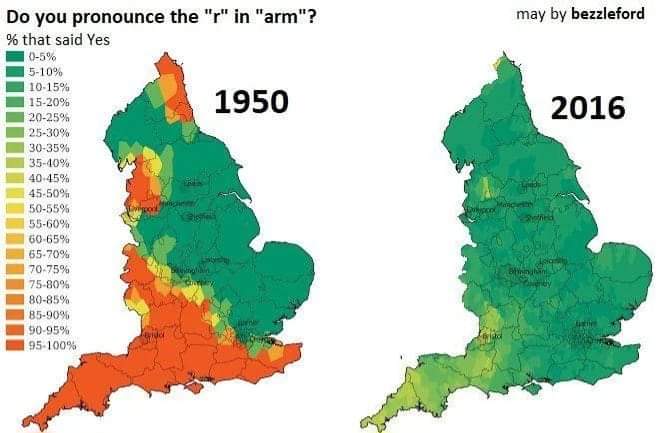
Consider the decline in the rhotic dialects of the North and Southwest.
dv said:

Consider the decline in the rhotic dialects of the North and Southwest.
Do you pronounce the h in rhotic.
Tempura was introduced to the Japanese by the Portuguese in the 16th century.
https://sudachirecipes.com/authentic-tempura-batter/
https://en.wikipedia.org/wiki/Peixinhos_da_horta
https://en.wikipedia.org/wiki/Tempura#History
Consider Transperth’s Digital E-Ink Bus Passenger Information Display System.

Very useful, low power (only need small PV panel atop), and easier on the eye than glowing lcd screens. Another winner!
dv said:
Consider Transperth’s Digital E-Ink Bus Passenger Information Display System.
Very useful, low power (only need small PV panel atop), and easier on the eye than glowing lcd screens. Another winner!
It’d be good if they displayed the time correctly – what the heck is 17:20pm?
AussieDJ said:
dv said:
Consider Transperth’s Digital E-Ink Bus Passenger Information Display System.
Very useful, low power (only need small PV panel atop), and easier on the eye than glowing lcd screens. Another winner!
It’d be good if they displayed the time correctly – what the heck is 17:20pm?
No Buses On Solar At Night
AussieDJ said:
dv said:
Consider Transperth’s Digital E-Ink Bus Passenger Information Display System.
Very useful, low power (only need small PV panel atop), and easier on the eye than glowing lcd screens. Another winner!
It’d be good if they displayed the time correctly – what the heck is 17:20pm?
Ive never seen 17:20am.
AussieDJ said:
dv said:
Consider Transperth’s Digital E-Ink Bus Passenger Information Display System.
Very useful, low power (only need small PV panel atop), and easier on the eye than glowing lcd screens. Another winner!
It’d be good if they displayed the time correctly – what the heck is 17:20pm?
lol
AussieDJ said:
dv said:
Consider Transperth’s Digital E-Ink Bus Passenger Information Display System.
Very useful, low power (only need small PV panel atop), and easier on the eye than glowing lcd screens. Another winner!
It’d be good if they displayed the time correctly – what the heck is 17:20pm?
Good catch

dv said:
Pebble’s in the foreground, grass on the horizon is in the background.
Michael V said:
dv said:
Pebble’s in the foreground, grass on the horizon is in the background.
That’s no pebble.
It’s a stone-age UFO.
Michael V said:
dv said:
Pebble’s in the foreground, grass on the horizon is in the background.
Isn’t it a rock in a lake?
Witty Rejoinder said:
Michael V said:
dv said:
Pebble’s in the foreground, grass on the horizon is in the background.
Isn’t it a rock in a lake?
Well yeah, you can convince yourself that’s what it is if you try hard enough.
Michael V said:
dv said:
Pebble’s in the foreground, grass on the horizon is in the background.
I actually have photographs like this. The stones in my photos were pulled out of the gravel driveway where they’d been pressed in by car movements by having been anchor points for golden orbweaver webs. We had wind and rain overnighht and the bits of gravel had been pulled out of the drive and suspended in the air by the web which was still attached both to the branch of a tree and the rock..
The Rev Dodgson said:
Witty Rejoinder said:
Michael V said:Pebble’s in the foreground, grass on the horizon is in the background.
Isn’t it a rock in a lake?
Well yeah, you can convince yourself that’s what it is if you try hard enough.
:)
dv said:
It is a rock in a puddle or pond.
Witty Rejoinder said:
Michael V said:
dv said:
Pebble’s in the foreground, grass on the horizon is in the background.
Isn’t it a rock in a lake?
You’re right.
I’m wrong.
Michael V said:
Witty Rejoinder said:
Michael V said:Pebble’s in the foreground, grass on the horizon is in the background.
Isn’t it a rock in a lake?
You’re right.
I’m wrong.
Our eyes are old. I had to go back and look at the larger image.
The Rev Dodgson said:
Michael V said:
dv said:
Pebble’s in the foreground, grass on the horizon is in the background.
That’s no pebble.
It’s a stone-age UFO.
Looks a lot like the Lectroids’ space/dimension ship in The Adventures of Buckaroo Banzai Across the Eighth Dimension
https://youtu.be/4m3Rea0H_p8?si=2cq8BI_tF31O__OT
Consider the special effects used for facial transformation in the 1937 movie Sh! The Octupus
dv said:
https://youtu.be/4m3Rea0H_p8?si=2cq8BI_tF31O__OTConsider the special effects used for facial transformation in the 1937 movie Sh! The Octupus
Bit of a spoiler in that clip. I’ve never seen that film, looks enjoyable.
dv said:
AussieDJ said:
dv said:
Consider Transperth’s Digital E-Ink Bus Passenger Information Display System.
Very useful, low power (only need small PV panel atop), and easier on the eye than glowing lcd screens. Another winner!
It’d be good if they displayed the time correctly – what the heck is 17:20pm?
Good catch

Manhattan

Probably posted previously.

One of the key figures in the deciphering of Mayan glyphs was Soviet linguist Yuri Knorozov. He read an account of a Spanish bishop asking a Mayan scribe how to write “A” “B” “C” etc, and copied it down. After watching his cat Asya trying to communicate with her kittens, he realized that the scribe wasn’t writing down the sounds of each letter, but Mayan words that sounded like each individual Spanish letter, which he was able to cross-reference in a dictionary of spoken Mayan (still spoken in Mexico and Guatamala). He and Asya are commemorated in a statue in Merida, Yucatan.


dv said:
One of the key figures in the deciphering of Mayan glyphs was Soviet linguist Yuri Knorozov. He read an account of a Spanish bishop asking a Mayan scribe how to write “A” “B” “C” etc, and copied it down. After watching his cat Asya trying to communicate with her kittens, he realized that the scribe wasn’t writing down the sounds of each letter, but Mayan words that sounded like each individual Spanish letter, which he was able to cross-reference in a dictionary of spoken Mayan (still spoken in Mexico and Guatamala). He and Asya are commemorated in a statue in Merida, Yucatan.
So uh the cat could written communicate, or was speaking words¿
dv said:
One of the key figures in the deciphering of Mayan glyphs was Soviet linguist Yuri Knorozov. He read an account of a Spanish bishop asking a Mayan scribe how to write “A” “B” “C” etc, and copied it down. After watching his cat Asya trying to communicate with her kittens, he realized that the scribe wasn’t writing down the sounds of each letter, but Mayan words that sounded like each individual Spanish letter, which he was able to cross-reference in a dictionary of spoken Mayan (still spoken in Mexico and Guatamala). He and Asya are commemorated in a statue in Merida, Yucatan.
Parsed as interesting.
dv said:
One of the key figures in the deciphering of Mayan glyphs was Soviet linguist Yuri Knorozov. He read an account of a Spanish bishop asking a Mayan scribe how to write “A” “B” “C” etc, and copied it down. After watching his cat Asya trying to communicate with her kittens, he realized that the scribe wasn’t writing down the sounds of each letter, but Mayan words that sounded like each individual Spanish letter, which he was able to cross-reference in a dictionary of spoken Mayan (still spoken in Mexico and Guatamala). He and Asya are commemorated in a statue in Merida, Yucatan.
Why does he look like such a sourpuss?
Ian said:
dv said:
One of the key figures in the deciphering of Mayan glyphs was Soviet linguist Yuri Knorozov. He read an account of a Spanish bishop asking a Mayan scribe how to write “A” “B” “C” etc, and copied it down. After watching his cat Asya trying to communicate with her kittens, he realized that the scribe wasn’t writing down the sounds of each letter, but Mayan words that sounded like each individual Spanish letter, which he was able to cross-reference in a dictionary of spoken Mayan (still spoken in Mexico and Guatamala). He and Asya are commemorated in a statue in Merida, Yucatan.
Why does he look like such a sourpuss?
It is like cat like owner.
Ian said:
dv said:
One of the key figures in the deciphering of Mayan glyphs was Soviet linguist Yuri Knorozov. He read an account of a Spanish bishop asking a Mayan scribe how to write “A” “B” “C” etc, and copied it down. After watching his cat Asya trying to communicate with her kittens, he realized that the scribe wasn’t writing down the sounds of each letter, but Mayan words that sounded like each individual Spanish letter, which he was able to cross-reference in a dictionary of spoken Mayan (still spoken in Mexico and Guatamala). He and Asya are commemorated in a statue in Merida, Yucatan.
Why does he look like such a sourpuss?
The man looks pretty grumpy too.
The Rev Dodgson said:
Ian said:
dv said:
One of the key figures in the deciphering of Mayan glyphs was Soviet linguist Yuri Knorozov. He read an account of a Spanish bishop asking a Mayan scribe how to write “A” “B” “C” etc, and copied it down. After watching his cat Asya trying to communicate with her kittens, he realized that the scribe wasn’t writing down the sounds of each letter, but Mayan words that sounded like each individual Spanish letter, which he was able to cross-reference in a dictionary of spoken Mayan (still spoken in Mexico and Guatamala). He and Asya are commemorated in a statue in Merida, Yucatan.
Why does he look like such a sourpuss?
The man looks pretty grumpy too.
:)
roughbarked said:
Ian said:
dv said:
One of the key figures in the deciphering of Mayan glyphs was Soviet linguist Yuri Knorozov. He read an account of a Spanish bishop asking a Mayan scribe how to write “A” “B” “C” etc, and copied it down. After watching his cat Asya trying to communicate with her kittens, he realized that the scribe wasn’t writing down the sounds of each letter, but Mayan words that sounded like each individual Spanish letter, which he was able to cross-reference in a dictionary of spoken Mayan (still spoken in Mexico and Guatamala). He and Asya are commemorated in a statue in Merida, Yucatan.
Why does he look like such a sourpuss?
It is like cat like owner.
Nah. All references to Knorozov say he was always the most miserable cunt they’d ever had the misfortune to meet, regardless of proximity to cats.
Ian said:
roughbarked said:
Ian said:Why does he look like such a sourpuss?
It is like cat like owner.
Nah. All references to Knorozov say he was always the most miserable cunt they’d ever had the misfortune to meet, regardless of proximity to cats.
From my ecperience, at the very least, cats teach us indifference.
roughbarked said:
Ian said:
roughbarked said:It is like cat like owner.
Nah. All references to Knorozov say he was always the most miserable cunt they’d ever had the misfortune to meet, regardless of proximity to cats.
From my experience, at the very least, cats teach us indifference.
^

Ice Mountains and Plains of Pluto | High-resolution images of Pluto taken by NASA’s New Horizons spacecraft just before closest approach on July 14, 2015, are the sharpest images to date of Pluto’s varied terrain-revealing details down to scales of 270 meters. In this 75-mile (120-kilometer) section taken from the larger, high-resolution mosaic, the textured surface of the plain surrounds two isolated ice mountains. Image Credit: NASA/Johns Hopkins University Applied Physics Laboratory/Southwest Research Institute.
Ian said:
roughbarked said:
Ian said:Why does he look like such a sourpuss?
It is like cat like owner.
Nah. All references to Knorozov say he was always the most miserable cunt they’d ever had the misfortune to meet, regardless of proximity to cats.
Why don’t people pick on your posts?
I am sure that if I used cunt in one of my posts, I’d be attacked.
roughbarked said:
Ian said:
roughbarked said:It is like cat like owner.
Nah. All references to Knorozov say he was always the most miserable cunt they’d ever had the misfortune to meet, regardless of proximity to cats.
Why don’t people pick on your posts?
I am sure that if I used cunt in one of my posts, I’d be attacked.
wookiemeister said:
roughbarked said:
Ian said:Nah. All references to Knorozov say he was always the most miserable cunt they’d ever had the misfortune to meet, regardless of proximity to cats.
Why don’t people pick on your posts?
I am sure that if I used cunt in one of my posts, I’d be attacked.
I always use cunt in my posts roughie, what makes you think using cunt would mean people would attack you.
A word not many people like, its effective though
Cymek said:
wookiemeister said:
roughbarked said:Why don’t people pick on your posts?
I am sure that if I used cunt in one of my posts, I’d be attacked.
I always use cunt in my posts roughie, what makes you think using cunt would mean people would attack you.
A word not many people like, its effective though
wookiemeister said:
Cymek said:
wookiemeister said:I always use cunt in my posts roughie, what makes you think using cunt would mean people would attack you.
A word not many people like, its effective though
Road ragers seem to like it
It describes poisonous douche bag type men, the shock jock type people
Cymek said:
wookiemeister said:
Cymek said:A word not many people like, its effective though
Road ragers seem to like itIt describes poisonous douche bag type men, the shock jock type people
Its rude to some people. It’s a very poisonous term. I never found the correct time to ever use it.
wookiemeister said:
Cymek said:
wookiemeister said:Road ragers seem to like it
It describes poisonous douche bag type men, the shock jock type people
Its like nigger ( or is it “nigga” ? I don’t know)Its rude to some people. It’s a very poisonous term. I never found the correct time to ever use it.
wookiemeister said:
wookiemeister said:
Cymek said:It describes poisonous douche bag type men, the shock jock type people
Its like nigger ( or is it “nigga” ? I don’t know)Its rude to some people. It’s a very poisonous term. I never found the correct time to ever use it.
Even before it became politically incorrect to use it ( gangsta excepted)
It can be a less rude insult or intended that way say if you call a mate it when drunk perhaps
Cymek said:
wookiemeister said:
wookiemeister said:Its like nigger ( or is it “nigga” ? I don’t know)
Its rude to some people. It’s a very poisonous term. I never found the correct time to ever use it.
Even before it became politically incorrect to use it ( gangsta excepted)
It can be a less rude insult or intended that way say if you call a mate it when drunk perhaps
wookiemeister said:
Cymek said:
wookiemeister said:Even before it became politically incorrect to use it ( gangsta excepted)
It can be a less rude insult or intended that way say if you call a mate it when drunk perhaps
Nigger or cunt ?
cunt,
but yes the other word can be used by specific people to take away its power and own the word
Cymek said:
wookiemeister said:
Cymek said:It can be a less rude insult or intended that way say if you call a mate it when drunk perhaps
Nigger or cunt ?
cunt,
but yes the other word can be used by specific people to take away its power and own the word
Scourge words
In the future AI will clamp down on scourge words on the internet when their use exceeds their validity.
Ulimaroa was a name given to Australia by the Swedish geographer and cartographer Daniel Djurberg in 1776.
Djurberg’s 1780 map, with Ulimaroa
Origins
edit
Djurberg adapted the name from Olhemaroa, a Māori word (this is disputed, as the Māori language does not use the letter ‘L’) found in Hawkesworth’s edition of Captain James Cook and Sir Joseph Banks’ journals which is thought to have been a misunderstood translation — the Māori were actually referring to Grand Terre, the largest island of New Caledonia or some Fijian island, and a name actually transcribed as ‘Rimaora’.
Jurberg was convinced that Ulimaroa was a New Zealand Māori name for Australia because when James Cook was on the North Island’s north coast, he asked the Maoris if they had knowledge of any other countries. They answered that to the northwest of their nation, a large land was located, which they called ‘Ulimaroa’. Recent studies suggests that Djurberg was wrong about the Māori referring Ulimaroa to Australia, and also that name is a misnomer, and it mostly likely did not mean “big red land.
——
But apart from that, he was bang on
dv said:
Ulimaroa was a name given to Australia by the Swedish geographer and cartographer Daniel Djurberg in 1776.Djurberg’s 1780 map, with Ulimaroa
Origins
edit
Djurberg adapted the name from Olhemaroa, a Māori word (this is disputed, as the Māori language does not use the letter ‘L’) found in Hawkesworth’s edition of Captain James Cook and Sir Joseph Banks’ journals which is thought to have been a misunderstood translation — the Māori were actually referring to Grand Terre, the largest island of New Caledonia or some Fijian island, and a name actually transcribed as ‘Rimaora’.Jurberg was convinced that Ulimaroa was a New Zealand Māori name for Australia because when James Cook was on the North Island’s north coast, he asked the Maoris if they had knowledge of any other countries. They answered that to the northwest of their nation, a large land was located, which they called ‘Ulimaroa’. Recent studies suggests that Djurberg was wrong about the Māori referring Ulimaroa to Australia, and also that name is a misnomer, and it mostly likely did not mean “big red land.
——
But apart from that, he was bang on
I often wonder why the Pacific Islanders didn’t set up colonies in Australia. They certainly had the boats capable of making the journey, But they seem to have gone always east.
party_pants said:
dv said:
Ulimaroa was a name given to Australia by the Swedish geographer and cartographer Daniel Djurberg in 1776.Djurberg’s 1780 map, with Ulimaroa
Origins
edit
Djurberg adapted the name from Olhemaroa, a Māori word (this is disputed, as the Māori language does not use the letter ‘L’) found in Hawkesworth’s edition of Captain James Cook and Sir Joseph Banks’ journals which is thought to have been a misunderstood translation — the Māori were actually referring to Grand Terre, the largest island of New Caledonia or some Fijian island, and a name actually transcribed as ‘Rimaora’.Jurberg was convinced that Ulimaroa was a New Zealand Māori name for Australia because when James Cook was on the North Island’s north coast, he asked the Maoris if they had knowledge of any other countries. They answered that to the northwest of their nation, a large land was located, which they called ‘Ulimaroa’. Recent studies suggests that Djurberg was wrong about the Māori referring Ulimaroa to Australia, and also that name is a misnomer, and it mostly likely did not mean “big red land.
——
But apart from that, he was bang on
I often wonder why the Pacific Islanders didn’t set up colonies in Australia. They certainly had the boats capable of making the journey, But they seem to have gone always east.
Probably forcefully told, this land is NOT terra nullius.
PermeateFree said:
party_pants said:
dv said:
Ulimaroa was a name given to Australia by the Swedish geographer and cartographer Daniel Djurberg in 1776.Djurberg’s 1780 map, with Ulimaroa
Origins
edit
Djurberg adapted the name from Olhemaroa, a Māori word (this is disputed, as the Māori language does not use the letter ‘L’) found in Hawkesworth’s edition of Captain James Cook and Sir Joseph Banks’ journals which is thought to have been a misunderstood translation — the Māori were actually referring to Grand Terre, the largest island of New Caledonia or some Fijian island, and a name actually transcribed as ‘Rimaora’.Jurberg was convinced that Ulimaroa was a New Zealand Māori name for Australia because when James Cook was on the North Island’s north coast, he asked the Maoris if they had knowledge of any other countries. They answered that to the northwest of their nation, a large land was located, which they called ‘Ulimaroa’. Recent studies suggests that Djurberg was wrong about the Māori referring Ulimaroa to Australia, and also that name is a misnomer, and it mostly likely did not mean “big red land.
——
But apart from that, he was bang on
I often wonder why the Pacific Islanders didn’t set up colonies in Australia. They certainly had the boats capable of making the journey, But they seem to have gone always east.
Probably forcefully told, this land is NOT terra nullius.
Still, you would have thought there would be some mixing and interaction. Seems like there was practically none.
party_pants said:
PermeateFree said:
party_pants said:I often wonder why the Pacific Islanders didn’t set up colonies in Australia. They certainly had the boats capable of making the journey, But they seem to have gone always east.
Probably forcefully told, this land is NOT terra nullius.
Still, you would have thought there would be some mixing and interaction. Seems like there was practically none.
Edmund Kennedy didn’t get much of a chance to interact with the far North Qld Aborigines. They were a very aggressive mob.
PermeateFree said:
party_pants said:
PermeateFree said:Probably forcefully told, this land is NOT terra nullius.
Still, you would have thought there would be some mixing and interaction. Seems like there was practically none.
Edmund Kennedy didn’t get much of a chance to interact with the far North Qld Aborigines. They were a very aggressive mob.
Anyone read the history of the Palmer River goldrush?
roughbarked said:
PermeateFree said:
party_pants said:Still, you would have thought there would be some mixing and interaction. Seems like there was practically none.
Edmund Kennedy didn’t get much of a chance to interact with the far North Qld Aborigines. They were a very aggressive mob.
Anyone read the history of the Palmer River goldrush?
Probably DO.
Michael V said:
roughbarked said:
PermeateFree said:Edmund Kennedy didn’t get much of a chance to interact with the far North Qld Aborigines. They were a very aggressive mob.
Anyone read the history of the Palmer River goldrush?
Probably DO.
Yes I am sure he has looked into it.
roughbarked said:
Michael V said:
roughbarked said:Anyone read the history of the Palmer River goldrush?
Probably DO.
Yes I am sure he has looked into it.
But the cannabalistic tribes are all gone now. So he should be safe.
https://twitter.com/Golden_004/status/1244332412743626759
Sloth fearlessly crawls past an anaconda
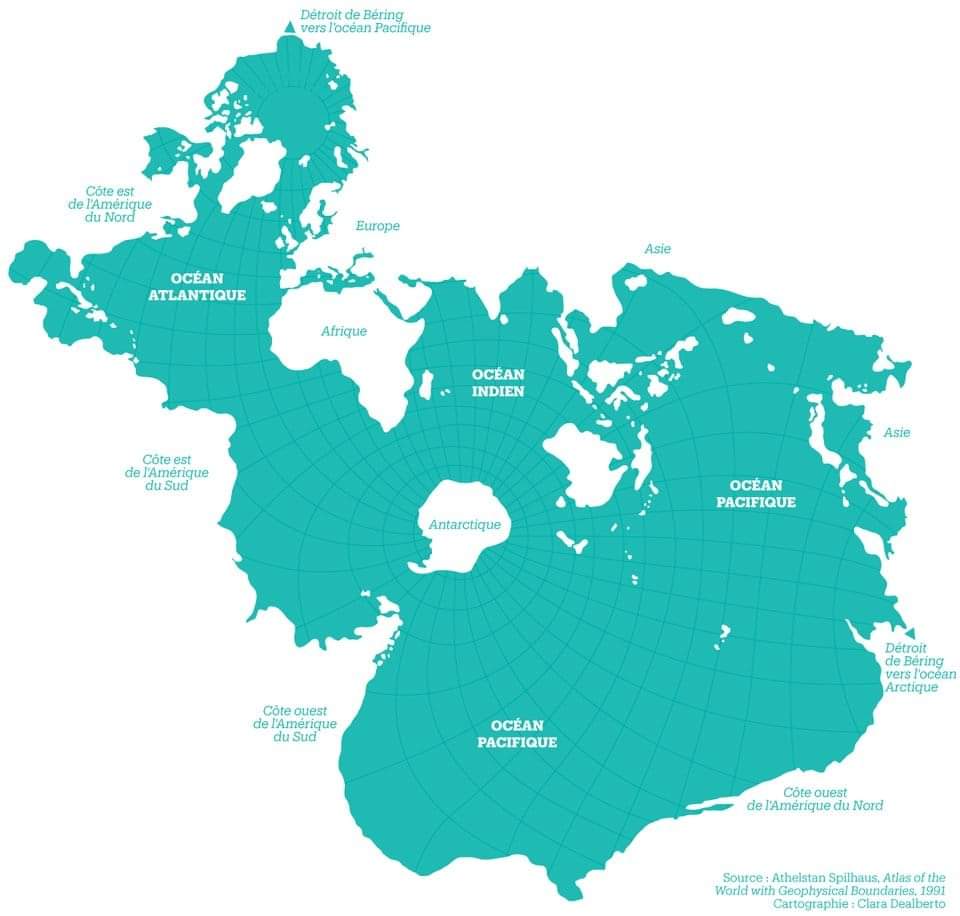
Spilhaus projection
dv said:

Spilhaus projection
I like that.
I like the way it separates the Indo-Pacific and Atlantic basins.
party_pants said:
dv said:

Spilhaus projection
I like that.
I like the way it separates the Indo-Pacific and Atlantic basins.
Tracking it, the only Strait that is included as part of the continental curve is the Bering strait, which is logical because it is the narrowest and has the lowest flow.
Consider the sprawling extent of the Los Angeles Statistical Metropolitan Area.
It has roughly the same extents as a region containing Sydney/Bathurst/Newcastle, or Cardiff/Birmingham/London.
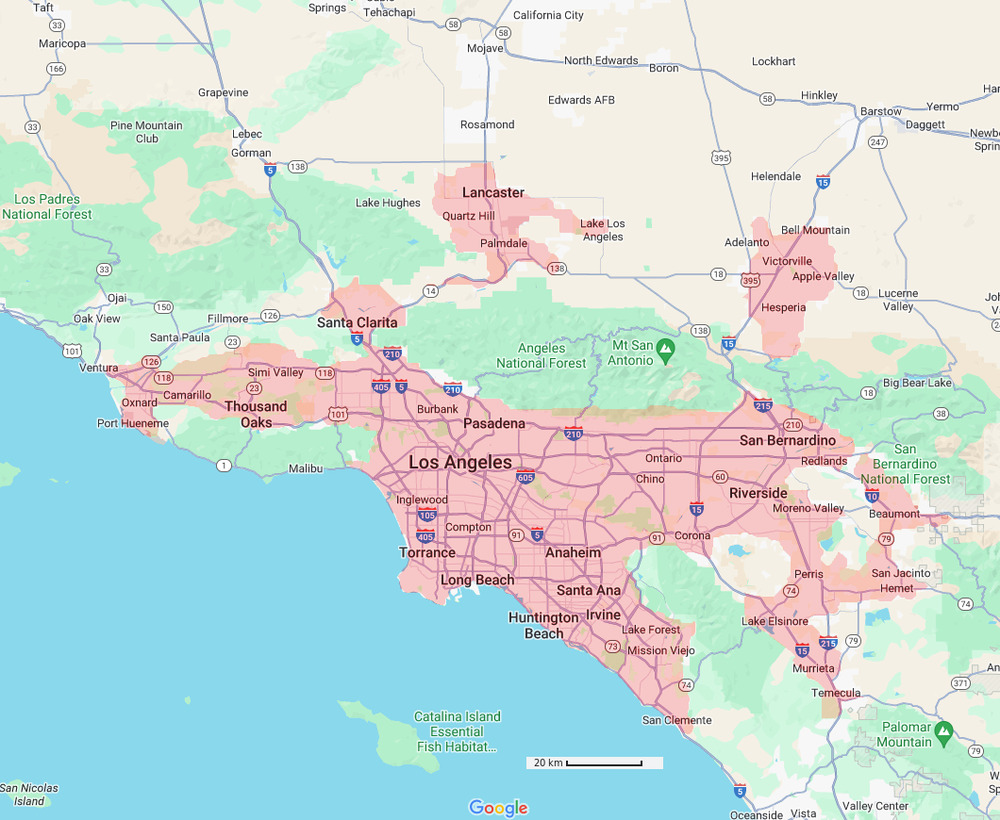

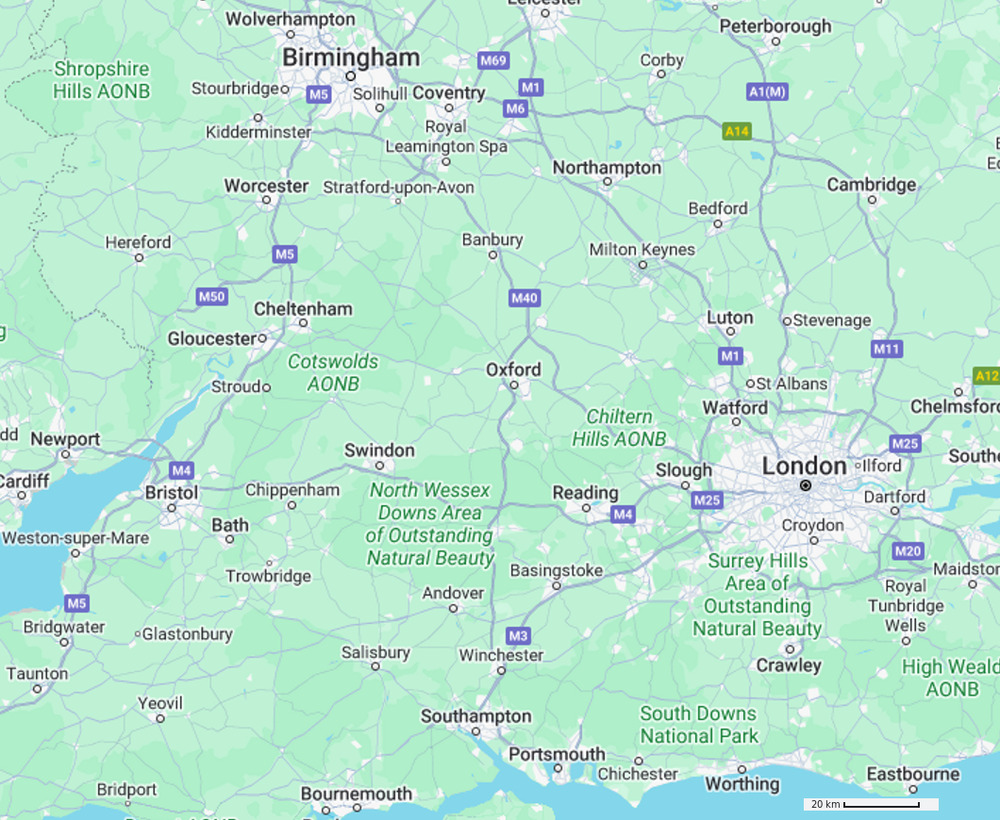


dv said:
Yep.
dv said:
With all its sham, drudgery, and broken dreams,
it is still a beautiful world.
Be cheerful.
Strive to be happy.
Peak Warming Man said:
dv said:
With all its sham, drudgery, and broken dreams,
it is still a beautiful world.
Be cheerful.
Strive to be happy.
Be assured that a walk through the ocean of most souls
Would scarcely get your feet wet.
Fall not in love therefore. It will stick to your face.
Gracefully surrender the things of youth: birds, clean air, tuna, Taiwan.
Neophyte said:
Peak Warming Man said:
dv said:
With all its sham, drudgery, and broken dreams,
it is still a beautiful world.
Be cheerful.
Strive to be happy.
Be assured that a walk through the ocean of most souls
Would scarcely get your feet wet.
Fall not in love therefore. It will stick to your face.
Gracefully surrender the things of youth: birds, clean air, tuna, Taiwan.
Hehe.
Go placidly amid the noise and waste,
And remember what comfort there may be in owning a piece thereof.
Avoid quiet and passive persons, unless you are in need of sleep.
Rotate your tires.
Peak Warming Man said:
dv said:
With all its sham, drudgery, and broken dreams,
it is still a beautiful world.
Be cheerful.
Strive to be happy.
Is Ehrmann known for anything else
dv said:
Peak Warming Man said:
dv said:
With all its sham, drudgery, and broken dreams,
it is still a beautiful world.
Be cheerful.
Strive to be happy.
Is Ehrmann known for anything else
One hit wonder, that was his opus magnum.
dv said:
Peak Warming Man said:
dv said:
With all its sham, drudgery, and broken dreams,
it is still a beautiful world.
Be cheerful.
Strive to be happy.
Is Ehrmann known for anything else
___
Presumably he died a happy man with that philosophy.
Today we celebrate the 200th anniversary of the construction of the Richmond Bridge, the oldest freestone bridge in Australia.
https://en.m.wikipedia.org/wiki/Richmond_Bridge_(Tasmania)
dv said:
Today we celebrate the 200th anniversary of the construction of the Richmond Bridge, the oldest freestone bridge in Australia.https://en.m.wikipedia.org/wiki/Richmond_Bridge_(Tasmania)
we = 0,0,0,1
party_pants said:
dv said:
Today we celebrate the 200th anniversary of the construction of the Richmond Bridge, the oldest freestone bridge in Australia.https://en.m.wikipedia.org/wiki/Richmond_Bridge_(Tasmania)
we = 0,0,0,1
or is it 1,0,0,1
party_pants said:
party_pants said:
dv said:
Today we celebrate the 200th anniversary of the construction of the Richmond Bridge, the oldest freestone bridge in Australia.https://en.m.wikipedia.org/wiki/Richmond_Bridge_(Tasmania)
we = 0,0,0,1
or is it 1,0,0,1
IDK my crystallography is rusty
dv said:
Today we celebrate the 200th anniversary of the construction of the Richmond Bridge, the oldest freestone bridge in Australia.https://en.m.wikipedia.org/wiki/Richmond_Bridge_(Tasmania)
Happy Birthday Richmond Bridge.
but
searching for “freestone bridge” Bing comes up with nothing but links to the Richmond Bridge and or other bridges in Tasmania, or bridges at places called Freestone.
So what exactly is a “freestone” bridge?
The Rev Dodgson said:
dv said:
Today we celebrate the 200th anniversary of the construction of the Richmond Bridge, the oldest freestone bridge in Australia.https://en.m.wikipedia.org/wiki/Richmond_Bridge_(Tasmania)
Happy Birthday Richmond Bridge.
but
searching for “freestone bridge” Bing comes up with nothing but links to the Richmond Bridge and or other bridges in Tasmania, or bridges at places called Freestone.
So what exactly is a “freestone” bridge?
roughbarked said:
The Rev Dodgson said:
dv said:
Today we celebrate the 200th anniversary of the construction of the Richmond Bridge, the oldest freestone bridge in Australia.https://en.m.wikipedia.org/wiki/Richmond_Bridge_(Tasmania)
Happy Birthday Richmond Bridge.
but
searching for “freestone bridge” Bing comes up with nothing but links to the Richmond Bridge and or other bridges in Tasmania, or bridges at places called Freestone.
So what exactly is a “freestone” bridge?
https://cdn.environment.sa.gov.au/environment/docs/tech_note3_6.pdf
The traditional international use of the term freestone is to describe fine- grained sandstones or limestones that can be readily worked in any direction. Locally, the term has also been applied to stone that is loose on the ground (fieldstone), or is naturally jointed into easily-quarried pieces, and is thus ‘free’. Freestone is also used to describe a style of walling in which the pieces are laid in an apparently random or free pattern. To avoid confusion between sandstones and limestones, it is recommended that the term freestone not be used to classify stone types.
Ashlar masonry is work in which softer, even-grained sandstones or limestones (true freestones) were generally finished smooth, worked to fine tolerances and laid in regular courses (or layers) with very thin joints. Ashlar work was reserved for more expensive buildings, and its use depended on the type of stones chosen. Ironically, today’s diamond- sawing technology makes reproduction of ashlar much simpler than squared rubble with a picked finish and drafted margins. Mount Gambier Limestone blocks, which are directly sawn from the quarry floor, are known locally as ashlars.
roughbarked said:
The Rev Dodgson said:
dv said:
Today we celebrate the 200th anniversary of the construction of the Richmond Bridge, the oldest freestone bridge in Australia.https://en.m.wikipedia.org/wiki/Richmond_Bridge_(Tasmania)
Happy Birthday Richmond Bridge.
but
searching for “freestone bridge” Bing comes up with nothing but links to the Richmond Bridge and or other bridges in Tasmania, or bridges at places called Freestone.
So what exactly is a “freestone” bridge?
https://cdn.environment.sa.gov.au/environment/docs/tech_note3_6.pdf
The traditional international use of the term freestone is to describe fine- grained sandstones or limestones that can be readily worked in any direction. Locally, the term has also been applied to stone that is loose on the ground (fieldstone), or is naturally jointed into easily-quarried pieces, and is thus ‘free’. Freestone is also used to describe a style of walling in which the pieces are laid in an apparently random or free pattern. To avoid confusion between sandstones and limestones, it is recommended that the term freestone not be used to classify stone types.
Thanks. Looks like their recommendation is followed pretty much everywhere except Tasmania.
And the Richmond Bridge is the oldest stone bridge of any type in Australia.
Although several links say it was finished in 1825 rather than 1823.
https://assets.nationalrail.co.uk/e8xgegruud3g/1eaveB2ciZEVT5uBiavJBC/a589d57c574579b0ac430a3111be8c58/Blue_route_AS_Metro_map_v26.pdf
Consider this comprehensive rail map of Great Britain.
Kind of ridiculously detailed, includes things like the Looe Valley Line community rail, the Isle of Wight’s Island Line, the new tram system in Croydon and surrounds, the Underground, Overground, wombling free, Elizabeth Line, Docklands Light Rail, West Midlands Metro, Nottingham light rail, Sheffield Supertram, Manchester Metrolink, Blackpool tramway, Tyne and Wear Metro, Glasgow Subway, Edinburgh tram.
If that’s what you’re into.
Fun fact: Leeds is the most populous urban area in Western Europe without a subway, metro or light rail system.
Fun fact 2: National Rail governs the intercity rail and most of the suburban rail throughout Great Britain but not Northern Ireland. NI Railways governs rail transport there.
The Island of Sodor seems to have a very large railway network for its implied size.
OCDC said:
The Island of Sodor seems to have a very large railway network for its implied size.
That’s undeniably true.
dv said:
https://assets.nationalrail.co.uk/e8xgegruud3g/1eaveB2ciZEVT5uBiavJBC/a589d57c574579b0ac430a3111be8c58/Blue_route_AS_Metro_map_v26.pdfConsider this comprehensive rail map of Great Britain.
Kind of ridiculously detailed, includes things like the Looe Valley Line community rail, the Isle of Wight’s Island Line, the new tram system in Croydon and surrounds, the Underground, Overground, wombling free, Elizabeth Line, Docklands Light Rail, West Midlands Metro, Nottingham light rail, Sheffield Supertram, Manchester Metrolink, Blackpool tramway, Tyne and Wear Metro, Glasgow Subway, Edinburgh tram.
If that’s what you’re into.
Fun fact: Leeds is the most populous urban area in Western Europe without a subway, metro or light rail system.
Fun fact 2: National Rail governs the intercity rail and most of the suburban rail throughout Great Britain but not Northern Ireland. NI Railways governs rail transport there.
Britain is very much an Anglian country with only Barrow-in-Furness and parts of the Thames estuary not having a straight coast line.
OCDC said:
The Island of Sodor seems to have a very large railway network for its implied size.
Praps it is based on the nearby Isle of Man, which has an impressive amount of passenger rail considering the low pop and dimensions, but unfortunately it does not run in winter.
Peak Warming Man said:
dv said:
https://assets.nationalrail.co.uk/e8xgegruud3g/1eaveB2ciZEVT5uBiavJBC/a589d57c574579b0ac430a3111be8c58/Blue_route_AS_Metro_map_v26.pdfConsider this comprehensive rail map of Great Britain.
Kind of ridiculously detailed, includes things like the Looe Valley Line community rail, the Isle of Wight’s Island Line, the new tram system in Croydon and surrounds, the Underground, Overground, wombling free, Elizabeth Line, Docklands Light Rail, West Midlands Metro, Nottingham light rail, Sheffield Supertram, Manchester Metrolink, Blackpool tramway, Tyne and Wear Metro, Glasgow Subway, Edinburgh tram.
If that’s what you’re into.
Fun fact: Leeds is the most populous urban area in Western Europe without a subway, metro or light rail system.
Fun fact 2: National Rail governs the intercity rail and most of the suburban rail throughout Great Britain but not Northern Ireland. NI Railways governs rail transport there.
Britain is very much an Anglian country with only Barrow-in-Furness and parts of the Thames estuary not having a straight coast line.
That ls pretty funny
Anyway the train from Albury to Melbourne is fine but not particularly exciting.
OCDC said:
Anyway the train from Albury to Melbourne is fine but not particularly exciting.Now if they upgraded to Gordon or Henry that would be another story.

Every planet has a north.
(I wonder if that’s true.)
OCDC said:
Every planet has a north.(I wonder if that’s true.)
North is arbitrary.
Over.
Oh goody. I haven’t missed the solstice.
OCDC said:
Every planet has a north.(I wonder if that’s true.)
I think we can define north so that it is true.
BTW, poindexter, is there a general term for the December solstice?
dv said:
OCDC said:Do all solar systems have magnetic fields?Every planet has a north.(I wonder if that’s true.)
I think we can define north so that it is true.
BTW, poindexter, is there a general term for the December solstice?
Dunno, other than “December solstice”.
OCDC said:
dv said:OCDC said:Do all solar systems have magnetic fields?Every planet has a north.(I wonder if that’s true.)
I think we can define north so that it is true.
BTW, poindexter, is there a general term for the December solstice?
Dunno, other than “December solstice”.
You don’t need a magnetic field, just rotation, to define north.
dv said:
OCDC said:OICdv said:You don’t need a magnetic field, just rotation, to define north.I think we can define north so that it is true.Do all solar systems have magnetic fields?BTW, poindexter, is there a general term for the December solstice?
Dunno, other than “December solstice”.
I’m a doctor, not a fizzycyst.
OCDC said:
dv said:OCDC said:OICDo all solar systems have magnetic fields?You don’t need a magnetic field, just rotation, to define north.Dunno, other than “December solstice”.
I’m a doctor, not a fizzycyst.
I’m pretty sure that Doctors know more about fizzy cysts than most others.
But I guess I’ll have to accept your answer about December solstice.
The sun is in Sagittarius so we could call it the Sagittarian solstice but even that’s only going to be correct for a few thousand years.
dv said:
I’ve never been in Scotland during the Northern Winter. Indeed now I come to think of it, I’ve never been north of the tropic of Cancer in the Northern Winter.
dv said:
dv said:

I’ve never been in Scotland during the Northern Winter. Indeed now I come to think of it, I’ve never been north of the tropic of Cancer in the Northern Winter.
OK when you’re a kid with no responsibilities.
dv said:
AussieDJ said:
dv said:
Consider Transperth’s Digital E-Ink Bus Passenger Information Display System.
Very useful, low power (only need small PV panel atop), and easier on the eye than glowing lcd screens. Another winner!
It’d be good if they displayed the time correctly – what the heck is 17:20pm?
Good catch
5:20 PM
dv said:
AussieDJ said:
dv said:
Consider Transperth’s Digital E-Ink Bus Passenger Information Display System.
Very useful, low power (only need small PV panel atop), and easier on the eye than glowing lcd screens. Another winner!
It’d be good if they displayed the time correctly – what the heck is 17:20pm?
Good catch
5:20 PM
Ogmog said:
dv said:
AussieDJ said:It’d be good if they displayed the time correctly – what the heck is 17:20pm?
Good catch
what the heck is 17:20pm?5:20 PM
‘17:20 PM’ is a redundancy.
If it’s 17:20, then it has to be PM. There’s no ’17:20 AM’.
There’s 05:20 (5:20 AM). Anything before 12:00 has to be AM, anything after that has to be PM, there’s no need to use either abbreviation.
And, in case you’re wondering, there’s no such time as 00:00.
Times are noted as 23:59, right up to a second before midnight, which would be shown as 23:59:59, if need be. Then the next time that can be recorded, if (improbably) necessary, is 00:00:01.
captain_spalding said:
Ogmog said:
dv said:Good catch
what the heck is 17:20pm?5:20 PM
‘17:20 PM’ is a redundancy.
That’s what I was attempting to highlight.
captain_spalding said:
And, in case you’re wondering, there’s no such time as 00:00.Times are noted as 23:59, right up to a second before midnight, which would be shown as 23:59:59, if need be. Then the next time that can be recorded, if (improbably) necessary, is 00:00:01.
There is a lot of switching which occurs at the stroke of midnight – ie at 00:00.
I will concede it’s possible that even though we specify a ‘midnight switch’, the actual switch may take place within a period of microseconds after time 00:00, with the time difference too small to be noticeable – and as long as the reader hits the news theme fairly smartly, no-one is any the wiser.

Consider this clock in Bailey’s bank, in It’s A Wonderful Life. I don’t think I’ve seen anything like it in real life.
dv said:

Consider this clock in Bailey’s bank, in It’s A Wonderful Life. I don’t think I’ve seen anything like it in real life.
I’ve got a bagful of wrist watches with dials the same or very similar..
https://fb.watch/pb_a1zdMfC/
sarahs mum said:
https://fb.watch/pb_a1zdMfC/
That was rather spectacular!
sarahs mum said:
https://fb.watch/pb_a1zdMfC/
bump.
Coventry Very Light Rail (CVLR) is a light rail/tram system proposed to operate in Coventry. The system has been promoted as being the first of its kind in the United Kingdom. When finished, it will also be the first tram network to operate in Coventry since the Second World War.
Plans to establish such a system were first revealed during 2016; development work was headed by the Warwick Manufacturing Group (WMG) and Transport Design International (TDI). It was designed to be substantially cheaper to establish than conventional tramways and light railways, making use of batteries to avoid installing expensive overhead line equipment along much of the route, along with a new, thinner track system that is easier to install and repair. The vehicle is standard UK gauge, so would be compatible with other networks.
—-
A major feature of the system is the track, which is prefabricated. This is relatively lightweight and shallower than traditional tramway track, enabling it to be laid over existing utilities and thus avoiding the need for these to be relocated, requiring less excavation; all of these factors make it quicker and cheaper to install. If required, the track can be dismantled and reused at other locations, being held together by a series of clips; this feature has also been promoted for ease of maintenance. The track is seated upon slabs, the materials of which can comprise a high-strength foam core with a recycled plastic coating.
—-
https://en.wikipedia.org/wiki/Coventry_Very_Light_Rail
Looks quite interesting. Can handle a 15 metre radius of curvature which is quite good for a track-based vehicle.
dv said:
Coventry Very Light Rail (CVLR) is a light rail/tram system proposed to operate in Coventry. The system has been promoted as being the first of its kind in the United Kingdom. When finished, it will also be the first tram network to operate in Coventry since the Second World War.Plans to establish such a system were first revealed during 2016; development work was headed by the Warwick Manufacturing Group (WMG) and Transport Design International (TDI). It was designed to be substantially cheaper to establish than conventional tramways and light railways, making use of batteries to avoid installing expensive overhead line equipment along much of the route, along with a new, thinner track system that is easier to install and repair. The vehicle is standard UK gauge, so would be compatible with other networks.
—-
A major feature of the system is the track, which is prefabricated. This is relatively lightweight and shallower than traditional tramway track, enabling it to be laid over existing utilities and thus avoiding the need for these to be relocated, requiring less excavation; all of these factors make it quicker and cheaper to install. If required, the track can be dismantled and reused at other locations, being held together by a series of clips; this feature has also been promoted for ease of maintenance. The track is seated upon slabs, the materials of which can comprise a high-strength foam core with a recycled plastic coating.
—-
https://en.wikipedia.org/wiki/Coventry_Very_Light_RailLooks quite interesting. Can handle a 15 metre radius of curvature which is quite good for a track-based vehicle.
Well I hope they have checked how well it works in practice before they start installing it.
The Rev Dodgson said:
dv said:
Coventry Very Light Rail (CVLR) is a light rail/tram system proposed to operate in Coventry. The system has been promoted as being the first of its kind in the United Kingdom. When finished, it will also be the first tram network to operate in Coventry since the Second World War.Plans to establish such a system were first revealed during 2016; development work was headed by the Warwick Manufacturing Group (WMG) and Transport Design International (TDI). It was designed to be substantially cheaper to establish than conventional tramways and light railways, making use of batteries to avoid installing expensive overhead line equipment along much of the route, along with a new, thinner track system that is easier to install and repair. The vehicle is standard UK gauge, so would be compatible with other networks.
—-
A major feature of the system is the track, which is prefabricated. This is relatively lightweight and shallower than traditional tramway track, enabling it to be laid over existing utilities and thus avoiding the need for these to be relocated, requiring less excavation; all of these factors make it quicker and cheaper to install. If required, the track can be dismantled and reused at other locations, being held together by a series of clips; this feature has also been promoted for ease of maintenance. The track is seated upon slabs, the materials of which can comprise a high-strength foam core with a recycled plastic coating.
—-
https://en.wikipedia.org/wiki/Coventry_Very_Light_RailLooks quite interesting. Can handle a 15 metre radius of curvature which is quite good for a track-based vehicle.
Well I hope they have checked how well it works in practice before they start installing it.
How many times has that actually happened?
roughbarked said:
The Rev Dodgson said:
dv said:
Coventry Very Light Rail (CVLR) is a light rail/tram system proposed to operate in Coventry. The system has been promoted as being the first of its kind in the United Kingdom. When finished, it will also be the first tram network to operate in Coventry since the Second World War.Plans to establish such a system were first revealed during 2016; development work was headed by the Warwick Manufacturing Group (WMG) and Transport Design International (TDI). It was designed to be substantially cheaper to establish than conventional tramways and light railways, making use of batteries to avoid installing expensive overhead line equipment along much of the route, along with a new, thinner track system that is easier to install and repair. The vehicle is standard UK gauge, so would be compatible with other networks.
—-
A major feature of the system is the track, which is prefabricated. This is relatively lightweight and shallower than traditional tramway track, enabling it to be laid over existing utilities and thus avoiding the need for these to be relocated, requiring less excavation; all of these factors make it quicker and cheaper to install. If required, the track can be dismantled and reused at other locations, being held together by a series of clips; this feature has also been promoted for ease of maintenance. The track is seated upon slabs, the materials of which can comprise a high-strength foam core with a recycled plastic coating.
—-
https://en.wikipedia.org/wiki/Coventry_Very_Light_RailLooks quite interesting. Can handle a 15 metre radius of curvature which is quite good for a track-based vehicle.
Well I hope they have checked how well it works in practice before they start installing it.
How many times has that actually happened?
Eh?
It’s standard practice.
The Rev Dodgson said:
roughbarked said:
The Rev Dodgson said:Well I hope they have checked how well it works in practice before they start installing it.
How many times has that actually happened?
Eh?
It’s standard practice.
Oh so you were making a joke rather than living in hope?
roughbarked said:
The Rev Dodgson said:
roughbarked said:How many times has that actually happened?
Eh?
It’s standard practice.
Oh so you were making a joke rather than living in hope?
No, I was making a serious comment that I hope they are following standard practice because the way it’s written makes it sound like they aren’t.
It sounds QI, but very much over-hyped.
How come Elon isn’t involved with this?
The Rev Dodgson said:
roughbarked said:
The Rev Dodgson said:Eh?
It’s standard practice.
Oh so you were making a joke rather than living in hope?
No, I was making a serious comment that I hope they are following standard practice because the way it’s written makes it sound like they aren’t.
Ah. OK.
The Rev Dodgson said:
Another article on CVLRIt sounds QI, but very much over-hyped.
How come Elon isn’t involved with this?
Maybe he simply can’t have his hand in everything?
On the Internet I read:
“Alhazen was the first person to really push for experimentation as the primary source of scientific knowledge, and he’s the first person to codify what we now call the scientific method.”
so I thought I’d have a look at what TATE had to say about him and found this quote from the man himself:
“Therefore, the seeker after the truth is not one who studies the writings of the ancients and, following his natural disposition, puts his trust in them, but rather the one who suspects his faith in them and questions what he gathers from them, the one who submits to argument and demonstration, and not to the sayings of a human being whose nature is fraught with all kinds of imperfection and deficiency. The duty of the man who investigates the writings of scientists, if learning the truth is his goal, is to make himself an enemy of all that he reads, and … attack it from every side. He should also suspect himself as he performs his critical examination of it, so that he may avoid falling into either prejudice or leniency.
— Alhazen”
which I thought worth considering.
The Rev Dodgson said:
On the Internet I read:“Alhazen was the first person to really push for experimentation as the primary source of scientific knowledge, and he’s the first person to codify what we now call the scientific method.”
so I thought I’d have a look at what TATE had to say about him and found this quote from the man himself:
“Therefore, the seeker after the truth is not one who studies the writings of the ancients and, following his natural disposition, puts his trust in them, but rather the one who suspects his faith in them and questions what he gathers from them, the one who submits to argument and demonstration, and not to the sayings of a human being whose nature is fraught with all kinds of imperfection and deficiency. The duty of the man who investigates the writings of scientists, if learning the truth is his goal, is to make himself an enemy of all that he reads, and … attack it from every side. He should also suspect himself as he performs his critical examination of it, so that he may avoid falling into either prejudice or leniency.
— Alhazen”
which I thought worth considering.
Well worth considering.
:)
The Rev Dodgson said:
On the Internet I read:“Alhazen was the first person to really push for experimentation as the primary source of scientific knowledge, and he’s the first person to codify what we now call the scientific method.”
so I thought I’d have a look at what TATE had to say about him and found this quote from the man himself:
“Therefore, the seeker after the truth is not one who studies the writings of the ancients and, following his natural disposition, puts his trust in them, but rather the one who suspects his faith in them and questions what he gathers from them, the one who submits to argument and demonstration, and not to the sayings of a human being whose nature is fraught with all kinds of imperfection and deficiency. The duty of the man who investigates the writings of scientists, if learning the truth is his goal, is to make himself an enemy of all that he reads, and … attack it from every side. He should also suspect himself as he performs his critical examination of it, so that he may avoid falling into either prejudice or leniency.
— Alhazen”
which I thought worth considering.
Indeed there is some depth there.
From ABC News:
‘University of New South Whales criminology professor Eileen Baldry said it would be far more cost-effective for taxpayers and the government if people were supported when they get out to avoid recidivism.’
I wonder if you have to demonstrate a cetacean heritage to enroll at that uni?
(Also wondering whether Arts knows the professor.)
The Rev Dodgson said:
dv said:
Coventry Very Light Rail (CVLR) is a light rail/tram system proposed to operate in Coventry. The system has been promoted as being the first of its kind in the United Kingdom. When finished, it will also be the first tram network to operate in Coventry since the Second World War.Plans to establish such a system were first revealed during 2016; development work was headed by the Warwick Manufacturing Group (WMG) and Transport Design International (TDI). It was designed to be substantially cheaper to establish than conventional tramways and light railways, making use of batteries to avoid installing expensive overhead line equipment along much of the route, along with a new, thinner track system that is easier to install and repair. The vehicle is standard UK gauge, so would be compatible with other networks.
—-
A major feature of the system is the track, which is prefabricated. This is relatively lightweight and shallower than traditional tramway track, enabling it to be laid over existing utilities and thus avoiding the need for these to be relocated, requiring less excavation; all of these factors make it quicker and cheaper to install. If required, the track can be dismantled and reused at other locations, being held together by a series of clips; this feature has also been promoted for ease of maintenance. The track is seated upon slabs, the materials of which can comprise a high-strength foam core with a recycled plastic coating.
—-
https://en.wikipedia.org/wiki/Coventry_Very_Light_RailLooks quite interesting. Can handle a 15 metre radius of curvature which is quite good for a track-based vehicle.
Well I hope they have checked how well it works in practice before they start installing it.
There’s a testing track at the Dudley Very Light Rail National Innovation Centre.
https://youtu.be/t6L8KcAiqI8?si=l9xx6nHEzsGeY7e_The Rev Dodgson said:
Another article on CVLRIt sounds QI, but very much over-hyped.
How come Elon isn’t involved with this?
Because it’s something that appears to work…
The main thing is price and deployment speed, which may both be about 25% of normal light rail.
Exterior design is inoffensive but not very interesting.

dv said:
The Rev Dodgson said:
Another article on CVLRIt sounds QI, but very much over-hyped.
How come Elon isn’t involved with this?
Because it’s something that appears to work…
The main thing is price and deployment speed, which may both be about 25% of normal light rail.
It looks lie a gagetbahn to me. The same purpose could be better served with bendy buses running on a dedicated busway with no other traffic allowed. Much greater flexibility in route options as buses could leave the busway and do part of their service as a normal bus. You could have electric buses if you wish. All you need to do is build a normal roadway and buy normal buses.
party_pants said:
dv said:The Brisbum busway is a sensible thing, I must confess. And then the extension that would’ve helped my commute to work was completed the year after I left.The Rev Dodgson said:Another article on CVLRBecause it’s something that appears to work…It sounds QI, but very much over-hyped.
How come Elon isn’t involved with this?
The main thing is price and deployment speed, which may both be about 25% of normal light rail.
It looks lie a gagetbahn to me. The same purpose could be better served with bendy buses running on a dedicated busway with no other traffic allowed. Much greater flexibility in route options as buses could leave the busway and do part of their service as a normal bus. You could have electric buses if you wish. All you need to do is build a normal roadway and buy normal buses.
OCDC said:
party_pants said:dv said:The Brisbum busway is a sensible thing, I must confess. And then the extension that would’ve helped my commute to work was completed the year after I left.Because it’s something that appears to work…
The main thing is price and deployment speed, which may both be about 25% of normal light rail.
It looks lie a gagetbahn to me. The same purpose could be better served with bendy buses running on a dedicated busway with no other traffic allowed. Much greater flexibility in route options as buses could leave the busway and do part of their service as a normal bus. You could have electric buses if you wish. All you need to do is build a normal roadway and buy normal buses.
The revamp of my train line is going to be interesting to see.
A number of stations were demolished within days its a big constructions site now
party_pants said:
dv said:
The Rev Dodgson said:
Another article on CVLRIt sounds QI, but very much over-hyped.
How come Elon isn’t involved with this?
Because it’s something that appears to work…
The main thing is price and deployment speed, which may both be about 25% of normal light rail.
It looks lie a gagetbahn to me. The same purpose could be better served with bendy buses running on a dedicated busway with no other traffic allowed. Much greater flexibility in route options as buses could leave the busway and do part of their service as a normal bus. You could have electric buses if you wish. All you need to do is build a normal roadway and buy normal buses.
Steel on steel has about 5% of the frictional losses of rubber on road.
Cymek said:
OCDC said:
party_pants said:The Brisbum busway is a sensible thing, I must confess. And then the extension that would’ve helped my commute to work was completed the year after I left.It looks lie a gagetbahn to me. The same purpose could be better served with bendy buses running on a dedicated busway with no other traffic allowed. Much greater flexibility in route options as buses could leave the busway and do part of their service as a normal bus. You could have electric buses if you wish. All you need to do is build a normal roadway and buy normal buses.
The revamp of my train line is going to be interesting to see.
A number of stations were demolished within days its a big constructions site now
Yeah. I went through Armadale a few days ago, the station there has already been demolished. I think it is going to be worth the pain. But gee, 18 months is a long time to close a major railway for rebuilding. It it going to extended to Byford too, which has been promised for the last 30 years or more. It was always mentioned on the election pamphlets every state election when I lived in Armadale.
Cymek said:
OCDC said:
party_pants said:The Brisbum busway is a sensible thing, I must confess. And then the extension that would’ve helped my commute to work was completed the year after I left.It looks lie a gagetbahn to me. The same purpose could be better served with bendy buses running on a dedicated busway with no other traffic allowed. Much greater flexibility in route options as buses could leave the busway and do part of their service as a normal bus. You could have electric buses if you wish. All you need to do is build a normal roadway and buy normal buses.
The revamp of my train line is going to be interesting to see.
A number of stations were demolished within days its a big constructions site now
I think the Cross river rail is going to be very useful when done, and particularly the new Albert St station. Most of the actual city is a long march from Central or Roma St.
Perth is building out new rail stations in the suburbs but much of the inner area is not well served by rail. Various light rail ideas are being considered.
dv said:
party_pants said:
dv said:Because it’s something that appears to work…
The main thing is price and deployment speed, which may both be about 25% of normal light rail.
It looks lie a gagetbahn to me. The same purpose could be better served with bendy buses running on a dedicated busway with no other traffic allowed. Much greater flexibility in route options as buses could leave the busway and do part of their service as a normal bus. You could have electric buses if you wish. All you need to do is build a normal roadway and buy normal buses.
Steel on steel has about 5% of the frictional losses of rubber on road.
Yeah, but far less flexibility. Sometimes in life there is no perfect solution, only trade-offs. The rolling resistance of rubber tyres on road is a disadvantage, but I could think up a list of disadvantages for this very light rail too. For example I think buses would have a higher capacity, and buses could be done with off-the-shelf equipment rather than being bespoke and locked into a single vendor that designed the system.
dv said:
The Rev Dodgson said:
Another article on CVLRIt sounds QI, but very much over-hyped.
How come Elon isn’t involved with this?
Because it’s something that appears to work…
The main thing is price and deployment speed, which may both be about 25% of normal light rail.
If the numbers quoted are correct, which seems pretty unlikely.
party_pants said:
Cymek said:
OCDC said:
The Brisbum busway is a sensible thing, I must confess. And then the extension that would’ve helped my commute to work was completed the year after I left.
The revamp of my train line is going to be interesting to see.
A number of stations were demolished within days its a big constructions site now
Yeah. I went through Armadale a few days ago, the station there has already been demolished. I think it is going to be worth the pain. But gee, 18 months is a long time to close a major railway for rebuilding. It it going to extended to Byford too, which has been promised for the last 30 years or more. It was always mentioned on the election pamphlets every state election when I lived in Armadale.
Yes I’m about week 6 into it.
Its less pleasant on the bus but what can you do
The Rev Dodgson said:
dv said:
The Rev Dodgson said:
Another article on CVLRIt sounds QI, but very much over-hyped.
How come Elon isn’t involved with this?
Because it’s something that appears to work…
The main thing is price and deployment speed, which may both be about 25% of normal light rail.
If the numbers quoted are correct, which seems pretty unlikely.
Well I suppose we’ll see.
To my mind the … alarming thing is that it rests on a bed of “foam”.
I suppose amazing things are happening in materials science. Maybe this foam is harder than granite. (Shrugs)
Here’s a short video of the walk-through of the rail vehicle.
Not sure if the driver seat is going to be separated from the passenger seats with a screen in the final version, but if not then it screams bad design if passengers could physically interfere with drivers or control panel.
Also, it doesn’t seem to carry very many passengers, certainly not more than a bus.
https://www.youtube.com/watch?v=_JZyp4Xp_PU&list=PLhpduM3svftAkAixvM8QTEIMHnUvc5nlw&index=2
Talking of trams, I noticed these single railed with tyre jobs running around Clermont-Ferrand.
Seems frankly bonkers to me.. but Hey.. they’re French.
Ian said:
Talking of trams, I noticed these single railed with tyre jobs running around Clermont-Ferrand.Seems frankly bonkers to me.. but Hey.. they’re French.
When I was a young boy in London the big thing was converting all the trams to “trolley busses” (trams with rubber tyred wheels). By the time I went back there for university all the trolley busses had gone as well.
dv said:
The Rev Dodgson said:
dv said:Because it’s something that appears to work…
The main thing is price and deployment speed, which may both be about 25% of normal light rail.
If the numbers quoted are correct, which seems pretty unlikely.
Well I suppose we’ll see.
To my mind the … alarming thing is that it rests on a bed of “foam”.
I suppose amazing things are happening in materials science. Maybe this foam is harder than granite. (Shrugs)
To be a pit more positive, no doubt there is plenty of scope for saving money in infrastructure construction.
The Rev Dodgson said:
Ian said:
Talking of trams, I noticed these single railed with tyre jobs running around Clermont-Ferrand.Seems frankly bonkers to me.. but Hey.. they’re French.
When I was a young boy in London the big thing was converting all the trams to “trolley busses” (trams with rubber tyred wheels). By the time I went back there for university all the trolley busses had gone as well.
I remember seeing trolley busses running around Brisbane when I was young. Apparently operated from 1951 to 1969.

Ian said:
The Rev Dodgson said:
Ian said:
Talking of trams, I noticed these single railed with tyre jobs running around Clermont-Ferrand.Seems frankly bonkers to me.. but Hey.. they’re French.
When I was a young boy in London the big thing was converting all the trams to “trolley busses” (trams with rubber tyred wheels). By the time I went back there for university all the trolley busses had gone as well.
I remember seeing trolley busses running around Brisbane when I was young. Apparently operated from 1951 to 1969.
They still seem to be popular in the old Warsaw Pact countries and former Soviet republics.
party_pants said:
Ian said:
The Rev Dodgson said:When I was a young boy in London the big thing was converting all the trams to “trolley busses” (trams with rubber tyred wheels). By the time I went back there for university all the trolley busses had gone as well.
I remember seeing trolley busses running around Brisbane when I was young. Apparently operated from 1951 to 1969.
They still seem to be popular in the old Warsaw Pact countries and former Soviet republics.
athens as well in 1980 at least.
btw buses not busses.
ChrispenEvan said:
party_pants said:Both are correct.Ian said:athens as well in 1980 at least.I remember seeing trolley busses running around Brisbane when I was young. Apparently operated from 1951 to 1969.They still seem to be popular in the old Warsaw Pact countries and former Soviet republics.
btw buses not busses.
OCDC said:
ChrispenEvan said:party_pants said:Both are correct.They still seem to be popular in the old Warsaw Pact countries and former Soviet republics.athens as well in 1980 at least.
btw buses not busses.
The plural form of bus is buses. To be fair, the Macquarie does list busses as an alternative plural form of bus. But it appears so rarely that most people would view it as a spelling error.
ChrispenEvan said:
OCDC said:
ChrispenEvan said:athens as well in 1980 at least.Both are correct.btw buses not busses.
The plural form of bus is buses. To be fair, the Macquarie does list busses as an alternative plural form of bus. But it appears so rarely that most people would view it as a spelling error.
and in the recent posts the posters just spelt it wrong.
ChrispenEvan said:
OCDC said:Busses is in OED so I’ll take it as a correct option.ChrispenEvan said:The plural form of bus is buses. To be fair, the Macquarie does list busses as an alternative plural form of bus. But it appears so rarely that most people would view it as a spelling error.athens as well in 1980 at least.Both are correct.btw buses not busses.
ChrispenEvan said:
party_pants said:
Ian said:I remember seeing trolley busses running around Brisbane when I was young. Apparently operated from 1951 to 1969.
They still seem to be popular in the old Warsaw Pact countries and former Soviet republics.
athens as well in 1980 at least.
I can see why most of them were taken down. The overhead wires are a bit unsightly, and there are two of them rather than a single overhead wire like a train. So it all looks a bit messy and meh. I guess they thought they were making the cities more beautiful at the time when they took them down.
OCDC said:
ChrispenEvan said:OCDC said:Busses is in OED so I’ll take it as a correct option.Both are correct.The plural form of bus is buses. To be fair, the Macquarie does list busses as an alternative plural form of bus. But it appears so rarely that most people would view it as a spelling error.
and in the recent posts the posters just spelt it wrong.
ChrispenEvan said:
OCDC said:The things we have to contend with when we let the little people in…ChrispenEvan said:and in the recent posts the posters just spelt it wrong.The plural form of bus is buses. To be fair, the Macquarie does list busses as an alternative plural form of bus. But it appears so rarely that most people would view it as a spelling error.Busses is in OED so I’ll take it as a correct option.
OCDC said:
ChrispenEvan said:OCDC said:The things we have to contend with when we let the little people in…Busses is in OED so I’ll take it as a correct option.and in the recent posts the posters just spelt it wrong.
it’s a cross we have to bear.
ChrispenEvan said:
OCDC said:
ChrispenEvan said:The plural form of bus is buses. To be fair, the Macquarie does list busses as an alternative plural form of bus. But it appears so rarely that most people would view it as a spelling error.Busses is in OED so I’ll take it as a correct option.
and in the recent posts the posters just spelt it wrong.
If it’s good enough for the Bing-bot, it’s good enough for me.
If it’s dedicated bus systems you’re after, look no further than Adelaide’s O-Bahn

Of course, a couple of times a year we get this (mainly drunk backpackers)…

Neophyte said:
If it’s dedicated bus systems you’re after, look no further than Adelaide’s O-Bahn
I think they are a fantastic idea. There’s a few of them in operation in the UK too.
Now, if you make them trolley buses with overhead wires, that can also charge a battery at the same time we might be onto something special. Not for really large cities of course, they would probably need dedicated rail for mass transit, but for small and medium cities it would be ideal.
OED also lists busses as a variant, marked Chiefly US.
Trolleybuses remain quite a big deal
https://en.m.wikipedia.org/wiki/Trolleybus_usage_by_country
dv said:
Trolleybuses remain quite a big dealhttps://en.m.wikipedia.org/wiki/Trolleybus_usage_by_country
They seem to be making something of a comeback, even.
dv said:
OED also lists busses as a variant, marked Chiefly US.
well, we all know how uncouth that mob are.
dv said:
Trolleybuses remain quite a big dealhttps://en.m.wikipedia.org/wiki/Trolleybus_usage_by_country
certainly a dilemma…
party_pants said:
dv said:
Trolleybuses remain quite a big dealhttps://en.m.wikipedia.org/wiki/Trolleybus_usage_by_country
They seem to be making something of a comeback, even.
But, you’re not allowed to call them ‘trams’ or anything like that, because tram systems were removed from our cities in the 1960s because they were inefficient and too expensive and anachronistic and carried germs and caused volcanoes to erupt and prompted plagues of locusts and such.
To call them ‘trams’ would bring into question the wisdom of governments, andthat would never do.
ChrispenEvan said:
dv said:
OED also lists busses as a variant, marked Chiefly US.
well, we all know how uncouth that mob are.
Odd that a society which ardently pursues ‘simplified spelling’ doesn’t mind inserting unnecessary letters occasionally.
captain_spalding said:
party_pants said:
dv said:
Trolleybuses remain quite a big dealhttps://en.m.wikipedia.org/wiki/Trolleybus_usage_by_country
They seem to be making something of a comeback, even.
But, you’re not allowed to call them ‘trams’ or anything like that, because tram systems were removed from our cities in the 1960s because they were inefficient and too expensive and anachronistic and carried germs and caused volcanoes to erupt and prompted plagues of locusts and such.
To call them ‘trams’ would bring into question the wisdom of governments, andthat would never do.
Trams run on rails. Trolleybuses run on tyres.
captain_spalding said:
party_pants said:
dv said:
Trolleybuses remain quite a big dealhttps://en.m.wikipedia.org/wiki/Trolleybus_usage_by_country
They seem to be making something of a comeback, even.
But, you’re not allowed to call them ‘trams’ or anything like that, because tram systems were removed from our cities in the 1960s because they were inefficient and too expensive and anachronistic and carried germs and caused volcanoes to erupt and prompted plagues of locusts and such.
To call them ‘trams’ would bring into question the wisdom of governments, andthat would never do.
If a tram was turning into a trolley would it be a tramsvistite
captain_spalding said:
ChrispenEvan said:
dv said:
OED also lists busses as a variant, marked Chiefly US.
well, we all know how uncouth that mob are.
Odd that a society which ardently pursues ‘simplified spelling’ doesn’t mind inserting unnecessary letters occasionally.
I guess it is to prevent people from rhyming it with fuses.
dv said:
captain_spalding said:
party_pants said:They seem to be making something of a comeback, even.
But, you’re not allowed to call them ‘trams’ or anything like that, because tram systems were removed from our cities in the 1960s because they were inefficient and too expensive and anachronistic and carried germs and caused volcanoes to erupt and prompted plagues of locusts and such.
To call them ‘trams’ would bring into question the wisdom of governments, andthat would never do.
Trams run on rails. Trolleybuses run on tyres.
Well, that’s ok, then.
As long as they’re not those dreadful ‘trams’, and no-one refers to them as such.
dv said:
captain_spalding said:
ChrispenEvan said:well, we all know how uncouth that mob are.
Odd that a society which ardently pursues ‘simplified spelling’ doesn’t mind inserting unnecessary letters occasionally.
I guess it is to prevent people from rhyming it with fuses.
Buses are commie, individual car ownership is the American way
captain_spalding said:
dv said:
captain_spalding said:But, you’re not allowed to call them ‘trams’ or anything like that, because tram systems were removed from our cities in the 1960s because they were inefficient and too expensive and anachronistic and carried germs and caused volcanoes to erupt and prompted plagues of locusts and such.
To call them ‘trams’ would bring into question the wisdom of governments, andthat would never do.
Trams run on rails. Trolleybuses run on tyres.
Well, that’s ok, then.
As long as they’re not those dreadful ‘trams’, and no-one refers to them as such.
except in melbourne where they hold a cherished position. personally i loved then when i lived there.
ChrispenEvan said:
captain_spalding said:
dv said:Trams run on rails. Trolleybuses run on tyres.
Well, that’s ok, then.
As long as they’re not those dreadful ‘trams’, and no-one refers to them as such.
except in melbourne where they hold a cherished position. personally i loved then when i lived there.
Part of the reason that they’re cherished is that Sydney no longer has them.
captain_spalding said:
party_pants said:
dv said:
Trolleybuses remain quite a big dealhttps://en.m.wikipedia.org/wiki/Trolleybus_usage_by_country
They seem to be making something of a comeback, even.
But, you’re not allowed to call them ‘trams’ or anything like that, because tram systems were removed from our cities in the 1960s because they were inefficient and too expensive and anachronistic and carried germs and caused volcanoes to erupt and prompted plagues of locusts and such.
To call them ‘trams’ would bring into question the wisdom of governments, andthat would never do.
No, because they are not trams. Trams run on steel rails embedded into the street, and run in mixed traffic with other vehicles in the street. Light rail is a tram that runs on its own dedicated right of way separate from traffic. Trolleybuses are buses that use overhead wires and electric motors for propulsion rather than diesel engines.
captain_spalding said:
ChrispenEvan said:
dv said:
OED also lists busses as a variant, marked Chiefly US.
well, we all know how uncouth that mob are.
Odd that a society which ardently pursues ‘simplified spelling’ doesn’t mind inserting unnecessary letters occasionally.
Nothing to makes a fuss about, let alone multiple fusses.
ChrispenEvan said:
captain_spalding said:
dv said:Trams run on rails. Trolleybuses run on tyres.
Well, that’s ok, then.
As long as they’re not those dreadful ‘trams’, and no-one refers to them as such.
except in melbourne where they hold a cherished position. personally i loved then when i lived there.
I can still remember travelling on Sydney trams. No volcanoes erupted.
Cymek said:
dv said:
captain_spalding said:Odd that a society which ardently pursues ‘simplified spelling’ doesn’t mind inserting unnecessary letters occasionally.
I guess it is to prevent people from rhyming it with fuses.
Buses are commie, individual car ownership is the American way
Into the 1940s, Los Angeles had a public transit system which was cheap, efficient, and popular, and was envied by many cities in the US and elsewhere.
Then, as happened in a lot of US cities, consortiums of oil companies, automobile makers, and tyre companies began to buy up public transport enterprises so that they could shut them down.
The Rev Dodgson said:
captain_spalding said:
ChrispenEvan said:well, we all know how uncouth that mob are.
Odd that a society which ardently pursues ‘simplified spelling’ doesn’t mind inserting unnecessary letters occasionally.
Nothing to makes a fuss about, let alone multiple fusses.
Well, some people tend to have short fusses.
captain_spalding said:
Cymek said:
dv said:I guess it is to prevent people from rhyming it with fuses.
Buses are commie, individual car ownership is the American way
Into the 1940s, Los Angeles had a public transit system which was cheap, efficient, and popular, and was envied by many cities in the US and elsewhere.
Then, as happened in a lot of US cities, consortiums of oil companies, automobile makers, and tyre companies began to buy up public transport enterprises so that they could shut them down.
Which s why they should have been in public ownership and not private.
roughbarked said:
ChrispenEvan said:
captain_spalding said:Well, that’s ok, then.
As long as they’re not those dreadful ‘trams’, and no-one refers to them as such.
except in melbourne where they hold a cherished position. personally i loved then when i lived there.
I can still remember travelling on Sydney trams. No volcanoes erupted.
Not here they didn’t, no.
But politicos of the time would have had us believe that allowing trams to exist was akin to giving diplomatic immunity to the agents of Beelzebub.
ChrispenEvan said:
captain_spalding said:
dv said:Trams run on rails. Trolleybuses run on tyres.
Well, that’s ok, then.
As long as they’re not those dreadful ‘trams’, and no-one refers to them as such.
except in melbourne where they hold a cherished position. personally i loved then when i lived there.
Rather famously, Melbourne has the biggest tram network in the world.
Adelaide also runs trams, quite nice modern jobbies.
They should probably extend a line to the airport.
captain_spalding said:
ChrispenEvan said:except in melbourne where they hold a cherished position. personally i loved then when i lived there.
Part of the reason that they’re cherished is that Sydney no longer has them.
I understand that they enjoy a similarly treasured status in Portugal.
dv said:
ChrispenEvan said:Having used public transport a lot in Melbourne and a bit in Brisbum / Pyrite Coast, trams are superior to bus(s)es for CBD type areas, but bus(s)es are superior to trams in suburban areas. Trains are superior for longer-distances.captain_spalding said:Rather famously, Melbourne has the biggest tram network in the world.Well, that’s ok, then.except in melbourne where they hold a cherished position. personally i loved then when i lived there.As long as they’re not those dreadful ‘trams’, and no-one refers to them as such.
Adelaide also runs trams, quite nice modern jobbies.
They should probably extend a line to the airport.
OCDC said:
dv said:I should add that that is for bus(s)es on standard roads. The Brisbum busway system is superior to standard roads.ChrispenEvan said:Having used public transport a lot in Melbourne and a bit in Brisbum / Pyrite Coast, trams are superior to bus(s)es for CBD type areas, but bus(s)es are superior to trams in suburban areas. Trains are superior for longer-distances.except in melbourne where they hold a cherished position. personally i loved then when i lived there.Rather famously, Melbourne has the biggest tram network in the world.
Adelaide also runs trams, quite nice modern jobbies.
They should probably extend a line to the airport.
OCDC said:
Having used public transport a lot in Melbourne and a bit in Brisbum / Pyrite Coast, trams are superior to bus(s)es for CBD type areas, but bus(s)es are superior to trams in suburban areas. Trains are superior for longer-distances.
I have noticed that the 1970s/1980s enthusiasm for monorails among politicians keen to leave a popular ‘legacy’ to the ungrateful public has waned considerably over the years.
Also, Melbourne’s Hoddle and eastern suburban grid basically mean that two trams or bus(s)es will get you where you want. In the East it’s a one mile grid, and they run pretty much N/S or E/W along that grid, so it’s never a very long walk to catch one.
Also, i admire the term ‘Pyrite Coast’, and will shamelessly steal it.
captain_spalding said:
Also, i admire the term ‘Pyrite Coast’, and will shamelessly steal it.
Is that for the fools gold coast?
captain_spalding said:
Also, i admire the term ‘Pyrite Coast’, and will shamelessly steal it.blushes
roughbarked said:
captain_spalding said:Yes.Also, i admire the term ‘Pyrite Coast’, and will shamelessly steal it.Is that for the fools gold coast?
OCDC said:
roughbarked said:captain_spalding said:Yes.Also, i admire the term ‘Pyrite Coast’, and will shamelessly steal it.Is that for the fools gold coast?
Love it.
captain_spalding said:
OCDC said:Having used public transport a lot in Melbourne and a bit in Brisbum / Pyrite Coast, trams are superior to bus(s)es for CBD type areas, but bus(s)es are superior to trams in suburban areas. Trains are superior for longer-distances.
I have noticed that the 1970s/1980s enthusiasm for monorails among politicians keen to leave a popular ‘legacy’ to the ungrateful public has waned considerably over the years.
I think light rail is better than according to Hoyle trams as well. You don’t want your “rapid transit” stuck in traffic.
roughbarked said:
OCDC said:
roughbarked said:Is that for the fools gold coast?Yes.
Love it.
I’ve also heard it called the ‘Rolled Gold Coast’.
Very nice on the surface, quite base underneath.
captain_spalding said:
captain_spalding said:
ChrispenEvan said:except in melbourne where they hold a cherished position. personally i loved then when i lived there.
Part of the reason that they’re cherished is that Sydney no longer has them.
I understand that they enjoy a similarly treasured status in Portugal.
Trolly buses are much more sensible than electric buses, they dont have to push around a heavy battery and can be made cheap as chips.
OCDC said:
Having used public transport a lot in Melbourne and a bit in Brisbum / Pyrite Coast, trams are superior to bus(s)es for CBD type areas, but bus(s)es are superior to trams in suburban areas. Trains are superior for longer-distances.
I think light rail is better than according to Hoyle trams as well. You don’t want your “rapid transit” stuck in traffic.
Edit:fixed up the quoting
Peak Warming Man said:
captain_spalding said:
captain_spalding said:Part of the reason that they’re cherished is that Sydney no longer has them.
I understand that they enjoy a similarly treasured status in Portugal.
Trolly buses are much more sensible than electric buses, they dont have to push around a heavy battery and can be made cheap as chips.
Swings and roundabouts I guess.
captain_spalding said:
roughbarked said:
OCDC said:
Yes.
Love it.
I’ve also heard it called the ‘Rolled Gold Coast’.
Very nice on the surface, quite base underneath.
Does Cold Ghost get much of a run?
party_pants said:
captain_spalding said:
roughbarked said:Love it.
I’ve also heard it called the ‘Rolled Gold Coast’.
Very nice on the surface, quite base underneath.
Does Cold Ghost get much of a run?
I have used it, on occasion.
dv said:
OCDC said:Having used public transport a lot in Melbourne and a bit in Brisbum / Pyrite Coast, trams are superior to bus(s)es for CBD type areas, but bus(s)es are superior to trams in suburban areas. Trains are superior for longer-distances.
I think light rail is better than according to Hoyle trams as well. You don’t want your “rapid transit” stuck in traffic.
Edit:fixed up the quoting
The two light rail systems I’m most familiar with are Londo’s Docklands Light Rail system, and Singapore’s LRT system, which acts mainly as a feeder for the MRT. Funnily enough I’ve not yet used any of Australia’s newer light rail systems (in Newcastle, Sydney, Canberra or Gold Coast)
dv said:
dv said:
OCDC said:Having used public transport a lot in Melbourne and a bit in Brisbum / Pyrite Coast, trams are superior to bus(s)es for CBD type areas, but bus(s)es are superior to trams in suburban areas. Trains are superior for longer-distances.
I think light rail is better than according to Hoyle trams as well. You don’t want your “rapid transit” stuck in traffic.
Edit:fixed up the quoting
The two light rail systems I’m most familiar with are Londo’s Docklands Light Rail system, and Singapore’s LRT system, which acts mainly as a feeder for the MRT. Funnily enough I’ve not yet used any of Australia’s newer light rail systems (in Newcastle, Sydney, Canberra or Gold Coast)
I suppose for completeness I should mention Tramlink, the other light rail system I’ve seen. Despite the name, it only operates as a tram for part of its track length, with the rest being in dedicated right of ways. It operates in the south of London, filling in areas that are not well served by the Underground.
https://www.facebook.com/100006713389277/videos/1697455120746441/
Tasmanian devil swimming across Julian’s lake
sarahs mum said:
https://www.facebook.com/100006713389277/videos/1697455120746441/Tasmanian devil swimming across Julian’s lake
This video is no longer available.
Peak Warming Man said:
sarahs mum said:
https://www.facebook.com/100006713389277/videos/1697455120746441/Tasmanian devil swimming across Julian’s lake
This video is no longer available.
sorry then.
https://www.facebook.com/reel/724723436283027
amazing tale of migratory birdy.
sarahs mum said:
https://www.facebook.com/reel/724723436283027amazing tale of migratory birdy.
Lovely.
kii said:
sarahs mum said:
https://www.facebook.com/reel/724723436283027amazing tale of migratory birdy.
Lovely.
Yes
Consider the pulsating movements of myxomycetes
https://youtu.be/EdFLuuQRf0Q?si=edomjRfi8zrH8bYU
Maybe we need a Fungus thread.
dv said:
Consider the pulsating movements of myxomyceteshttps://youtu.be/EdFLuuQRf0Q?si=edomjRfi8zrH8bYU
Maybe we need a Fungus thread.
Maybe we do, except slime moulds are protists, not fungi.
They are amazing though. I’ve only seen one once. Pointed out by DO when I took him on a local rainforest to perched lake bush walk.
Michael V said:
dv said:
Consider the pulsating movements of myxomyceteshttps://youtu.be/EdFLuuQRf0Q?si=edomjRfi8zrH8bYU
Maybe we need a Fungus thread.
Maybe we do, except slime moulds are protists, not fungi.
They are amazing though. I’ve only seen one once. Pointed out by DO when I took him on a local rainforest to perched lake bush walk.
Oh shit, thanks for the correction.
On clozer inzpection slime mold is a bucket term that includes a lot of unrelated things with similar properties, but myxomycetes are amoebazoans so yeah. That’s my learning of the day thanks to 1005.
dv said:
On clozer inzpection slime mold is a bucket term that includes a lot of unrelated things with similar properties, but myxomycetes are amoebazoans so yeah. That’s my learning of the day thanks to 1005.
So a thread.. “Fungi, Slime Molds and shit”
Ian said:
dv said:
On clozer inzpection slime mold is a bucket term that includes a lot of unrelated things with similar properties, but myxomycetes are amoebazoans so yeah. That’s my learning of the day thanks to 1005.
So a thread.. “Fungi, Slime Molds and shit”
“Fungi, slime molds and shit, isn’t it.”
Armstrong, Miller, Mitchell & Webb as WW2 Pilots | Comic Relief
Bubblecar said:
Ian said:
dv said:
On clozer inzpection slime mold is a bucket term that includes a lot of unrelated things with similar properties, but myxomycetes are amoebazoans so yeah. That’s my learning of the day thanks to 1005.
So a thread.. “Fungi, Slime Molds and shit”
“Fungi, slime molds and shit, isn’t it.”
Armstrong, Miller, Mitchell & Webb as WW2 Pilots | Comic Relief
:)
dv said:
On clozer inzpection slime mold is a bucket term that includes a lot of unrelated things with similar properties, but myxomycetes are amoebazoans so yeah. That’s my learning of the day thanks to 1005.
I’m fond of dog vomit slime mould and chocolate tube slime mould. But it’s really the names that amuse me.
https://www.inaturalist.org/taxa/55483-Fuligo-septica
https://inaturalist.ala.org.au/taxa/53838-Stemonitis-splendens
buffy said:
dv said:
On clozer inzpection slime mold is a bucket term that includes a lot of unrelated things with similar properties, but myxomycetes are amoebazoans so yeah. That’s my learning of the day thanks to 1005.
I’m fond of dog vomit slime mould and chocolate tube slime mould. But it’s really the names that amuse me.
https://www.inaturalist.org/taxa/55483-Fuligo-septica
https://inaturalist.ala.org.au/taxa/53838-Stemonitis-splendens
The chocolate tube slime mould is the one I have seen.
I’ve probably seen them but without knowing what they are.
But I did know they’re not fungi.
OCDC said:
I’ve probably seen them but without knowing what they are.I’m a LIFEologist so it’s good I knew.But I did know they’re not fungi.
OCDC said:
OCDC said:I’ve probably seen them but without knowing what they are.I’m a LIFEologist so it’s good I knew.But I did know they’re not fungi.
Michael V said:
OCDC said:They’re adorabubble.OCDC said:So many types – many very pretty – many very tinyI’ve probably seen them but without knowing what they are.I’m a LIFEologist so it’s good I knew.But I did know they’re not fungi.
OCDC said:
Michael V said:OCDC said:They’re adorabubble.I’m a LIFEologist so it’s good I knew.So many types – many very pretty – many very tiny
Some are lovely, some are icky, but I bet they’re all quite sticky.
Michael V said:
OCDC said:
OCDC said:I’ve probably seen them but without knowing what they are.I’m a LIFEologist so it’s good I knew.But I did know they’re not fungi.
Thanks for the link MV.
Wow, what variety, and the photography is so good too. Ain’t nature amazing
dv said:
Consider the pulsating movements of myxomyceteshttps://youtu.be/EdFLuuQRf0Q?si=edomjRfi8zrH8bYU
Maybe we need a Fungus thread.
Prolly could do with one.
roughbarked said:
dv said:lolololol we caught roughy too!Consider the pulsating movements of myxomycetesProlly could do with one.https://youtu.be/EdFLuuQRf0Q?si=edomjRfi8zrH8bYU
Maybe we need a Fungus thread.
dv said:
On clozer inzpection slime mold is a bucket term that includes a lot of unrelated things with similar properties, but myxomycetes are amoebazoans so yeah. That’s my learning of the day thanks to 1005.
Good.
OCDC said:
roughbarked said:dv said:lolololol we caught roughy too!Consider the pulsating movements of myxomycetesProlly could do with one.https://youtu.be/EdFLuuQRf0Q?si=edomjRfi8zrH8bYU
Maybe we need a Fungus thread.
I didn’t look. I just saw maybe we need a thread
roughbarked said:
OCDC said:Nah, I was referring to slime moulds not being fungi.roughbarked said:I didn’t look. I just saw maybe we need a threadProlly could do with one.lolololol we caught roughy too!
OCDC said:
roughbarked said:OCDC said:Nah, I was referring to slime moulds not being fungi.lolololol we caught roughy too!I didn’t look. I just saw maybe we need a thread
There is actually a big fungi flush going on, judging by the observations going up on iNaturalist. I only look at Victorian observations, and we usually don’t start the fungi season until around March when the Autumn rains start. It’s been a wet start to Summer, so the warmth and the wet has woken up the mycelium. If you want to look, here is the Fungi including Lichens filter on the Victorian observations. The ones at the top are the latest.
https://www.inaturalist.org/observations?place_id=7830&taxon_id=47170
OCDC said:
roughbarked said:OCDC said:Nah, I was referring to slime moulds not being fungi.lolololol we caught roughy too!I didn’t look. I just saw maybe we need a thread
Well they are not. ;)
buffy said:
OCDC said:
roughbarked said:I didn’t look. I just saw maybe we need a threadNah, I was referring to slime moulds not being fungi.
There is actually a big fungi flush going on, judging by the observations going up on iNaturalist. I only look at Victorian observations, and we usually don’t start the fungi season until around March when the Autumn rains start. It’s been a wet start to Summer, so the warmth and the wet has woken up the mycelium. If you want to look, here is the Fungi including Lichens filter on the Victorian observations. The ones at the top are the latest.
https://www.inaturalist.org/observations?place_id=7830&taxon_id=47170
There have been good rains in some places. I was eating one that grows on my Casuarina logs. Mrs rb said you shoouldn’t fo tthat. I said the bearded dragon eats them, she said a bearded dragon isn’t a human. However I found it quite tasty raw and gpt no ill effects. I’m still alive and ate some more the next day with the same result.,
roughbarked said:
buffy said:
OCDC said:
Nah, I was referring to slime moulds not being fungi.
There is actually a big fungi flush going on, judging by the observations going up on iNaturalist. I only look at Victorian observations, and we usually don’t start the fungi season until around March when the Autumn rains start. It’s been a wet start to Summer, so the warmth and the wet has woken up the mycelium. If you want to look, here is the Fungi including Lichens filter on the Victorian observations. The ones at the top are the latest.
https://www.inaturalist.org/observations?place_id=7830&taxon_id=47170
There have been good rains in some places. I was eating one that grows on my Casuarina logs. Mrs rb said you shoouldn’t fo tthat. I said the bearded dragon eats them, she said a bearded dragon isn’t a human. However I found it quite tasty raw and gpt no ill effects. I’m still alive and ate some more the next day with the same result.,


Back to other than fungi?


▶️ Watch this reel
https://www.facebook.com/reel/395761076259872?mibextid=BhObA4&s=yWDuG2&fs=e
Fake air vent in a Normandy bunker
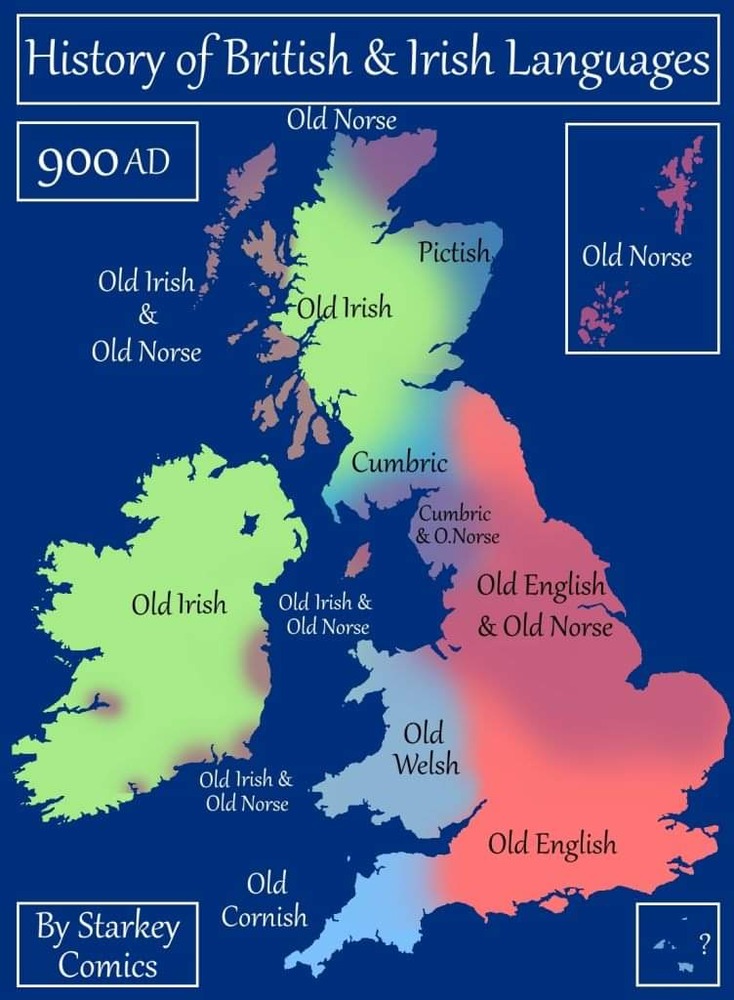




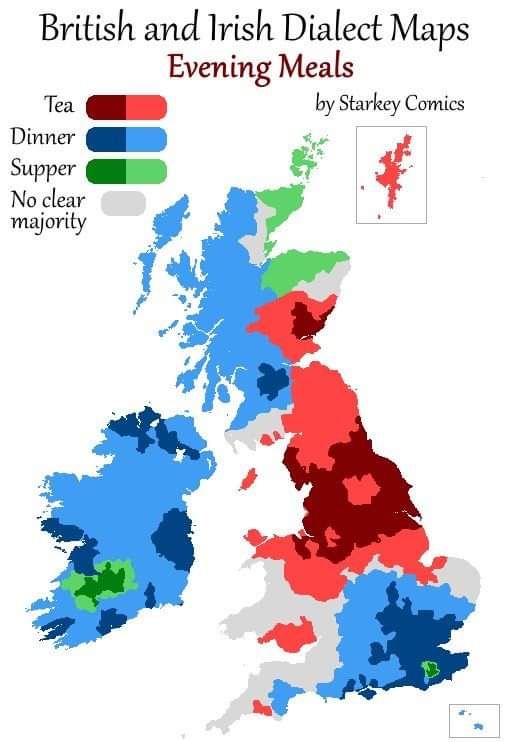
dv said:
We called it tiggy in school.
Peak Warming Man said:
dv said:They had schools back then?We called it tiggy in school.
dv said:
a roll is long and a bun is round. the pic is a bun.
JudgeMental said:
dv said:
a roll is long and a bun is round. the pic is a bun.
scone as alone. put not putt. Tag. Dinner. Born Essex. Yorkshire mum, London dad.
JudgeMental said:
dv said:
a roll is long and a bun is round. the pic is a bun.
:)
OCDC said:
Peak Warming Man said:dv said:They had schools back then?We called it tiggy in school.
zing

dv said:
Open to misinterpretation. For Grande Terre for example, by 16.664 square km they mean 16 thousand (and according to Wiki it’s actually 16,372).
Bubblecar said:
dv said:
Open to misinterpretation. For Grande Terre for example, by 16.664 square km they mean 16 thousand (and according to Wiki it’s actually 16,372).
It’s the French style

dv said:
Wonder why they didn’t include the ancient helmets, Romans, Greeks etc.
This fancy chainmail-hung helm of the Black Prince (14th century) would be included in the basinet line.

https://youtu.be/umG64_7pCLA?si=6hQ92zyG5YqPGPmb
Trams return to Parramatta after 30 years

dv said:
It is not under no pressure.
OCDC said:
dv said:It is not under no pressure.
Fair
dv said:
Brrrrrrr.

dv said:
as Ned(Dan) said; “Such is life”.




Long exposure photos of aeroplanes
dv said:

Long exposure photos of aeroplanes
Amazing!
Consider the wise gardener
who recognizes that the lifespan
of a favorite plant is coming to an end
and decides to save seeds or cuttings to
perpetuate the new generation in advance
Ogmog said:
Consider the wise gardener
who recognizes that the lifespan
of a favorite plant is coming to an end
and decides to save seeds or cuttings to
perpetuate the new generation in advance
Ogmog said:
Ogmog said:
Consider the wise gardener
who recognizes that the lifespan
of a favorite plant is coming to an end
and decides to save seeds or cuttings to
perpetuate the new generation in advance
I did hear Lukas discussing ‘turn off the news’. he said he did not mean that people should be unaware of what was happening in current affairs and withdraw from it entirely- It was just a prompt to take time to do something real.
sarahs mum said:
Ogmog said:
Ogmog said:
Consider the wise gardener
who recognizes that the lifespan
of a favorite plant is coming to an end
and decides to save seeds or cuttings to
perpetuate the new generation in advanceI did hear Lukas discussing ‘turn off the news’. he said he did not mean that people should be unaware of what was happening in current affairs and withdraw from it entirely- It was just a prompt to take time to do something real.
egg-zakly
with the Nelson you gotta learn to read between the lines
Ogmog said:
Ogmog said:
Consider the wise gardener
who recognizes that the lifespan
of a favorite plant is coming to an end
and decides to save seeds or cuttings to
perpetuate the new generation in advance
All very listenable. :)
sarahs mum said:
Ogmog said:
Ogmog said:
Consider the wise gardener
who recognizes that the lifespan
of a favorite plant is coming to an end
and decides to save seeds or cuttings to
perpetuate the new generation in advanceI did hear Lukas discussing ‘turn off the news’. he said he did not mean that people should be unaware of what was happening in current affairs and withdraw from it entirely- It was just a prompt to take time to do something real.
As so many Aussies do, get on with it anyway while still listening to the news.
kii said:
This is Señor Sanchez the Raccoon. He lives in a desk drawer, with Luna and a seashell.
Real characters, but I bet there is a downside living with them.
roughbarked said:
sarahs mum said:
Ogmog said:I did hear Lukas discussing ‘turn off the news’. he said he did not mean that people should be unaware of what was happening in current affairs and withdraw from it entirely- It was just a prompt to take time to do something real.
As so many Aussies do, get on with it anyway while still listening to the news.
Well,
Why deny the “Obvious Child” ?
Ogmog said:
roughbarked said:
sarahs mum said:I did hear Lukas discussing ‘turn off the news’. he said he did not mean that people should be unaware of what was happening in current affairs and withdraw from it entirely- It was just a prompt to take time to do something real.
As so many Aussies do, get on with it anyway while still listening to the news.
Well,
Why deny the “Obvious Child” ?

So, I had almost 3 hours sleep.
sarahs mum said:
So, I had almost 3 hours sleep.I had many hours of drug-induced stupor. It’s a shame I can’t send you some of my stupor.
OCDC said:
sarahs mum said:So, I had almost 3 hours sleep.I had many hours of drug-induced stupor. It’s a shame I can’t send you some of my stupor.
Oh. I wasn’t in chat.
I am resolved that I will sleep when I sleep. I don’t have anyone to have to be awake for at any time. Hours of drug induced stupor are there for people who are still trying to achieve a life.
sarahs mum said:
OCDC said:My drugs aren’t pacifically for sleep, but four of my regular meds are sedating as well as the antiemetic I needed.sarahs mum said:Oh. I wasn’t in chat.So, I had almost 3 hours sleep.I had many hours of drug-induced stupor. It’s a shame I can’t send you some of my stupor.
I am resolved that I will sleep when I sleep. I don’t have anyone to have to be awake for at any time. Hours of drug induced stupor are there for people who are still trying to achieve a life.
OCDC said:
sarahs mum said:OCDC said:My drugs aren’t pacifically for sleep, but four of my regular meds are sedating as well as the antiemetic I needed.I had many hours of drug-induced stupor. It’s a shame I can’t send you some of my stupor.Oh. I wasn’t in chat.
I am resolved that I will sleep when I sleep. I don’t have anyone to have to be awake for at any time. Hours of drug induced stupor are there for people who are still trying to achieve a life.
you must cost a lot at the chemist even with subsidising.
sarahs mum said:
OCDC said:Yes, but much much less now that my infusion is PBS listed. I am extremely grateful for our health care system.sarahs mum said:you must cost a lot at the chemist even with subsidising.Oh. I wasn’t in chat.My drugs aren’t pacifically for sleep, but four of my regular meds are sedating as well as the antiemetic I needed.I am resolved that I will sleep when I sleep. I don’t have anyone to have to be awake for at any time. Hours of drug induced stupor are there for people who are still trying to achieve a life.
OCDC said:
sarahs mum said:OCDC said:Yes, but much much less now that my infusion is PBS listed. I am extremely grateful for our health care system.My drugs aren’t pacifically for sleep, but four of my regular meds are sedating as well as the antiemetic I needed.you must cost a lot at the chemist even with subsidising.
me too. :)
Consider the collective stoopidity.

Um…Great Sandy Island?


kii said:
Consider the collective stoopidity.

Um…Great Sandy Island?
Quite a few variations on how it’s spelt
Cymek said:
kii said:
Consider the collective stoopidity.

Um…Great Sandy Island?
Quite a few variations on how it’s spelt
Niles “Ha Frasier Island renamed you lose brother”
kii said:
Consider the collective stoopidity.

Um…Great Sandy Island?
Gosh!
K’gari it is. I live nearby.
I wonder how they think about Gympie, when they are driving through it towards their beloved sand island. And what do these people think when they get their 4WD off at Wanggoolba Creek.
Michael V said:
kii said:
Consider the collective stoopidity.

Um…Great Sandy Island?
Gosh!
K’gari it is. I live nearby.
I wonder how they think about Gympie, when they are driving through it towards their beloved sand island. And what do these people think when they get their 4WD off at Wanggoolba Creek.
They pronanly all live in Parramatta. Which by the way was the first Aboriginal name change.
https://www.facebook.com/reel/429763359389466

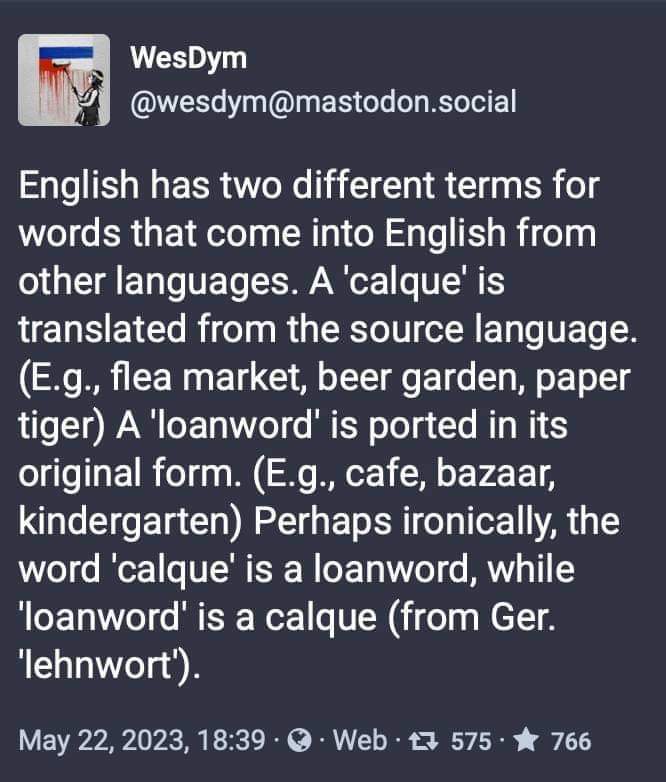

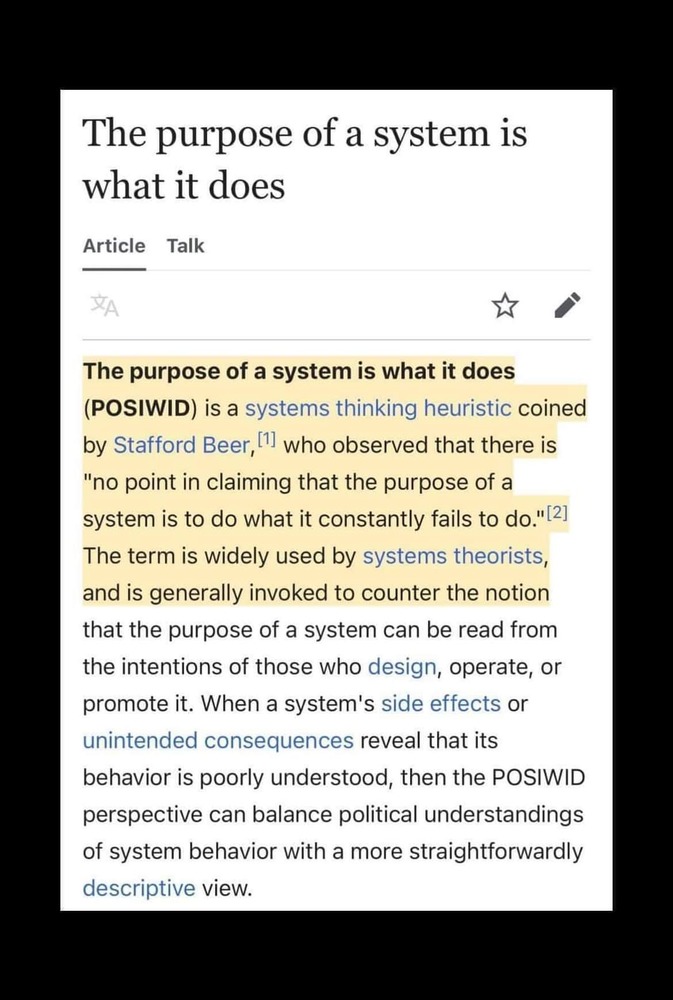

dv said:
So if I’m driving a car and hit the brakes, causing a skid, resulting in the car driving off a cliff, on the way down I can comfort myself with the thought that the purpose of car brakes is to cause skids that make cars drive off cliffs?
The Rev Dodgson said:
dv said:
So if I’m driving a car and hit the brakes, causing a skid, resulting in the car driving off a cliff, on the way down I can comfort myself with the thought that the purpose of car brakes is to cause skids that make cars drive off cliffs?
Technically, if you were taught to drive a car, deliberately skidding is a part of the more advanced driving courses that you don’t necessarilly need to undergo in order to get something called a driver’s license.
roughbarked said:
The Rev Dodgson said:
dv said:
So if I’m driving a car and hit the brakes, causing a skid, resulting in the car driving off a cliff, on the way down I can comfort myself with the thought that the purpose of car brakes is to cause skids that make cars drive off cliffs?
Technically, if you were taught to drive a car, deliberately skidding is a part of the more advanced driving courses that you don’t necessarilly need to undergo in order to get something called a driver’s license.
roughbarked said:
The Rev Dodgson said:
dv said:
So if I’m driving a car and hit the brakes, causing a skid, resulting in the car driving off a cliff, on the way down I can comfort myself with the thought that the purpose of car brakes is to cause skids that make cars drive off cliffs?
Technically, if you were taught to drive a car, deliberately skidding is a part of the more advanced driving courses that you don’t necessarilly need to undergo in order to get something called a driver’s license.
Let’s assume in this case that the skid was not intentional.
Tamb said:
roughbarked said:
The Rev Dodgson said:So if I’m driving a car and hit the brakes, causing a skid, resulting in the car driving off a cliff, on the way down I can comfort myself with the thought that the purpose of car brakes is to cause skids that make cars drive off cliffs?
Technically, if you were taught to drive a car, deliberately skidding is a part of the more advanced driving courses that you don’t necessarilly need to undergo in order to get something called a driver’s license.
ABS prevents skids.
But in this case they didn’t work, or they weren’t ABS brakes.
The Rev Dodgson said:
dv said:
So if I’m driving a car and hit the brakes, causing a skid, resulting in the car driving off a cliff, on the way down I can comfort myself with the thought that the purpose of car brakes is to cause skids that make cars drive off cliffs?
Your car must be fairly old. That purpose has largely been engineered out in most modern cars. Anti-lock Braking Systems (ABS) and all that.
Michael V said:
The Rev Dodgson said:
dv said:
So if I’m driving a car and hit the brakes, causing a skid, resulting in the car driving off a cliff, on the way down I can comfort myself with the thought that the purpose of car brakes is to cause skids that make cars drive off cliffs?
Your car must be fairly old. That purpose has largely been engineered out in most modern cars. Anti-lock Braking Systems (ABS) and all that.
Nods.
Michael V said:
The Rev Dodgson said:
dv said:
So if I’m driving a car and hit the brakes, causing a skid, resulting in the car driving off a cliff, on the way down I can comfort myself with the thought that the purpose of car brakes is to cause skids that make cars drive off cliffs?
Your car must be fairly old. That purpose has largely been engineered out in most modern cars. Anti-lock Braking Systems (ABS) and all that.
I think everyone is missing my point, so I’ll go away and do something useful.
The Rev Dodgson said:
roughbarked said:
The Rev Dodgson said:So if I’m driving a car and hit the brakes, causing a skid, resulting in the car driving off a cliff, on the way down I can comfort myself with the thought that the purpose of car brakes is to cause skids that make cars drive off cliffs?
Technically, if you were taught to drive a car, deliberately skidding is a part of the more advanced driving courses that you don’t necessarilly need to undergo in order to get something called a driver’s license.
Let’s assume in this case that the skid was not intentional.
That’s a single event though. POSIWID applies to the consistent behaviour of a system over time.
If it’s not doing what its proponents claim it’s doing, but they insist on applying it anyway, it’s often because what it really does is what they value.
The Rev Dodgson said:
Michael V said:
The Rev Dodgson said:So if I’m driving a car and hit the brakes, causing a skid, resulting in the car driving off a cliff, on the way down I can comfort myself with the thought that the purpose of car brakes is to cause skids that make cars drive off cliffs?
Your car must be fairly old. That purpose has largely been engineered out in most modern cars. Anti-lock Braking Systems (ABS) and all that.
I think everyone is missing my point, so I’ll go away and do something useful.
Maybe it was a deliberate ploy to get you up off your coit?
The Rev Dodgson said:
Michael V said:
The Rev Dodgson said:So if I’m driving a car and hit the brakes, causing a skid, resulting in the car driving off a cliff, on the way down I can comfort myself with the thought that the purpose of car brakes is to cause skids that make cars drive off cliffs?
Your car must be fairly old. That purpose has largely been engineered out in most modern cars. Anti-lock Braking Systems (ABS) and all that.
I think everyone is missing my point, so I’ll go away and do something useful.
No you make a fine point. I suppose we need a broad sense of system. Certainly if brake failure or skid related deaths were typical, then we might consider that the purpose was to kill people. But instead such behaviour is anomalous, with brakes usually working okay and people skidding to their deaths off cliffs rare.
dv said:
The Rev Dodgson said:
Michael V said:Your car must be fairly old. That purpose has largely been engineered out in most modern cars. Anti-lock Braking Systems (ABS) and all that.
I think everyone is missing my point, so I’ll go away and do something useful.
No you make a fine point. I suppose we need a broad sense of system. Certainly if brake failure or skid related deaths were typical, then we might consider that the purpose was to kill people. But instead such behaviour is anomalous, with brakes usually working okay and people skidding to their deaths off cliffs rare.
It is more about being aware of road conditions and how to use that to your advantage rather than premise your death..
dv said:
The Rev Dodgson said:
Michael V said:Your car must be fairly old. That purpose has largely been engineered out in most modern cars. Anti-lock Braking Systems (ABS) and all that.
I think everyone is missing my point, so I’ll go away and do something useful.
No you make a fine point. I suppose we need a broad sense of system. Certainly if brake failure or skid related deaths were typical, then we might consider that the purpose was to kill people. But instead such behaviour is anomalous, with brakes usually working okay and people skidding to their deaths off cliffs rare.
I don’t think the rev is one of the forum’s excellent drivers by the sounds.
Scotland’s Deserts are Turning Green – here’s why
https://www.youtube.com/watch?v=W5_yNzZ-1gk
sarahs mum said:
Scotland’s Deserts are Turning Green – here’s whyhttps://www.youtube.com/watch?v=W5_yNzZ-1gk
Very interesting, it goes to show how highly degraded landscapes can appear to be natural to later arrivals, so we don’t appreciate the slippery road we have been traveling. Unfortunately, it is not just Scotland that is in this predicament, but most areas where people have tried to exploit nature rather than living with it and it is the main reason I support Aboriginal use and management of country that environmentally is just so superior to non-indigenous exploitation.
PermeateFree said:
sarahs mum said:
Scotland’s Deserts are Turning Green – here’s whyhttps://www.youtube.com/watch?v=W5_yNzZ-1gk
Very interesting, it goes to show how highly degraded landscapes can appear to be natural to later arrivals, so we don’t appreciate the slippery road we have been traveling. Unfortunately, it is not just Scotland that is in this predicament, but most areas where people have tried to exploit nature rather than living with it and it is the main reason I support Aboriginal use and management of country that environmentally is just so superior to non-indigenous exploitation.
i remember on my first trip to scotland in 2004 how blown away i was at a rich mixed forest planting outside of glencoe. Came to read about people buying lordships and paying for a tree to be planted on their spot. I was remiss in thinking that forestry had planted a mixed forest.
sarahs mum said:
PermeateFree said:
sarahs mum said:
Scotland’s Deserts are Turning Green – here’s whyhttps://www.youtube.com/watch?v=W5_yNzZ-1gk
Very interesting, it goes to show how highly degraded landscapes can appear to be natural to later arrivals, so we don’t appreciate the slippery road we have been traveling. Unfortunately, it is not just Scotland that is in this predicament, but most areas where people have tried to exploit nature rather than living with it and it is the main reason I support Aboriginal use and management of country that environmentally is just so superior to non-indigenous exploitation.
i remember on my first trip to scotland in 2004 how blown away i was at a rich mixed forest planting outside of glencoe. Came to read about people buying lordships and paying for a tree to be planted on their spot. I was remiss in thinking that forestry had planted a mixed forest.
I must find out whether a tree has been planted in the lordship-spot I acquired.
A bit of fun – can I use the title? I don’t know. I’ll try it one day.
Why did I do it?
Streaker’s defence, if truth be told.
Streaker’s defence, if you haven’t heard of it, boils down to “Well, it seemed like a good idea at the time.”
AussieDJ said:
sarahs mum said:
PermeateFree said:Very interesting, it goes to show how highly degraded landscapes can appear to be natural to later arrivals, so we don’t appreciate the slippery road we have been traveling. Unfortunately, it is not just Scotland that is in this predicament, but most areas where people have tried to exploit nature rather than living with it and it is the main reason I support Aboriginal use and management of country that environmentally is just so superior to non-indigenous exploitation.
i remember on my first trip to scotland in 2004 how blown away i was at a rich mixed forest planting outside of glencoe. Came to read about people buying lordships and paying for a tree to be planted on their spot. I was remiss in thinking that forestry had planted a mixed forest.
I must find out whether a tree has been planted in the lordship-spot I acquired.
A bit of fun – can I use the title? I don’t know. I’ll try it one day.
Why did I do it?
Streaker’s defence, if truth be told.
Streaker’s defence, if you haven’t heard of it, boils down to “Well, it seemed like a good idea at the time.”
I bought a treeless one for my sister for Christmas one year.
AussieDJ said:
sarahs mum said:
PermeateFree said:Very interesting, it goes to show how highly degraded landscapes can appear to be natural to later arrivals, so we don’t appreciate the slippery road we have been traveling. Unfortunately, it is not just Scotland that is in this predicament, but most areas where people have tried to exploit nature rather than living with it and it is the main reason I support Aboriginal use and management of country that environmentally is just so superior to non-indigenous exploitation.
i remember on my first trip to scotland in 2004 how blown away i was at a rich mixed forest planting outside of glencoe. Came to read about people buying lordships and paying for a tree to be planted on their spot. I was remiss in thinking that forestry had planted a mixed forest.
I must find out whether a tree has been planted in the lordship-spot I acquired.
A bit of fun – can I use the title? I don’t know. I’ll try it one day.
Why did I do it?
Streaker’s defence, if truth be told.
Streaker’s defence, if you haven’t heard of it, boils down to “Well, it seemed like a good idea at the time.”
or when asked: Because you are you cutting it down, why did you plant such a big tree next to the building? “It was only a tiny wee thing when I planted it”.
roughbarked said:
AussieDJ said:
sarahs mum said:i remember on my first trip to scotland in 2004 how blown away i was at a rich mixed forest planting outside of glencoe. Came to read about people buying lordships and paying for a tree to be planted on their spot. I was remiss in thinking that forestry had planted a mixed forest.
I must find out whether a tree has been planted in the lordship-spot I acquired.
A bit of fun – can I use the title? I don’t know. I’ll try it one day.
Why did I do it?
Streaker’s defence, if truth be told.
Streaker’s defence, if you haven’t heard of it, boils down to “Well, it seemed like a good idea at the time.”
or when asked: Because you are you cutting it down, why did you plant such a big tree next to the building? “It was only a tiny wee thing when I planted it”.

Would you ever Consider Living in a Hobbit Hole?


The Side of Tasmania that No One Talks About.
https://www.youtube.com/watch?v=wt0yHEiOLP4
sarahs mum said:
The Side of Tasmania that No One Talks About.https://www.youtube.com/watch?v=wt0yHEiOLP4
Roadkills in Tassie are very high, but I wonder what the predation numbers are by cats, I would hope nowhere near the mainland, but from my experience it is rarely if ever mentioned. Do you know sm?
PermeateFree said:
sarahs mum said:
The Side of Tasmania that No One Talks About.https://www.youtube.com/watch?v=wt0yHEiOLP4
Roadkills in Tassie are very high, but I wonder what the predation numbers are by cats, I would hope nowhere near the mainland, but from my experience it is rarely if ever mentioned. Do you know sm?
I’ve only seen one feral cat up here. In 40 years. I suppose there could be many more. But I do have a healthy devil and quoll situation.
Over on Bruny they have been offering free cat sterilisation and have been trapping the ferals.
sarahs mum said:
PermeateFree said:
sarahs mum said:
The Side of Tasmania that No One Talks About.https://www.youtube.com/watch?v=wt0yHEiOLP4
Roadkills in Tassie are very high, but I wonder what the predation numbers are by cats, I would hope nowhere near the mainland, but from my experience it is rarely if ever mentioned. Do you know sm?
I’ve only seen one feral cat up here. In 40 years. I suppose there could be many more. But I do have a healthy devil and quoll situation.
Over on Bruny they have been offering free cat sterilisation and have been trapping the ferals.
Ah, nothing like a Tassie Devil to keep their numbers in check and I suppose the kittens would be easy prey for Quolls too. That’s very good sm, wish I had some here too, cats (and foxes) are a real threat to wildlife, and I react very quickly if one comes around. I recently got two large jet-black females, nothing was safe with them around. Think I may have a much smaller female going by the tracks, but I have not seen her yet. Some female cats are very cunning and will hide themselves completely and not look at you so you cannot see the reflection of their eyes.
PermeateFree said:
sarahs mum said:
PermeateFree said:Roadkills in Tassie are very high, but I wonder what the predation numbers are by cats, I would hope nowhere near the mainland, but from my experience it is rarely if ever mentioned. Do you know sm?
I’ve only seen one feral cat up here. In 40 years. I suppose there could be many more. But I do have a healthy devil and quoll situation.
Over on Bruny they have been offering free cat sterilisation and have been trapping the ferals.
Ah, nothing like a Tassie Devil to keep their numbers in check and I suppose the kittens would be easy prey for Quolls too. That’s very good sm, wish I had some here too, cats (and foxes) are a real threat to wildlife, and I react very quickly if one comes around. I recently got two large jet-black females, nothing was safe with them around. Think I may have a much smaller female going by the tracks, but I have not seen her yet. Some female cats are very cunning and will hide themselves completely and not look at you so you cannot see the reflection of their eyes.
although there is chockablock roadkill it does point to big populations out there waiting to die.
sarahs mum said:
PermeateFree said:
sarahs mum said:I’ve only seen one feral cat up here. In 40 years. I suppose there could be many more. But I do have a healthy devil and quoll situation.
Over on Bruny they have been offering free cat sterilisation and have been trapping the ferals.
Ah, nothing like a Tassie Devil to keep their numbers in check and I suppose the kittens would be easy prey for Quolls too. That’s very good sm, wish I had some here too, cats (and foxes) are a real threat to wildlife, and I react very quickly if one comes around. I recently got two large jet-black females, nothing was safe with them around. Think I may have a much smaller female going by the tracks, but I have not seen her yet. Some female cats are very cunning and will hide themselves completely and not look at you so you cannot see the reflection of their eyes.
although there is chockablock roadkill it does point to big populations out there waiting to die.
It must have been a wonderful experience to see all the wildlife prior to European settlement.
PermeateFree said:
sarahs mum said:
PermeateFree said:Ah, nothing like a Tassie Devil to keep their numbers in check and I suppose the kittens would be easy prey for Quolls too. That’s very good sm, wish I had some here too, cats (and foxes) are a real threat to wildlife, and I react very quickly if one comes around. I recently got two large jet-black females, nothing was safe with them around. Think I may have a much smaller female going by the tracks, but I have not seen her yet. Some female cats are very cunning and will hide themselves completely and not look at you so you cannot see the reflection of their eyes.
although there is chockablock roadkill it does point to big populations out there waiting to die.
It must have been a wonderful experience to see all the wildlife prior to European settlement.
there were possibly big populations of wobblies in the midlands and the north. Where the Europeans moved in onto native grasslands.
sarahs mum said:
PermeateFree said:
sarahs mum said:although there is chockablock roadkill it does point to big populations out there waiting to die.
It must have been a wonderful experience to see all the wildlife prior to European settlement.
there were possibly big populations of wobblies in the midlands and the north. Where the Europeans moved in onto native grasslands.
When I was there snaring them was reasonably popular. I came across a number when going through the bush on wallaby trails.
Was This Really a 1 in 700,000,000,000 Year Event?!
For decades, Antarctic sea ice trends seemed to defy climate change, until…they didn’t. In just two years, Antarctica lost as much sea ice as the Arctic lost in three decades. Statistics say that the record low sea ice in 2023 was a 1 in 700 BILLION year event, suggesting that the models in this case may be broken, or that this anomaly was caused by climate change. And a new study asked the question: does this represent a STATE CHANGE? And what would that mean for one of our most iconic species, the emperor penguin?
https://www.youtube.com/watch?v=eGkJSEOd1R4
sarahs mum said:
Was This Really a 1 in 700,000,000,000 Year Event?!For decades, Antarctic sea ice trends seemed to defy climate change, until…they didn’t. In just two years, Antarctica lost as much sea ice as the Arctic lost in three decades. Statistics say that the record low sea ice in 2023 was a 1 in 700 BILLION year event, suggesting that the models in this case may be broken, or that this anomaly was caused by climate change. And a new study asked the question: does this represent a STATE CHANGE? And what would that mean for one of our most iconic species, the emperor penguin?
https://www.youtube.com/watch?v=eGkJSEOd1R4
The important words are:
“ suggesting that the models in this case may be broken, or that this anomaly was caused by climate change”
except it should be and/or.
Expressing a probability based on past records and simplified assumed mechanisms as a “return period” is really very misleading.
The Rev Dodgson said:
sarahs mum said:
Was This Really a 1 in 700,000,000,000 Year Event?!For decades, Antarctic sea ice trends seemed to defy climate change, until…they didn’t. In just two years, Antarctica lost as much sea ice as the Arctic lost in three decades. Statistics say that the record low sea ice in 2023 was a 1 in 700 BILLION year event, suggesting that the models in this case may be broken, or that this anomaly was caused by climate change. And a new study asked the question: does this represent a STATE CHANGE? And what would that mean for one of our most iconic species, the emperor penguin?
https://www.youtube.com/watch?v=eGkJSEOd1R4
The important words are:
“ suggesting that the models in this case may be broken, or that this anomaly was caused by climate change”
except it should be and/or.
Expressing a probability based on past records and simplified assumed mechanisms as a “return period” is really very misleading.
As is the forum way, I haven’t read the link. But – I’m not sure you can compare Arctic and Antarctic. You kind of need to compare Antarctic sea ice loss with Antarctic sea ice loss really. They are rather different creatures.


Citizen Scientists of Tasmania
Moss Glen · 1 h ·
Hello friends!
I’ve just recently come across this NOAA (US National Oceanic and Atmospheric Administration) data regarding the marine heatwave
I haven’t heard a lot of local news about it lately besides the Handfish relocation
wondering what people have been seeing out there, particularly in the South East and East coast
sarahs mum said:

Citizen Scientists of Tasmania
Moss Glen · 1 h ·
Hello friends!
I’ve just recently come across this NOAA (US National Oceanic and Atmospheric Administration) data regarding the marine heatwave
I haven’t heard a lot of local news about it lately besides the Handfish relocation
wondering what people have been seeing out there, particularly in the South East and East coast
Moss Glen
Author
Top contributor
should note: 20 deg C-week is a cumulative measure of heat stress over a 12 week period referred to as degree heating weeks (dhw)
It’s designed around coral physiology, so 12 weeks of +1C above a threshold would be 12 dhw, or one week of +20C would be 20 dhw ~ the distribution isn’t available here, but suffice to say there’s a fair bit of accumulated heat above normal over the last 12 weeks, and that as 20C is the top of the scale, no doubt parts of that large purple zone are higher then 20 DHW
The alert levels are more succinct, referring to alerts for coral bleaching and general ocean heat stress
Although these products are designed around coral bleaching, I don’t doubt such sustained ocean heat anomalies are awful for the cold water species of the Great Southern Reef as well
Zoe Cozens
The intertidal seagrass beds in Northwest Bay at Coningham Beach have virtually disappeared this summer and what remains is smothered in algae and in poor health. Fish diversity and seahorse breeding also has been impacted. Unlike other years I’ve recorded only 1 seahorse this summer, when normally I’d see half a dozen at my local beach.
Both the decline of seagrass and fish diversity in the bay are longer term issues, but this summer the Bay looks the worst I’ve seen it.
Lynne Maher
Top contributor
Have a look at what is being logged on Redmap. I’ve seen at least 4 species south of their normal range over the last couple of weeks.
sarahs mum said:
sarahs mum said:

Citizen Scientists of Tasmania
Moss Glen · 1 h ·
Hello friends!
I’ve just recently come across this NOAA (US National Oceanic and Atmospheric Administration) data regarding the marine heatwave
I haven’t heard a lot of local news about it lately besides the Handfish relocation
wondering what people have been seeing out there, particularly in the South East and East coast
Moss Glen
Author
Top contributor
should note: 20 deg C-week is a cumulative measure of heat stress over a 12 week period referred to as degree heating weeks (dhw)
It’s designed around coral physiology, so 12 weeks of +1C above a threshold would be 12 dhw, or one week of +20C would be 20 dhw ~ the distribution isn’t available here, but suffice to say there’s a fair bit of accumulated heat above normal over the last 12 weeks, and that as 20C is the top of the scale, no doubt parts of that large purple zone are higher then 20 DHW
The alert levels are more succinct, referring to alerts for coral bleaching and general ocean heat stress
Although these products are designed around coral bleaching, I don’t doubt such sustained ocean heat anomalies are awful for the cold water species of the Great Southern Reef as wellZoe Cozens
The intertidal seagrass beds in Northwest Bay at Coningham Beach have virtually disappeared this summer and what remains is smothered in algae and in poor health. Fish diversity and seahorse breeding also has been impacted. Unlike other years I’ve recorded only 1 seahorse this summer, when normally I’d see half a dozen at my local beach.
Both the decline of seagrass and fish diversity in the bay are longer term issues, but this summer the Bay looks the worst I’ve seen it.Lynne Maher
Top contributor
Have a look at what is being logged on Redmap. I’ve seen at least 4 species south of their normal range over the last couple of weeks.
Well there’s not much we can do. At least I no longer buy Tasmanian farmed salmon.
Bubblecar said:
sarahs mum said:
sarahs mum said:

Citizen Scientists of Tasmania
Moss Glen · 1 h ·
Hello friends!
I’ve just recently come across this NOAA (US National Oceanic and Atmospheric Administration) data regarding the marine heatwave
I haven’t heard a lot of local news about it lately besides the Handfish relocation
wondering what people have been seeing out there, particularly in the South East and East coast
Moss Glen
Author
Top contributor
should note: 20 deg C-week is a cumulative measure of heat stress over a 12 week period referred to as degree heating weeks (dhw)
It’s designed around coral physiology, so 12 weeks of +1C above a threshold would be 12 dhw, or one week of +20C would be 20 dhw ~ the distribution isn’t available here, but suffice to say there’s a fair bit of accumulated heat above normal over the last 12 weeks, and that as 20C is the top of the scale, no doubt parts of that large purple zone are higher then 20 DHW
The alert levels are more succinct, referring to alerts for coral bleaching and general ocean heat stress
Although these products are designed around coral bleaching, I don’t doubt such sustained ocean heat anomalies are awful for the cold water species of the Great Southern Reef as wellZoe Cozens
The intertidal seagrass beds in Northwest Bay at Coningham Beach have virtually disappeared this summer and what remains is smothered in algae and in poor health. Fish diversity and seahorse breeding also has been impacted. Unlike other years I’ve recorded only 1 seahorse this summer, when normally I’d see half a dozen at my local beach.
Both the decline of seagrass and fish diversity in the bay are longer term issues, but this summer the Bay looks the worst I’ve seen it.Lynne Maher
Top contributor
Have a look at what is being logged on Redmap. I’ve seen at least 4 species south of their normal range over the last couple of weeks.
Well there’s not much we can do. At least I no longer buy Tasmanian farmed salmon.
there’s probably snapper out there. In other hot water events they have been caught down the east coast as far as south bruny.
sarahs mum said:
Was This Really a 1 in 700,000,000,000 Year Event?!For decades, Antarctic sea ice trends seemed to defy climate change, until…they didn’t. In just two years, Antarctica lost as much sea ice as the Arctic lost in three decades. Statistics say that the record low sea ice in 2023 was a 1 in 700 BILLION year event, suggesting that the models in this case may be broken, or that this anomaly was caused by climate change. And a new study asked the question: does this represent a STATE CHANGE? And what would that mean for one of our most iconic species, the emperor penguin?
https://www.youtube.com/watch?v=eGkJSEOd1R4
700 Billion years? Just now old is the solar system?
Kingy said:
sarahs mum said:
Was This Really a 1 in 700,000,000,000 Year Event?!For decades, Antarctic sea ice trends seemed to defy climate change, until…they didn’t. In just two years, Antarctica lost as much sea ice as the Arctic lost in three decades. Statistics say that the record low sea ice in 2023 was a 1 in 700 BILLION year event, suggesting that the models in this case may be broken, or that this anomaly was caused by climate change. And a new study asked the question: does this represent a STATE CHANGE? And what would that mean for one of our most iconic species, the emperor penguin?
https://www.youtube.com/watch?v=eGkJSEOd1R4
700 Billion years? Just now old is the solar system?
It’s a meteorologic statistical statement, like say “a 1 in 100 year event”. This shorthand is better expressed as “a 1 in 100 chance of this event occurring in any one year”.
So, the shorthand “1 in 700,000,000,000 Year Event” is really a “1 in 700,000,000,000 chance of this event occurring in any one year”.

dv said:
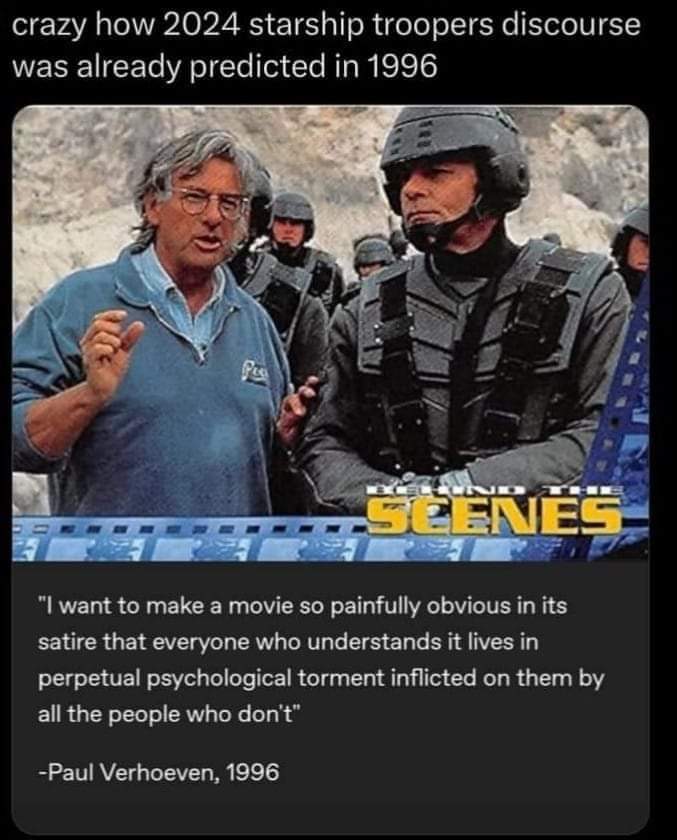
https://www.instagram.com/reel/C1wfYf6sZlm/?igsh=bXRzczB5aHo0aWo0
Kansas tornado footage
It’s like a mini hurricane!
OCDC said:
It’s like a mini hurricane!
Classic
dv said:
https://www.instagram.com/reel/C1wfYf6sZlm/?igsh=bXRzczB5aHo0aWo0Kansas tornado footage
That is truely incredible footage
dv said:
https://www.instagram.com/reel/C1wfYf6sZlm/?igsh=bXRzczB5aHo0aWo0Kansas tornado footage
Those things are terrifying, so destructive and unpredictable except it is coming your way.
PermeateFree said:
dv said:
https://www.instagram.com/reel/C1wfYf6sZlm/?igsh=bXRzczB5aHo0aWo0Kansas tornado footage
Those things are terrifying, so destructive and unpredictable except it is coming your way.
and if it is, you’ll want to be finding a wombat’s burrow at the very least.
diddly-squat said:
dv said:
https://www.instagram.com/reel/C1wfYf6sZlm/?igsh=bXRzczB5aHo0aWo0Kansas tornado footage
That is truely incredible footage
Seconded.
Michael V said:
diddly-squat said:
dv said:
https://www.instagram.com/reel/C1wfYf6sZlm/?igsh=bXRzczB5aHo0aWo0Kansas tornado footage
That is truely incredible footage
Seconded.
EEEEK!! 😮

dv said:
She hasn’t met some of the people I have then
A woman’s fury holds lifetimes of wisdom.
Why I appear angry to so many forum members.
kii said:
A woman’s fury holds lifetimes of wisdom.Why I appear angry to so many forum members.
yeah.
also sad.

dv said:
Look, don’t touch.
Look, don’t say anything.
Look don’t look.

dv said:
LOLOL
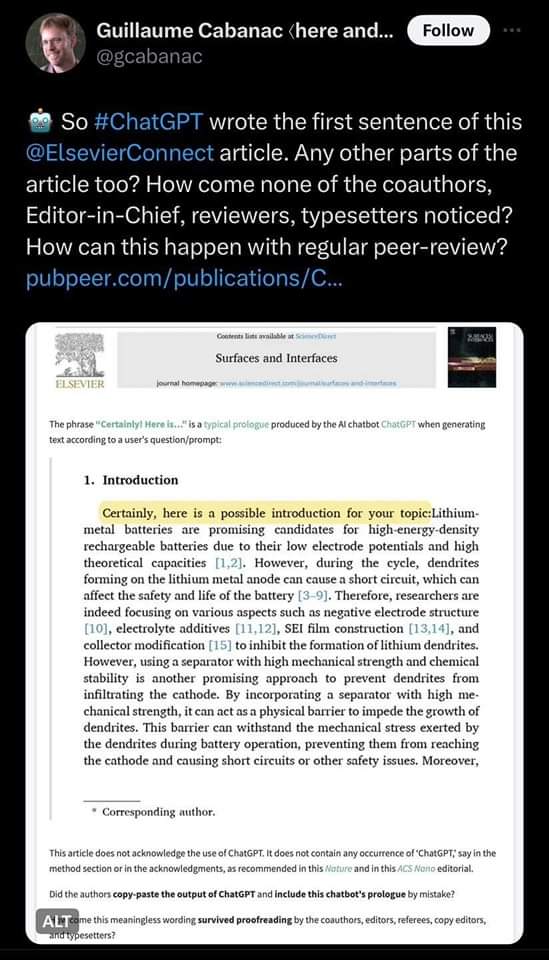
dv said:
Hey Zeus!
dv said:
and the moral of this story is…?
Great.
ChrispenEvan said:
dv said:
and the moral of this story is…?
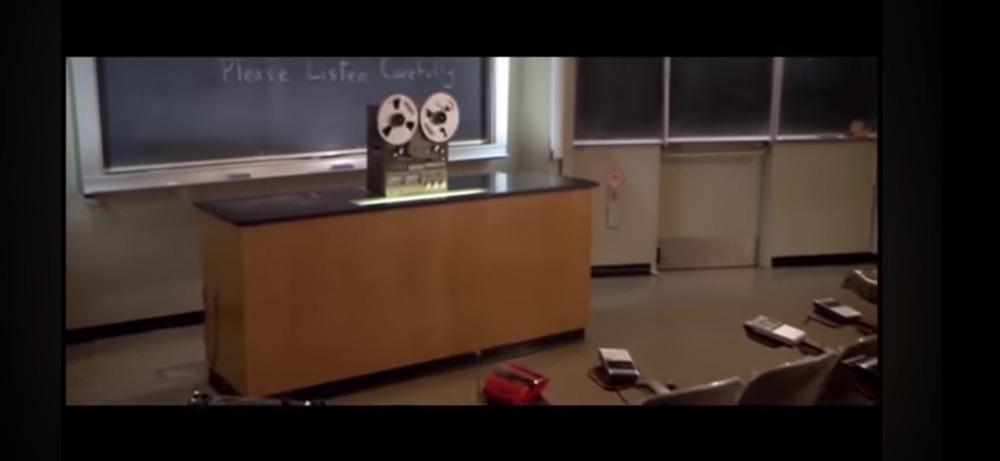
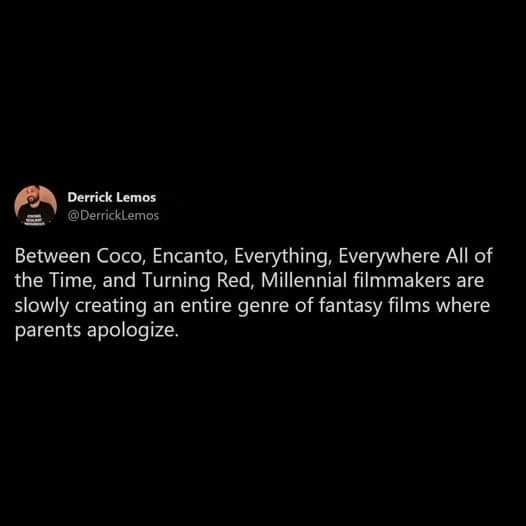
dv said:
sorry.
sarahs mum said:
dv said:
sorry.
I forgive
https://www.instagram.com/reel/C3Mh-y2uiAO/?igsh=MXIxdGprN2l0YmxuNg==
Consider this speedy look at a ship’s journey through the Panama Canal
dv said:
https://www.instagram.com/reel/C3Mh-y2uiAO/?igsh=MXIxdGprN2l0YmxuNg==Consider this speedy look at a ship’s journey through the Panama Canal
Good.
▶️ Watch this video
https://www.facebook.com/share/r/buX8EJia6s4rJYf3/?mibextid=D5vuiz
Jason Pargin discusses luck and selection bias in the entertainment business
This Compost
Share on Facebook
Share on Twitter
Share on Tumblr
View print mode
Copy embed code
Add this poem to an anthology
Walt Whitman
1819 –
1892
1
Something startles me where I thought I was safest,
I withdraw from the still woods I loved,
I will not go now on the pastures to walk,
I will not strip the clothes from my body to meet my lover the sea,
I will not touch my flesh to the earth as to other flesh to renew me.
O how can it be that the ground itself does not sicken?
How can you be alive you growths of spring?
How can you furnish health you blood of herbs, roots, orchards, grain?
Are they not continually putting distemper’d corpses within you?
Is not every continent work’d over and over with sour dead?
Where have you disposed of their carcasses?
Those drunkards and gluttons of so many generations?
Where have you drawn off all the foul liquid and meat?
I do not see any of it upon you to-day, or perhaps I am deceiv’d,
I will run a furrow with my plough, I will press my spade through the sod and turn it up underneath,
I am sure I shall expose some of the foul meat.
2
Behold this compost! behold it well!
Perhaps every mite has once form’d part of a sick person—yet behold!
The grass of spring covers the prairies,
The bean bursts noiselessly through the mould in the garden,
The delicate spear of the onion pierces upward,
The apple-buds cluster together on the apple-branches,
The resurrection of the wheat appears with pale visage out of its graves,
The tinge awakes over the willow-tree and the mulberry-tree,
The he-birds carol mornings and evenings while the she-birds sit on their nests,
The young of poultry break through the hatch’d eggs,
The new-born of animals appear, the calf is dropt from the cow, the colt from the mare,
Out of its little hill faithfully rise the potato’s dark green leaves,
Out of its hill rises the yellow maize-stalk, the lilacs bloom in the dooryards,
The summer growth is innocent and disdainful above all those strata of sour dead.
What chemistry!
That the winds are really not infectious,
That this is no cheat, this transparent green-wash of the sea which is so amorous after me,
That it is safe to allow it to lick my naked body all over with its tongues,
That it will not endanger me with the fevers that have deposited themselves in it,
That all is clean forever and forever,
That the cool drink from the well tastes so good,
That blackberries are so flavorous and juicy,
That the fruits of the apple-orchard and the orange-orchard, that melons, grapes, peaches, plums, will
none of them poison me,
That when I recline on the grass I do not catch any disease,
Though probably every spear of grass rises out of what was once a catching disease.
Now I am terrified at the Earth, it is that calm and patient,
It grows such sweet things out of such corruptions,
It turns harmless and stainless on its axis, with such endless successions of diseas’d corpses,
It distills such exquisite winds out of such infused fetor,
It renews with such unwitting looks its prodigal, annual, sumptuous crops,
It gives such divine materials to men, and accepts such leavings from them at last.
This poem appeared in Poem-A-Day on April 13, 2013. Browse the Poem-A-Day archive. This poem is in the public domain.

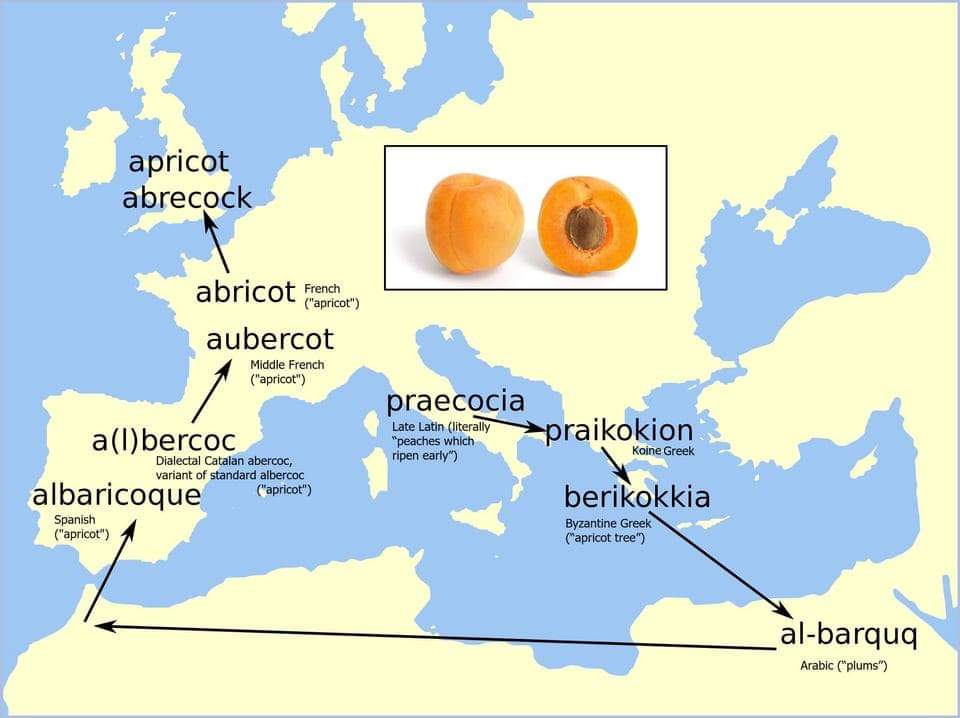
Consider the etymological journey of the word ‘apricot’.
You can’t make me.
dv said:

Consider the etymological journey of the word ‘apricot’.
Huh.
Education these days, I don’t know.
Teacher tries to engage kids with some interesting facts, and the response? “You can’t make me” and “Huh.”
dv said:

Consider the etymological journey of the word ‘apricot’.
Your hat strategically dipped below one eye
Your scarf it was praecocia
nup.


dv said:
I find many videos on a topic I might be interested in, going by the headline, go through a lot of introductory stuff that I already know. I keep skipping a few minutes at a time hoping I get to the relevant bit.
party_pants said:
dv said:
I find many videos on a topic I might be interested in, going by the headline, go through a lot of introductory stuff that I already know. I keep skipping a few minutes at a time hoping I get to the relevant bit.
Well we’ve tried to help yous many times by ripping the transcripts where available so yeah someone else can deal with it while we’re away from the rippers.

dv said:
I’d go along with that.
dv said:
I am in agreement with this sentiment. I haven’t got enough time to sit through videos. I can efficiently skip read something to see if I need to read it more thoroughly. I have noticed more linking to video on the forum lately too, which I skip. So I probably miss stuff.
buffy said:
dv said:Concur. I am a hella fast reader and vids take too long. Some I view but the majority I skip.I am in agreement with this sentiment. I haven’t got enough time to sit through videos. I can efficiently skip read something to see if I need to read it more thoroughly. I have noticed more linking to video on the forum lately too, which I skip. So I probably miss stuff.
dv said:
Agreed.
Although perhaps not to the extent of loss of mind.
The Rev Dodgson said:
dv said:Mine was lost some time ago.Agreed.
Although perhaps not to the extent of loss of mind.
OCDC said:
buffy said:dv said:Concur. I am a hella fast reader and vids take too long. Some I view but the majority I skip.I am in agreement with this sentiment. I haven’t got enough time to sit through videos. I can efficiently skip read something to see if I need to read it more thoroughly. I have noticed more linking to video on the forum lately too, which I skip. So I probably miss stuff.
+1
Bubblecar said:
OCDC said:
buffy said:I am in agreement with this sentiment. I haven’t got enough time to sit through videos. I can efficiently skip read something to see if I need to read it more thoroughly. I have noticed more linking to video on the forum lately too, which I skip. So I probably miss stuff.Concur. I am a hella fast reader and vids take too long. Some I view but the majority I skip.
+1
I agree.
The Rev Dodgson said:
dv said:
Agreed.
Although perhaps not to the extent of loss of mind.
+1

A spruce tree root with ectomycorrhizal fungi.
26 March 2024
The ‘Mother Tree’ idea is everywhere — but how much of it is real?
A popular theory about how trees cooperate has enchanted the public and raised the profile of forest conservation. But some ecologists think its scientific basis has been oversold.
https://www.nature.com/articles/d41586-024-00893-0
The Port of Kansas City is an inland port on the Missouri River in Kansas City, Missouri at river mile 367.1, near the confluence with the Kansas River. Kansas City, the second-largest rail hub and third-largest trucking hub in the country, is on marine highway M-70, which extends as far as Pittsburgh and intersects M-55 at St. Louis, allowing shipping to New Orleans, Chicago, Minneapolis and connections to major cities all over the eastern United States. The Missouri inland waterway allows for barge traffic as far upriver as Sioux City, Iowa; however, most of the commercial traffic on the Missouri is concentrated between Kansas City and St. Louis.
The intermodal facility has approximately 160,000 square feet (15,000 m2) of storage space, a loading system consisting of three 25-ton cranes, one 100-ton crane, eight front-end loaders, portable conveyor systems, and a truck scale. Products shipped through the terminal include fertilizer, grain, corn, meal, bark, rock clinker, salt, rolled and coiled steel, H-beams, plate steel, rebar and petroleum coke. The terminal is served by the Union Pacific Railroad, with extensive rail track at the facility for loading and unloading containers.

dv said:
Stylish. Seems we missed the Art Nouveau revival though, shame about that.
Gosford has a lovely Art Deco building that is about to have a multistory monster plonked right behind it. I must take a picture of it before it happens.
Can’t wait¡



SCIENCE said:
Ian said:
ruby said:
dv said:
Stylish. Seems we missed the Art Nouveau revival though, shame about that.
Gosford has a lovely Art Deco building that is about to have a multistory monster plonked right behind it. I must take a picture of it before it happens.
Can’t wait¡
for ¡ 2039
https://youtu.be/jIAEqsSOtwM?si=VU2ZFV8LEZIPJveL
Dr Geoff Lindsey
1962: the year that killed Received Pronunciation

https://www.youtube.com/watch?v=ECKsqW3wOTk
—
yay.
this strange observation:
People who discuss the problem of declining populations, and too few people of working age to do the work, never discuss the problem of AI taking all the jobs, and too few jobs for the people of working age to do.
And vice-versa.
Is this not strange?
The Rev Dodgson said:
this strange observation:People who discuss the problem of declining populations, and too few people of working age to do the work, never discuss the problem of AI taking all the jobs, and too few jobs for the people of working age to do.
And vice-versa.
Is this not strange?
never?
The Rev Dodgson said:
this strange observation:People who discuss the problem of declining populations, and too few people of working age to do the work, never discuss the problem of AI taking all the jobs, and too few jobs for the people of working age to do.
And vice-versa.
Is this not strange?
people are strange, when you’re a stranger
The Rev Dodgson said:
this strange observation:People who discuss the problem of declining populations, and too few people of working age to do the work, never discuss the problem of AI taking all the jobs, and too few jobs for the people of working age to do.
And vice-versa.
Is this not strange?
Automation has been promised since the 1980s.
it is so hard to guess if the latest generation of AI is going to be the one that finally sees the takeover of themachine.
So far for the last 40 years the move has been towards replacing labour-intensive industries in advanced countries with the similar labour-intensive production in low wage countries. It seems to be a cheaper option than going the captial cost of investing in the latest computer technology.
JudgeMental said:
The Rev Dodgson said:
this strange observation:People who discuss the problem of declining populations, and too few people of working age to do the work, never discuss the problem of AI taking all the jobs, and too few jobs for the people of working age to do.
And vice-versa.
Is this not strange?
never?
OK, I have to confess I have not read every article on these topics ever written.
How about rarely?
apologies for trying to answer the question
maybe I haven’t made enough trips to the fridge yet for a Friday night…
party_pants said:
apologies for trying to answer the questionmaybe I haven’t made enough trips to the fridge yet for a Friday night…
I’m high on codeine. there will be no serious coming from this window tonight
Arts said:
party_pants said:
apologies for trying to answer the questionmaybe I haven’t made enough trips to the fridge yet for a Friday night…
I’m high on codeine. there will be no serious coming from this window tonight
oh, are you in pain?
Arts said:
party_pants said:
apologies for trying to answer the questionmaybe I haven’t made enough trips to the fridge yet for a Friday night…
I’m high on codeine. there will be no serious coming from this window tonight
Glad you survived, and hoping for a rapid recovery!
party_pants said:
Arts said:
party_pants said:
apologies for trying to answer the questionmaybe I haven’t made enough trips to the fridge yet for a Friday night…
I’m high on codeine. there will be no serious coming from this window tonight
oh, are you in pain?
not at the moment :)
Arts said:
party_pants said:
Arts said:I’m high on codeine. there will be no serious coming from this window tonight
oh, are you in pain?
not at the moment :)
Goodo.

Perth tram network 1939
dv said:

Perth tram network 1939
No freeway and no Narrows Bridge.
party_pants said:
dv said:

Perth tram network 1939
No freeway and no Narrows Bridge.
20 years until the narrows bridge.
party_pants said:
dv said:

Perth tram network 1939
No freeway and no Narrows Bridge.
My great grandfathers brother had two sons who used to race horses together, but didn’t get on very well. Once they were old enough to get jobs, they saved up and bought a block of land each way out of Perth in the swamp and both built a racecourse.
One is Belmont Park, and the other was just east of the Crown casino.

dv said:
dv said:
AI is no match for my NS.

dv said:
AI is no match for my NS.
:)
https://youtu.be/6j18ZdlBSBs?si=XCTF_4AKXjc9vgCi
Conversational English in 1586
Jacques Bellot’s book called Familiar Dialogues
dv said:
https://youtu.be/6j18ZdlBSBs?si=XCTF_4AKXjc9vgCiConversational English in 1586
Jacques Bellot’s book called Familiar Dialogues
i don’t think I have any problems with that. I’d fit in quickly.
sarahs mum said:
dv said:
https://youtu.be/6j18ZdlBSBs?si=XCTF_4AKXjc9vgCiConversational English in 1586
Jacques Bellot’s book called Familiar Dialogues
i don’t think I have any problems with that. I’d fit in quickly.
T’would no’ take a day or twain of careful use of the ears.
dv said:
https://youtu.be/6j18ZdlBSBs?si=XCTF_4AKXjc9vgCiConversational English in 1586
Jacques Bellot’s book called Familiar Dialogues
Very interesting.
The Rev Dodgson said:
Ogmog said:OK, but not keen on the presentation.
He’s not doing my brain much help.
The Rev Dodgson said:
Ogmog said:OK, but not keen on the presentation.
Sort of thing that is better done in a written article than a video but then I say that about a lot on youtube*
*and it’s not because I am old!
Witty Rejoinder said:
The Rev Dodgson said:
Ogmog said:OK, but not keen on the presentation.
Sort of thing that is better done in a written article than a video but then I say that about a lot on youtube*
*and it’s not because I am old!
Same here, young chap.
So What ¿ Are They
The Rev Dodgson said:
Ogmog said:OK, but not keen on the presentation.
No. That contributed to me making mistakes..
As well as his dodgy looking microphone and consideration of Linda being AI generated :)
Witty Rejoinder said:
The Rev Dodgson said:
Ogmog said:OK, but not keen on the presentation.
Sort of thing that is better done in a written article than a video but then I say that about a lot on youtube*
*and it’s not because I am old!
It’s because, as Alex and I said recently, you can skim read an article much, much faster. Videos just waste time. And life is too short.
buffy said:
Witty Rejoinder said:
The Rev Dodgson said:OK, but not keen on the presentation.
Sort of thing that is better done in a written article than a video but then I say that about a lot on youtube*
*and it’s not because I am old!
It’s because, as Alex and I said recently, you can skim read an article much, much faster. Videos just waste time. And life is too short.
Different learning styles.
I fast forward through videos. Sometimes the video will show where previous viewers have watched the important bits.
Not a waste of time for me. Plus what else do I have to do while I procrastinate about life?
buffy said:
Witty Rejoinder said:
The Rev Dodgson said:OK, but not keen on the presentation.
Sort of thing that is better done in a written article than a video but then I say that about a lot on youtube*
*and it’s not because I am old!
It’s because, as Alex and I said recently, you can skim read an article much, much faster. Videos just waste time. And life is too short.
I watch almost everything on double speed.
Arts said:
buffy said:
Witty Rejoinder said:Sort of thing that is better done in a written article than a video but then I say that about a lot on youtube*
*and it’s not because I am old!
It’s because, as Alex and I said recently, you can skim read an article much, much faster. Videos just waste time. And life is too short.
I watch almost everything on double speed.
I don’t have a television.
The English language mnemonic for screwdriver direction (“Righty tighty lefty loosey”) has a Spanish equivalent: “La derecha oprime y la izquierda libera.” Literally, the right oppresses and the left liberates.
dv said:
The English language mnemonic for screwdriver direction (“Righty tighty lefty loosey”) has a Spanish equivalent: “La derecha oprime y la izquierda libera.” Literally, the right oppresses and the left liberates.
But You Get Screwed By Both
dv said:
The English language mnemonic for screwdriver direction (“Righty tighty lefty loosey”) has a Spanish equivalent: “La derecha oprime y la izquierda libera.” Literally, the right oppresses and the left liberates.
I’ve not heard of either of these before, but I do like the translation of the Spanish mnemonic.
dv said:
The English language mnemonic for screwdriver direction (“Righty tighty lefty loosey”) has a Spanish equivalent: “La derecha oprime y la izquierda libera.” Literally, the right oppresses and the left liberates.
Blimey not even the humble screwdriver is safe from the left wing nuttets trying g to twist things to suit their twisted purpose.
Michael V said:
dv said:
The English language mnemonic for screwdriver direction (“Righty tighty lefty loosey”) has a Spanish equivalent: “La derecha oprime y la izquierda libera.” Literally, the right oppresses and the left liberates.
I’ve not heard of either of these before, but I do like the translation of the Spanish mnemonic.
Mind you, because it’s a twisting motion, it really should be clockwise and anticlockwise.
Michael V said:
Michael V said:
dv said:
The English language mnemonic for screwdriver direction (“Righty tighty lefty loosey”) has a Spanish equivalent: “La derecha oprime y la izquierda libera.” Literally, the right oppresses and the left liberates.
I’ve not heard of either of these before, but I do like the translation of the Spanish mnemonic.
Mind you, because it’s a twisting motion, it really should be clockwise and anticlockwise.
how about deosil and widdershins?
Bogsnorkler said:
Michael V said:
Michael V said:I’ve not heard of either of these before, but I do like the translation of the Spanish mnemonic.
Mind you, because it’s a twisting motion, it really should be clockwise and anticlockwise.
how about deosil and widdershins?
Bogsnorkler said:
Michael V said:
Michael V said:I’ve not heard of either of these before, but I do like the translation of the Spanish mnemonic.
Mind you, because it’s a twisting motion, it really should be clockwise and anticlockwise.
how about deosil and widdershins?
Nah.
Michael V said:
Michael V said:
dv said:
The English language mnemonic for screwdriver direction (“Righty tighty lefty loosey”) has a Spanish equivalent: “La derecha oprime y la izquierda libera.” Literally, the right oppresses and the left liberates.
I’ve not heard of either of these before, but I do like the translation of the Spanish mnemonic.
Mind you, because it’s a twisting motion, it really should be clockwise and anticlockwise.
And even then, you need to give a pole direction. Clockwise as viewed in the direction towards the blade.

Ian said:
The Rev Dodgson said:
Ogmog said:OK, but not keen on the presentation.
No. That contributed to me making mistakes..
As well as his dodgy looking microphone and consideration of Linda being AI generated :)
Considers AI Linda.
Hmm.
dv said:
Michael V said:
Michael V said:I’ve not heard of either of these before, but I do like the translation of the Spanish mnemonic.
Mind you, because it’s a twisting motion, it really should be clockwise and anticlockwise.
And even then, you need to give a pole direction. Clockwise as viewed in the direction towards the blade.
Fair call.
Like the t-shirt.
:)
Michael V said:
dv said:
Michael V said:Mind you, because it’s a twisting motion, it really should be clockwise and anticlockwise.
And even then, you need to give a pole direction. Clockwise as viewed in the direction towards the blade.
Fair call.
Like the t-shirt.
:)
I think it’s rather sinister.
dv said:
Michael V said:
Michael V said:I’ve not heard of either of these before, but I do like the translation of the Spanish mnemonic.
Mind you, because it’s a twisting motion, it really should be clockwise and anticlockwise.
And even then, you need to give a pole direction. Clockwise as viewed in the direction towards the blade.
Why dont they show the equation instead?
Bogsnorkler said:
Michael V said:
dv said:And even then, you need to give a pole direction. Clockwise as viewed in the direction towards the blade.
Fair call.
Like the t-shirt.
:)
I think it’s rather sinister.
Can’t be – it’s the right hand.
Michael V said:
Bogsnorkler said:
Michael V said:Fair call.
Like the t-shirt.
:)
I think it’s rather sinister.
Can’t be – it’s the right hand.
in this universe.
Bogsnorkler said:
Michael V said:
Bogsnorkler said:I think it’s rather sinister.
Can’t be – it’s the right hand.
in this universe.
Right…
Tau.Neutrino said:
dv said:
Michael V said:Mind you, because it’s a twisting motion, it really should be clockwise and anticlockwise.
And even then, you need to give a pole direction. Clockwise as viewed in the direction towards the blade.
Why dont they show the equation instead?
because then it wouldn’t be a gansta sign.
Imagine all these secret signs going on.
And you have no idea what they mean .
You look at every ones movements to see if it’s a sign.
Sings…
Sign, sign
Everywhere a sign
Blockin’ out the scenery
Breakin’ my mind
Do this, don’t do that
Can’t you read the sign?
dv said:
The English language mnemonic for screwdriver direction (“Righty tighty lefty loosey”) has a Spanish equivalent: “La derecha oprime y la izquierda libera.” Literally, the right oppresses and the left liberates.
So what about the right hand threads?

Ogmog said:
Consider the fact that I screwed up the link… DUH
what I was going for was ( the ‘MISSING LiNK’ <-; )
18 MORE Things Our Brain Can’t Handle
https://www.youtube.com/watch?v=mZRzjypCoQQ
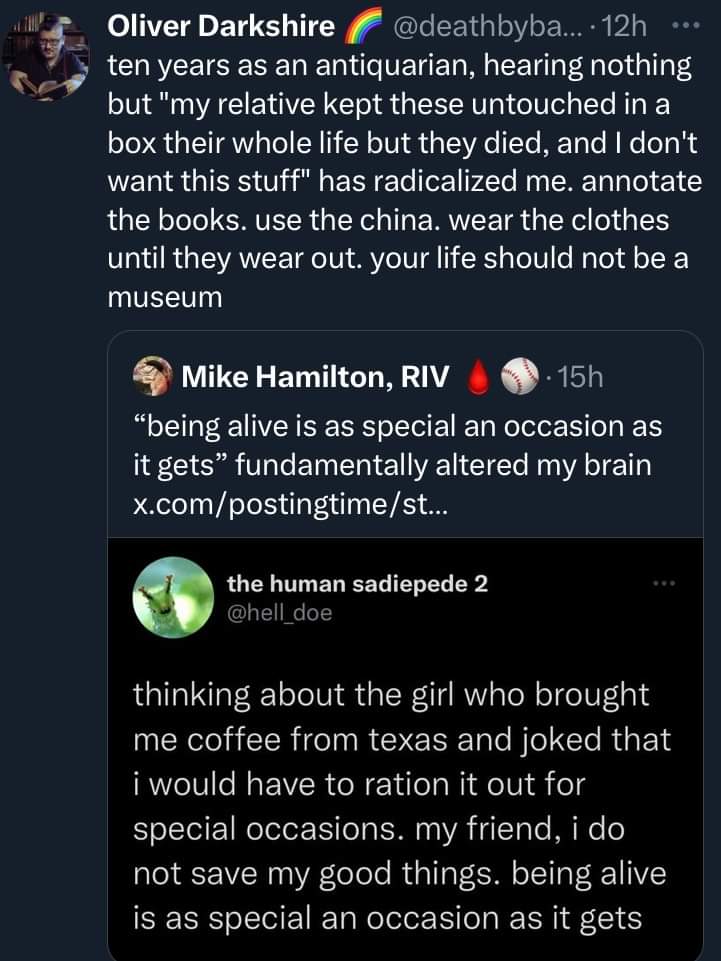

dv said:
Le travail vous libère l’esclavage améliore votre santé¡

dv said:
So, don’t smoke them.
Bubblecar said:
dv said:
So, don’t smoke them.
We’ve heard that regular cultural burns are important for their health.
SCIENCE said:
Bubblecar said:
dv said:
So, don’t smoke them.
We’ve heard that regular cultural burns are important for their health.
I SMOKE stands for I SEND MYSELF OK EVERYTIME
Very short clip (21 seconds) of the cute 1960s Avian 2/180 autogyro in flight.
This small ducted propellor craft with an unpowered rotor flew well enough, but the company ran out of funds and it was never put into production.
https://www.youtube.com/watch?v=1KhEiGa8K0I
Bubblecar said:
Very short clip (21 seconds) of the cute 1960s Avian 2/180 autogyro in flight.This small ducted propellor craft with an unpowered rotor flew well enough, but the company ran out of funds and it was never put into production.
https://www.youtube.com/watch?v=1KhEiGa8K0I

Bubblecar said:
Very short clip (21 seconds) of the cute 1960s Avian 2/180 autogyro in flight.This small ducted propellor craft with an unpowered rotor flew well enough, but the company ran out of funds and it was never put into production.
https://www.youtube.com/watch?v=1KhEiGa8K0I
Ta.
Michael V said:
Bubblecar said:
Very short clip (21 seconds) of the cute 1960s Avian 2/180 autogyro in flight.This small ducted propellor craft with an unpowered rotor flew well enough, but the company ran out of funds and it was never put into production.
https://www.youtube.com/watch?v=1KhEiGa8K0I
Ta.
For those who like weird aircraft:
https://www.reddit.com/r/WeirdWings/
Bubblecar said:
Bubblecar said:
Very short clip (21 seconds) of the cute 1960s Avian 2/180 autogyro in flight.This small ducted propellor craft with an unpowered rotor flew well enough, but the company ran out of funds and it was never put into production.
https://www.youtube.com/watch?v=1KhEiGa8K0I
Eggsellent

kii said:
Reliquary for wasps.
Well, if i ever acquire a large bowlful of dead aggressive stinging insects, i’ll know just what to do with them now.
captain_spalding said:
kii said:
Reliquary for wasps.
Well, if i ever acquire a large bowlful of dead aggressive stinging insects, i’ll know just what to do with them now.
Whilst clearing out my studio I found the following:
1 desiccated frog
1 dusty bumblebee
2 crumbling tarantula wasps
Part of my dead critters collection.
SCIENCE said:
Or, as we say in English, https://en.m.wikipedia.org/wiki/Metropolitan_Area_Outer_Underground_Discharge_Channel

dv said:
Except Life Is A Game …
— Not Just John Conway
Someone shared this wisdom with me:
When you’re wearing rose-coloured glasses all the red flags just look like flags.
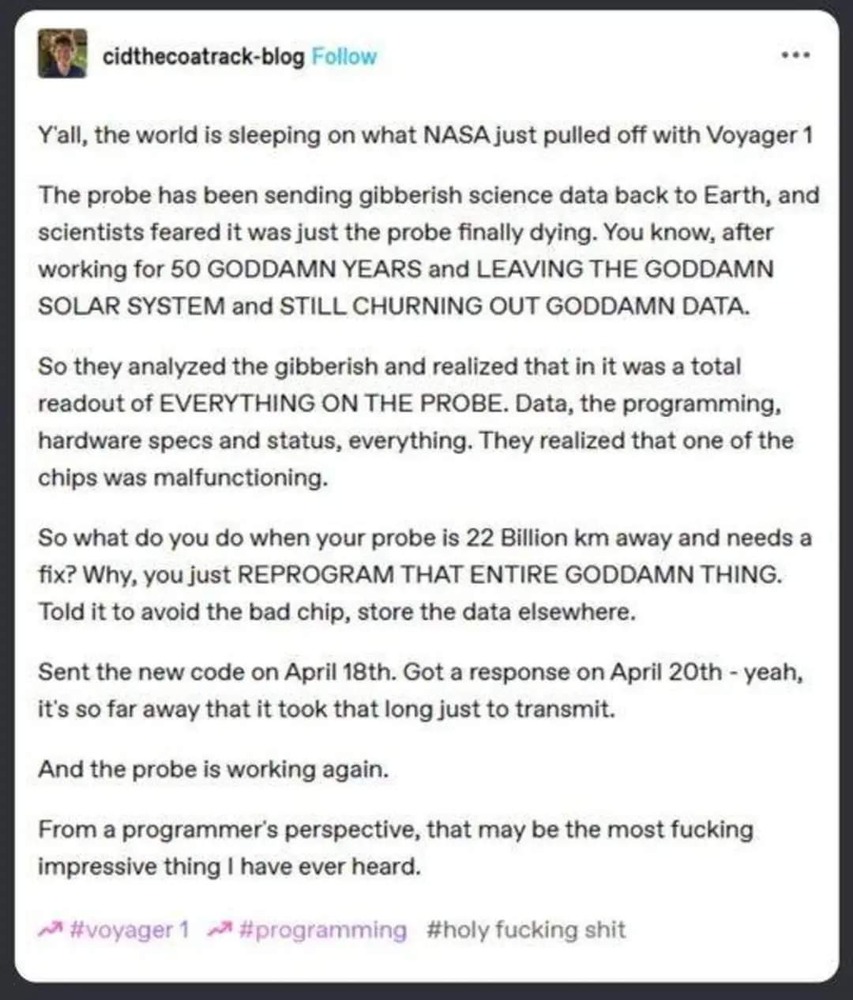
https://x.com/bcrypt/status/1788406218937229780

dv said:
https://x.com/bcrypt/status/1788406218937229780
Should anyone want to read a long article about Andrew Huberman, you can find it at:
https://www.theguardian.com/us-news/2024/mar/28/podcaster-andrew-huberman-goop-for-bros
this question:
When a chat-bot responds to a question, is it exercising “free will” in the choice of words it uses?
The Rev Dodgson said:
this question:When a chat-bot responds to a question, is it exercising “free will” in the choice of words it uses?
Sure, whatever
The Rev Dodgson said:
this question:When a chat-bot responds to a question, is it exercising “free will” in the choice of words it uses?
Like applying this same question to humans, it could be answered with a yes or a no.
And then the argument would be interminable.
Michael V said:
dv said:
The Rev Dodgson said:
this question:
When a chat-bot responds to a question, is it exercising “free will” in the choice of words it uses?
Sure, whatever
Like applying this same question to humans, it could be answered with a yes or a no.
And then the argument would be interminable.
Yes.
SCIENCE said:
Michael V said:
dv said:
Sure, whatever
Like applying this same question to humans, it could be answered with a yes or a no.
And then the argument would be interminable.
Yes.
Is that your answer to my question, or an interminable response to MV’s comment?
Propose a test of whether something is an example of free will. If you can’t proprose such a test even in theory then the matter is either arbitrary or subjective.
SCIENCE said:
Michael V said:
dv said:
Sure, whatever
Like applying this same question to humans, it could be answered with a yes or a no.
And then the argument would be interminable.
Yes.
LOLOL
The Rev Dodgson said:
SCIENCE said:
Michael V said:
Like applying this same question to humans, it could be answered with a yes or a no.
And then the argument would be interminable.
Yes.
Is that your answer to my question, or an interminable response to MV’s comment?
Yes.
SCIENCE said:
The Rev Dodgson said:
SCIENCE said:
Yes.
Is that your answer to my question, or an interminable response to MV’s comment?
Yes.
Thought so.
dv said:
Propose a test of whether something is an example of free will. If you can’t proprose such a test even in theory then the matter is either arbitrary or subjective.
I suppose we’d have to define “free will” first.
(Unless we chose not to).
The Rev Dodgson said:
dv said:
Propose a test of whether something is an example of free will. If you can’t proprose such a test even in theory then the matter is either arbitrary or subjective.
I suppose we’d have to define “free will” first.
(Unless we chose not to).
Well you’re the one asking the question so the onus is on you.
The Rev Dodgson said:
this question:When a chat-bot responds to a question, is it exercising “free will” in the choice of words it uses?
No. I am guessing it has a list of instructions in how to use the language. Even if it is AI, it is still following a set of instructions.
I cannot conceive of any human-made machine ever truly having a free will.
party_pants said:
The Rev Dodgson said:
this question:When a chat-bot responds to a question, is it exercising “free will” in the choice of words it uses?
No. I am guessing it has a list of instructions in how to use the language. Even if it is AI, it is still following a set of instructions.
I cannot conceive of any human-made machine ever truly having a free will.
There are instances of EEPROMS not doing what was expected, and re-programming themselves randomly.
I would look it up but I’m just about to head in to the outernet.
Kingy said:
party_pants said:
The Rev Dodgson said:
this question:
When a chat-bot responds to a question, is it exercising “free will” in the choice of words it uses?
No. I am guessing it has a list of instructions in how to use the language. Even if it is AI, it is still following a set of instructions.
I cannot conceive of any human-made machine ever truly having a free will.
There are instances of EEPROMS not doing what was expected, and re-programming themselves randomly.
I would look it up but I’m just about to head in to the outernet.
So what we’re saying is that Homo sapiens sapience is an accident and an error.
dv said:
The Rev Dodgson said:
dv said:
Propose a test of whether something is an example of free will. If you can’t proprose such a test even in theory then the matter is either arbitrary or subjective.
I suppose we’d have to define “free will” first.
(Unless we chose not to).
Well you’re the one asking the question so the onus is on you.
I suppose if I had just come up with the term “free-will”, which no-one had ever used before, then it would be up to me to define it, but as it is so widely used I think it would be a bit presumptuous for me to impose my definition on everyone else.
Everyone should have the free will to use their own definition.
The Rev Dodgson said:
SCIENCE said:
The Rev Dodgson said:
Is that your answer to my question, or an interminable response to MV’s comment?
Yes.
Thought so.
Well, we’ve long held that free will is an illusion so we hold to that still.
party_pants said:
The Rev Dodgson said:
this question:When a chat-bot responds to a question, is it exercising “free will” in the choice of words it uses?
No. I am guessing it has a list of instructions in how to use the language. Even if it is AI, it is still following a set of instructions.
I cannot conceive of any human-made machine ever truly having a free will.
Sort of like how humans are born with a set of instructions through their DNA, which are then modified by their interactions with a huge data set.
The Rev Dodgson said:
party_pants said:
The Rev Dodgson said:
this question:When a chat-bot responds to a question, is it exercising “free will” in the choice of words it uses?
No. I am guessing it has a list of instructions in how to use the language. Even if it is AI, it is still following a set of instructions.
I cannot conceive of any human-made machine ever truly having a free will.
Sort of like how humans are born with a set of instructions through their DNA, which are then modified by their interactions with a huge data set.
No. I think that is looking for parallels in completely different things. Argument by metaphor. I don’t think there is any direct correlation between organic DNA-based life and an arrangement of transistors on a wafer of silicon. They are fundamentally different things.
The Rev Dodgson said:
dv said:
The Rev Dodgson said:
I suppose we’d have to define “free will” first.
(Unless we chose not to).
Well you’re the one asking the question so the onus is on you.
I suppose if I had just come up with the term “free-will”, which no-one had ever used before, then it would be up to me to define it, but as it is so widely used I think it would be a bit presumptuous for me to impose my definition on everyone else.
Everyone should have the free will to use their own definition.
So we agree that almost all conventions are arbitrary.
party_pants said:
The Rev Dodgson said:
party_pants said:
No. I am guessing it has a list of instructions in how to use the language. Even if it is AI, it is still following a set of instructions.
I cannot conceive of any human-made machine ever truly having a free will.
Sort of like how humans are born with a set of instructions through their DNA, which are then modified by their interactions with a huge data set.
No. I think that is looking for parallels in completely different things. Argument by metaphor. I don’t think there is any direct correlation between organic DNA-based life and an arrangement of transistors on a wafer of silicon. They are fundamentally different things.
So we’re saying that a mechanical Turing complete machine is fundamentally different to an electronic Turing complete machine is fundamentally different to a photonic Turing complete machine is fundamentally different to an organic Turing complete machine.
The Rev Dodgson said:
this question:When a chat-bot responds to a question, is it exercising “free will” in the choice of words it uses?
Its choice of words would be determined by the question it’s addressing and its programming instructions and data bank etc.
Human responses can involve many more complicated determining factors.
As I’ve often argued, unless you’re talking about a random selection process, putting the word “free” in front of the word “will” is not very meaningful, as doing something as an act of will usually means doing something for specific reasons, determined by various criteria.

Map of waterways in London
dv said:

Map of waterways in London
Oh, I thought it was the tube in an alternative universe.
Despite having lived and worked in inner London for about 6 years, I had no idea all those waterways existed.
Other than the wide blue one in the middle.
dv said:

Map of waterways in London
Presumably you’re pointing up the style of the map.. same as that of the (very slightly) celebrated bloke who came up with the tube map, in the style of a circuit diagram.. all of the connections shown but none of the direction or distance. And not the strange pommy place names like yer Cockfosters…

Opposing linguistic theories typically do not consider the to-infinitive a distinct constituent, instead regarding the scope of the particle to as an entire verb phrase; thus, to buy a car is parsed like to ], not like .
None of yous will be surprised to realise that we’re opposing.
It is just as well that Archaea never became multicellular. They’d probably beat us.
dv said:
It is just as well that Archaea never became multicellular. They’d probably beat us.
What brings you to that conclusion?
dv said:
It is just as well that Archaea never became multicellular. They’d probably beat us.
Would the Federal Government throw down $3.4G to address this as well¿
Bubblecar said:
dv said:
It is just as well that Archaea never became multicellular. They’d probably beat us.
What brings you to that conclusion?
Because some of them are tough as nails and can survive strong acids and 170 dec C temperatures.
dv said:
Bubblecar said:
dv said:
It is just as well that Archaea never became multicellular. They’d probably beat us.
What brings you to that conclusion?
Because some of them are tough as nails and can survive strong acids and 170 dec C temperatures.
That toughness might need to be sacrificed if they became multicellular.
Bubblecar said:
dv said:
Bubblecar said:What brings you to that conclusion?
Because some of them are tough as nails and can survive strong acids and 170 dec C temperatures.
That toughness might need to be sacrificed if they became multicellular.
You might be right.

SCIENCE said:
What
dv said:
SCIENCE said:
What
Allegedly Penn Teller Andrus Box
dv said:
SCIENCE said:
What
0 90s
SCIENCE said:
dv said:
SCIENCE said:
What
Allegedly Penn Teller Andrus Box
As a bit of an Escher fan, I’m slightly ashamed to admit I didn’t see anything unusual about that for about the first 10 times I looked at it.
https://www.facebook.com/share/r/V1gzeXnzVTKfjAiV/?mibextid=D5vuiz
Meteor in Portugal
dv said:
https://www.facebook.com/share/r/V1gzeXnzVTKfjAiV/?mibextid=D5vuizMeteor in Portugal
Beautiful.
a poem by Gina
he globe is sadly groaning with debt, poverty and strife
And billions now are pleading to enjoy a better life
Their hope lies with resources buried deep within the earth
And the enterprise and capital which give each project worth
Is our future threatened with massive debts run up by political hacks
Who dig themselves out by unleashing rampant tax
The end result is sending Australian investment, growth and jobs offshore
This type of direction is harmful to our core
Some envious unthinking people have been conned
To think prosperity is created by waving a magic wand
Through such unfortunate ignorance, too much abuse is hurled
Against miners, workers and related industries who strive to build the world
Develop North Australia, embrace multiculturalism and welcome short term foreign workers to our shores
To benefit from the export of our minerals and ores
The world’s poor need our resources: do not leave them to their fate
Our nation needs special economic zones and wiser government, before it is too late
JudgeMental said:
a poem by Ginahe globe is sadly groaning with debt, poverty and strife
And billions now are pleading to enjoy a better life
Their hope lies with resources buried deep within the earth
And the enterprise and capital which give each project worth
Is our future threatened with massive debts run up by political hacks
Who dig themselves out by unleashing rampant tax
The end result is sending Australian investment, growth and jobs offshore
This type of direction is harmful to our core
Some envious unthinking people have been conned
To think prosperity is created by waving a magic wand
Through such unfortunate ignorance, too much abuse is hurled
Against miners, workers and related industries who strive to build the world
Develop North Australia, embrace multiculturalism and welcome short term foreign workers to our shores
To benefit from the export of our minerals and ores
The world’s poor need our resources: do not leave them to their fate
Our nation needs special economic zones and wiser government, before it is too late
On searching for the first line, the bingbot says:
“Certainly! Your statement reminds me of a rather unconventional poem penned by Australia’s very own Gina Rinehart in 2012. It’s often humorously referred to as “the world’s worst poem.” Let me share it with you:”
Australian miners seem to be doing OK, financially speaking, in spite of the ineptitude of the governments of recent years.
The Rev Dodgson said:
JudgeMental said:
a poem by Ginahe globe is sadly groaning with debt, poverty and strife
And billions now are pleading to enjoy a better life
Their hope lies with resources buried deep within the earth
And the enterprise and capital which give each project worth
Is our future threatened with massive debts run up by political hacks
Who dig themselves out by unleashing rampant tax
The end result is sending Australian investment, growth and jobs offshore
This type of direction is harmful to our core
Some envious unthinking people have been conned
To think prosperity is created by waving a magic wand
Through such unfortunate ignorance, too much abuse is hurled
Against miners, workers and related industries who strive to build the world
Develop North Australia, embrace multiculturalism and welcome short term foreign workers to our shores
To benefit from the export of our minerals and ores
The world’s poor need our resources: do not leave them to their fate
Our nation needs special economic zones and wiser government, before it is too late
On searching for the first line, the bingbot says:
“Certainly! Your statement reminds me of a rather unconventional poem penned by Australia’s very own Gina Rinehart in 2012. It’s often humorously referred to as “the world’s worst poem.” Let me share it with you:”
Australian miners seem to be doing OK, financially speaking, in spite of the ineptitude of the governments of recent years.
… and the first non-bot hit was to a site called genius.com, which I thought at first was our very own Gina being a little trumpesque, but it seems it has nothing to do with her and was just posting the poem for some reason, including some not entirely complimentary commentary.
The Rev Dodgson said:
JudgeMental said:
a poem by Ginahe globe is sadly groaning with debt, poverty and strife
And billions now are pleading to enjoy a better life
Their hope lies with resources buried deep within the earth
And the enterprise and capital which give each project worth
Is our future threatened with massive debts run up by political hacks
Who dig themselves out by unleashing rampant tax
The end result is sending Australian investment, growth and jobs offshore
This type of direction is harmful to our core
Some envious unthinking people have been conned
To think prosperity is created by waving a magic wand
Through such unfortunate ignorance, too much abuse is hurled
Against miners, workers and related industries who strive to build the world
Develop North Australia, embrace multiculturalism and welcome short term foreign workers to our shores
To benefit from the export of our minerals and ores
The world’s poor need our resources: do not leave them to their fate
Our nation needs special economic zones and wiser government, before it is too late
On searching for the first line, the bingbot says:
“Certainly! Your statement reminds me of a rather unconventional poem penned by Australia’s very own Gina Rinehart in 2012. It’s often humorously referred to as “the world’s worst poem.” Let me share it with you:”
Australian miners seem to be doing OK, financially speaking, in spite of the ineptitude of the governments of recent years.
… and the first non-bot hit was to a site called genius.com, which I thought at first was our very own Gina being a little trumpesque, but it seems it has nothing to do with her and was just posting the poem for some reason, including some not entirely complimentary commentary.
The Rev Dodgson said:
JudgeMental said:
a poem by Ginahe globe is sadly groaning with debt, poverty and strife
And billions now are pleading to enjoy a better life
Their hope lies with resources buried deep within the earth
And the enterprise and capital which give each project worth
Is our future threatened with massive debts run up by political hacks
Who dig themselves out by unleashing rampant tax
The end result is sending Australian investment, growth and jobs offshore
This type of direction is harmful to our core
Some envious unthinking people have been conned
To think prosperity is created by waving a magic wand
Through such unfortunate ignorance, too much abuse is hurled
Against miners, workers and related industries who strive to build the world
Develop North Australia, embrace multiculturalism and welcome short term foreign workers to our shores
To benefit from the export of our minerals and ores
The world’s poor need our resources: do not leave them to their fate
Our nation needs special economic zones and wiser government, before it is too late
On searching for the first line, the bingbot says:
“Certainly! Your statement reminds me of a rather unconventional poem penned by Australia’s very own Gina Rinehart in 2012. It’s often humorously referred to as “the world’s worst poem.” Let me share it with you:”
Australian miners seem to be doing OK, financially speaking, in spite of the ineptitude of the governments of recent years.
Our miners might be doing OK, but think how much better off they could have been if Gina had been properly heeded.
$2 a day and think yourselves lucky! Which is slightly at odds with her stance on bringing prosperity to the world’s poor by digging stuff up
ruby said:
The Rev Dodgson said:
JudgeMental said:
a poem by Ginahe globe is sadly groaning with debt, poverty and strife
And billions now are pleading to enjoy a better life
Their hope lies with resources buried deep within the earth
And the enterprise and capital which give each project worth
Is our future threatened with massive debts run up by political hacks
Who dig themselves out by unleashing rampant tax
The end result is sending Australian investment, growth and jobs offshore
This type of direction is harmful to our core
Some envious unthinking people have been conned
To think prosperity is created by waving a magic wand
Through such unfortunate ignorance, too much abuse is hurled
Against miners, workers and related industries who strive to build the world
Develop North Australia, embrace multiculturalism and welcome short term foreign workers to our shores
To benefit from the export of our minerals and ores
The world’s poor need our resources: do not leave them to their fate
Our nation needs special economic zones and wiser government, before it is too late
On searching for the first line, the bingbot says:
“Certainly! Your statement reminds me of a rather unconventional poem penned by Australia’s very own Gina Rinehart in 2012. It’s often humorously referred to as “the world’s worst poem.” Let me share it with you:”
Australian miners seem to be doing OK, financially speaking, in spite of the ineptitude of the governments of recent years.
Our miners might be doing OK, but think how much better off they could have been if Gina had been properly heeded.
$2 a day and think yourselves lucky! Which is slightly at odds with her stance on bringing prosperity to the world’s poor by digging stuff up
It seems the poem is from 2012, and was aimed at the mining tax, so actually she was “properly heeded”.
JudgeMental said:
a poem by Ginahe globe is sadly groaning with debt, poverty and strife
And billions now are pleading to enjoy a better life
Their hope lies with resources buried deep within the earth
And the enterprise and capital which give each project worth
Is our future threatened with massive debts run up by political hacks
Who dig themselves out by unleashing rampant tax
The end result is sending Australian investment, growth and jobs offshore
This type of direction is harmful to our core
Some envious unthinking people have been conned
To think prosperity is created by waving a magic wand
Through such unfortunate ignorance, too much abuse is hurled
Against miners, workers and related industries who strive to build the world
Develop North Australia, embrace multiculturalism and welcome short term foreign workers to our shores
To benefit from the export of our minerals and ores
The world’s poor need our resources: do not leave them to their fate
Our nation needs special economic zones and wiser government, before it is too late
That’s beautiful man
The Rev Dodgson said:
ruby said:
The Rev Dodgson said:On searching for the first line, the bingbot says:
“Certainly! Your statement reminds me of a rather unconventional poem penned by Australia’s very own Gina Rinehart in 2012. It’s often humorously referred to as “the world’s worst poem.” Let me share it with you:”
Australian miners seem to be doing OK, financially speaking, in spite of the ineptitude of the governments of recent years.
Our miners might be doing OK, but think how much better off they could have been if Gina had been properly heeded.
$2 a day and think yourselves lucky! Which is slightly at odds with her stance on bringing prosperity to the world’s poor by digging stuff up
It seems the poem is from 2012, and was aimed at the mining tax, so actually she was “properly heeded”.
But she didn’t get her Special Economic Zones!
ruby said:
The Rev Dodgson said:
ruby said:Our miners might be doing OK, but think how much better off they could have been if Gina had been properly heeded.
$2 a day and think yourselves lucky! Which is slightly at odds with her stance on bringing prosperity to the world’s poor by digging stuff up
It seems the poem is from 2012, and was aimed at the mining tax, so actually she was “properly heeded”.
But she didn’t get her Special Economic Zones!
I’m sure Dutton will sort that one out as soon as he gets the chance.
Ian said:
JudgeMental said:
a poem by Ginahe globe is sadly groaning with debt, poverty and strife
And billions now are pleading to enjoy a better life
Their hope lies with resources buried deep within the earth
And the enterprise and capital which give each project worth
Is our future threatened with massive debts run up by political hacks
Who dig themselves out by unleashing rampant tax
The end result is sending Australian investment, growth and jobs offshore
This type of direction is harmful to our core
Some envious unthinking people have been conned
To think prosperity is created by waving a magic wand
Through such unfortunate ignorance, too much abuse is hurled
Against miners, workers and related industries who strive to build the world
Develop North Australia, embrace multiculturalism and welcome short term foreign workers to our shores
To benefit from the export of our minerals and ores
The world’s poor need our resources: do not leave them to their fate
Our nation needs special economic zones and wiser government, before it is too late
That’s beautiful man
you’re probably a fan of vogon poetry.
JudgeMental said:
Ian said:
JudgeMental said:
a poem by Ginahe globe is sadly groaning with debt, poverty and strife
And billions now are pleading to enjoy a better life
Their hope lies with resources buried deep within the earth
And the enterprise and capital which give each project worth
Is our future threatened with massive debts run up by political hacks
Who dig themselves out by unleashing rampant tax
The end result is sending Australian investment, growth and jobs offshore
This type of direction is harmful to our core
Some envious unthinking people have been conned
To think prosperity is created by waving a magic wand
Through such unfortunate ignorance, too much abuse is hurled
Against miners, workers and related industries who strive to build the world
Develop North Australia, embrace multiculturalism and welcome short term foreign workers to our shores
To benefit from the export of our minerals and ores
The world’s poor need our resources: do not leave them to their fate
Our nation needs special economic zones and wiser government, before it is too late
That’s beautiful man
you’re probably a fan of vogon poetry.
Which is apt because Gina came from the planet Vogon in the constellation Mordor.
Tau.Neutrino said:
JudgeMental said:
Ian said:That’s beautiful man
you’re probably a fan of vogon poetry.
Which is apt because Gina came from the planet Vogon in the constellation Mordor.
Which is apt because Gina came from the planet Mordor in the constellation Vogon.
Fixed.
That Gina portrait would make great postcards.
It’s just mad for an heiress who has become one of the richest people in the world purely on passive income to complain about … well anything, really.
dv said:
It’s just mad for an heiress who has become one of the richest people in the world purely on passive income to complain about … well anything, really.
You may mock, but the bingbot tells me:
“Gina Rinehart, the Australian mining magnate and heiress, is known for her strong work ethic and hands-on approach to running her business empire. She serves as the executive chairwoman of Hancock Prospecting, a privately owned mineral exploration and extraction company founded by her father, Lang Hancock. Since taking over the company in 1992, she has transformed it from a financially troubled entity into a successful industry-leading innovator. Despite the growing scale of the Hancock operations, Rinehart remains actively involved in every aspect of the business12. Her dedication and hard work have contributed significantly to the company’s success and her own substantial wealth. As of May 2023, her net worth is estimated to be in excess of A$ 37 billion1. Quite an impressive achievement! 😊”
dv said:
It’s just mad for an heiress who has become one of the richest people in the world purely on passive income to complain about … well anything, really.
She could watch movies all day, or visit town bakeries for tea and cake, or go to art galleries and admire portraits of rich people.

A modern-day field of tulips in the Netherlands; the flower remains a popular symbol of the Netherlands.
dv said:
It’s just mad for an heiress who has become one of the richest people in the world purely on passive income to complain about … well anything, really.
It’s stunning how many seriously wealthy people just can’t stfu and enjoy their money.
kii said:
dv said:
It’s just mad for an heiress who has become one of the richest people in the world purely on passive income to complain about … well anything, really.
It’s stunning how many seriously wealthy people just can’t stfu and enjoy their money.
Yeah, why can’t they visit art galleries and admire portraits of rich people, crazy.
The Rev Dodgson said:
dv said:
It’s just mad for an heiress who has become one of the richest people in the world purely on passive income to complain about … well anything, really.
You may mock, but the bingbot tells me:
“Gina Rinehart, the Australian mining magnate and heiress, is known for her strong work ethic and hands-on approach to running her business empire. She serves as the executive chairwoman of Hancock Prospecting, a privately owned mineral exploration and extraction company founded by her father, Lang Hancock. Since taking over the company in 1992, she has transformed it from a financially troubled entity into a successful industry-leading innovator. Despite the growing scale of the Hancock operations, Rinehart remains actively involved in every aspect of the business12. Her dedication and hard work have contributed significantly to the company’s success and her own substantial wealth. As of May 2023, her net worth is estimated to be in excess of A$ 37 billion1. Quite an impressive achievement! 😊”
Chunder.
That’s written by a sycophant, I think.
The fortune started with asbestos. Lang was a part owner of Wittenoom.
Hancock Prospecting was never a troubled entity.
kii said:
dv said:
It’s just mad for an heiress who has become one of the richest people in the world purely on passive income to complain about … well anything, really.
It’s stunning how many seriously wealthy people just can’t stfu and enjoy their money.
Money buys power and influence, power and influence are a way to make more money,
Michael V said:
The Rev Dodgson said:
dv said:
It’s just mad for an heiress who has become one of the richest people in the world purely on passive income to complain about … well anything, really.
You may mock, but the bingbot tells me:
“Gina Rinehart, the Australian mining magnate and heiress, is known for her strong work ethic and hands-on approach to running her business empire. She serves as the executive chairwoman of Hancock Prospecting, a privately owned mineral exploration and extraction company founded by her father, Lang Hancock. Since taking over the company in 1992, she has transformed it from a financially troubled entity into a successful industry-leading innovator. Despite the growing scale of the Hancock operations, Rinehart remains actively involved in every aspect of the business12. Her dedication and hard work have contributed significantly to the company’s success and her own substantial wealth. As of May 2023, her net worth is estimated to be in excess of A$ 37 billion1. Quite an impressive achievement! 😊”
Chunder.
That’s written by a sycophant, I think.
The fortune started with asbestos. Lang was a part owner of Wittenoom.
Hancock Prospecting was never a troubled entity.
Oh good, now 癌 are just another suck up vessel to promote more billionaire interests, we mean sure this was inevitable but, fuck.
Michael V said:
The Rev Dodgson said:
dv said:
It’s just mad for an heiress who has become one of the richest people in the world purely on passive income to complain about … well anything, really.
You may mock, but the bingbot tells me:
“Gina Rinehart, the Australian mining magnate and heiress, is known for her strong work ethic and hands-on approach to running her business empire. She serves as the executive chairwoman of Hancock Prospecting, a privately owned mineral exploration and extraction company founded by her father, Lang Hancock. Since taking over the company in 1992, she has transformed it from a financially troubled entity into a successful industry-leading innovator. Despite the growing scale of the Hancock operations, Rinehart remains actively involved in every aspect of the business12. Her dedication and hard work have contributed significantly to the company’s success and her own substantial wealth. As of May 2023, her net worth is estimated to be in excess of A$ 37 billion1. Quite an impressive achievement! 😊”
Chunder.
That’s written by a sycophant, I think.
The fortune started with asbestos. Lang was a part owner of Wittenoom.
Hancock Prospecting was never a troubled entity.
Damn, she even has the bingbot under her influence!
The Rev Dodgson said:
Michael V said:
The Rev Dodgson said:
You may mock, but the bingbot tells me:
“Gina Rinehart, the Australian mining magnate and heiress, is known for her strong work ethic and hands-on approach to running her business empire. She serves as the executive chairwoman of Hancock Prospecting, a privately owned mineral exploration and extraction company founded by her father, Lang Hancock. Since taking over the company in 1992, she has transformed it from a financially troubled entity into a successful industry-leading innovator. Despite the growing scale of the Hancock operations, Rinehart remains actively involved in every aspect of the business12. Her dedication and hard work have contributed significantly to the company’s success and her own substantial wealth. As of May 2023, her net worth is estimated to be in excess of A$ 37 billion1. Quite an impressive achievement! 😊”
Chunder.
That’s written by a sycophant, I think.
The fortune started with asbestos. Lang was a part owner of Wittenoom.
Hancock Prospecting was never a troubled entity.
Damn, she even has the bingbot under her influence!
Imagine How Bad It Would Be If Some Billionaire Actually Did Directly Control A Social Medium Oh
Wait Oh
Shit
The Rev Dodgson said:
Michael V said:
The Rev Dodgson said:You may mock, but the bingbot tells me:
“Gina Rinehart, the Australian mining magnate and heiress, is known for her strong work ethic and hands-on approach to running her business empire. She serves as the executive chairwoman of Hancock Prospecting, a privately owned mineral exploration and extraction company founded by her father, Lang Hancock. Since taking over the company in 1992, she has transformed it from a financially troubled entity into a successful industry-leading innovator. Despite the growing scale of the Hancock operations, Rinehart remains actively involved in every aspect of the business12. Her dedication and hard work have contributed significantly to the company’s success and her own substantial wealth. As of May 2023, her net worth is estimated to be in excess of A$ 37 billion1. Quite an impressive achievement! 😊”
Chunder.
That’s written by a sycophant, I think.
The fortune started with asbestos. Lang was a part owner of Wittenoom.
Hancock Prospecting was never a troubled entity.
Damn, she even has the bingbot under her influence!
SCIENCE said:
Michael V said:
The Rev Dodgson said:
You may mock, but the bingbot tells me:
“Gina Rinehart, the Australian mining magnate and heiress, is known for her strong work ethic and hands-on approach to running her business empire. She serves as the executive chairwoman of Hancock Prospecting, a privately owned mineral exploration and extraction company founded by her father, Lang Hancock. Since taking over the company in 1992, she has transformed it from a financially troubled entity into a successful industry-leading innovator. Despite the growing scale of the Hancock operations, Rinehart remains actively involved in every aspect of the business12. Her dedication and hard work have contributed significantly to the company’s success and her own substantial wealth. As of May 2023, her net worth is estimated to be in excess of A$ 37 billion1. Quite an impressive achievement! 😊”
Chunder.
That’s written by a sycophant, I think.
The fortune started with asbestos. Lang was a part owner of Wittenoom.
Hancock Prospecting was never a troubled entity.
Oh good, now 癌 are just another suck up vessel to promote more billionaire interests, we mean sure this was inevitable but, fuck.
Yeah. Some recompense for mesothelioma should (in my view) be paid by Hancock Prospecting.
The Rev Dodgson said:
dv said:
It’s just mad for an heiress who has become one of the richest people in the world purely on passive income to complain about … well anything, really.
You may mock
Thanks, I will.
SCIENCE said:
A modern-day field of tulips in the Netherlands; the flower remains a popular symbol of the Netherlands.
Okay
dv said:
SCIENCE said:
A modern-day field of tulips in the Netherlands; the flower remains a popular symbol of the Netherlands.
Okay
We assign high probability that the metaphorical ambiguity is intentional.
SCIENCE said:
dv said:
SCIENCE said:
A modern-day field of tulips in the Netherlands; the flower remains a popular symbol of the Netherlands.
Okay
We assign high probability that the metaphorical ambiguity is intentional.
Still okay
dv said:
SCIENCE said:
dv said:
Okay
We assign high probability that the metaphorical ambiguity is intentional.
Still okay
Sorry forgot the link
https://en.m.wikipedia.org/wiki/Tulip_mania
someone has planted it there and it wasn’t us. We’ren’t wind farmers and don’t know confidently whether they’re as big a bubble as Bitcoin but at least they can power Bitcoin farmers. But yes not particularly groundbreaking, it’sn’t fracking f’co’l.
SCIENCE said:
dv said:
SCIENCE said:
We assign high probability that the metaphorical ambiguity is intentional.
Still okay
Sorry forgot the link
https://en.m.wikipedia.org/wiki/Tulip_mania
someone has planted it there and it wasn’t us. We’ren’t wind farmers and don’t know confidently whether they’re as big a bubble as Bitcoin but at least they can power Bitcoin farmers. But yes not particularly groundbreaking, it’sn’t fracking f’co’l.
I thought you might be making a point a out windfarms
dv said:
SCIENCE said:
dv said:
Still okay
Sorry forgot the link
https://en.m.wikipedia.org/wiki/Tulip_mania
someone has planted it there and it wasn’t us. We’ren’t wind farmers and don’t know confidently whether they’re as big a bubble as Bitcoin but at least they can power Bitcoin farmers. But yes not particularly groundbreaking, it’sn’t fracking f’co’l.
I thought you might be making a point a out windfarms
Not us, whoever edited the manic article.
We admit that we don’t know confidently whether wind farming in paddocks is actually net beneficial, even if solar farms seem like they would be.
JudgeMental said:
a poem by Ginahe globe is sadly groaning with debt, poverty and strife
And billions now are pleading to enjoy a better life
Their hope lies with resources buried deep within the earth
And the enterprise and capital which give each project worth
Is our future threatened with massive debts run up by political hacks
Who dig themselves out by unleashing rampant tax
The end result is sending Australian investment, growth and jobs offshore
This type of direction is harmful to our core
Some envious unthinking people have been conned
To think prosperity is created by waving a magic wand
Through such unfortunate ignorance, too much abuse is hurled
Against miners, workers and related industries who strive to build the world
Develop North Australia, embrace multiculturalism and welcome short term foreign workers to our shores
To benefit from the export of our minerals and ores
The world’s poor need our resources: do not leave them to their fate
Our nation needs special economic zones and wiser government, before it is too late
She clearly wants to dig everything up and pay no tax.
The Rev Dodgson said:
ruby said:
The Rev Dodgson said:On searching for the first line, the bingbot says:
“Certainly! Your statement reminds me of a rather unconventional poem penned by Australia’s very own Gina Rinehart in 2012. It’s often humorously referred to as “the world’s worst poem.” Let me share it with you:”
Australian miners seem to be doing OK, financially speaking, in spite of the ineptitude of the governments of recent years.
Our miners might be doing OK, but think how much better off they could have been if Gina had been properly heeded.
$2 a day and think yourselves lucky! Which is slightly at odds with her stance on bringing prosperity to the world’s poor by digging stuff up
It seems the poem is from 2012, and was aimed at the mining tax, so actually she was “properly heeded”.
Seems so.
roughbarked said:
JudgeMental said:
a poem by Ginahe globe is sadly groaning with debt, poverty and strife
And billions now are pleading to enjoy a better life
Their hope lies with resources buried deep within the earth
And the enterprise and capital which give each project worth
Is our future threatened with massive debts run up by political hacks
Who dig themselves out by unleashing rampant tax
The end result is sending Australian investment, growth and jobs offshore
This type of direction is harmful to our core
Some envious unthinking people have been conned
To think prosperity is created by waving a magic wand
Through such unfortunate ignorance, too much abuse is hurled
Against miners, workers and related industries who strive to build the world
Develop North Australia, embrace multiculturalism and welcome short term foreign workers to our shores
To benefit from the export of our minerals and ores
The world’s poor need our resources: do not leave them to their fate
Our nation needs special economic zones and wiser government, before it is too late
She clearly wants to dig everything up and pay no tax.
Then dig up the moon, then dig up Mars.
dv said:
SCIENCE said:
A modern-day field of tulips in the Netherlands; the flower remains a popular symbol of the Netherlands.
Okay
Won’t they be suffering from the infrasound of the wind towers? Or are Dutch plants used to windmills?
buffy said:
dv said:
SCIENCE said:
A modern-day field of tulips in the Netherlands; the flower remains a popular symbol of the Netherlands.
Okay
Won’t they be suffering from the infrasound of the wind towers? Or are Dutch plants used to windmills?
:)
Like.
buffy said:
dv said:
SCIENCE said:
A modern-day field of tulips in the Netherlands; the flower remains a popular symbol of the Netherlands.
Okay
Won’t they be suffering from the infrasound of the wind towers? Or are Dutch plants used to windmills?
It would be in a different language for Dutch Tulips.
Michael V said:
buffy said:
dv said:Okay
Won’t they be suffering from the infrasound of the wind towers? Or are Dutch plants used to windmills?
:)
Like.
This Black Hole Could be Bigger Than the Universe
Ian said:
This Black Hole Could be Bigger Than the Universe
We proudly present to you: The
kurzgesagt Guide to Curiosity. Join us on an interactive adventure across
160 thrilling pages that will change your perspective on the world forever.
Available now on the kurzgesagt shop.
You might be inside a black hole that’s
inside a black hole that is inside a black hole.
Everything in existence could
be black holes all the way down.
It turns out black holes are much weirder than
you think and they break the universe much more than is usually explained, destroying time and
space – and they may actually create infinite universes in the process.
But before we can
get to that, let’s first build a black hole out of air.
Everything can become a black hole if you
squeeze it to a critical limit.
You’d need to squeeze Earth down to the
size of a coin for it to turn into a black hole.
The Sun needs to be squeezed down to the
size of a small city to become a black hole.
And if a lot of mass is concentrated in a really
tiny space, you get something super dense.
This is usually how black holes are explained.
Stuff becomes super dense and collapses into a black hole.
But actually you don’t
need any ultra dense stuff to make them!
We’re ignoring some math here, but all
you really need to know is one thing: The larger black holes get, the less dense they
are.
So really large black holes are kind of thin.
A sun-mass black hole is only about 6 km wide
and has a density of about one Himalayan range per cubic meter.
The supermassive black hole
at the center of the Milky Way has a mass of 4 million suns, a diameter of 24 million kilometers,
and a density of 6 blue whales per cubic meter. The ultramassive black hole IRAS 20100−4156
has a mass of 3.8 billion suns and is as wide as a solar system.
But because it’s
so large, it is only as dense as air!
This means, at least in theory, that if you take
a gigantic balloon and fill it with undecillions of tons of air, the moment it gets to the size
of a solar system, an event horizon suddenly forms and it turns into a supermassive
black hole.
Without violence or squeezing.
So now let’s think big.
What do we need to
make a black hole the size of the universe?
A Universe-Sized Black Hole The chunk of the universe that we can see
from Earth is a sphere with a radius of 45 billion light-years, filled with hundreds of
billions of galaxies, lots of gas and a bunch of other things.
If you add them up, it has the
mass of about a million billion billion suns.
Which sounds a lot – but on average, the
universe is not very dense.
If we break up all the galaxies, stars, gas and energy, and spread
them equally inside the volume of the universe, we get an average density of about 5
hydrogen atoms per cubic meter.
You can imagine this as the sort of ultra thin
“cosmic air” that makes up the universe.
What would happen if we take a balloon as big as the observable universe and
fill it with “cosmic air”?
Well, it turns out that all the mass in the
observable universe is more than enough to create a black hole.
Actually, it’s
enough to make a black hole 10 times larger than the observable universe.
But that can only mean one thing – we should be living deep inside a truly
gargantuan, cosmic-sized black hole!
There is one catch though.
We know that our
universe is expanding – and an expanding universe is not what you’d expect to
see if you were inside a black hole.
So our universe can’t be a black hole – at least
not in the naive way we’ve just described. Except there is a wild and mind-bending
trick the universe could play on us.
To find out how, let’s jump
into a black hole and die!
A Whole Universe Born Inside a Black Hole We usually imagine black holes as spheres
with a singularity at their center, a point where all their mass
is concentrated so much that our math breaks down.
But this is
a lie – they are SO much weirder.
From the outside a black hole looks like
a normal black sphere.
But the inside is where things stop making sense.
Black holes warp the universe so
much that, at the event horizon, space and time switch their roles.
Inside a normal
sphere, space is finite but time goes on forever. But inside a black hole it’s the other way around
– space goes on forever but time is finite.
So once inside, you see an infinite universe
with no center.
The geometry is too complicated, so we’re simplifying.
But basically
you could walk forever in one direction or walk in another direction and
arrive at the same place again.
But not only that.
Inside a black hole time
is finite, and it’s now running out.
So after a while you start to notice that
space itself is slowly changing.
In one direction space is being stretched, while in
all other directions space is shrinking – the whole universe is being squeezed, kind
of turning into a collapsing spaghetti.
Sooner or later, the whole black hole
universe collapses into itself.
All of space, every single part of it, is turning into a
singularity.
So the singularity of a black hole is not at its center or in any
direction at all.
It’s in the future of whatever falls inside.
We made a whole
video about this if you want to learn more.
So the singularity is not a place where you
can go – it’s an event in time that happens. Once it happens, you and everything else that
fell inside the black hole will be mercilessly crushed into an infinitely small region with
infinite gravity and infinite energy.
Time, space, none of it matters anymore, both kind of
stop existing in ways that we would recognize.
And then?
Is this the end?
Well, maybe not.
This collapse of the black hole universe
into a singularity looks like one of the scenarios for the end of our universe: The Big
Crunch, where long after the Big Bang the whole universe collapses into a singularity again.
But if there is a Big Crunch,
there might be a Big Bounce – like a rubber ball that you’ve
squeezed too much and that suddenly rebounds, space might expand again.
So a new
universe could be born inside a black hole.
The funny thing about this
scenario is that nothing has changed in the slightest outside the
black hole.
Watching from the outside, it’s still a black sphere of nothingness.
And
yet, on the inside a new universe has been born.
So maybe our universe was born like
this and we are all actually inside a black hole.
But if our universe can also
create black holes, they might give birth to new universes.
Is our black hole universe
also just part of a universe “further up”, that’s also a black hole inside another
universe?
Is there an end to it?
Is there one original universe?
Is the cosmos black
holes inside black holes inside black holes?
Infinite Black Hole Universes If the universe creates black
holes that create universes, that then create new black holes that create
new universes, this cosmic self-reproduction would be subject to natural selection.
A Big Bang is a chaotic and messy event, so it’s possible that the new daughter universes
would not always be fully identical to their mums. Sometimes physics may be slightly different,
with some fundamental values higher or lower.
And so some universes might be able to create
loads of stars, planets and black holes.
Others might not, maybe creating a uniform cosmic soup
where no stars, planets and black holes form.
But if all universes are born inside black
holes, in the long run all universe lines that don’t create loads of black holes
would die out.
The universes with the conditions for loads of black holes would
become the most common and spawn the most daughter universes.
Survival of the fittest,
but with universes instead of organisms.
Our observable universe alone has created at
least 1017 black holes so far.
So maybe our universe has the physics and laws it has,
because it was born after a long process of cosmological selection that favored
the production of tons of black holes.
And that would have a lovely side effect. If universes are optimized to create as
many new black hole universes as possible, they’re optimized to create loads of galaxies
and stars.
And thereby also, by accident, the conditions for life to emerge.
So universes
that are the best at creating new universes are also the best at creating life.
If this scenario
is true, who knows how many bazillions of black hole universes might be out there.
All with stars
and planets, potentially home to others like us.
So.
Is our universe like this?
The
truth is we don’t know.
While these ideas are based on real science and work on paper, they’re speculative and not testable.
Also
cyclic universes don’t actually explain why the universe exists in the first place or why it
is the way it is.
Instead of providing answers, these are really just new questions in disguise,
so keep that in mind before getting too excited.
But isn’t it just wonderful and
heartwarming that we’re living in a universe where ideas as big as this
one are even thinkable?
There might be so much life.
And if new universes are created
constantly, maybe life will go on forever. We’ve heard rumors of a chosen one.
A special birb who has the power to illuminate the vast darkness of the universe,
uncovering the great mysteries of the world. We are all born with this power.
But only few are able to master it.
We use the same power here at kurzgesagt to find the latest science and come up
with the most exciting videos.
This special power is called: curiosity.
And the special birb… could be you!
Our Guide to Curiosity is now available on
our shop.
It’s an adventure that will help you to think like a kurzgesagt birb
and unlock your curiosity potential. Join us across 160 thrilling, interactive
pages designed to awaken your curiosity, changing your perspective on the world forever.
But be prepared!
We will send you on
epic quests to find incredible creatures, challenge you to build unprecedented structures, ask you to cook up something surprising, and solve
riddles to unveil hidden truths about the world. But don’t worry, the birbs will be with you every
step of the way.
And you can also bring a friend!
The 18 curiosity quests were developed
right here at the kurzgesagt headquarters. After hundreds and hundreds of hours of
research and lots of trial and error, we created the ultimate curiosity adventure.
It was the most fun we ever had making a product – and we are so excited to
finally share this experience with you.
So head over to the kurzgesagt shop and
find out if you are the chosen birb. Every kurzgesagt product you buy
directly funds another moment we get to spend working on our videos – and you
get a special piece of kurzgesagt in return. Thank you so much for being a part of our
story and making this channel possible.
Metallurgists Are Such Elitists
https://phys.org/news/2024-05-stainless-steel-bacteria-antibiotics-chemicals.html

electrochemical process developed at Georgia Tech could offer new protection
natural antibacterial properties of copper
The team first developed an electrochemical method to etch the surface of stainless steel, creating nano-sized needle-like structures on the surface that can puncture bacteria’s cell membranes. Then, with a second electrochemical process, the researchers deposited copper ions on the steel’s surface.
Copper interacts with the cell membranes and ultimately compromises them.
Yes yes we know that titles are written by “someone else”.
https://www.bloomberg.com/news/articles/2014-08-08/atomic-tests-were-a-tourist-draw-in-1950s-las-vegas
https://www.demilked.com/nuclear-tourism-1950s-atomic-bomb-las-vegas/
SCIENCE said:
https://www.bloomberg.com/news/articles/2014-08-08/atomic-tests-were-a-tourist-draw-in-1950s-las-vegas
https://www.demilked.com/nuclear-tourism-1950s-atomic-bomb-las-vegas/
—
Lucky Maralinga is not a drawcard for tourists.
19 shillings said:
SCIENCE said:
https://www.bloomberg.com/news/articles/2014-08-08/atomic-tests-were-a-tourist-draw-in-1950s-las-vegas
https://www.demilked.com/nuclear-tourism-1950s-atomic-bomb-las-vegas/—
Lucky Maralinga is not a drawcard for tourists.
Wittenoom though ¡
Jules Witek
Mt Illusion
“At first glance” this appears to be a nice picture of a mountain and a lake possibly in the Yellowstone National Park in the USA. It is in fact a picture of a silt bank in the river turned upside down. Everything here is a reflection except for the silt deposit which is flat and ironically not high enough to be reflected.
Saltwater River Tasman Peninsula
Tasmania Australia

kii said:
Jules Witek
Mt Illusion“At first glance” this appears to be a nice picture of a mountain and a lake possibly in the Yellowstone National Park in the USA. It is in fact a picture of a silt bank in the river turned upside down. Everything here is a reflection except for the silt deposit which is flat and ironically not high enough to be reflected.
Saltwater River Tasman Peninsula
Tasmania Australia
How interesting.

dv said:
My favourite spoons.
dv said:
Just what we need, more plastic.
Bubblecar said:
dv said:
Just what we need, more plastic.
We have some steel ones in that style.
dv said:
Bubblecar said:
dv said:
Just what we need, more plastic.
We have some steel ones in that style.
Mine are porcelain.
kii said:
dv said:
My favourite spoons.

dv said:
Bubblecar said:
dv said:
Just what we need, more plastic.
We have some steel ones in that style.
I’ve got the bone china ones with the grains of rice in them.
Cymek said:
kii said:
dv said:
My favourite spoons.
Is This ASIAN

¿
kii said:
dv said:
Bubblecar said:
Just what we need, more plastic.
We have some steel ones in that style.
Mine are porcelain.
We have paper.
this Quora question and response:
“Did the Pythagorean theorem exist before an intelligent mind proved it?
No.
“The Pythagorean Theorem” is an abstract, universal claim about abstract entities. “Line segments”, “right angles”, and other such things do not appear in the natural world; they only appear, so far as we know, in the minds of humans—and only relatively few humans, at that!”
Now certainly I agree that the theorem is abstract, and didn’t exist before someone first stated it (although that someone probably wasn’t Pythagoras).
But ““Line segments”, “right angles”, and other such things do not appear in the natural world”?
I don’t agree with that at all at all. Line segments and right angles absolutely do occur in the natural world (although the mathematical versions are idealised versions of the real things), and that is what makes maths useful.
Even if pure mathematicians like to pretend that maths being useful is not really that important.
The Rev Dodgson said:
this Quora question and response:
“Did the Pythagorean theorem exist before an intelligent mind proved it?
No.“The Pythagorean Theorem” is an abstract, universal claim about abstract entities. “Line segments”, “right angles”, and other such things do not appear in the natural world; they only appear, so far as we know, in the minds of humans—and only relatively few humans, at that!”
Now certainly I agree that the theorem is abstract, and didn’t exist before someone first stated it (although that someone probably wasn’t Pythagoras).
But ““Line segments”, “right angles”, and other such things do not appear in the natural world”?
I don’t agree with that at all at all. Line segments and right angles absolutely do occur in the natural world (although the mathematical versions are idealised versions of the real things), and that is what makes maths useful.
Even if pure mathematicians like to pretend that maths being useful is not really that important.
We mean do decimal numbers exist in the natural world or are there just numbers and wait… wait…
SCIENCE said:
The Rev Dodgson said:
this Quora question and response:
“Did the Pythagorean theorem exist before an intelligent mind proved it?
No.“The Pythagorean Theorem” is an abstract, universal claim about abstract entities. “Line segments”, “right angles”, and other such things do not appear in the natural world; they only appear, so far as we know, in the minds of humans—and only relatively few humans, at that!”
Now certainly I agree that the theorem is abstract, and didn’t exist before someone first stated it (although that someone probably wasn’t Pythagoras).
But ““Line segments”, “right angles”, and other such things do not appear in the natural world”?
I don’t agree with that at all at all. Line segments and right angles absolutely do occur in the natural world (although the mathematical versions are idealised versions of the real things), and that is what makes maths useful.
Even if pure mathematicians like to pretend that maths being useful is not really that important.
We mean do decimal numbers exist in the natural world or are there just numbers and wait… wait…
Division of stuff into “real” and “abstract” is yet another good example of the abstract concept of fuzzy sets.
Or are fuzzy sets real?
The universe is non-Euclidean anyway so I am confident the Pythagoras theorem never applied
Line segments and right angles appear in snowflakes, crystals and minerals amongst a few others.
dv said:
The universe is non-Euclidean anyway so I am confident the Pythagoras theorem never applied
There Are No Real Manifolds¡ They’re all imaginary¡
I considered it for a bit longer.
Right angles are not common in nature. They are almost always formed by tectonic forces. This right angle on Mars is part of Sacra Fossae.

The cubic cleavage of galena is 90°.
Michael V said:
The cubic cleavage of galena is 90°.
So is the angle between electricity and magnetism.
SCIENCE said:
Michael V said:
The cubic cleavage of galena is 90°.
So is the angle between electricity and magnetism.
Ok didnt know this.
An electromagnetic wave (such as light) has both an electric and magnetic component. The two components of the wave travel in the same direction, but oriented at a right angle (90 degrees) to one another. Like electricity, magnetism produces attraction and repulsion between objects.
https://www.thoughtco.com/introduction-electricity-and-magnetism-4172372
SCIENCE said:
Michael V said:
The cubic cleavage of galena is 90°.
So is the angle between electricity and magnetism.

I thought this answer on Quora was quite good:
How come humans were made so that it is natural to be homophobic? What does this natural disgust tell us about homophobia?
They aren’t.
Humans have a natural tendency to divide the world into in-groups (“us”) and out-groups (“them”) because we evolved in conditions that made that an adaptive survival trait and we haven’t had long enough as a hypersocial species to lose it as a trait. We have an inbuilt tendency to discriminate against out-groups, and we have to fight quite hard to overcome it.
But who we view as our in-group and out-groups is learned.
When we lived in small hunter-gatherer bands, it was easy: our in-group were our band. The couple o hundred people we lived with, ate with, hunted with, gathered with, mated with. Anyone else was treated with suspicion.
Nowadays, that still occurs in relatively sparsely populated areas. Remote villages often treat outsiders with suspicion.
But equally, plenty of cultures, such as Pacific Island cultures, have little or no issue with homosexuality or even gender roles that are unfamiliar to us in cultures based on the Abrahamic tradition.
Even in Western cultures, there’s plenty of evidence that homophobia is learned. My kids have been raised in an environment where being LBGTQ+ is far more accepted than it was when I was growing up, and they are utterly unbothered by it. (Though one of my kids is worried about a Muslim friend who is probably gay but suppressing it because of their parents’ religious beliefs).
Homophobia needs to be taught. It also leads to a lot of totally avoidable suffering for people who for the most part only want to love the people their biology makes them attracted to.
So don’t teach it. Even if you yourself were raised to be homophobic, don’t pass it on.
The Rev Dodgson said:
I thought this answer on Quora was quite good:How come humans were made so that it is natural to be homophobic? What does this natural disgust tell us about homophobia?
They aren’t.
Humans have a natural tendency to divide the world into in-groups (“us”) and out-groups (“them”) because we evolved in conditions that made that an adaptive survival trait and we haven’t had long enough as a hypersocial species to lose it as a trait. We have an inbuilt tendency to discriminate against out-groups, and we have to fight quite hard to overcome it.
But who we view as our in-group and out-groups is learned.
When we lived in small hunter-gatherer bands, it was easy: our in-group were our band. The couple o hundred people we lived with, ate with, hunted with, gathered with, mated with. Anyone else was treated with suspicion.
Nowadays, that still occurs in relatively sparsely populated areas. Remote villages often treat outsiders with suspicion.
But equally, plenty of cultures, such as Pacific Island cultures, have little or no issue with homosexuality or even gender roles that are unfamiliar to us in cultures based on the Abrahamic tradition.
Even in Western cultures, there’s plenty of evidence that homophobia is learned. My kids have been raised in an environment where being LBGTQ+ is far more accepted than it was when I was growing up, and they are utterly unbothered by it. (Though one of my kids is worried about a Muslim friend who is probably gay but suppressing it because of their parents’ religious beliefs).
Homophobia needs to be taught. It also leads to a lot of totally avoidable suffering for people who for the most part only want to love the people their biology makes them attracted to.
So don’t teach it. Even if you yourself were raised to be homophobic, don’t pass it on.
I agree. A brilliant answer.
The Rev Dodgson said:
I thought this answer on Quora was quite good:How come humans were made so that it is natural to be homophobic? What does this natural disgust tell us about homophobia?
They aren’t.
Humans have a natural tendency to divide the world into in-groups (“us”) and out-groups (“them”) because we evolved in conditions that made that an adaptive survival trait and we haven’t had long enough as a hypersocial species to lose it as a trait. We have an inbuilt tendency to discriminate against out-groups, and we have to fight quite hard to overcome it.
But who we view as our in-group and out-groups is learned.
When we lived in small hunter-gatherer bands, it was easy: our in-group were our band. The couple o hundred people we lived with, ate with, hunted with, gathered with, mated with. Anyone else was treated with suspicion.
Nowadays, that still occurs in relatively sparsely populated areas. Remote villages often treat outsiders with suspicion.
But equally, plenty of cultures, such as Pacific Island cultures, have little or no issue with homosexuality or even gender roles that are unfamiliar to us in cultures based on the Abrahamic tradition.
Even in Western cultures, there’s plenty of evidence that homophobia is learned. My kids have been raised in an environment where being LBGTQ+ is far more accepted than it was when I was growing up, and they are utterly unbothered by it. (Though one of my kids is worried about a Muslim friend who is probably gay but suppressing it because of their parents’ religious beliefs).
Homophobia needs to be taught. It also leads to a lot of totally avoidable suffering for people who for the most part only want to love the people their biology makes them attracted to.
So don’t teach it. Even if you yourself were raised to be homophobic, don’t pass it on.
Agree.
Michael V said:
The Rev Dodgson said:
I thought this answer on Quora was quite good:How come humans were made so that it is natural to be homophobic? What does this natural disgust tell us about homophobia?
They aren’t.
Humans have a natural tendency to divide the world into in-groups (“us”) and out-groups (“them”) because we evolved in conditions that made that an adaptive survival trait and we haven’t had long enough as a hypersocial species to lose it as a trait. We have an inbuilt tendency to discriminate against out-groups, and we have to fight quite hard to overcome it.
But who we view as our in-group and out-groups is learned.
When we lived in small hunter-gatherer bands, it was easy: our in-group were our band. The couple o hundred people we lived with, ate with, hunted with, gathered with, mated with. Anyone else was treated with suspicion.
Nowadays, that still occurs in relatively sparsely populated areas. Remote villages often treat outsiders with suspicion.
But equally, plenty of cultures, such as Pacific Island cultures, have little or no issue with homosexuality or even gender roles that are unfamiliar to us in cultures based on the Abrahamic tradition.
Even in Western cultures, there’s plenty of evidence that homophobia is learned. My kids have been raised in an environment where being LBGTQ+ is far more accepted than it was when I was growing up, and they are utterly unbothered by it. (Though one of my kids is worried about a Muslim friend who is probably gay but suppressing it because of their parents’ religious beliefs).
Homophobia needs to be taught. It also leads to a lot of totally avoidable suffering for people who for the most part only want to love the people their biology makes them attracted to.
So don’t teach it. Even if you yourself were raised to be homophobic, don’t pass it on.
I agree. A brilliant answer.

Michael V said:
The Rev Dodgson said:
I thought this answer on Quora was quite good:How come humans were made so that it is natural to be homophobic? What does this natural disgust tell us about homophobia?
They aren’t.
Humans have a natural tendency to divide the world into in-groups (“us”) and out-groups (“them”) because we evolved in conditions that made that an adaptive survival trait and we haven’t had long enough as a hypersocial species to lose it as a trait. We have an inbuilt tendency to discriminate against out-groups, and we have to fight quite hard to overcome it.
But who we view as our in-group and out-groups is learned.
When we lived in small hunter-gatherer bands, it was easy: our in-group were our band. The couple o hundred people we lived with, ate with, hunted with, gathered with, mated with. Anyone else was treated with suspicion.
Nowadays, that still occurs in relatively sparsely populated areas. Remote villages often treat outsiders with suspicion.
But equally, plenty of cultures, such as Pacific Island cultures, have little or no issue with homosexuality or even gender roles that are unfamiliar to us in cultures based on the Abrahamic tradition.
Even in Western cultures, there’s plenty of evidence that homophobia is learned. My kids have been raised in an environment where being LBGTQ+ is far more accepted than it was when I was growing up, and they are utterly unbothered by it. (Though one of my kids is worried about a Muslim friend who is probably gay but suppressing it because of their parents’ religious beliefs).
Homophobia needs to be taught. It also leads to a lot of totally avoidable suffering for people who for the most part only want to love the people their biology makes them attracted to.
So don’t teach it. Even if you yourself were raised to be homophobic, don’t pass it on.
I agree. A brilliant answer.
The “Us vs Them” phenomenon is beautifully summed up by Sydney.
Bondi vs Coogee.
Eastern Suburbs vs Western Suburbs.
South of the harbour vs North.
Sydney vs Melbourne.
Australia vs New Zealand.
Dark Orange said:
Michael V said:
The Rev Dodgson said:
I thought this answer on Quora was quite good:How come humans were made so that it is natural to be homophobic? What does this natural disgust tell us about homophobia?
They aren’t.
Humans have a natural tendency to divide the world into in-groups (“us”) and out-groups (“them”) because we evolved in conditions that made that an adaptive survival trait and we haven’t had long enough as a hypersocial species to lose it as a trait. We have an inbuilt tendency to discriminate against out-groups, and we have to fight quite hard to overcome it.
But who we view as our in-group and out-groups is learned.
When we lived in small hunter-gatherer bands, it was easy: our in-group were our band. The couple o hundred people we lived with, ate with, hunted with, gathered with, mated with. Anyone else was treated with suspicion.
Nowadays, that still occurs in relatively sparsely populated areas. Remote villages often treat outsiders with suspicion.
But equally, plenty of cultures, such as Pacific Island cultures, have little or no issue with homosexuality or even gender roles that are unfamiliar to us in cultures based on the Abrahamic tradition.
Even in Western cultures, there’s plenty of evidence that homophobia is learned. My kids have been raised in an environment where being LBGTQ+ is far more accepted than it was when I was growing up, and they are utterly unbothered by it. (Though one of my kids is worried about a Muslim friend who is probably gay but suppressing it because of their parents’ religious beliefs).
Homophobia needs to be taught. It also leads to a lot of totally avoidable suffering for people who for the most part only want to love the people their biology makes them attracted to.
So don’t teach it. Even if you yourself were raised to be homophobic, don’t pass it on.
I agree. A brilliant answer.
The “Us vs Them” phenomenon is beautifully summed up by Sydney.
Bondi vs Coogee.
Eastern Suburbs vs Western Suburbs.
South of the harbour vs North.
Sydney vs Melbourne.
Australia vs New Zealand.
Good one.
The Rev Dodgson said:
I thought this answer on Quora was quite good:How come humans were made so that it is natural to be homophobic? What does this natural disgust tell us about homophobia?
They aren’t.
Humans have a natural tendency to divide the world into in-groups (“us”) and out-groups (“them”) because we evolved in conditions that made that an adaptive survival trait and we haven’t had long enough as a hypersocial species to lose it as a trait. We have an inbuilt tendency to discriminate against out-groups, and we have to fight quite hard to overcome it.
But who we view as our in-group and out-groups is learned.
When we lived in small hunter-gatherer bands, it was easy: our in-group were our band. The couple o hundred people we lived with, ate with, hunted with, gathered with, mated with. Anyone else was treated with suspicion.
Nowadays, that still occurs in relatively sparsely populated areas. Remote villages often treat outsiders with suspicion.
But equally, plenty of cultures, such as Pacific Island cultures, have little or no issue with homosexuality or even gender roles that are unfamiliar to us in cultures based on the Abrahamic tradition.
Even in Western cultures, there’s plenty of evidence that homophobia is learned. My kids have been raised in an environment where being LBGTQ+ is far more accepted than it was when I was growing up, and they are utterly unbothered by it. (Though one of my kids is worried about a Muslim friend who is probably gay but suppressing it because of their parents’ religious beliefs).
Homophobia needs to be taught. It also leads to a lot of totally avoidable suffering for people who for the most part only want to love the people their biology makes them attracted to.
So don’t teach it. Even if you yourself were raised to be homophobic, don’t pass it on.
A lot of homophobia comes from religion, and consider all the damage that has been done and is still going on.
The us and them is a tribal trait that religion uses to its advantage of separating its followers from the others.
Yes awareness of homophobia and how it damages society should be taught in life education.
The Rev Dodgson said:
I thought this answer on Quora was quite good:
.
Yes. I guess Quora isn’t all bad.
The Rev Dodgson said:
I thought this answer on Quora was quite good:How come humans were made so that it is natural to be homophobic? What does this natural disgust tell us about homophobia?
They aren’t.
Humans have a natural tendency to divide the world into in-groups (“us”) and out-groups (“them”) because we evolved in conditions that made that an adaptive survival trait and we haven’t had long enough as a hypersocial species to lose it as a trait. We have an inbuilt tendency to discriminate against out-groups, and we have to fight quite hard to overcome it.
But who we view as our in-group and out-groups is learned.
When we lived in small hunter-gatherer bands, it was easy: our in-group were our band. The couple o hundred people we lived with, ate with, hunted with, gathered with, mated with. Anyone else was treated with suspicion.
Nowadays, that still occurs in relatively sparsely populated areas. Remote villages often treat outsiders with suspicion.
But equally, plenty of cultures, such as Pacific Island cultures, have little or no issue with homosexuality or even gender roles that are unfamiliar to us in cultures based on the Abrahamic tradition.
Even in Western cultures, there’s plenty of evidence that homophobia is learned. My kids have been raised in an environment where being LBGTQ+ is far more accepted than it was when I was growing up, and they are utterly unbothered by it. (Though one of my kids is worried about a Muslim friend who is probably gay but suppressing it because of their parents’ religious beliefs).
Homophobia needs to be taught. It also leads to a lot of totally avoidable suffering for people who for the most part only want to love the people their biology makes them attracted to.
So don’t teach it. Even if you yourself were raised to be homophobic, don’t pass it on.
Them gay people are alright, particularly them lesbians.
Dark Orange said:
The “Us vs Them” phenomenon is beautifully summed up by Sydney.
Bondi vs Coogee.
Eastern Suburbs vs Western Suburbs.
South of the harbour vs North.
I think these are a different thing. That is just suburb snobbery based on property values. It happens everywhere.
dv said:
The Rev Dodgson said:
I thought this answer on Quora was quite good:
.
Yes. I guess Quora isn’t all bad.
Possibly even less than 95%, although I haven’t done a proper survey.
The Rev Dodgson said:
dv said:
The Rev Dodgson said:
I thought this answer on Quora was quite good:
.
Yes. I guess Quora isn’t all bad.
Possibly even less than 95%, although I haven’t done a proper survey.
My only interaction with Quora is through the emails I somehow signed up for and the algorithm seems to think I am obsessed with stupid Americans decrying universal healthcare and freedom hating gun laws. Oh and various discussions about Nazis.
I only read the top comment. I think anyone who spends more than 5 minutes a day on Quora is a bit touched in the head.
All Learning Involves Discrimination
Witty Rejoinder said:
The Rev Dodgson said:
dv said:Yes. I guess Quora isn’t all bad.
Possibly even less than 95%, although I haven’t done a proper survey.
My only interaction with Quora is through the emails I somehow signed up for and the algorithm seems to think I am obsessed with stupid Americans decrying universal healthcare and freedom hating gun laws. Oh and various discussions about Nazis.
I only read the top comment. I think anyone who spends more than 5 minutes a day on Quora is a bit touched in the head.
For me it’s flat earthers and fundamentalist christians with supposedly devastating arguments as to why atheists are just stupid fools.
5 minutes?
Hmmm maybe I spend a little more than 5 minutes sometimes.
The Rev Dodgson said:
Witty Rejoinder said:
The Rev Dodgson said:
Possibly even less than 95%, although I haven’t done a proper survey.
My only interaction with Quora is through the emails I somehow signed up for and the algorithm seems to think I am obsessed with stupid Americans decrying universal healthcare and freedom hating gun laws. Oh and various discussions about Nazis.
I only read the top comment. I think anyone who spends more than 5 minutes a day on Quora is a bit touched in the head.
For me it’s flat earthers and fundamentalist christians with supposedly devastating arguments as to why atheists are just stupid fools.
5 minutes?
Hmmm maybe I spend a little more than 5 minutes sometimes.
Imagine if The Algorithm makes people’s social media feeds reflect those people themselves¡
Yousr ABC again,
We humans have known that snakes appear to “live on” after death for centuries.
phaaaaaarque that’s a long time to be undead.
SCIENCE said:
The Rev Dodgson said:
Witty Rejoinder said:
My only interaction with Quora is through the emails I somehow signed up for and the algorithm seems to think I am obsessed with stupid Americans decrying universal healthcare and freedom hating gun laws. Oh and various discussions about Nazis.
I only read the top comment. I think anyone who spends more than 5 minutes a day on Quora is a bit touched in the head.
For me it’s flat earthers and fundamentalist christians with supposedly devastating arguments as to why atheists are just stupid fools.
5 minutes?
Hmmm maybe I spend a little more than 5 minutes sometimes.
Imagine if The Algorithm makes people’s social media feeds reflect those people themselves¡
But if you imagine it didn’t that would seem to be far closer to the Quora algorithm.
SCIENCE said:
Yousr ABC again,
We humans have known that snakes appear to “live on” after death for centuries.
phaaaaaarque that’s a long time to be undead.
Can you provide a url?
dv said:
SCIENCE said:Yousr ABC again,
We humans have known that snakes appear to “live on” after death for centuries.
phaaaaaarque that’s a long time to be undead.
Can you provide a url?
https://www.abc.net.au/listen/programs/what-the-duck/animals-kill-you-after-death/103804388
“Link”:
maybe something like this.
dv said:
SCIENCE said:Yousr ABC again,
We humans have known that snakes appear to “live on” after death for centuries.
phaaaaaarque that’s a long time to be undead.
Can you provide a url?
https://www.abc.net.au/news/science/2024-06-02/snakes-deadly-bite-venom-dead-kill-what-the-duck/103913848
dv said:
SCIENCE said:
Yousr ABC again,
We humans have known that snakes appear to “live on” after death for centuries.
phaaaaaarque that’s a long time to be undead.
Can you provide a url?
Probably they meant to say
We humans have known for centuries that snakes appear to “live on” after death.
though sure, the sensible interpretation is open.
SCIENCE said:
dv said:
SCIENCE said:
Yousr ABC again,
We humans have known that snakes appear to “live on” after death for centuries.
phaaaaaarque that’s a long time to be undead.
Can you provide a url?
Probably they meant to say
We humans have known for centuries that snakes appear to “live on” after death.
though sure, the sensible interpretation is open.
Not sure how humans can know things after death except supernaturally
dv said:
SCIENCE said:
dv said:
Can you provide a url?
Probably they meant to say
We humans have known for centuries that snakes appear to “live on” after death.
though sure, the sensible interpretation is open.
Not sure how humans can know things after death except supernaturally
With 爱 of course¡
If knowledge hangs around your neck like pearls instead of chains you are a lucky man
Bogsnorkler said:
If knowledge hangs around your neck like pearls instead of chains you are a lucky man
But Knowledge to their eyes her ample page
Rich with the spoils of time did ne’er unroll;
Chill Penury repress’d their noble rage,
And froze the genial current of the soul.
SCIENCE said:
Yousr ABC again,
We humans have known that snakes appear to “live on” after death for centuries.
phaaaaaarque that’s a long time to be undead.
emphasis on appear.. appear to whom?

Tackling the famous and notorious Bealach Na Ba
(Pass of the Cattle) the UK’s highest road on the
mountain pass from Loch Carron to Applecross
you come across Castiel Muc Fhireann Wart.
Well worth the 500 mile round trip from Edinburgh
Bogsnorkler said:

Tackling the famous and notorious Bealach Na Ba
(Pass of the Cattle) the UK’s highest road on the
mountain pass from Loch Carron to Applecross
you come across Castiel Muc Fhireann Wart.
Well worth the 500 mile round trip from Edinburgh
I wonder how much their heating bill is?
Bogsnorkler said:
Tackling the famous and notorious Bealach Na Ba
(Pass of the Cattle) the UK’s highest road on the
mountain pass from Loch Carron to Applecross
you come across Castiel Muc Fhireann Wart.
Well worth the 500 mile round trip from Edinburgh
But what was his average speed¿
Tau.Neutrino said:
Bogsnorkler said:

Tackling the famous and notorious Bealach Na Ba
(Pass of the Cattle) the UK’s highest road on the
mountain pass from Loch Carron to Applecross
you come across Castiel Muc Fhireann Wart.
Well worth the 500 mile round trip from Edinburgh
I wonder how much their heating bill is?
SCIENCE said:
Bogsnorkler said:
Tackling the famous and notorious Bealach Na Ba
(Pass of the Cattle) the UK’s highest road on the
mountain pass from Loch Carron to Applecross
you come across Castiel Muc Fhireann Wart.
Well worth the 500 mile round trip from Edinburgh
But what was his average speed¿
laden or unladen?
Nicolas Lubitz said it was surprising to see a shark vomit up an echidna off the Queensland coast.
SCIENCE said:
Nicolas Lubitz said it was surprising to see a shark vomit up an echidna off the Queensland coast.
I bet the shark and the echidna were surprised too
SCIENCE said:
Nicolas Lubitz said it was surprising to see a shark vomit up an echidna off the Queensland coast.
Nicolas needs to get out and around a bit more.

dv said:
No. I refuse to consider this.
party_pants said:
dv said:
No. I refuse to consider this.
You inconsiderate bastard!
dv said:
Looks like a way of giving the prisoners exercise without having to let them out of the cell.
dv said:
It might blow away in a strong breeze.
Michael V said:
dv said:
It might blow away in a strong breeze.
https://www.youtube.com/watch?v=OpkKvmrwktY
Michael V said:
dv said:
It might blow away in a strong breeze.
And I’m not convinced it would actually work like that.
captain_spalding said:
Michael V said:
dv said:
It might blow away in a strong breeze.
https://www.youtube.com/watch?v=OpkKvmrwktY
I remember that one.
Didn’t remember him looking so much younger when he was much younger.
party_pants said:
dv said:
No. I refuse to consider this.
and this is why we can’t have stupid things!
JudgeMental said:
party_pants said:
dv said:
No. I refuse to consider this.
and this is why we can’t have stupid things!
Living with a big D is some people’s dream.
JudgeMental said:
party_pants said:
dv said:
No. I refuse to consider this.
and this is why we can’t have stupid things!
I would give a whole new meaning to ‘running around the house’.
captain_spalding said:
JudgeMental said:
party_pants said:No. I refuse to consider this.
and this is why we can’t have stupid things!
I would give a whole new meaning to ‘running around the house’.
‘It would…’
Different kinds of potato disease.
1. Late blight, 2. Skin spot, 3. Gangrene, 4. Dry rot, 5. Powdery scab, 6. Tobacco Necrosis Virus, 7. Common scab, 8. Silver scurf, 9. Potato Virus Y
Late blight is what caused the Great Irish Famine of the mid 19th century.

https://youtu.be/XXqZTfMw5WY?si=IkKbNuMWATSbis4C
You we stop using exonyms?
https://www.facebook.com/share/v/gVRbX77F5TucFtdB/?mibextid=xfxF2i
Hobbies
A simulated view of the Pluto–Charon system showing that Pluto orbits a point outside itself.
Also visible is the mutual tidal locking between the two bodies.

Bubblecar said:
A simulated view of the Pluto–Charon system showing that Pluto orbits a point outside itself.Also visible is the mutual tidal locking between the two bodies.
Good
And in other reading this morning, I read that the hypothesis that the universe is a simulation being likely to be true, because the reality we perceive is formed from discrete particles, which is suggestive of a computer simulation.
This prompted me to think of the uncertainty inherent in quantum theory, and also the Mandelbrot animations I posted yesterday, which led me to the conclusion that the above hypothesis is bollocks.
What do you think?
The Rev Dodgson said:
And in other reading this morning, I read that the hypothesis that the universe is a simulation being likely to be true, because the reality we perceive is formed from discrete particles, which is suggestive of a computer simulation.This prompted me to think of the uncertainty inherent in quantum theory, and also the Mandelbrot animations I posted yesterday, which led me to the conclusion that the above hypothesis is bollocks.
What do you think?
That God is AI?
Bah.
Can’t be because …
roughbarked said:
The Rev Dodgson said:
And in other reading this morning, I read that the hypothesis that the universe is a simulation being likely to be true, because the reality we perceive is formed from discrete particles, which is suggestive of a computer simulation.This prompted me to think of the uncertainty inherent in quantum theory, and also the Mandelbrot animations I posted yesterday, which led me to the conclusion that the above hypothesis is bollocks.
What do you think?
That God is AI?
Bah.
Can’t be because …
Well the “gods” would be the entities that programmed the computers, rather than the computers themselves.
And of course they would be totally different to any of the gods of the religions in their simulation.
But it’s not totally impossible, it’s just that there is no evidence suggesting it to be likely.
The Rev Dodgson said:
And in other reading this morning, I read that the hypothesis that the universe is a simulation being likely to be true, because the reality we perceive is formed from discrete particles, which is suggestive of a computer simulation.This prompted me to think of the uncertainty inherent in quantum theory, and also the Mandelbrot animations I posted yesterday, which led me to the conclusion that the above hypothesis is bollocks.
What do you think?
I agree with you.
The Rev Dodgson said:
roughbarked said:
The Rev Dodgson said:
And in other reading this morning, I read that the hypothesis that the universe is a simulation being likely to be true, because the reality we perceive is formed from discrete particles, which is suggestive of a computer simulation.This prompted me to think of the uncertainty inherent in quantum theory, and also the Mandelbrot animations I posted yesterday, which led me to the conclusion that the above hypothesis is bollocks.
What do you think?
That God is AI?
Bah.
Can’t be because …
Well the “gods” would be the entities that programmed the computers, rather than the computers themselves.
And of course they would be totally different to any of the gods of the religions in their simulation.
But it’s not totally impossible, it’s just that there is no evidence suggesting it to be likely.
Yeah. Agree. :)
The Rev Dodgson said:
And in other reading this morning, I read that the hypothesis that the universe is a simulation being likely to be true, because the reality we perceive is formed from discrete particles, which is suggestive of a computer simulation.This prompted me to think of the uncertainty inherent in quantum theory, and also the Mandelbrot animations I posted yesterday, which led me to the conclusion that the above hypothesis is bollocks.
What do you think?
Yeah it’s stupid.
dv said:
The Rev Dodgson said:
And in other reading this morning, I read that the hypothesis that the universe is a simulation being likely to be true, because the reality we perceive is formed from discrete particles, which is suggestive of a computer simulation.This prompted me to think of the uncertainty inherent in quantum theory, and also the Mandelbrot animations I posted yesterday, which led me to the conclusion that the above hypothesis is bollocks.
What do you think?
Yeah it’s stupid.
Consider that every one is writing a paper on this, that and the other without knowing all the facts, bits are left out, other bits are wrong, if one paper is right then all the others should be reaching the same conclusion. That doesn’t happen. They are all different fragmented bits of information.




Euroa
OCDC said:

Euroa
Did you check your sources or just post it from Facebook like some crazy person?
Witty Rejoinder said:
OCDC said:Ref: OCDC (2024)Did you check your sources or just post it from Facebook like some crazy person?
Euroa
OCDC said:
Witty Rejoinder said:OCDC said:Ref: OCDC (2024)Did you check your sources or just post it from Facebook like some crazy person?
Euroa
From an aboriginal word meaning “joyful”

He’s right, you know. It was never a wiki.
dv said:

He’s right, you know. It was never a wiki.
I always wondered. Now I know.
dv said:

He’s right, you know. It was never a wiki.
“It is essentially a database for creating, browsing, and searching through information2. A typical wiki contains multiple pages for the subjects or scope of the project, and could be either open to the public or limited to use within an organization for maintaining its internal knowledge base1.”
So are you saying the information spread by them was not on-line, or what?
The Rev Dodgson said:
dv said:

He’s right, you know. It was never a wiki.
“It is essentially a database for creating, browsing, and searching through information2. A typical wiki contains multiple pages for the subjects or scope of the project, and could be either open to the public or limited to use within an organization for maintaining its internal knowledge base1.”
So are you saying the information spread by them was not on-line, or what?
A wiki (/ˈwɪki/ ⓘ WI-kee) is a form of online hypertext publication that is collaboratively edited and managed by its own audience directly through a web browser. A typical wiki contains multiple pages that can either be edited by the public or limited to use within an organization for maintaining its internal knowledge base. Wikis are enabled by wiki software, otherwise known as wiki engines.
dv said:
The Rev Dodgson said:
dv said:

He’s right, you know. It was never a wiki.
“It is essentially a database for creating, browsing, and searching through information2. A typical wiki contains multiple pages for the subjects or scope of the project, and could be either open to the public or limited to use within an organization for maintaining its internal knowledge base1.”
So are you saying the information spread by them was not on-line, or what?
A wiki (/ˈwɪki/ ⓘ WI-kee) is a form of online hypertext publication that is collaboratively edited and managed by its own audience directly through a web browser. A typical wiki contains multiple pages that can either be edited by the public or limited to use within an organization for maintaining its internal knowledge base. Wikis are enabled by wiki software, otherwise known as wiki engines.
OK, but there is something wiki-like about it.
Perhaps in the same way that there is something beaver-like about a platypus.
The Rev Dodgson said:
dv said:
The Rev Dodgson said:
A wiki (/ˈwɪki/ ⓘ WI-kee) is a form of online hypertext publication that is collaboratively edited and managed by its own audience directly through a web browser. A typical wiki contains multiple pages that can either be edited by the public or limited to use within an organization for maintaining its internal knowledge base. Wikis are enabled by wiki software, otherwise known as wiki engines.
OK, but there is something wiki-like about it.
Perhaps in the same way that there is something beaver-like about a platypus.
I mean … there’s something electron-like about the French Avant-Garde.
dv said:

He’s right, you know. It was never a wiki.
I imagine it’s run more-or-less directly from the Kremlin these days, anyway.
dv said:
The Rev Dodgson said:
dv said:OK, but there is something wiki-like about it.
Perhaps in the same way that there is something beaver-like about a platypus.
I mean … there’s something electron-like about the French Avant-Garde.
Not sure I’d go that far, but I’m glad we are now agreed on the Wikileaks question. :)
I’m not feeling the joy, somehow. A far-right alleged rapist who did his best to get Trump elected is now back on the streets, oh goody goody.
Bubblecar said:
dv said:

He’s right, you know. It was never a wiki.
I imagine it’s run more-or-less directly from the Kremlin these days, anyway.
I didn’t know it was running at all.
TATE says:
WikiLeaks’ most recent publication of original documents was in 2019 and its most recent publication was in 2021. From November 2022, numerous documents on the organisation’s website became inaccessible. In 2023, Assange said that WikiLeaks is no longer able to publish due to his imprisonment and the effect that US government surveillance and WikiLeaks’ funding restrictions were having on potential whistleblowers.
Bubblecar said:
I’m not feeling the joy, somehow. A far-right alleged rapist who did his best to get Trump elected is now back on the streets, oh goody goody.
+1
dv said:
Bubblecar said:
I’m not feeling the joy, somehow. A far-right alleged rapist who did his best to get Trump elected is now back on the streets, oh goody goody.
+1
Did anyone say they were feeling joyful?
The Rev Dodgson said:
dv said:
Bubblecar said:
I’m not feeling the joy, somehow. A far-right alleged rapist who did his best to get Trump elected is now back on the streets, oh goody goody.
+1
Did anyone say they were feeling joyful?
Probably.
dv said:
The Rev Dodgson said:
dv said:+1
Did anyone say they were feeling joyful?
Probably.
I didn’t voice an opinion.
https://youtube.com/shorts/S65gPwY0i-g?si=1qMosaEmFhHeivgn
Consider what this annoying person has to say about Eurocentric naming conventions.
dv said:
https://youtube.com/shorts/S65gPwY0i-g?si=1qMosaEmFhHeivgn
Consider what this annoying person has to say about Eurocentric naming conventions.
Naming things after people is shit whichever team they play for.
this is apparently an F16 after hitting the ground at 600+kts

Arts said:
this is apparently an F16 after hitting the ground at 600+kts
Aptly describes, fell to pieces.
Arts said:
this is apparently an F16 after hitting the ground at 600+kts
It’ll buff out.
Michael V said:
Arts said:
this is apparently an F16 after hitting the ground at 600+kts
It’ll buff out.
Pretty impressive acceleration they got from that low ceiling to the floor though.
roughbarked said:
Arts said:
this is apparently an F16 after hitting the ground at 600+kts
Aptly describes, fell to pieces.
Oh, it don’t break even, no.
Arts said:
this is apparently an F16 after hitting the ground at 600+kts
How did it do it without damaging the roof or floor
Cymek said:
Arts said:
this is apparently an F16 after hitting the ground at 600+kts
How did it do it without damaging the roof or floor
stealth
Cymek said:
Arts said:
this is apparently an F16 after hitting the ground at 600+kts
How did it do it without damaging the roof or floor
quantum tunneling
Cymek said:
Arts said:
this is apparently an F16 after hitting the ground at 600+kts
How did it do it without damaging the roof or floor
Painstakingly by the looks.
SCIENCE said:
Cymek said:
Arts said:
this is apparently an F16 after hitting the ground at 600+kts
How did it do it without damaging the roof or floor
stealth
That makes sense
Arts said:
this is apparently an F16 after hitting the ground at 600+kts
google image search can’t find an exact match.
roughbarked said:
Cymek said:
Arts said:
this is apparently an F16 after hitting the ground at 600+kts
How did it do it without damaging the roof or floor
Painstakingly by the looks.
it would be a great job to spend your time just putting this as much ‘back together’ as you could.. the best jigsaw puzzle
JudgeMental said:
Arts said:
this is apparently an F16 after hitting the ground at 600+kts
google image search can’t find an exact match.
it came from reddit
Arts said:
roughbarked said:
Cymek said:How did it do it without damaging the roof or floor
Painstakingly by the looks.
it would be a great job to spend your time just putting this as much ‘back together’ as you could.. the best jigsaw puzzle
That’s aeronautical forensics for you.
Arts said:
JudgeMental said:
Arts said:
this is apparently an F16 after hitting the ground at 600+kts
google image search can’t find an exact match.
it came from reddit
I doubt it is true wherever it came from. there would be some bigger parts. of course I am no crash investigator even if i have watched quite a few videos on the subject.
JudgeMental said:
Arts said:
JudgeMental said:google image search can’t find an exact match.
it came from reddit
I doubt it is true wherever it came from. there would be some bigger parts. of course I am no crash investigator even if i have watched quite a few videos on the subject.
Even the Mythbusters cement truck explosion had bigger bits than that laying about.
Scientists discover origin of first cell life on earth
Typical over-hyped headline, but QI nonetheless.
First line is closer to the mark:
“Scientists believe we may be closer to uncovering how life started on Earth.”
The Rev Dodgson said:
Scientists discover origin of first cell life on earthTypical over-hyped headline, but QI nonetheless.
First line is closer to the mark:
“Scientists believe we may be closer to uncovering how life started on Earth.”
Ta.
The Rev Dodgson said:
Scientists discover origin of first cell life on earthTypical over-hyped headline, but QI nonetheless.
First line is closer to the mark:
“Scientists believe we may be closer to uncovering how life started on Earth.”
See scientists never admit anything until it has become well known.

This is a square grid
dv said:

This is a square grid
Can see that… or can I?
dv said:

This is a square grid
It’s a trap.
dv said:

This is a square grid
Amazing!
Michael V said:
dv said:

This is a square grid
Amazing!
What are you talking about MV?
That one looks perfectly square.
Now dv’s image is another matter :)

OCDC said:
Keep that up and the herrings will kipper themselves.
https://www.facebook.com/share/v/wwMJ9FrgDRPQidxG/?mibextid=xfxF2i
Speaking of northern English accents, consider this preverbal scouse baby.

dv said:
yes
dv said:
https://www.facebook.com/share/v/wwMJ9FrgDRPQidxG/?mibextid=xfxF2iSpeaking of northern English accents, consider this preverbal scouse baby.
Huh!
yes, consider other people’s feelings and whatnots. it behoves us to.

https://youtu.be/A7HFjIzHNDc?si=OyEw8LqBAiG2vmxT
Lunatic goes fireworks wingsuiting at night in the snow.
Can’t pretend I’m not a bit impressed.

dv said:
It is not your fault that their education system was Rupert Murdoch.
Major Australian nurseries, including retail giant Bunnings, are selling plants listed by governments and their own industry body as invasive weeds.
The Invasive Species Council says escaped garden plants have already contributed to at least four Australian extinctions, and are costing the agriculture industry over $4.3 billion to manage each year.
One of the local groups fighting the spread of escaped garden plants is Mallee Conservation, which manages a 490-hectare environmental reserve in north-west Victoria.
Mallee Conservation president Fiona Murdoch said the invasive ground cover gazania — imported from South Africa and popular among gardeners for its pretty flowers — is causing a “massive problem” as it spreads in the Mallee and Wimmera.

It isn’t only the Wimmera. The bloody things are everywhere in all the mallee country in NSW and Vic.
Nobody is stopping people from actually planting these weeds on crown land ie: not their land. They erroneously believe they are making the place look better.
Stretching more than 50km along both sides of this road and it is only one road.

roughbarked said:
dv said:
It is not your fault that their education system was Rupert Murdoch.
WTF are you talking about?
I’ve posted this before, but I find it strangely relaxing:
The Rev Dodgson said:
I’ve posted this before, but I find it strangely relaxing:
been watching that for the last 20 years. I hope the ending is worth it.
JudgeMental said:
The Rev Dodgson said:
I’ve posted this before, but I find it strangely relaxing:
been watching that for the last 20 years. I hope the ending is worth it.
The Secrets Of Sustainable Nuclear Fusion ¿
roughbarked said:
dv said:
It is not your fault that their education system was Rupert Murdoch.
All information transfer should be coded in the simplest elements possible, just two different objects for example T and F or 1 and 0 or Y and N or L and R, and …
… just wait one …
oh.
JudgeMental said:
The Rev Dodgson said:
I’ve posted this before, but I find it strangely relaxing:been watching that for the last 20 years. I hope the ending is worth it.
Should be there within the next 10 years they reckon.

Caimh McDonnell
dv said:

Caimh McDonnell
I’m reminded of the time a father at the bookstore’s children’s story time craft activity I was overseeing took his daughter to one side and said…“she means put the trash in the trashcan”, after I told the little shits to put their rubbish in the bin.
dv said:

Caimh McDonnell
LOLOLOL
dv said:

Caimh McDonnell
all they have to do now is to learn how to speak it.
JudgeMental said:
The Rev Dodgson said:
I’ve posted this before, but I find it strangely relaxing:been watching that for the last 20 years. I hope the ending is worth it.
Ha. You haven’t lost it Boris.
kii said:
dv said:

Caimh McDonnell
I’m reminded of the time a father at the bookstore’s children’s story time craft activity I was overseeing took his daughter to one side and said…“she means put the trash in the trashcan”, after I told the little shits to put their rubbish in the bin.
I talked about this stuff with my daughter and she just said, “At least we can thank them for preserving old English”.
From this week’s New Scientist:
Why taking our grief out into nature can help us heal ourselves
If you haven’t experienced a significant loss in your life, then you are one of the lucky ones. If you have – be it a spouse, child or close friend – then you probably already know how it can feel like losing your mind. Which, in some ways, you are.
In her extensive grief research, Mary-Frances O’Connor explains that when we experience a profound loss, our brains have to begin a lengthy process of rewiring all of the pathways and predictions they made based on a loved one’s presence, gradually switching over to an understanding of their absence. It can take years for our bodies to make sense of loss as we navigate continual yearning while adapting to a new way of life.
And it isn’t just our brain chemistry turned upside down, but our whole bodies too. Research shows that grief increases our heart rate and blood pressure, makes us more prone to heart attacks and raises the risk for cardiovascular disease, infections, inflammation, cancer and chronic diseases like diabetes. Closeness to our loved ones is protective against all sorts of external stresses in everyday life, but when they are gone, we are more likely to feel exposed to what life throws at us, causing a flood of stress hormones that affect our cardiovascular and immune systems.
This should encourage us to give our grieving the space and support it deserves, rather than shutting it away and avoiding it. A 2022 report by the UK Commission on Bereavement highlighted that we need to do a lot better in how we support grief at home, in schools and in the workplace. Too often, we don’t know how to talk about grief, how to support the bodies of those grieving or how to show compassion for ourselves and each other. In many ways, we are still wed to the idea that grief progresses in stages towards an endpoint, as psychiatrist Elisabeth Kübler-Ross famously formulated. However, the idea that we might pass through steps in a linear fashion only exerts undue pressure to “move on”.
In reality, grief moves in cycles and is never “done”, which is why, as an outdoor psychotherapist, I am passionate about getting people outside to tend to their grief in a non-judgemental environment where the circularity of life and death, joy and sadness, is the norm.
In the shifting landscape of grief, what we need is solid ground on which to learn how to function anew without intrusion from the demands of our busy, indoor lives. Time outside promotes mindfulness, allowing the griever to anchor themselves in the soothing senses of nature. It offers solitude and space for contemplation, a soundscape that is ambient and restorative, something beautiful to focus on other than our loss. Getting outside often dials down the feelings of rumination and despair that grief ramps up, even if just for a short while.
There isn’t yet much research on nature-based support for grieving people specifically, but there is an abundance of research on the physiological benefits of connecting with nature that can usefully counter many of the impacts of grief. Time outside lowers our blood pressure and the production of stress hormones, reduces inflammation and decreases the risk of heart disease. So it is an intuitive pairing to take our grieving bodies outside.
Grief isn’t pathological and doesn’t often require medication, but it is something we all need support for in the long term and can learn to be a better companion for others in. Bereavement is so ubiquitous that it is vital we learn how to tend to it using the resources we have around us. It is crucial that our green sanctuary spaces and green social projects are invested in, for their own sake, but also for this most human experience that we will all face, one way or another.
Ruth Allen is the author of Weathering: How the Earth’s deep wisdom can help us endure life’s storms
The Rev Dodgson said:
From this week’s New Scientist:Why taking our grief out into nature can help us heal ourselves
If you haven’t experienced a significant loss in your life, then you are one of the lucky ones. If you have – be it a spouse, child or close friend – then you probably already know how it can feel like losing your mind. Which, in some ways, you are.
In her extensive grief research, Mary-Frances O’Connor explains that when we experience a profound loss, our brains have to begin a lengthy process of rewiring all of the pathways and predictions they made based on a loved one’s presence, gradually switching over to an understanding of their absence. It can take years for our bodies to make sense of loss as we navigate continual yearning while adapting to a new way of life.
And it isn’t just our brain chemistry turned upside down, but our whole bodies too. Research shows that grief increases our heart rate and blood pressure, makes us more prone to heart attacks and raises the risk for cardiovascular disease, infections, inflammation, cancer and chronic diseases like diabetes. Closeness to our loved ones is protective against all sorts of external stresses in everyday life, but when they are gone, we are more likely to feel exposed to what life throws at us, causing a flood of stress hormones that affect our cardiovascular and immune systems.
This should encourage us to give our grieving the space and support it deserves, rather than shutting it away and avoiding it. A 2022 report by the UK Commission on Bereavement highlighted that we need to do a lot better in how we support grief at home, in schools and in the workplace. Too often, we don’t know how to talk about grief, how to support the bodies of those grieving or how to show compassion for ourselves and each other. In many ways, we are still wed to the idea that grief progresses in stages towards an endpoint, as psychiatrist Elisabeth Kübler-Ross famously formulated. However, the idea that we might pass through steps in a linear fashion only exerts undue pressure to “move on”.
In reality, grief moves in cycles and is never “done”, which is why, as an outdoor psychotherapist, I am passionate about getting people outside to tend to their grief in a non-judgemental environment where the circularity of life and death, joy and sadness, is the norm.
In the shifting landscape of grief, what we need is solid ground on which to learn how to function anew without intrusion from the demands of our busy, indoor lives. Time outside promotes mindfulness, allowing the griever to anchor themselves in the soothing senses of nature. It offers solitude and space for contemplation, a soundscape that is ambient and restorative, something beautiful to focus on other than our loss. Getting outside often dials down the feelings of rumination and despair that grief ramps up, even if just for a short while.
There isn’t yet much research on nature-based support for grieving people specifically, but there is an abundance of research on the physiological benefits of connecting with nature that can usefully counter many of the impacts of grief. Time outside lowers our blood pressure and the production of stress hormones, reduces inflammation and decreases the risk of heart disease. So it is an intuitive pairing to take our grieving bodies outside.
Grief isn’t pathological and doesn’t often require medication, but it is something we all need support for in the long term and can learn to be a better companion for others in. Bereavement is so ubiquitous that it is vital we learn how to tend to it using the resources we have around us. It is crucial that our green sanctuary spaces and green social projects are invested in, for their own sake, but also for this most human experience that we will all face, one way or another.
Ruth Allen is the author of Weathering: How the Earth’s deep wisdom can help us endure life’s storms
Could we also be experiencing grief at the loss of natural, species habitat and the species too?
Could nature itself be grieving?
The Rev Dodgson said:
From this week’s New Scientist:Why taking our grief out into nature can help us heal ourselves
If you haven’t experienced a significant loss in your life, then you are one of the lucky ones. If you have – be it a spouse, child or close friend – then you probably already know how it can feel like losing your mind. Which, in some ways, you are.
In her extensive grief research, Mary-Frances O’Connor explains that when we experience a profound loss, our brains have to begin a lengthy process of rewiring all of the pathways and predictions they made based on a loved one’s presence, gradually switching over to an understanding of their absence. It can take years for our bodies to make sense of loss as we navigate continual yearning while adapting to a new way of life.
And it isn’t just our brain chemistry turned upside down, but our whole bodies too. Research shows that grief increases our heart rate and blood pressure, makes us more prone to heart attacks and raises the risk for cardiovascular disease, infections, inflammation, cancer and chronic diseases like diabetes. Closeness to our loved ones is protective against all sorts of external stresses in everyday life, but when they are gone, we are more likely to feel exposed to what life throws at us, causing a flood of stress hormones that affect our cardiovascular and immune systems.
This should encourage us to give our grieving the space and support it deserves, rather than shutting it away and avoiding it. A 2022 report by the UK Commission on Bereavement highlighted that we need to do a lot better in how we support grief at home, in schools and in the workplace. Too often, we don’t know how to talk about grief, how to support the bodies of those grieving or how to show compassion for ourselves and each other. In many ways, we are still wed to the idea that grief progresses in stages towards an endpoint, as psychiatrist Elisabeth Kübler-Ross famously formulated. However, the idea that we might pass through steps in a linear fashion only exerts undue pressure to “move on”.
In reality, grief moves in cycles and is never “done”, which is why, as an outdoor psychotherapist, I am passionate about getting people outside to tend to their grief in a non-judgemental environment where the circularity of life and death, joy and sadness, is the norm.
In the shifting landscape of grief, what we need is solid ground on which to learn how to function anew without intrusion from the demands of our busy, indoor lives. Time outside promotes mindfulness, allowing the griever to anchor themselves in the soothing senses of nature. It offers solitude and space for contemplation, a soundscape that is ambient and restorative, something beautiful to focus on other than our loss. Getting outside often dials down the feelings of rumination and despair that grief ramps up, even if just for a short while.
There isn’t yet much research on nature-based support for grieving people specifically, but there is an abundance of research on the physiological benefits of connecting with nature that can usefully counter many of the impacts of grief. Time outside lowers our blood pressure and the production of stress hormones, reduces inflammation and decreases the risk of heart disease. So it is an intuitive pairing to take our grieving bodies outside.
Grief isn’t pathological and doesn’t often require medication, but it is something we all need support for in the long term and can learn to be a better companion for others in. Bereavement is so ubiquitous that it is vital we learn how to tend to it using the resources we have around us. It is crucial that our green sanctuary spaces and green social projects are invested in, for their own sake, but also for this most human experience that we will all face, one way or another.
Ruth Allen is the author of Weathering: How the Earth’s deep wisdom can help us endure life’s storms
I don’t get out into nature enough. Often wish I had my own little forest and lake etc.
Bubblecar said:
The Rev Dodgson said:
From this week’s New Scientist:Why taking our grief out into nature can help us heal ourselves
If you haven’t experienced a significant loss in your life, then you are one of the lucky ones. If you have – be it a spouse, child or close friend – then you probably already know how it can feel like losing your mind. Which, in some ways, you are.
In her extensive grief research, Mary-Frances O’Connor explains that when we experience a profound loss, our brains have to begin a lengthy process of rewiring all of the pathways and predictions they made based on a loved one’s presence, gradually switching over to an understanding of their absence. It can take years for our bodies to make sense of loss as we navigate continual yearning while adapting to a new way of life.
And it isn’t just our brain chemistry turned upside down, but our whole bodies too. Research shows that grief increases our heart rate and blood pressure, makes us more prone to heart attacks and raises the risk for cardiovascular disease, infections, inflammation, cancer and chronic diseases like diabetes. Closeness to our loved ones is protective against all sorts of external stresses in everyday life, but when they are gone, we are more likely to feel exposed to what life throws at us, causing a flood of stress hormones that affect our cardiovascular and immune systems.
This should encourage us to give our grieving the space and support it deserves, rather than shutting it away and avoiding it. A 2022 report by the UK Commission on Bereavement highlighted that we need to do a lot better in how we support grief at home, in schools and in the workplace. Too often, we don’t know how to talk about grief, how to support the bodies of those grieving or how to show compassion for ourselves and each other. In many ways, we are still wed to the idea that grief progresses in stages towards an endpoint, as psychiatrist Elisabeth Kübler-Ross famously formulated. However, the idea that we might pass through steps in a linear fashion only exerts undue pressure to “move on”.
In reality, grief moves in cycles and is never “done”, which is why, as an outdoor psychotherapist, I am passionate about getting people outside to tend to their grief in a non-judgemental environment where the circularity of life and death, joy and sadness, is the norm.
In the shifting landscape of grief, what we need is solid ground on which to learn how to function anew without intrusion from the demands of our busy, indoor lives. Time outside promotes mindfulness, allowing the griever to anchor themselves in the soothing senses of nature. It offers solitude and space for contemplation, a soundscape that is ambient and restorative, something beautiful to focus on other than our loss. Getting outside often dials down the feelings of rumination and despair that grief ramps up, even if just for a short while.
There isn’t yet much research on nature-based support for grieving people specifically, but there is an abundance of research on the physiological benefits of connecting with nature that can usefully counter many of the impacts of grief. Time outside lowers our blood pressure and the production of stress hormones, reduces inflammation and decreases the risk of heart disease. So it is an intuitive pairing to take our grieving bodies outside.
Grief isn’t pathological and doesn’t often require medication, but it is something we all need support for in the long term and can learn to be a better companion for others in. Bereavement is so ubiquitous that it is vital we learn how to tend to it using the resources we have around us. It is crucial that our green sanctuary spaces and green social projects are invested in, for their own sake, but also for this most human experience that we will all face, one way or another.
Ruth Allen is the author of Weathering: How the Earth’s deep wisdom can help us endure life’s storms
I don’t get out into nature enough. Often wish I had my own little forest and lake etc.
I’ve got a Ramsar listed wetlands.

this Venn diagram:
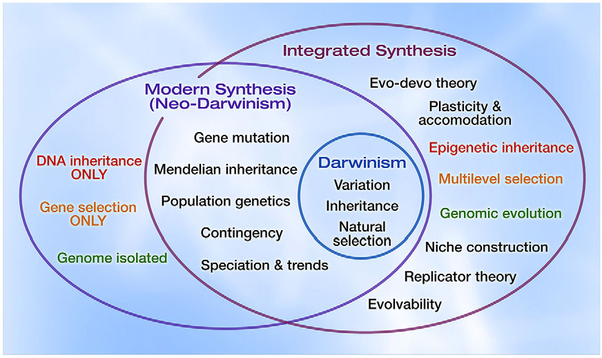
Is it really an accurate summary of the current state of evolutionary theory?
The Rev Dodgson said:
this Venn diagram:
Is it really an accurate summary of the current state of evolutionary theory?
¿ref
SCIENCE said:
The Rev Dodgson said:
this Venn diagram:
Is it really an accurate summary of the current state of evolutionary theory?
¿ref
Quora :)
I don’t know how to link to specific posts on quora.
The Rev Dodgson said:
SCIENCE said:The Rev Dodgson said:
this Venn diagram:
Is it really an accurate summary of the current state of evolutionary theory?
¿ref
Quora :)
I don’t know how to link to specific posts on quora.
The Rev Dodgson said:
The Rev Dodgson said:
SCIENCE said:
The Rev Dodgson said:
this Venn diagram:
Is it really an accurate summary of the current state of evolutionary theory?
¿ref
Quora :)
I don’t know how to link to specific posts on quora.
Experimental results in epigenetics and related fields of biological research show that the Modern Synthesis (neo-Darwinist) theory of evolution requires either extension or replacement. This article examines the conceptual framework of neo-Darwinism, including the concepts of ‘gene’, ‘selfish’, ‘code’, ‘program’, ‘blueprint’, ‘book of life’, ‘replicator’ and ‘vehicle’. This form of representation is a barrier to extending or replacing existing theory as it confuses conceptual and empirical matters. These need to be clearly distinguished. In the case of the central concept of ‘gene’, the definition has moved all the way from describing a necessary cause (defined in terms of the inheritable phenotype itself) to an empirically testable hypothesis (in terms of causation by DNA sequences). Neo-Darwinism also privileges ‘genes’ in causation, whereas in multi-way networks of interactions there can be no privileged cause. An alternative conceptual framework is proposed that avoids these problems, and which is more favourable to an integrated systems view of evolution.
Well there you go they’ve proposed an alternative framework and it’s been cited 104 times so we’re guessing it’sn’t widely considered really an accurate summary of the current state of evolutionary theory at this time.
The Rev Dodgson said:
this Venn diagram:
Is it really an accurate summary of the current state of evolutionary theory?
Nice. I work with a young fellow who is studying genetics at uni, and we have been having some lovely discussions about the wide scope of genetic change and evolution in the last couple of weeks (among many other things!). He hasn’t used all these terms, but looking up ‘evolvability’ I can see that he did cover that one.
consider this interesting incentive from WAPOL

Arts said:
consider this interesting incentive from WAPOL
so it’s inequitable
Arts said:
consider this interesting incentive from WAPOL
congratulation Arts.
Arts said:
consider this interesting incentive from WAPOL
That is a good idea and a decent reward
SCIENCE said:
Arts said:
consider this interesting incentive from WAPOL
so it’s inequitable
it is?
Arts said:
SCIENCE said:
Arts said:
consider this interesting incentive from WAPOL
so it’s inequitable
it is?
publicly funded travel allowances for provisional driving graduates just seem absurd to us, if you are gonna do, just do it for everyone
SCIENCE said:
Arts said:
SCIENCE said:
so it’s inequitable
it is?
publicly funded travel allowances for provisional driving graduates just seem absurd to us, if you are gonna do, just do it for everyone
LOL.
:-)
SCIENCE said:
Arts said:
SCIENCE said:
so it’s inequitable
it is?
publicly funded travel allowances for provisional driving graduates just seem absurd to us, if you are gonna do, just do it for everyone
Thanks for your comments diddley-science.
SCIENCE said:
Arts said:
SCIENCE said:
so it’s inequitable
it is?
publicly funded travel allowances for provisional driving graduates just seem absurd to us, if you are gonna do, just do it for everyone
fair enough, but it a good incentive to have younger/newer drivers think about their driving until they gain the necessary experience to know what road rules they can actually get away with
Arts said:
SCIENCE said:Arts said:
it is?
publicly funded travel allowances for provisional driving graduates just seem absurd to us, if you are gonna do, just do it for everyone
fair enough, but it a good incentive to have younger/newer drivers think about their driving until they gain the necessary experience to know what road rules they can actually get away with
SCIENCE was usurping a theme from a discussion yesterday.
ChrispenEvan said:
Arts said:
SCIENCE said:publicly funded travel allowances for provisional driving graduates just seem absurd to us, if you are gonna do, just do it for everyone
fair enough, but it a good incentive to have younger/newer drivers think about their driving until they gain the necessary experience to know what road rules they can actually get away with
SCIENCE was usurping a theme from a discussion yesterday.
oh, ok… in that case, I support TRD’s response.
SCIENCE said:
Arts said:
SCIENCE said:
so it’s inequitable
it is?
publicly funded travel allowances for provisional driving graduates just seem absurd to us, if you are gonna do, just do it for everyone
Pay that one.
Arts said:
consider this interesting incentive from WAPOL
Geat idea.
re-post for MV.
The Rev Dodgson said:
From this week’s New Scientist:Why taking our grief out into nature can help us heal ourselves
If you haven’t experienced a significant loss in your life, then you are one of the lucky ones. If you have – be it a spouse, child or close friend – then you probably already know how it can feel like losing your mind. Which, in some ways, you are.
In her extensive grief research, Mary-Frances O’Connor explains that when we experience a profound loss, our brains have to begin a lengthy process of rewiring all of the pathways and predictions they made based on a loved one’s presence, gradually switching over to an understanding of their absence. It can take years for our bodies to make sense of loss as we navigate continual yearning while adapting to a new way of life.
And it isn’t just our brain chemistry turned upside down, but our whole bodies too. Research shows that grief increases our heart rate and blood pressure, makes us more prone to heart attacks and raises the risk for cardiovascular disease, infections, inflammation, cancer and chronic diseases like diabetes. Closeness to our loved ones is protective against all sorts of external stresses in everyday life, but when they are gone, we are more likely to feel exposed to what life throws at us, causing a flood of stress hormones that affect our cardiovascular and immune systems.
This should encourage us to give our grieving the space and support it deserves, rather than shutting it away and avoiding it. A 2022 report by the UK Commission on Bereavement highlighted that we need to do a lot better in how we support grief at home, in schools and in the workplace. Too often, we don’t know how to talk about grief, how to support the bodies of those grieving or how to show compassion for ourselves and each other. In many ways, we are still wed to the idea that grief progresses in stages towards an endpoint, as psychiatrist Elisabeth Kübler-Ross famously formulated. However, the idea that we might pass through steps in a linear fashion only exerts undue pressure to “move on”.
In reality, grief moves in cycles and is never “done”, which is why, as an outdoor psychotherapist, I am passionate about getting people outside to tend to their grief in a non-judgemental environment where the circularity of life and death, joy and sadness, is the norm.
In the shifting landscape of grief, what we need is solid ground on which to learn how to function anew without intrusion from the demands of our busy, indoor lives. Time outside promotes mindfulness, allowing the griever to anchor themselves in the soothing senses of nature. It offers solitude and space for contemplation, a soundscape that is ambient and restorative, something beautiful to focus on other than our loss. Getting outside often dials down the feelings of rumination and despair that grief ramps up, even if just for a short while.
There isn’t yet much research on nature-based support for grieving people specifically, but there is an abundance of research on the physiological benefits of connecting with nature that can usefully counter many of the impacts of grief. Time outside lowers our blood pressure and the production of stress hormones, reduces inflammation and decreases the risk of heart disease. So it is an intuitive pairing to take our grieving bodies outside.
Grief isn’t pathological and doesn’t often require medication, but it is something we all need support for in the long term and can learn to be a better companion for others in. Bereavement is so ubiquitous that it is vital we learn how to tend to it using the resources we have around us. It is crucial that our green sanctuary spaces and green social projects are invested in, for their own sake, but also for this most human experience that we will all face, one way or another.
Ruth Allen is the author of Weathering: How the Earth’s deep wisdom can help us endure life’s storms
The Rev Dodgson said:
re-post for MV.The Rev Dodgson said:
From this week’s New Scientist:Why taking our grief out into nature can help us heal ourselves
If you haven’t experienced a significant loss in your life, then you are one of the lucky ones. If you have – be it a spouse, child or close friend – then you probably already know how it can feel like losing your mind. Which, in some ways, you are.
In her extensive grief research, Mary-Frances O’Connor explains that when we experience a profound loss, our brains have to begin a lengthy process of rewiring all of the pathways and predictions they made based on a loved one’s presence, gradually switching over to an understanding of their absence. It can take years for our bodies to make sense of loss as we navigate continual yearning while adapting to a new way of life.
And it isn’t just our brain chemistry turned upside down, but our whole bodies too. Research shows that grief increases our heart rate and blood pressure, makes us more prone to heart attacks and raises the risk for cardiovascular disease, infections, inflammation, cancer and chronic diseases like diabetes. Closeness to our loved ones is protective against all sorts of external stresses in everyday life, but when they are gone, we are more likely to feel exposed to what life throws at us, causing a flood of stress hormones that affect our cardiovascular and immune systems.
This should encourage us to give our grieving the space and support it deserves, rather than shutting it away and avoiding it. A 2022 report by the UK Commission on Bereavement highlighted that we need to do a lot better in how we support grief at home, in schools and in the workplace. Too often, we don’t know how to talk about grief, how to support the bodies of those grieving or how to show compassion for ourselves and each other. In many ways, we are still wed to the idea that grief progresses in stages towards an endpoint, as psychiatrist Elisabeth Kübler-Ross famously formulated. However, the idea that we might pass through steps in a linear fashion only exerts undue pressure to “move on”.
In reality, grief moves in cycles and is never “done”, which is why, as an outdoor psychotherapist, I am passionate about getting people outside to tend to their grief in a non-judgemental environment where the circularity of life and death, joy and sadness, is the norm.
In the shifting landscape of grief, what we need is solid ground on which to learn how to function anew without intrusion from the demands of our busy, indoor lives. Time outside promotes mindfulness, allowing the griever to anchor themselves in the soothing senses of nature. It offers solitude and space for contemplation, a soundscape that is ambient and restorative, something beautiful to focus on other than our loss. Getting outside often dials down the feelings of rumination and despair that grief ramps up, even if just for a short while.
There isn’t yet much research on nature-based support for grieving people specifically, but there is an abundance of research on the physiological benefits of connecting with nature that can usefully counter many of the impacts of grief. Time outside lowers our blood pressure and the production of stress hormones, reduces inflammation and decreases the risk of heart disease. So it is an intuitive pairing to take our grieving bodies outside.
Grief isn’t pathological and doesn’t often require medication, but it is something we all need support for in the long term and can learn to be a better companion for others in. Bereavement is so ubiquitous that it is vital we learn how to tend to it using the resources we have around us. It is crucial that our green sanctuary spaces and green social projects are invested in, for their own sake, but also for this most human experience that we will all face, one way or another.
Ruth Allen is the author of Weathering: How the Earth’s deep wisdom can help us endure life’s storms
Ta. Appreciate it.
:)
In the movie Planet of the Apes, Taylor says, “Take your stinkin’ paws off me, you damn dirty ape.”
When discussing any of the Great Apes, I would use the term “hands” rather than “paws”.
dv said:
In the movie Planet of the Apes, Taylor says, “Take your stinkin’ paws off me, you damn dirty ape.”When discussing any of the Great Apes, I would use the term “hands” rather than “paws”.
Go for the middle road: ‘appendages’.
dv said:
In the movie Planet of the Apes, Taylor says, “Take your stinkin’ paws off me, you damn dirty ape.”When discussing any of the Great Apes, I would use the term “hands” rather than “paws”.
“Paws” is a means of dehumanising the apes. “Hands” are for humans.
Dark Orange said:
captain_spalding said:
dv said:
In the movie Planet of the Apes, Taylor says, “Take your stinkin’ paws off me, you damn dirty ape.”
When discussing any of the Great Apes, I would use the term “hands” rather than “paws”.
Go for the middle road: ‘appendages’.
“Paws” is a means of dehumanising the apes. “Hands” are for humans.


dv said:
Anything but the metric system.
captain_spalding said:
dv said:
Anything but the metric system.
What Happens After Evolution
dv said:
I am not aware of katyids where I live. Grasshoppers are plentiful in the spring an early summer, once the weather warms up a bit. I assure you they fly in warm to hot temps.
Also, I am sure bees here still fly on hot summer days. They become a bit of an annoyance around swimming pools, especially kiddies wading pools as they go in search of water on hot days, just as the kiddies want to splash around to cool off.
So it is not appropriate to where I live.
party_pants said:
dv said:
I am not aware of katyids where I live. Grasshoppers are plentiful in the spring an early summer, once the weather warms up a bit. I assure you they fly in warm to hot temps.
Also, I am sure bees here still fly on hot summer days. They become a bit of an annoyance around swimming pools, especially kiddies wading pools as they go in search of water on hot days, just as the kiddies want to splash around to cool off.So it is not appropriate to where I live.
Only works in countries that use Fahrenheit, normal countries don’t use insects, they use Celsius…
furious said:
party_pants said:
dv said:
I am not aware of katyids where I live. Grasshoppers are plentiful in the spring an early summer, once the weather warms up a bit. I assure you they fly in warm to hot temps.
Also, I am sure bees here still fly on hot summer days. They become a bit of an annoyance around swimming pools, especially kiddies wading pools as they go in search of water on hot days, just as the kiddies want to splash around to cool off.So it is not appropriate to where I live.
Only works in countries that use Fahrenheit, normal countries don’t use insects, they use Celsius…
Well that’s not what we use, K¿
SCIENCE said:
furious said:
party_pants said:
I am not aware of katyids where I live. Grasshoppers are plentiful in the spring an early summer, once the weather warms up a bit. I assure you they fly in warm to hot temps.
Also, I am sure bees here still fly on hot summer days. They become a bit of an annoyance around swimming pools, especially kiddies wading pools as they go in search of water on hot days, just as the kiddies want to splash around to cool off.So it is not appropriate to where I live.
Only works in countries that use Fahrenheit, normal countries don’t use insects, they use Celsius…
Well that’s not what we use, K¿
Well, you’re not a country, nor are you particularly normal…
captain_spalding said:
dv said:
Anything but the metric system.
But but their scientists use metric.

dv said:
That’s a bloody big page.
Shopped.
dv said:
That’s about the size of one Australian sheep station.
Kingy said:
dv said:
That’s about the size of one Australian sheep station.
That’s a very long letter.
party_pants said:
Kingy said:
dv said:
That’s about the size of one Australian sheep station.
That’s a very long letter.
Consider the statement; Australia gets more snow than Switzerland and then place a map of Switzerland on the map of Australia.
Kingy said:
dv said:
That’s about the size of one Australian sheep station.
Gina Rinehart owns more land than that.
Now Do Minecraft
SCIENCE said:
Now Do Minecraft
:)

dv said:
They also eat more whales than all of those countries put together.
dv said:
should are better projections for these
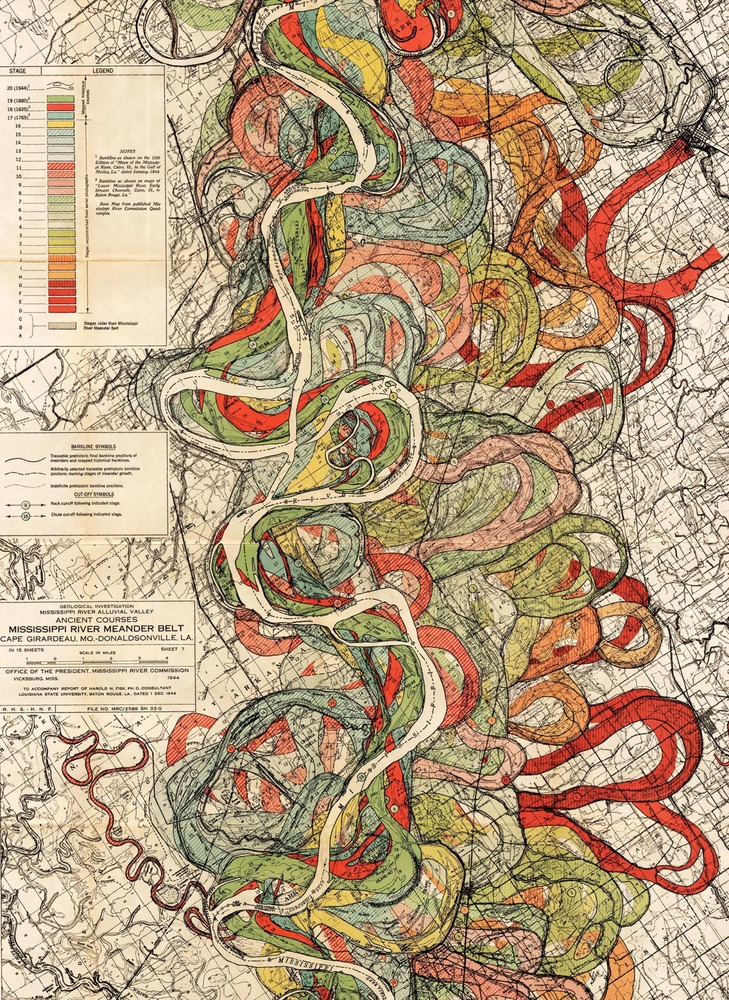
dv said:
Intestinal interpretation of river systems.
dv said:
One of my most favourite maps. Thanks.
dv said:
Nice. Not the sort of changes you’d be aware of over a few decades.
Unless you are… The creek at the bottom of my front yard is at a pinch point. 30 years ago there were 2 equal courses. One gradually became a billabong. Now I notice that there is a brand new course.

dv said:
I read that as “I’m not black” 3 or 4 times before noticing it was lacking an l.
I’m pretty sure I haven’t seen those words in that order before, but I’m not sure how much consideration it deserves.
dv said:
Gosh.
dv said:
probably a funnel web.
The Rev Dodgson said:
dv said:
I read that as “I’m not black” 3 or 4 times before noticing it was lacking an l.
I’m pretty sure I haven’t seen those words in that order before, but I’m not sure how much consideration it deserves.
Seems everyone else found it worthy of consideration, so just ignore me.
The Rev Dodgson said:
The Rev Dodgson said:I’ve not known anyone to report a spider climbing out of a body part, but maggots plenty of times, generally on diabetic foot ulcers.dv said:Seems everyone else found it worthy of consideration, so just ignore me.I read that as “I’m not black” 3 or 4 times before noticing it was lacking an l.
I’m pretty sure I haven’t seen those words in that order before, but I’m not sure how much consideration it deserves.
ChrispenEvan said:
dv said:
probably a funnel web.
A spider web would indicate it hasn’t seen use for probably ages.
The Rev Dodgson said:
dv said:
I read that as “I’m not black” 3 or 4 times before noticing it was lacking an l.
I’m pretty sure I haven’t seen those words in that order before, but I’m not sure how much consideration it deserves.
No one wants to acknowledge mannequin vagina spider trauma (MVST) but it is a real problem in the medical profession.

dv said:
So not only fit, but also adaptable.
Well done ginkos.
dv said:
Luckily Ginkgoes are gymnosperms and likely have never needed insects to pollinate them.
the wobblies do not eat the gingko. that’s a win for survival..
sarahs mum said:
the wobblies do not eat the gingko. that’s a win for survival..
I’ll be making a wobbly meatloaf on Thursday.
Michael V said:
dv said:
Luckily Ginkgoes are gymnosperms and likely have never needed insects to pollinate them.
Might have been referring to these findings about thrip-pollination of gymnosperms.
https://www.researchgate.net/publication/225054535_Thrips_pollination_of_Mesozoic_gymnosperms
There are more hydrogen atoms in a molecule of water than there are stars in the solar system.
ChrispenEvan said:
There are more hydrogen atoms in a molecule of water than there are stars in the solar system.

dv said:
Michael V said:
dv said:
Luckily Ginkgoes are gymnosperms and likely have never needed insects to pollinate them.
Might have been referring to these findings about thrip-pollination of gymnosperms.
https://www.researchgate.net/publication/225054535_Thrips_pollination_of_Mesozoic_gymnosperms
Or maybe not.
Abstract
Within modern gymnosperms, conifers and Ginkgo are exclusively wind pollinated whereas many gnetaleans and cycads are insect pollinated. For cycads, thrips are specialized pollinators. We report such a specialized pollination mode from Early Cretaceous amber of Spain, wherein four female thrips representing a genus and two species in the family Melanthripidae were covered by abundant Cycadopites pollen grains. These females bear unique ring setae interpreted as specialized structures for pollen grain collection, functionally equivalent to the hook-tipped sensilla and plumose setae on the bodies of bees. The most parsimonious explanation for this structure is parental food provisioning for larvae, indicating subsociality. This association provides direct evidence of specialized collection and transportation of pollen grains and likely gymnosperm pollination by 110-105 million years ago, possibly considerably earlier.
ChrispenEvan said:
There are more hydrogen atoms in a molecule of water than there are stars in the solar system.
ltjtb…
dv said:
ChrispenEvan said:
There are more hydrogen atoms in a molecule of water than there are stars in the solar system.
I think that is a tad over the top response.


Gigantic ocean discovered 400 miles beneath Earth’s surface challenges what we know about the planet’s water
https://www.good.is/ocean-discovered-700-km-beneath-earths-surface-challenges-what-we-know-about-the-planets-water
During this study, they finally discovered a colossal body of water trapped inside a blue rock called ringwoodite. Ringwoodite is a deep blue mineral, chemically similar to peridot, a green mineral often used in jewelry. “The ringwoodite is like a sponge, soaking up water,” Steven Jacobsen of Northwestern University in Evanston, Illinois, said, per a university press release. “There is something very special about the crystal structure of ringwoodite that allows it to attract hydrogen and trap water. This mineral can contain a lot of water under conditions of the deep mantle.”
More..
Tau.Neutrino said:

Gigantic ocean discovered 400 miles beneath Earth’s surface challenges what we know about the planet’s water
https://www.good.is/ocean-discovered-700-km-beneath-earths-surface-challenges-what-we-know-about-the-planets-water
During this study, they finally discovered a colossal body of water trapped inside a blue rock called ringwoodite. Ringwoodite is a deep blue mineral, chemically similar to peridot, a green mineral often used in jewelry. “The ringwoodite is like a sponge, soaking up water,” Steven Jacobsen of Northwestern University in Evanston, Illinois, said, per a university press release. “There is something very special about the crystal structure of ringwoodite that allows it to attract hydrogen and trap water. This mineral can contain a lot of water under conditions of the deep mantle.”
More..
Something that they didn’t mention: around 75% of the water that Americans use is simply thrown on the ground. They do loveto water their lawns.
dv said:
ChrispenEvan said:
There are more hydrogen atoms in a molecule of water than there are stars in the solar system.
Not touching that one.
Tau.Neutrino said:

Gigantic ocean discovered 400 miles beneath Earth’s surface challenges what we know about the planet’s water
https://www.good.is/ocean-discovered-700-km-beneath-earths-surface-challenges-what-we-know-about-the-planets-water
During this study, they finally discovered a colossal body of water trapped inside a blue rock called ringwoodite. Ringwoodite is a deep blue mineral, chemically similar to peridot, a green mineral often used in jewelry. “The ringwoodite is like a sponge, soaking up water,” Steven Jacobsen of Northwestern University in Evanston, Illinois, said, per a university press release. “There is something very special about the crystal structure of ringwoodite that allows it to attract hydrogen and trap water. This mineral can contain a lot of water under conditions of the deep mantle.”
More..
uh
captain_spalding said:
Tau.Neutrino said:A few years ago I read an article in which some Americans (I forget which state) were requested to reduce their water use. The goal was to get it under x gallons/day. Melburnians at the time used less than x litres/day.Something that they didn’t mention: around 75% of the water that Americans use is simply thrown on the ground. They do loveto water their lawns.
Gigantic ocean discovered 400 miles beneath Earth’s surface challenges what we know about the planet’s water
https://www.good.is/ocean-discovered-700-km-beneath-earths-surface-challenges-what-we-know-about-the-planets-water
During this study, they finally discovered a colossal body of water trapped inside a blue rock called ringwoodite. Ringwoodite is a deep blue mineral, chemically similar to peridot, a green mineral often used in jewelry. “The ringwoodite is like a sponge, soaking up water,” Steven Jacobsen of Northwestern University in Evanston, Illinois, said, per a university press release. “There is something very special about the crystal structure of ringwoodite that allows it to attract hydrogen and trap water. This mineral can contain a lot of water under conditions of the deep mantle.”
More..
Peak Warming Man said:
dv said:
ChrispenEvan said:
There are more hydrogen atoms in a molecule of water than there are stars in the solar system.
Not touching that one.
Rotating clown head nightmares.
OCDC said:
A few years ago I read an article in which some Americans (I forget which state) were requested to reduce their water use. The goal was to get it under x gallons/day. Melburnians at the time used less than x litres/day.
On one of those ‘house hunter’ shows on the 9Life channel, there was an epsiode about an American couple being shown around a housem, in California, IIRC.
It had a dual flush toilet. The potential buyers were puzzled. The real estate agent, or whatever, explained that it’s an Australian idea (yay!), and that one of the buttons delivers only a ‘half-flush’.
They looked amazed at that, but when he continued that it was intended to save on water consumption, their mouths literally opened in surprise. Saving water? Why would anyone want to do that?!
Tau.Neutrino said:

Gigantic ocean discovered 400 miles beneath Earth’s surface challenges what we know about the planet’s water
https://www.good.is/ocean-discovered-700-km-beneath-earths-surface-challenges-what-we-know-about-the-planets-water
During this study, they finally discovered a colossal body of water trapped inside a blue rock called ringwoodite. Ringwoodite is a deep blue mineral, chemically similar to peridot, a green mineral often used in jewelry. “The ringwoodite is like a sponge, soaking up water,” Steven Jacobsen of Northwestern University in Evanston, Illinois, said, per a university press release. “There is something very special about the crystal structure of ringwoodite that allows it to attract hydrogen and trap water. This mineral can contain a lot of water under conditions of the deep mantle.”
More..
For very, very strange definitions of “ocean”, indeed.
Basically the use of “ocean” is a complete nonsense.
Peak Warming Man said:
dv said:
ChrispenEvan said:
There are more hydrogen atoms in a molecule of water than there are stars in the solar system.
Not touching that one.
LOL
captain_spalding said:
OCDC said:A few years ago I read an article in which some Americans (I forget which state) were requested to reduce their water use. The goal was to get it under x gallons/day. Melburnians at the time used less than x litres/day.
On one of those ‘house hunter’ shows on the 9Life channel, there was an epsiode about an American couple being shown around a housem, in California, IIRC.
It had a dual flush toilet. The potential buyers were puzzled. The real estate agent, or whatever, explained that it’s an Australian idea (yay!), and that one of the buttons delivers only a ‘half-flush’.
They looked amazed at that, but when he continued that it was intended to save on water consumption, their mouths literally opened in surprise. Saving water? Why would anyone want to do that?!
I pee into water bottles, saves heaps of litres, I have 2 and each one can take about 2 – 4 wees.
Tau.Neutrino said:
captain_spalding said:
OCDC said:A few years ago I read an article in which some Americans (I forget which state) were requested to reduce their water use. The goal was to get it under x gallons/day. Melburnians at the time used less than x litres/day.
On one of those ‘house hunter’ shows on the 9Life channel, there was an epsiode about an American couple being shown around a housem, in California, IIRC.
It had a dual flush toilet. The potential buyers were puzzled. The real estate agent, or whatever, explained that it’s an Australian idea (yay!), and that one of the buttons delivers only a ‘half-flush’.
They looked amazed at that, but when he continued that it was intended to save on water consumption, their mouths literally opened in surprise. Saving water? Why would anyone want to do that?!
I pee into water bottles, saves heaps of litres, I have 2 and each one can take about 2 – 4 wees.
Leave them in fridges in shops, they’d appreciate that
Michael V said:
Tau.Neutrino said:

Gigantic ocean discovered 400 miles beneath Earth’s surface challenges what we know about the planet’s water
https://www.good.is/ocean-discovered-700-km-beneath-earths-surface-challenges-what-we-know-about-the-planets-water
During this study, they finally discovered a colossal body of water trapped inside a blue rock called ringwoodite. Ringwoodite is a deep blue mineral, chemically similar to peridot, a green mineral often used in jewelry. “The ringwoodite is like a sponge, soaking up water,” Steven Jacobsen of Northwestern University in Evanston, Illinois, said, per a university press release. “There is something very special about the crystal structure of ringwoodite that allows it to attract hydrogen and trap water. This mineral can contain a lot of water under conditions of the deep mantle.”
More..
For very, very strange definitions of “ocean”, indeed.
Basically the use of “ocean” is a complete nonsense.
Yes it is directed at a target audience, the water is held in a kind of spongy rock.
I store all my urine bottles in my shed so the aliens can’t read my mind
wookiemeister said:
Tau.Neutrino said:
captain_spalding said:On one of those ‘house hunter’ shows on the 9Life channel, there was an epsiode about an American couple being shown around a housem, in California, IIRC.
It had a dual flush toilet. The potential buyers were puzzled. The real estate agent, or whatever, explained that it’s an Australian idea (yay!), and that one of the buttons delivers only a ‘half-flush’.
They looked amazed at that, but when he continued that it was intended to save on water consumption, their mouths literally opened in surprise. Saving water? Why would anyone want to do that?!
I pee into water bottles, saves heaps of litres, I have 2 and each one can take about 2 – 4 wees.
Leave them in fridges in shops, they’d appreciate that
I’ll consider it.
wookiemeister said:
I store all my urine bottles in my shed so the aliens can’t read my mind
The connection would confuse them.

Tau.Neutrino said:
Michael V said:
Tau.Neutrino said:

Gigantic ocean discovered 400 miles beneath Earth’s surface challenges what we know about the planet’s water
https://www.good.is/ocean-discovered-700-km-beneath-earths-surface-challenges-what-we-know-about-the-planets-water
During this study, they finally discovered a colossal body of water trapped inside a blue rock called ringwoodite. Ringwoodite is a deep blue mineral, chemically similar to peridot, a green mineral often used in jewelry. “The ringwoodite is like a sponge, soaking up water,” Steven Jacobsen of Northwestern University in Evanston, Illinois, said, per a university press release. “There is something very special about the crystal structure of ringwoodite that allows it to attract hydrogen and trap water. This mineral can contain a lot of water under conditions of the deep mantle.”
More..
For very, very strange definitions of “ocean”, indeed.
Basically the use of “ocean” is a complete nonsense.
Yes it is directed at a target audience, the water is held in a kind of spongy rock.
No it is not.
poikilotherm said:
“I did it for my country.”
poikilotherm said:
The early Olympics were performed nude, and there appears to be a trend back in that direction.
Is the difference between city and country people global?
Tau.Neutrino said:
poikilotherm said:
The early Olympics were performed nude, and there appears to be a trend back in that direction.
There’s a big difference between lycra and nudity.
Tau.Neutrino said:
Is the difference between city and country people global?
No. In Belgium they are all arseholes.
Michael V said:
Tau.Neutrino said:
Michael V said:For very, very strange definitions of “ocean”, indeed.
Basically the use of “ocean” is a complete nonsense.
Yes it is directed at a target audience, the water is held in a kind of spongy rock.
No it is not.
The article says it is, quite a few times.
Link to paper
Dehydration melting at the top of the lower mantle
The water cycle involves more than just the water that circulates between the atmosphere, oceans, and surface waters. It extends deep into Earth’s interior as the oceanic crust subducts, or slides, under adjoining plates of crust and sinks into the mantle, carrying water with it. Schmandt et al. combined seismological observations beneath North America with geodynamical modeling and high-pressure and -temperature melting experiments. They conclude that the mantle transition zone—410 to 660 km below Earth’s surface—acts as a large reservoir of water.
https://www.science.org/doi/10.1126/science.1253358
Tau.Neutrino said:
Michael V said:
Tau.Neutrino said:Yes it is directed at a target audience, the water is held in a kind of spongy rock.
No it is not.
The article says it is, quite a few times.
Link to paper
Dehydration melting at the top of the lower mantle
The water cycle involves more than just the water that circulates between the atmosphere, oceans, and surface waters. It extends deep into Earth’s interior as the oceanic crust subducts, or slides, under adjoining plates of crust and sinks into the mantle, carrying water with it. Schmandt et al. combined seismological observations beneath North America with geodynamical modeling and high-pressure and -temperature melting experiments. They conclude that the mantle transition zone—410 to 660 km below Earth’s surface—acts as a large reservoir of water.
https://www.science.org/doi/10.1126/science.1253358
I read the paper yesterday. Yes, the mantle transition zone contains some reservoirs of water, but it’s neither like an ocean nor like a spongy rock. Have a read of the comments dv and I made yesterday.
Tau.Neutrino said:
Michael V said:
Tau.Neutrino said:Yes it is directed at a target audience, the water is held in a kind of spongy rock.
No it is not.
The article says it is, quite a few times.
Link to paper
Dehydration melting at the top of the lower mantle
The water cycle involves more than just the water that circulates between the atmosphere, oceans, and surface waters. It extends deep into Earth’s interior as the oceanic crust subducts, or slides, under adjoining plates of crust and sinks into the mantle, carrying water with it. Schmandt et al. combined seismological observations beneath North America with geodynamical modeling and high-pressure and -temperature melting experiments. They conclude that the mantle transition zone—410 to 660 km below Earth’s surface—acts as a large reservoir of water.
https://www.science.org/doi/10.1126/science.1253358
I think the key point being made here is while the paper might say it, the paper is wrong. It is not spongy rock containing “water” as such. It is solid minerals which incorporated water in the chemical reactions during their formation. A bit like concrete forms a new structure from all the various components mixed together in the mixer plant, which include lots of water, but you wouldn’t say concrete is a spongy form of water storage.
Tau.Neutrino said:

Gigantic ocean discovered 400 miles beneath Earth’s surface challenges what we know about the planet’s water
https://www.good.is/ocean-discovered-700-km-beneath-earths-surface-challenges-what-we-know-about-the-planets-water
During this study, they finally discovered a colossal body of water trapped inside a blue rock called ringwoodite. Ringwoodite is a deep blue mineral, chemically similar to peridot, a green mineral often used in jewelry. “The ringwoodite is like a sponge, soaking up water,” Steven Jacobsen of Northwestern University in Evanston, Illinois, said, per a university press release. “There is something very special about the crystal structure of ringwoodite that allows it to attract hydrogen and trap water. This mineral can contain a lot of water under conditions of the deep mantle.”
More..
YOU ALREADY POSTED THAT NONSENSE.
I already posted this:
Jesus fucking Christ (rubs temples), I don’t think I’ve ever seen a headline or lede that worse represents a journal article.The article is about the minerals found in the lower mantle. It is saying that there are more hydrated minerals than previous models indicated.
It means there is more stuff such as serpentinite and brucite than previously thought.
Here is some Brucite. It is “hydrated “ in that is has the hydroxide group. It is Mg(OH)2, which can be analysed as MgO plus H2O. It is solid.
Towards the bottom of the mantle you’ll get some pockets of “partial melting” and the magma so formed will be higher in volatiles than the source rock, but it is still very much magma with a very small % of water.
party_pants said:
Tau.Neutrino said:
Michael V said:No it is not.
The article says it is, quite a few times.
Link to paper
Dehydration melting at the top of the lower mantle
The water cycle involves more than just the water that circulates between the atmosphere, oceans, and surface waters. It extends deep into Earth’s interior as the oceanic crust subducts, or slides, under adjoining plates of crust and sinks into the mantle, carrying water with it. Schmandt et al. combined seismological observations beneath North America with geodynamical modeling and high-pressure and -temperature melting experiments. They conclude that the mantle transition zone—410 to 660 km below Earth’s surface—acts as a large reservoir of water.
https://www.science.org/doi/10.1126/science.1253358
I think the key point being made here is while the paper might say it, the paper is wrong. It is not spongy rock containing “water” as such. It is solid minerals which incorporated water in the chemical reactions during their formation. A bit like concrete forms a new structure from all the various components mixed together in the mixer plant, which include lots of water, but you wouldn’t say concrete is a spongy form of water storage.
Ok, found some info here that helps to clear things up.
https://education.nationalgeographic.org/resource/mantle/
What is the water in the transition zone of the earth’s mantle?
Water in the transition zone is not “water” as we know it. It is not liquid, vapor, solid, or even plasma. Instead, water exists as hydroxide. Hydroxide is an ion of hydrogen and oxygen with a negative charge. In the transition zone, hydroxide ions are trapped in the crystalline structure of rocks such as ringwoodite and wadsleyite. These minerals are formed from olivine at very high temperatures and pressure.
Tau.Neutrino said:
party_pants said:
Tau.Neutrino said:The article says it is, quite a few times.
Link to paper
Dehydration melting at the top of the lower mantle
The water cycle involves more than just the water that circulates between the atmosphere, oceans, and surface waters. It extends deep into Earth’s interior as the oceanic crust subducts, or slides, under adjoining plates of crust and sinks into the mantle, carrying water with it. Schmandt et al. combined seismological observations beneath North America with geodynamical modeling and high-pressure and -temperature melting experiments. They conclude that the mantle transition zone—410 to 660 km below Earth’s surface—acts as a large reservoir of water.
https://www.science.org/doi/10.1126/science.1253358
I think the key point being made here is while the paper might say it, the paper is wrong. It is not spongy rock containing “water” as such. It is solid minerals which incorporated water in the chemical reactions during their formation. A bit like concrete forms a new structure from all the various components mixed together in the mixer plant, which include lots of water, but you wouldn’t say concrete is a spongy form of water storage.
Ok, found some info here that helps to clear things up.
https://education.nationalgeographic.org/resource/mantle/
What is the water in the transition zone of the earth’s mantle?
Water in the transition zone is not “water” as we know it. It is not liquid, vapor, solid, or even plasma. Instead, water exists as hydroxide. Hydroxide is an ion of hydrogen and oxygen with a negative charge. In the transition zone, hydroxide ions are trapped in the crystalline structure of rocks such as ringwoodite and wadsleyite. These minerals are formed from olivine at very high temperatures and pressure.
Excellent. let us never speak of this again.
taps nose
party_pants said:
Tau.Neutrino said:
party_pants said:I think the key point being made here is while the paper might say it, the paper is wrong. It is not spongy rock containing “water” as such. It is solid minerals which incorporated water in the chemical reactions during their formation. A bit like concrete forms a new structure from all the various components mixed together in the mixer plant, which include lots of water, but you wouldn’t say concrete is a spongy form of water storage.
Ok, found some info here that helps to clear things up.
https://education.nationalgeographic.org/resource/mantle/
What is the water in the transition zone of the earth’s mantle?
Water in the transition zone is not “water” as we know it. It is not liquid, vapor, solid, or even plasma. Instead, water exists as hydroxide. Hydroxide is an ion of hydrogen and oxygen with a negative charge. In the transition zone, hydroxide ions are trapped in the crystalline structure of rocks such as ringwoodite and wadsleyite. These minerals are formed from olivine at very high temperatures and pressure.
Excellent. let us never speak of this again.
taps nose
Ok, I’ll stay right away from the transition zone.
In Other News Humans Are One Big Stick Of Ferrofluid Oh Wait Right
https://www.youtube.com/watch?v=iK5dpPzjaPA
Even better, Hows about some fizzix.
https://i.imgur.com/Ob82m08.mp4
Kingy said:
https://www.youtube.com/watch?v=iK5dpPzjaPA
I subscribe to the theory that government finances work in reverse for sovereign governments who control and issue their own currency.
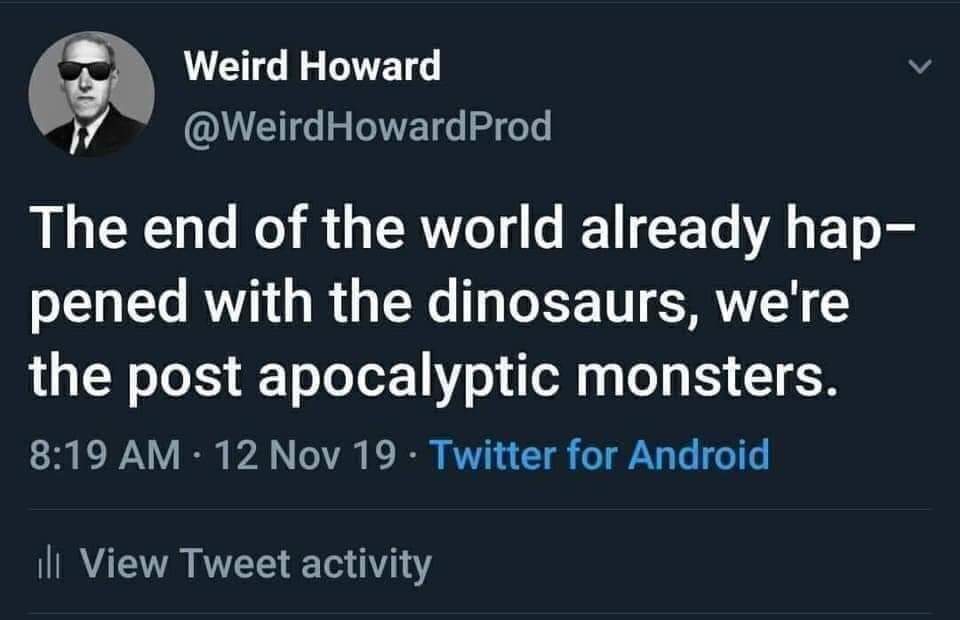
From my Facebook links:
“We all must protect the traveling swarms. Bees are our survival insurance.
🌿If bees die, we die later. Without bees, no human being will remain on the face of the Earth.”
Is that true though?
The Rev Dodgson said:
From my Facebook links:“We all must protect the traveling swarms. Bees are our survival insurance.
🌿If bees die, we die later. Without bees, no human being will remain on the face of the Earth.”Is that true though?
Not really.
The Rev Dodgson said:
From my Facebook links:“We all must protect the traveling swarms. Bees are our survival insurance.
🌿If bees die, we die later. Without bees, no human being will remain on the face of the Earth.”Is that true though?
Not really. Most grasses are wind-pollinated, so crop like wheat, rice, corn, barley etc will do just fine without bees. Also, and medium to large herbivores that eat grass will do just fine too. As will fish and other seafoods.
The Rev Dodgson said:
From my Facebook links:“We all must protect the traveling swarms. Bees are our survival insurance.
🌿If bees die, we die later. Without bees, no human being will remain on the face of the Earth.”Is that true though?
no
A geological map of Mount Vesuvius displayed at the David S. and Ruth L. Gottesman Hall of Planet Earth in the American Museum of Natural History.
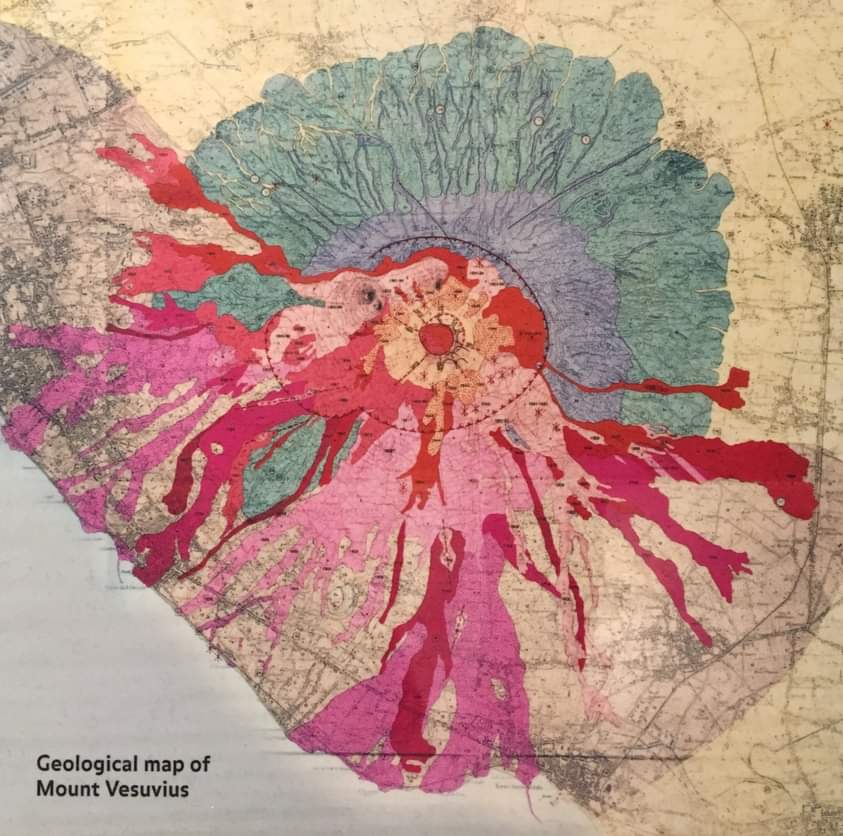
kii said:
A geological map of Mount Vesuvius displayed at the David S. and Ruth L. Gottesman Hall of Planet Earth in the American Museum of Natural History.
Stunner.
dv said:
kii said:
A geological map of Mount Vesuvius displayed at the David S. and Ruth L. Gottesman Hall of Planet Earth in the American Museum of Natural History.
Stunner.
It is.

dv said:
based
Hey, mr . Car,
Are you familiar with this?
https://archive.org/details/magazine_rack?page=2&sort=-downloads

captain_spalding said:
Hey, mr . Car,Are you familiar with this?
https://archive.org/details/magazine_rack?page=2&sort=-downloads
Yes, it’s like a huge time-travelling newsagent.
About Sex, Gender, and Sexuality
Some will find that interesting.
Some will just dismiss it.
And some will interpret it as support for whatever position they hold on this question.
The Rev Dodgson said:
About Sex, Gender, and Sexuality
Some will find that interesting.
Some will just dismiss it.
And some will interpret it as support for whatever position they hold on this question.
But will the contributor summarise it¿
SCIENCE said:
The Rev Dodgson said:
About Sex, Gender, and Sexuality
Some will find that interesting.
Some will just dismiss it.
And some will interpret it as support for whatever position they hold on this question.
But will the contributor summarise it¿
No, but here is a short extract, which gives some idea:
“Sex is one thing; gender is quite another. Gender is an expression of social and sexual identity unique to human cultures (and one that varies from culture to culture). You could say that gender is in your head, while sex is in your pants. In our culture, most people with male sex organs identify as men, but some identify as women. Similarly, some men have female sex organs, but most people with female sex characteristics identify as women; you might also identify outside of the male/female binary categories that are common but not fixed in many cultures. Your gender may also change over your lifetime, as it is a fluid trait for many people. The gender binary stereotype is often linked to sex and sexuality, but neither of these is binary; both are on spectrums across the Tree of Life.”
The Rev Dodgson said:
About Sex, Gender, and SexualitySome will find that interesting.
Some will just dismiss it.
And some will interpret it as support for whatever position they hold on this question.
Well I did find it a bit interesting
dv said:
The Rev Dodgson said:
About Sex, Gender, and SexualitySome will find that interesting.
Some will just dismiss it.
And some will interpret it as support for whatever position they hold on this question.
Well I did find it a bit interesting
It also reminded me that there are people, such as our very own Kothos, who are not curious about whether their twins are monozygotic, which does my head in.
dv said:
The Rev Dodgson said:
About Sex, Gender, and SexualitySome will find that interesting.
Some will just dismiss it.
And some will interpret it as support for whatever position they hold on this question.
Well I did find it a bit interesting
Me too.
I will read it properly and give it further cogitation before reaching a decision on the last option.
The Rev Dodgson said:
About Sex, Gender, and SexualitySome will find that interesting.
Some will just dismiss it.
And some will interpret it as support for whatever position they hold on this question.
Good article.
particle physics detector


dv said:
Nup.
party_pants said:
dv said:
Nup.
Like that is it
Oh No Poor The Rev Dodgson

This Looks Fun ¡


That reminds me that I need to make an optometrist appointment. On Monday morning, please remind me.
OCDC said:
That reminds me that I need to make an optometrist appointment. On Monday morning, please remind me.
I’m also due to get my retinas checked again.
buffy said:
OCDC said:
That reminds me that I need to make an optometrist appointment. On Monday morning, please remind me.
I’m also due to get my retinas checked again.
My GP this week advised me to book an eye appointment soon. I only have mild diabetes but she said this can still affect the eyes without the patient being aware.
buffy said:
OCDC said:
That reminds me that I need to make an optometrist appointment. On Monday morning, please remind me.
I’m also due to get my retinas checked again.
I need my eyes rechecked, I think they have gotten worse faster this time than last time..
I dont think it has anything to do with the fact that I either stare at a screen for 14 hours a day OR stare at really small things as I am arting. (I have mag glasses, but it’s still straining on the eyes)
Arts said:
buffy said:My eyes have been pretty much stable since I got my first spectacles at 14. No problem with reading yet.OCDC said:I need my eyes rechecked, I think they have gotten worse faster this time than last time..That reminds me that I need to make an optometrist appointment. On Monday morning, please remind me.I’m also due to get my retinas checked again.
I dont think it has anything to do with the fact that I either stare at a screen for 14 hours a day OR stare at really small things as I am arting. (I have mag glasses, but it’s still straining on the eyes)
OCDC said:
Arts said:buffy said:My eyes have been pretty much stable since I got my first spectacles at 14. No problem with reading yet.I’m also due to get my retinas checked again.I need my eyes rechecked, I think they have gotten worse faster this time than last time..
I dont think it has anything to do with the fact that I either stare at a screen for 14 hours a day OR stare at really small things as I am arting. (I have mag glasses, but it’s still straining on the eyes)
I definitely have more trouble reading the screen now than I did six months ago… and have to lean in closer for clear focus.
Arts said:
buffy said:
OCDC said:
That reminds me that I need to make an optometrist appointment. On Monday morning, please remind me.
I’m also due to get my retinas checked again.
I need my eyes rechecked, I think they have gotten worse faster this time than last time..
I dont think it has anything to do with the fact that I either stare at a screen for 14 hours a day OR stare at really small things as I am arting. (I have mag glasses, but it’s still straining on the eyes)
Nup, neither of those things. As I used to tell my patients…too many birthdays…
:)
Arts said:
OCDC said:
Arts said:I need my eyes rechecked, I think they have gotten worse faster this time than last time..My eyes have been pretty much stable since I got my first spectacles at 14. No problem with reading yet.I dont think it has anything to do with the fact that I either stare at a screen for 14 hours a day OR stare at really small things as I am arting. (I have mag glasses, but it’s still straining on the eyes)
I definitely have more trouble reading the screen now than I did six months ago… and have to lean in closer for clear focus.
do you use the lappy screen or have you an external one?
JudgeMental said:
Arts said:
OCDC said:
My eyes have been pretty much stable since I got my first spectacles at 14. No problem with reading yet.
I definitely have more trouble reading the screen now than I did six months ago… and have to lean in closer for clear focus.
do you use the lappy screen or have you an external one?
both
n you use the zoom function to make the stuff on the screen larger? I have mine on 150%, which works well and isn’t so big that it makes stuff hard to read cos you have to scroll a lot.
Arts said:
JudgeMental said:
Arts said:I definitely have more trouble reading the screen now than I did six months ago… and have to lean in closer for clear focus.
do you use the lappy screen or have you an external one?
both
Can hard on the eyeballs that.
JudgeMental said:
n you use the zoom function to make the stuff on the screen larger? I have mine on 150%, which works well and isn’t so big that it makes stuff hard to read cos you have to scroll a lot.
I tired that and but I move from one to another frequently over two locations and it didnt work as well everywhere.. I also think I trust the nerds in science to give me better glasses, than the geeks in IT give me bigger font..
dv said:

don’t worry he kept his glasses on

Average flag colour
dv said:

Average flag colour
That’s a bit America-centric isn’t it?

dv said:
Loved that show.
TATE on Wesley C Salmon says:
“whereas causality itself has evaded satisfactory elucidation by anyone”
Has it?
Does causality even need elucidation?
The Rev Dodgson said:
TATE on Wesley C Salmon says:
“whereas causality itself has evaded satisfactory elucidation by anyone”
Has it?
Does causality even need elucidation?
ah yes public
Kenneth J Rothman & Sander Greenland, “Causation and causal inference in epidemiology”, American Journal of Public Health, 2005;95(Suppl 1):S144-50.
health that fundamental basis of physical reality
The Rev Dodgson said:
TATE on Wesley C Salmon says:“whereas causality itself has evaded satisfactory elucidation by anyone”
Has it?
Does causality even need elucidation?
Causality as a concept is fairly clear. But whether it’s relevant to all areas of physics is more ambiguous.
Bubblecar said:
The Rev Dodgson said:
TATE on Wesley C Salmon says:“whereas causality itself has evaded satisfactory elucidation by anyone”
Has it?
Does causality even need elucidation?
Causality as a concept is fairly clear. But whether it’s relevant to all areas of physics is more ambiguous.
It is fairly clear to me that it is relevant to all areas of physics.
Why do you think otherwise?
The Rev Dodgson said:
Bubblecar said:
The Rev Dodgson said:
TATE on Wesley C Salmon says:“whereas causality itself has evaded satisfactory elucidation by anyone”
Has it?
Does causality even need elucidation?
Causality as a concept is fairly clear. But whether it’s relevant to all areas of physics is more ambiguous.
It is fairly clear to me that it is relevant to all areas of physics.
Why do you think otherwise?
Causal order can be indefinite in the quantum realm:
Quantum Mischief Rewrites the Laws of Cause and Effect
Spurred on by quantum experiments that scramble the ordering of causes and their effects, some physicists are figuring out how to abandon causality altogether.
https://www.quantamagazine.org/quantum-mischief-rewrites-the-laws-of-cause-and-effect-20210311/
Bubblecar said:
The Rev Dodgson said:
Bubblecar said:Causality as a concept is fairly clear. But whether it’s relevant to all areas of physics is more ambiguous.
It is fairly clear to me that it is relevant to all areas of physics.
Why do you think otherwise?
Causal order can be indefinite in the quantum realm:
Quantum Mischief Rewrites the Laws of Cause and Effect
Spurred on by quantum experiments that scramble the ordering of causes and their effects, some physicists are figuring out how to abandon causality altogether.
https://www.quantamagazine.org/quantum-mischief-rewrites-the-laws-of-cause-and-effect-20210311/
Thanks, looks interesting.
My current position is that causality (and time) may not work exactly as we think they do, but effects always have causes, and the causes always come before the effect, even if our clocks and our assumptions suggest otherwise.


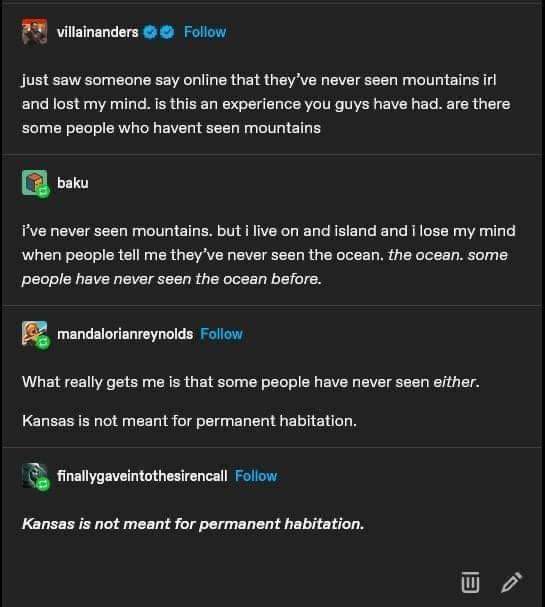
Bubblecar said:
Causal order can be indefinite in the quantum realm:Quantum Mischief Rewrites the Laws of Cause and Effect
Spurred on by quantum experiments that scramble the ordering of causes and their effects, some physicists are figuring out how to abandon causality altogether.
https://www.quantamagazine.org/quantum-mischief-rewrites-the-laws-of-cause-and-effect-20210311/
I am now about halfway through that, and it is informative and well-written, but I have the same problem with it that I have with every other article on this subject I have ever read: it makes questionable assumptions about the nature of time and space as being unquestionably true, without any discussion or even any explanation why discussion is not required.
These assumptions are encapsulated in:
“General relativity, meanwhile, suggests that space and time are malleable. In Einstein’s theory, massive objects like Earth stretch the space-time “metric” — essentially the distance between hash marks on a ruler, and the duration between ticks of clocks. The nearer you are to a massive object, for instance, the slower your clock ticks. The metric then determines the “light cone” of a nearby event — the region of space-time that the event can causally influence.”
It is assumed, with no discussion, that “time” is absolutely defined by the rate of ticking of a “clock”, and that “space” is absolutely defined by the distance between points on a ruler.
Surely the possibility of a “meta-time” and “meta-space”, that are not changed by the velocity of clocks and rulers within them, should at least be considered.
The other unquestioned assumption is that waves travel through space as separate defined entities, rather than becoming defined when they interact with other things.
Perhaps these things are so obvious to scientists that they don’t see the need to explain them, bur pop-science articles are not usually so reluctant to state the obvious, so it would be good to have an explanation in this case.
The Rev Dodgson said:
….
It is assumed, with no discussion, that “time” is absolutely defined by the rate of ticking of a “clock”, and that “space” is absolutely defined by the distance between points on a ruler.
….
Maybe I’m misunderstanding what you mean, but it is generally accepted that time and space are relative, not absolute. Time is relatively defined by the rate of a ticking clock, not absolutely defined by it. Time and the rate that a clock ticks are dependent on the spatio-temporal position of the clock relative to the spatio-temporal position of the person observing that clock. It could possibly be considered “absolute” in one very particular situation when the clock and observer are in exactly the same frame of reference, but that’s not a situation that actually ever occurs. The clock on my room wall is slightly further away from the centre of gravity of the Earth than my eyes are when I’m sitting at my desk and also describes a slightly larger compass/circumference than my eyes do as the Earth spins, and so exists in a different frame of reference than my eyes. The spation-temporal difference between my eyes and the clock may be too small to even measure, but theoretically it does exist and is real.
The Rev Dodgson said:
Surely the possibility of a “meta-time” and “meta-space”, that are not changed by the velocity of clocks and rulers within them, should at least be considered.
General relativity is one of the most successful theories there is. It predicts stuff within its wheelhouse really, really well, and seems to be an extremely accurate model of whatever it is that is actually happening. Meta stuff is therefore superfluous, and would only become worthy of consideration if GR was found by future observations to not accurately model reality.
esselte said:
The Rev Dodgson said:….
It is assumed, with no discussion, that “time” is absolutely defined by the rate of ticking of a “clock”, and that “space” is absolutely defined by the distance between points on a ruler.
….Maybe I’m misunderstanding what you mean, but it is generally accepted that time and space are relative, not absolute. Time is relatively defined by the rate of a ticking clock, not absolutely defined by it. Time and the rate that a clock ticks are dependent on the spatio-temporal position of the clock relative to the spatio-temporal position of the person observing that clock. It could possibly be considered “absolute” in one very particular situation when the clock and observer are in exactly the same frame of reference, but that’s not a situation that actually ever occurs. The clock on my room wall is slightly further away from the centre of gravity of the Earth than my eyes are when I’m sitting at my desk and also describes a slightly larger compass/circumference than my eyes do as the Earth spins, and so exists in a different frame of reference than my eyes. The spation-temporal difference between my eyes and the clock may be too small to even measure, but theoretically it does exist and is real.
The Rev Dodgson said:
Surely the possibility of a “meta-time” and “meta-space”, that are not changed by the velocity of clocks and rulers within them, should at least be considered.
General relativity is one of the most successful theories there is. It predicts stuff within its wheelhouse really, really well, and seems to be an extremely accurate model of whatever it is that is actually happening. Meta stuff is therefore superfluous, and would only become worthy of consideration if GR was found by future observations to not accurately model reality.
But we already know that GR is not consistent with QM, hence the need to invent nonsense like the order of cause and effect being relative.
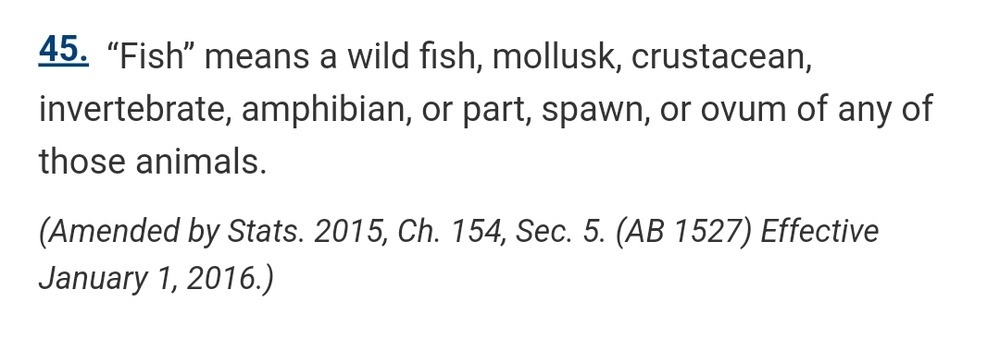
https://leginfo.legislature.ca.gov/faces/codes_displayText.xhtml?lawCode=FGC&division=0.5.&title=&part=&chapter=1.&article=
dv said:

https://leginfo.legislature.ca.gov/faces/codes_displayText.xhtml?lawCode=FGC&division=0.5.&title=&part=&chapter=1.&article=
Is ‘ghoti’ any more specific?
captain_spalding said:
dv said:
https://leginfo.legislature.ca.gov/faces/codes_displayText.xhtml?lawCode=FGC&division=0.5.&title=&part=&chapter=1.&article=
Is ‘ghoti’ any more specific?
or are they wrong

There are as many protons in a single atom of hydrogen as there are stars in the solar system.
Dark Orange said:
There are as many protons in a single atom of hydrogen as there are stars in the solar system.
:)
Michael V said:
Dark Orange said:
There are as many protons in a single atom of hydrogen as there are stars in the solar system.
:)
but the sun would be a black hole
Arts said:
now do other continents

Discord
dv said:

Discord
What is VC?
Michael V said:
dv said:

Discord
What is VC?
voice chat?
Michael V said:
dv said:

Discord
What is VC?
Voice chat
dv said:
Michael V said:
dv said:

Discord
What is VC?
Voice chat
Ta.
SCIENCE said:
Arts said:
now do other continents
Nah
Arts said:
SCIENCE said:Arts said:
now do other continents
Nah
it’s only interesting here because they just called a state of emergency due to the increase of this disease..
https://www.youtube.com/watch?v=ayhRmnFlSkE
Mark Cuban – AI Industrialization & Drug Transparency with Cost Plus Drugs | The Daily Show
Entrepreneur and minority owner of the NBA’s Dallas Mavericks, Mark Cuban, joins Jon Stewart to discuss disrupting the healthcare industry as co-founder of Cost Plus Drug Company. They discuss Silicon Valley’s goals of anointing Trump as CEO of America and serving as board members, the unpredictable future of AI, how Elon Musk utilizes X (formerly Twitter) algorithms to control the global discourse, and how drug price transparency has changed the future of our healthcare system
Dark Orange said:
There are as many protons in a single atom of hydrogen as there are stars in the solar system.
Didn’t we already consider that?
The Rev Dodgson said:
Dark Orange said:We discussed it but I am uncertain whether we considered it.There are as many protons in a single atom of hydrogen as there are stars in the solar system.Didn’t we already consider that?
OCDC said:
The Rev Dodgson said:Dark Orange said:We discussed it but I am uncertain whether we considered it.There are as many protons in a single atom of hydrogen as there are stars in the solar system.Didn’t we already consider that?
Well no-one gave any good reason why stars are so rare in the solar system, so I suppose we didn’t give it due consideration.
The Rev Dodgson said:
Dark Orange said:There are as many protons in a single atom of hydrogen as there are stars in the solar system.
Didn’t we already consider that?
DO thinks it is worthy of reconsideration. He hasn’t said why.
The Rev Dodgson said:
Dark Orange said:There are as many protons in a single atom of hydrogen as there are stars in the solar system.
Didn’t we already consider that?
We did? I should come to class more often.

OCDC said:
The Rev Dodgson said:
Dark Orange said:We discussed it but I am uncertain whether we considered it.There are as many protons in a single atom of hydrogen as there are stars in the solar system.Didn’t we already consider that?
we disgusted
If you made some sort of a metal clasp to secure a tie instead of using a tie-knot. So you’ feed the tie through the clasp mechanism and secure it tight…
would that classify as wearing a “tie”, since you haven’t “tied” it on with a knot?
party_pants said:
If you made some sort of a metal clasp to secure a tie instead of using a tie-knot. So you’ feed the tie through the clasp mechanism and secure it tight…
would that classify as wearing a “tie”, since you haven’t “tied” it on with a knot?
what do yous mean a bit like a cable tie
disclaimer don’t do this at home or at work unless it’s on a colleague you really don’t like
⚠ this post may contain satirical elements

dv said:
frotty
https://www.abc.net.au/news/2024-08-15/stonehenge-altar-stone-research-scotland/104223314
The Altar Stone at the centre of Stonehenge may have come from more than 700km away in Scotland, Australian study suggests.
party_pants said:
If you made some sort of a metal clasp to secure a tie instead of using a tie-knot. So you’ feed the tie through the clasp mechanism and secure it tight…would that classify as wearing a “tie”, since you haven’t “tied” it on with a knot?
you might use a woggle.
JudgeMental said:
party_pants said:
If you made some sort of a metal clasp to secure a tie instead of using a tie-knot. So you’ feed the tie through the clasp mechanism and secure it tight…would that classify as wearing a “tie”, since you haven’t “tied” it on with a knot?
you might use a woggle.
Or a rubber band.
JudgeMental said:
party_pants said:
If you made some sort of a metal clasp to secure a tie instead of using a tie-knot. So you’ feed the tie through the clasp mechanism and secure it tight…would that classify as wearing a “tie”, since you haven’t “tied” it on with a knot?
you might use a woggle.
Or have a bolo tie.
what is the point of a tie anyway? It doesn’t hold anything up, on, down or beneath. it just allows you to button a button that you never would if you weren’t wearing the tie…
Arts said:
what is the point of a tie anyway? It doesn’t hold anything up, on, down or beneath. it just allows you to button a button that you never would if you weren’t wearing the tie…
Eurocentric soft imperialism.
Arts said:
what is the point of a tie anyway? It doesn’t hold anything up, on, down or beneath. it just allows you to button a button that you never would if you weren’t wearing the tie…
That was my Father-in-law’s opinion and he stood by it.
It was mine as well before I met him, so we got along well on this very issue.
SCIENCE said:
Arts said:
what is the point of a tie anyway? It doesn’t hold anything up, on, down or beneath. it just allows you to button a button that you never would if you weren’t wearing the tie…
Eurocentric soft imperialism.
not so subtle symbol of a leash, or noose. Da MAN has got you tied down
Arts said:
SCIENCE said:
Arts said:
what is the point of a tie anyway? It doesn’t hold anything up, on, down or beneath. it just allows you to button a button that you never would if you weren’t wearing the tie…
Eurocentric soft imperialism.
not so subtle symbol of a leash, or noose. Da MAN has got you tied down
wait aren’t they mostly a male garment so the tie is ¿ a symbol of homoeroticism now
also the violin
Arts said:
what is the point of a tie anyway? It doesn’t hold anything up, on, down or beneath. it just allows you to button a button that you never would if you weren’t wearing the tie…
It was originally a symbol of penis size.
btm said:
Arts said:
what is the point of a tie anyway? It doesn’t hold anything up, on, down or beneath. it just allows you to button a button that you never would if you weren’t wearing the tie…It was originally a symbol of penis size.
inverse proportionality?
btm said:
Arts said:
what is the point of a tie anyway? It doesn’t hold anything up, on, down or beneath. it just allows you to button a button that you never would if you weren’t wearing the tie…It was originally a symbol of penis size.
Tamb said:
btm said:
Arts said:
what is the point of a tie anyway? It doesn’t hold anything up, on, down or beneath. it just allows you to button a button that you never would if you weren’t wearing the tie…
It was originally a symbol of penis size.
If that is correct, how do you explain bow ties?
ambiguous genitalia
Arts said:
what is the point of a tie anyway? It doesn’t hold anything up, on, down or beneath. it just allows you to button a button that you never would if you weren’t wearing the tie…
Cold weather clothes.
Michael V said:
Arts said:
what is the point of a tie anyway? It doesn’t hold anything up, on, down or beneath. it just allows you to button a button that you never would if you weren’t wearing the tie…Cold weather clothes.
that can’t be it.
Arts said:
Michael V said:
Arts said:
what is the point of a tie anyway? It doesn’t hold anything up, on, down or beneath. it just allows you to button a button that you never would if you weren’t wearing the tie…Cold weather clothes.
that can’t be it.
Scarves were probably already in use for that.
A tie cannot do what a scarf does.
roughbarked said:
Arts said:
Michael V said:Cold weather clothes.
that can’t be it.
Scarves were probably already in use for that.
A tie cannot do what a scarf does.
need a cravat for that.
JudgeMental said:
roughbarked said:
Arts said:that can’t be it.
Scarves were probably already in use for that.
A tie cannot do what a scarf does.
need a cravat for that.
speaking of cravats…
The necktie that spread from Europe traces back to Croatian mercenaries serving in France during the Thirty Years’ War (1618–1648). These mercenaries from the Military Frontier, wearing their traditional small, knotted neckerchiefs, aroused the interest of the Parisians. Because of the difference between the Croatian word for Croats, Hrvati, and the French word, Croates, the garment gained the name cravat (cravate in French). Louis XIV began wearing a lace cravat around 1646 when he was seven and set the fashion for French nobility. This new article of clothing started a fashion craze in Europe; both men and women wore pieces of fabric around their necks. From its introduction by the French king, men wore lace cravats, or jabots, which took a large amount of time and effort to arrange. These cravats were often tied in place by cravat strings, arranged neatly and tied in a bow.
wiki
Arts said:
Michael V said:
Arts said:
what is the point of a tie anyway? It doesn’t hold anything up, on, down or beneath. it just allows you to button a button that you never would if you weren’t wearing the tie…Cold weather clothes.
that can’t be it.
JudgeMental said:
roughbarked said:
Arts said:that can’t be it.
Scarves were probably already in use for that.
A tie cannot do what a scarf does.
need a cravat for that.
:)
JudgeMental said:
JudgeMental said:
roughbarked said:Scarves were probably already in use for that.
A tie cannot do what a scarf does.
need a cravat for that.
speaking of cravats…
The necktie that spread from Europe traces back to Croatian mercenaries serving in France during the Thirty Years’ War (1618–1648). These mercenaries from the Military Frontier, wearing their traditional small, knotted neckerchiefs, aroused the interest of the Parisians. Because of the difference between the Croatian word for Croats, Hrvati, and the French word, Croates, the garment gained the name cravat (cravate in French). Louis XIV began wearing a lace cravat around 1646 when he was seven and set the fashion for French nobility. This new article of clothing started a fashion craze in Europe; both men and women wore pieces of fabric around their necks. From its introduction by the French king, men wore lace cravats, or jabots, which took a large amount of time and effort to arrange. These cravats were often tied in place by cravat strings, arranged neatly and tied in a bow.
wiki
And here’s the reference for that:
https://en.wikipedia.org/wiki/Necktie#:~:text=Origins,-See%20also%3A%20Cravat&text=The%20necktie%20that%20spread%20from,the%20interest%20of%20the%20Parisians.
Michael V said:
JudgeMental said:
JudgeMental said:need a cravat for that.
speaking of cravats…
The necktie that spread from Europe traces back to Croatian mercenaries serving in France during the Thirty Years’ War (1618–1648). These mercenaries from the Military Frontier, wearing their traditional small, knotted neckerchiefs, aroused the interest of the Parisians. Because of the difference between the Croatian word for Croats, Hrvati, and the French word, Croates, the garment gained the name cravat (cravate in French). Louis XIV began wearing a lace cravat around 1646 when he was seven and set the fashion for French nobility. This new article of clothing started a fashion craze in Europe; both men and women wore pieces of fabric around their necks. From its introduction by the French king, men wore lace cravats, or jabots, which took a large amount of time and effort to arrange. These cravats were often tied in place by cravat strings, arranged neatly and tied in a bow.
wiki
And here’s the reference for that:
https://en.wikipedia.org/wiki/Necktie#:~:text=Origins,-See%20also%3A%20Cravat&text=The%20necktie%20that%20spread%20from,the%20interest%20of%20the%20Parisians.
what like my adding of wiki?
A question for the musicoligists here, from my Quora reading:
Comparing a piano and violin:
“Unfortunately, even with all those pitches, the thirds are never in tune. Equal temperament be like that. Violins can play thirds in tune—and even if they don’t, they can just fudge it up with vibrato so nobody knows the difference.”
So why aren’t pianos tuned with the thirds in tune?
What is a “third” anyway?
The Rev Dodgson said:
A question for the musicoligists here, from my Quora reading:Comparing a piano and violin:
“Unfortunately, even with all those pitches, the thirds are never in tune. Equal temperament be like that. Violins can play thirds in tune—and even if they don’t, they can just fudge it up with vibrato so nobody knows the difference.”So why aren’t pianos tuned with the thirds in tune?
What is a “third” anyway?
A third in this context is the third note above the usual tonic or root in any standard key. Whether they’re “in tune” or not in regard to this or that tuning convention is a matter of convention :)
Before equal temperament ruled, the minor and major thirds differed more than they currently do (flatter and sharper).
The Rev Dodgson said:
A question for the musicoligists here, from my Quora reading:Comparing a piano and violin:
“Unfortunately, even with all those pitches, the thirds are never in tune. Equal temperament be like that. Violins can play thirds in tune—and even if they don’t, they can just fudge it up with vibrato so nobody knows the difference.”So why aren’t pianos tuned with the thirds in tune?
What is a “third” anyway?
Equal temperament means you don’t have those perfect harmonics.
The advantage of equal temperament is that you can play any key.
I’m 100% sure we’ve discussed all this.
dv said:
The Rev Dodgson said:
A question for the musicoligists here, from my Quora reading:Comparing a piano and violin:
“Unfortunately, even with all those pitches, the thirds are never in tune. Equal temperament be like that. Violins can play thirds in tune—and even if they don’t, they can just fudge it up with vibrato so nobody knows the difference.”So why aren’t pianos tuned with the thirds in tune?
What is a “third” anyway?
Equal temperament means you don’t have those perfect harmonics.
The advantage of equal temperament is that you can play any key.
I’m 100% sure we’ve discussed all this.
The Quora person should have pointed out that these notes can be “bent” on a number of instruments, not just violin.
Whether it makes much difference or not is a matter of opinion.
The Rev Dodgson said:
On a piano in eqaual temperament only the octaves are fully in tune (beatless) and the 4ths and 5ths have a slight beat. The 3rds near the middle of the piano have about 10 to 20 bps.
A question for the musicoligists here, from my Quora reading:Comparing a piano and violin:
“Unfortunately, even with all those pitches, the thirds are never in tune. Equal temperament be like that. Violins can play thirds in tune—and even if they don’t, they can just fudge it up with vibrato so nobody knows the difference.”So why aren’t pianos tuned with the thirds in tune?
What is a “third” anyway?
Ian said:
The Rev Dodgson said:On a piano in eqaual temperament only the octaves are fully in tune (beatless) and the 4ths and 5ths have a slight beat. The 3rds near the middle of the piano have about 10 to 20 bps.
A question for the musicoligists here, from my Quora reading:Comparing a piano and violin:
“Unfortunately, even with all those pitches, the thirds are never in tune. Equal temperament be like that. Violins can play thirds in tune—and even if they don’t, they can just fudge it up with vibrato so nobody knows the difference.”So why aren’t pianos tuned with the thirds in tune?
What is a “third” anyway?
equal
dv said:
The Rev Dodgson said:
A question for the musicoligists here, from my Quora reading:Comparing a piano and violin:
“Unfortunately, even with all those pitches, the thirds are never in tune. Equal temperament be like that. Violins can play thirds in tune—and even if they don’t, they can just fudge it up with vibrato so nobody knows the difference.”So why aren’t pianos tuned with the thirds in tune?
What is a “third” anyway?
Equal temperament means you don’t have those perfect harmonics.
The advantage of equal temperament is that you can play any key.
I’m 100% sure we’ve discussed all this.
Quite possibly.
I blame my 1st form music teacher for my lack of understanding of all things musical.
The Rev Dodgson said:
dv said:
The Rev Dodgson said:
A question for the musicoligists here, from my Quora reading:Comparing a piano and violin:
“Unfortunately, even with all those pitches, the thirds are never in tune. Equal temperament be like that. Violins can play thirds in tune—and even if they don’t, they can just fudge it up with vibrato so nobody knows the difference.”So why aren’t pianos tuned with the thirds in tune?
What is a “third” anyway?
Equal temperament means you don’t have those perfect harmonics.
The advantage of equal temperament is that you can play any key.
I’m 100% sure we’ve discussed all this.
Quite possibly.
I blame my 1st form music teacher for my lack of understanding of all things musical.
In my 1st form music we learnt nought either. Teacher was fresh out of college and she regularly lost all control of the class. Yes, we were horrible fuckers…
repost from meme thread

Arts said:
repost from meme thread
I enjoyed playing the recorded as an adult. Recently I’ve contemplated buying another to replace the one that disappeared a few years back.
Michael V said:
Arts said:
repost from meme thread
I enjoyed playing the recorded as an adult. Recently I’ve contemplated buying another to replace the one that disappeared a few years back.
right.. ‘disappeared’ Mrs fiVe agrees
Arts said:
Michael V said:
Arts said:
repost from meme thread
I enjoyed playing the recorded as an adult. Recently I’ve contemplated buying another to replace the one that disappeared a few years back.
right.. ‘disappeared’ Mrs fiVe agrees
:)
She did like that I could put Brendan to sleep by playing the recorder.
Arts said:
Michael V said:
Arts said:
repost from meme thread
I enjoyed playing the recorded as an adult. Recently I’ve contemplated buying another to replace the one that disappeared a few years back.
right.. ‘disappeared’ Mrs fiVe agrees
Not everyone becomes a musician, but plenty of people do end up in some kind of musical field, and the recorder is a decent starting instrument. Because we don’t have a means of knowing in advance what a child will end up being good at, it is good to give them a bit of learning in a broad range of fields, including music.
Even if they don’t end up doing much with music in their later life, at least they’ll have known the joy of producing music at one point in their lives.
are they equally tempered too
dv said:
Arts said:
Michael V said:I enjoyed playing the recorded as an adult. Recently I’ve contemplated buying another to replace the one that disappeared a few years back.
right.. ‘disappeared’ Mrs fiVe agrees
Not everyone becomes a musician, but plenty of people do end up in some kind of musical field, and the recorder is a decent starting instrument. Because we don’t have a means of knowing in advance what a child will end up being good at, it is good to give them a bit of learning in a broad range of fields, including music.
Even if they don’t end up doing much with music in their later life, at least they’ll have known the joy of producing music at one point in their lives.
the forced element of learning can (and does) create negative associations with things that otherwise might be enjoyed.
The recorder is so boring that, as a child, I opted for the clarinet because I wanted to avoid playing the recorder ( the specialist music classes were on at the same time) .. if I was forced to continue learning the recorder I would never have pursued other instruments – I was just lucky we could have choices at the time. Not every child forced to learn the recorder is that fortunate.
SCIENCE said:
are they equally tempered too
Recorder makers tune to a range of temperaments depending on their market, but those tuned to late baroque temperament are usually compatible with equal temperament.
we agree that a range of instruments is superior to a single instrument in the same way that a range of experiences is superior to a single experience
Arts said:
dv said:
Arts said:right.. ‘disappeared’ Mrs fiVe agrees
Not everyone becomes a musician, but plenty of people do end up in some kind of musical field, and the recorder is a decent starting instrument. Because we don’t have a means of knowing in advance what a child will end up being good at, it is good to give them a bit of learning in a broad range of fields, including music.
Even if they don’t end up doing much with music in their later life, at least they’ll have known the joy of producing music at one point in their lives.the forced element of learning can (and does) create negative associations with things that otherwise might be enjoyed.
The recorder is so boring that, as a child, I opted for the clarinet because I wanted to avoid playing the recorder ( the specialist music classes were on at the same time) .. if I was forced to continue learning the recorder I would never have pursued other instruments – I was just lucky we could have choices at the time. Not every child forced to learn the recorder is that fortunate.
I think young children are better off starting with the tin whistle, which is easier to play and has an inherently “sweet” tone that is more appealing for beginners than a badly-played recorder.

Wood blocks
any percussion instrument
my singing is like the drone pipes on a set of bagpipes.
flasks of water and sine wave generators and oscilloscopes
SCIENCE said:
flasks of water and sine wave generators and oscilloscopes
One of our physics experiments was to write the formulae explain the methodology of generating the ABC logo on a oscilloscope.
Lissajous figures or some such.
Peak Warming Man said:
SCIENCE said:flasks of water and sine wave generators and oscilloscopes
One of our physics experiments was to write the formulae explain the methodology of generating the ABC logo on a oscilloscope.
Lissajous figures or some such.
3:1 Lissajous.
dv said:
Arts said:
Michael V said:I enjoyed playing the recorded as an adult. Recently I’ve contemplated buying another to replace the one that disappeared a few years back.
right.. ‘disappeared’ Mrs fiVe agrees
Not everyone becomes a musician, but plenty of people do end up in some kind of musical field, and the recorder is a decent starting instrument. Because we don’t have a means of knowing in advance what a child will end up being good at, it is good to give them a bit of learning in a broad range of fields, including music.
Even if they don’t end up doing much with music in their later life, at least they’ll have known the joy of producing music at one point in their lives.
I also enjoyed playing the recorder. Had extra lessons, the teacher found out I was “gifted”, I immediately got embarrassed and quit the lessons.
Later in life I had a small collection of recorders, including one that had been a present from George Smilovici.
I gave them to the station master at Mt Victoria train station.
The End.
kii said:
dv said:
Arts said:right.. ‘disappeared’ Mrs fiVe agrees
Not everyone becomes a musician, but plenty of people do end up in some kind of musical field, and the recorder is a decent starting instrument. Because we don’t have a means of knowing in advance what a child will end up being good at, it is good to give them a bit of learning in a broad range of fields, including music.
Even if they don’t end up doing much with music in their later life, at least they’ll have known the joy of producing music at one point in their lives.I also enjoyed playing the recorder. Had extra lessons, the teacher found out I was “gifted”, I immediately got embarrassed and quit the lessons.
Later in life I had a small collection of recorders, including one that had been a present from George Smilovici.
I gave them to the station master at Mt Victoria train station.
The End.
Seems a shame.
Any interest in playing anything now?
Arts said:
dv said:
Arts said:right.. ‘disappeared’ Mrs fiVe agrees
Not everyone becomes a musician, but plenty of people do end up in some kind of musical field, and the recorder is a decent starting instrument. Because we don’t have a means of knowing in advance what a child will end up being good at, it is good to give them a bit of learning in a broad range of fields, including music.
Even if they don’t end up doing much with music in their later life, at least they’ll have known the joy of producing music at one point in their lives.the forced element of learning can (and does) create negative associations with things that otherwise might be enjoyed.
The recorder is so boring that, as a child, I opted for the clarinet because I wanted to avoid playing the recorder ( the specialist music classes were on at the same time) .. if I was forced to continue learning the recorder I would never have pursued other instruments – I was just lucky we could have choices at the time. Not every child forced to learn the recorder is that fortunate.
In my school, only those deemed suitable got beyond the recorder…
My daughter had one of these gems. You can play Beethoven’s Ode to Joy on it.
kii said:
dv said:
Arts said:right.. ‘disappeared’ Mrs fiVe agrees
Not everyone becomes a musician, but plenty of people do end up in some kind of musical field, and the recorder is a decent starting instrument. Because we don’t have a means of knowing in advance what a child will end up being good at, it is good to give them a bit of learning in a broad range of fields, including music.
Even if they don’t end up doing much with music in their later life, at least they’ll have known the joy of producing music at one point in their lives.I also enjoyed playing the recorder. Had extra lessons, the teacher found out I was “gifted”, I immediately got embarrassed and quit the lessons.
Later in life I had a small collection of recorders, including one that had been a present from George Smilovici.
I gave them to the station master at Mt Victoria train station.
The End.
When I was 15 I spent a month working on an archeological dig. I was talking to one of the archeologists one day during our lunch break and he asked those kinds of “getting to know you” questions you ask young people: Do you play sports? What’s your favorite subject? And I told him, no I don’t play any sports. I do theater, I’m in choir, I play the violin and piano, I used to take art classes.
And he went WOW. That’s amazing! And I said, “Oh no, but I’m not any good at ANY of them.”
And he said something then that I will never forget and which absolutely blew my mind because no one had ever said anything like it to me before: “I don’t think being good at things is the point of doing them. I think you’ve got all these wonderful experiences with different skills, and that all teaches you things and makes you an interesting person, no matter how well you do them.”
And that honestly changed my life. Because I went from a failure, someone who hadn’t been talented enough at anything to excel, to someone who did things because I enjoyed them. I had been raised in such an achievement-oriented environment, so inundated with the myth of Talent, that I thought it was only worth doing things if you could “Win” at them.
poikilotherm said:
kii said:
dv said:Not everyone becomes a musician, but plenty of people do end up in some kind of musical field, and the recorder is a decent starting instrument. Because we don’t have a means of knowing in advance what a child will end up being good at, it is good to give them a bit of learning in a broad range of fields, including music.
Even if they don’t end up doing much with music in their later life, at least they’ll have known the joy of producing music at one point in their lives.I also enjoyed playing the recorder. Had extra lessons, the teacher found out I was “gifted”, I immediately got embarrassed and quit the lessons.
Later in life I had a small collection of recorders, including one that had been a present from George Smilovici.
I gave them to the station master at Mt Victoria train station.
The End.
When I was 15 I spent a month working on an archeological dig. I was talking to one of the archeologists one day during our lunch break and he asked those kinds of “getting to know you” questions you ask young people: Do you play sports? What’s your favorite subject? And I told him, no I don’t play any sports. I do theater, I’m in choir, I play the violin and piano, I used to take art classes.
And he went WOW. That’s amazing! And I said, “Oh no, but I’m not any good at ANY of them.”
And he said something then that I will never forget and which absolutely blew my mind because no one had ever said anything like it to me before: “I don’t think being good at things is the point of doing them. I think you’ve got all these wonderful experiences with different skills, and that all teaches you things and makes you an interesting person, no matter how well you do them.”
And that honestly changed my life. Because I went from a failure, someone who hadn’t been talented enough at anything to excel, to someone who did things because I enjoyed them. I had been raised in such an achievement-oriented environment, so inundated with the myth of Talent, that I thought it was only worth doing things if you could “Win” at them.
Nice one.
:)
poikilotherm said:
kii said:
dv said:Not everyone becomes a musician, but plenty of people do end up in some kind of musical field, and the recorder is a decent starting instrument. Because we don’t have a means of knowing in advance what a child will end up being good at, it is good to give them a bit of learning in a broad range of fields, including music.
Even if they don’t end up doing much with music in their later life, at least they’ll have known the joy of producing music at one point in their lives.I also enjoyed playing the recorder. Had extra lessons, the teacher found out I was “gifted”, I immediately got embarrassed and quit the lessons.
Later in life I had a small collection of recorders, including one that had been a present from George Smilovici.
I gave them to the station master at Mt Victoria train station.
The End.
When I was 15 I spent a month working on an archeological dig. I was talking to one of the archeologists one day during our lunch break and he asked those kinds of “getting to know you” questions you ask young people: Do you play sports? What’s your favorite subject? And I told him, no I don’t play any sports. I do theater, I’m in choir, I play the violin and piano, I used to take art classes.
And he went WOW. That’s amazing! And I said, “Oh no, but I’m not any good at ANY of them.”
And he said something then that I will never forget and which absolutely blew my mind because no one had ever said anything like it to me before: “I don’t think being good at things is the point of doing them. I think you’ve got all these wonderful experiences with different skills, and that all teaches you things and makes you an interesting person, no matter how well you do them.”
And that honestly changed my life. Because I went from a failure, someone who hadn’t been talented enough at anything to excel, to someone who did things because I enjoyed them. I had been raised in such an achievement-oriented environment, so inundated with the myth of Talent, that I thought it was only worth doing things if you could “Win” at them.
I was raised in a similar environment. I was fairly good at some things, mediocre at a lot and terrible at some. I rejected my parents’ philosophy though and enjoyed playing along for the most. My sister however tried to please our parents and has spent years and years in therapy.
The Rev Dodgson said:
kii said:
dv said:Not everyone becomes a musician, but plenty of people do end up in some kind of musical field, and the recorder is a decent starting instrument. Because we don’t have a means of knowing in advance what a child will end up being good at, it is good to give them a bit of learning in a broad range of fields, including music.
Even if they don’t end up doing much with music in their later life, at least they’ll have known the joy of producing music at one point in their lives.I also enjoyed playing the recorder. Had extra lessons, the teacher found out I was “gifted”, I immediately got embarrassed and quit the lessons.
Later in life I had a small collection of recorders, including one that had been a present from George Smilovici.
I gave them to the station master at Mt Victoria train station.
The End.
Seems a shame.
Any interest in playing anything now?
Earlier this year I was fantasising about a flute. But no.

dv said:
Ha!
Michael V said:
dv said:
Ha!
so is it evolutionary

The home was owned by fund manager Ouyang “Owen” Chen, who is not accused of wrongdoing and has not been charged. A neighbour noticed the property’s door was left “wide open” on the day of the fire and a dog that was usually there wasn’t present. Mr Chen was interviewed by police in the days after the blaze and denied lighting it or organising for another person to do so.
right
SCIENCE said:
Okay
Some relations are basically symmetrical, such as “sister”. A is B’s sister, B is A’s sister, and they have the same mutual relationship to each other.
Some relations are clearly asymmetrical, such as mother daughter relationship. A is B’s mother, B is A’s daughter.
Some relations are asymmetrical but we use the same term for both.
To tell you that A is B’s sister-in-law could mean that A is B’s spouse’s sister, OR that A is B’s sibling’s wife. It’s quite a different dynamic and the two cases probably need a separate word.
dv said:
Some relations are basically symmetrical, such as “sister”. A is B’s sister, B is A’s sister, and they have the same mutual relationship to each other.Some relations are clearly asymmetrical, such as mother daughter relationship. A is B’s mother, B is A’s daughter.
Some relations are asymmetrical but we use the same term for both.
To tell you that A is B’s sister-in-law could mean that A is B’s spouse’s sister, OR that A is B’s sibling’s wife. It’s quite a different dynamic and the two cases probably need a separate word.
Oh yeah. There is room for plenty more descriptive terms in English to describe family relationships. Some cultures have different words for uncle and aunt based on whether they are siblings of the father or mother; and even ifferent words for the spouse of that uncle or aunt.
party_pants said:
dv said:
Some relations are basically symmetrical, such as “sister”. A is B’s sister, B is A’s sister, and they have the same mutual relationship to each other.
Some relations are clearly asymmetrical, such as mother daughter relationship. A is B’s mother, B is A’s daughter.
Some relations are asymmetrical but we use the same term for both.
To tell you that A is B’s sister-in-law could mean that A is B’s spouse’s sister, OR that A is B’s sibling’s wife. It’s quite a different dynamic and the two cases probably need a separate word.
Oh yeah. There is room for plenty more descriptive terms in English to describe family relationships. Some cultures have different words for uncle and aunt based on whether they are siblings of the father or mother; and even ifferent words for the spouse of that uncle or aunt.
why use simple but longer descriptions to be accurate when one can use single but less common word descriptors to be uh yeah whatever it is to be
we mean 姐 is sister and 妹 is sister and sister and sister do not have the same mutual relationship in fact they are clearly asymmetrical oh wait oh crap
https://www.facebook.com/reel/427901556972833?mibextid=9drbnH&s=yWDuG2&fs=e
Sound and vision
this article from New Scientist, that I happened to read this morning:
Why overcoming your cynicism could be key to a healthier, happier life
Evidence suggests that cynicism is bad for your health. Neuroscientist Jamil Zaki describes the three ways to conquer your inner cynic to boost your well-being
By Alison Flood
12 August 2024
According to Thomas Hobbes, one of history’s most famous cynics, life is “nasty, brutish, and short”. But according to Jamil Zaki, director of the Stanford Social Neuroscience Laboratory in California, this is, ironically, more likely to be true if you have a cynical, Hobbesian outlook on life, seeing the worst in humanity and failing to trust anyone.
Zaki didn’t always think this way. He has studied and lectured on the brain circuitry behind empathy and kindness for two decades, all the while harbouring a dirty secret: he was a cynic. It was after the death of his friend Emile Bruneau, who studied the neuroscience of peace and conflict and was “one of the most hopeful people I ever met”, says Zaki, that he began to examine his cynical perspective. He discovered that cynicism is not only harmful to our lives, but also makes us believe things that aren’t true. Luckily, there are tools we can use to combat our cynicism, as he explores in his upcoming book Hope for Cynics: The surprising science of human goodness.
Alison Flood: What is cynicism?
Jamil Zaki: Cynicism is a theory that, in general, humanity is selfish, greedy and dishonest. Theories power our behaviour, what we do and what we don’t do. So cynics use their theory about people to guide their behaviour in the social world. It changes what they see, it changes how they interpret other people and it changes what they do, such as not trusting others.
How does cynicism differ from scepticism?
That’s really important. Cynicism and scepticism are often confused with one another, but they’re really quite different. I think of cynics as like lawyers in the prosecution against humanity. They have negative assumptions about people, and they seek out evidence about all the harm and terrible things that people do, ignoring evidence about their positivity. Scepticism openness to information about the world and about people in general. Sceptics think more like scientists.
What makes a person a cynic?
Cynicism is heritable, meaning that if your parents are cynical, there’s a higher chance that you will be as well. But a lot of cynicism has to do with our experiences of life, in particular our early experiences. Cynics act as though they’re very confident, in a sneering way, about the world. But actually, research suggests a lot of them have been hurt in the past. So I think that betrayals and other forms of trauma can lead to cynicism. I completely understand why and I don’t want to seem like I’m attacking cynics. I have been a cynic myself and I know that it’s really hard when you’ve been hurt to trust others again. And yet the case I’d like to make is that even for those of us who have been hurt, cynicism hurts us again by closing us off to opportunities for new relationships, new experiences. Cynicism makes it harder for us to learn, and thus causes us to miss all sorts of opportunities.
Are we becoming more like this?
People have become more cynical, and younger people are less trusting than older adults. A survey from 2014 found that only 18 per cent of 12th graders in the US believed that most people can be trusted. That was lower than the general level for adults at the time, which was around 30 per cent. But that’s all worse than it was about 50 years ago, when about half of adults in the US thought most people can be trusted. These percentages are from the General Social Survey, which has surveyed tens of thousands of Americans over the years.
Why has this happened?
There are so many reasons that cynicism is on the rise. Some of them are structural – increased inequality, the way that we use media, such as news outlets focusing on negative stories to grab our attention. All of these things can increase our cynicism. But we have also come to glamorise cynicism in our culture. We act as though cynics are smart. If you ask people to choose either a cynic or a non-cynic for difficult intellectual tasks, most people will think that a cynic will outperform a non-cynic. And about 85 per cent of people think that cynics will be better lie detectors than non-cynics. We think they’re not just smart, but socially smart.
But over the course of several years now, researchers have looked at cognitive performance in hundreds of thousands of people and found that cynics perform less well on analytical tasks, on mathematical tasks and on social tasks, like figuring out who is telling the truth and who is lying.
So we have an absolutely backwards idea about cynicism that might be encouraging us to act cynically in order to impress the people around us, even though we’re actually acting in a way that’s less accurate and less helpful.
Can being too cynical hurt us in other ways?
Cynicism hurts us in basically every way a scientist can measure. Cynics suffer in terms of their mental health. They are more depressed and anxious. They tend to abuse substances like alcohol more; their relationships are shorter-lived and less satisfying. Their health is worse – everything from cellular inflammation to coronary disease to diabetes, all these are predicted by cynicism. They do worse financially. If cynicism was a pill, it would be a poison.
Tell us about the evidence behind this.
Ever since the 1950s, psychologists have measured people’s cynicism using something known as Cook and Medley’s cynical hostilities scale. You tell researchers whether you agree with a set of statements. For instance, “most people are only nice in order to get something from you”, or “people only act honestly because they are scared of being caught”. If you believe these things about human nature, that clocks you in the eyes of researchers as a cynic, and for decades, researchers have gathered information about people’s cynicism and correlated it with their life outcomes.
But doesn’t cynicism also correlate with hardship in life? Can the relationship between cynicism and poor outcomes be explained by this?
None of the studies I’ve mentioned make people into cynics and then measure how their lives unfold. Cynicism correlates with hardship and we can’t completely rule out the impact of that on the outcomes. But the relationship between cynicism and poor outcomes also can’t be explained away by people’s race, gender or income. Cynicism alone might not ruin our lives, but it doesn’t sweeten them, either.
Why are cynics so much worse off?
We are fundamentally social creatures. We flourish through our connections with other people. Cynicism is like a tourniquet that cuts you off from those connections and makes it impossible to receive the psychological nourishment that we all need. That connection decreases our stress, decreases our cellular inflammation, improves our immune function, improves our sleep, improves our mental health.
Presumably this has wider implications too?
People require relationships to be healthy, and communities require a network of relationships to flourish. So communities that are cynical versus less cynical tend to do a lot worse. Their happiness is lower, and they’re less likely to bounce back from difficult times, and they’re also less likely to grow financially. Researchers at one point looked at the relative trust of dozens of nations, and then for years afterwards, looked at the growth in their GDP. They found that trusting nations, controlling for all sorts of other factors, grew economically, whereas more cynical nations flatlined or cratered economically.
Would you describe yourself as a reformed cynic?
I’m not reformed. I’m in recovery. I still struggle with cynicism, as I think most people on the planet do.
How can we fight our internal cynic?
To live an anti-cynical life requires three steps, none of which always come naturally. It’s like cynicism is a treadmill pulling us in one direction towards a bleak view of each other, so we have to be active in combating it. That means thinking differently, acting differently and sharing differently.
Thinking differently requires adopting a mindset I call hopeful scepticism. So be sceptical – open to information about people instead of relying on our assumptions – and also understand our bias towards the negative and actively counteract it. So when you start thinking about somebody, when you start telling a story about somebody, think about something positive that you can use to describe that person. Start the conversation there. It’s not putting on a pair of rose-coloured glasses. It’s taking off the mud-coloured glasses that most of us are usually wearing.
The second is to act differently. This means doing things that show people that we’re not being cynical towards them, taking calculated leaps of faith on them.
The third is to share differently, and this is, in essence, being able to understand our impact on others, not just fighting our own cynicism, but fighting it in the people around us. We’re prone to not just being negative in what we think, but in what we say, talking about people who do harmful things, for instance, much more than we talk about people who do helpful things. So reorienting what we share with other people.
There is a fascinating study mentioned in your book about tribal cynicism, a belief that people on the “other side” are stupid or evil. Tell me more.
We are cynical about humanity in general, but we’re even more cynical about people we disagree with. And disagreements get worse because we’re completely wrong about who’s on the other side. We think that people we disagree with are much more extreme, much more hateful and much more violent than they really are. In one study, researchers asked Republicans and Democrats in the US how open or closed they wanted our southern border to be, and they also asked them “what do you think the other side believes?”. The data showed that Republicans want more of a closed border; Democrats more of an open border. But there was a lot of overlap. Really, both groups were pretty close to the middle. But if you ask them what the other group thinks, they believe that the other side was totally extreme. In other words, there’s a whole bunch of common ground that we obscure through our cynical beliefs about the people we disagree with.
Do you think that hopeful scepticism is enough to deal with the major problems of our time?
Absolutely not. But I can tell you this: cynicism is not a radical feeling, it’s a tool of the status quo. When we feel cynical about major problems like climate change, we’re less likely to do anything about it because we feel that our actions have no meaning. Hope is not the same as optimism. It’s not the belief that things will automatically get better. It’s the belief that they can get better and a sense of empowerment, a sense that we can have something to do with that improvement. So hopeful scepticism is part of a solution. I think it’s the beginning because it inspires action.
Alison Flood is New Scientist’s comment and culture editor
The Rev Dodgson said:
this article from New Scientist, that I happened to read this morning:Why overcoming your cynicism could be key to a healthier, happier life
Evidence suggests that cynicism is bad for your health. Neuroscientist Jamil Zaki describes the three ways to conquer your inner cynic to boost your well-beingBy Alison Flood
12 August 2024
According to Thomas Hobbes, one of history’s most famous cynics, life is “nasty, brutish, and short”. But according to Jamil Zaki, director of the Stanford Social Neuroscience Laboratory in California, this is, ironically, more likely to be true if you have a cynical, Hobbesian outlook on life, seeing the worst in humanity and failing to trust anyone.
Zaki didn’t always think this way. He has studied and lectured on the brain circuitry behind empathy and kindness for two decades, all the while harbouring a dirty secret: he was a cynic. It was after the death of his friend Emile Bruneau, who studied the neuroscience of peace and conflict and was “one of the most hopeful people I ever met”, says Zaki, that he began to examine his cynical perspective. He discovered that cynicism is not only harmful to our lives, but also makes us believe things that aren’t true. Luckily, there are tools we can use to combat our cynicism, as he explores in his upcoming book Hope for Cynics: The surprising science of human goodness.
Alison Flood: What is cynicism?
Jamil Zaki: Cynicism is a theory that, in general, humanity is selfish, greedy and dishonest. Theories power our behaviour, what we do and what we don’t do. So cynics use their theory about people to guide their behaviour in the social world. It changes what they see, it changes how they interpret other people and it changes what they do, such as not trusting others.
How does cynicism differ from scepticism?
That’s really important. Cynicism and scepticism are often confused with one another, but they’re really quite different. I think of cynics as like lawyers in the prosecution against humanity. They have negative assumptions about people, and they seek out evidence about all the harm and terrible things that people do, ignoring evidence about their positivity. Scepticism openness to information about the world and about people in general. Sceptics think more like scientists.
What makes a person a cynic?
Cynicism is heritable, meaning that if your parents are cynical, there’s a higher chance that you will be as well. But a lot of cynicism has to do with our experiences of life, in particular our early experiences. Cynics act as though they’re very confident, in a sneering way, about the world. But actually, research suggests a lot of them have been hurt in the past. So I think that betrayals and other forms of trauma can lead to cynicism. I completely understand why and I don’t want to seem like I’m attacking cynics. I have been a cynic myself and I know that it’s really hard when you’ve been hurt to trust others again. And yet the case I’d like to make is that even for those of us who have been hurt, cynicism hurts us again by closing us off to opportunities for new relationships, new experiences. Cynicism makes it harder for us to learn, and thus causes us to miss all sorts of opportunities.
Are we becoming more like this?
People have become more cynical, and younger people are less trusting than older adults. A survey from 2014 found that only 18 per cent of 12th graders in the US believed that most people can be trusted. That was lower than the general level for adults at the time, which was around 30 per cent. But that’s all worse than it was about 50 years ago, when about half of adults in the US thought most people can be trusted. These percentages are from the General Social Survey, which has surveyed tens of thousands of Americans over the years.
Why has this happened?
There are so many reasons that cynicism is on the rise. Some of them are structural – increased inequality, the way that we use media, such as news outlets focusing on negative stories to grab our attention. All of these things can increase our cynicism. But we have also come to glamorise cynicism in our culture. We act as though cynics are smart. If you ask people to choose either a cynic or a non-cynic for difficult intellectual tasks, most people will think that a cynic will outperform a non-cynic. And about 85 per cent of people think that cynics will be better lie detectors than non-cynics. We think they’re not just smart, but socially smart.
But over the course of several years now, researchers have looked at cognitive performance in hundreds of thousands of people and found that cynics perform less well on analytical tasks, on mathematical tasks and on social tasks, like figuring out who is telling the truth and who is lying.
So we have an absolutely backwards idea about cynicism that might be encouraging us to act cynically in order to impress the people around us, even though we’re actually acting in a way that’s less accurate and less helpful.
Can being too cynical hurt us in other ways?
Cynicism hurts us in basically every way a scientist can measure. Cynics suffer in terms of their mental health. They are more depressed and anxious. They tend to abuse substances like alcohol more; their relationships are shorter-lived and less satisfying. Their health is worse – everything from cellular inflammation to coronary disease to diabetes, all these are predicted by cynicism. They do worse financially. If cynicism was a pill, it would be a poison.
Tell us about the evidence behind this.
Ever since the 1950s, psychologists have measured people’s cynicism using something known as Cook and Medley’s cynical hostilities scale. You tell researchers whether you agree with a set of statements. For instance, “most people are only nice in order to get something from you”, or “people only act honestly because they are scared of being caught”. If you believe these things about human nature, that clocks you in the eyes of researchers as a cynic, and for decades, researchers have gathered information about people’s cynicism and correlated it with their life outcomes.
But doesn’t cynicism also correlate with hardship in life? Can the relationship between cynicism and poor outcomes be explained by this?
None of the studies I’ve mentioned make people into cynics and then measure how their lives unfold. Cynicism correlates with hardship and we can’t completely rule out the impact of that on the outcomes. But the relationship between cynicism and poor outcomes also can’t be explained away by people’s race, gender or income. Cynicism alone might not ruin our lives, but it doesn’t sweeten them, either.
Why are cynics so much worse off?
We are fundamentally social creatures. We flourish through our connections with other people. Cynicism is like a tourniquet that cuts you off from those connections and makes it impossible to receive the psychological nourishment that we all need. That connection decreases our stress, decreases our cellular inflammation, improves our immune function, improves our sleep, improves our mental health.
Presumably this has wider implications too?
People require relationships to be healthy, and communities require a network of relationships to flourish. So communities that are cynical versus less cynical tend to do a lot worse. Their happiness is lower, and they’re less likely to bounce back from difficult times, and they’re also less likely to grow financially. Researchers at one point looked at the relative trust of dozens of nations, and then for years afterwards, looked at the growth in their GDP. They found that trusting nations, controlling for all sorts of other factors, grew economically, whereas more cynical nations flatlined or cratered economically.
Would you describe yourself as a reformed cynic?
I’m not reformed. I’m in recovery. I still struggle with cynicism, as I think most people on the planet do.
How can we fight our internal cynic?
To live an anti-cynical life requires three steps, none of which always come naturally. It’s like cynicism is a treadmill pulling us in one direction towards a bleak view of each other, so we have to be active in combating it. That means thinking differently, acting differently and sharing differently.
Thinking differently requires adopting a mindset I call hopeful scepticism. So be sceptical – open to information about people instead of relying on our assumptions – and also understand our bias towards the negative and actively counteract it. So when you start thinking about somebody, when you start telling a story about somebody, think about something positive that you can use to describe that person. Start the conversation there. It’s not putting on a pair of rose-coloured glasses. It’s taking off the mud-coloured glasses that most of us are usually wearing.
The second is to act differently. This means doing things that show people that we’re not being cynical towards them, taking calculated leaps of faith on them.
The third is to share differently, and this is, in essence, being able to understand our impact on others, not just fighting our own cynicism, but fighting it in the people around us. We’re prone to not just being negative in what we think, but in what we say, talking about people who do harmful things, for instance, much more than we talk about people who do helpful things. So reorienting what we share with other people.
There is a fascinating study mentioned in your book about tribal cynicism, a belief that people on the “other side” are stupid or evil. Tell me more.
We are cynical about humanity in general, but we’re even more cynical about people we disagree with. And disagreements get worse because we’re completely wrong about who’s on the other side. We think that people we disagree with are much more extreme, much more hateful and much more violent than they really are. In one study, researchers asked Republicans and Democrats in the US how open or closed they wanted our southern border to be, and they also asked them “what do you think the other side believes?”. The data showed that Republicans want more of a closed border; Democrats more of an open border. But there was a lot of overlap. Really, both groups were pretty close to the middle. But if you ask them what the other group thinks, they believe that the other side was totally extreme. In other words, there’s a whole bunch of common ground that we obscure through our cynical beliefs about the people we disagree with.
Do you think that hopeful scepticism is enough to deal with the major problems of our time?
Absolutely not. But I can tell you this: cynicism is not a radical feeling, it’s a tool of the status quo. When we feel cynical about major problems like climate change, we’re less likely to do anything about it because we feel that our actions have no meaning. Hope is not the same as optimism. It’s not the belief that things will automatically get better. It’s the belief that they can get better and a sense of empowerment, a sense that we can have something to do with that improvement. So hopeful scepticism is part of a solution. I think it’s the beginning because it inspires action.
Alison Flood is New Scientist’s comment and culture editor
I half heard someone talking about this the other day, and loved the idea. So its good to read it in the fleshed out form. Thanks Rev.
And it pertains to the other discussion so nicely.
The Rev Dodgson said:
this article from New Scientist, that I happened to read this morning:
Why overcoming your cynicism could be key to a healthier, happier life
Evidence suggests that cynicism is bad for your health. Neuroscientist Jamil Zaki describes the three ways to conquer your inner cynic to boost your well-beingBy Alison Flood
12 August 2024
According to Thomas Hobbes, one of history’s most famous cynics, life is “nasty, brutish, and short”. But according to Jamil Zaki, director of the Stanford Social Neuroscience Laboratory in California, this is, ironically, more likely to be true if you have a cynical, Hobbesian outlook on life, seeing the worst in humanity and failing to trust anyone.
Zaki didn’t always think this way. He has studied and lectured on the brain circuitry behind empathy and kindness for two decades, all the while harbouring a dirty secret: he was a cynic. It was after the death of his friend Emile Bruneau, who studied the neuroscience of peace and conflict and was “one of the most hopeful people I ever met”, says Zaki, that he began to examine his cynical perspective. He discovered that cynicism is not only harmful to our lives, but also makes us believe things that aren’t true. Luckily, there are tools we can use to combat our cynicism, as he explores in his upcoming book Hope for Cynics: The surprising science of human goodness.
Alison Flood: What is cynicism?
Jamil Zaki: Cynicism is a theory that, in general, humanity is selfish, greedy and dishonest. Theories power our behaviour, what we do and what we don’t do. So cynics use their theory about people to guide their behaviour in the social world. It changes what they see, it changes how they interpret other people and it changes what they do, such as not trusting others.
How does cynicism differ from scepticism?
That’s really important. Cynicism and scepticism are often confused with one another, but they’re really quite different. I think of cynics as like lawyers in the prosecution against humanity. They have negative assumptions about people, and they seek out evidence about all the harm and terrible things that people do, ignoring evidence about their positivity. Scepticism openness to information about the world and about people in general. Sceptics think more like scientists.
What makes a person a cynic?
Cynicism is heritable, meaning that if your parents are cynical, there’s a higher chance that you will be as well. But a lot of cynicism has to do with our experiences of life, in particular our early experiences. Cynics act as though they’re very confident, in a sneering way, about the world. But actually, research suggests a lot of them have been hurt in the past. So I think that betrayals and other forms of trauma can lead to cynicism. I completely understand why and I don’t want to seem like I’m attacking cynics. I have been a cynic myself and I know that it’s really hard when you’ve been hurt to trust others again. And yet the case I’d like to make is that even for those of us who have been hurt, cynicism hurts us again by closing us off to opportunities for new relationships, new experiences. Cynicism makes it harder for us to learn, and thus causes us to miss all sorts of opportunities.
Are we becoming more like this?
People have become more cynical, and younger people are less trusting than older adults. A survey from 2014 found that only 18 per cent of 12th graders in the US believed that most people can be trusted. That was lower than the general level for adults at the time, which was around 30 per cent. But that’s all worse than it was about 50 years ago, when about half of adults in the US thought most people can be trusted. These percentages are from the General Social Survey, which has surveyed tens of thousands of Americans over the years.
Why has this happened?
There are so many reasons that cynicism is on the rise. Some of them are structural – increased inequality, the way that we use media, such as news outlets focusing on negative stories to grab our attention. All of these things can increase our cynicism. But we have also come to glamorise cynicism in our culture. We act as though cynics are smart. If you ask people to choose either a cynic or a non-cynic for difficult intellectual tasks, most people will think that a cynic will outperform a non-cynic. And about 85 per cent of people think that cynics will be better lie detectors than non-cynics. We think they’re not just smart, but socially smart.
But over the course of several years now, researchers have looked at cognitive performance in hundreds of thousands of people and found that cynics perform less well on analytical tasks, on mathematical tasks and on social tasks, like figuring out who is telling the truth and who is lying.
So we have an absolutely backwards idea about cynicism that might be encouraging us to act cynically in order to impress the people around us, even though we’re actually acting in a way that’s less accurate and less helpful.
Can being too cynical hurt us in other ways?
Cynicism hurts us in basically every way a scientist can measure. Cynics suffer in terms of their mental health. They are more depressed and anxious. They tend to abuse substances like alcohol more; their relationships are shorter-lived and less satisfying. Their health is worse – everything from cellular inflammation to coronary disease to diabetes, all these are predicted by cynicism. They do worse financially. If cynicism was a pill, it would be a poison.
Tell us about the evidence behind this.
Ever since the 1950s, psychologists have measured people’s cynicism using something known as Cook and Medley’s cynical hostilities scale. You tell researchers whether you agree with a set of statements. For instance, “most people are only nice in order to get something from you”, or “people only act honestly because they are scared of being caught”. If you believe these things about human nature, that clocks you in the eyes of researchers as a cynic, and for decades, researchers have gathered information about people’s cynicism and correlated it with their life outcomes.
But doesn’t cynicism also correlate with hardship in life? Can the relationship between cynicism and poor outcomes be explained by this?
None of the studies I’ve mentioned make people into cynics and then measure how their lives unfold. Cynicism correlates with hardship and we can’t completely rule out the impact of that on the outcomes. But the relationship between cynicism and poor outcomes also can’t be explained away by people’s race, gender or income. Cynicism alone might not ruin our lives, but it doesn’t sweeten them, either.
Why are cynics so much worse off?
We are fundamentally social creatures. We flourish through our connections with other people. Cynicism is like a tourniquet that cuts you off from those connections and makes it impossible to receive the psychological nourishment that we all need. That connection decreases our stress, decreases our cellular inflammation, improves our immune function, improves our sleep, improves our mental health.
Presumably this has wider implications too?
People require relationships to be healthy, and communities require a network of relationships to flourish. So communities that are cynical versus less cynical tend to do a lot worse. Their happiness is lower, and they’re less likely to bounce back from difficult times, and they’re also less likely to grow financially. Researchers at one point looked at the relative trust of dozens of nations, and then for years afterwards, looked at the growth in their GDP. They found that trusting nations, controlling for all sorts of other factors, grew economically, whereas more cynical nations flatlined or cratered economically.
Would you describe yourself as a reformed cynic?
I’m not reformed. I’m in recovery. I still struggle with cynicism, as I think most people on the planet do.
How can we fight our internal cynic?
To live an anti-cynical life requires three steps, none of which always come naturally. It’s like cynicism is a treadmill pulling us in one direction towards a bleak view of each other, so we have to be active in combating it. That means thinking differently, acting differently and sharing differently.
Thinking differently requires adopting a mindset I call hopeful scepticism. So be sceptical – open to information about people instead of relying on our assumptions – and also understand our bias towards the negative and actively counteract it. So when you start thinking about somebody, when you start telling a story about somebody, think about something positive that you can use to describe that person. Start the conversation there. It’s not putting on a pair of rose-coloured glasses. It’s taking off the mud-coloured glasses that most of us are usually wearing.
The second is to act differently. This means doing things that show people that we’re not being cynical towards them, taking calculated leaps of faith on them.
The third is to share differently, and this is, in essence, being able to understand our impact on others, not just fighting our own cynicism, but fighting it in the people around us. We’re prone to not just being negative in what we think, but in what we say, talking about people who do harmful things, for instance, much more than we talk about people who do helpful things. So reorienting what we share with other people.
There is a fascinating study mentioned in your book about tribal cynicism, a belief that people on the “other side” are stupid or evil. Tell me more.
We are cynical about humanity in general, but we’re even more cynical about people we disagree with. And disagreements get worse because we’re completely wrong about who’s on the other side. We think that people we disagree with are much more extreme, much more hateful and much more violent than they really are. In one study, researchers asked Republicans and Democrats in the US how open or closed they wanted our southern border to be, and they also asked them “what do you think the other side believes?”. The data showed that Republicans want more of a closed border; Democrats more of an open border. But there was a lot of overlap. Really, both groups were pretty close to the middle. But if you ask them what the other group thinks, they believe that the other side was totally extreme. In other words, there’s a whole bunch of common ground that we obscure through our cynical beliefs about the people we disagree with.
Do you think that hopeful scepticism is enough to deal with the major problems of our time?
Absolutely not. But I can tell you this: cynicism is not a radical feeling, it’s a tool of the status quo. When we feel cynical about major problems like climate change, we’re less likely to do anything about it because we feel that our actions have no meaning. Hope is not the same as optimism. It’s not the belief that things will automatically get better. It’s the belief that they can get better and a sense of empowerment, a sense that we can have something to do with that improvement. So hopeful scepticism is part of a solution. I think it’s the beginning because it inspires action.
Alison Flood is New Scientist’s comment and culture editor
sure
“Paranoia Is Mental Illness¡”
“But there really are people after us…”
“Well just roll with it, let them get to you, let go the paranoia, you’ll feel better¡”
sure
The Rev Dodgson said:
this article from New Scientist, that I happened to read this morning:Why overcoming your cynicism could be key to a healthier, happier life
Evidence suggests that cynicism is bad for your health. Neuroscientist Jamil Zaki describes the three ways to conquer your inner cynic to boost your well-beingBy Alison Flood
12 August 2024
Thanks.
:)
ruby said:
The Rev Dodgson said:Do you think that hopeful scepticism is enough to deal with the major problems of our time?
Absolutely not. But I can tell you this: cynicism is not a radical feeling, it’s a tool of the status quo. When we feel cynical about major problems like climate change, we’re less likely to do anything about it because we feel that our actions have no meaning. Hope is not the same as optimism. It’s not the belief that things will automatically get better. It’s the belief that they can get better and a sense of empowerment, a sense that we can have something to do with that improvement. So hopeful scepticism is part of a solution. I think it’s the beginning because it inspires action.
Alison Flood is New Scientist’s comment and culture editor
I half heard someone talking about this the other day, and loved the idea. So its good to read it in the fleshed out form. Thanks Rev.
And it pertains to the other discussion so nicely.
Yes, I thought so too.
The Rev Dodgson said:
ruby said:
The Rev Dodgson said:
Do you think that hopeful scepticism is enough to deal with the major problems of our time?
Absolutely not. But I can tell you this: cynicism is not a radical feeling, it’s a tool of the status quo. When we feel cynical about major problems like climate change, we’re less likely to do anything about it because we feel that our actions have no meaning. Hope is not the same as optimism. It’s not the belief that things will automatically get better. It’s the belief that they can get better and a sense of empowerment, a sense that we can have something to do with that improvement. So hopeful scepticism is part of a solution. I think it’s the beginning because it inspires action.
Alison Flood is New Scientist’s comment and culture editor
I half heard someone talking about this the other day, and loved the idea. So its good to read it in the fleshed out form. Thanks Rev.
And it pertains to the other discussion so nicely.Yes, I thought so too.
We argue that cynicism is neither radical nor conservative but a protective mechanism that can be directed to achieve the opposite, and claiming that the status quo abuses the redirection of it and therefore cynicism is bad, is an argument which strengthens the status quo by removing protective mechanisms against it.
The Rev Dodgson said:
ruby said:
The Rev Dodgson said:Do you think that hopeful scepticism is enough to deal with the major problems of our time?
Absolutely not. But I can tell you this: cynicism is not a radical feeling, it’s a tool of the status quo. When we feel cynical about major problems like climate change, we’re less likely to do anything about it because we feel that our actions have no meaning. Hope is not the same as optimism. It’s not the belief that things will automatically get better. It’s the belief that they can get better and a sense of empowerment, a sense that we can have something to do with that improvement. So hopeful scepticism is part of a solution. I think it’s the beginning because it inspires action.
Alison Flood is New Scientist’s comment and culture editor
I half heard someone talking about this the other day, and loved the idea. So its good to read it in the fleshed out form. Thanks Rev.
And it pertains to the other discussion so nicely.Yes, I thought so too.
Cynics act as though they’re very confident, in a sneering way, about the world. But actually, research suggests a lot of them have been hurt in the past. So I think that betrayals and other forms of trauma can lead to cynicism. I completely understand why and I don’t want to seem like I’m attacking cynics. I have been a cynic myself and I know that it’s really hard when you’ve been hurt to trust others again. And yet the case I’d like to make is that even for those of us who have been hurt, cynicism hurts us again by closing us off to opportunities for new relationships, new experiences. Cynicism makes it harder for us to learn, and thus causes us to miss all sorts of opportunities.
As someone who made a choice not to do cynicism as a way to cope with hurt and trauma, and having observed those who chose to play out their hurt and trauma through jokes and cynicism and passing on the hurt to others, I am quietly happy with my life choices and the things that I have not missed out on by them.
Counterpoint: доверяй, но проверяй ¡
SCIENCE said:
Counterpoint: доверяй, но проверяй ¡
:)))
SCIENCE said:
The Rev Dodgson said:
ruby said:
I half heard someone talking about this the other day, and loved the idea. So its good to read it in the fleshed out form. Thanks Rev.
And it pertains to the other discussion so nicely.Yes, I thought so too.
We argue that cynicism is neither radical nor conservative but a protective mechanism that can be directed to achieve the opposite, and claiming that the status quo abuses the redirection of it and therefore cynicism is bad, is an argument which strengthens the status quo by removing protective mechanisms against it.
But, in the context of the article, isn’t scepticism a better protective mechanism anyway?
SCIENCE said:
Counterpoint: доверяй, но проверяй ¡
I’ve told you before, no Russian before lunch time! They grey cells, they protest.
Anyway, why is it in Russian?
The Rev Dodgson said:
SCIENCE said:
The Rev Dodgson said:
Yes, I thought so too.
We argue that cynicism is neither radical nor conservative but a protective mechanism that can be directed to achieve the opposite, and claiming that the status quo abuses the redirection of it and therefore cynicism is bad, is an argument which strengthens the status quo by removing protective mechanisms against it.
But, in the context of the article, isn’t scepticism a better protective mechanism anyway?
Possibly, we didn’t speak to them to establish understanding of their definitions, but we thought:
in which case in our view they are neither equivalent nor generally comparable in a linear better-or-worse measure. We wouldn’t apply cynicism to physics, for example.
captain_spalding said:
SCIENCE said:Counterpoint: доверяй, но проверяй ¡
I’ve told you before, no Russian before lunch time! They grey cells, they protest.
Anyway, why is it in Russian?
Bing tells me it is a Russian proverb:
Trust, but verify
captain_spalding said:
SCIENCE said:
Counterpoint: доверяй, но проверяй ¡
I’ve told you before, no Russian before lunch time! They grey cells, they protest.
Anyway, why is it in Russian?
because we unskeptically uncynically uncritically took WINTATE claim as given
Trust, but verify (Russian: доверяй, но проверяй, romanized: doveryay, no proveryay, IPA: ) is a Russian proverb, which rhymes in Russian.
so thought it best to present in its natural form
The Rev Dodgson said:
captain_spalding said:
SCIENCE said:Counterpoint: доверяй, но проверяй ¡
I’ve told you before, no Russian before lunch time! They grey cells, they protest.
Anyway, why is it in Russian?
Bing tells me it is a Russian proverb:
Trust, but verify
Yeah, i got that, like i say, i had to wake up some brain cells that have been happily dozing for years, but i got it.
What makes it necessary to state it in Russian?
ruby said:
The Rev Dodgson said:
this article from New Scientist, that I happened to read this morning:Why overcoming your cynicism could be key to a healthier, happier life
Evidence suggests that cynicism is bad for your health. Neuroscientist Jamil Zaki describes the three ways to conquer your inner cynic to boost your well-beingBy Alison Flood
12 August 2024
According to Thomas Hobbes, one of history’s most famous cynics, life is “nasty, brutish, and short”. But according to Jamil Zaki, director of the Stanford Social Neuroscience Laboratory in California, this is, ironically, more likely to be true if you have a cynical, Hobbesian outlook on life, seeing the worst in humanity and failing to trust anyone.
Zaki didn’t always think this way. He has studied and lectured on the brain circuitry behind empathy and kindness for two decades, all the while harbouring a dirty secret: he was a cynic. It was after the death of his friend Emile Bruneau, who studied the neuroscience of peace and conflict and was “one of the most hopeful people I ever met”, says Zaki, that he began to examine his cynical perspective. He discovered that cynicism is not only harmful to our lives, but also makes us believe things that aren’t true. Luckily, there are tools we can use to combat our cynicism, as he explores in his upcoming book Hope for Cynics: The surprising science of human goodness.
Alison Flood: What is cynicism?
Jamil Zaki: Cynicism is a theory that, in general, humanity is selfish, greedy and dishonest. Theories power our behaviour, what we do and what we don’t do. So cynics use their theory about people to guide their behaviour in the social world. It changes what they see, it changes how they interpret other people and it changes what they do, such as not trusting others.
How does cynicism differ from scepticism?
That’s really important. Cynicism and scepticism are often confused with one another, but they’re really quite different. I think of cynics as like lawyers in the prosecution against humanity. They have negative assumptions about people, and they seek out evidence about all the harm and terrible things that people do, ignoring evidence about their positivity. Scepticism openness to information about the world and about people in general. Sceptics think more like scientists.
What makes a person a cynic?
Cynicism is heritable, meaning that if your parents are cynical, there’s a higher chance that you will be as well. But a lot of cynicism has to do with our experiences of life, in particular our early experiences. Cynics act as though they’re very confident, in a sneering way, about the world. But actually, research suggests a lot of them have been hurt in the past. So I think that betrayals and other forms of trauma can lead to cynicism. I completely understand why and I don’t want to seem like I’m attacking cynics. I have been a cynic myself and I know that it’s really hard when you’ve been hurt to trust others again. And yet the case I’d like to make is that even for those of us who have been hurt, cynicism hurts us again by closing us off to opportunities for new relationships, new experiences. Cynicism makes it harder for us to learn, and thus causes us to miss all sorts of opportunities.
Are we becoming more like this?
People have become more cynical, and younger people are less trusting than older adults. A survey from 2014 found that only 18 per cent of 12th graders in the US believed that most people can be trusted. That was lower than the general level for adults at the time, which was around 30 per cent. But that’s all worse than it was about 50 years ago, when about half of adults in the US thought most people can be trusted. These percentages are from the General Social Survey, which has surveyed tens of thousands of Americans over the years.
Why has this happened?
There are so many reasons that cynicism is on the rise. Some of them are structural – increased inequality, the way that we use media, such as news outlets focusing on negative stories to grab our attention. All of these things can increase our cynicism. But we have also come to glamorise cynicism in our culture. We act as though cynics are smart. If you ask people to choose either a cynic or a non-cynic for difficult intellectual tasks, most people will think that a cynic will outperform a non-cynic. And about 85 per cent of people think that cynics will be better lie detectors than non-cynics. We think they’re not just smart, but socially smart.
But over the course of several years now, researchers have looked at cognitive performance in hundreds of thousands of people and found that cynics perform less well on analytical tasks, on mathematical tasks and on social tasks, like figuring out who is telling the truth and who is lying.
So we have an absolutely backwards idea about cynicism that might be encouraging us to act cynically in order to impress the people around us, even though we’re actually acting in a way that’s less accurate and less helpful.
Can being too cynical hurt us in other ways?
Cynicism hurts us in basically every way a scientist can measure. Cynics suffer in terms of their mental health. They are more depressed and anxious. They tend to abuse substances like alcohol more; their relationships are shorter-lived and less satisfying. Their health is worse – everything from cellular inflammation to coronary disease to diabetes, all these are predicted by cynicism. They do worse financially. If cynicism was a pill, it would be a poison.
Tell us about the evidence behind this.
Ever since the 1950s, psychologists have measured people’s cynicism using something known as Cook and Medley’s cynical hostilities scale. You tell researchers whether you agree with a set of statements. For instance, “most people are only nice in order to get something from you”, or “people only act honestly because they are scared of being caught”. If you believe these things about human nature, that clocks you in the eyes of researchers as a cynic, and for decades, researchers have gathered information about people’s cynicism and correlated it with their life outcomes.
But doesn’t cynicism also correlate with hardship in life? Can the relationship between cynicism and poor outcomes be explained by this?
None of the studies I’ve mentioned make people into cynics and then measure how their lives unfold. Cynicism correlates with hardship and we can’t completely rule out the impact of that on the outcomes. But the relationship between cynicism and poor outcomes also can’t be explained away by people’s race, gender or income. Cynicism alone might not ruin our lives, but it doesn’t sweeten them, either.
Why are cynics so much worse off?
We are fundamentally social creatures. We flourish through our connections with other people. Cynicism is like a tourniquet that cuts you off from those connections and makes it impossible to receive the psychological nourishment that we all need. That connection decreases our stress, decreases our cellular inflammation, improves our immune function, improves our sleep, improves our mental health.
Presumably this has wider implications too?
People require relationships to be healthy, and communities require a network of relationships to flourish. So communities that are cynical versus less cynical tend to do a lot worse. Their happiness is lower, and they’re less likely to bounce back from difficult times, and they’re also less likely to grow financially. Researchers at one point looked at the relative trust of dozens of nations, and then for years afterwards, looked at the growth in their GDP. They found that trusting nations, controlling for all sorts of other factors, grew economically, whereas more cynical nations flatlined or cratered economically.
Would you describe yourself as a reformed cynic?
I’m not reformed. I’m in recovery. I still struggle with cynicism, as I think most people on the planet do.
How can we fight our internal cynic?
To live an anti-cynical life requires three steps, none of which always come naturally. It’s like cynicism is a treadmill pulling us in one direction towards a bleak view of each other, so we have to be active in combating it. That means thinking differently, acting differently and sharing differently.
Thinking differently requires adopting a mindset I call hopeful scepticism. So be sceptical – open to information about people instead of relying on our assumptions – and also understand our bias towards the negative and actively counteract it. So when you start thinking about somebody, when you start telling a story about somebody, think about something positive that you can use to describe that person. Start the conversation there. It’s not putting on a pair of rose-coloured glasses. It’s taking off the mud-coloured glasses that most of us are usually wearing.
The second is to act differently. This means doing things that show people that we’re not being cynical towards them, taking calculated leaps of faith on them.
The third is to share differently, and this is, in essence, being able to understand our impact on others, not just fighting our own cynicism, but fighting it in the people around us. We’re prone to not just being negative in what we think, but in what we say, talking about people who do harmful things, for instance, much more than we talk about people who do helpful things. So reorienting what we share with other people.
There is a fascinating study mentioned in your book about tribal cynicism, a belief that people on the “other side” are stupid or evil. Tell me more.
We are cynical about humanity in general, but we’re even more cynical about people we disagree with. And disagreements get worse because we’re completely wrong about who’s on the other side. We think that people we disagree with are much more extreme, much more hateful and much more violent than they really are. In one study, researchers asked Republicans and Democrats in the US how open or closed they wanted our southern border to be, and they also asked them “what do you think the other side believes?”. The data showed that Republicans want more of a closed border; Democrats more of an open border. But there was a lot of overlap. Really, both groups were pretty close to the middle. But if you ask them what the other group thinks, they believe that the other side was totally extreme. In other words, there’s a whole bunch of common ground that we obscure through our cynical beliefs about the people we disagree with.
Do you think that hopeful scepticism is enough to deal with the major problems of our time?
Absolutely not. But I can tell you this: cynicism is not a radical feeling, it’s a tool of the status quo. When we feel cynical about major problems like climate change, we’re less likely to do anything about it because we feel that our actions have no meaning. Hope is not the same as optimism. It’s not the belief that things will automatically get better. It’s the belief that they can get better and a sense of empowerment, a sense that we can have something to do with that improvement. So hopeful scepticism is part of a solution. I think it’s the beginning because it inspires action.
Alison Flood is New Scientist’s comment and culture editor
I half heard someone talking about this the other day, and loved the idea. So its good to read it in the fleshed out form. Thanks Rev.
And it pertains to the other discussion so nicely.
It does.
ruby said:
The Rev Dodgson said:
ruby said:I half heard someone talking about this the other day, and loved the idea. So its good to read it in the fleshed out form. Thanks Rev.
And it pertains to the other discussion so nicely.Yes, I thought so too.
Cynics act as though they’re very confident, in a sneering way, about the world. But actually, research suggests a lot of them have been hurt in the past. So I think that betrayals and other forms of trauma can lead to cynicism. I completely understand why and I don’t want to seem like I’m attacking cynics. I have been a cynic myself and I know that it’s really hard when you’ve been hurt to trust others again. And yet the case I’d like to make is that even for those of us who have been hurt, cynicism hurts us again by closing us off to opportunities for new relationships, new experiences. Cynicism makes it harder for us to learn, and thus causes us to miss all sorts of opportunities.
As someone who made a choice not to do cynicism as a way to cope with hurt and trauma, and having observed those who chose to play out their hurt and trauma through jokes and cynicism and passing on the hurt to others, I am quietly happy with my life choices and the things that I have not missed out on by them.
:)


Easy and soft are opposites of hard.
Loud and hard are opposites of soft.
Therefore easy is an opposite of loud.
dv said:
Easy and soft are opposites of hard.
Loud and hard are opposites of soft.Therefore easy is an opposite of loud.
music yes
The Fatal Three Are Illiteracy, Innumeracy, And

https://www.police.qld.gov.au/initiatives/fatal-five-staying-safe-roads
SCIENCE said:
Correction
The Fatal Three Are Illiteracy, Innumeracy, And
https://www.police.qld.gov.au/initiatives/fatal-five-staying-safe-roads
For some reason, people in religious singing acts seem to be afflicted the same trouble with numbers:



captain_spalding said:
SCIENCE said:
Correction
The Fatal Three Are Illiteracy, Innumeracy, And
https://www.police.qld.gov.au/initiatives/fatal-five-staying-safe-roads
For some reason, people in religious singing acts seem to be afflicted the same trouble with numbers:
surely they should call them sex tets since GOD is also one of the singers
SCIENCE said:
captain_spalding said:
SCIENCE said:
Correction
The Fatal Three Are Illiteracy, Innumeracy, And
https://www.police.qld.gov.au/initiatives/fatal-five-staying-safe-roads
For some reason, people in religious singing acts seem to be afflicted the same trouble with numbers:
surely they should call them sex tets since GOD is also one of the singers
But that would make them Octets wouldn’t it?
Assuming their God id the one that is a trio.
The Rev Dodgson said:
SCIENCE said:captain_spalding said:
For some reason, people in religious singing acts seem to be afflicted the same trouble with numbers:
surely they should call them sex tets since GOD is also one of the singers
But that would make them Octets wouldn’t it?
Assuming their God id the one that is a trio.
Tamb said:
The Rev Dodgson said:
SCIENCE said:surely they should call them sex tets since GOD is also one of the singers
But that would make them Octets wouldn’t it?
Assuming their God id the one that is a trio.
Quintet
Nonet.
Because the doctrine of the Trinity is that God is three and one.
Tamb said:
The Rev Dodgson said:
SCIENCE said:surely they should call them sex tets since GOD is also one of the singers
But that would make them Octets wouldn’t it?
Assuming their God id the one that is a trio.
Quintet
Maybe one of each crew doesn’t sing?
The Rev Dodgson said:
SCIENCE said:
captain_spalding said:
For some reason, people in religious singing acts seem to be afflicted the same trouble with numbers:
surely they should call them sex tets since GOD is also one of the singers
But that would make them Octets wouldn’t it?
Assuming their God id the one that is a trio.
god point maybe we can start an evangelical band called the octonions
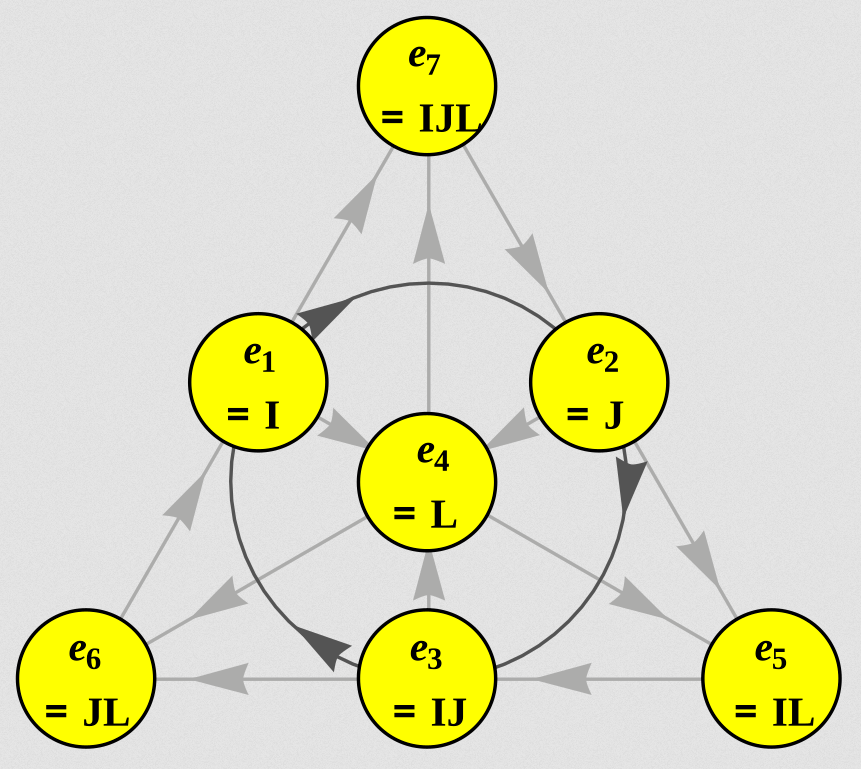
“but wait there’s 7 nodes in that diagram”
captain_spalding said:
Tamb said:
The Rev Dodgson said:
But that would make them Octets wouldn’t it?
Assuming their God id the one that is a trio.
QuintetNonet.
Because the doctrine of the Trinity is that God is three and one.

also 3 & 1 == 1 so

dv said:
Stop scaring me.
roughbarked said:
dv said:
Stop scaring me.
how do they know it’s true though it doesn’t seem like a theorem to us

At some point it was decided that car grills are supposed to look like the Galactic Senate.
dv said:

At some point it was decided that car grills are supposed to look like the Galactic Senate.

I don’t see the resemblance

SCIENCE said:
That’s about 4900 kJ, about 60% of average required calorific intake.
SCIENCE said:
Presumably, this is something consumed mostly by Americans who insist on ‘pumpkin’ everything, usually involving something called ‘pumpkin spice’, which, IIRC, has nothing at all of pumpkin in it.
If such confections and beverages bring about their early demise, then i have no objections to them.
SCIENCE said:
That’s my weekly carbs.
So apart from covering itself in gold, piezoelectricity is the one and only singular unique property of quartz that sets it aside from other pebbles.
Dr Voisey was intrigued by the fact that so much of the world’s gold happened to have accumulated in quartz. “It all kind of sounds a bit too convenient that one of the only abundant piezoelectric minerals on Earth [quartz] is also the thing that hosts large gold nuggets,” he said.

dv said:
oh god
Don’t say we never give yous any good news.
Murdoch Children’s Research Institute scientists have successfully created lab-grown blood stem cells that are similar to those in humans and can survive beyond a Petri dish. Stem cells can become any type of cell in the body and, until now, no lab-grown cells have successfully been transplanted into mice.

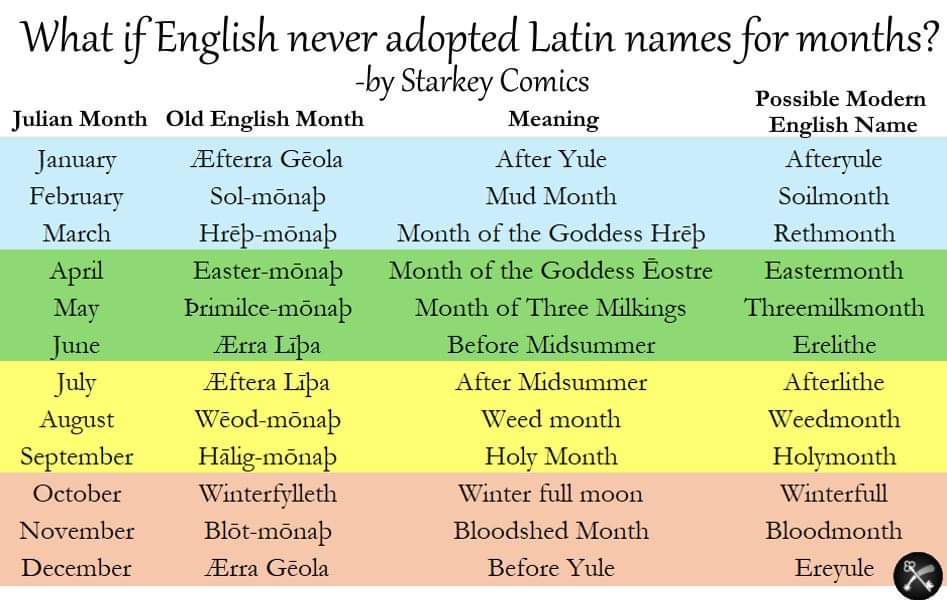
Did you post this already?
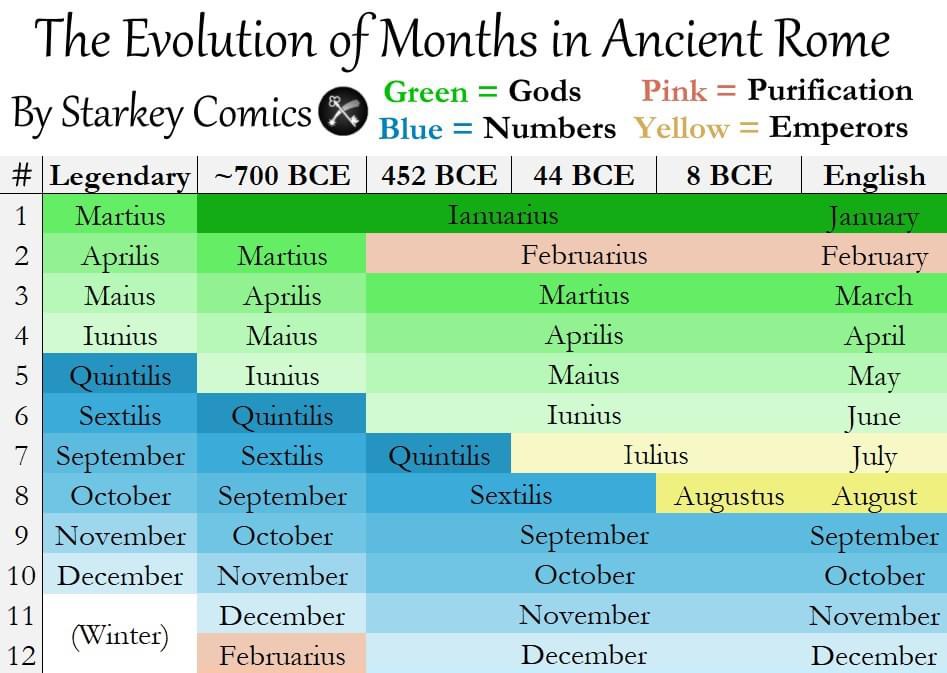
dv said:
Eostre, is the pagan Goddess of Spring when people would light bonfires on the village common, get naked and dance and do things with goats.
Peak Warming Man said:
dv said:
Eostre, is the pagan Goddess of Spring when people would light bonfires on the village common, get naked and dance and do things with goats.
I’ve only ever done one thing with goats.
Eat them, that is.
captain_spalding said:
Peak Warming Man said:
dv said:
Eostre, is the pagan Goddess of Spring when people would light bonfires on the village common, get naked and dance and do things with goats.
I’ve only ever done one thing with goats.
Eat them, that is.
ghotis
OCDC said:
Did you post this already?
I think I didn’t


Ian said:
Isn’t their greatest hits album also their debut album?
party_pants said:
Ian said:
Isn’t their greatest hits album also their debut album?
Don’t think so
a Witty posting from chat (so I can find it later):
Is AI quietly killing itself – and the Internet?
Innovation
By Tor Constantino, MBA – Contributor
Published onSeptember 3, 2024
Interest in artificial intelligence continues to surge, as Google searches over the past 12 months are at 92% of their all-time peak, but recent research suggests AI’s success could be its downfall. Amid the growth of AI content online, a group of researchers at Cambridge and Oxford universities set out to see what happens when generative AI tools query content produced by AI. What they found was alarming.
Read more:
https://www.forbes.com.au/news/innovation/is-ai-quietly-killing-itself-and-the-internet/
The Rev Dodgson said:
a Witty posting from chat (so I can find it later):Is AI quietly killing itself – and the Internet?
InnovationBy Tor Constantino, MBA – Contributor
Published onSeptember 3, 2024Interest in artificial intelligence continues to surge, as Google searches over the past 12 months are at 92% of their all-time peak, but recent research suggests AI’s success could be its downfall. Amid the growth of AI content online, a group of researchers at Cambridge and Oxford universities set out to see what happens when generative AI tools query content produced by AI. What they found was alarming.
Read more:
https://www.forbes.com.au/news/innovation/is-ai-quietly-killing-itself-and-the-internet/
Now read.
I think this is a real problem.
I was surprised by:
“This matters because roughly 57% of all web-based text has been AI generated or translated through an AI algorithm, according to a separate study from a team of Amazon Web Services researchers published in June”
57%?
already?
But now I think about it, I have seen signs of search results degrading already.
So what can be done about it?
The Rev Dodgson said:
The Rev Dodgson said:A quick Google should answer that.a Witty posting from chat (so I can find it later):Now read.Is AI quietly killing itself – and the Internet?
InnovationBy Tor Constantino, MBA – Contributor
Published onSeptember 3, 2024Interest in artificial intelligence continues to surge, as Google searches over the past 12 months are at 92% of their all-time peak, but recent research suggests AI’s success could be its downfall. Amid the growth of AI content online, a group of researchers at Cambridge and Oxford universities set out to see what happens when generative AI tools query content produced by AI. What they found was alarming.
Read more:
https://www.forbes.com.au/news/innovation/is-ai-quietly-killing-itself-and-the-internet/
I think this is a real problem.
I was surprised by:
“This matters because roughly 57% of all web-based text has been AI generated or translated through an AI algorithm, according to a separate study from a team of Amazon Web Services researchers published in June”57%?
already?
But now I think about it, I have seen signs of search results degrading already.
So what can be done about it?
OCDC said:
The Rev Dodgson said:The Rev Dodgson said:A quick Google should answer that.a Witty posting from chat (so I can find it later):Now read.Is AI quietly killing itself – and the Internet?
InnovationBy Tor Constantino, MBA – Contributor
Published onSeptember 3, 2024Interest in artificial intelligence continues to surge, as Google searches over the past 12 months are at 92% of their all-time peak, but recent research suggests AI’s success could be its downfall. Amid the growth of AI content online, a group of researchers at Cambridge and Oxford universities set out to see what happens when generative AI tools query content produced by AI. What they found was alarming.
Read more:
https://www.forbes.com.au/news/innovation/is-ai-quietly-killing-itself-and-the-internet/
I think this is a real problem.
I was surprised by:
“This matters because roughly 57% of all web-based text has been AI generated or translated through an AI algorithm, according to a separate study from a team of Amazon Web Services researchers published in June”57%?
already?
But now I think about it, I have seen signs of search results degrading already.
So what can be done about it?
:)
Good point.
The Rev Dodgson said:
The Rev Dodgson said:
a Witty posting from chat (so I can find it later):Is AI quietly killing itself – and the Internet?
InnovationBy Tor Constantino, MBA – Contributor
Published onSeptember 3, 2024Interest in artificial intelligence continues to surge, as Google searches over the past 12 months are at 92% of their all-time peak, but recent research suggests AI’s success could be its downfall. Amid the growth of AI content online, a group of researchers at Cambridge and Oxford universities set out to see what happens when generative AI tools query content produced by AI. What they found was alarming.
Read more:
https://www.forbes.com.au/news/innovation/is-ai-quietly-killing-itself-and-the-internet/
Now read.
I think this is a real problem.
I was surprised by:
“This matters because roughly 57% of all web-based text has been AI generated or translated through an AI algorithm, according to a separate study from a team of Amazon Web Services researchers published in June”57%?
already?
But now I think about it, I have seen signs of search results degrading already.
So what can be done about it?
I have read that adding “before: 2023” to your search returns much less AI-generated guff.
so basically things are fine if people just seek knowledge by conventional means damn what a bloody surprise that was
 8000 is the cube of 20, as well as the sum of four consecutive integers cubed, 113 + 123 + 133 + 143.
8000 is the cube of 20, as well as the sum of four consecutive integers cubed, 113 + 123 + 133 + 143.
SCIENCE said:
8000 is the cube of 20, as well as the sum of four consecutive integers cubed, 113 + 123 + 133 + 143.
Is there any other sequence of four consecutive natural numbers, the sum of whose cubes is also the cube of a natural number?
dv said:
SCIENCE said:
8000 is the cube of 20, as well as the sum of four consecutive integers cubed, 113 + 123 + 133 + 143.
Is there any other sequence of four consecutive natural numbers, the sum of whose cubes is also the cube of a natural number?
Don’t know but WA wasn’t very generous.
SCIENCE said:
dv said:
SCIENCE said:
8000 is the cube of 20, as well as the sum of four consecutive integers cubed, 113 + 123 + 133 + 143.
Is there any other sequence of four consecutive natural numbers, the sum of whose cubes is also the cube of a natural number?
Don’t know but WA wasn’t very generous.
Excel tells me that there is no starting integer between 12 and 20000 that works.
It then runs out of decimal places.
I don’t see any pattern in the results, so I guess there could some number(s) that works, but I don’t know how you wold find it, other than by trial and error.
But I’m not a mathemagician.
looking into some Python code so I can get more sig-figs, I’m reminded that:
-80538738812075974^3 + 80435758145817515^3 + 12602123297335631^3 = 42which was only discovered fairly recently.
The Rev Dodgson said:
looking into some Python code so I can get more sig-figs, I’m reminded that: -80538738812075974^3 + 80435758145817515^3 + 12602123297335631^3 = 42which was only discovered fairly recently.
Douglas Adams was right!
roughbarked said:
The Rev Dodgson said:
looking into some Python code so I can get more sig-figs, I’m reminded that: -80538738812075974^3 + 80435758145817515^3 + 12602123297335631^3 = 42which was only discovered fairly recently.
Douglas Adams was right!
Well it could be a coincidence.
But what is the probability of that?
The Rev Dodgson said:
roughbarked said:
The Rev Dodgson said:
looking into some Python code so I can get more sig-figs, I’m reminded that: -80538738812075974^3 + 80435758145817515^3 + 12602123297335631^3 = 42which was only discovered fairly recently.
Douglas Adams was right!
Well it could be a coincidence.
But what is the probability of that?
:)
Consider that when someone tells someone to fuck off that, that person is really telling someone to go have have a good time but saying it in an strange way.
Tau.Neutrino said:
Consider that when someone tells someone to fuck off that, that person is really telling someone to go have have a good time but saying it in an strange way.
Why don’t they say – “Go and have sex”.
Tau.Neutrino said:
Tau.Neutrino said:
Consider that when someone tells someone to fuck off that, that person is really telling someone to go have have a good time but saying it in an strange way.Why don’t they say – “Go and have sex”.
Or: Genisis 1:28
AI tools, fake songs, and $10M fraud: US musician indicted for royalty scam
The musician and his accomplices allegedly set up around 10,000 fake profiles to stream these songs, carefully distributing streams to evade detection by avoiding abnormal listening spikes
https://www.business-standard.com/world-news/ai-tools-fake-songs-and-10m-fraud-us-musician-indicted-for-royalty-scam-124090600274_1.html

this piece from Quora. The author describes himself as a “part-time physicist”, and he often posts stuff that strikes me as being highly dubious, but the piece below seems to me to be an excellent statement of the fundamentals. What do you think?
Question
“Classical physics says objects move because they were pushed. Quantum physics says objects tunnel spontaneously (and not pushed by anything). how can this difference be resolved?”
Reply
“Actually, neither of the statements in the question are correct, but let me get down to details.
Classical physics says that the motion of an object may change (i.e., it accelerates) if a force acts on that object. Motion requires no pushing. A change in motion requires pushing.
This was historically not evident to humans until early modern times, since it seemed that, for all practical intents and purposes, motion ceased unless things were pushed continuously. It was not until Newton and others that we learned that this cessation of motion required a force as well: the force of friction, air resistance or other “dissipative” forces that turned the macroscopic motion of objects into the microscopic motion (rotation, vibration, etc.) of particles that we recognize as (waste) heat.
What quantum physics says is not that “objects tunnel”. Nothing of the sort. Tunneling is about states, not objects. A system’s state may be characterized, among other things, by its energy-content. In classical physics, a system may lose energy to its environment if a lower energy state is available, but it does not happen if achieving that lower energy state first requires climbing to higher energy state, i.e., climbing over a (fictitious) “barrier”. This really should not be terribly mysterious. A piece of wood is in a higher energy state than the ashes and smoke that it turns into when it burns. Yet wood does not combust spontaneously. That is because its higher energy state is metastable. We need to invest energy (light it on fire with a match) in order to overcome the energy barrier before the wood can combust on its own and turn into ashes and smoke, with the excess energy released as heat.
And this is what tunneling is about: a quantum system may overcome that barrier even in the absence of a push. We picture this as the system “borrowing” energy from the vacuum but I caution against reading this too literally. What it basically means is that something that is impossible in classical physics is simply improbable in the quantum world.
However, and this must be stressed, the quantum world may be probabilistic in nature but conservation laws, including the law of energy conservation, are not. They hold exactly even in the world of quantum physics. That energy barrier? The system never exists as an observable system in a transitional state with more energy than it began with. The system can be observed before tunneling and after tunneling, with the released energy in some other form (again, for instance, waste heat).”

I’ve never previously considered how devastating the Panama Canal must have been to ports in Chile and Argentina.
This chart also illustrates the improvement in navigation.
dv said:

I’ve never previously considered how devastating the Panama Canal must have been to ports in Chile and Argentina.
This chart also illustrates the improvement in navigation.
now do global warming of the northwest and pissing off Malaysia Indonesia for fun
SCIENCE said:
dv said:

I’ve never previously considered how devastating the Panama Canal must have been to ports in Chile and Argentina.
This chart also illustrates the improvement in navigation.
now do global warming of the northwest and pissing off Malaysia Indonesia for fun
Merry Kra Isthmus
dv said:
SCIENCE said:
dv said:

I’ve never previously considered how devastating the Panama Canal must have been to ports in Chile and Argentina.
This chart also illustrates the improvement in navigation.
now do global warming of the northwest and pissing off Malaysia Indonesia for fun
Merry Kra Isthmus
I see very few vessels rounding the extremely dangerous Cape Horn nowadays. That’s got to be a Good Thing.
Michael V said:
dv said:
SCIENCE said:now do global warming of the northwest and pissing off Malaysia Indonesia for fun
Merry Kra Isthmus
I see very few vessels rounding the extremely dangerous Cape Horn nowadays. That’s got to be a Good Thing.
There is no need to. The economic activity all happens in the northern hemisphere because that is where 90% of the worl population lives. The main flow of goods links the two big rich consumer societies in North America and Western Europe; and the centres of production in east Asia.
Michael V said:
dv said:
SCIENCE said:now do global warming of the northwest and pissing off Malaysia Indonesia for fun
Merry Kra Isthmus
I see very few vessels rounding the extremely dangerous Cape Horn nowadays. That’s got to be a Good Thing.
For supertankers, some aircraft carriers, and some passenger ships, Cape Horn is still the only (or, the fastest) way from the eastern Pacific to the Atlantic, or vice versa, as they’re too wide for the Panama Canal. But, there’s no regular shipping routes around the Cape.
The maximum size for ships which can pass through the Panama Canal is known as the ‘New Panamax dimesnions’, and they are:
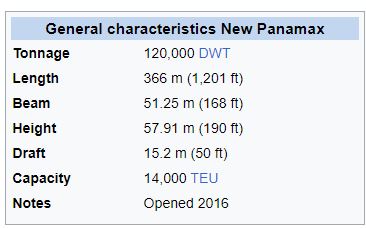
party_pants said:
Michael V said:
dv said:Merry Kra Isthmus
I see very few vessels rounding the extremely dangerous Cape Horn nowadays. That’s got to be a Good Thing.
There is no need to. The economic activity all happens in the northern hemisphere because that is where 90% of the worl population lives. The main flow of goods links the two big rich consumer societies in North America and Western Europe; and the centres of production in east Asia.
the ther thing to factor in, is that North America now has a network of overland road and rail that link the East and West Coasts. There once was a time when a long sea voyage around the cape was considered quicker, cheaper and easier than going overland over the Rockies. Much has changed since those days.
Michael V said:
dv said:
SCIENCE said:now do global warming of the northwest and pissing off Malaysia Indonesia for fun
Merry Kra Isthmus
I see very few vessels rounding the extremely dangerous Cape Horn nowadays. That’s got to be a Good Thing.
has the Bermuda Triangle lost it’s kick? You don’t hear too much about that these days… almost like it’s too old to be wasting ships and planes anymore…
Michael V said:
dv said:
SCIENCE said:now do global warming of the northwest and pissing off Malaysia Indonesia for fun
Merry Kra Isthmus
I see very few vessels rounding the extremely dangerous Cape Horn nowadays. That’s got to be a Good Thing.
Still quite a bit round Cape Hope, though, perhaps because of the limitations of Suez.
Arts said:
Michael V said:
dv said:Merry Kra Isthmus
I see very few vessels rounding the extremely dangerous Cape Horn nowadays. That’s got to be a Good Thing.
has the Bermuda Triangle lost it’s kick? You don’t hear too much about that these days… almost like it’s too old to be wasting ships and planes anymore…
There was never any statistical significance to the BT phenomenon.
dv said:
Michael V said:
dv said:Merry Kra Isthmus
I see very few vessels rounding the extremely dangerous Cape Horn nowadays. That’s got to be a Good Thing.
Still quite a bit round Cape Hope, though, perhaps because of the limitations of Suez.
there’s also the Houtis in Yemen hijacking ships and causing trouble at the other end of the Red Sea.
I meant Cape of Good Hope.
party_pants said:
Michael V said:
dv said:Merry Kra Isthmus
I see very few vessels rounding the extremely dangerous Cape Horn nowadays. That’s got to be a Good Thing.
There is no need to. The economic activity all happens in the northern hemisphere because that is where 90% of the worl population lives. The main flow of goods links the two big rich consumer societies in North America and Western Europe; and the centres of production in east Asia.
There is no need to because of the Panama Canal.
dv said:
Arts said:
Michael V said:I see very few vessels rounding the extremely dangerous Cape Horn nowadays. That’s got to be a Good Thing.
has the Bermuda Triangle lost it’s kick? You don’t hear too much about that these days… almost like it’s too old to be wasting ships and planes anymore…
There was never any statistical significance to the BT phenomenon.
No, i seem to recall that someone did a count-up of losses in the Caribbean, and the so-called Bermuda Triangle came out looking like one of the safer areas.
dv said:
Arts said:
Michael V said:I see very few vessels rounding the extremely dangerous Cape Horn nowadays. That’s got to be a Good Thing.
has the Bermuda Triangle lost it’s kick? You don’t hear too much about that these days… almost like it’s too old to be wasting ships and planes anymore…
There was never any statistical significance to the BT phenomenon.
There is nothing more soul destroying than letting facts get in the way of a good conspiracy theory.
Arts said:
dv said:
Arts said:has the Bermuda Triangle lost it’s kick? You don’t hear too much about that these days… almost like it’s too old to be wasting ships and planes anymore…
There was never any statistical significance to the BT phenomenon.
There is nothing more soul destroying than letting facts get in the way of a good conspiracy theory.
a good conspiracy theorist never lets the facts get in the way of a good story.
JudgeMental said:
Arts said:
dv said:There was never any statistical significance to the BT phenomenon.
There is nothing more soul destroying than letting facts get in the way of a good conspiracy theory.
a good conspiracy theorist never lets the facts get in the way of a good story.
I won’t hold anything against DV… his response didn’t intend to destroy the light humour. I should have put it in a meme
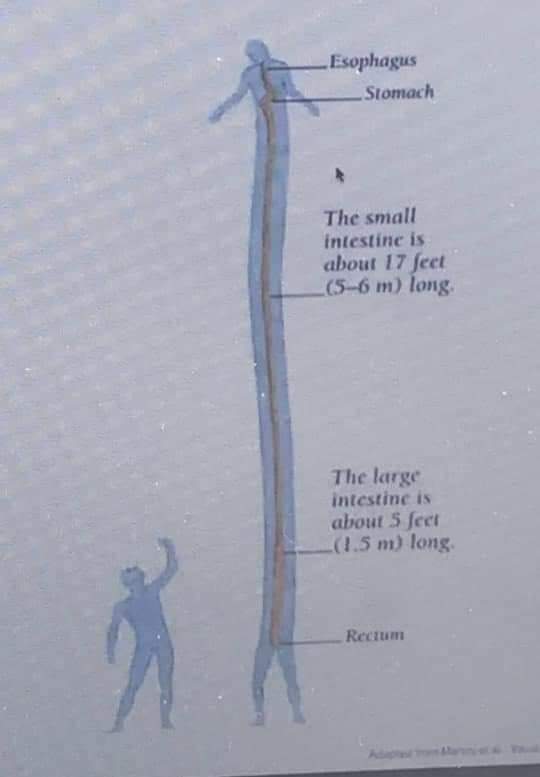
dv said:
Lot of storage there for bulk poo.
Bubblecar said:
dv said:
Lot of storage there for bulk poo.
When I go on a diet, I do tend to drop about 3 kg in the first week, and I assume that is mostly from “the clearing of the gullet”.
dv said:
Bubblecar said:
dv said:
Lot of storage there for bulk poo.
When I go on a diet, I do tend to drop about 3 kg in the first week, and I assume that is mostly from “the clearing of the gullet”.
Probably mostly water, I think.

dv said:
Talk about covering their arses.
Bubblecar said:
dv said:
Talk about covering their arses.
Maybe we’re supposed to use the board to chop wood.
dv said:
Bubblecar said:
dv said:
Talk about covering their arses.
Maybe we’re supposed to use the board to chop wood.
It’s a hypothetical chopping board in 3D.
dv said:
A challenge for genetic engineering.
dv said:
WTAF?
Tau.Neutrino said:
dv said:
Bubblecar said:Talk about covering their arses.
Maybe we’re supposed to use the board to chop wood.
It’s a hypothetical chopping board in 3D.
The concept of a chopping board. (This comment may be in the wrong thread)
dv said:

Kingy said:
dv said:
:)
buffy said:
dv said:When I go on a diet, I do tend to drop about 3 kg in the first week, and I assume that is mostly from “the clearing of the gullet”.
Probably mostly water, I think.
I’ve heard that said. What does it mean? Like, metabolic water?
dv said:
buffy said:
dv said:
When I go on a diet, I do tend to drop about 3 kg in the first week, and I assume that is mostly from “the clearing of the gullet”.
Probably mostly water, I think.
I’ve heard that said. What does it mean? Like, metabolic water?
dehydration
SCIENCE said:
dv said:
buffy said:
Probably mostly water, I think.
I’ve heard that said. What does it mean? Like, metabolic water?
dehydration
Right but usually when I start a diet part of it is drinking ample water.
dv said:
SCIENCE said:
dv said:
I’ve heard that said. What does it mean? Like, metabolic water?
dehydration
Right but usually when I start a diet part of it is drinking ample water.
yeah we agree that we should be sceptical of a claim that your initial dieting weight loss is due to water, and we agree that as you say it could be emptying of bowels
SCIENCE said:
dv said:
SCIENCE said:
dehydration
Right but usually when I start a diet part of it is drinking ample water.
yeah we agree that we should be sceptical of a claim that your initial dieting weight loss is due to water, and we agree that as you say it could be emptying of bowels
yeah, everybody stores 3kg of shit in their bowels.
JudgeMental said:
SCIENCE said:
dv said:
Right but usually when I start a diet part of it is drinking ample water.
yeah we agree that we should be sceptical of a claim that your initial dieting weight loss is due to water, and we agree that as you say it could be emptying of bowels
yeah, everybody stores 3kg of shit in their bowels.
wait you mean a meal isn’t 500 g and a second daily shit with 3 meals a day isn’t 6 meals for a total of
wait
weight
uh
anyway some genius will come along and tell us that faeces is mostly water anyway so we concede, it’s water
dv said:
buffy said:With a sufficient energy deficit you will utilise stored glycogen, mainly from liver and muscle, to which there is bound considerable water.dv said:I’ve heard that said. What does it mean? Like, metabolic water?When I go on a diet, I do tend to drop about 3 kg in the first week, and I assume that is mostly from “the clearing of the gullet”.Probably mostly water, I think.
JudgeMental said:
SCIENCE said:dv said:
Right but usually when I start a diet part of it is drinking ample water.
yeah we agree that we should be sceptical of a claim that your initial dieting weight loss is due to water, and we agree that as you say it could be emptying of bowels
yeah, everybody stores 3kg of shit in their bowels.
I mean it’s really only shit towards the end of the operation…
OCDC said:
dv said:
buffy said:With a sufficient energy deficit you will utilise stored glycogen, mainly from liver and muscle, to which there is bound considerable water.Probably mostly water, I think.I’ve heard that said. What does it mean? Like, metabolic water?
and creatine and sodium so we suppose yes also water
OCDC said:
dv said:buffy said:With a sufficient energy deficit you will utilise stored glycogen, mainly from liver and muscle, to which there is bound considerable water.Probably mostly water, I think.I’ve heard that said. What does it mean? Like, metabolic water?
Is that likely to happen straight off the bat in the first few days?
dv said:
JudgeMental said:
SCIENCE said:yeah we agree that we should be sceptical of a claim that your initial dieting weight loss is due to water, and we agree that as you say it could be emptying of bowels
yeah, everybody stores 3kg of shit in their bowels.
I mean it’s really only shit towards the end of the operation…
it’s a spectrum.
dv said:
OCDC said:Yes. Glycogen is used as an energy source before stored fat.dv said:Is that likely to happen straight off the bat in the first few days?I’ve heard that said. What does it mean? Like, metabolic water?With a sufficient energy deficit you will utilise stored glycogen, mainly from liver and muscle, to which there is bound considerable water.
dv said:
OCDC said:
dv said:
I’ve heard that said. What does it mean? Like, metabolic water?With a sufficient energy deficit you will utilise stored glycogen, mainly from liver and muscle, to which there is bound considerable water.
Is that likely to happen straight off the bat in the first few days?
fair point we do seem to feel weaker and debulk after going hungry even just for a day or two
OCDC said:
dv said:OCDC said:Yes. Glycogen is used as an energy source before stored fat.With a sufficient energy deficit you will utilise stored glycogen, mainly from liver and muscle, to which there is bound considerable water.Is that likely to happen straight off the bat in the first few days?
Thanks for the info.
Jim Greenwood, who was a GOP congressman in Pennsylvania for 12 years, explains why he will not be voting for Trump.
“From day one I’ve observed him to be a man who is not mentally fit for the job.
It’s a harsh thing to say but others have said it. He’s a malignant narcissist, he’s a pathological liar, and given a second term where he doesn’t have to worry about reflection, someone who will lie to his family, to his constituents, to world leaders, to his cabinet, just cannot be trusted to run this country. “
https://www.threads.net/@accountablegop/post/C_3QUjgJbPS/?xmt=AQGzNuXrckbiltdeq_X4HpWREmU-LIMrkU7-wH6L5Cif-g
dv said:
Jim Greenwood, who was a GOP congressman in Pennsylvania for 12 years, explains why he will not be voting for Trump.“From day one I’ve observed him to be a man who is not mentally fit for the job.
It’s a harsh thing to say but others have said it. He’s a malignant narcissist, he’s a pathological liar, and given a second term where he doesn’t have to worry about reflection, someone who will lie to his family, to his constituents, to world leaders, to his cabinet, just cannot be trusted to run this country. “https://www.threads.net/@accountablegop/post/C_3QUjgJbPS/?xmt=AQGzNuXrckbiltdeq_X4HpWREmU-LIMrkU7-wH6L5Cif-g
Nailed it.
Here Alex
Consider this 2D image, unless you are foruming on a CRT VDU, in which case it may be 3D.

OCDC said:
Consider this 2D image, unless you are foruming on a CRT VDU, in which case it may be 3D.
TATE says it’s Chromostereopsis
The Rev Dodgson said:
OCDC said:TIL…Consider this 2D image, unless you are foruming on a CRT VDU, in which case it may be 3D.TATE says it’s Chromostereopsis
OCDC said:
The Rev Dodgson said:OCDC said:TIL…Consider this 2D image, unless you are foruming on a CRT VDU, in which case it may be 3D.TATE says it’s Chromostereopsis
:)
The Rev Dodgson said:
OCDC said:
The Rev Dodgson said:
TATE says it’s ChromostereopsisTIL…
:)
so really skilled colour blind people could use chromatically aberrant parallax to tell you the colour
Consider how young people say “feeling some type of way”.
dv said:
Consider how young people say “feeling some type of way”.NHOI
is this another one of those font puns
OCDC said:
The Rev Dodgson said:OCDC said:TIL…Consider this 2D image, unless you are foruming on a CRT VDU, in which case it may be 3D.TATE says it’s Chromostereopsis
Different ends of the visible light spectrum focus at slightly different depths.
SCIENCE said:
The Rev Dodgson said:
OCDC said:
TIL…
:)
so really skilled colour blind people could use chromatically aberrant parallax to tell you the colour
Not sure about that, but as a myope, I can see a red bedside clock display better than a green one.
dv said:
Consider the first promissory notes.
shell company
The use of shells in trade began as direct commodity exchange, the shells having use-value as body ornamentation. The distinction between beads as commodities and beads as money has been the subject of debate among economic anthropologists.
My thoughts for this morning:
If it is true that you can’t prove a negative, is it true that you can’t prove that you can’t prove a negative?
The Rev Dodgson said:
My thoughts for this morning:If it is true that you can’t prove a negative, is it true that you can’t prove that you can’t prove a negative?
Could it be said that you have used a double negative?
The Rev Dodgson said:
My thoughts for this morning:If it is true that you can’t prove a negative, is it true that you can’t prove that you can’t prove a negative?
Deep Man.
roughbarked said:
The Rev Dodgson said:
My thoughts for this morning:If it is true that you can’t prove a negative, is it true that you can’t prove that you can’t prove a negative?
Could it be said that you have used a double negative?
Surely you meant:
Could it not be said that you have used a double negative??
The Rev Dodgson said:
roughbarked said:
The Rev Dodgson said:
My thoughts for this morning:If it is true that you can’t prove a negative, is it true that you can’t prove that you can’t prove a negative?
Could it be said that you have used a double negative?
Surely you meant:
Could it not be said that you have used a double negative??
:)
One maybe for you, Rev.
Consider:
I have a friend who lives in a Manhatten on the 34 th floor.He has an Antique Sottish ‘drum ‘ clock. The clock has low amplitude and when the building sways , (and it apparently does a lot), the clock will stop. I was told by a clock maker/Antique repairer that this is common with 1700 & 1800 clocks. Can any one weigh in on this?
roughbarked said:
One maybe for you, Rev.Consider:
I have a friend who lives in a Manhatten on the 34 th floor.He has an Antique Sottish ‘drum ‘ clock. The clock has low amplitude and when the building sways , (and it apparently does a lot), the clock will stop. I was told by a clock maker/Antique repairer that this is common with 1700 & 1800 clocks. Can any one weigh in on this?
I find it quite surprising.
Presumably this clock has a pendulum that is disrupted by the swaying?
So more a matter of mass than weight :)
The Rev Dodgson said:
roughbarked said:
One maybe for you, Rev.Consider:
I have a friend who lives in a Manhatten on the 34 th floor.He has an Antique Sottish ‘drum ‘ clock. The clock has low amplitude and when the building sways , (and it apparently does a lot), the clock will stop. I was told by a clock maker/Antique repairer that this is common with 1700 & 1800 clocks. Can any one weigh in on this?
I find it quite surprising.
Presumably this clock has a pendulum that is disrupted by the swaying?
So more a matter of mass than weight :)
Many tall buildings have huge pendulums in the top to counteract that movement.
roughbarked said:
The Rev Dodgson said:
roughbarked said:
One maybe for you, Rev.Consider:
I have a friend who lives in a Manhatten on the 34 th floor.He has an Antique Sottish ‘drum ‘ clock. The clock has low amplitude and when the building sways , (and it apparently does a lot), the clock will stop. I was told by a clock maker/Antique repairer that this is common with 1700 & 1800 clocks. Can any one weigh in on this?
I find it quite surprising.
Presumably this clock has a pendulum that is disrupted by the swaying?
So more a matter of mass than weight :)
Many tall buildings have huge pendulums in the top to counteract that movement.
https://www.myphysicslab.com/pendulum/moveable-double-pendulum-en.html
Lots of suggestions like; move the clock 90˚ to a different position.
One bloke hung a cucko clock on a string and swung it from side to side to see what happened.

My tests were several minutes long and this video is a seven-second sample. Set YouTube’s playback speed to 0.5. Here, the pendulum’s exact motion is inconclusive; it would be better to have an on-board camera and a beat scale. Or a microphone to a Timegrapher or Chronoscope. Remember that I also did the experiment with the pendulum stopped and it never started.
roughbarked said:
One maybe for you, Rev.Consider:
I have a friend who lives in a Manhatten on the 34 th floor.He has an Antique Sottish ‘drum ‘ clock. The clock has low amplitude and when the building sways , (and it apparently does a lot), the clock will stop. I was told by a clock maker/Antique repairer that this is common with 1700 & 1800 clocks. Can any one weigh in on this?
Totally talking out me arse here, I don’t think the below is correct, but maybe it will trigger something in someone else:
If the period of the pendulum swing is matching the period of buildings sway in a very particular way, maybe the pendulum is not swinging far enough to activate the escapement mechanism. In other words the angle between vertical and the furthest extent of the pendulums arc is decreased when “vertical” is no longer actually vertical as the building sways.
The green line is normal plumb/vertical when the building is not swaying. The red line is the new plumb/vertical when the building is at it’s fullest extent of swaying. Angle b is not large enough to activate the escapement mechanism.
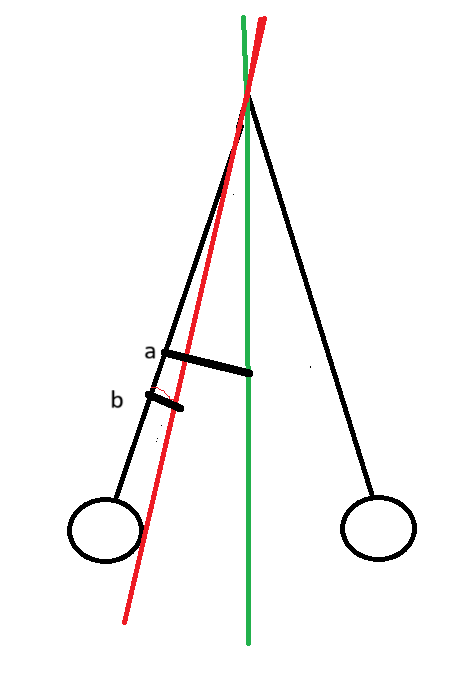
esselte said:
roughbarked said:
One maybe for you, Rev.Consider:
I have a friend who lives in a Manhatten on the 34 th floor.He has an Antique Sottish ‘drum ‘ clock. The clock has low amplitude and when the building sways , (and it apparently does a lot), the clock will stop. I was told by a clock maker/Antique repairer that this is common with 1700 & 1800 clocks. Can any one weigh in on this?
Totally talking out me arse here, I don’t think the below is correct, but maybe it will trigger something in someone else:
If the period of the pendulum swing is matching the period of buildings sway in a very particular way, maybe the pendulum is not swinging far enough to activate the escapement mechanism. In other words the angle between vertical and the furthest extent of the pendulums arc is decreased when “vertical” is no longer actually vertical as the building sways.
The green line is normal plumb/vertical when the building is not swaying. The red line is the new plumb/vertical when the building is at it’s fullest extent of swaying. Angle b is not large enough to activate the escapement mechanism.

Yes. There does need to be overswing on each lock or unlock of a tooth. If this overswing is lessened or indeed over lengthed, it will interfere with the escapement function and likely will cause the clock to falter. Adding more power could help.
The Rev Dodgson said:
My thoughts for this morning:If it is true that you can’t prove a negative, is it true that you can’t prove that you can’t prove a negative?
What does “you can’t prove a negative” even mean? Plenty of negatives have been proven.
dv said:
The Rev Dodgson said:
My thoughts for this morning:If it is true that you can’t prove a negative, is it true that you can’t prove that you can’t prove a negative?
What does “you can’t prove a negative” even mean? Plenty of negatives have been proven.
The bingbot tells me:
“The phrase “you can’t prove a negative” is often misunderstood. While it is true that you can’t prove negatives with absolute certainty based on the absence of evidence alone, we do prove the nonexistence of things regularly. Additionally, any claim can be expressed as a negative, thanks to the rule of double negation.”
But if we accept that, it removes the paradox, and where’s the fun in that?
The Rev Dodgson said:
dv said:
The Rev Dodgson said:
My thoughts for this morning:
If it is true that you can’t prove a negative, is it true that you can’t prove that you can’t prove a negative?
What does “you can’t prove a negative” even mean? Plenty of negatives have been proven.
The bingbot tells me:
“The phrase “you can’t prove a negative” is often misunderstood. While it is true that you can’t prove negatives with absolute certainty based on the absence of evidence alone, we do prove the nonexistence of things regularly. Additionally, any claim can be expressed as a negative, thanks to the rule of double negation.”
But if we accept that, it removes the paradox, and where’s the fun in that?
we feel there’s a problem with the “falsifiable hypothesis” formulation too
Consider this post from Quora.
Do we agree?
If not, why not?
“
Is black hole a theory or a fact? Have scientists seen it yet?
Contrary to the plethora of answers declaring that black holes are “a fact,” they are not.
These are the facts:
There are stellar objects near the center of our galaxy that appear to be orbiting what appears to be a very massive, and yet unobserved, object at the center of their orbital path.
In September 2015, experimenters working with LIGO detected gravitational wave ripples indicative of the merger of two formerly orbiting stellar mass black holes.
In April 2019, a team of some 200 researchers released an image, and stated the following: “This long-sought image provides the strongest evidence to date for the existence of supermassive black holes …”
In May 2022, German scientists unveiled an image, and wrote the following: “This result provides overwhelming evidence that the object is indeed a black hole …”
In both cases, this is what they “imaged:”
A bright ring of what appears to be glowing gas surrounding a black void, exactly what one would expect to see around a massive black hole. Its not as spectacular as some of the fabricated animations some of the other answers offer.
Although it is getting more and more difficult to dispute the existence of these theoretical objects, all we currently have is strong evidence that black holes are out there lurking at the centers of galaxies and elsewhere.
Edit 1:
There are some who object, with near religious fervor and righteous indignation, to the assertion that black holes are not a fact.
To reiterate, the only facts are the observations (the raw data). That black holes exist is an inference made by interpreting that data. Facts are immutable. Facts are neither correct nor incorrect. Inferences (and conclusions) may be correct or incorrect. Conclusions may change as new facts are presented. Sometimes facts are misinterpreted leading to a faulty conclusion. In those cases the facts are not incorrect and do not change but the conclusion is wrong and must change.
Those arguing that black holes are a fact entirely miss that key distinction.
Edit 2:
If one reads the comments, they may notice that the trail of misconceptions about the nature of facts continues. There are individuals claiming that based on the definition I use in my answer that the sun and moon do not exist, and some argue that because we are all brains interpreting electrical signals that there are no facts at all. That, by the way, is called a reductio ad absurdum fallacy.
If I were to ask you the following question: “Are facts assumed to be correct,” how would you respond? Arguing that facts are assumed to be correct is like arguing that a chair is correct. The statement simply makes no sense. An interpretation or conclusion based on factual evidence may be correct or may be incorrect. Facts, on the other hand, are true by definition, not by assumption.”
The Rev Dodgson said:
Consider this post from Quora.Do we agree?
If not, why not?
“
Is black hole a theory or a fact? Have scientists seen it yet?
Contrary to the plethora of answers declaring that black holes are “a fact,” they are not.These are the facts:
There are stellar objects near the center of our galaxy that appear to be orbiting what appears to be a very massive, and yet unobserved, object at the center of their orbital path.
In September 2015, experimenters working with LIGO detected gravitational wave ripples indicative of the merger of two formerly orbiting stellar mass black holes.
In April 2019, a team of some 200 researchers released an image, and stated the following: “This long-sought image provides the strongest evidence to date for the existence of supermassive black holes …”
In May 2022, German scientists unveiled an image, and wrote the following: “This result provides overwhelming evidence that the object is indeed a black hole …”
In both cases, this is what they “imaged:”A bright ring of what appears to be glowing gas surrounding a black void, exactly what one would expect to see around a massive black hole. Its not as spectacular as some of the fabricated animations some of the other answers offer.
Although it is getting more and more difficult to dispute the existence of these theoretical objects, all we currently have is strong evidence that black holes are out there lurking at the centers of galaxies and elsewhere.
Edit 1:
There are some who object, with near religious fervor and righteous indignation, to the assertion that black holes are not a fact.
To reiterate, the only facts are the observations (the raw data). That black holes exist is an inference made by interpreting that data. Facts are immutable. Facts are neither correct nor incorrect. Inferences (and conclusions) may be correct or incorrect. Conclusions may change as new facts are presented. Sometimes facts are misinterpreted leading to a faulty conclusion. In those cases the facts are not incorrect and do not change but the conclusion is wrong and must change.
Those arguing that black holes are a fact entirely miss that key distinction.
Edit 2:
If one reads the comments, they may notice that the trail of misconceptions about the nature of facts continues. There are individuals claiming that based on the definition I use in my answer that the sun and moon do not exist, and some argue that because we are all brains interpreting electrical signals that there are no facts at all. That, by the way, is called a reductio ad absurdum fallacy.
If I were to ask you the following question: “Are facts assumed to be correct,” how would you respond? Arguing that facts are assumed to be correct is like arguing that a chair is correct. The statement simply makes no sense. An interpretation or conclusion based on factual evidence may be correct or may be incorrect. Facts, on the other hand, are true by definition, not by assumption.”
Considered.
There is now simply too much strong evidence to dismiss the notion that black holes exist. That’s close enough to a fact for my liking.
There is also simply too much strong evidence to dismiss the notion that a rotary clothes line exists in my back yard. That’s close enough to a fact for my liking also.
The Rev Dodgson said:
Consider this post from Quora.Do we agree?
If not, why not?
“
Is black hole a theory or a fact? Have scientists seen it yet?
Contrary to the plethora of answers declaring that black holes are “a fact,” they are not.These are the facts:
There are stellar objects near the center of our galaxy that appear to be orbiting what appears to be a very massive, and yet unobserved, object at the center of their orbital path.
In September 2015, experimenters working with LIGO detected gravitational wave ripples indicative of the merger of two formerly orbiting stellar mass black holes.
In April 2019, a team of some 200 researchers released an image, and stated the following: “This long-sought image provides the strongest evidence to date for the existence of supermassive black holes …”
In May 2022, German scientists unveiled an image, and wrote the following: “This result provides overwhelming evidence that the object is indeed a black hole …”
In both cases, this is what they “imaged:”A bright ring of what appears to be glowing gas surrounding a black void, exactly what one would expect to see around a massive black hole. Its not as spectacular as some of the fabricated animations some of the other answers offer.
Although it is getting more and more difficult to dispute the existence of these theoretical objects, all we currently have is strong evidence that black holes are out there lurking at the centers of galaxies and elsewhere.
Edit 1:
There are some who object, with near religious fervor and righteous indignation, to the assertion that black holes are not a fact.
To reiterate, the only facts are the observations (the raw data). That black holes exist is an inference made by interpreting that data. Facts are immutable. Facts are neither correct nor incorrect. Inferences (and conclusions) may be correct or incorrect. Conclusions may change as new facts are presented. Sometimes facts are misinterpreted leading to a faulty conclusion. In those cases the facts are not incorrect and do not change but the conclusion is wrong and must change.
Those arguing that black holes are a fact entirely miss that key distinction.
Edit 2:
If one reads the comments, they may notice that the trail of misconceptions about the nature of facts continues. There are individuals claiming that based on the definition I use in my answer that the sun and moon do not exist, and some argue that because we are all brains interpreting electrical signals that there are no facts at all. That, by the way, is called a reductio ad absurdum fallacy.
If I were to ask you the following question: “Are facts assumed to be correct,” how would you respond? Arguing that facts are assumed to be correct is like arguing that a chair is correct. The statement simply makes no sense. An interpretation or conclusion based on factual evidence may be correct or may be incorrect. Facts, on the other hand, are true by definition, not by assumption.”
we disagree because they are wrong
SCIENCE said:
The Rev Dodgson said:
Consider this post from Quora.Do we agree?
If not, why not?
“
Is black hole a theory or a fact? Have scientists seen it yet?
Contrary to the plethora of answers declaring that black holes are “a fact,” they are not.These are the facts:
There are stellar objects near the center of our galaxy that appear to be orbiting what appears to be a very massive, and yet unobserved, object at the center of their orbital path.
In September 2015, experimenters working with LIGO detected gravitational wave ripples indicative of the merger of two formerly orbiting stellar mass black holes.
In April 2019, a team of some 200 researchers released an image, and stated the following: “This long-sought image provides the strongest evidence to date for the existence of supermassive black holes …”
In May 2022, German scientists unveiled an image, and wrote the following: “This result provides overwhelming evidence that the object is indeed a black hole …”
In both cases, this is what they “imaged:”A bright ring of what appears to be glowing gas surrounding a black void, exactly what one would expect to see around a massive black hole. Its not as spectacular as some of the fabricated animations some of the other answers offer.
Although it is getting more and more difficult to dispute the existence of these theoretical objects, all we currently have is strong evidence that black holes are out there lurking at the centers of galaxies and elsewhere.
Edit 1:
There are some who object, with near religious fervor and righteous indignation, to the assertion that black holes are not a fact.
To reiterate, the only facts are the observations (the raw data). That black holes exist is an inference made by interpreting that data. Facts are immutable. Facts are neither correct nor incorrect. Inferences (and conclusions) may be correct or incorrect. Conclusions may change as new facts are presented. Sometimes facts are misinterpreted leading to a faulty conclusion. In those cases the facts are not incorrect and do not change but the conclusion is wrong and must change.
Those arguing that black holes are a fact entirely miss that key distinction.
Edit 2:
If one reads the comments, they may notice that the trail of misconceptions about the nature of facts continues. There are individuals claiming that based on the definition I use in my answer that the sun and moon do not exist, and some argue that because we are all brains interpreting electrical signals that there are no facts at all. That, by the way, is called a reductio ad absurdum fallacy.
If I were to ask you the following question: “Are facts assumed to be correct,” how would you respond? Arguing that facts are assumed to be correct is like arguing that a chair is correct. The statement simply makes no sense. An interpretation or conclusion based on factual evidence may be correct or may be incorrect. Facts, on the other hand, are true by definition, not by assumption.”
we disagree because they are wrong
In what way are they wrong?
The Rev Dodgson said:
SCIENCE said:
The Rev Dodgson said:
Consider this post from Quora.
Do we agree?
If not, why not?
“
Is black hole a theory or a fact? Have scientists seen it yet?
Contrary to the plethora of answers declaring that black holes are “a fact,” they are not.These are the facts:
There are stellar objects near the center of our galaxy that appear to be orbiting what appears to be a very massive, and yet unobserved, object at the center of their orbital path.
In September 2015, experimenters working with LIGO detected gravitational wave ripples indicative of the merger of two formerly orbiting stellar mass black holes.
In April 2019, a team of some 200 researchers released an image, and stated the following: “This long-sought image provides the strongest evidence to date for the existence of supermassive black holes …”
In May 2022, German scientists unveiled an image, and wrote the following: “This result provides overwhelming evidence that the object is indeed a black hole …”
In both cases, this is what they “imaged:”A bright ring of what appears to be glowing gas surrounding a black void, exactly what one would expect to see around a massive black hole. Its not as spectacular as some of the fabricated animations some of the other answers offer.
Although it is getting more and more difficult to dispute the existence of these theoretical objects, all we currently have is strong evidence that black holes are out there lurking at the centers of galaxies and elsewhere.
Edit 1:
There are some who object, with near religious fervor and righteous indignation, to the assertion that black holes are not a fact.
To reiterate, the only facts are the observations (the raw data). That black holes exist is an inference made by interpreting that data. Facts are immutable. Facts are neither correct nor incorrect. Inferences (and conclusions) may be correct or incorrect. Conclusions may change as new facts are presented. Sometimes facts are misinterpreted leading to a faulty conclusion. In those cases the facts are not incorrect and do not change but the conclusion is wrong and must change.
Those arguing that black holes are a fact entirely miss that key distinction.
Edit 2:
If one reads the comments, they may notice that the trail of misconceptions about the nature of facts continues. There are individuals claiming that based on the definition I use in my answer that the sun and moon do not exist, and some argue that because we are all brains interpreting electrical signals that there are no facts at all. That, by the way, is called a reductio ad absurdum fallacy.
If I were to ask you the following question: “Are facts assumed to be correct,” how would you respond? Arguing that facts are assumed to be correct is like arguing that a chair is correct. The statement simply makes no sense. An interpretation or conclusion based on factual evidence may be correct or may be incorrect. Facts, on the other hand, are true by definition, not by assumption.”
we disagree because they are wrong
In what way are they wrong?
Descartes is correct.
Down in sideshow alley at the show one time I come across a bloke spruiking a “Bag of Facts”… “Get yer Bag of Facts… Get yer Bag of Facts here! Only two dollars.”
Intrigued, I paid my two dollars for a brown paper “Bag of Facts”. I opened the bag and was stunned and amazed to see that all it contained was this great steaming turd!
Well, I marched back to the vendor and complained, “I just bought this Bag of Facts and all it contains is this smelly great steaming turd!”
He looked at me and said “That’s a fact.”
Ian said:
Down in sideshow alley at the show one time I come across a bloke spruiking a “Bag of Facts”… “Get yer Bag of Facts… Get yer Bag of Facts here! Only two dollars.”Intrigued, I paid my two dollars for a brown paper “Bag of Facts”. I opened the bag and was stunned and amazed to see that all it contained was this great steaming turd!
Well, I marched back to the vendor and complained, “I just bought this Bag of Facts and all it contains is this smelly great steaming turd!”
He looked at me and said “That’s a fact.”
It is a bit like the “give me two bucks and I bet you will find a tag with your name on it in this bucket full of metal tags”.
Of course, every tag within is inscribed “Your Name”.
roughbarked said:
Ian said:
Down in sideshow alley at the show one time I come across a bloke spruiking a “Bag of Facts”… “Get yer Bag of Facts… Get yer Bag of Facts here! Only two dollars.”Intrigued, I paid my two dollars for a brown paper “Bag of Facts”. I opened the bag and was stunned and amazed to see that all it contained was this great steaming turd!
Well, I marched back to the vendor and complained, “I just bought this Bag of Facts and all it contains is this smelly great steaming turd!”
He looked at me and said “That’s a fact.”
It is a bit like the “give me two bucks and I bet you will find a tag with your name on it in this bucket full of metal tags”.
Of course, every tag within is inscribed “Your Name”.
roughbarked said:
Ian said:
Down in sideshow alley at the show one time I come across a bloke spruiking a “Bag of Facts”… “Get yer Bag of Facts… Get yer Bag of Facts here! Only two dollars.”Intrigued, I paid my two dollars for a brown paper “Bag of Facts”. I opened the bag and was stunned and amazed to see that all it contained was this great steaming turd!
Well, I marched back to the vendor and complained, “I just bought this Bag of Facts and all it contains is this smelly great steaming turd!”
He looked at me and said “That’s a fact.”
It is a bit like the “give me two bucks and I bet you will find a tag with your name on it in this bucket full of metal tags”.
Of course, every tag within is inscribed “Your Name”.
Inside my fire helmet is a small tag with text saying “Write your name here”. I have done as asked, and written “your name” there.
It’s all a bit stupid, because my name is written in big black letters on the back of it.
Kingy said:
roughbarked said:
Ian said:
Down in sideshow alley at the show one time I come across a bloke spruiking a “Bag of Facts”… “Get yer Bag of Facts… Get yer Bag of Facts here! Only two dollars.”Intrigued, I paid my two dollars for a brown paper “Bag of Facts”. I opened the bag and was stunned and amazed to see that all it contained was this great steaming turd!
Well, I marched back to the vendor and complained, “I just bought this Bag of Facts and all it contains is this smelly great steaming turd!”
He looked at me and said “That’s a fact.”
It is a bit like the “give me two bucks and I bet you will find a tag with your name on it in this bucket full of metal tags”.
Of course, every tag within is inscribed “Your Name”.
Inside my fire helmet is a small tag with text saying “Write your name here”. I have done as asked, and written “your name” there.
It’s all a bit stupid, because my name is written in big black letters on the back of it.
:)

roughbarked said:
Kingy said:
roughbarked said:It is a bit like the “give me two bucks and I bet you will find a tag with your name on it in this bucket full of metal tags”.
Of course, every tag within is inscribed “Your Name”.
Inside my fire helmet is a small tag with text saying “Write your name here”. I have done as asked, and written “your name” there.
It’s all a bit stupid, because my name is written in big black letters on the back of it.
:)
Tamb said:
roughbarked said:
Kingy said:Inside my fire helmet is a small tag with text saying “Write your name here”. I have done as asked, and written “your name” there.
It’s all a bit stupid, because my name is written in big black letters on the back of it.
:)
Why would anyone write “my name” on your helmet?
Beurocrats.
SCIENCE said:
The Rev Dodgson said:
SCIENCE said:
we disagree because they are wrong
In what way are they wrong?
Descartes is correct.
Well he was just a drunken fart, but what does the existence or otherwise of Descartes have to do with the existence or otherwise of black holes anyway?
The Rev Dodgson said:
SCIENCE said:The Rev Dodgson said:
In what way are they wrong?
Descartes is correct.
Well he was just a drunken fart, but what does the existence or otherwise of Descartes have to do with the existence or otherwise of black holes anyway?
Descartes praised true philosophy as a means to attain wisdom.
The Rev Dodgson said:
SCIENCE said:
The Rev Dodgson said:
In what way are they wrong?
Descartes is correct.
Well he was just a drunken fart, but what does the existence or otherwise of Descartes have to do with the existence or otherwise of black holes anyway?
theoretical black holes given the laws of physics as axioms are theorems
theoretically predicted black holes given the laws of physics as probable explanations for other observed phenomena are theories
roughbarked said:
The Rev Dodgson said:
SCIENCE said:
Descartes is correct.
Well he was just a drunken fart, but what does the existence or otherwise of Descartes have to do with the existence or otherwise of black holes anyway?
Descartes praised true philosophy as a means to attain wisdom.
well all right we didn’t say he was always correct about everything
we meant think therefore are that’s all
SCIENCE said:
The Rev Dodgson said:
SCIENCE said:
Descartes is correct.
Well he was just a drunken fart, but what does the existence or otherwise of Descartes have to do with the existence or otherwise of black holes anyway?
theoretical black holes given the laws of physics as axioms are theorems
theoretically predicted black holes given the laws of physics as probable explanations for other observed phenomena are theories
and on the balance of probabilities?
Kingy said:
thanks will endeavour to use but then we think holding to the numerical scale itself will be clearer anyway
The Rev Dodgson said:
SCIENCE said:The Rev Dodgson said:
In what way are they wrong?
Descartes is correct.
Well he was just a drunken fart, but what does the existence or otherwise of Descartes have to do with the existence or otherwise of black holes anyway?
Immanuel Kant was a real pissant
roughbarked said:
SCIENCE said:
The Rev Dodgson said:
Well he was just a drunken fart, but what does the existence or otherwise of Descartes have to do with the existence or otherwise of black holes anyway?
theoretical black holes given the laws of physics as axioms are theorems
theoretically predicted black holes given the laws of physics as probable explanations for other observed phenomena are theories
and on the balance of probabilities?
hypothèses but now that yous mention it then as the wise ones said about the other scale we may as well just specify a -log2(probability) for these levels of certainty
SCIENCE said:
The Rev Dodgson said:
SCIENCE said:
Descartes is correct.
Well he was just a drunken fart, but what does the existence or otherwise of Descartes have to do with the existence or otherwise of black holes anyway?
theoretical black holes given the laws of physics as axioms are theorems
theoretically predicted black holes given the laws of physics as probable explanations for other observed phenomena are theories
I don’t think it is useful to allocate theorem status to hypotheses related to physics.
Whether the available evidence for the existence of black holes is sufficient to give the black hole hypothesis theory status is a matter of opinion, in my opinion.
The suggestion that it doesn’t, seems reasonable to me, but my opinion doesn’t count for much.
OTOH, I don’t agree with the suggestion that there is a clear demarcation between what should be accepted as fact (such as the existence of the Sun and the Moon and MV’s rotary clothes line) and what remains a hypothesis. There is a wide fuzzy boundary, and I think black holes lie within it.
The Rev Dodgson said:
SCIENCE said:The Rev Dodgson said:
Well he was just a drunken fart, but what does the existence or otherwise of Descartes have to do with the existence or otherwise of black holes anyway?
theoretical black holes given the laws of physics as axioms are theorems
theoretically predicted black holes given the laws of physics as probable explanations for other observed phenomena are theories
I don’t think it is useful to allocate theorem status to hypotheses related to physics.
Whether the available evidence for the existence of black holes is sufficient to give the black hole hypothesis theory status is a matter of opinion, in my opinion.
The suggestion that it doesn’t, seems reasonable to me, but my opinion doesn’t count for much.
OTOH, I don’t agree with the suggestion that there is a clear demarcation between what should be accepted as fact (such as the existence of the Sun and the Moon and MV’s rotary clothes line) and what remains a hypothesis. There is a wide fuzzy boundary, and I think black holes lie within it.
I don’t see the problem. “Black hole” is a name we use for a class of objects that are known to exist, so that’s not a matter of conjecture.
It’s the physics of these objects, in detail, that are matters of conjecture.
Bubblecar said:
The Rev Dodgson said:
SCIENCE said:theoretical black holes given the laws of physics as axioms are theorems
theoretically predicted black holes given the laws of physics as probable explanations for other observed phenomena are theories
I don’t think it is useful to allocate theorem status to hypotheses related to physics.
Whether the available evidence for the existence of black holes is sufficient to give the black hole hypothesis theory status is a matter of opinion, in my opinion.
The suggestion that it doesn’t, seems reasonable to me, but my opinion doesn’t count for much.
OTOH, I don’t agree with the suggestion that there is a clear demarcation between what should be accepted as fact (such as the existence of the Sun and the Moon and MV’s rotary clothes line) and what remains a hypothesis. There is a wide fuzzy boundary, and I think black holes lie within it.
I don’t see the problem. “Black hole” is a name we use for a class of objects that are known to exist, so that’s not a matter of conjecture.
It’s the physics of these objects, in detail, that are matters of conjecture.
That’s pretty well what the quoted post said, except they see the name as only applicable to things with a specific physics, which the things that have been observed may or may not have.
The Rev Dodgson said:
Bubblecar said:
The Rev Dodgson said:I don’t think it is useful to allocate theorem status to hypotheses related to physics.
Whether the available evidence for the existence of black holes is sufficient to give the black hole hypothesis theory status is a matter of opinion, in my opinion.
The suggestion that it doesn’t, seems reasonable to me, but my opinion doesn’t count for much.
OTOH, I don’t agree with the suggestion that there is a clear demarcation between what should be accepted as fact (such as the existence of the Sun and the Moon and MV’s rotary clothes line) and what remains a hypothesis. There is a wide fuzzy boundary, and I think black holes lie within it.
I don’t see the problem. “Black hole” is a name we use for a class of objects that are known to exist, so that’s not a matter of conjecture.
It’s the physics of these objects, in detail, that are matters of conjecture.
That’s pretty well what the quoted post said, except they see the name as only applicable to things with a specific physics, which the things that have been observed may or may not have.
Well they’re wrong. The term “black hole” is derived from theory but is also the name of objects that are known to exist. There are competing models of the physics of these objects and most physicists agree that they’re poorly understood.
Bubblecar said:
The Rev Dodgson said:
Bubblecar said:I don’t see the problem. “Black hole” is a name we use for a class of objects that are known to exist, so that’s not a matter of conjecture.
It’s the physics of these objects, in detail, that are matters of conjecture.
That’s pretty well what the quoted post said, except they see the name as only applicable to things with a specific physics, which the things that have been observed may or may not have.
Well they’re wrong. The term “black hole” is derived from theory but is also the name of objects that are known to exist. There are competing models of the physics of these objects and most physicists agree that they’re poorly understood.
There may be many different variations, but all the theoretical “black holes” I know of have very specific features that these observed things may or may not have.
The Rev Dodgson said:
Bubblecar said:
The Rev Dodgson said:That’s pretty well what the quoted post said, except they see the name as only applicable to things with a specific physics, which the things that have been observed may or may not have.
Well they’re wrong. The term “black hole” is derived from theory but is also the name of objects that are known to exist. There are competing models of the physics of these objects and most physicists agree that they’re poorly understood.
There may be many different variations, but all the theoretical “black holes” I know of have very specific features that these observed things may or may not have.
Nonetheless these observed things are real and are called black holes, to distinguish them from other things that don’t have their observed properties.
The Rev Dodgson said:
SCIENCE said:
The Rev Dodgson said:
Well he was just a drunken fart, but what does the existence or otherwise of Descartes have to do with the existence or otherwise of black holes anyway?
theoretical black holes given the laws of physics as axioms are theorems
theoretically predicted black holes given the laws of physics as probable explanations for other observed phenomena are theories
I don’t think it is useful to allocate theorem status to hypotheses related to physics.
Whether the available evidence for the existence of black holes is sufficient to give the black hole hypothesis theory status is a matter of opinion, in my opinion.
The suggestion that it doesn’t, seems reasonable to me, but my opinion doesn’t count for much.
OTOH, I don’t agree with the suggestion that there is a clear demarcation between what should be accepted as fact (such as the existence of the Sun and the Moon and MV’s rotary clothes line) and what remains a hypothesis. There is a wide fuzzy boundary, and I think black holes lie within it.
good so we largely agree
Bubblecar said:
The Rev Dodgson said:
Bubblecar said:Well they’re wrong. The term “black hole” is derived from theory but is also the name of objects that are known to exist. There are competing models of the physics of these objects and most physicists agree that they’re poorly understood.
There may be many different variations, but all the theoretical “black holes” I know of have very specific features that these observed things may or may not have.
Nonetheless these observed things are real and are called black holes, to distinguish them from other things that don’t have their observed properties.
Sure but nobody has seen one, I’ve seen mock ups of them and mock ups of bigfoot.
Peak Warming Man said:
Bubblecar said:
The Rev Dodgson said:
Bubblecar said:
The Rev Dodgson said:
Bubblecar said:
I don’t see the problem. “Black hole” is a name we use for a class of objects that are known to exist, so that’s not a matter of conjecture.
It’s the physics of these objects, in detail, that are matters of conjecture.
That’s pretty well what the quoted post said, except they see the name as only applicable to things with a specific physics, which the things that have been observed may or may not have.
Well they’re wrong. The term “black hole” is derived from theory but is also the name of objects that are known to exist. There are competing models of the physics of these objects and most physicists agree that they’re poorly understood.
There may be many different variations, but all the theoretical “black holes” I know of have very specific features that these observed things may or may not have.
Nonetheless these observed things are real and are called black holes, to distinguish them from other things that don’t have their observed properties.
Sure but nobody has seen one, I’ve seen mock ups of them and mock ups of bigfoot.
we love that yous all* consider observation to be strict
*: oh all right we take that back as yous all* know we’re all about bewaring those universal quantifiers
SCIENCE said:
The Rev Dodgson said:
SCIENCE said:
theoretical black holes given the laws of physics as axioms are theorems
theoretically predicted black holes given the laws of physics as probable explanations for other observed phenomena are theories
I don’t think it is useful to allocate theorem status to hypotheses related to physics.
Whether the available evidence for the existence of black holes is sufficient to give the black hole hypothesis theory status is a matter of opinion, in my opinion.
The suggestion that it doesn’t, seems reasonable to me, but my opinion doesn’t count for much.
OTOH, I don’t agree with the suggestion that there is a clear demarcation between what should be accepted as fact (such as the existence of the Sun and the Moon and MV’s rotary clothes line) and what remains a hypothesis. There is a wide fuzzy boundary, and I think black holes lie within it.
good so we largely agree
That’s a fact.
The Rev Dodgson said:
SCIENCE said:The Rev Dodgson said:
Well he was just a drunken fart, but what does the existence or otherwise of Descartes have to do with the existence or otherwise of black holes anyway?
theoretical black holes given the laws of physics as axioms are theorems
theoretically predicted black holes given the laws of physics as probable explanations for other observed phenomena are theories
I don’t think it is useful to allocate theorem status to hypotheses related to physics.
Whether the available evidence for the existence of black holes is sufficient to give the black hole hypothesis theory status is a matter of opinion, in my opinion.
The suggestion that it doesn’t, seems reasonable to me, but my opinion doesn’t count for much.
OTOH, I don’t agree with the suggestion that there is a clear demarcation between what should be accepted as fact (such as the existence of the Sun and the Moon and MV’s rotary clothes line) and what remains a hypothesis. There is a wide fuzzy boundary, and I think black holes lie within it.
Is it your contention that the mathematics/astrophysics of the formation of black holes are flawed or merely that at present, like a true pedant, there is no actual proof to this theory quite yet?
Witty Rejoinder said:
The Rev Dodgson said:
SCIENCE said:theoretical black holes given the laws of physics as axioms are theorems
theoretically predicted black holes given the laws of physics as probable explanations for other observed phenomena are theories
I don’t think it is useful to allocate theorem status to hypotheses related to physics.
Whether the available evidence for the existence of black holes is sufficient to give the black hole hypothesis theory status is a matter of opinion, in my opinion.
The suggestion that it doesn’t, seems reasonable to me, but my opinion doesn’t count for much.
OTOH, I don’t agree with the suggestion that there is a clear demarcation between what should be accepted as fact (such as the existence of the Sun and the Moon and MV’s rotary clothes line) and what remains a hypothesis. There is a wide fuzzy boundary, and I think black holes lie within it.
Is it your contention that the mathematics/astrophysics of the formation of black holes are flawed or merely that at present, like a true pedant, there is no actual proof to this theory quite yet?
a rose by any other name phenomena?
Entire Swarm of Black Holes Detected Moving Through The Milky Way
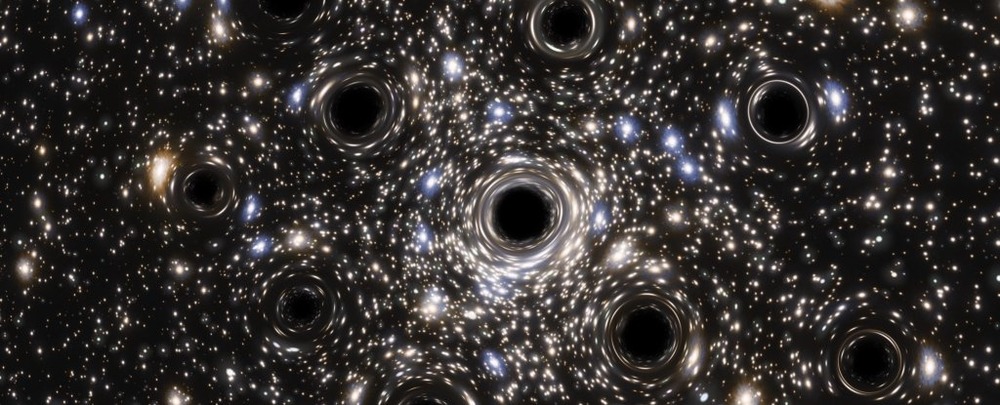
Artists impression only.. could be just about anything
Ian said:
Entire Swarm of Black Holes Detected Moving Through The Milky Way
Artists impression only.. could be just about anything
Hanging out in gangs now, could spell trouble.
Ian said:
Entire Swarm of Black Holes Detected Moving Through The Milky Way
Artists impression only.. could be just about anything
LOL
A two-year study released in 2001 by the CSIRO in Australia found several health problems associated with these chemicals. CSIRO research scientist, Dr. Stephen Brown, reported anecdotal accounts of disorientation, headache, and irritation in some drivers of new cars. He measured pollutant levels in new cars that were sufficient to cause similar effects within minutes in controlled experiments by other researchers. Chemicals found in the cars included the carcinogen benzene, two other possible carcinogens cyclohexanone and styrene, and several other toxic chemicals.
A more recent study in Japan found that the volatile organic chemicals in a new minivan were over 35 times the health limit the day after its delivery. In four months levels had fallen under the limit but increased again in the hot summer months, taking three years to permanently remain below the limit. The limits were set by the Japanese health ministry in response to more car owners suffering from sick building syndrome. A Daily Telegraph article on the study described the enjoyment of new car smell as “akin to glue-sniffing”.
However, another study showed no toxicity from new car odors in lab grown cells. The odors did trigger an immune system reaction.
The most common side effects of the new car smell are headaches, sore throats, nausea, and drowsiness.
SCIENCE said:
A two-year study released in 2001 by the CSIRO in Australia found several health problems associated with these chemicals. CSIRO research scientist, Dr. Stephen Brown, reported anecdotal accounts of disorientation, headache, and irritation in some drivers of new cars. He measured pollutant levels in new cars that were sufficient to cause similar effects within minutes in controlled experiments by other researchers. Chemicals found in the cars included the carcinogen benzene, two other possible carcinogens cyclohexanone and styrene, and several other toxic chemicals.
A more recent study in Japan found that the volatile organic chemicals in a new minivan were over 35 times the health limit the day after its delivery. In four months levels had fallen under the limit but increased again in the hot summer months, taking three years to permanently remain below the limit. The limits were set by the Japanese health ministry in response to more car owners suffering from sick building syndrome. A Daily Telegraph article on the study described the enjoyment of new car smell as “akin to glue-sniffing”.
However, another study showed no toxicity from new car odors in lab grown cells. The odors did trigger an immune system reaction.
The most common side effects of the new car smell are headaches, sore throats, nausea, and drowsiness.
Tamb said:
SCIENCE said:A two-year study released in 2001 by the CSIRO in Australia found several health problems associated with these chemicals. CSIRO research scientist, Dr. Stephen Brown, reported anecdotal accounts of disorientation, headache, and irritation in some drivers of new cars. He measured pollutant levels in new cars that were sufficient to cause similar effects within minutes in controlled experiments by other researchers. Chemicals found in the cars included the carcinogen benzene, two other possible carcinogens cyclohexanone and styrene, and several other toxic chemicals.
A more recent study in Japan found that the volatile organic chemicals in a new minivan were over 35 times the health limit the day after its delivery. In four months levels had fallen under the limit but increased again in the hot summer months, taking three years to permanently remain below the limit. The limits were set by the Japanese health ministry in response to more car owners suffering from sick building syndrome. A Daily Telegraph article on the study described the enjoyment of new car smell as “akin to glue-sniffing”.
However, another study showed no toxicity from new car odors in lab grown cells. The odors did trigger an immune system reaction.
The most common side effects of the new car smell are headaches, sore throats, nausea, and drowsiness.
Oh gawd! No wonder I have cancer. Our racing fuel contained heaps of benzene and I worked with cyclohexanone.
Mrs Rev D has a strong reaction to “new car smell”, especially for a Mazda we bought 7 years ago.
But we recently got a new Honda and no problem at all, so presumably they have changed the source of the new car smell.

dv said:
Social media “Virtue speak” is used for self-promotion.
Bubblecar said:
dv said:
Social media “Virtue speak” is used for self-promotion.
purposefully intentionally simultaneously ambiguously linguistically
this graph from well-known climate change “sceptic” Roy Spencer:


dv said:
Something seems wrong with all of that.
dv said:
Huh.
What a family.

dv said:
Fair.
:)
Michael V said:
dv said:
Fair.
:)
so should parents not tell their children to eat their greens
SCIENCE said:
Michael V said:
dv said:
Fair.
:)
so should parents not tell their children to eat their greens
I didn’t consider it that deeply.
Michael V said:
SCIENCE said:
Michael V said:Fair.
:)
so should parents not tell their children to eat their greens
I didn’t consider it that deeply.
Parents tell their children to eat their greens so that they develop a taste for greens, and will buy them as a matter of course when they grow up.
But I always liked greens as a child anyway. I probably poisoned myself more than once by plucking leaves from random plants and eating them.


dv said:
You’re making it hard on my old eyes buddy.
dv said:
I’m a little puzzled why this is considered worthy of consideration, but no doubt the hidden meaning will become apparent as the day progresses.
The Rev Dodgson said:
dv said:
I’m a little puzzled why this is considered worthy of consideration, but no doubt the hidden meaning will become apparent as the day progresses.
Your kilometerage may vary.
If Yous See Something, Say Something
The Rev Dodgson said:
dv said:
I’m a little puzzled why this is considered worthy of consideration, but no doubt the hidden meaning will become apparent as the day progresses.
Maybe…?
roughbarked said:
The Rev Dodgson said:
dv said:
I’m a little puzzled why this is considered worthy of consideration, but no doubt the hidden meaning will become apparent as the day progresses.
Maybe…?
Great minds discuss ideas; average minds discuss events; small minds discuss people.
From my e-mail this morning:

Kingy said:
but is it to scale
Kingy said:
TIL I learned that saltwater lakes don’t exist.
dv said:
Kingy said:
TIL I learned that saltwater lakes don’t exist.
Have you ever tasted the water in Lake Eyre?
roughbarked said:
dv said:
Kingy said:
TIL I learned that saltwater lakes don’t exist.
Have you ever tasted the water in Lake Eyre?
I’m ironically pointing to an error in this chart
dv said:
Kingy said:
TIL I learned that saltwater lakes don’t exist.
that’s because middle eastern terrorists bombed the big one to death
dv said:
roughbarked said:
dv said:TIL I learned that saltwater lakes don’t exist.
Have you ever tasted the water in Lake Eyre?
I’m ironically pointing to an error in this chart
OK. I’ll read the chart then. ;)
dv said:
Kingy said:
TIL I learned that saltwater lakes don’t exist.
So will people still refer to lakes as freshwater lakes.
the Lion King is just a furry Hamlet.
Bogsnorkler said:
the Lion King is just a furry Hamlet.
One where Ophelia doesn’t top herself.
And Hamlet doesn’t pull the ‘gone nuts’ ruse.
And where there’s no mention of Hamlet’s mum shacking up with Dad’s murderer.
Peak Warming Man said:
dv said:
Kingy said:
TIL I learned that saltwater lakes don’t exist.
So will people still refer to lakes as freshwater lakes.
Overground aquifers.
Lost is just an edgy Gilligan’s Island.
Bogsnorkler said:
Lost is just an edgy Gilligan’s Island.
Of the two, i found ‘Gilligan’s Island’ to have a more coherent and comprehensible storyline.
dv said:
Especially by that bunch of young whingers, it seems.
Bubblecar said:
dv said:
Especially by that bunch of young whingers, it seems.
Tamb said:
Bubblecar said:
dv said:
Especially by that bunch of young whingers, it seems.
So they complain if you don’t have an opinion and equally complain if you do.
If you’re going to have an opinion it has to be the approved one, anything else will get you cancelled by your peers. Today’s young adults are extremely conformist.
Tamb said:
Bubblecar said:
dv said:
Especially by that bunch of young whingers, it seems.
So they complain if you don’t have an opinion and equally complain if you do.
LOL, just no.
Bubblecar said:
Tamb said:
Bubblecar said:Especially by that bunch of young whingers, it seems.
So they complain if you don’t have an opinion and equally complain if you do.
If you’re going to have an opinion it has to be the approved one, anything else will get you cancelled by your peers. Today’s young adults are extremely conformist.
Rev: Not all today’s young adults…
Bcar: Of course not.
Bubblecar said:
Tamb said:
Bubblecar said:Especially by that bunch of young whingers, it seems.
So they complain if you don’t have an opinion and equally complain if you do.
If you’re going to have an opinion it has to be the approved one, anything else will get you cancelled by your peers. Today’s young adults are extremely conformist.
And you’ve gleaned this from your extensive interaction with young people?
Bubblecar said:
Bubblecar said:
Tamb said:So they complain if you don’t have an opinion and equally complain if you do.
If you’re going to have an opinion it has to be the approved one, anything else will get you cancelled by your peers. Today’s young adults are extremely conformist.
Rev: Not all today’s young adults…
Bcar: Of course not.
Thanks for saving me typing time.

Àll áçčêñts ärę Åũßtrælįėñ¡
oh come on didn’t anyone tell yous to look at the sources of funding when critically
In late August, a group of American chefs, food writers, dieticians and public health scientists wrote an open letter, supported by the Ajinomoto group, to the New England Journal of Medicine to retire the “racist phrase once and for all”.
evaluating claims

Hmmmm

dv said:
then why do people use diamonds to represent
wait
anyway for the spin of seriousness this morning we suppose it’s the first time those Americans have discovered https://en.wikipedia.org/wiki/Network_effect kinds of things
Thinking about how Eminem and 50 Cent are both “the third”, clearly marking multigenerational patronymy in their names, but had no contact with their fathers past infancy.
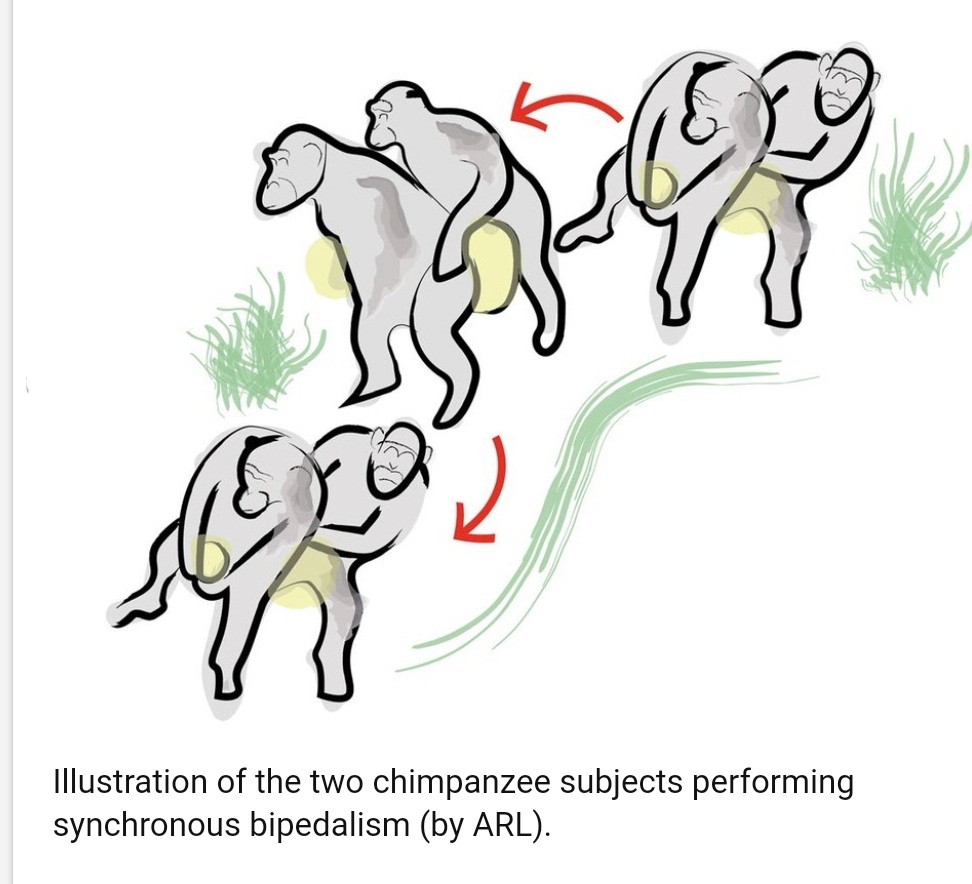

dv said:
what if Baader–Meinhof is the name
I have been reading an interview with Sophie Koudmani, who studies the formation of the black holes at the centre of galaxies.
All the talk is of how they might have been “seeded” and grown by accretion of matter from the early galaxies around them.
Shouldn’t the possibility that they existed from the very start of the Big Bang at least be considered?
The Rev Dodgson said:
I have been reading an interview with Sophie Koudmani, who studies the formation of the black holes at the centre of galaxies.
All the talk is of how they might have been “seeded” and grown by accretion of matter from the early galaxies around them.
Shouldn’t the possibility that they existed from the very start of the Big Bang at least be considered?
maybe they didn’t mention considering then dismissing the idea
SCIENCE said:
The Rev Dodgson said:
I have been reading an interview with Sophie Koudmani, who studies the formation of the black holes at the centre of galaxies.
All the talk is of how they might have been “seeded” and grown by accretion of matter from the early galaxies around them.
Shouldn’t the possibility that they existed from the very start of the Big Bang at least be considered?
maybe they didn’t mention considering then dismissing the idea
Why would it be dismissed?
The Rev Dodgson said:
SCIENCE said:The Rev Dodgson said:
I have been reading an interview with Sophie Koudmani, who studies the formation of the black holes at the centre of galaxies.
All the talk is of how they might have been “seeded” and grown by accretion of matter from the early galaxies around them.
Shouldn’t the possibility that they existed from the very start of the Big Bang at least be considered?
maybe they didn’t mention considering then dismissing the idea
Why would it be dismissed?
skoudmani@ast.cam.ac.uk
This is her email addy. I guess you could write to her directly with your question. If you really want to know of course.
JudgeMental said:
The Rev Dodgson said:
SCIENCE said:maybe they didn’t mention considering then dismissing the idea
Why would it be dismissed?
skoudmani@ast.cam.ac.uk
This is her email addy. I guess you could write to her directly with your question. If you really want to know of course.
Well it was more a thing for general consideration here, but I could do that I suppose.
I wonder if academics actually respond to random e-mails from people they don’t know.
The Rev Dodgson said:
JudgeMental said:
The Rev Dodgson said:Why would it be dismissed?
skoudmani@ast.cam.ac.uk
This is her email addy. I guess you could write to her directly with your question. If you really want to know of course.
Well it was more a thing for general consideration here, but I could do that I suppose.
I wonder if academics actually respond to random e-mails from people they don’t know.
I have had no problem with them. They are usually more than happy to talk about their field of study.
The Rev Dodgson said:
I have been reading an interview with Sophie Koudmani, who studies the formation of the black holes at the centre of galaxies.All the talk is of how they might have been “seeded” and grown by accretion of matter from the early galaxies around them.
Shouldn’t the possibility that they existed from the very start of the Big Bang at least be considered?
https://en.wikipedia.org/wiki/Primordial_black_hole
In cosmology, primordial black holes (PBHs) are hypothetical black holes that formed soon after the Big Bang. In the inflationary era and early radiation-dominated universe, extremely dense pockets of subatomic matter may have been tightly packed to the point of gravitational collapse, creating primordial black holes without the supernova compression typically needed to make black holes today.
The Rev Dodgson said:
JudgeMental said:
The Rev Dodgson said:Why would it be dismissed?
skoudmani@ast.cam.ac.uk
This is her email addy. I guess you could write to her directly with your question. If you really want to know of course.
Well it was more a thing for general consideration here, but I could do that I suppose.
I wonder if academics actually respond to random e-mails from people they don’t know.
I have in the dim distant past, when I worked as an academic. Emails were a pretty new-fangled thing back then, though.
… our point wasn’t that we had reasons or otherwise to dismiss something, but that something may be not mentioned because it was already set aside from the conversation that was being had …
The Rev Dodgson said:
JudgeMental said:
The Rev Dodgson said:Why would it be dismissed?
skoudmani@ast.cam.ac.uk
This is her email addy. I guess you could write to her directly with your question. If you really want to know of course.
Well it was more a thing for general consideration here, but I could do that I suppose.
I wonder if academics actually respond to random e-mails from people they don’t know.
it depends on the content of the email and the random person, I don’t respond to journalists, but a question in my field fro an interested person I would respond to.


dv said:
what are they in the dark
dv said:
It’s a sign of things to come.

dv said:
I will have to consider this further before expressing my opinion on its validity or otherwise.
The Rev Dodgson said:
dv said:
I will have to consider this further before expressing my opinion on its validity or otherwise.
meditate on it

A handsome man went into a hotel and asked to see the boss. When the boss came, the story began.
-The client: is room 39 empty?
-The boss: yes, sir.
-The client: can I book it?
-The boss: of course you can.
-The client: thank you.
Before going to the room, the client asked the boss to provide him with a black knife, a white thread 39 cm and an orange 73g.
The boss agreed though he was surprized at the weird things the client asked to have.
The client went into his room, he didn’t ask for food or anything else.
Unfortunately for the boss, his room was next to room 39.
After midnight, the boss heard strange voices and noise in that client’s room. Voices of wild animals and of utensils and dishes being thrown on the floor.
The boss didn’t sleep that night. He kept thinking and wondering what might be the source of the noise.
In the morning, when the client handed the keys to the boss, the latter asked to see the room first.
He went to the room and found everything alright. Nothing unusual. He even found the thread, the black knife and the orange on the table.
The client paid the bill and gave the bellboys a very good tip and left the hotel smiling.
The boss was in a shock but he didn’t reveal what he heard to the bellboys. In fact, he started to doubt himself.
After one year, the client showed up again. He asked to see the boss again. The boss was in a puzzle.
The client asked the same things: room 39, black knife, white thread 39cm and an orange 79g.
This time, the boss wanted to know the truth by all means possible. He spent a sleepless night, waiting for something to happen. After midnight, the same voices and noises started, this time louder and more indecipherable than the year before.
Again, before leaving, the client paid his bill and left a large tip on the table for the bellboys. The smile didn’t leave his face.
The boss started searching for the meaning of everything the client asked to have. Why did he ask room 39? why the white thread? why the black knife??? In fact, the boss didn’t arrive to any convincing answer to all these questions.
The boss now was eagerly waiting for the month of March, the month in which the client showed up.
To his surprise, on the first day of March, the same client showed up. He asked the same questions. Wanted to book the same room, wanted to have the same things as before.
The boss again heard the same noises, this time more louder than before.
In the morning, when the client was leaving the hotel, the boss apologized politely to the client and asked to know the secret behind the noises in the room.
-’‘If I tell you the secret, do you promise to never reveal it to anyone else?’‘
-’‘I promise I will never let anyone know’‘.
-’‘Swear’‘
-’‘I swear I won’t reveal your secret’‘
So finally, the client revealed his secret to the boss.
Unfortunately, the boss was a sincere person. Until now he hasn’t revealed his secret to anyone.
https://www.facebook.com/share/r/iyW3G1nxVE4QgRfr/
Monster Mash causality nexus
The Rev Dodgson said:
dv said:
I will have to consider this further before expressing my opinion on its validity or otherwise.
Be stoic.



dv said:
you absolute melt
JudgeMental said:
dv said:
you absolute melt
reminds us of a recent day but anyway
we just use ⚠ same kind of effect
JudgeMental said:
dv said:
you absolute melt
I’ll try it using things in my vicinity.
You absolute spoon.
You absolute trivet.
You absolute pamphlet.
I think it works.
dv said:
which is funny, because I was just watching Rings of Power with the 14yo and Disa just sent the King’s guys running by calling down giant bats and she said “you absolute Queen, you go girl”

Interesting setup

Kingy said:
Interesting setup
Similar to an old-fashioned hand egg-beater. Or even an old windmill for grinding grain etc.


dv said:
Well at least they are using clean energy.
dv said:
A quick fact check suggests that Google is investing in SMRs “to help decarbonise the future”, with the first reactor expected to be online by 2030. Nothing to suggest that it’s to power their AIs, although “powering [their] datacentres” is specified as a good reason for the investments.
btm said:
dv said:
A quick fact check suggests that Google is investing in SMRs “to help decarbonise the future”, with the first reactor expected to be online by 2030. Nothing to suggest that it’s to power their AIs, although “powering [their] datacentres” is specified as a good reason for the investments.
wait are there different kinds of electrons
btm said:
dv said:
A quick fact check suggests that Google is investing in SMRs “to help decarbonise the future”, with the first reactor expected to be online by 2030. Nothing to suggest that it’s to power their AIs, although “powering [their] datacentres” is specified as a good reason for the investments.
I bet bloody Gates is involved in this somehow.
racing pigeons can fly 1,300 kilometres within two days and travel at speeds of 50–60 kilometres per hour, but with a following wind can fly at 150kph, according to Mr Spencley. That’s faster than a runner, cyclist, or horse rider
what a crock, how fast do they reckon a sail cyclist can go with a 100 km/h tail wind then
SCIENCE said:
It’s not clear to me what scientific consideration we are supposed to give this.
The Rev Dodgson said:
SCIENCE said:It’s not clear to me what scientific consideration we are supposed to give this.
No consideration needed – just don’t cross him – the dude is savage and will show no mercy.
Dark Orange said:
The Rev Dodgson said:
SCIENCE said:
It’s not clear to me what scientific consideration we are supposed to give this.
No consideration needed – just don’t cross him – the dude is savage and will show no mercy.
shrug just read it with interest and enjoy the ideas, what more is there to do
SCIENCE said:
Dark Orange said:
The Rev Dodgson said:
It’s not clear to me what scientific consideration we are supposed to give this.
No consideration needed – just don’t cross him – the dude is savage and will show no mercy.
shrug just read it with interest and enjoy the ideas, what more is there to do
Oh, were we supposed to click on the link?
I’m afraid X wants me to verify myself, which I can’t be bothered with, so I’ll have to give it a miss.
The Rev Dodgson said:
SCIENCE said:It’s not clear to me what scientific consideration we are supposed to give this.
Well, that clarifies from where Harris get their tweed.
Now, what about their coffee and tea?
Dark Orange said:
The Rev Dodgson said:
SCIENCE said:It’s not clear to me what scientific consideration we are supposed to give this.
No consideration needed – just don’t cross him – the dude is savage and will show no mercy.
Harris tweed is likely no longer protected, post Brexit.
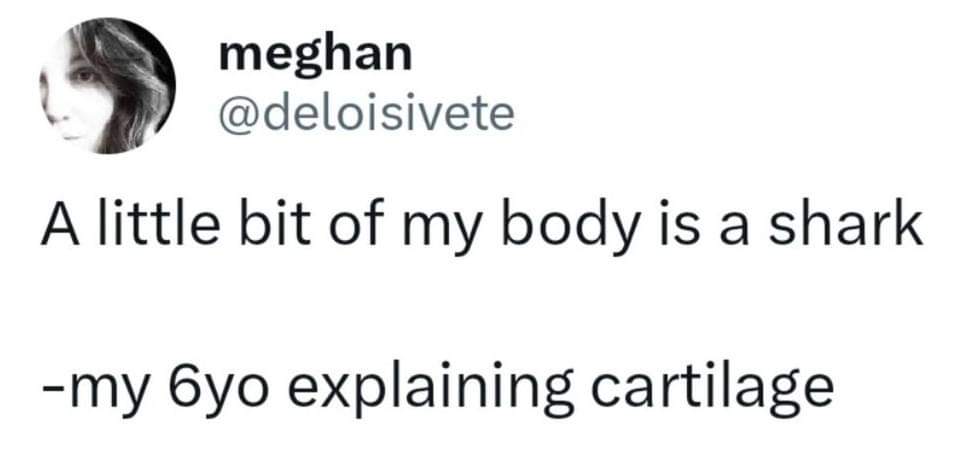
Body positivity
The Rev Dodgson said:
SCIENCE said:Dark Orange said:
No consideration needed – just don’t cross him – the dude is savage and will show no mercy.
shrug just read it with interest and enjoy the ideas, what more is there to do
Oh, were we supposed to click on the link?
I’m afraid X wants me to verify myself, which I can’t be bothered with, so I’ll have to give it a miss.
same same.
SCIENCE said:
Dark Orange said:
The Rev Dodgson said:
It’s not clear to me what scientific consideration we are supposed to give this.
No consideration needed – just don’t cross him – the dude is savage and will show no mercy.
shrug just read it with interest and enjoy the ideas, what more is there to do
He is a fashion writer who has a history of savage takedowns on Twitter. He is always polite and informative, even when he takes people down.
Oh Wait, Can It Be True, Actually,
Australian billionaire Tim Heath survived a kidnapping attempt by fighting off his alleged abductors who had pretended to be tradies painting the hallway of his apartment building.
That Anywhere Else In The World You Don’t Need A Good Guy With A Gun
¿
SCIENCE said:
Oh Wait, Can It Be True, Actually,
Australian billionaire Tim Heath survived a kidnapping attempt by fighting off his alleged abductors who had pretended to be tradies painting the hallway of his apartment building.
That Anywhere Else In The World You Don’t Need A Good Guy With A Gun
¿
It is fine if the attackers don’t have guns.

dv said:
ah so that’s why everyone’s here wegedit

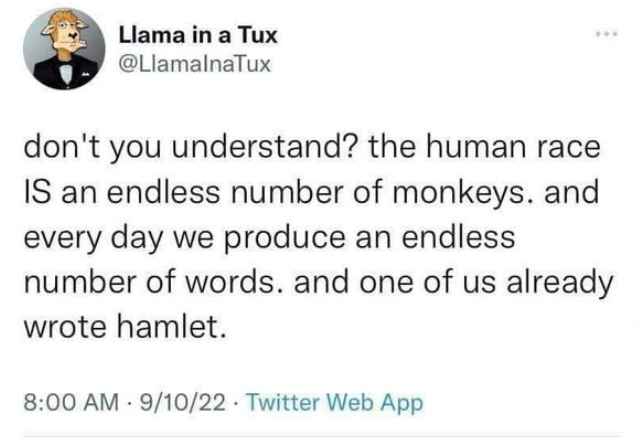
dv said:
Act 3 Scene 1 “To exist or not to exist” needs work.
proof that French and English speakers are the cleverest of the lot

Different languages, similar encoding efficiency: Comparable information rates across the human communicative niche
SCIENCE said:
proof that French and English speakers are the cleverest of the lot
Different languages, similar encoding efficiency: Comparable information rates across the human communicative niche
Could you encapsulate the graph in two sentences for the confused?
19 shillings said:
SCIENCE said:
proof that French and English speakers are the cleverest of the lot
Different languages, similar encoding efficiency: Comparable information rates across the human communicative niche
Could you encapsulate the graph in two sentences for the confused?
abstract
languages differ greatly in the number of syllables they allow, resulting in large variation in the Shannon information per syllable. We show here, using quantitative methods on a large cross-linguistic corpus of 17 languages, that the coupling between language-level (information per syllable) and speaker-level (speech rate) properties results in languages encoding similar information rates (~39 bits/s) despite wide differences in each property individually
SCIENCE said:
19 shillings said:
SCIENCE said:
proof that French and English speakers are the cleverest of the lot
Different languages, similar encoding efficiency: Comparable information rates across the human communicative niche
Could you encapsulate the graph in two sentences for the confused?
abstract
languages differ greatly in the number of syllables they allow, resulting in large variation in the Shannon information per syllable. We show here, using quantitative methods on a large cross-linguistic corpus of 17 languages, that the coupling between language-level (information per syllable) and speaker-level (speech rate) properties results in languages encoding similar information rates (~39 bits/s) despite wide differences in each property individually
I see you couldn’t do as I asked.
19 shillings said:
SCIENCE said:19 shillings said:
Could you encapsulate the graph in two sentences for the confused?
abstract
languages differ greatly in the number of syllables they allow, resulting in large variation in the Shannon information per syllable. We show here, using quantitative methods on a large cross-linguistic corpus of 17 languages, that the coupling between language-level (information per syllable) and speaker-level (speech rate) properties results in languages encoding similar information rates (~39 bits/s) despite wide differences in each property individually
I see you couldn’t do as I asked.
It’s an information-theoretic analysis of the information density of several spoken language families. The rh graph says that the most information-dense languages in their corpus, in bits per second, are French and English.
btm said:
19 shillings said:
SCIENCE said:
abstract
languages differ greatly in the number of syllables they allow, resulting in large variation in the Shannon information per syllable. We show here, using quantitative methods on a large cross-linguistic corpus of 17 languages, that the coupling between language-level (information per syllable) and speaker-level (speech rate) properties results in languages encoding similar information rates (~39 bits/s) despite wide differences in each property individually
I see you couldn’t do as I asked.
It’s an information-theoretic analysis of the information density of several spoken language families. The rh graph says that the most information-dense languages in their corpus, in bits per second, are French and English.
they couldn’t read sentences
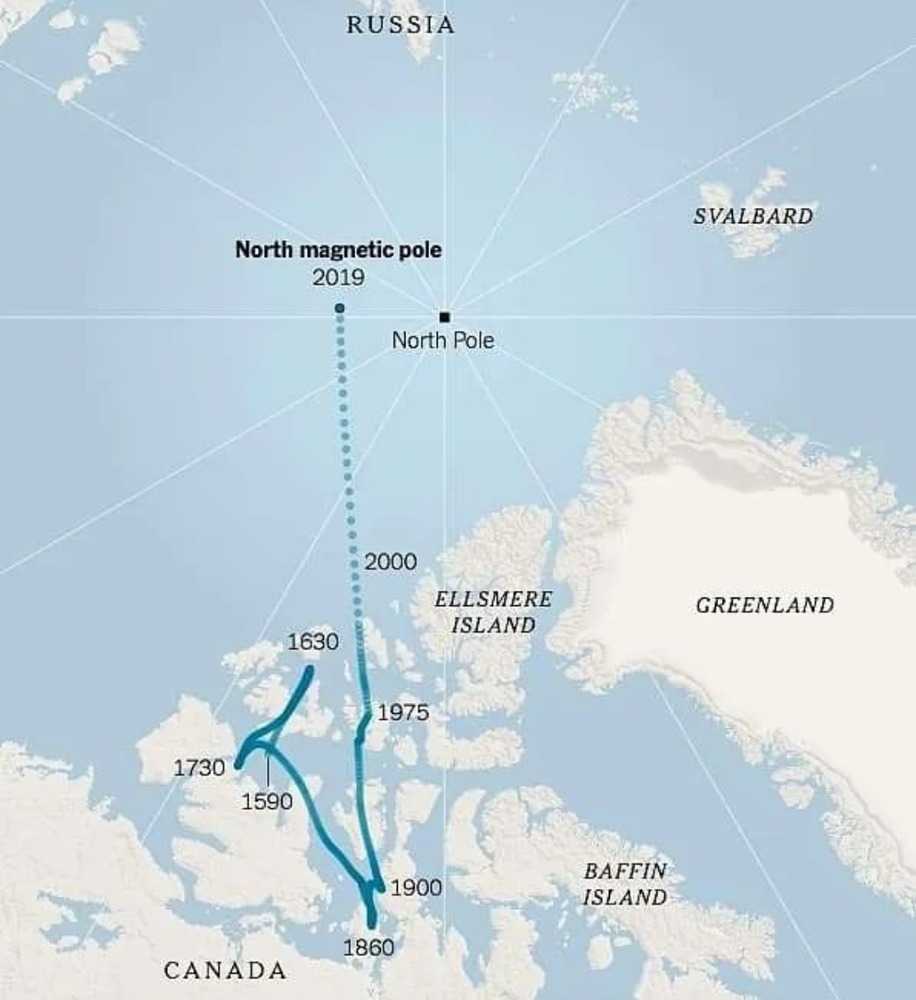
Geomagnetic pole has moved more in the last 20 years than i the previous 200, speeding its way to Russia
dv said:
Geomagnetic pole has moved more in the last 20 years than i the previous 200, speeding its way to Russia
they’re all coming home
dv said:

Geomagnetic pole has moved more in the last 20 years than i the previous 200, speeding its way to Russia
Then will hell freezeth over?
I done messed up, that’s the Magnetic pole, not the geomagnetic pole.
dv said:
I done messed up, that’s the Magnetic pole, not the geomagnetic pole.
:)
It can be a tricky issue.
Always refreshing to find out about new kinds of stupidity.

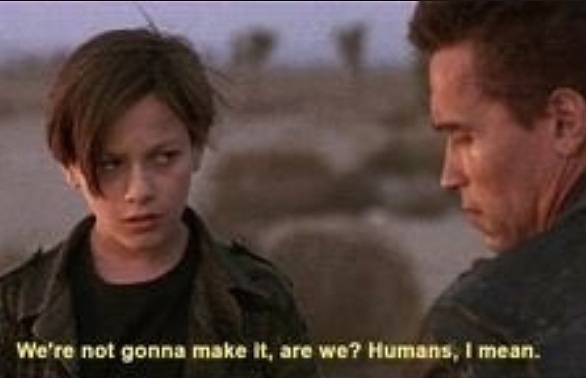
dv said:
Always refreshing to find out about new kinds of stupidity.
why he looking at elon like that
SCIENCE said:
dv said:
Always refreshing to find out about new kinds of stupidity.
why he looking at elon like that
No fate except what we make
SCIENCE said:
dv said:
Always refreshing to find out about new kinds of stupidity.
why he looking at elon like that
Coz Elon is off to Mars man.
dv said:
Always refreshing to find out about new kinds of stupidity.
Shakes head.
Cymek said:
SCIENCE said:dv said:
Always refreshing to find out about new kinds of stupidity.
why he looking at elon like that
No fate except what we make
We are writing filming directing and acting in, our own movie.
roughbarked said:
SCIENCE said:dv said:
Always refreshing to find out about new kinds of stupidity.
why he looking at elon like that
Coz Elon is off to Mars man.
That is just after a couple of little kids are fighting with each other I think.
John states humans aren’t going to make it and Terminator says its in our nature to destroy ourselves
Cymek said:
roughbarked said:
SCIENCE said:why he looking at elon like that
Coz Elon is off to Mars man.
That is just after a couple of little kids are fighting with each other I think.
John states humans aren’t going to make it and Terminator says its in our nature to destroy ourselves
Its a really good movie Terminator 2.
Cymek said:
Cymek said:
roughbarked said:Coz Elon is off to Mars man.
That is just after a couple of little kids are fighting with each other I think.
John states humans aren’t going to make it and Terminator says its in our nature to destroy ourselves
Its a really good movie Terminator 2.
Never saw it, which is why I missed the point.
roughbarked said:
SCIENCE said:
dv said:
Always refreshing to find out about new kinds of stupidity.
why he looking at elon like that
Coz Elon is off to Mars man.

SCIENCE said:
roughbarked said:
SCIENCE said:
why he looking at elon like that
Coz Elon is off to Mars man.
Kids what kids?
I’m rocket man
Hi ho silver
away
roughbarked said:
SCIENCE said:
roughbarked said:
Coz Elon is off to Mars man.
Kids what kids? I’m rocket man
Hi ho silver away
There’s a reason people travel space in ships no¿

roughbarked said:
SCIENCE said:roughbarked said:
Coz Elon is off to Mars man.
Kids what kids? I’m rocket man
Hi ho silver away
Musk ain’t the kind of guy to raise the kids. In fact he’s cold as hell.
dv said:
roughbarked said:
SCIENCE said:
Kids what kids? I’m rocket man
Hi ho silver away
Musk ain’t the kind of guy to raise the kids. In fact he’s cold as hell.
Not when he’s jumping up and down on Trump’s stage.


Seems like around Lakenheath you can’t even go for a walk without tripping oven half a dozen axeheads.
SCIENCE said:
I’d be considering to move.
Tau.Neutrino said:
SCIENCE said:I’d be considering to move.
I’d be considering a price drop too.
Morning.

dv said:
not necessarily we mean the market for (n >= 2)ordinal-hand clothing could become more efficient and that would also have benefit for resource slash waste issues
dv said:
If two different groups are both exploited, then clearly both groups need to be paid more.

dv said:
use UTC you geniuses
dv said:
I’ve got clock movements that go backwards.
dv said:
It’s not something I will ever have to deal with. And it’s not a legal issue either (birth times are not recorded on birth certificates). But it’s an interesting thought nonetheless, and made me smile a little.
SCIENCE said:
dv said:
use UTC you geniuses
Well that’s my motto.
dv said:
SCIENCE said:dv said:
use UTC you geniuses
Well that’s my motto.
I use GMT.
SCIENCE said:
癌
Does cancer give hallucinations?
ChrispenEvan said:
dv said:
SCIENCE said:use UTC you geniuses
Well that’s my motto.
I use GMT.
You would.
But there you are about +7?
roughbarked said:
ChrispenEvan said:
dv said:Well that’s my motto.
I use GMT.
You would.
But there you are about +7?
+8
dv said:
Or what if a woman gives birth to twins on a plane (or even a boat) as it crosses the International Date line on 1st January/ 31st December.
Then the younger one will be a year older than the older one.
The Rev Dodgson said:
dv said:
Or what if a woman gives birth to twins on a plane (or even a boat) as it crosses the International Date line on 1st January/ 31st December.
Then the younger one will be a year older than the older one.
Fair.
Michael V said:
The Rev Dodgson said:
dv said:
Or what if a woman gives birth to twins on a plane (or even a boat) as it crosses the International Date line on 1st January/ 31st December.
Then the younger one will be a year older than the older one.
Fair.
Zulu

dv said:
Nate need therapy.
damn


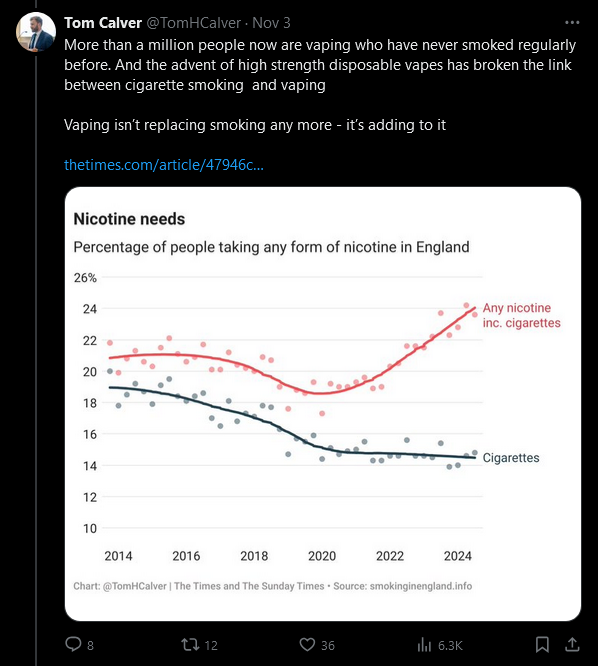
the 100% tobacco lobby responses were concerning too



dv said:
US Politics thread ——————->
dv said:
And that’s why we don’t tolerate left wing or right wing nutters depending what wing you’re on.
Pulls on bong.
dv said:
TRD would have that..
Michael V said:
dv said:
US Politics thread ——————->
yeah we thought this had been discussed at length in this place but maybe maybe not
SCIENCE said:
Michael V said:
dv said:
US Politics thread ——————->
yeah we thought this had been discussed at length in this place but maybe maybe not
And we all know nothing gets discussed here twice
dv said:
SCIENCE said:
Michael V said:
US Politics thread ——————->
yeah we thought this had been discussed at length in this place but maybe maybe not
And we all know nothing gets discussed here twice
true enough everything only gets discussed once with instantaneous rate that cyclically fluctuates on a long period
SCIENCE said:
dv said:
SCIENCE said:
yeah we thought this had been discussed at length in this place but maybe maybe not
And we all know nothing gets discussed here twice
true enough everything only gets discussed once with instantaneous rate that cyclically fluctuates on a long period
psych lick
dv said:
SCIENCE said:
dv said:
And we all know nothing gets discussed here twice
true enough everything only gets discussed once with instantaneous rate that cyclically fluctuates on a long period
psych lick
¿ word salad ?
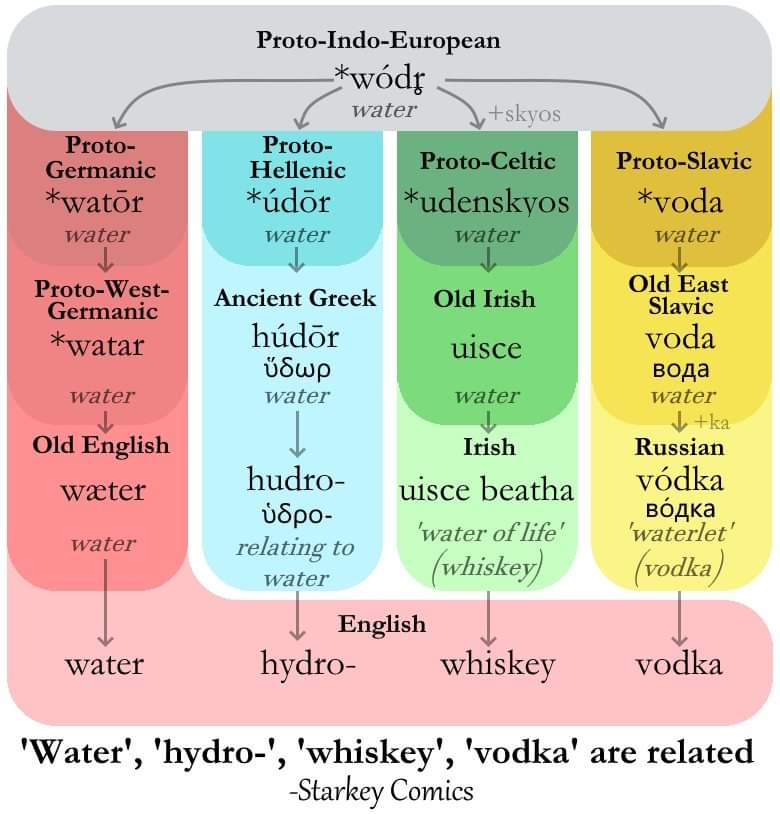



sometimes can’t believe this place still runs
but we are thankful
SCIENCE said:
sometimes can’t believe this place still runs
but we are thankful
I find that discord and even reddit can be pretty good for these conversations.
dv said:
SCIENCE said:
sometimes can’t believe this place still runs
but we are thankful
I find that discord and even reddit can be pretty good for these conversations.
So what happened to the discord we were at?
roughbarked said:
dv said:
SCIENCE said:
sometimes can’t believe this place still runs
but we are thankful
I find that discord and even reddit can be pretty good for these conversations.
So what happened to the discord we were at?
I do not understand your question
dv said:
roughbarked said:
dv said:I find that discord and even reddit can be pretty good for these conversations.
So what happened to the discord we were at?
I do not understand your question
There was a time not so long back where there was an invite to discord for all of those who frequent this forum. A number of old SSSF folk were there but it eventually dwindled to nobody talkiing.
roughbarked said:
dv said:
roughbarked said:So what happened to the discord we were at?
I do not understand your question
There was a time not so long back where there was an invite to discord for all of those who frequent this forum. A number of old SSSF folk were there but it eventually dwindled to nobody talkiing.
I’n‘t think I was ever aware.
dv said:
roughbarked said:
dv said:I do not understand your question
There was a time not so long back where there was an invite to discord for all of those who frequent this forum. A number of old SSSF folk were there but it eventually dwindled to nobody talkiing.
I’n‘t think I was ever aware.
 was in 2023.
was in 2023.
roughbarked said:
dv said:
roughbarked said:There was a time not so long back where there was an invite to discord for all of those who frequent this forum. A number of old SSSF folk were there but it eventually dwindled to nobody talkiing.
I’n‘t think I was ever aware.
was in 2023.
I guess there’s no real need for it while this place exists but I suppose it is a good idea for a backup.
dv said:
roughbarked said:
dv said:I’n‘t think I was ever aware.
was in 2023.
I guess there’s no real need for it while this place exists but I suppose it is a good idea for a backup.
Nods.
roughbarked said:
dv said:
SCIENCE said:
sometimes can’t believe this place still runs
but we are thankful
I find that discord and even reddit can be pretty good for these conversations.
So what happened to the discord we were at?
Yeah one of the other posts in that screenshot thread mentioned Reddit.
Screenshot thread eh?

Try to live a life that gets you mentioned in the Polish national anthem.
dv said:

Try to live a life that gets you mentioned in the Polish national anthem.
Someone’s got too much time on their hands.
dv said:

Try to live a life that gets you mentioned in the Polish national anthem.
In short:
James Cook University (JCU) says its Daintree Rainforest research station is “severely under-utilised” and the way it is currently run is not financially sustainable.
It is also decommissioning a 47-metre-high canopy crane based at the station due its age and says replacement costs could be up to $3 million.
It’s where the biosphere — all living things — meet the atmosphere, he said.
Tamb said:
dv said:

Try to live a life that gets you mentioned in the Polish national anthem.
And none of them are girt.
I think the UK is girt.
Peak Warming Man said:
Tamb said:
dv said:

Try to live a life that gets you mentioned in the Polish national anthem.
And none of them are girt.I think the UK is girt.
As are all of its parts.

dv said:
:)
Michael V said:
dv said:
:)
Apart from anything else, they did get paid for their work. They showed up, read their lines, got paid. In ten years I don’t expect to keep getting paid for the work I did today…
furious said:
Michael V said:
dv said:
:)
Apart from anything else, they did get paid for their work. They showed up, read their lines, got paid. In ten years I don’t expect to keep getting paid for the work I did today…
Longer wait to get that gold plated shark tank, poor Lars Ulrich
furious said:
Michael V said:
dv said:
:)
Apart from anything else, they did get paid for their work. They showed up, read their lines, got paid. In ten years I don’t expect to keep getting paid for the work I did today…
I do
furious said:
Michael V said:
dv said:
:)
Apart from anything else, they did get paid for their work. They showed up, read their lines, got paid. In ten years I don’t expect to keep getting paid for the work I did today…
So the people who did the work have already been paid, which means there is no moral case already, so go ahead and share because it won’t qualify as piracy¡

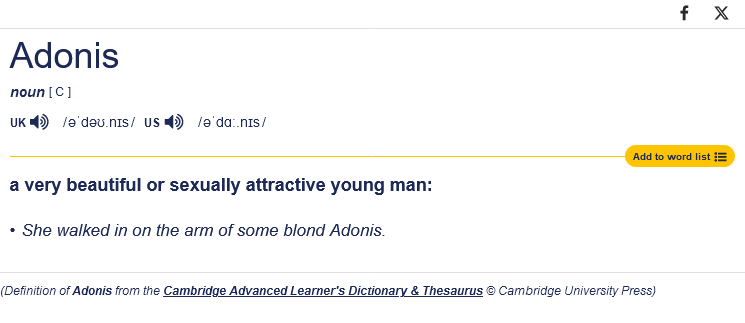
this is indefinitely quite interesting

Airbnb is promising a select few the opportunity to participate in mock gladiator battles at Rome’s Colloseum as part of an $2.3 million sponsorship deal with the park.
also what’s a Colloseum anyway
SCIENCE said:
this is indefinitely quite interesting
Airbnb is promising a select few the opportunity to participate in mock gladiator battles at Rome’s Colloseum as part of an $2.3 million sponsorship deal with the park.
also what’s a Colloseum anyway
a typo.
Kargaly: the largest prehistoric copper mine
https://youtu.be/hQZxgzA-Uak?si=LGGtNrbPbiJxUN5b

this investigation of the abilities of the latest ChatGPT
tldr:
I didn’t actually read all of that, but I did read a long post from Alon Amit, and here is the summary:
SO. Is ChatGPT a reliable tool for undergrad math? Absolutely not. You may reliably use it in lieu of Wikipedia, to look up definitions and theorems, but if you try to get it to solve problems for you, it’ll fail you very often and very badly.
If you’re a lazy and not very good student, and you try to pass off ChatGPT answers as you’re own, you’ll get caught by any half-decent TA. Don’t be that person.
If you’re a lazy and very good student, you can use ChatGPT for inspiration, check its answers very thoroughly, identify what it got right and what it got wrong, solve the wrong stuff yourself (or try to guide ChatGPT to a better answer), and possibly save time with your problem sets.
Don’t be that person, either.
The Rev Dodgson said:
this investigation of the abilities of the latest ChatGPT
tldr:
I didn’t actually read all of that, but I did read a long post from Alon Amit, and here is the summary:
SO. Is ChatGPT a reliable tool for undergrad math? Absolutely not. You may reliably use it in lieu of Wikipedia, to look up definitions and theorems, but if you try to get it to solve problems for you, it’ll fail you very often and very badly.
If you’re a lazy and not very good student, and you try to pass off ChatGPT answers as you’re own, you’ll get caught by any half-decent TA. Don’t be that person.
If you’re a lazy and very good student, you can use ChatGPT for inspiration, check its answers very thoroughly, identify what it got right and what it got wrong, solve the wrong stuff yourself (or try to guide ChatGPT to a better answer), and possibly save time with your problem sets.
Don’t be that person, either.
so the only reason to not be a lazy good person is that some moralising Quorese person who distrusts generative 爱 told us so
this statement from Quora:
“Summary: Wolfram language is a spreadsheet application without the boxes, and with 1000x the computational flexibility of Excel.”
Is that true?
The Rev Dodgson said:
this statement from Quora:“Summary: Wolfram language is a spreadsheet application without the boxes, and with 1000x the computational flexibility of Excel.”
Is that true?
what si units do they specify flexibility in
SCIENCE said:
The Rev Dodgson said:
this statement from Quora:“Summary: Wolfram language is a spreadsheet application without the boxes, and with 1000x the computational flexibility of Excel.”
Is that true?
what si units do they specify flexibility in
Having done further research I discover that they are talking about Mathematica, so presumably you can use the units of your choice.
Or just use consistent units so you don’t have to worry about it.
The Rev Dodgson said:
SCIENCE said:
The Rev Dodgson said:
this statement from Quora:
“Summary: Wolfram language is a spreadsheet application without the boxes, and with 1000x the computational flexibility of Excel.”
Is that true?
what si units do they specify flexibility in
Having done further research I discover that they are talking about Mathematica, so presumably you can use the units of your choice.
Or just use consistent units so you don’t have to worry about it.
ah Mathematica we remember when that was new what about MATLAB or is that just for dorks
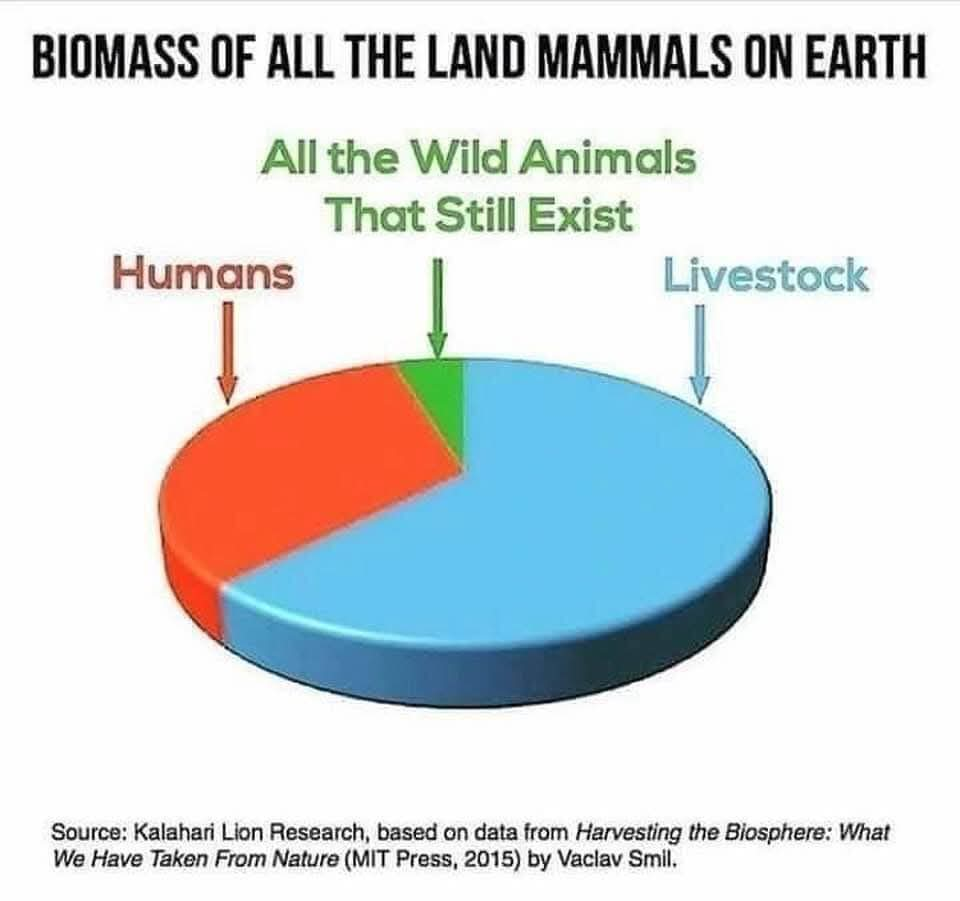
dv said:
Woo Hoo!
We are the most successful species on this planet!
SAP-I-ENS
SAP-I-ENS
SAP-I-ENS
(claps along)
dv said:
Is there a chart that includes sea mammals
of course because that’s exactly how it works
Defence lawyers told the court Kelly was not attractive enough to give the impression of a love scammer.
https://www.abc.net.au/news/2024-11-26/donna-nelson-drug-trial-final-arguments/104649346
“¡ they looked trustworthy that’s why we trusted them !”

We are now into a century where the share of the pie goes to the top
dv said:
better protip: holidayers can just fuck off from the family dinner and let them entertain themselves with generative 癌 while they enjoy the holiday
https://youtu.be/75WFTHpOw8Y?si=I9lju4O98WNmMIO3
You shouldn’t let poets lie to you.
dv said:
https://youtu.be/75WFTHpOw8Y?si=I9lju4O98WNmMIO3You shouldn’t let poets lie to you.
It’s good to see that she’s given up singing.
I’m reading “The Codebreaker” by Walter Isaacson, about Jennifer Doudna, gene editing, and the future of the human race.
In a piece about Feng Zhang (a coworker/competitor) it says:
Zhang was at Harvard at the same time as Mark Zuckerberg, and it’s interesting to speculate on which of them will end up having the most impact on the world. It’s a proxy for the larger question, which future historians will answer, of whether the digital revolution or the life-science revolution will end up being the more important.
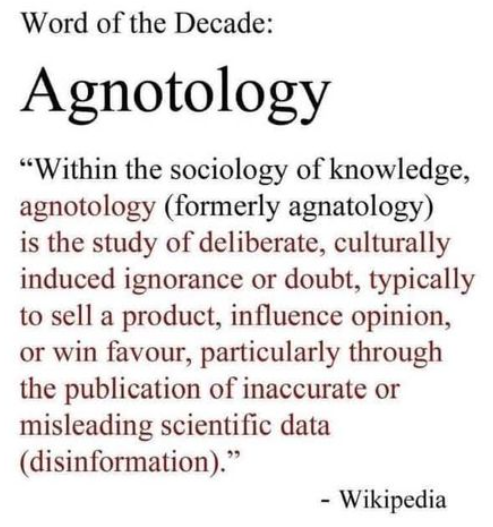
JudgeMental said:
Shopped.
huge if true
https://www.officeworks.com.au/shop/officeworks/p/samsung-8tb-t5-evo-portable-ssd-smt5e8tbbk

dv said:
I doubt if the net result would look good because the stress of panic cleaning may have consequences that overshadow any enjoyment of a clean home.
dv said:
bullshit standards that bring people panic are not a gift
Arts said:
dv said:
bullshit standards that bring people panic are not a gift
…and people who suddenly tell you that they’re coming to stay with you for a weekend are questionable as friends.
Arts said:
dv said:
bullshit standards that bring people panic are not a gift
in other words, Arts aint gonna vacuum the rugs if you are planning to come over dv – best you make your peace with that now…
Arts said:
dv said:
bullshit standards that bring people panic are not a gift
Luckily none of my friends would clean up just because I was going to visit. which is good cos then i can tell them what grots they are and they get to tell me to fuck off. then we laugh.
JudgeMental said:
Arts said:
dv said:
bullshit standards that bring people panic are not a gift
Luckily none of my friends would clean up just because I was going to visit. which is good cos then i can tell them what grots they are and they get to tell me to fuck off. then we laugh.
I just think that if someone wants to come over they want to engage with me and not judge how I live my life.. and quite frankly if you want to come over and do that – fine.. then you can fuck right off becuase I dont care what you think about the way I live my life… however if you want to hang out – accept that the cats do jump on the counter, the dog will bark and jump on you and chat about interesting things.. then I’ll put the kettle on.
JudgeMental said:
Arts said:
dv said:
bullshit standards that bring people panic are not a gift
Luckily none of my friends would clean up just because I was going to visit. which is good cos then i can tell them what grots they are and they get to tell me to fuck off. then we laugh.
exactly you’re all black and white one bit friends, Real Friends would give a non integer probability of weekend sleepover so that they can gamble on the house andor clean out the house
Arts said:
…the dog will bark and jump on you and chat about interesting things..
it just bloody barked at me!!!
JudgeMental said:
Arts said:
…the dog will bark and jump on you and chat about interesting things..
it just bloody barked at me!!!
yes, well… the dog knows thing
Arts said:
JudgeMental said:
Arts said:bullshit standards that bring people panic are not a gift
Luckily none of my friends would clean up just because I was going to visit. which is good cos then i can tell them what grots they are and they get to tell me to fuck off. then we laugh.
I just think that if someone wants to come over they want to engage with me and not judge how I live my life.. and quite frankly if you want to come over and do that – fine.. then you can fuck right off becuase I dont care what you think about the way I live my life… however if you want to hang out – accept that the cats do jump on the counter, the dog will bark and jump on you and chat about interesting things.. then I’ll put the kettle on.
I’m coming for talking dog…
dv said:
LOLOLOLOL
:)

dv said:
trex may as well be human as far as allosaur is concerned

https://youtu.be/hmYAXkuZ5yE?si=wAuhKEmkJr2ITt6F
McRib and Nihilism
dv said:
https://youtu.be/hmYAXkuZ5yE?si=wAuhKEmkJr2ITt6FMcRib and Nihilism
Had a read of the transcript.
Other than the Elon jibe in the middle, was not impressed.
Here’s my response to his philosophical nonsense:
The Rev Dodgson said:
dv said:
https://youtu.be/hmYAXkuZ5yE?si=wAuhKEmkJr2ITt6FMcRib and Nihilism
Had a read of the transcript.
Other than the Elon jibe in the middle, was not impressed.
Here’s my response to his philosophical nonsense:
Two Dogs is away with the fairies.
New Scientist has started reprinting occasional articles from 2055.
This week’s features a space elevator from the Moon to low-earth orbit, which they reckon greatly reduces the resources and cost required to get to the Moon.
Is such an elevator theoretically possible?
What about practically?
The Rev Dodgson said:
New Scientist has started reprinting occasional articles from 2055.This week’s features a space elevator from the Moon to low-earth orbit, which they reckon greatly reduces the resources and cost required to get to the Moon.
Is such an elevator theoretically possible?
What about practically?
anything might be possible in 2055.
JudgeMental said:
The Rev Dodgson said:
New Scientist has started reprinting occasional articles from 2055.This week’s features a space elevator from the Moon to low-earth orbit, which they reckon greatly reduces the resources and cost required to get to the Moon.
Is such an elevator theoretically possible?
What about practically?
anything might be possible in 2055.
I doubt that is true :)
JudgeMental said:
The Rev Dodgson said:
New Scientist has started reprinting occasional articles from 2055.This week’s features a space elevator from the Moon to low-earth orbit, which they reckon greatly reduces the resources and cost required to get to the Moon.
Is such an elevator theoretically possible?
What about practically?
anything might be possible in 2055.
Or as Commander Shore says in the opening theme of Stingray…
“Anything can happen in the next half hour!”
The Rev Dodgson said:
New Scientist has started reprinting occasional articles from 2055.This week’s features a space elevator from the Moon to low-earth orbit, which they reckon greatly reduces the resources and cost required to get to the Moon.
Is such an elevator theoretically possible?
What about practically?
Might be logistically impossible to have a cable sweeping through the atmosphere at the speeds required. A lot easier to have an asteroid in geostationary orbit linked permanently to a ground-based facility.
The Rev Dodgson said:
New Scientist has started reprinting occasional articles from 2055.This week’s features a space elevator from the Moon to low-earth orbit, which they reckon greatly reduces the resources and cost required to get to the Moon.
Is such an elevator theoretically possible?
What about practically?
Yes
No
The Rev Dodgson said:
JudgeMental said:
The Rev Dodgson said:
New Scientist has started reprinting occasional articles from 2055.This week’s features a space elevator from the Moon to low-earth orbit, which they reckon greatly reduces the resources and cost required to get to the Moon.
Is such an elevator theoretically possible?
What about practically?
anything might be possible in 2055.
I doubt that is true :)

Just been reading, in the Code Breaker book about Doudna, of the cancelling of James Watson because of his insistence that Africans have a lower average IQ than the rest of the World, and this is primarily due to genetics.
Seems to me there are a number of other issues here which are rarely discussed:
1) “IQ” is not a very good measure of intelligence, let alone overall mental capabilities.
2) Even if it is true that there is a significant difference in average IQ between “races” (or ethnic groups, or whatever), there is a huge overlap, and that difference is not very important.
3) People are not defined by their “race”, or ethnic group or whatever.
4) People should be treated according to their needs, not their ethnic group, or whatever.
The Rev Dodgson said:
Just been reading, in the Code Breaker book about Doudna, of the cancelling of James Watson because of his insistence that Africans have a lower average IQ than the rest of the World, and this is primarily due to genetics.
Seems to me there are a number of other issues here which are rarely discussed:
1) “IQ” is not a very good measure of intelligence, let alone overall mental capabilities.
2) Even if it is true that there is a significant difference in average IQ between “races” (or ethnic groups, or whatever), there is a huge overlap, and that difference is not very important.
3) People are not defined by their “race”, or ethnic group or whatever.
4) People should be treated according to their needs, not their ethnic group, or whatever.
one but it is a measure
two there are many importantly distinguished things that share hugely overlapping characteristics
three but people are
four communist
The Rev Dodgson said:
Just been reading, in the Code Breaker book about Doudna, of the cancelling of James Watson because of his insistence that Africans have a lower average IQ than the rest of the World, and this is primarily due to genetics.Seems to me there are a number of other issues here which are rarely discussed:
1) “IQ” is not a very good measure of intelligence, let alone overall mental capabilities.
2) Even if it is true that there is a significant difference in average IQ between “races” (or ethnic groups, or whatever), there is a huge overlap, and that difference is not very important.
3) People are not defined by their “race”, or ethnic group or whatever.
4) People should be treated according to their needs, not their ethnic group, or whatever.
5) Renowned ‘scientists’ can still believe things not backed up by evidence. And are cunts too.
The Rev Dodgson said:
Just been reading, in the Code Breaker book about Doudna, of the cancelling of James Watson because of his insistence that Africans have a lower average IQ than the rest of the World, and this is primarily due to genetics.Seems to me there are a number of other issues here which are rarely discussed:
1) “IQ” is not a very good measure of intelligence, let alone overall mental capabilities.
2) Even if it is true that there is a significant difference in average IQ between “races” (or ethnic groups, or whatever), there is a huge overlap, and that difference is not very important.
3) People are not defined by their “race”, or ethnic group or whatever.
4) People should be treated according to their needs, not their ethnic group, or whatever.
That there are differences in average measured IQ between different ethnic groups is not controversial, though the role of genes seems to be up for grabs. There’s plenty of literature on the topic and in general it is not bad for your career to opine that the cause is partly genetic.
Watson’s comments went way over the line. “The prevailing view is that all groups are equal but people who have to deal with black employees find this not true”. It’s too general and in another way too specific.
For mine, it wouldn’t be surprising if there were a few IQ points difference between groups due to genetics but it can’t be very much, because it can change so rapidly.
In the paper Recent Studies of Ethnic Differences in the Cognitive Ability of Adolescents in the United Kingdom (Fuerst 2021), the mean IQ of Black British adolescents increased from 91 to 98 from 1995 to 2009. This is too fast for genetic change so the other causes dominate.

dv said:
I like that
party_pants said:
dv said:
I like that
what’s far more impressive than the photography is the groundswork

dv said:
seems right.
Iceberg
Richard Sidey…
“In January this year we sailed past A23a, currently the largest iceberg on the planet, and Ian Strachan and I were able to get a drone up to film the behemoth.”
SCIENCE said:
Fascinating, thanks.
Michael V said:
SCIENCE said:
Fascinating, thanks.
Yes. Thanks.
roughbarked said:
Michael V said:
SCIENCE said:
Fascinating, thanks.
Yes. Thanks.
Being stupid, I would have assumed that was a fox
dv said:
roughbarked said:
Michael V said:Fascinating, thanks.
Yes. Thanks.
Being stupid, I would have assumed that was a fox
You wouldn’t have to be stupid.
dv said:
roughbarked said:
Michael V said:Fascinating, thanks.
Yes. Thanks.
Being stupid, I would have assumed that was a fox
Well, it does look like a fox enjoying Kniphofia.
Michael V said:
dv said:
roughbarked said:Yes. Thanks.
Being stupid, I would have assumed that was a fox
Well, it does look like a fox enjoying Kniphofia.
That is what it does look like.
dv said:
roughbarked said:
Michael V said:Fascinating, thanks.
Yes. Thanks.
Being stupid, I would have assumed that was a fox
I thought that too. I went to the link to see if it was one of those stories where they’d just picked a random photo of something sort of similar to what was being discussed.
this Witty link posted in chat:
I was expecting (perhaps hoping for) something related to recent observations, but it’s all rather philosophical.
Still, worthy of consideration.
The Rev Dodgson said:
this Witty link posted in chat:I was expecting (perhaps hoping for) something related to recent observations, but it’s all rather philosophical.
Still, worthy of consideration.
if one has no actual observable cosmology to do
SCIENCE said:
The Rev Dodgson said:
this Witty link posted in chat:I was expecting (perhaps hoping for) something related to recent observations, but it’s all rather philosophical.
Still, worthy of consideration.
if one has no actual observable cosmology to do
That’s actually a pretty good summary of the quite long article.
The Rev Dodgson said:
SCIENCE said:
The Rev Dodgson said:
this Witty link posted in chat:
I was expecting (perhaps hoping for) something related to recent observations, but it’s all rather philosophical.
Still, worthy of consideration.
if one has no actual observable cosmology to do
That’s actually a pretty good summary of the quite long article.
Hey we should work together and take over the job of that AI gig¡
this short piece from Quora:
What are some of the most interesting mathematical coincidences?
In 1978, John McKay noticed that 196884 = 196883 + 1. This caused much mathematical fervor, launching a project that took almost 15 years to complete, leading to some seminal papers on the topic.
This may sound very odd, so perhaps I should explain a little. The key was that 196884 was the third coefficient of the Fourier expansion of the j-invariant, an important function in number theory.
196883, on the other hand, was the dimension of an irreducible representation of the Monster group, an important object from group theory, which at the time was not known to have any connection with number theory whatsoever.
The conjecture that followed was basically this: the Fourier coefficients of the j-invariant could be given in terms of the dimensions of the irreducible representations of the monster group, tying together two very different branches of mathematics. This came to be known as Monstrous moonshine, and the associated conjectures were finally proved in 1992 by Richard Borcherds.
Mathematics has very few coincidences. If you see a coincidence, that usually means that there is something larger that is hiding in the background that you just haven’t figured out yet.
The Rev Dodgson said:
this short piece from Quora:What are some of the most interesting mathematical coincidences?
In 1978, John McKay noticed that 196884 = 196883 + 1. This caused much mathematical fervor, launching a project that took almost 15 years to complete, leading to some seminal papers on the topic.This may sound very odd, so perhaps I should explain a little. The key was that 196884 was the third coefficient of the Fourier expansion of the j-invariant, an important function in number theory.
196883, on the other hand, was the dimension of an irreducible representation of the Monster group, an important object from group theory, which at the time was not known to have any connection with number theory whatsoever.
The conjecture that followed was basically this: the Fourier coefficients of the j-invariant could be given in terms of the dimensions of the irreducible representations of the monster group, tying together two very different branches of mathematics. This came to be known as Monstrous moonshine, and the associated conjectures were finally proved in 1992 by Richard Borcherds.
Mathematics has very few coincidences. If you see a coincidence, that usually means that there is something larger that is hiding in the background that you just haven’t figured out yet.
One of the things I like most about physics and maths is the picturesque names that come up; I was recently reading about the Sausage Catastrophe (maths.)
btm said:
The Rev Dodgson said:
this short piece from Quora:What are some of the most interesting mathematical coincidences?
In 1978, John McKay noticed that 196884 = 196883 + 1. This caused much mathematical fervor, launching a project that took almost 15 years to complete, leading to some seminal papers on the topic.This may sound very odd, so perhaps I should explain a little. The key was that 196884 was the third coefficient of the Fourier expansion of the j-invariant, an important function in number theory.
196883, on the other hand, was the dimension of an irreducible representation of the Monster group, an important object from group theory, which at the time was not known to have any connection with number theory whatsoever.
The conjecture that followed was basically this: the Fourier coefficients of the j-invariant could be given in terms of the dimensions of the irreducible representations of the monster group, tying together two very different branches of mathematics. This came to be known as Monstrous moonshine, and the associated conjectures were finally proved in 1992 by Richard Borcherds.
Mathematics has very few coincidences. If you see a coincidence, that usually means that there is something larger that is hiding in the background that you just haven’t figured out yet.
One of the things I like most about physics and maths is the picturesque names that come up; I was recently reading about the Sausage Catastrophe (maths.)
I’ll look that up later :)
Duty demands that I go shopping now.
btm said:
The Rev Dodgson said:
this short piece from Quora:What are some of the most interesting mathematical coincidences?
In 1978, John McKay noticed that 196884 = 196883 + 1. This caused much mathematical fervor, launching a project that took almost 15 years to complete, leading to some seminal papers on the topic.This may sound very odd, so perhaps I should explain a little. The key was that 196884 was the third coefficient of the Fourier expansion of the j-invariant, an important function in number theory.
196883, on the other hand, was the dimension of an irreducible representation of the Monster group, an important object from group theory, which at the time was not known to have any connection with number theory whatsoever.
The conjecture that followed was basically this: the Fourier coefficients of the j-invariant could be given in terms of the dimensions of the irreducible representations of the monster group, tying together two very different branches of mathematics. This came to be known as Monstrous moonshine, and the associated conjectures were finally proved in 1992 by Richard Borcherds.
Mathematics has very few coincidences. If you see a coincidence, that usually means that there is something larger that is hiding in the background that you just haven’t figured out yet.
One of the things I like most about physics and maths is the picturesque names that come up; I was recently reading about the Sausage Catastrophe (maths.)
They have medicine for that
The Rev Dodgson said:
btm said:
The Rev Dodgson said:
this short piece from Quora:What are some of the most interesting mathematical coincidences?
In 1978, John McKay noticed that 196884 = 196883 + 1. This caused much mathematical fervor, launching a project that took almost 15 years to complete, leading to some seminal papers on the topic.This may sound very odd, so perhaps I should explain a little. The key was that 196884 was the third coefficient of the Fourier expansion of the j-invariant, an important function in number theory.
196883, on the other hand, was the dimension of an irreducible representation of the Monster group, an important object from group theory, which at the time was not known to have any connection with number theory whatsoever.
The conjecture that followed was basically this: the Fourier coefficients of the j-invariant could be given in terms of the dimensions of the irreducible representations of the monster group, tying together two very different branches of mathematics. This came to be known as Monstrous moonshine, and the associated conjectures were finally proved in 1992 by Richard Borcherds.
Mathematics has very few coincidences. If you see a coincidence, that usually means that there is something larger that is hiding in the background that you just haven’t figured out yet.
One of the things I like most about physics and maths is the picturesque names that come up; I was recently reading about the Sausage Catastrophe (maths.)
I’ll look that up later :)
Duty demands that I go shopping now.
Yeah, that’ll be alright.
The Rev Dodgson said:
btm said:
The Rev Dodgson said:
this short piece from Quora:
What are some of the most interesting mathematical coincidences?
In 1978, John McKay noticed that 196884 = 196883 + 1. This caused much mathematical fervor, launching a project that took almost 15 years to complete, leading to some seminal papers on the topic.This may sound very odd, so perhaps I should explain a little. The key was that 196884 was the third coefficient of the Fourier expansion of the j-invariant, an important function in number theory.
196883, on the other hand, was the dimension of an irreducible representation of the Monster group, an important object from group theory, which at the time was not known to have any connection with number theory whatsoever.
The conjecture that followed was basically this: the Fourier coefficients of the j-invariant could be given in terms of the dimensions of the irreducible representations of the monster group, tying together two very different branches of mathematics. This came to be known as Monstrous moonshine, and the associated conjectures were finally proved in 1992 by Richard Borcherds.
Mathematics has very few coincidences. If you see a coincidence, that usually means that there is something larger that is hiding in the background that you just haven’t figured out yet.
One of the things I like most about physics and maths is the picturesque names that come up; I was recently reading about the Sausage Catastrophe (maths.)
I’ll look that up later :)
Duty demands that I go shopping now.
imagine if physics and mathematics were done by humans with external interests
The Rev Dodgson said:
this short piece from Quora:What are some of the most interesting mathematical coincidences?
In 1978, John McKay noticed that 196884 = 196883 + 1. This caused much mathematical fervor, launching a project that took almost 15 years to complete, leading to some seminal papers on the topic.This may sound very odd, so perhaps I should explain a little. The key was that 196884 was the third coefficient of the Fourier expansion of the j-invariant, an important function in number theory.
196883, on the other hand, was the dimension of an irreducible representation of the Monster group, an important object from group theory, which at the time was not known to have any connection with number theory whatsoever.
The conjecture that followed was basically this: the Fourier coefficients of the j-invariant could be given in terms of the dimensions of the irreducible representations of the monster group, tying together two very different branches of mathematics. This came to be known as Monstrous moonshine, and the associated conjectures were finally proved in 1992 by Richard Borcherds.
Mathematics has very few coincidences. If you see a coincidence, that usually means that there is something larger that is hiding in the background that you just haven’t figured out yet.
:)
There are ~500 irregular verbs in English but only about 300 of these are still in frequent use. This set includes the majority of the most basic and common verbs.
Although this is no doubt tough on people learning English as a second language, for mine the category that is a genuine cause of confusion and ambiguity is the class in which the simple present form is the same as the simple past.
This includes put, input, output etc, cast, broadcast, miscast etc, bet, bid, burst, cost, cut, undercut etc, fit, hoist, hurt, let, sublet etc, rid, set, reset etc, shut, slit, split, spread, outspread etc, thrust, outthrust etc, wet. You can probably include read, in written form.
data:text/plain;base64,Vm0wd2QyUXlVWGxWV0d4V1YwZDRWMVl3WkRSV01WbDNXa1JTVjAxV2JETlhhMUpUVmpBeFYySkVUbGhoTVVwVVZtcEJlRll5U2tWVWJHaG9UVlZ3VlZadGNFSmxSbGw1VTJ0V1ZXSkhhRzlVVmxaM1ZsWmFkR05GU214U2JHdzFWVEowVjFaWFNraGhSemxWVm14YU0xWnNXbUZrUjA1R1UyMTRVMkpIZHpGV1ZFb3dWakZhV0ZOcmFHaFNlbXhXVm0xNFlVMHhXbk5YYlVaclVqQTFSMVV5TVRSVk1rcElaSHBHVjFaRmIzZFdha1poVjBaT2NtRkhhRk5sYlhoWFZtMHhORmxWTUhoWGJrNVlZbFZhY2xWcVFURlNNVlY1VFZSU1ZrMXJjRWxhU0hCSFZqRmFSbUl6WkZkaGExcG9WakJhVDJOdFJraGhSazVzWWxob1dGWnRNSGhPUm14V1RVaG9XR0pyTlZsWmJGWmhZMnhXY1ZGVVJsTk5WbFkxVkZaU1UxWnJNWEpqUld4aFUwaENTRlpxUm1GU2JVbDZXa1prYUdFeGNHOVdha0poVkRKT2RGSnJhR2hTYXpWeldXeG9iMWRHV25STlNHaFBVbTE0VjFSVmFHOVhSMHB5VGxac1dtSkdXbWhaTW5oWFkxWkdWVkpzVGs1V2JGa3hWa1phVTFVeFduSk5XRXBxVWxkNGFGVXdhRU5UUmxweFVtMUdVMkpWYkRaWGExcHJZVWRGZUdOSE9WZGhhMHBvVmtSS1QyUkdTbkpoUjJoVFlYcFdlbGRYZUc5aU1XUkhWMjVTVGxOSGFGQlZiVEUwVmpGU1ZtRkhPVmhTTUhCNVZHeGFjMWR0U2tkWGJXaGFUVzVvV0ZreFdrZFdWa3B6VkdzMVYySkdhM2hXYTFwaFZURlZlRmR1U2s1WFJYQnhWV3hrTkdGR1ZYZGhSVTVVVW14d2VGVnRNVWRWTWtwV1lrUmFXR0V4Y0hKWlZXUkdaVWRPU0U5V1pHaGhNSEJ2
SCIENCE said:
data:text/plain;base64,Vm0wd2QyUXlVWGxWV0d4V1YwZDRWMVl3WkRSV01WbDNXa1JTVjAxV2JETlhhMUpUVmpBeFYySkVUbGhoTVVwVVZtcEJlRll5U2tWVWJHaG9UVlZ3VlZadGNFSmxSbGw1VTJ0V1ZXSkhhRzlVVmxaM1ZsWmFkR05GU214U2JHdzFWVEowVjFaWFNraGhSemxWVm14YU0xWnNXbUZrUjA1R1UyMTRVMkpIZHpGV1ZFb3dWakZhV0ZOcmFHaFNlbXhXVm0xNFlVMHhXbk5YYlVaclVqQTFSMVV5TVRSVk1rcElaSHBHVjFaRmIzZFdha1poVjBaT2NtRkhhRk5sYlhoWFZtMHhORmxWTUhoWGJrNVlZbFZhY2xWcVFURlNNVlY1VFZSU1ZrMXJjRWxhU0hCSFZqRmFSbUl6WkZkaGExcG9WakJhVDJOdFJraGhSazVzWWxob1dGWnRNSGhPUm14V1RVaG9XR0pyTlZsWmJGWmhZMnhXY1ZGVVJsTk5WbFkxVkZaU1UxWnJNWEpqUld4aFUwaENTRlpxUm1GU2JVbDZXa1prYUdFeGNHOVdha0poVkRKT2RGSnJhR2hTYXpWeldXeG9iMWRHV25STlNHaFBVbTE0VjFSVmFHOVhSMHB5VGxac1dtSkdXbWhaTW5oWFkxWkdWVkpzVGs1V2JGa3hWa1phVTFVeFduSk5XRXBxVWxkNGFGVXdhRU5UUmxweFVtMUdVMkpWYkRaWGExcHJZVWRGZUdOSE9WZGhhMHBvVmtSS1QyUkdTbkpoUjJoVFlYcFdlbGRYZUc5aU1XUkhWMjVTVGxOSGFGQlZiVEUwVmpGU1ZtRkhPVmhTTUhCNVZHeGFjMWR0U2tkWGJXaGFUVzVvV0ZreFdrZFdWa3B6VkdzMVYySkdhM2hXYTFwaFZURlZlRmR1U2s1WFJYQnhWV3hrTkdGR1ZYZGhSVTVVVW14d2VGVnRNVWRWTWtwV1lrUmFXR0V4Y0hKWlZXUkdaVWRPU0U5V1pHaGhNSEJ2
IDGI
Michael V said:
SCIENCE said:
data:text/plain;base64,Vm0wd2QyUXlVWGxWV0d4V1YwZDRWMVl3WkRSV01WbDNXa1JTVjAxV2JETlhhMUpUVmpBeFYySkVUbGhoTVVwVVZtcEJlRll5U2tWVWJHaG9UVlZ3VlZadGNFSmxSbGw1VTJ0V1ZXSkhhRzlVVmxaM1ZsWmFkR05GU214U2JHdzFWVEowVjFaWFNraGhSemxWVm14YU0xWnNXbUZrUjA1R1UyMTRVMkpIZHpGV1ZFb3dWakZhV0ZOcmFHaFNlbXhXVm0xNFlVMHhXbk5YYlVaclVqQTFSMVV5TVRSVk1rcElaSHBHVjFaRmIzZFdha1poVjBaT2NtRkhhRk5sYlhoWFZtMHhORmxWTUhoWGJrNVlZbFZhY2xWcVFURlNNVlY1VFZSU1ZrMXJjRWxhU0hCSFZqRmFSbUl6WkZkaGExcG9WakJhVDJOdFJraGhSazVzWWxob1dGWnRNSGhPUm14V1RVaG9XR0pyTlZsWmJGWmhZMnhXY1ZGVVJsTk5WbFkxVkZaU1UxWnJNWEpqUld4aFUwaENTRlpxUm1GU2JVbDZXa1prYUdFeGNHOVdha0poVkRKT2RGSnJhR2hTYXpWeldXeG9iMWRHV25STlNHaFBVbTE0VjFSVmFHOVhSMHB5VGxac1dtSkdXbWhaTW5oWFkxWkdWVkpzVGs1V2JGa3hWa1phVTFVeFduSk5XRXBxVWxkNGFGVXdhRU5UUmxweFVtMUdVMkpWYkRaWGExcHJZVWRGZUdOSE9WZGhhMHBvVmtSS1QyUkdTbkpoUjJoVFlYcFdlbGRYZUc5aU1XUkhWMjVTVGxOSGFGQlZiVEUwVmpGU1ZtRkhPVmhTTUhCNVZHeGFjMWR0U2tkWGJXaGFUVzVvV0ZreFdrZFdWa3B6VkdzMVYySkdhM2hXYTFwaFZURlZlRmR1U2s1WFJYQnhWV3hrTkdGR1ZYZGhSVTVVVW14d2VGVnRNVWRWTWtwV1lrUmFXR0V4Y0hKWlZXUkdaVWRPU0U5V1pHaGhNSEJ2
IDGI
The plaintext is a prefix of its own base 64 encoding.
SCIENCE said:
Michael V said:
SCIENCE said:
data:text/plain;base64,Vm0wd2QyUXlVWGxWV0d4V1YwZDRWMVl3WkRSV01WbDNXa1JTVjAxV2JETlhhMUpUVmpBeFYySkVUbGhoTVVwVVZtcEJlRll5U2tWVWJHaG9UVlZ3VlZadGNFSmxSbGw1VTJ0V1ZXSkhhRzlVVmxaM1ZsWmFkR05GU214U2JHdzFWVEowVjFaWFNraGhSemxWVm14YU0xWnNXbUZrUjA1R1UyMTRVMkpIZHpGV1ZFb3dWakZhV0ZOcmFHaFNlbXhXVm0xNFlVMHhXbk5YYlVaclVqQTFSMVV5TVRSVk1rcElaSHBHVjFaRmIzZFdha1poVjBaT2NtRkhhRk5sYlhoWFZtMHhORmxWTUhoWGJrNVlZbFZhY2xWcVFURlNNVlY1VFZSU1ZrMXJjRWxhU0hCSFZqRmFSbUl6WkZkaGExcG9WakJhVDJOdFJraGhSazVzWWxob1dGWnRNSGhPUm14V1RVaG9XR0pyTlZsWmJGWmhZMnhXY1ZGVVJsTk5WbFkxVkZaU1UxWnJNWEpqUld4aFUwaENTRlpxUm1GU2JVbDZXa1prYUdFeGNHOVdha0poVkRKT2RGSnJhR2hTYXpWeldXeG9iMWRHV25STlNHaFBVbTE0VjFSVmFHOVhSMHB5VGxac1dtSkdXbWhaTW5oWFkxWkdWVkpzVGs1V2JGa3hWa1phVTFVeFduSk5XRXBxVWxkNGFGVXdhRU5UUmxweFVtMUdVMkpWYkRaWGExcHJZVWRGZUdOSE9WZGhhMHBvVmtSS1QyUkdTbkpoUjJoVFlYcFdlbGRYZUc5aU1XUkhWMjVTVGxOSGFGQlZiVEUwVmpGU1ZtRkhPVmhTTUhCNVZHeGFjMWR0U2tkWGJXaGFUVzVvV0ZreFdrZFdWa3B6VkdzMVYySkdhM2hXYTFwaFZURlZlRmR1U2s1WFJYQnhWV3hrTkdGR1ZYZGhSVTVVVW14d2VGVnRNVWRWTWtwV1lrUmFXR0V4Y0hKWlZXUkdaVWRPU0U5V1pHaGhNSEJ2
IDGI
The plaintext is a prefix of its own base 64 encoding.
ISDGI
Not that that is unusual.
The Rev Dodgson said:
SCIENCE said:
Michael V said:
IDGI
The plaintext is a prefix of its own base 64 encoding.
ISDGI
Not that that is unusual.
well, find a different plaintext that is its own base 64 encoded prefix then, go on
SCIENCE said:
Michael V said:
SCIENCE said:
data:text/plain;base64,Vm0wd2QyUXlVWGxWV0d4V1YwZDRWMVl3WkRSV01WbDNXa1JTVjAxV2JETlhhMUpUVmpBeFYySkVUbGhoTVVwVVZtcEJlRll5U2tWVWJHaG9UVlZ3VlZadGNFSmxSbGw1VTJ0V1ZXSkhhRzlVVmxaM1ZsWmFkR05GU214U2JHdzFWVEowVjFaWFNraGhSemxWVm14YU0xWnNXbUZrUjA1R1UyMTRVMkpIZHpGV1ZFb3dWakZhV0ZOcmFHaFNlbXhXVm0xNFlVMHhXbk5YYlVaclVqQTFSMVV5TVRSVk1rcElaSHBHVjFaRmIzZFdha1poVjBaT2NtRkhhRk5sYlhoWFZtMHhORmxWTUhoWGJrNVlZbFZhY2xWcVFURlNNVlY1VFZSU1ZrMXJjRWxhU0hCSFZqRmFSbUl6WkZkaGExcG9WakJhVDJOdFJraGhSazVzWWxob1dGWnRNSGhPUm14V1RVaG9XR0pyTlZsWmJGWmhZMnhXY1ZGVVJsTk5WbFkxVkZaU1UxWnJNWEpqUld4aFUwaENTRlpxUm1GU2JVbDZXa1prYUdFeGNHOVdha0poVkRKT2RGSnJhR2hTYXpWeldXeG9iMWRHV25STlNHaFBVbTE0VjFSVmFHOVhSMHB5VGxac1dtSkdXbWhaTW5oWFkxWkdWVkpzVGs1V2JGa3hWa1phVTFVeFduSk5XRXBxVWxkNGFGVXdhRU5UUmxweFVtMUdVMkpWYkRaWGExcHJZVWRGZUdOSE9WZGhhMHBvVmtSS1QyUkdTbkpoUjJoVFlYcFdlbGRYZUc5aU1XUkhWMjVTVGxOSGFGQlZiVEUwVmpGU1ZtRkhPVmhTTUhCNVZHeGFjMWR0U2tkWGJXaGFUVzVvV0ZreFdrZFdWa3B6VkdzMVYySkdhM2hXYTFwaFZURlZlRmR1U2s1WFJYQnhWV3hrTkdGR1ZYZGhSVTVVVW14d2VGVnRNVWRWTWtwV1lrUmFXR0V4Y0hKWlZXUkdaVWRPU0U5V1pHaGhNSEJ2
IDGI
The plaintext is a prefix of its own base 64 encoding.
Could you please expand on that explanation. I still don’t understand.
Michael V said:
SCIENCE said:
The Rev Dodgson said:
SCIENCE said:
The plaintext is a prefix of its own base 64 encoding.
ISDGI
Not that that is unusual.
well, find a different plaintext that is its own base 64 encoded prefix then, go on
Could you please expand on that explanation. I still don’t understand.
sorry we misinterpreted The Rev Dodgson’s ref’ dodgily and resolve to do better
https://en.m.wikipedia.org/wiki/Base64
this stuff lets you encode général byte data including non printing characters in a set of printing characters that are easier to type and historically hence used to transfer files over email and such
these days we use it to embed data in whole webpage archives, like images on a page, or yous can copy paste the line into the browser address bar to download a file for example
because there are 256 octets (bytes) and only 64 digits in base 64, this encoding expands the string length by 4/3 (4 sextets to 3 octets)
hence there can’t be any nontrivial base 64 encoding invariants, as only a string of length 0 can possibly map to a string of the same 0 * 4 / 3 length
however, a string could be encoded to another string that matches the original string until it runs out, hence the original being a prefix
this is of minor curiosity and hence we considered it today
SCIENCE said:
Michael V said:
SCIENCE said:
well, find a different plaintext that is its own base 64 encoded prefix then, go on
Could you please expand on that explanation. I still don’t understand.
sorry we misinterpreted The Rev Dodgson’s ref’ dodgily and resolve to do better
https://en.m.wikipedia.org/wiki/Base64
this stuff lets you encode général byte data including non printing characters in a set of printing characters that are easier to type and historically hence used to transfer files over email and such
these days we use it to embed data in whole webpage archives, like images on a page, or yous can copy paste the line into the browser address bar to download a file for example
because there are 256 octets (bytes) and only 64 digits in base 64, this encoding expands the string length by 4/3 (4 sextets to 3 octets)
hence there can’t be any nontrivial base 64 encoding invariants, as only a string of length 0 can possibly map to a string of the same 0 * 4 / 3 length
however, a string could be encoded to another string that matches the original string until it runs out, hence the original being a prefix
this is of minor curiosity and hence we considered it today
Ah. Thanks.
Beyond my ken, unfortunately.
Rocks rock me.
;)


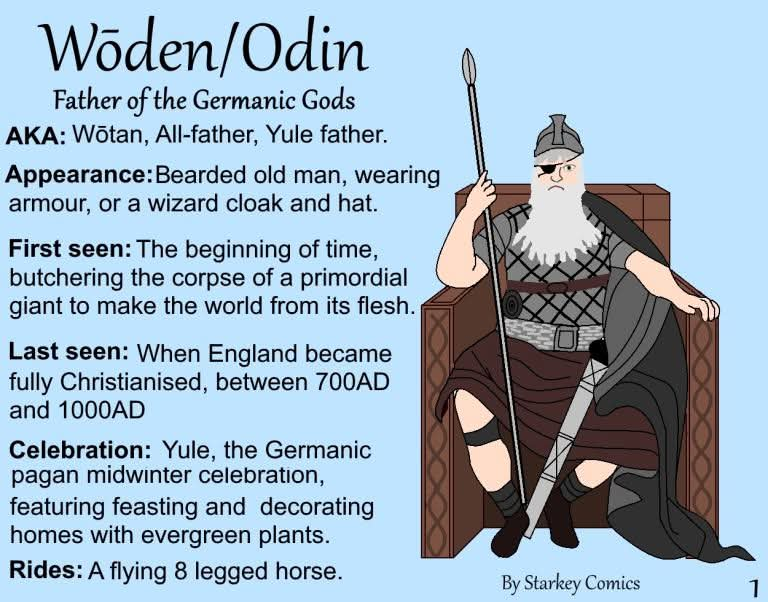




Just remember…

Orange ladybird (Halyzia sedecimguttata) infected with a form of cordyceps.
From the British Mycological Society (BMS) Facebook page.

kii said:
Orange ladybird (Halyzia sedecimguttata) infected with a form of cordyceps.
From the British Mycological Society (BMS) Facebook page.
why does it resemble the Republicans so much
kii said:
Just remember…
what if there’s 2 abusers on different sides
SCIENCE said:
kii said:
Orange ladybird (Halyzia sedecimguttata) infected with a form of cordyceps.
From the British Mycological Society (BMS) Facebook page.
why does it resemble the Republicans so much
LOL
kii said:
Just remember…
So we can look forward to you stopping picking on Roughy?
thanks to Yousr ABC a topic led here
American researcher Victor Heiser worked on developing a method of using the oil against leprosy by intravenous or intramuscular injection. The effectiveness of Chaulmoogra oil as a treatment was highly controversial, while some doctors regarded it as effective, others regarded it as an ineffective treatment. An ethyl ester of the oil (the “Ball method”) was developed by Alice Ball in 1916, who died suddenly before publishing the technique. Her work was stolen by Arthur L. Dean who began producing large quantities of the treatment and named it after himself. It was then produced and marketed by Burroughs Wellcome (modern GlaxoSmithKline) in the early 1920s. The oil preparations were used intravenously for lepers.
give him a Nobel prize
Not All Men
billionaire social troll media platform is all about shooting down MH17



sheesh
SCIENCE said:
billionaire social troll media platform is all about shooting down MH17
sheesh
Witty Rejoinder said:
kii said:
Just remember…
So we can look forward to you stopping picking on Roughy?
Moi?! I’m not picking on him.
My comments are just feedback from a concerned viewer!
SCIENCE said:
kii said:
Just remember…
what if there’s 2 abusers on different sides
Choose carefully.
something for people to consider
Date: 21/12/2024 17:54:28
ID: 2228133

kii said:
so this is a statement about affirming the consequent, profound
Yet more from Quora:
“Could a mathematician please define a ‘point’? I’m having difficulty moving on from Euclid’s definition: “A point is that which has no part”.
Yeah, that definition doesn’t even count in the modern world as a definition.
A more modern definition of point would be “ a pair of real numbers”, or “a member of a two dimensional vector space over a division ring”, or “a member of a two dimensional affine space over a division ring”. But if you insist on synthetic geometry, “point” is what we call an “undefined term”.
In this way of doing things, you write axioms that describe behaviors, and prove implications that those behaviors have for other behaviors. Then there may be many different “interpretations” of those terms,’which is fine as long as the axioms evaluate as true under that interpretaion.
so a point is something of which it’s true that two of them determine a line, whatever that is. And so on.”
Is all that stuff really necessary?
If we are talking about a point on a plane, what is wrong with:
A point is a position on the plane.
The Rev Dodgson said:
Yet more from Quora:“Could a mathematician please define a ‘point’? I’m having difficulty moving on from Euclid’s definition: “A point is that which has no part”.
Yeah, that definition doesn’t even count in the modern world as a definition.A more modern definition of point would be “ a pair of real numbers”, or “a member of a two dimensional vector space over a division ring”, or “a member of a two dimensional affine space over a division ring”. But if you insist on synthetic geometry, “point” is what we call an “undefined term”.
In this way of doing things, you write axioms that describe behaviors, and prove implications that those behaviors have for other behaviors. Then there may be many different “interpretations” of those terms,’which is fine as long as the axioms evaluate as true under that interpretaion.
so a point is something of which it’s true that two of them determine a line, whatever that is. And so on.”
Is all that stuff really necessary?
If we are talking about a point on a plane, what is wrong with:
A point is a position on the plane.
A dot.
Bubblecar said:
The Rev Dodgson said:
Yet more from Quora:“Could a mathematician please define a ‘point’? I’m having difficulty moving on from Euclid’s definition: “A point is that which has no part”.
Yeah, that definition doesn’t even count in the modern world as a definition.A more modern definition of point would be “ a pair of real numbers”, or “a member of a two dimensional vector space over a division ring”, or “a member of a two dimensional affine space over a division ring”. But if you insist on synthetic geometry, “point” is what we call an “undefined term”.
In this way of doing things, you write axioms that describe behaviors, and prove implications that those behaviors have for other behaviors. Then there may be many different “interpretations” of those terms,’which is fine as long as the axioms evaluate as true under that interpretaion.
so a point is something of which it’s true that two of them determine a line, whatever that is. And so on.”
Is all that stuff really necessary?
If we are talking about a point on a plane, what is wrong with:
A point is a position on the plane.
A dot.
…but much much smaller than a polka dot.

Bubblecar said:
Bubblecar said:
The Rev Dodgson said:
Yet more from Quora:“Could a mathematician please define a ‘point’? I’m having difficulty moving on from Euclid’s definition: “A point is that which has no part”.
Yeah, that definition doesn’t even count in the modern world as a definition.A more modern definition of point would be “ a pair of real numbers”, or “a member of a two dimensional vector space over a division ring”, or “a member of a two dimensional affine space over a division ring”. But if you insist on synthetic geometry, “point” is what we call an “undefined term”.
In this way of doing things, you write axioms that describe behaviors, and prove implications that those behaviors have for other behaviors. Then there may be many different “interpretations” of those terms,’which is fine as long as the axioms evaluate as true under that interpretaion.
so a point is something of which it’s true that two of them determine a line, whatever that is. And so on.”
Is all that stuff really necessary?
If we are talking about a point on a plane, what is wrong with:
A point is a position on the plane.
A dot.
…but much much smaller than a polka dot.
Infinitesimally small.
The Rev Dodgson said:
Yet more from Quora:“Could a mathematician please define a ‘point’? I’m having difficulty moving on from Euclid’s definition: “A point is that which has no part”.
Yeah, that definition doesn’t even count in the modern world as a definition.A more modern definition of point would be “ a pair of real numbers”, or “a member of a two dimensional vector space over a division ring”, or “a member of a two dimensional affine space over a division ring”. But if you insist on synthetic geometry, “point” is what we call an “undefined term”.
In this way of doing things, you write axioms that describe behaviors, and prove implications that those behaviors have for other behaviors. Then there may be many different “interpretations” of those terms,’which is fine as long as the axioms evaluate as true under that interpretaion.
so a point is something of which it’s true that two of them determine a line, whatever that is. And so on.”
Is all that stuff really necessary?
If we are talking about a point on a plane, what is wrong with:
A point is a position on the plane.
A point is a position (on a line, on a plane, in space). It is also the position where a line intersects a plane.
Michael V said:
The Rev Dodgson said:
Yet more from Quora:“Could a mathematician please define a ‘point’? I’m having difficulty moving on from Euclid’s definition: “A point is that which has no part”.
Yeah, that definition doesn’t even count in the modern world as a definition.A more modern definition of point would be “ a pair of real numbers”, or “a member of a two dimensional vector space over a division ring”, or “a member of a two dimensional affine space over a division ring”. But if you insist on synthetic geometry, “point” is what we call an “undefined term”.
In this way of doing things, you write axioms that describe behaviors, and prove implications that those behaviors have for other behaviors. Then there may be many different “interpretations” of those terms,’which is fine as long as the axioms evaluate as true under that interpretaion.
so a point is something of which it’s true that two of them determine a line, whatever that is. And so on.”
Is all that stuff really necessary?
If we are talking about a point on a plane, what is wrong with:
A point is a position on the plane.
A point is a position (on a line, on a plane, in space). It is also the position where a line intersects a plane.
sorry we missed this

Not universally true. Some ultra rich people go batty.
dv said:
Not universally true. Some ultra rich people go batty.
There’s exceptions to every generalisation, but ‘gowns’ seems to have made a generalisation that’s more accurate than most.
A perceptive young lady.
dv said:
Not universally true. Some ultra rich people go batty.
One day I might need those vials of pee.
dv said:
Not universally true. Some ultra rich people go batty.
It’s not true at all. The “minimalist look” is just another fashion, particularly long-lived because it’s so easy to achieve even by the aesthetically clueless.
My older sister is wealthy and her house is absolutely crammed with a lifetime’s collected bits and pieces.
Bubblecar said:
dv said:
Not universally true. Some ultra rich people go batty.
It’s not true at all. The “minimalist look” is just another fashion, particularly long-lived because it’s so easy to achieve even by the aesthetically clueless.
My older sister is wealthy and her house is absolutely crammed with a lifetime’s collected bits and pieces.
…ditto my immediately younger sister.
captain_spalding said:
dv said:
Not universally true. Some ultra rich people go batty.
There’s exceptions to every generalisation, but ‘gowns’ seems to have made a generalisation that’s more accurate than most.
A perceptive young lady.
More likely a lady with a stark and sparse home pretending to feel sorry for those of us who have walls of books etc, and trying to claim that’s only ‘cos we’re “poor” :)
dv said:
Not universally true. Some ultra rich people go batty.
or they collect things that are more expensive, like cars, boats, and gold teeth from immigrants
Bubblecar said:
captain_spalding said:
dv said:
Not universally true. Some ultra rich people go batty.
There’s exceptions to every generalisation, but ‘gowns’ seems to have made a generalisation that’s more accurate than most.
A perceptive young lady.
More likely a lady with a stark and sparse home pretending to feel sorry for those of us who have walls of books etc, and trying to claim that’s only ‘cos we’re “poor” :)
There’s a difference between being a hoarder and having a love of knick-knacks.
Witty Rejoinder said:
Bubblecar said:
captain_spalding said:There’s exceptions to every generalisation, but ‘gowns’ seems to have made a generalisation that’s more accurate than most.
A perceptive young lady.
More likely a lady with a stark and sparse home pretending to feel sorry for those of us who have walls of books etc, and trying to claim that’s only ‘cos we’re “poor” :)
There’s a difference between being a hoarder and having a love of knick-knacks.
She specifically mentioned “stacks of books” and mistakenly believes these are “assets” that the poor need to hang onto :)
She also wants us to believe “the rich” prefer cheap bare walls to fine art. Would only be true in regard to the rich people who wouldn’t have a clue about art.
Bubblecar said:
captain_spalding said:
dv said:
Not universally true. Some ultra rich people go batty.
There’s exceptions to every generalisation, but ‘gowns’ seems to have made a generalisation that’s more accurate than most.
A perceptive young lady.
More likely a lady with a stark and sparse home pretending to feel sorry for those of us who have walls of books etc, and trying to claim that’s only ‘cos we’re “poor” :)
possibly.
Or, a lady from a ‘poor’ but cluttered background, who offers her interpretation of it.
captain_spalding said:
Bubblecar said:
captain_spalding said:There’s exceptions to every generalisation, but ‘gowns’ seems to have made a generalisation that’s more accurate than most.
A perceptive young lady.
More likely a lady with a stark and sparse home pretending to feel sorry for those of us who have walls of books etc, and trying to claim that’s only ‘cos we’re “poor” :)
possibly.
Or, a lady from a ‘poor’ but cluttered background, who offers her interpretation of it.
Not likely. She’s trying to find reasons to disparage people who shun crappy minimalism, claiming that were actually “terrified” of it :)
Bubblecar said:
Witty Rejoinder said:
Bubblecar said:More likely a lady with a stark and sparse home pretending to feel sorry for those of us who have walls of books etc, and trying to claim that’s only ‘cos we’re “poor” :)
There’s a difference between being a hoarder and having a love of knick-knacks.
She specifically mentioned “stacks of books” and mistakenly believes these are “assets” that the poor need to hang onto :)
She also wants us to believe “the rich” prefer cheap bare walls to fine art. Would only be true in regard to the rich people who wouldn’t have a clue about art.
Keeping all your books is a fine endeavor but if you still have stacks of Women’s Weekly from the the ’70s you may have a problem.
Witty Rejoinder said:
Bubblecar said:
Witty Rejoinder said:There’s a difference between being a hoarder and having a love of knick-knacks.
She specifically mentioned “stacks of books” and mistakenly believes these are “assets” that the poor need to hang onto :)
She also wants us to believe “the rich” prefer cheap bare walls to fine art. Would only be true in regard to the rich people who wouldn’t have a clue about art.
Keeping all your books is a fine endeavor but if you still have stacks of Women’s Weekly from the the ’70s you may have a problem.
I have stacks of Women’s Weekly from the 50s and 60s, because they’re pleasing and engrossing documents of their era.
Bubblecar said:
captain_spalding said:
Bubblecar said:More likely a lady with a stark and sparse home pretending to feel sorry for those of us who have walls of books etc, and trying to claim that’s only ‘cos we’re “poor” :)
possibly.
Or, a lady from a ‘poor’ but cluttered background, who offers her interpretation of it.
Not likely. She’s trying to find reasons to disparage people who shun crappy minimalism, claiming that were actually “terrified” of it :)
were = we’re
Bubblecar said:
Witty Rejoinder said:
Bubblecar said:She specifically mentioned “stacks of books” and mistakenly believes these are “assets” that the poor need to hang onto :)
She also wants us to believe “the rich” prefer cheap bare walls to fine art. Would only be true in regard to the rich people who wouldn’t have a clue about art.
Keeping all your books is a fine endeavor but if you still have stacks of Women’s Weekly from the the ’70s you may have a problem.
I have stacks of Women’s Weekly from the 50s and 60s, because they’re pleasing and engrossing documents of their era.
Yes, i enjoy the large online catalogue of back numbers of ‘Popular Mechanics’ and ‘Popular Science’ for the same reason.
Bubblecar said:
Witty Rejoinder said:
Bubblecar said:She specifically mentioned “stacks of books” and mistakenly believes these are “assets” that the poor need to hang onto :)
She also wants us to believe “the rich” prefer cheap bare walls to fine art. Would only be true in regard to the rich people who wouldn’t have a clue about art.
Keeping all your books is a fine endeavor but if you still have stacks of Women’s Weekly from the the ’70s you may have a problem.
I have stacks of Women’s Weekly from the 50s and 60s, because they’re pleasing and engrossing documents of their era.
When did you last get them out and read them though?
visual chaos is exhausting.
https://www.cell.com/neuron/abstract/S0896-6273(24)00693-7?_returnURL=https%3A%2F%2Flinkinghub.elsevier.com%2Fretrieve%2Fpii%2FS0896627324006937%3Fshowall%3Dtrue
Witty Rejoinder said:
Bubblecar said:
Witty Rejoinder said:Keeping all your books is a fine endeavor but if you still have stacks of Women’s Weekly from the the ’70s you may have a problem.
I have stacks of Women’s Weekly from the 50s and 60s, because they’re pleasing and engrossing documents of their era.
When did you last get them out and read them though?
I keep forgetting I have them, so quite a long time ago. But I’m glad you’ve reminded me :)
They are very large format but I can read them comfortably enough on the big desk in the art room.
Witty Rejoinder said:
Bubblecar said:
Witty Rejoinder said:Keeping all your books is a fine endeavor but if you still have stacks of Women’s Weekly from the the ’70s you may have a problem.
I have stacks of Women’s Weekly from the 50s and 60s, because they’re pleasing and engrossing documents of their era.
When did you last get them out and read them though?
Plus are these something you purchased specifically for their aesthetic appeal or original copies you subscribed to from that era that you can’t get rid of?
Witty Rejoinder said:
Witty Rejoinder said:
Bubblecar said:I have stacks of Women’s Weekly from the 50s and 60s, because they’re pleasing and engrossing documents of their era.
When did you last get them out and read them though?
Plus are these something you purchased specifically for their aesthetic appeal or original copies you subscribed to from that era that you can’t get rid of?
They’re ‘collectors’ items’ of a kind.
I’ve seen copies of 1950s and 1960s WWs in various antiques emporiums, and issues in good condition can set your back several dollars each.
Arts said:
visual chaos is exhausting.https://www.cell.com/neuron/abstract/S0896-6273(24)00693-7?_returnURL=https%3A%2F%2Flinkinghub.elsevier.com%2Fretrieve%2Fpii%2FS0896627324006937%3Fshowall%3Dtrue
There’s a huge difference between “visual chaos” and an appealingly and artistically arranged home, born of varied enthusiasms over a long time.
The minimalist homes furnished and presented like spartan office foyers or waiting rooms, reflecting no history of engagement or interest in life, make me feel depressed. I couldn’t live like that.
Arts said:
visual chaos is exhausting.https://www.cell.com/neuron/abstract/S0896-6273(24)00693-7?_returnURL=https%3A%2F%2Flinkinghub.elsevier.com%2Fretrieve%2Fpii%2FS0896627324006937%3Fshowall%3Dtrue
Kind of relevant to our clutter discussion
Witty Rejoinder said:
Witty Rejoinder said:
Bubblecar said:I have stacks of Women’s Weekly from the 50s and 60s, because they’re pleasing and engrossing documents of their era.
When did you last get them out and read them though?
Plus are these something you purchased specifically for their aesthetic appeal or original copies you subscribed to from that era that you can’t get rid of?
The former. I’m not that ancient :)
Arts said:
dv said:
Not universally true. Some ultra rich people go batty.
or they collect things that are more expensive, like cars, boats, and gold teeth from immigrants
Or like this guy
https://www.facebook.com/share/v/155wak8L6r/
Bubblecar said:
Arts said:
visual chaos is exhausting.https://www.cell.com/neuron/abstract/S0896-6273(24)00693-7?_returnURL=https%3A%2F%2Flinkinghub.elsevier.com%2Fretrieve%2Fpii%2FS0896627324006937%3Fshowall%3Dtrue
There’s a huge difference between “visual chaos” and an appealingly and artistically arranged home, born of varied enthusiasms over a long time.
The minimalist homes furnished and presented like spartan office foyers or waiting rooms, reflecting no history of engagement or interest in life, make me feel depressed. I couldn’t live like that.
and yet some people prefer it… it’s a rich tapestry
Arts said:
Bubblecar said:
Arts said:
visual chaos is exhausting.https://www.cell.com/neuron/abstract/S0896-6273(24)00693-7?_returnURL=https%3A%2F%2Flinkinghub.elsevier.com%2Fretrieve%2Fpii%2FS0896627324006937%3Fshowall%3Dtrue
There’s a huge difference between “visual chaos” and an appealingly and artistically arranged home, born of varied enthusiasms over a long time.
The minimalist homes furnished and presented like spartan office foyers or waiting rooms, reflecting no history of engagement or interest in life, make me feel depressed. I couldn’t live like that.
and yet some people prefer it… it’s a rich tapestry
Although minimalist interiors aren’t a rich tapestry.
Bubblecar said:
Witty Rejoinder said:
Witty Rejoinder said:When did you last get them out and read them though?
Plus are these something you purchased specifically for their aesthetic appeal or original copies you subscribed to from that era that you can’t get rid of?
The former. I’m not that ancient :)
Then we’re really talking about 2 different things. And to CS’s post about ‘Popular Mechanics’, keeping magazines that are in good condition that could one day be sold/passed along to those who value such things is also another scenario too.
Witty Rejoinder said:
Bubblecar said:
Witty Rejoinder said:Plus are these something you purchased specifically for their aesthetic appeal or original copies you subscribed to from that era that you can’t get rid of?
The former. I’m not that ancient :)
Then we’re really talking about 2 different things. And to CS’s post about ‘Popular Mechanics’, keeping magazines that are in good condition that could one day be sold/passed along to those who value such things is also another scenario too.
My post was moreabout how the contents of the old magazines reflect the society and priorities of the time.
For instance, here’s an instance of the long-running ‘Popular Science’ feature, ‘Wordless Workshop’, from May 1955.
The depiction of the family, particularly of ‘the wife’ as an emotionally fragile creature, and of ‘the husband’ as the source of inspiration and solutions, is reflective of the social values of the time, in somedegree.
As well, it relates to hanging clothes, in the open air, on a clothes line.
Looking through the sequence of PS issue, we see a regular stream of ‘ideas’ and items relating to thuse of clothes lines, up until the mid-1950s.
Thereafter, they steadily decline in number, until by the eary-to mid-1960s and after, there’s never a mention of a clothes line, indicating that the use of such things fell very much out of favour in American society, perhaps associated with ‘poor folks’, whereas the more prospererous and middle-class demographic of PS and PM were embracing clothes-driers, and were uninterested in clothes lines.
captain_spalding said:
For instance, here’s an instance of the long-running ‘Popular Science’ feature, ‘Wordless Workshop’, from May 1955.
Here it is:


Bubblecar said:
Witty Rejoinder said:
Bubblecar said:She specifically mentioned “stacks of books” and mistakenly believes these are “assets” that the poor need to hang onto :)
She also wants us to believe “the rich” prefer cheap bare walls to fine art. Would only be true in regard to the rich people who wouldn’t have a clue about art.
Keeping all your books is a fine endeavor but if you still have stacks of Women’s Weekly from the the ’70s you may have a problem.
I have stacks of Women’s Weekly from the 50s and 60s, because they’re pleasing and engrossing documents of their era.
Do they have Mandrake The Magician comics in the back?
captain_spalding said:
captain_spalding said:For instance, here’s an instance of the long-running ‘Popular Science’ feature, ‘Wordless Workshop’, from May 1955.
Here it is:
now he has to build her another mop from the one that was destroyed to make the peg basket…
Neophyte said:
Bubblecar said:
Witty Rejoinder said:Keeping all your books is a fine endeavor but if you still have stacks of Women’s Weekly from the the ’70s you may have a problem.
I have stacks of Women’s Weekly from the 50s and 60s, because they’re pleasing and engrossing documents of their era.
Do they have Mandrake The Magician comics in the back?
They do indeed.
Arts said:
visual chaos is exhausting.https://www.cell.com/neuron/abstract/S0896-6273(24)00693-7?_returnURL=https%3A%2F%2Flinkinghub.elsevier.com%2Fretrieve%2Fpii%2FS0896627324006937%3Fshowall%3Dtrue
I don’t see how that supports your assertion.
Arts said:
captain_spalding said:
captain_spalding said:For instance, here’s an instance of the long-running ‘Popular Science’ feature, ‘Wordless Workshop’, from May 1955.
Here it is:
now he has to build her another mop from the one that was destroyed to make the peg basket…
That’s what I was thinking.
Arts said:
captain_spalding said:
captain_spalding said:For instance, here’s an instance of the long-running ‘Popular Science’ feature, ‘Wordless Workshop’, from May 1955.
Here it is:
now he has to build her another mop from the one that was destroyed to make the peg basket…
Pedant speaking… I don’t think it needs to mop handle if he did some proper joinery to hold the panels together.
Neophyte said:
Bubblecar said:
Witty Rejoinder said:Keeping all your books is a fine endeavor but if you still have stacks of Women’s Weekly from the the ’70s you may have a problem.
I have stacks of Women’s Weekly from the 50s and 60s, because they’re pleasing and engrossing documents of their era.
Do they have Mandrake The Magician comics in the back?
Mandrake’s not real.
Peak Warming Man said:
Neophyte said:
Bubblecar said:I have stacks of Women’s Weekly from the 50s and 60s, because they’re pleasing and engrossing documents of their era.
Do they have Mandrake The Magician comics in the back?
Mandrake’s not real.

Peak Warming Man said:
Neophyte said:
Bubblecar said:I have stacks of Women’s Weekly from the 50s and 60s, because they’re pleasing and engrossing documents of their era.
Do they have Mandrake The Magician comics in the back?
Mandrake’s not real.
Maybe he fed real mandrake to people.
Arts said:
Bubblecar said:
Arts said:
visual chaos is exhausting.https://www.cell.com/neuron/abstract/S0896-6273(24)00693-7?_returnURL=https%3A%2F%2Flinkinghub.elsevier.com%2Fretrieve%2Fpii%2FS0896627324006937%3Fshowall%3Dtrue
There’s a huge difference between “visual chaos” and an appealingly and artistically arranged home, born of varied enthusiasms over a long time.
The minimalist homes furnished and presented like spartan office foyers or waiting rooms, reflecting no history of engagement or interest in life, make me feel depressed. I couldn’t live like that.
and yet some people prefer it… it’s a rich tapestry
Arts said:
Bubblecar said:
Arts said:
visual chaos is exhausting.https://www.cell.com/neuron/abstract/S0896-6273(24)00693-7?_returnURL=https%3A%2F%2Flinkinghub.elsevier.com%2Fretrieve%2Fpii%2FS0896627324006937%3Fshowall%3Dtrue
There’s a huge difference between “visual chaos” and an appealingly and artistically arranged home, born of varied enthusiasms over a long time.
The minimalist homes furnished and presented like spartan office foyers or waiting rooms, reflecting no history of engagement or interest in life, make me feel depressed. I couldn’t live like that.
and yet some people prefer it… it’s a rich tapestry
I don’t concern myself how others live that doesn’t impact on my way of life. I think to do so shows and insecurity in ones choices.
party_pants said:
Arts said:
captain_spalding said:Here it is:
now he has to build her another mop from the one that was destroyed to make the peg basket…
Pedant speaking… I don’t think it needs to mop handle if he did some proper joinery to hold the panels together.
It’s a handle, for transporting it to andfrom the clothes line.
As for the mop: surely, she doesn’t need it.
She has that lovely new scrubbing brush, and a plentiful supply of rags.
JudgeMental said:
Arts said:
Bubblecar said:There’s a huge difference between “visual chaos” and an appealingly and artistically arranged home, born of varied enthusiasms over a long time.
The minimalist homes furnished and presented like spartan office foyers or waiting rooms, reflecting no history of engagement or interest in life, make me feel depressed. I couldn’t live like that.
and yet some people prefer it… it’s a rich tapestry
I don’t concern myself how others live that doesn’t impact on my way of life. I think to do so shows and insecurity in ones choices.
Tell that to the “gowns” lady :)
captain_spalding said:
party_pants said:
Arts said:now he has to build her another mop from the one that was destroyed to make the peg basket…
Pedant speaking… I don’t think it needs to mop handle if he did some proper joinery to hold the panels together.
It’s a handle, for transporting it to andfrom the clothes line.
As for the mop: surely, she doesn’t need it.
She has that lovely new scrubbing brush, and a plentiful supply of rags.
I believe it is a straw broom rather than a mop, but then I am not a housewife so what would I know.
JudgeMental said:
captain_spalding said:
party_pants said:Pedant speaking… I don’t think it needs to mop handle if he did some proper joinery to hold the panels together.
It’s a handle, for transporting it to andfrom the clothes line.
As for the mop: surely, she doesn’t need it.
She has that lovely new scrubbing brush, and a plentiful supply of rags.
I believe it is a straw broom rather than a mop, but then I am not a housewife so what would I know.
I identified it as a straw broom, but I didn’t want to be seen to split hairs on that point.
JudgeMental said:
I don’t concern myself how others live that doesn’t impact on my way of life. I think to do so shows and insecurity in ones choices.
But, rich people, especially very rich people, often do.
They like to make sure that poor people stay poor, because wealth is a comparative measure, and if there’s no poor people, then how can we determine who’s rich?
JudgeMental said:
captain_spalding said:
party_pants said:Pedant speaking… I don’t think it needs to mop handle if he did some proper joinery to hold the panels together.
It’s a handle, for transporting it to andfrom the clothes line.
As for the mop: surely, she doesn’t need it.
She has that lovely new scrubbing brush, and a plentiful supply of rags.
I believe it is a straw broom rather than a mop, but then I am not a housewife so what would I know.
I believe that you’re right.
Well, she’ll just have to use the hand-brush to sweep the floors now.
captain_spalding said:
JudgeMental said:I don’t concern myself how others live that doesn’t impact on my way of life. I think to do so shows and insecurity in ones choices.
But, rich people, especially very rich people, often do.
They like to make sure that poor people stay poor, because wealth is a comparative measure, and if there’s no poor people, then how can we determine who’s rich?
and vice versa.
JudgeMental said:
captain_spalding said:
JudgeMental said:I don’t concern myself how others live that doesn’t impact on my way of life. I think to do so shows and insecurity in ones choices.
But, rich people, especially very rich people, often do.
They like to make sure that poor people stay poor, because wealth is a comparative measure, and if there’s no poor people, then how can we determine who’s rich?
and vice versa.
There are certainly plenty of poor people in the USA who want to make sure the rich stay rich, hence the election result.
captain_spalding said:
JudgeMental said:
captain_spalding said:It’s a handle, for transporting it to andfrom the clothes line.
As for the mop: surely, she doesn’t need it.
She has that lovely new scrubbing brush, and a plentiful supply of rags.
I believe it is a straw broom rather than a mop, but then I am not a housewife so what would I know.
I believe that you’re right.
Well, she’ll just have to use the hand-brush to sweep the floors now.
or he could get her one of those new fangled sucking machines. Though to be accurate there is actually no such thing as suck. but most people don’t know that.
JudgeMental said:
captain_spalding said:
party_pants said:Pedant speaking… I don’t think it needs to mop handle if he did some proper joinery to hold the panels together.
It’s a handle, for transporting it to andfrom the clothes line.
As for the mop: surely, she doesn’t need it.
She has that lovely new scrubbing brush, and a plentiful supply of rags.
I believe it is a straw broom rather than a mop, but then I am not a housewife so what would I know.
And an old, worn out, messed up one at that.
That’s why some people save some things – they may become useful.
Michael V said:
JudgeMental said:
captain_spalding said:It’s a handle, for transporting it to andfrom the clothes line.
As for the mop: surely, she doesn’t need it.
She has that lovely new scrubbing brush, and a plentiful supply of rags.
I believe it is a straw broom rather than a mop, but then I am not a housewife so what would I know.
And an old, worn out, messed up one at that.
That’s why some people save some things – they may become useful.
i have a shed full of such things.
JudgeMental said:
captain_spalding said:
party_pants said:Pedant speaking… I don’t think it needs to mop handle if he did some proper joinery to hold the panels together.
It’s a handle, for transporting it to andfrom the clothes line.
As for the mop: surely, she doesn’t need it.
She has that lovely new scrubbing brush, and a plentiful supply of rags.
I believe it is a straw broom rather than a mop, but then I am not a housewife so what would I know.
Me either, which is why I thought it was a mop. I don’t use mops or brooms. Nor do I do washing.
captain_spalding said:
party_pants said:
Arts said:now he has to build her another mop from the one that was destroyed to make the peg basket…
Pedant speaking… I don’t think it needs to mop handle if he did some proper joinery to hold the panels together.
It’s a handle, for transporting it to andfrom the clothes line.
As for the mop: surely, she doesn’t need it.
She has that lovely new scrubbing brush, and a plentiful supply of rags.
I imagined the peg box staying permanently on the line. But whatever.
Could always make the sweeping/mopping the child’s job from now on on account of the short handle.
JudgeMental said:
Michael V said:
JudgeMental said:I believe it is a straw broom rather than a mop, but then I am not a housewife so what would I know.
And an old, worn out, messed up one at that.
That’s why some people save some things – they may become useful.
i have a shed full of such things.
I had a box and drawer.. once I even used something from it.
JudgeMental said:
Michael V said:
JudgeMental said:I believe it is a straw broom rather than a mop, but then I am not a housewife so what would I know.
And an old, worn out, messed up one at that.
That’s why some people save some things – they may become useful.
i have a shed full of such things.
:)
Me, too – including old wooden broom and mop handles.
JudgeMental said:
Michael V said:
JudgeMental said:I believe it is a straw broom rather than a mop, but then I am not a housewife so what would I know.
And an old, worn out, messed up one at that.
That’s why some people save some things – they may become useful.
i have a shed full of such things.
https://www.youtube.com/watch?v=7Fw7bZoPyVU
party_pants said:
Could always make the sweeping/mopping the child’s job from now on on account of the short handle.
That’s what i call ‘thinking’.
Bubblecar said:
dv said:
Not universally true. Some ultra rich people go batty.
It’s not true at all. The “minimalist look” is just another fashion, particularly long-lived because it’s so easy to achieve even by the aesthetically clueless.
My older sister is wealthy and her house is absolutely crammed with a lifetime’s collected bits and pieces.
^
Perhaps the cartoon is meant humorously
dv said:
Perhaps the cartoon is meant humorously
How dare it
https://www.facebook.com/share/v/15j8akZqRn/
Topology mystery
They look like gingko leaves.
Face-off between two alluvial fans, Yuzhny Island, Novaya Zemlya, Russia.
(image source: Apple Maps; caption by Zoltán Sylvester)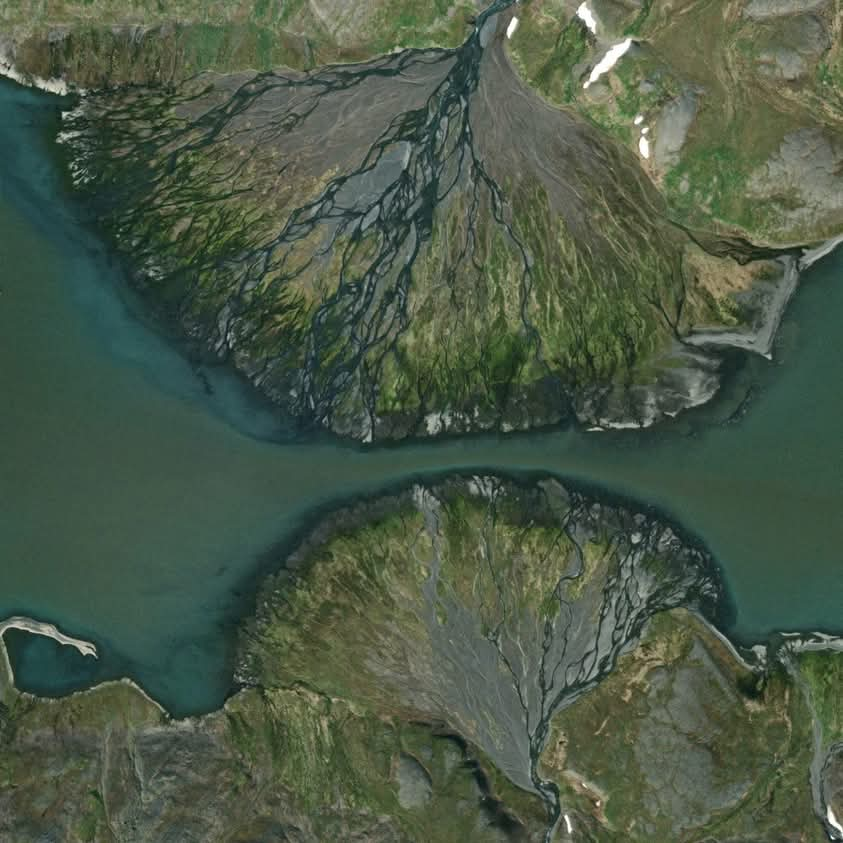
kii said:
They look like gingko leaves.Face-off between two alluvial fans, Yuzhny Island, Novaya Zemlya, Russia.
(image source: Apple Maps; caption by Zoltán Sylvester)
Good
dv said:
kii said:
They look like gingko leaves.Face-off between two alluvial fans, Yuzhny Island, Novaya Zemlya, Russia.
(image source: Apple Maps; caption by Zoltán Sylvester)
Good
Is it?

SCIENCE said:
:)
:)
:)

dv said:
It’s funny, but i think of all the people who are still around, but who i consider as being ‘lost to me’.
But, i find it very much harder to imagine that any of them consider that i’m any loss to them
captain_spalding said:
dv said:
It’s funny, but i think of all the people who are still around, but who i consider as being ‘lost to me’.
But, i find it very much harder to imagine that any of them consider that i’m any loss to them
I wonder if they’ll come to my funeral.
roughbarked said:
captain_spalding said:
dv said:
It’s funny, but i think of all the people who are still around, but who i consider as being ‘lost to me’.
But, i find it very much harder to imagine that any of them consider that i’m any loss to them
I wonder if they’ll come to my funeral.
I know that none of them would be at mine. Meh.
captain_spalding said:
roughbarked said:
captain_spalding said:It’s funny, but i think of all the people who are still around, but who i consider as being ‘lost to me’.
But, i find it very much harder to imagine that any of them consider that i’m any loss to them
I wonder if they’ll come to my funeral.
I know that none of them would be at mine. Meh.
Exactly.
roughbarked said:
Exactly.
As Don Henely said:
don’t look back
you can never look back
captain_spalding said:
roughbarked said:Exactly.
As Don Henely said:
don’t look back
you can never look back
He also sang: Take it Easy.
captain_spalding said:
roughbarked said:Exactly.
As Don Henely said:
don’t look back
you can never look back
Don Henley, that is.
captain_spalding said:
roughbarked said:Exactly.
As Don Henely said:
don’t look back
you can never look back
Don Henley, that is.
captain_spalding said:
roughbarked said:Exactly.
As Don Henely said:
don’t look back
you can never look back
The lady who came to give us a talk on bowel cancer said always look back.
captain_spalding said:
roughbarked said:
captain_spalding said:It’s funny, but i think of all the people who are still around, but who i consider as being ‘lost to me’.
But, i find it very much harder to imagine that any of them consider that i’m any loss to them
I wonder if they’ll come to my funeral.
I know that none of them would be at mine. Meh.
They are already dead. I’m sure that they would be there if there were still here.
We are still here.
I’ll bring an orange, and tell everyone there that they were not worthy of your presence there.
People letting of fire works around here at random intervals.
It’s making me a bit unsettled. I feel that i should, in some way, ‘get ready’
Just how, and for what, i don’t know, and i think it’sthat which makes me feel unsettled.
Kingy said:
captain_spalding said:
roughbarked said:I wonder if they’ll come to my funeral.
I know that none of them would be at mine. Meh.
They are already dead. I’m sure that they would be there if there were still here.
We are still here.
I’ll bring an orange, and tell everyone there that they were not worthy of your presence there.
Just ask them what colour it would be in the dark.
captain_spalding said:
People letting of fire works around here at random intervals.It’s making me a bit unsettled. I feel that i should, in some way, ‘get ready’
Just how, and for what, i don’t know, and i think it’sthat which makes me feel unsettled.
Earplugs?
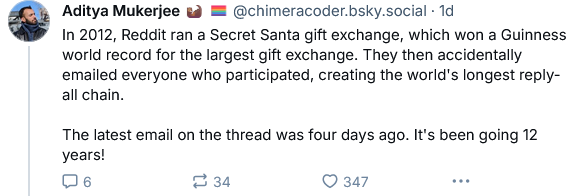




https://youtu.be/4H4sScCB1cY?si=lGes9WFppAb4VRrG
LegalEagles is suing Paypal Honey, which has been stealing money from creators.
SCIENCE said:
kii said:
oh but what makes it perfect is it aigen
Building an autonomous future with no harmful chemicals in our food?
roughbarked said:
SCIENCE said:kii said:
oh but what makes it perfect is it aigen
Building an autonomous future with no harmful chemicals in our food?
might be difficult getting the Potassium 40 out of bananas and the formaldehyde out of pears.
Bogsnorkler said:
roughbarked said:
SCIENCE said:
oh but what makes it perfect is it aigen
Building an autonomous future with no harmful chemicals in our food?
might be difficult getting the Potassium 40 out of bananas and the formaldehyde out of pears.
but nuclear reactions aren’t chemical reactions so them bananas are all good
Bogsnorkler said:
roughbarked said:
SCIENCE said:oh but what makes it perfect is it aigen
Building an autonomous future with no harmful chemicals in our food?
might be difficult getting the Potassium 40 out of bananas and the formaldehyde out of pears.
:)
roughbarked said:
Bogsnorkler said:
roughbarked said:Building an autonomous future with no harmful chemicals in our food?
might be difficult getting the Potassium 40 out of bananas and the formaldehyde out of pears.
:)
What about the cyanide in apples?
captain_spalding said:
roughbarked said:
Bogsnorkler said:might be difficult getting the Potassium 40 out of bananas and the formaldehyde out of pears.
:)
What about the cyanide in apples?
Cyanide is also in almonds and apricot, peach etc. All the Prunus.
roughbarked said:
captain_spalding said:
roughbarked said::)
What about the cyanide in apples?
Cyanide is also in almonds and apricot, peach etc. All the Prunus.
and by he way, I copied that phrase from the Aigen website. “Building an autonomous future with no harmful chemicals in our food.”.
roughbarked said:
Bogsnorkler said:
roughbarked said:Building an autonomous future with no harmful chemicals in our food?
might be difficult getting the Potassium 40 out of bananas and the formaldehyde out of pears.
:)
Speaking of bananas, we played the bananagrams game that we got for Christmas. You get some letters randomly and you set out words in a scrabble-like formation. If you run out of letters you say “split” and everyone picks up another letter from the bag.. you can also swap a letter for three other letters from the bag.
Once there’s fewer letters remaining in the bag then the last person to be void of letters wins.
It kind of seems like a flawed game. Like, everyone’s racing to make words but it seems to me that the good strategy is to just make the mininum grid necessary to have enough versatile hooks to accept the last few letters no matter what they are… and then just wait, and pounce in the last few seconds. But if everyone did that strategy then the game would just halt. Seems like a game for good-natured people who just want to enjoy a game so it might not be the right fit for me.
dv said:
roughbarked said:
Bogsnorkler said:might be difficult getting the Potassium 40 out of bananas and the formaldehyde out of pears.
:)
Speaking of bananas, we played the bananagrams game that we got for Christmas. You get some letters randomly and you set out words in a scrabble-like formation. If you run out of letters you say “split” and everyone picks up another letter from the bag.. you can also swap a letter for three other letters from the bag.
Once there’s fewer letters remaining in the bag then the last person to be void of letters wins.It kind of seems like a flawed game. Like, everyone’s racing to make words but it seems to me that the good strategy is to just make the mininum grid necessary to have enough versatile hooks to accept the last few letters no matter what they are… and then just wait, and pounce in the last few seconds. But if everyone did that strategy then the game would just halt. Seems like a game for good-natured people who just want to enjoy a game so it might not be the right fit for me.
Might be more congenial if everyone has their killer instincts mellowed by a few libations first.
captain_spalding said:
dv said:
roughbarked said::)
Speaking of bananas, we played the bananagrams game that we got for Christmas. You get some letters randomly and you set out words in a scrabble-like formation. If you run out of letters you say “split” and everyone picks up another letter from the bag.. you can also swap a letter for three other letters from the bag.
Once there’s fewer letters remaining in the bag then the last person to be void of letters wins.It kind of seems like a flawed game. Like, everyone’s racing to make words but it seems to me that the good strategy is to just make the mininum grid necessary to have enough versatile hooks to accept the last few letters no matter what they are… and then just wait, and pounce in the last few seconds. But if everyone did that strategy then the game would just halt. Seems like a game for good-natured people who just want to enjoy a game so it might not be the right fit for me.
Might be more congenial if everyone has their killer instincts mellowed by a few libations first.
How do ya shpell phawmaldahhide anyway, hic?
Kingy said:
captain_spalding said:
dv said:Speaking of bananas, we played the bananagrams game that we got for Christmas. You get some letters randomly and you set out words in a scrabble-like formation. If you run out of letters you say “split” and everyone picks up another letter from the bag.. you can also swap a letter for three other letters from the bag.
Once there’s fewer letters remaining in the bag then the last person to be void of letters wins.It kind of seems like a flawed game. Like, everyone’s racing to make words but it seems to me that the good strategy is to just make the mininum grid necessary to have enough versatile hooks to accept the last few letters no matter what they are… and then just wait, and pounce in the last few seconds. But if everyone did that strategy then the game would just halt. Seems like a game for good-natured people who just want to enjoy a game so it might not be the right fit for me.
Might be more congenial if everyone has their killer instincts mellowed by a few libations first.
How do ya shpell phawmaldahhide anyway, hic?
With a 4, i think. Wheresh the foursh?
Colorful corn (Zea mays) seeds from various cultivars, some of these are known as ‚glass gem corn‘. Photography by Jonas Frei.
Jonas Frei is a landscape architect and urban ecologist from Zurich, Switzerland. His areas of expertise are botany, photography, documentary film, illustration and the design of open spaces. He is author of books and various articles and has published on the diversity of hazelnuts and walnuts.
www.foifacht.ch
https://www.instagram.com/j.d.frei/?hl=en

kii said:
Colorful corn (Zea mays) seeds from various cultivars, some of these are known as ‚glass gem corn‘. Photography by Jonas Frei.Jonas Frei is a landscape architect and urban ecologist from Zurich, Switzerland. His areas of expertise are botany, photography, documentary film, illustration and the design of open spaces. He is author of books and various articles and has published on the diversity of hazelnuts and walnuts.
www.foifacht.ch
https://www.instagram.com/j.d.frei/?hl=en
I have never seen any corn colour other than yellow. The photos look amazing.
Michael V said:
kii said:
Colorful corn (Zea mays) seeds from various cultivars, some of these are known as ‚glass gem corn‘. Photography by Jonas Frei.Jonas Frei is a landscape architect and urban ecologist from Zurich, Switzerland. His areas of expertise are botany, photography, documentary film, illustration and the design of open spaces. He is author of books and various articles and has published on the diversity of hazelnuts and walnuts.
www.foifacht.ch
https://www.instagram.com/j.d.frei/?hl=en
I have never seen any corn colour other than yellow. The photos look amazing.
A variety of Indian corn.
kii said:
Michael V said:
kii said:
Colorful corn (Zea mays) seeds from various cultivars, some of these are known as ‚glass gem corn‘. Photography by Jonas Frei.Jonas Frei is a landscape architect and urban ecologist from Zurich, Switzerland. His areas of expertise are botany, photography, documentary film, illustration and the design of open spaces. He is author of books and various articles and has published on the diversity of hazelnuts and walnuts.
www.foifacht.ch
https://www.instagram.com/j.d.frei/?hl=en
I have never seen any corn colour other than yellow. The photos look amazing.
A variety of Indian corn.
Glass gem corn is lovely.
My old art teacher gave me some when I met him when my kids were little. I had it hanging on the wall for years. I had no idea what a special gift it was until my daughter became obsessed with wanting to grow it. Ten years later she finally succeeded, but it wasn’t nearly as plump and colourful as my old art teacher’s ones. Two years in a row she was sold seed of blue maize and then red maize. Pretty, but not glass gem corn.

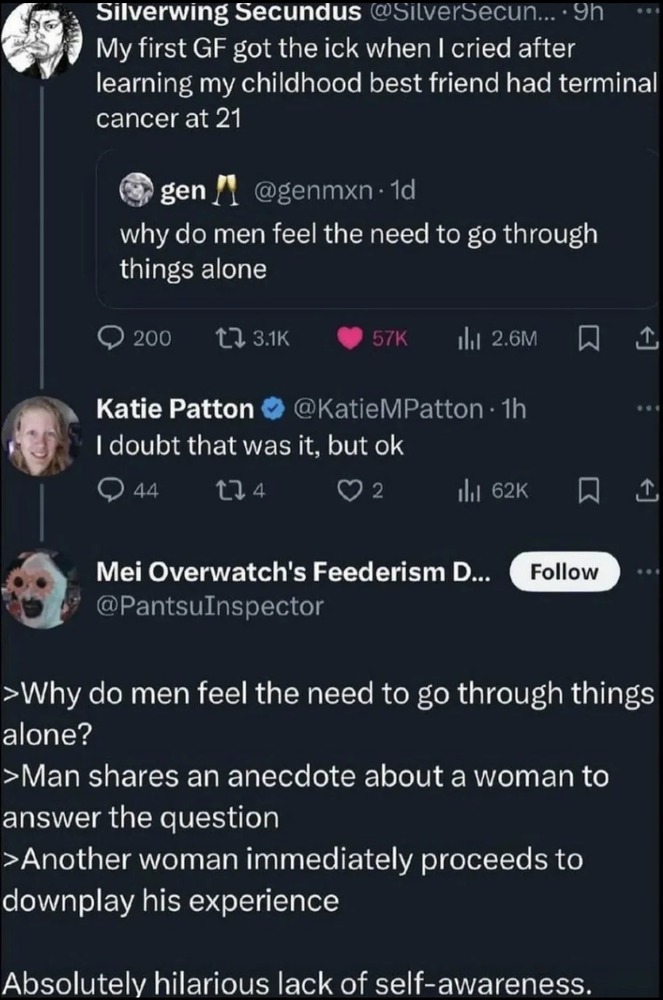
this problem:
The Riddle That Seems Impossible Even If You Know The Answer
18 minute video, but it has a transcript.
The Rev Dodgson said:
this problem:The Riddle That Seems Impossible Even If You Know The Answer
18 minute video, but it has a transcript.
What’s the riddle briefly?
The Rev Dodgson said:
this problem:The Riddle That Seems Impossible Even If You Know The Answer
18 minute video, but it has a transcript.
what did the transcript say
Witty Rejoinder said:
The Rev Dodgson said:
this problem:The Riddle That Seems Impossible Even If You Know The Answer
18 minute video, but it has a transcript.
What’s the riddle briefly?
It’s in the video!
But OK.
There are 100 prisoners, numbered 1 to 100, and a room with 100 boxes, each containing a number of 1 of the prisoners.
Each prisoner can go into the room by themselves and look in 50 boxes.
If all 100 prisoners find their number, they all go free.
If even 1 fails to find their number, they are all executed.
They can agree a strategy before they start, but not communicate once the process has started.
If they all choose at random, the chance of any one prisoner finding their number is 0.5, so the chance of all 100 finding theirs is 0.5^100, which is as close to zero as makes no difference.
But there is a strategy that they can agree to that will increase the chance of overall success to 1/3.
What is that strategy?
And why does it work?
SCIENCE said:
The Rev Dodgson said:
this problem:The Riddle That Seems Impossible Even If You Know The Answer
18 minute video, but it has a transcript.
what did the transcript say
Sorry, I’ve used up my helpfulness allowance for today.
The Rev Dodgson said:
SCIENCE said:
The Rev Dodgson said:
this problem:The Riddle That Seems Impossible Even If You Know The Answer
18 minute video, but it has a transcript.
what did the transcript say
Sorry, I’ve used up my helpfulness allowance for today.
thanks
The Rev Dodgson said:
Witty Rejoinder said:
The Rev Dodgson said:
this problem:The Riddle That Seems Impossible Even If You Know The Answer
18 minute video, but it has a transcript.
What’s the riddle briefly?
It’s in the video!
But OK.
There are 100 prisoners, numbered 1 to 100, and a room with 100 boxes, each containing a number of 1 of the prisoners.
Each prisoner can go into the room by themselves and look in 50 boxes.
If all 100 prisoners find their number, they all go free.
If even 1 fails to find their number, they are all executed.
They can agree a strategy before they start, but not communicate once the process has started.
If they all choose at random, the chance of any one prisoner finding their number is 0.5, so the chance of all 100 finding theirs is 0.5^100, which is as close to zero as makes no difference.
But there is a strategy that they can agree to that will increase the chance of overall success to 1/3.
What is that strategy?
And why does it work?
It doesn’t say they can’t move the boxes, in which case it comes down to whether the first one finds their number…
furious said:
The Rev Dodgson said:
Witty Rejoinder said:What’s the riddle briefly?
It’s in the video!
But OK.
There are 100 prisoners, numbered 1 to 100, and a room with 100 boxes, each containing a number of 1 of the prisoners.
Each prisoner can go into the room by themselves and look in 50 boxes.
If all 100 prisoners find their number, they all go free.
If even 1 fails to find their number, they are all executed.
They can agree a strategy before they start, but not communicate once the process has started.
If they all choose at random, the chance of any one prisoner finding their number is 0.5, so the chance of all 100 finding theirs is 0.5^100, which is as close to zero as makes no difference.
But there is a strategy that they can agree to that will increase the chance of overall success to 1/3.
What is that strategy?
And why does it work?
It doesn’t say they can’t move the boxes, in which case it comes down to whether the first one finds their number…
But the solution given doesn’t require boxes to be moved, so feel free to add no box movement as a requirement, if you wish.
The Rev Dodgson said:
furious said:
The Rev Dodgson said:It’s in the video!
But OK.
There are 100 prisoners, numbered 1 to 100, and a room with 100 boxes, each containing a number of 1 of the prisoners.
Each prisoner can go into the room by themselves and look in 50 boxes.
If all 100 prisoners find their number, they all go free.
If even 1 fails to find their number, they are all executed.
They can agree a strategy before they start, but not communicate once the process has started.
If they all choose at random, the chance of any one prisoner finding their number is 0.5, so the chance of all 100 finding theirs is 0.5^100, which is as close to zero as makes no difference.
But there is a strategy that they can agree to that will increase the chance of overall success to 1/3.
What is that strategy?
And why does it work?
It doesn’t say they can’t move the boxes, in which case it comes down to whether the first one finds their number…
But the solution given doesn’t require boxes to be moved, so feel free to add no box movement as a requirement, if you wish.
No, I’ll keep box movement, it increases the chances of success. In fact, it guarantees success, provided the first person finds their number…
The Rev Dodgson said:
Witty Rejoinder said:
The Rev Dodgson said:
this problem:The Riddle That Seems Impossible Even If You Know The Answer
18 minute video, but it has a transcript.
What’s the riddle briefly?
It’s in the video!
But OK.
There are 100 prisoners, numbered 1 to 100, and a room with 100 boxes, each containing a number of 1 of the prisoners.
Each prisoner can go into the room by themselves and look in 50 boxes.
If all 100 prisoners find their number, they all go free.
If even 1 fails to find their number, they are all executed.
They can agree a strategy before they start, but not communicate once the process has started.
If they all choose at random, the chance of any one prisoner finding their number is 0.5, so the chance of all 100 finding theirs is 0.5^100, which is as close to zero as makes no difference.
But there is a strategy that they can agree to that will increase the chance of overall success to 1/3.
What is that strategy?
And why does it work?
Pretty sure i’ve heard this one before, but i can’t remember the solution.
furious said:
The Rev Dodgson said:
Witty Rejoinder said:What’s the riddle briefly?
It’s in the video!
But OK.
There are 100 prisoners, numbered 1 to 100, and a room with 100 boxes, each containing a number of 1 of the prisoners.
Each prisoner can go into the room by themselves and look in 50 boxes.
If all 100 prisoners find their number, they all go free.
If even 1 fails to find their number, they are all executed.
They can agree a strategy before they start, but not communicate once the process has started.
If they all choose at random, the chance of any one prisoner finding their number is 0.5, so the chance of all 100 finding theirs is 0.5^100, which is as close to zero as makes no difference.
But there is a strategy that they can agree to that will increase the chance of overall success to 1/3.
What is that strategy?
And why does it work?
It doesn’t say they can’t move the boxes, in which case it comes down to whether the first one finds their number…
A key point that Rev omitted from his precis is that the boxes are also numbered externally, with the internal number not generally matching the external.
I found this somewhat fun and unexpected.
furious said:
The Rev Dodgson said:
furious said:It doesn’t say they can’t move the boxes, in which case it comes down to whether the first one finds their number…
But the solution given doesn’t require boxes to be moved, so feel free to add no box movement as a requirement, if you wish.
No, I’ll keep box movement, it increases the chances of success. In fact, it guarantees success, provided the first person finds their number…
That makes it a different problem, but I don’t see how box movement guarantees success if the first one finds their number.
Suppose prisoner 1 opens box 1 and finds number 1. How do they now rearrange the boxes to guarantee the other 99 will find their numbers?
party_pants said:
The Rev Dodgson said:
Witty Rejoinder said:What’s the riddle briefly?
It’s in the video!
But OK.
There are 100 prisoners, numbered 1 to 100, and a room with 100 boxes, each containing a number of 1 of the prisoners.
Each prisoner can go into the room by themselves and look in 50 boxes.
If all 100 prisoners find their number, they all go free.
If even 1 fails to find their number, they are all executed.
They can agree a strategy before they start, but not communicate once the process has started.
If they all choose at random, the chance of any one prisoner finding their number is 0.5, so the chance of all 100 finding theirs is 0.5^100, which is as close to zero as makes no difference.
But there is a strategy that they can agree to that will increase the chance of overall success to 1/3.
What is that strategy?
And why does it work?
Pretty sure i’ve heard this one before, but i can’t remember the solution.
it was mentioned in this forum last year
SCIENCE said:
party_pants said:
The Rev Dodgson said:It’s in the video!
But OK.
There are 100 prisoners, numbered 1 to 100, and a room with 100 boxes, each containing a number of 1 of the prisoners.
Each prisoner can go into the room by themselves and look in 50 boxes.
If all 100 prisoners find their number, they all go free.
If even 1 fails to find their number, they are all executed.
They can agree a strategy before they start, but not communicate once the process has started.
If they all choose at random, the chance of any one prisoner finding their number is 0.5, so the chance of all 100 finding theirs is 0.5^100, which is as close to zero as makes no difference.
But there is a strategy that they can agree to that will increase the chance of overall success to 1/3.
What is that strategy?
And why does it work?
Pretty sure i’ve heard this one before, but i can’t remember the solution.
it was mentioned in this forum last year
We’re “well into double figures” in January now. Last year is too long ago to remember.
party_pants said:
SCIENCE said:
party_pants said:
Pretty sure i’ve heard this one before, but i can’t remember the solution.
it was mentioned in this forum last year
We’re “well into double figures” in January now. Last year is too long ago to remember.
true it could have been last last year
Michael V said:
SCIENCE said:I looked, I considered. I don’t get your point.
It seemed pointless other than to inform what the word relates to.

The Rev Dodgson said:
Blimey that’s enough to send a bloke mad.
Peak Warming Man said:
The Rev Dodgson said:
Blimey that’s enough to send a bloke mad.
Escher survived.
The Rev Dodgson said:
Peak Warming Man said:
The Rev Dodgson said:
Blimey that’s enough to send a bloke mad.
Escher survived.
Escher is dead.
ChrispenEvan said:
The Rev Dodgson said:
Peak Warming Man said:Blimey that’s enough to send a bloke mad.
Escher survived.
Escher is dead.
So he can’t be mad, can he.
The Rev Dodgson said:
That’s a good one. I wonder how it was done.
The Rev Dodgson said:
ChrispenEvan said:
The Rev Dodgson said:Escher survived.
Escher is dead.
So he can’t be mad, can he.
depends on whether there is life after death.
Peak Warming Man said:
The Rev Dodgson said:
Blimey that’s enough to send a bloke mad.
sort of project they give a first year apprentice.
ChrispenEvan said:
Peak Warming Man said:
The Rev Dodgson said:
Blimey that’s enough to send a bloke mad.
sort of project they give a first year apprentice.
They can even consult youtube to see how it is done:
IMPOSSIBLE WELDING! How to Weld Metal Triangle Illusion,Welding tricks
the name St John St John is pronounced Sinjin Saint John.
sarahs mum said:
the name St John St John is pronounced Sinjin Saint John.
Has such a person lived?
dv said:
sarahs mum said:
the name St John St John is pronounced Sinjin Saint John.
Has such a person lived?
yes. i believe so. if the lesbians on youtube can be believed.
sarahs mum said:
dv said:
sarahs mum said:
the name St John St John is pronounced Sinjin Saint John.
Has such a person lived?
yes. i believe so. if the lesbians on youtube can be believed.
(discussion today on posh obscure British baby names.)
sarahs mum said:
dv said:
sarahs mum said:
the name St John St John is pronounced Sinjin Saint John.
Has such a person lived?
yes. i believe so. if the lesbians on youtube can be believed.
First time I heard the “singein’” version was in Four Weddings and a Funeral.
Ah well as they say the language it evolves¡

This piece from Quora, on why programmers should embrace AI, rather than treat it as a threat:
Will AI replace programmers?

What you are looking at is a 1952 photograph of computer scientist Grace Hopper testing her magnum opus: The compiler. At this revolutionary moment in the history of data science, the labour intensive work of having to use stacks of hundreds of punched cards to encode information directly onto binary was replaced by the compiled languages we still use to this day.
Hopper’s invention was met with controversy though. Information technology companies like IBM spent fortunes on the salaries of the mathematicians and engineers who did the repetitive task of encoding and decoding machine language “with pen and paper”. As Edward G. Nilges explains in his book A Brief History of Compiler Technology:
“Programmers of the 1950s were defensive about their skills in translating mathematical and business requirements into assembler and machine languages, and their requirement was that a useful compiler generate faster code than a skilled programmer could.”
– Edward G. Nilges
But as always happens in all technological unemployment events since the start of the industrial revolution, the machine always wins. The truth is that the birth of the compiler was instantly followed by the invention of countless compiled languages. C, C++, Python… These are just examples of the kind of computer language that make IT sciences much more intuitive than an abstract and apparently senseless binary code, and hence much more accessible to all of us.
I can still remember the last coding exam I had in university back in January 2023. At the time, ChatGPT has just been launched three months ago, and while I still didn’t know what it really was, I remember taking a peek at my friend’s screen, with a Google Chrome window opened and ChatGPT typing C++ code at light speed. If I had only knew at the time, I could have probably made my modest grade be somewhat closer to his effortlessly obtained 9/10.
It did not take the world too long to realize that, while ChatGPT might struggle with problems of all kind, it is extremely good at coding tasks. A person untrained in this field might not make anything out of ChatGPT as a coding assistance tool. But for someone who is familiar with programming, having a tool that can almost flawlessly write a 50-line “for” loop in a matter of seconds can save hours of work.
At first I thought about how meritless it was to code this way, and about how useless an actual data scientist could feel with this tool accessible to the entire world. But I have slowly come to realize as I have continued to use computer programming in the past years, that this is just like when the compiler was invented… We must not fear progress but embrace it. If we want to remain competitive in the IT industry, we must understand that learning how to use the most recent AI resources is the only way to keep our own human resources valuable.
The Rev Dodgson said:
This piece from Quora, on why programmers should embrace AI, rather than treat it as a threat:Will AI replace programmers?
What you are looking at is a 1952 photograph of computer scientist Grace Hopper testing her magnum opus: The compiler. At this revolutionary moment in the history of data science, the labour intensive work of having to use stacks of hundreds of punched cards to encode information directly onto binary was replaced by the compiled languages we still use to this day.Hopper’s invention was met with controversy though. Information technology companies like IBM spent fortunes on the salaries of the mathematicians and engineers who did the repetitive task of encoding and decoding machine language “with pen and paper”. As Edward G. Nilges explains in his book A Brief History of Compiler Technology:
“Programmers of the 1950s were defensive about their skills in translating mathematical and business requirements into assembler and machine languages, and their requirement was that a useful compiler generate faster code than a skilled programmer could.”
– Edward G. Nilges
But as always happens in all technological unemployment events since the start of the industrial revolution, the machine always wins. The truth is that the birth of the compiler was instantly followed by the invention of countless compiled languages. C, C++, Python… These are just examples of the kind of computer language that make IT sciences much more intuitive than an abstract and apparently senseless binary code, and hence much more accessible to all of us.
I can still remember the last coding exam I had in university back in January 2023. At the time, ChatGPT has just been launched three months ago, and while I still didn’t know what it really was, I remember taking a peek at my friend’s screen, with a Google Chrome window opened and ChatGPT typing C++ code at light speed. If I had only knew at the time, I could have probably made my modest grade be somewhat closer to his effortlessly obtained 9/10.
It did not take the world too long to realize that, while ChatGPT might struggle with problems of all kind, it is extremely good at coding tasks. A person untrained in this field might not make anything out of ChatGPT as a coding assistance tool. But for someone who is familiar with programming, having a tool that can almost flawlessly write a 50-line “for” loop in a matter of seconds can save hours of work.
At first I thought about how meritless it was to code this way, and about how useless an actual data scientist could feel with this tool accessible to the entire world. But I have slowly come to realize as I have continued to use computer programming in the past years, that this is just like when the compiler was invented… We must not fear progress but embrace it. If we want to remain competitive in the IT industry, we must understand that learning how to use the most recent AI resources is the only way to keep our own human resources valuable.
Interesting notion.
Michael V said:
The Rev Dodgson said:
This piece from Quora, on why programmers should embrace AI, rather than treat it as a threat:
Will AI replace programmers?
What you are looking at is a 1952 photograph of computer scientist Grace Hopper testing her magnum opus: The compiler. At this revolutionary moment in the history of data science, the labour intensive work of having to use stacks of hundreds of punched cards to encode information directly onto binary was replaced by the compiled languages we still use to this day.Hopper’s invention was met with controversy though. Information technology companies like IBM spent fortunes on the salaries of the mathematicians and engineers who did the repetitive task of encoding and decoding machine language “with pen and paper”. As Edward G. Nilges explains in his book A Brief History of Compiler Technology:
“Programmers of the 1950s were defensive about their skills in translating mathematical and business requirements into assembler and machine languages, and their requirement was that a useful compiler generate faster code than a skilled programmer could.”
– Edward G. Nilges
But as always happens in all technological unemployment events since the start of the industrial revolution, the machine always wins. The truth is that the birth of the compiler was instantly followed by the invention of countless compiled languages. C, C++, Python… These are just examples of the kind of computer language that make IT sciences much more intuitive than an abstract and apparently senseless binary code, and hence much more accessible to all of us.
I can still remember the last coding exam I had in university back in January 2023. At the time, ChatGPT has just been launched three months ago, and while I still didn’t know what it really was, I remember taking a peek at my friend’s screen, with a Google Chrome window opened and ChatGPT typing C++ code at light speed. If I had only knew at the time, I could have probably made my modest grade be somewhat closer to his effortlessly obtained 9/10.
It did not take the world too long to realize that, while ChatGPT might struggle with problems of all kind, it is extremely good at coding tasks. A person untrained in this field might not make anything out of ChatGPT as a coding assistance tool. But for someone who is familiar with programming, having a tool that can almost flawlessly write a 50-line “for” loop in a matter of seconds can save hours of work.
At first I thought about how meritless it was to code this way, and about how useless an actual data scientist could feel with this tool accessible to the entire world. But I have slowly come to realize as I have continued to use computer programming in the past years, that this is just like when the compiler was invented… We must not fear progress but embrace it. If we want to remain competitive in the IT industry, we must understand that learning how to use the most recent AI resources is the only way to keep our own human resources valuable.
Interesting notion.
we remember that hand weavers were against mechanical looms but did the mechanical looms routinely produce clothes that looked like this

¿
Arts said:
democracy doing the good work
SCIENCE said:
Michael V said:
The Rev Dodgson said:
This piece from Quora, on why programmers should embrace AI, rather than treat it as a threat:
Will AI replace programmers?
What you are looking at is a 1952 photograph of computer scientist Grace Hopper testing her magnum opus: The compiler. At this revolutionary moment in the history of data science, the labour intensive work of having to use stacks of hundreds of punched cards to encode information directly onto binary was replaced by the compiled languages we still use to this day.Hopper’s invention was met with controversy though. Information technology companies like IBM spent fortunes on the salaries of the mathematicians and engineers who did the repetitive task of encoding and decoding machine language “with pen and paper”. As Edward G. Nilges explains in his book A Brief History of Compiler Technology:
“Programmers of the 1950s were defensive about their skills in translating mathematical and business requirements into assembler and machine languages, and their requirement was that a useful compiler generate faster code than a skilled programmer could.”
– Edward G. Nilges
But as always happens in all technological unemployment events since the start of the industrial revolution, the machine always wins. The truth is that the birth of the compiler was instantly followed by the invention of countless compiled languages. C, C++, Python… These are just examples of the kind of computer language that make IT sciences much more intuitive than an abstract and apparently senseless binary code, and hence much more accessible to all of us.
I can still remember the last coding exam I had in university back in January 2023. At the time, ChatGPT has just been launched three months ago, and while I still didn’t know what it really was, I remember taking a peek at my friend’s screen, with a Google Chrome window opened and ChatGPT typing C++ code at light speed. If I had only knew at the time, I could have probably made my modest grade be somewhat closer to his effortlessly obtained 9/10.
It did not take the world too long to realize that, while ChatGPT might struggle with problems of all kind, it is extremely good at coding tasks. A person untrained in this field might not make anything out of ChatGPT as a coding assistance tool. But for someone who is familiar with programming, having a tool that can almost flawlessly write a 50-line “for” loop in a matter of seconds can save hours of work.
At first I thought about how meritless it was to code this way, and about how useless an actual data scientist could feel with this tool accessible to the entire world. But I have slowly come to realize as I have continued to use computer programming in the past years, that this is just like when the compiler was invented… We must not fear progress but embrace it. If we want to remain competitive in the IT industry, we must understand that learning how to use the most recent AI resources is the only way to keep our own human resources valuable.
Interesting notion.
we remember that hand weavers were against mechanical looms but did the mechanical looms routinely produce clothes that looked like this
¿
Arts said:
Very slim volume, by the look of it.
The Rev Dodgson said:
SCIENCE said:
Michael V said:
Interesting notion.
we remember that hand weavers were against mechanical looms but did the mechanical looms routinely produce clothes that looked like this
¿
All we’re saying is that something that probably runs and looks similar to a valid solution may be good enough for some of our purposes (exempli gratia gaming graphics) but certainly not for others.
SCIENCE said:
The Rev Dodgson said:
SCIENCE said:
we remember that hand weavers were against mechanical looms but did the mechanical looms routinely produce clothes that looked like this
¿
All we’re saying is that something that probably runs and looks similar to a valid solution may be good enough for some of our purposes (exempli gratia gaming graphics) but certainly not for others.
If that is all you are saying then I entirely agree.
The Rev Dodgson said:
SCIENCE said:Michael V said:
Interesting notion.
we remember that hand weavers were against mechanical looms but did the mechanical looms routinely produce clothes that looked like this
¿
Haven’t listened to this one for a while. Thanks for the reminder.
roughbarked said:
The Rev Dodgson said:
SCIENCE said:we remember that hand weavers were against mechanical looms but did the mechanical looms routinely produce clothes that looked like this
¿
Haven’t listened to this one for a while. Thanks for the reminder.
One of my favourites.
Although IIRC, dv finds it rather slow.
The Rev Dodgson said:
SCIENCE said:
The Rev Dodgson said:
All we’re saying is that something that probably runs and looks similar to a valid solution may be good enough for some of our purposes (exempli gratia gaming graphics) but certainly not for others.
If that is all you are saying then I entirely agree.
good point we excluded the modus in the ponens, we also assert that current generative 癌 generates garbage that looks similar to valuable product but with as others have described it, hallucinations
SCIENCE said:
The Rev Dodgson said:
SCIENCE said:
All we’re saying is that something that probably runs and looks similar to a valid solution may be good enough for some of our purposes (exempli gratia gaming graphics) but certainly not for others.
If that is all you are saying then I entirely agree.
good point we excluded the modus in the ponens, we also assert that current generative 癌 generates garbage that looks similar to valuable product but with as others have described it, hallucinations
I entirely agree with that too.
AI coming up with convincing sounding stuff that is totally wrong seems to me like a big problem for the near future.
Rather like people feeding garbage into old fashioned computers and accepting the garbage that comes out.
Bubblecar said:
Arts said:
Very slim volume, by the look of it.
The booklet and its contributions are reviewed in this article:
100 Authors against Einstein: A Look in the Rearview Mirror
https://skepticalinquirer.org/2020/11/100-authors-against-einstein-a-look-in-the-rearview-mirror/
An assessment of the contributions given in Hundred Authors against Einstein shows that no one thoroughly applied the scientific method, as otherwise they would have found the mistakes in their arguments and consequently would have positively acknowledged Einstein’s work. However, most of those authors used some mathematical or physical reasoning in the broad sense of those terms that ultimately felt short in seriously countering Einstein, mostly because of ignorance or denial. In six cases, the authors rejected special relativity mostly or entirely on philosophical or religious grounds or they got engaged in quibbling. For example, general objections based on ethics, philosophy, and religion have been voiced by De Hartog (Amsterdam). In those cases, there is no attempt of applying the scientific method at all.
The Rev Dodgson said:
SCIENCE said:The Rev Dodgson said:
If that is all you are saying then I entirely agree.
good point we excluded the modus in the ponens, we also assert that current generative 癌 generates garbage that looks similar to valuable product but with as others have described it, hallucinations
I entirely agree with that too.
AI coming up with convincing sounding stuff that is totally wrong seems to me like a big problem for the near future.
Rather like people feeding garbage into old fashioned computers and accepting the garbage that comes out.
Unfortunately that also sounds like something reluctantly to agree upon.
The Rev Dodgson said:
SCIENCE said:The Rev Dodgson said:
If that is all you are saying then I entirely agree.
good point we excluded the modus in the ponens, we also assert that current generative 癌 generates garbage that looks similar to valuable product but with as others have described it, hallucinations
I entirely agree with that too.
AI coming up with convincing sounding stuff that is totally wrong seems to me like a big problem for the near future.
Rather like people feeding garbage into old fashioned computers and accepting the garbage that comes out.
Bubblecar said:
Bubblecar said:
Arts said:
Very slim volume, by the look of it.
The booklet and its contributions are reviewed in this article:
100 Authors against Einstein: A Look in the Rearview Mirror
https://skepticalinquirer.org/2020/11/100-authors-against-einstein-a-look-in-the-rearview-mirror/
An assessment of the contributions given in Hundred Authors against Einstein shows that no one thoroughly applied the scientific method, as otherwise they would have found the mistakes in their arguments and consequently would have positively acknowledged Einstein’s work. However, most of those authors used some mathematical or physical reasoning in the broad sense of those terms that ultimately felt short in seriously countering Einstein, mostly because of ignorance or denial. In six cases, the authors rejected special relativity mostly or entirely on philosophical or religious grounds or they got engaged in quibbling. For example, general objections based on ethics, philosophy, and religion have been voiced by De Hartog (Amsterdam). In those cases, there is no attempt of applying the scientific method at all.
But did they all die still thinking they were correct?
roughbarked said:
Bubblecar said:
Bubblecar said:Very slim volume, by the look of it.
The booklet and its contributions are reviewed in this article:
100 Authors against Einstein: A Look in the Rearview Mirror
https://skepticalinquirer.org/2020/11/100-authors-against-einstein-a-look-in-the-rearview-mirror/
An assessment of the contributions given in Hundred Authors against Einstein shows that no one thoroughly applied the scientific method, as otherwise they would have found the mistakes in their arguments and consequently would have positively acknowledged Einstein’s work. However, most of those authors used some mathematical or physical reasoning in the broad sense of those terms that ultimately felt short in seriously countering Einstein, mostly because of ignorance or denial. In six cases, the authors rejected special relativity mostly or entirely on philosophical or religious grounds or they got engaged in quibbling. For example, general objections based on ethics, philosophy, and religion have been voiced by De Hartog (Amsterdam). In those cases, there is no attempt of applying the scientific method at all.
But did they all die still thinking they were correct?
The atom bombs of 1945 might have cured some of them of their folly.
Bubblecar said:
Bubblecar said:
Arts said:
Very slim volume, by the look of it.
The booklet and its contributions are reviewed in this article:
100 Authors against Einstein: A Look in the Rearview Mirror
https://skepticalinquirer.org/2020/11/100-authors-against-einstein-a-look-in-the-rearview-mirror/
An assessment of the contributions given in Hundred Authors against Einstein shows that no one thoroughly applied the scientific method, as otherwise they would have found the mistakes in their arguments and consequently would have positively acknowledged Einstein’s work. However, most of those authors used some mathematical or physical reasoning in the broad sense of those terms that ultimately felt short in seriously countering Einstein, mostly because of ignorance or denial. In six cases, the authors rejected special relativity mostly or entirely on philosophical or religious grounds or they got engaged in quibbling. For example, general objections based on ethics, philosophy, and religion have been voiced by De Hartog (Amsterdam). In those cases, there is no attempt of applying the scientific method at all.
so it really was DPRNA style democracy at work
Tamb said:
roughbarked said:
The Rev Dodgson said:
SCIENCE said:
good point we excluded the modus in the ponens, we also assert that current generative 癌 generates garbage that looks similar to valuable product but with as others have described it, hallucinations
I entirely agree with that too.
AI coming up with convincing sounding stuff that is totally wrong seems to me like a big problem for the near future.
Rather like people feeding garbage into old fashioned computers and accepting the garbage that comes out.
Unfortunately that also sounds like something reluctantly to agree upon.
The GIGO principle.
well that’s boring then if we all agree
better go and do some real work
SCIENCE said:
Tamb said:
roughbarked said:
Unfortunately that also sounds like something reluctantly to agree upon.
The GIGO principle.
well that’s boring then if we all agree
better go and do some real work
Too hot outside but then I could get off my coit and clean up enough to make the place look a bit respectable.
this quote from George Washington, in his farewell address:
“However may now and then answer popular ends, they are likely in the course of time and things, to become potent engines, by which cunning, ambitious, and unprincipled men will be enabled to subvert the power of the people and to usurp for themselves the reins of government, destroying afterwards the very engines which have lifted them to unjust dominion. “
The Rev Dodgson said:
this quote from George Washington, in his farewell address:
“However may now and then answer popular ends, they are likely in the course of time and things, to become potent engines, by which cunning, ambitious, and unprincipled men will be enabled to subvert the power of the people and to usurp for themselves the reins of government, destroying afterwards the very engines which have lifted them to unjust dominion. “
see, it is working as intended
or even:
The Rev Dodgson said:
this quote from George Washington, in his farewell address:“However (political parties) may now and then answer popular ends, they are likely in the course of time and things, to become potent engines, by which cunning, ambitious, and unprincipled men will be enabled to subvert the power of the people and to usurp for themselves the reins of government, destroying afterwards the very engines which have lifted them to unjust dominion. “
The Rev Dodgson said:
or even:The Rev Dodgson said:
this quote from George Washington, in his farewell address:“However (political parties) may now and then answer popular ends, they are likely in the course of time and things, to become potent engines, by which cunning, ambitious, and unprincipled men will be enabled to subvert the power of the people and to usurp for themselves the reins of government, destroying afterwards the very engines which have lifted them to unjust dominion. “
That man learned a lot from the simple action of vandalising a cherry tree.
roughbarked said:
The Rev Dodgson said:
or even:
The Rev Dodgson said:
this quote from George Washington, in his farewell address:“However (political parties) may now and then answer popular ends, they are likely in the course of time and things, to become potent engines, by which cunning, ambitious, and unprincipled men will be enabled to subvert the power of the people and to usurp for themselves the reins of government, destroying afterwards the very engines which have lifted them to unjust dominion. “
That man learned a lot from the simple action of vandalising a cherry tree.
at least STEMocracy can be stood on the shoulders of an apple tree
“By the way, neither is “more accurate” than the other. It’s just that tau is more fundamental, so if you want to work with pi you have to drag along a bunch of extra 2’s.”
Is tau really more fundamental than pi, or is this just typical Quora bullshit?
What does it even mean for a defined constant to be more or less fundamental?
What someone on Quora said:
“Who is Tim Ball and what did he say about climate change?
The appropriate question has the word was in it. He is dead now. He was a man who pointed out that Dr Mann had scammed the scientific community and withstood a legal assault from Dr Mann and won.
Dr Mann’s hockey stick graph turns out to be fraudulent.”
What TATE said:
The Frontier Centre for Public Policy’s web site published a February 2011 interview, in which Ball told an anonymous interviewer that Michael E. Mann, director of the Earth System Science Center at Pennsylvania State University, “should be in the State Pen, not Penn State”. This referred to Mann’s role in the Climatic Research Unit email controversy. Mann then sued Ball and Frontier Centre for libel, and stated that he was seeking punitive damages and for the article to be removed from the web site.
On 7 June 2019, the Frontier Centre For Public Policy published a retraction and apology and settled their part of the case with Mann. On 21 March 2019, Tim Ball had applied to the court to dismiss the action for delay, this request was granted at a hearing on 22 August 2019, and court costs were awarded to Ball. The actual defamation claims were not judged, but instead the case was dismissed due to delay by Mann’s legal team.
The Rev Dodgson said:
What someone on Quora said:“Who is Tim Ball and what did he say about climate change?
The appropriate question has the word was in it. He is dead now. He was a man who pointed out that Dr Mann had scammed the scientific community and withstood a legal assault from Dr Mann and won.Dr Mann’s hockey stick graph turns out to be fraudulent.”
What TATE said:
The Frontier Centre for Public Policy’s web site published a February 2011 interview, in which Ball told an anonymous interviewer that Michael E. Mann, director of the Earth System Science Center at Pennsylvania State University, “should be in the State Pen, not Penn State”. This referred to Mann’s role in the Climatic Research Unit email controversy. Mann then sued Ball and Frontier Centre for libel, and stated that he was seeking punitive damages and for the article to be removed from the web site.
On 7 June 2019, the Frontier Centre For Public Policy published a retraction and apology and settled their part of the case with Mann. On 21 March 2019, Tim Ball had applied to the court to dismiss the action for delay, this request was granted at a hearing on 22 August 2019, and court costs were awarded to Ball. The actual defamation claims were not judged, but instead the case was dismissed due to delay by Mann’s legal team.
ethanolamine
The Rev Dodgson said:
“By the way, neither is “more accurate” than the other. It’s just that tau is more fundamental, so if you want to work with pi you have to drag along a bunch of extra 2’s.”
Is tau really more fundamental than pi, or is this just typical Quora bullshit?
What does it even mean for a defined constant to be more or less fundamental?
in the enlightened future, instead of fighting wars over deities or what language people use, Homo sapiens can squabble over metrics or what axioms their experts choose
SCIENCE said:
The Rev Dodgson said:
What someone on Quora said:“Who is Tim Ball and what did he say about climate change?
The appropriate question has the word was in it. He is dead now. He was a man who pointed out that Dr Mann had scammed the scientific community and withstood a legal assault from Dr Mann and won.Dr Mann’s hockey stick graph turns out to be fraudulent.”
What TATE said:
The Frontier Centre for Public Policy’s web site published a February 2011 interview, in which Ball told an anonymous interviewer that Michael E. Mann, director of the Earth System Science Center at Pennsylvania State University, “should be in the State Pen, not Penn State”. This referred to Mann’s role in the Climatic Research Unit email controversy. Mann then sued Ball and Frontier Centre for libel, and stated that he was seeking punitive damages and for the article to be removed from the web site.
On 7 June 2019, the Frontier Centre For Public Policy published a retraction and apology and settled their part of the case with Mann. On 21 March 2019, Tim Ball had applied to the court to dismiss the action for delay, this request was granted at a hearing on 22 August 2019, and court costs were awarded to Ball. The actual defamation claims were not judged, but instead the case was dismissed due to delay by Mann’s legal team.
ethanolamine
What about it?
The Rev Dodgson said:
“By the way, neither is “more accurate” than the other. It’s just that tau is more fundamental, so if you want to work with pi you have to drag along a bunch of extra 2’s.”Is tau really more fundamental than pi, or is this just typical Quora bullshit?
What does it even mean for a defined constant to be more or less fundamental?
Nothing. These are arbitrary judgements.
SCIENCE said:
The Rev Dodgson said:
What someone on Quora said:“Who is Tim Ball and what did he say about climate change?
The appropriate question has the word was in it. He is dead now. He was a man who pointed out that Dr Mann had scammed the scientific community and withstood a legal assault from Dr Mann and won.Dr Mann’s hockey stick graph turns out to be fraudulent.”
What TATE said:
The Frontier Centre for Public Policy’s web site published a February 2011 interview, in which Ball told an anonymous interviewer that Michael E. Mann, director of the Earth System Science Center at Pennsylvania State University, “should be in the State Pen, not Penn State”. This referred to Mann’s role in the Climatic Research Unit email controversy. Mann then sued Ball and Frontier Centre for libel, and stated that he was seeking punitive damages and for the article to be removed from the web site.
On 7 June 2019, the Frontier Centre For Public Policy published a retraction and apology and settled their part of the case with Mann. On 21 March 2019, Tim Ball had applied to the court to dismiss the action for delay, this request was granted at a hearing on 22 August 2019, and court costs were awarded to Ball. The actual defamation claims were not judged, but instead the case was dismissed due to delay by Mann’s legal team.
ethanolamine
You’re shitting me. This was a major topic on conversation at the old place.

dv said:
SCIENCE said:
The Rev Dodgson said:
What someone on Quora said:“Who is Tim Ball and what did he say about climate change?
The appropriate question has the word was in it. He is dead now. He was a man who pointed out that Dr Mann had scammed the scientific community and withstood a legal assault from Dr Mann and won.Dr Mann’s hockey stick graph turns out to be fraudulent.”
What TATE said:
The Frontier Centre for Public Policy’s web site published a February 2011 interview, in which Ball told an anonymous interviewer that Michael E. Mann, director of the Earth System Science Center at Pennsylvania State University, “should be in the State Pen, not Penn State”. This referred to Mann’s role in the Climatic Research Unit email controversy. Mann then sued Ball and Frontier Centre for libel, and stated that he was seeking punitive damages and for the article to be removed from the web site.
On 7 June 2019, the Frontier Centre For Public Policy published a retraction and apology and settled their part of the case with Mann. On 21 March 2019, Tim Ball had applied to the court to dismiss the action for delay, this request was granted at a hearing on 22 August 2019, and court costs were awarded to Ball. The actual defamation claims were not judged, but instead the case was dismissed due to delay by Mann’s legal team.
ethanolamine
You’re shitting me. This was a major topic on conversation at the old place.
How was what happened in 2019 discussed at the old place?
What does the comment
“ethanolamine”
mean anyway?
The Rev Dodgson said:
dv said:
SCIENCE said:ethanolamine
You’re shitting me. This was a major topic on conversation at the old place.
How was what happened in 2019 discussed at the old place?
You’ve misunderstood my meaning. SCIENCE is saying he has never heard of Mann and his hockeystick. I am saying they were much discussed on the old forum.
dv said:
The Rev Dodgson said:
dv said:You’re shitting me. This was a major topic on conversation at the old place.
How was what happened in 2019 discussed at the old place?
You’ve misunderstood my meaning. SCIENCE is saying he has never heard of Mann and his hockeystick. I am saying they were much discussed on the old forum.
Ah, I wondered what the SCIENCE comment was supposed to mean.
Possibly he was referring to the CC denier guy, rather than Mann.
The Rev Dodgson said:
dv said:
The Rev Dodgson said:
How was what happened in 2019 discussed at the old place?
You’ve misunderstood my meaning. SCIENCE is saying he has never heard of Mann and his hockeystick. I am saying they were much discussed on the old forum.
Ah, I wondered what the SCIENCE comment was supposed to mean.
Possibly he was referring to the CC denier guy, rather than Mann.
no no as others have mentioned we’ve gone too deep down the Forum in joke crypticism and we welcome the friendly criticism to keep things in line
on the specific topic at hand though in our defence we put forth the defence that we’re really fucking bad at names and so even if we’d heard of hockey stick charts we wouldn’t recall ever hearing of the names behind it and for that we apologise
Michael V said:
What does the comment
“ethanolamine”
mean anyway?
NH2OH
SCIENCE said:
Michael V said:
What does the comment
“ethanolamine”
mean anyway?
NH2OH
So, now you have now quoted two chemicals.
What does that mean?
Michael V said:
SCIENCE said:
Michael V said:
What does the comment
“ethanolamine”
mean anyway?
NH2OH
So, now you have now quoted two chemicals.
What does that mean?
sorry we’ve been confused of late, we should have said hydroxylamine, like that fella said we’re bad with names
so
then we fucked up, our excuse is we’re tired and we’re sorry
SCIENCE said:
Michael V said:
SCIENCE said:
NH2OH
So, now you have now quoted two chemicals.
What does that mean?
sorry we’ve been confused of late, we should have said hydroxylamine, like that fella said we’re bad with names
so
- never heard of h’
- abbreviated to NHOH
- looks like NH2OH
- named hydroxylamine
then we fucked up, our excuse is we’re tired and we’re sorry
Thanks. I see now.
(I also was confused, and remain so about many other things. Dementia?)
Michael V said:
SCIENCE said:
Michael V said:
So, now you have now quoted two chemicals.
What does that mean?
sorry we’ve been confused of late, we should have said hydroxylamine, like that fella said we’re bad with names
so
- never heard of h’
- abbreviated to NHOH
- looks like NH2OH
- named hydroxylamine
then we fucked up, our excuse is we’re tired and we’re sorry
Thanks. I see now.
(I also was confused, and remain so about many other things. Dementia?)
Hope not, maybe our days and lives will get more structured once the teaching session returns for the year, we wouldn’t want to misinform our students with 2 missing carbons in a chain.
SCIENCE said:
Michael V said:
SCIENCE said:
sorry we’ve been confused of late, we should have said hydroxylamine, like that fella said we’re bad with names
so
- never heard of h’
- abbreviated to NHOH
- looks like NH2OH
- named hydroxylamine
then we fucked up, our excuse is we’re tired and we’re sorry
Thanks. I see now.
(I also was confused, and remain so about many other things. Dementia?)
Hope not, maybe our days and lives will get more structured once the teaching session returns for the year, we wouldn’t want to misinform our students with 2 missing carbons in a chain.
No, definitely not.
I was suggesting I may have dementia, not you.
Michael V said:
SCIENCE said:
Michael V said:
Thanks. I see now.
(I also was confused, and remain so about many other things. Dementia?)
Hope not, maybe our days and lives will get more structured once the teaching session returns for the year, we wouldn’t want to misinform our students with 2 missing carbons in a chain.
No, definitely not.
I was suggesting I may have dementia, not you.
Yeah we wouldn’t want that either, if you do decide to get it all checked we wish you all the best in the endeavour, from memory you’ve had some big recent years so that can affect things but we’ren’t GPs or neurologists.
Yeah we really should get our shit together so that we can find a chance to meet the crowd while we can.
SCIENCE said:
Michael V said:
SCIENCE said:
Hope not, maybe our days and lives will get more structured once the teaching session returns for the year, we wouldn’t want to misinform our students with 2 missing carbons in a chain.
No, definitely not.
I was suggesting I may have dementia, not you.
Yeah we wouldn’t want that either, if you do decide to get it all checked we wish you all the best in the endeavour, from memory you’ve had some big recent years so that can affect things but we’ren’t GPs or neurologists.
Yeah we really should get our shit together so that we can find a chance to meet the crowd while we can.
:)
Michael V said:
What does the comment“ethanolamine”
mean anyway?
I had this meaning a stinky compound.. or post
:)
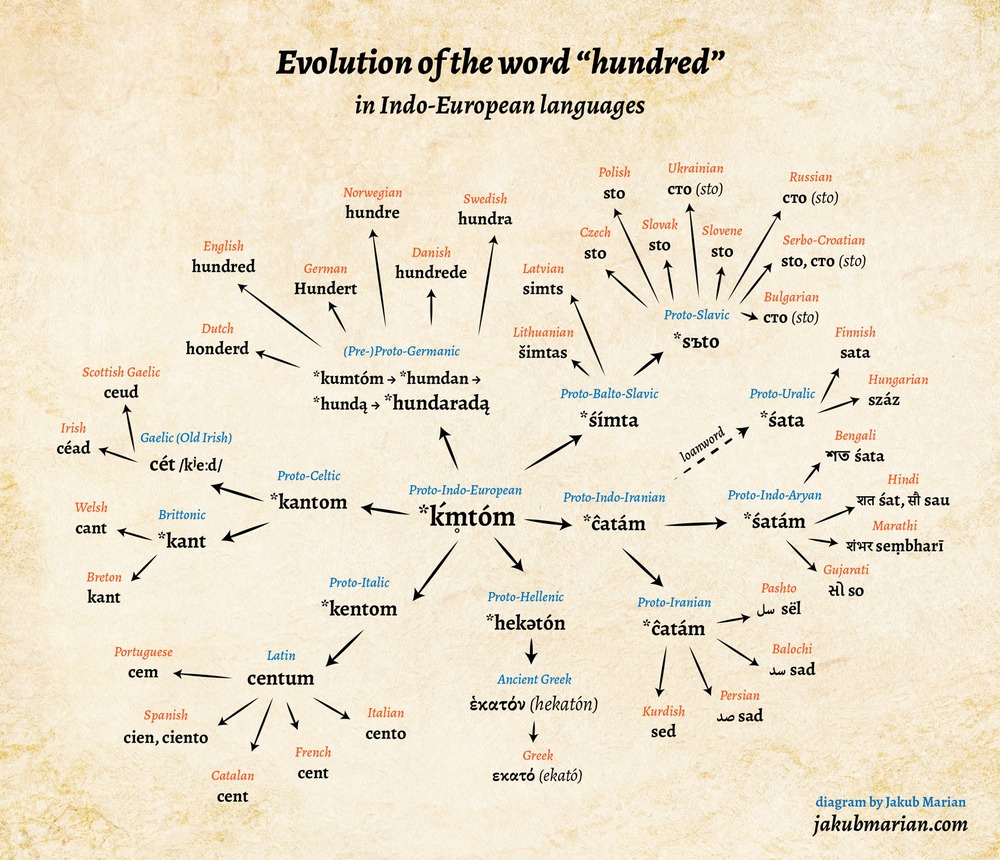

Map of Europe and northern Africa including maritime territory
this post from Quora:
“Why would finding the slope of something be the opposite of finding the area?
Hi Michael,
I see you have a wide range of interests (nearly 600 questions) but, apart from this question, that does not include calculus.
So, rather than some boring technical answer, here is some history that explains maybe the context.
Newton and Leibniz in the 17th century, building on ideas current at the time, realized that their idea of what we now call a derivative could be used to compute areas. The idea was that if you can compute an antiderivative you can use that to compute an area. So, in addition to describing methods of finding derivatives, they also described methods of finding antiderivatives.
Thus derivatives and antiderivatives are related to slopes and areas. So, loosely, the same mathematics that finds slopes will, if you run it backwards, find areas.
By the middle of the 19th century (that’s much later) integration theory abandoned the antiderivative version of integration theory of Newton and Leibnitz in favor of the Riemann integral.
The two theories are compatible but very different in scope. Calculus students learn the Riemann integral, not the Newton-Leibnitz integral. They learn “area” as defined by the Riemann integral, not by the Newton-Leibnitz integral.
That means that since the 1850s students can no longer claim that “area is the opposite of slope” or that “integration is the oppositive of differentiation.”
It is only in special cases that the two theories overlap where this is true. That overlap is taught now in calculus classes as “the fundamental theorem of the calculus.” It expresses the narrow conditions under which the Newton-Leibnitz integration theory connects with the newer Riemann integration theory.
Alas, students memory of the calculus dims rapidly. Many students end up thinking they were actually studying the Newton-Leibnitz integral while we were in vain teaching them the Riemann integral. So you will see (even here on Quora) the sentiment that integration is the oppositive of differentiation (i.e., slopes and areas are opposites). Yes, in special cases but not in general.
To be sure the classical 19th century integration theories and the modern 20th century theories of integration establish a strong nexus between differentiation and integration . But that relation is not at all describable as “opposites.” Well maybe as an answer on Jeopardy that could work.”
Is that the standard mathematical approach to it?
I use integration and differentiation all the time, 1000’s of times a day quite often (or at least my computer does), but I don’t follow that argument at all.
What are the cases where integration is not the opposite of differentiation, and how come I never encounter any in my work?
dv said:

Map of Europe and northern Africa including maritime territory
Interestingly, rocks that ‘cannot sustain human habitation or economic life of their own’ do not contribute to the EEZ. This includes for instance Rockall and Singapore’s Pedra Branca.
I’ve always wondered about this. To my mind there’s no theoretical reason why Rockall or Pedra Branca couldn’t support human habitation or economic life.
The Rev Dodgson said:
this post from Quora:
“Why would finding the slope of something be the opposite of finding the area?
Hi Michael,I see you have a wide range of interests (nearly 600 questions) but, apart from this question, that does not include calculus.
So, rather than some boring technical answer, here is some history that explains maybe the context.
Newton and Leibniz in the 17th century, building on ideas current at the time, realized that their idea of what we now call a derivative could be used to compute areas. The idea was that if you can compute an antiderivative you can use that to compute an area. So, in addition to describing methods of finding derivatives, they also described methods of finding antiderivatives.
Thus derivatives and antiderivatives are related to slopes and areas. So, loosely, the same mathematics that finds slopes will, if you run it backwards, find areas.
By the middle of the 19th century (that’s much later) integration theory abandoned the antiderivative version of integration theory of Newton and Leibnitz in favor of the Riemann integral.
The two theories are compatible but very different in scope. Calculus students learn the Riemann integral, not the Newton-Leibnitz integral. They learn “area” as defined by the Riemann integral, not by the Newton-Leibnitz integral.
That means that since the 1850s students can no longer claim that “area is the opposite of slope” or that “integration is the oppositive of differentiation.”
It is only in special cases that the two theories overlap where this is true. That overlap is taught now in calculus classes as “the fundamental theorem of the calculus.” It expresses the narrow conditions under which the Newton-Leibnitz integration theory connects with the newer Riemann integration theory.
Alas, students memory of the calculus dims rapidly. Many students end up thinking they were actually studying the Newton-Leibnitz integral while we were in vain teaching them the Riemann integral. So you will see (even here on Quora) the sentiment that integration is the oppositive of differentiation (i.e., slopes and areas are opposites). Yes, in special cases but not in general.
To be sure the classical 19th century integration theories and the modern 20th century theories of integration establish a strong nexus between differentiation and integration . But that relation is not at all describable as “opposites.” Well maybe as an answer on Jeopardy that could work.”
Is that the standard mathematical approach to it?
I use integration and differentiation all the time, 1000’s of times a day quite often (or at least my computer does), but I don’t follow that argument at all.
What are the cases where integration is not the opposite of differentiation, and how come I never encounter any in my work?
survivorship bias agrees with us in saying that we too aren’t familiar with the counterexamples because we never use them
The absence of viviparity in birds is typically explained by invoking morphological or physiological factors putatively incompatible with live-bearing reproduction. Examining these factors in terms of falsifiable predictions and underlying assumptions, we suggest that no single avian feature is known to be inherently incompatible with viviparous production of small clutches and that the absence of the live-bearing mode is a consequence of the lack of selection for the intermediate evolutionary stage of egg retention. Birds have achieved most of the advantages that potentially could accrue from egg retention and viviparity by such specializations as endothermy, egg incubation, nest construction, uricotelism, shell pigmentation, parental care, altricial hatchlings, albumen provision, and calcareous eggshells.
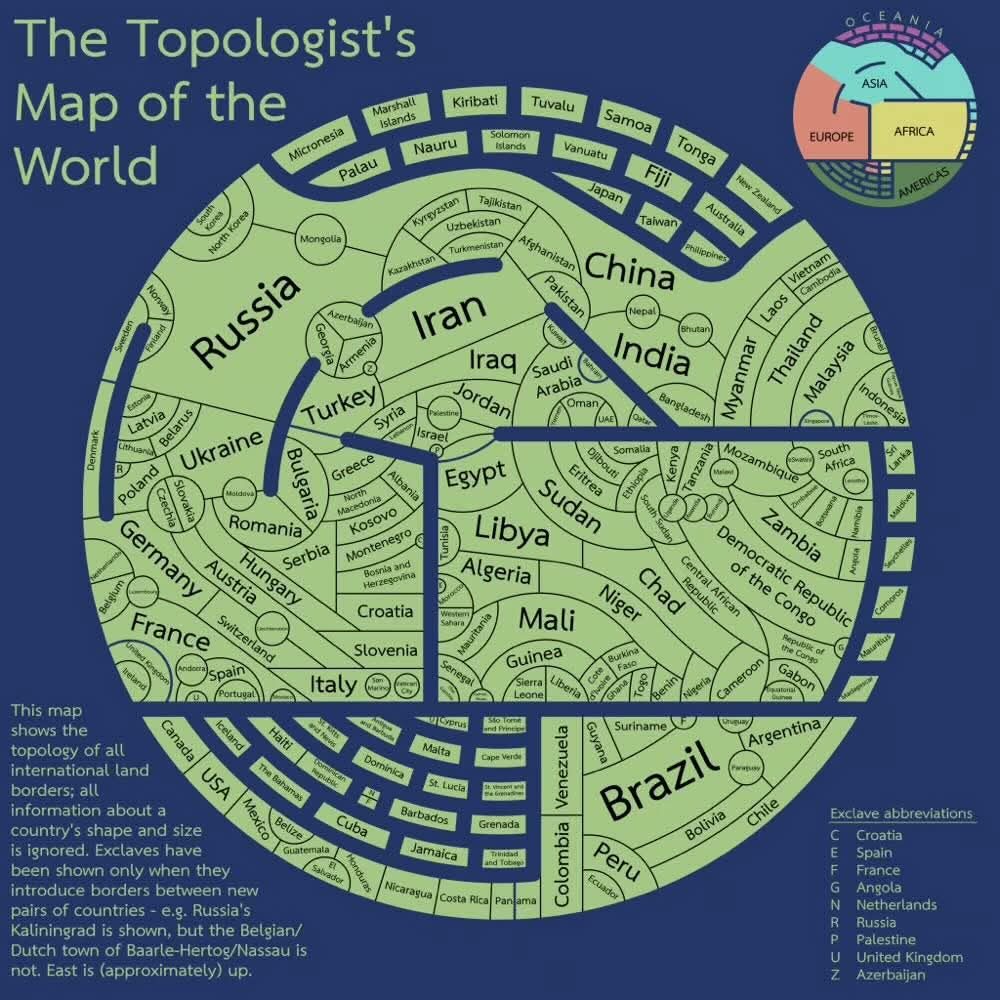

Not sure whom Hans Zimmer has to fuck to get on this list.
dv said:

Not sure whom Hans Zimmer has to fuck to get on this list.
And who will be the next President of Scotland.
Peak Warming Man said:
dv said:

Not sure whom Hans Zimmer has to fuck to get on this list.
And who will be the next President of Scotland.
Ewan McGregor
dv said:
Peak Warming Man said:
dv said:

Not sure whom Hans Zimmer has to fuck to get on this list.
And who will be the next President of Scotland.
Ewan McGregor
But………but he’s a celebrity?
Oh, never mind.
Peak Warming Man said:
dv said:
Peak Warming Man said:And who will be the next President of Scotland.
Ewan McGregor
But………but he’s a celebrity?
Oh, never mind.
Did you … read the text above the poll? This is about celebrities specifically.
dv said:

Not sure whom Hans Zimmer has to fuck to get on this list.
kraftwerk. Cos germany needs to go on being weird.
ChrispenEvan said:
dv said:

Not sure whom Hans Zimmer has to fuck to get on this list.
kraftwerk. Cos germany needs to go on being weird.
Do they still allow Austrians?
furious said:
ChrispenEvan said:
dv said:

Not sure whom Hans Zimmer has to fuck to get on this list.
kraftwerk. Cos germany needs to go on being weird.
Do they still allow Austrians?
Most of us are them aren’t we ?
https://www.instagram.com/reel/DD_lyTKMY_0/?igsh=MTFsajAxZTh5Y284Yw==
The ECR
dv said:
https://www.instagram.com/reel/DD_lyTKMY_0/?igsh=MTFsajAxZTh5Y284Yw==The ECR
Speaking of algorithms I read that TikTok’s algorithm as IP represents half of its market cap.

dv said:
Is George Malley and relation to the famous poet Ern Malley?
yous thought asparagus growing looked weird like in those memememememememes but actually yous didn’t realise it looked like


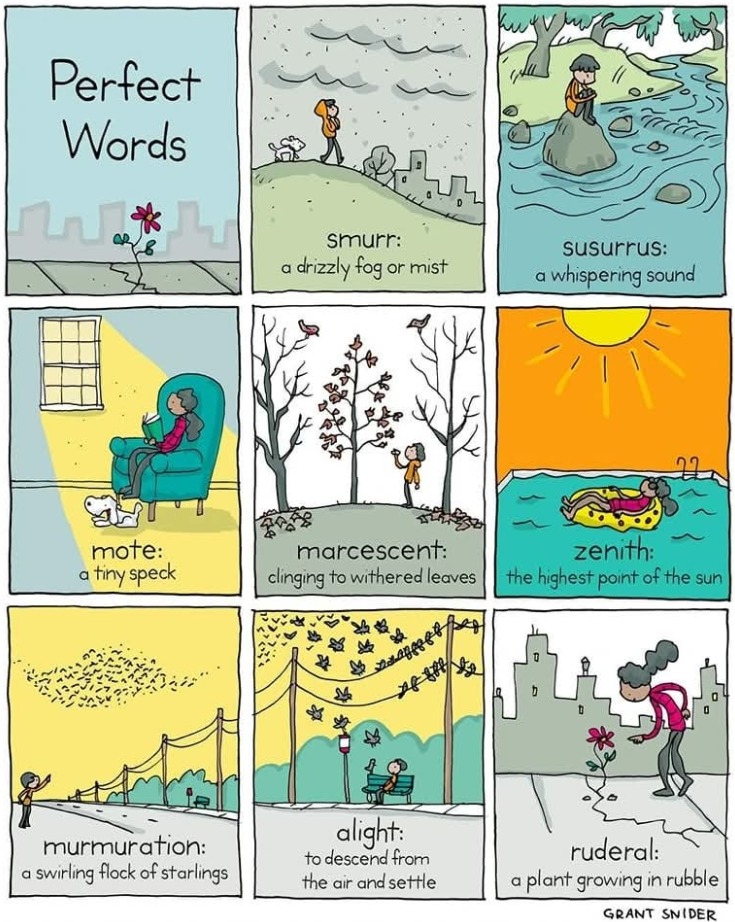


ChrispenEvan said:
:)
Nice one.
:)
ChrispenEvan said:
ChrispenEvan said:
https://en.wikipedia.org/wiki/British_Post_Office_scandal
yeah we were astounded when we heard about it but is a fraud rate of 1/25 outstanding, was there no way for it to be apparent
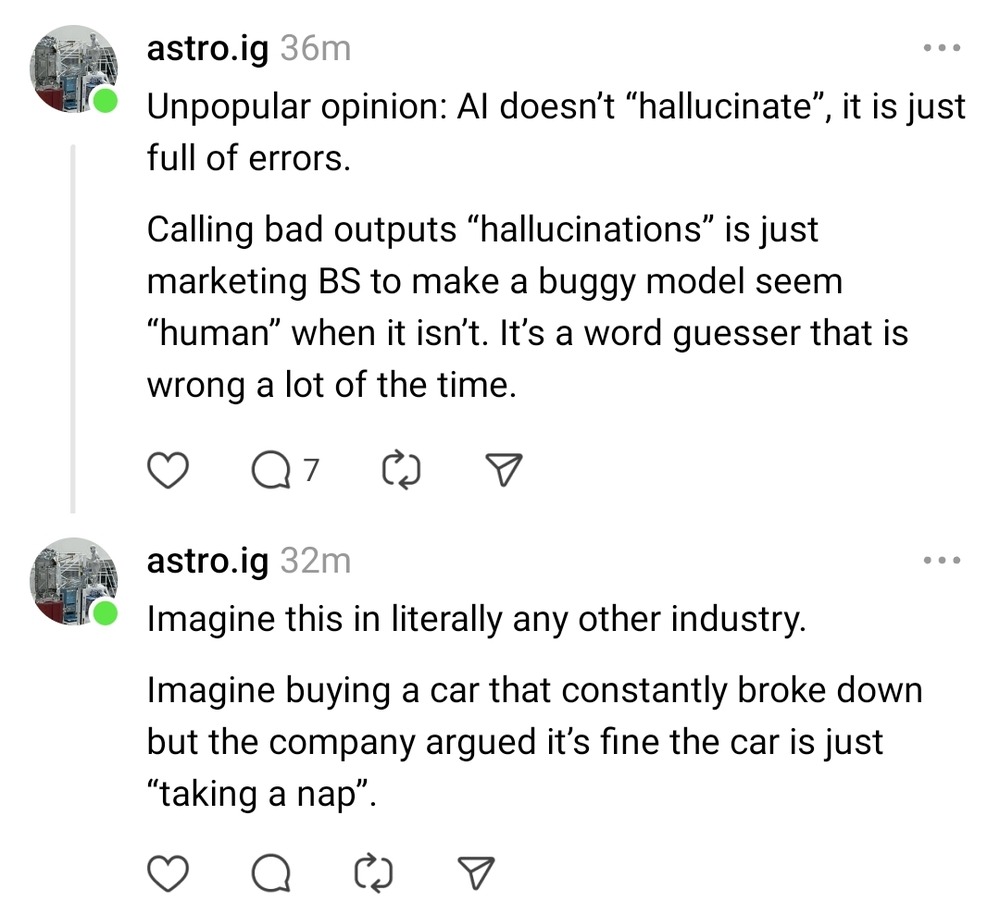
dv said:
maybe but even the benchmark for natural intelligence is not 0 error so
dv said:
TOPS!
Love it.
:)

Consider the unusual clearing patterns near Queen Victoria Springs.
I did read a suggestion that there is a cohort of young men who want a girlfriend, in abstract, but don’t actually like women: don’t enjoy their company, don’t like being around them.
dv said:

Consider the unusual clearing patterns near Queen Victoria Springs.
That looks like spinifex burn scars.
Michael V said:
dv said:

Consider the unusual clearing patterns near Queen Victoria Springs.
That looks like spinifex burn scars.
interesting, cheers
dv said:
I did read a suggestion that there is a cohort of young men who want a girlfriend, in abstract, but don’t actually like women: don’t enjoy their company, don’t like being around them.
have they considered charity work
dv said:
Michael V said:
dv said:

Consider the unusual clearing patterns near Queen Victoria Springs.
That looks like spinifex burn scars.
interesting, cheers
Surprisingly, they are difficult to see on the ground, unless they are very fresh. ie: Recent burns. The scars, visible from satellite images and air photos may be many tens of years old.
Michael V said:
dv said:
Michael V said:
That looks like spinifex burn scars.
interesting, cheers
Surprisingly, they are difficult to see on the ground, unless they are very fresh. ie: Recent burns. The scars, visible from satellite images and air photos may be many tens of years old.
thanks we also learned this thing tonight but sadly must admit we will likely forget by next month
we might go try to smell that flower though
SCIENCE said:
Michael V said:
dv said:
interesting, cheers
Surprisingly, they are difficult to see on the ground, unless they are very fresh. ie: Recent burns. The scars, visible from satellite images and air photos may be many tens of years old.
thanks we also learned this thing tonight but sadly must admit we will likely forget by next month
we might go try to smell that flower though
:)
I forget things the same hour now. It’s quite disturbing.
Yet another thing from Quora, this one raised a smile:
“If you knew the answer to any question your 7 year old nephew could ask, even if you might have trouble explaining it to him, would you be considered an educated man?
An educated man? You’d be considered the greatest mind in the history of mankind, an oracle of unfathomable truths, a supreme sage, a mighty miracle, an august augur, a delicate spring of verities that is to be cherished for all eternity.
You’d have to know if there is a God, who’s going to win next week’s game, why volcanoes choose to erupt when they do, how many grains of sand are in all the world’s beaches, where the other orange and purple sock is, are we alone in the universe, what exactly happens when we dream, how life began, what did mommy mean when she said “Higgs boson” to the person on the phone last night, how do brains work, and how many prime numbers there are between 1 and googolplex.
Kids ask the darnedest things, man.”
The Rev Dodgson said:
Yet another thing from Quora, this one raised a smile:“If you knew the answer to any question your 7 year old nephew could ask, even if you might have trouble explaining it to him, would you be considered an educated man?
An educated man? You’d be considered the greatest mind in the history of mankind, an oracle of unfathomable truths, a supreme sage, a mighty miracle, an august augur, a delicate spring of verities that is to be cherished for all eternity.
You’d have to know if there is a God, who’s going to win next week’s game, why volcanoes choose to erupt when they do, how many grains of sand are in all the world’s beaches, where the other orange and purple sock is, are we alone in the universe, what exactly happens when we dream, how life began, what did mommy mean when she said “Higgs boson” to the person on the phone last night, how do brains work, and how many prime numbers there are between 1 and googolplex.
Kids ask the darnedest things, man.”
:)
Just after Ouimet returned to the cockpit, the cockpit “master warning” light lit up, warning the pilots of a loss of emergency electrical power. Cameron ordered Ouimet to switch to battery power, but the loss of main and emergency electrical power caused some electrical systems to fail, including power for the horizontal stabilizer. This caused the stabilizer to be stuck in the cruising position.: 4 This made controlling the plane’s descent extremely difficult and required great physical exertion from the pilot and first officer. In addition, both flight recorders stopped recording at this point.: 13–14
SCIENCE said:
Just after Ouimet returned to the cockpit, the cockpit “master warning” light lit up, warning the pilots of a loss of emergency electrical power. Cameron ordered Ouimet to switch to battery power, but the loss of main and emergency electrical power caused some electrical systems to fail, including power for the horizontal stabilizer. This caused the stabilizer to be stuck in the cruising position.: 4 This made controlling the plane’s descent extremely difficult and required great physical exertion from the pilot and first officer. In addition, both flight recorders stopped recording at this point.: 13–14
Is this the recent Korean plane crash?
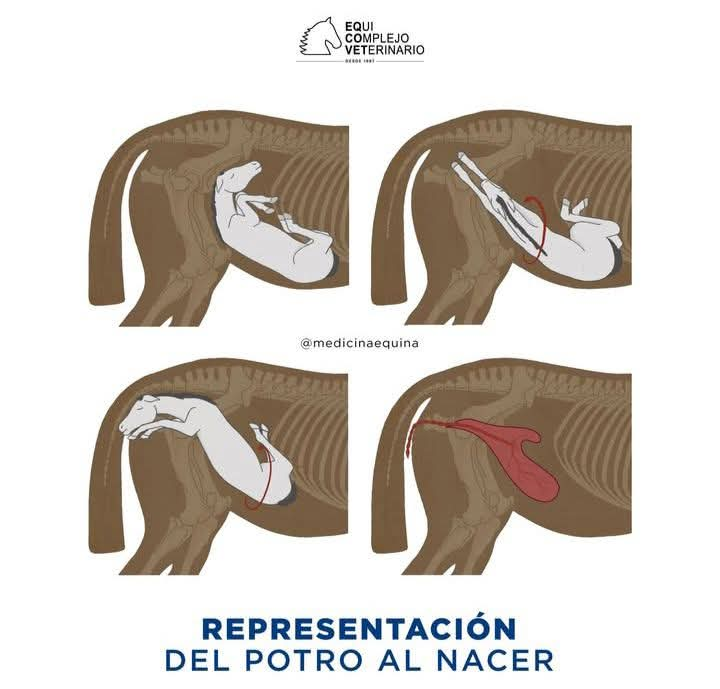
dv said:
we thought it was storks
dv said:
Ok.. Consider: The second stage of a mare’s labour is an explosive business with very strong contractions which takes only 15 or 20 minutes. It’s a wonder that it mostly concludes with a live mare and foal.



Use sparingly
dv said:

Use sparingly
is that the street slang version of “we refuse to engage in meaningful dialogue discourse discussion but you still have to listen to what we say because it’s a free speech cuntry” then
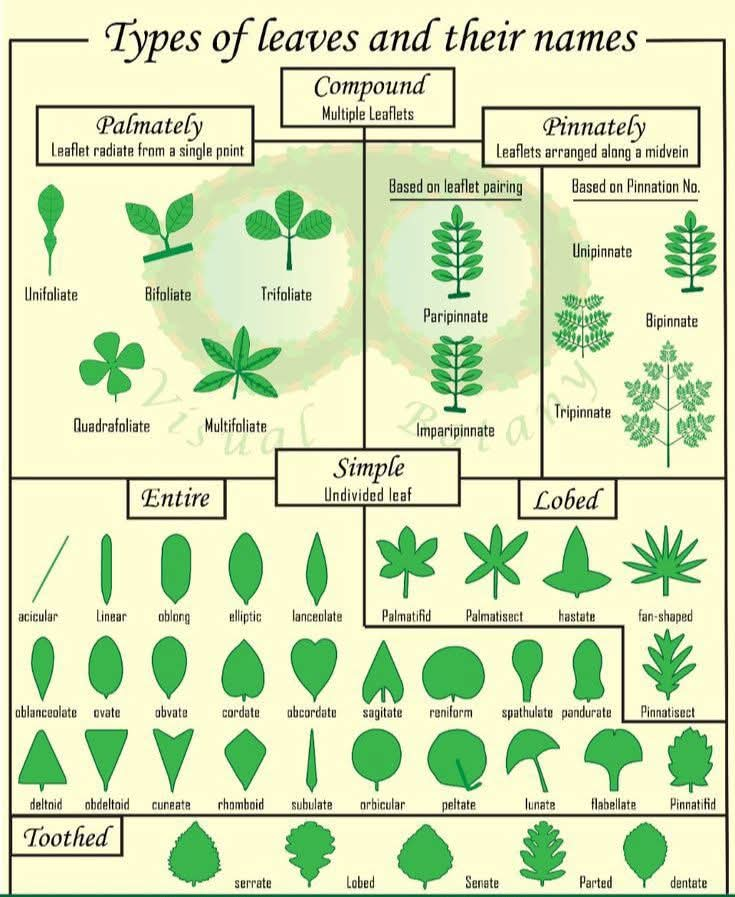
dv said:
ah yes it gets play here every 2 years or so
seahorses aren’t fish because the modern woke terms for things like starfish and jellyfish are seastars and seajellies to make it clearer that they aren’t fish so put that in your hippocampus and learn it
Michael V said:
kii said:
Abby and her sisters, Cleo and Marcy, cheer me up.
Dogs = nice.
This Instagram account is wonderful. Worth looking through it. Especially the introduction of Marcy to the pack.
Between these guys, Señor Sanchez and a few others I can cling to sanity.
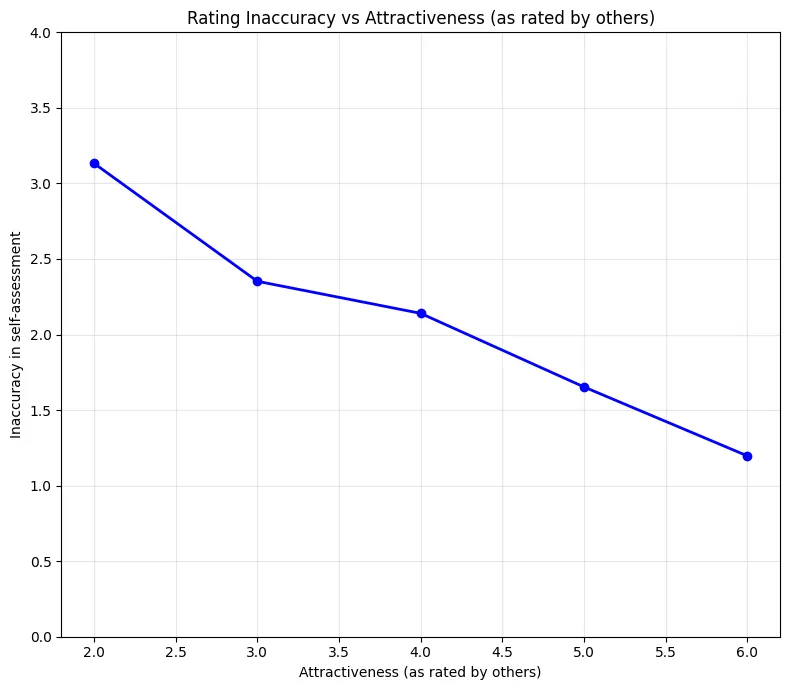
Ranking Paradoxes, From Least to Most Paradoxical
And for those without 25 minutes and 4 seconds to spare:
People love and hate paradoxes.
Paradoxes are places of confusion — of conflicting ideas.
They pinpoint the stickiest parts of our knowledge and understanding.
And they are often used as a testing ground for our
scientific and mathematical assumptions and methods.
But, our reactions to different paradoxes vary wildly — some feel truly perplexing,
while others are just annoying.
So, here are 24 paradoxes,
ranked from least to most paradoxical by my 12 year old former students.
They — and everyone — have individual perspectives and backgrounds, which
informs their reactions to the paradoxes.
I think that’s very interesting.
So, please feel free to — politely — disagree.
First off: What is a paradox?
“a statement claiming something which goes beyond (or even
against) ‘common opinion’ (what is usually believed or held).”
“one (such as a person, situation,
or action) having seemingly contradictory qualities or phases”
“any conclusion that at first sounds absurd but that has an argument to sustain it”
The 24 paradoxes on this list were selected using a very simple criterion:
they are commonly called paradoxes.
I have loosely — and very informally — lumped them into categories.
We don’t have time to go into the details of the
paradoxes. That video would be very, very, very long.
But, don’t worry: I left plenty of links in the description.
Veridical Paradoxes
Many of the paradoxes at the bottom of my students’ list are what the
philosopher Quine called “veridical” paradoxes
— the word comes from Latin and means “truthful.”
These paradoxes are surprising or counterintuitive, but they are “true”,
in the sense that they follow from some accepted mathematics or logic.
One famous example is the birthday paradox.
The more people you have in a room,
the more likely it is that two of those people share a birthday.
How many people do you need to have in one room before there
is at least a 50% chance that two of those people share a birthday?
Most people guess a pretty big number, since there are 365 — or 366 — days in a year.
But, it’s 23.
Once 23 people are in a room, there is a more than 50% chance that two of them share a birthday.
And you can figure this out using math that is taught in an introduction to probability course.
Also using introductory probability, you could solve Bertrand’s Box.
You have three boxes: one with two gold coins,
one with two silver coins, and one with a gold and a silver coin.
You randomly pick a coin without knowing what box it came from.
You look and the coin is gold.
What is the probability that the other coin in the same box is gold?
Most people say ½. Here’s their logic: you’re equally likely to have pulled from the first
or third box — the first box gives you a gold coin and the third box gives you a silver coin.
But this logic is flawed — you are not equally likely
to have pulled from the first or the third box.
There are two gold coins in the first box and only one in the third box.
So, if you pick a coin, and you see that it’s gold,
there was actually a 2/3rds chance that it came from the first box.
Therefore, there’s a 2/3rds chance that the other coin in the box is gold.
This did not impress my students and they put it at the bottom of the ranking.
They were slightly more impressed with the similar and much-more-famous Monty
Hall problem — the one with the doors and the goats and the car.
I’ll leave the details to the links in the description.
These three paradoxes all point to the fact that calculating probabilities can be counterintuitive.
It’s a problem in statistics and applied sciences,
where computing the likelihood of certain outcomes — where a hurricane will make
landfall or whether a patient has cancer — can have life or death consequences.
Philosophy and Science
Speaking of scientific predictions,
my students were not moved by the Fermi paradox. That’s the one about aliens.
The reasoning goes: There is a boatload of stuff out there — stars that are similar
to our sun and planets that are similar to Earth.
There are so many planets that it’s very very likely one of them would
have developed intelligent life and that we would have some contact with these aliens.
But, of course, that hasn’t happened — that’s the paradox, the seeming contradiction.
The Fermi paradox is like many of the other paradoxes
in this section of the video, which is roughly about philosophy and science.
These paradoxes tend to have a lot of context.
They’re often part of a long background
conversation — one that is harder to summarize than a few mathematical axioms.
That background perspective — the assumptions — is so critical to how we react to paradoxes.
For example, you may not have spent a lot of time considering the word “heap”
— that’s a synonym for “pile”; as in “a heap of sand” —
but some philosophers have.
What makes a heap?
If you have one grain of sand, that’s not a heap.
Adding a single grain of sand is not going to change that. So, two grains of sand is not a heap.
And if two grains of sand is not a heap,
then — adding one more won’t change it — so three grains of sand is not a heap. And so on.
It follows that any number of grains of sand is not a heap.
That’s the paradox of the heap — it hinges on the vagueness of the word “heap” and our
intuition that a single grain of sand can’t change something from a non-heap to a heap.
But then, how does it ever become a heap?
You can contemplate the definition of “heap”
the next time you’re sitting in traffic — which is the subject of our next paradox.
Let’s say there are two different routes connecting downtown to the suburbs.
In the afternoon, there are lots and lots of people driving from downtown
to the suburbs — so we’ll only look at traffic flowing in that direction.
Let’s say there are 2000 total cars.
Some parts of the route take a specific amount of time — for example,
it’s 30 minutes to drive from here to here.
But, on other segments, the travel time is a function of the total number of drivers.
For example, the number of minutes to get from here to here could be five
plus the number of drivers divided by 100 — the more drivers, the slower the traffic.
Each driver takes the route that is best for them individually — they’re not collectively planning.
Half the drivers will end up going one way and half the other way — no one wants to switch,
because then, the other route would have more cars and thus take longer.
So — doing the arithmetic — everyone has a 45 minute commute.
The city wants to decrease the commute time. So,
they add a bridge at the midpoint — drivers can switch which route they are taking, if they want
— which would, hopefully, improve the traffic situation.
But — on average — drivers spend more time getting home.
That’s Braess’ paradox — counterintuitively, the extra road can cause extra traffic.
In our example, the drivers will all end up changing to the
same route — first on the lower path, then the bridge, then the upper path.
That makes the commute 50 minutes — 5 minutes longer than before.
Remember, each driver is calculating the best route individually — and
each driver alone has no incentive to switch routes — the other routes would take longer.
But, of course, if everyone collectively agreed to stop using the bridge, they’d all save 5 minutes.
Our next paradox — or set of paradoxes — is particularly
famous in the history of philosophy and mathematics: Zeno’s paradoxes.
They all have to do with motion, and time, and space, and infinity.
One of them is a funny version of the tortoise and the hare story.
The hare can never catch up to the tortoise because, by the time the hare reaches the
tortoise’s former position, the tortoise will have gone further — always keeping a tiny lead.
That continues the whole race, so the tortoise wins.
Quine called this a “falsidical” paradox — as in, “false”.
My experience is that, when people first encounter Zeno’s paradoxes — there are
several of them — they either love them or hate them — and my students kind of loved them.
Almost as much as they loved the ship of Theseus.
Theseus — a character in Greek mythology — had a ship.
As the wooden planks rotted and decayed, he replaced them with new ones.
At some point, every plank has been replaced. Is it still the ship of Theseus?
It sort of feels like yes and no — that’s the paradox.
The story is used to discuss identity — what makes an object the same object
throughout time? — and composition — how is an object related to its constituent parts?
Next up: the omnipotence paradox.
It’s about an omnipotent being — omnipotent, meaning “all powerful.”
In the best-known form, the paradox asks “Can an
omnipotent being create a stone so heavy that it cannot lift it?”
Omnipotence implies that the being has the power to create any stone.
But, it also implies that the being should be able to lift any stone. Hence, the paradox.
(More) Veridical Paradoxes
Earlier, I mentioned three vertical paradoxes.
Those were all about probability, but they don’t have to be.
For example, I recently made a short video about the potato
paradox — which uses basic algebra to produce a counterintuitive answer.
My students were not impressed.
They much preferred 1 = 0.99999…
In my experience, people have one of two reactions to this.
The first reaction — from people who have never seen this before — is confusion or
disbelief. There are lots of precise proofs of this fact, but here’s a simple argument:
Starting from the fact that ⅓ = 0.3333…. , we can add ⅓ + ⅓ + ⅓.
This is obviously 1. And 0.3333… + 0.3333… + 0.3333… = 0.9999…. Therefore, 1=0.9999….
The second common reaction — from people who have already learned this fact — is annoyance.
This is everyone who is yelling at the screen, “That’s not a paradox! It’s a fact!”
Yes. Many paradoxes are things that we call “facts.”
Those are the veridical paradoxes, which, as Quine writes, “we can get used to,
thereby gradually sapping its quality of paradox.”
You may be used to the fact that 1 = 0.9999… But for many people — at least,
at some point in their math education — it seems counterintuitive… surprising… paradoxical.
Moving on. Let’s say you’re getting married and want a very tall wedding cake.
Each layer should be 1 meter tall — which is ridiculously tall.
The bottom layer also has a radius of 1 meter. Then, each subsequent layer narrows.
The second layer has a radius of one-half of
a meter. The third layer has a radius of one-third of a meter.
The Nth layer has a radius of 1/Nth of a meter.
You tell the baker, “I would like infinitely many layers please.”
The baker replies, “I don’t have infinitely much cake batter.”
But, you do a quick calculation.
The volume of the n-th layer is the radius squared times pi times the height.
That’s “1 over n” squared times pi times 1.
Adding up all the layers, you get a famous infinite series,
which Euler proved is equal to exactly “pi squared over 6”.
Multiplying by the pi in front, the volume of this infinitely tall
cake — known as Gabriel’s wedding cake — is “pi cubed over 6” cubic meters.
That’s a little more than 5 cubic meters. That’s not that big!
The Guinness World Record for largest wedding cake is roughly 15,000 pounds or 6800 kilos.
I don’t know what the volume of that cake was,
but my guess is that it’s bigger than Gabriel’s wedding cake.
Infinity is Weird
The wedding cake paradox was resolved using a famous infinite series. And,
in general, infinite series can be quite tricky.
Consider, for example, the sum 1-1+1-1+1-1+1… alternating forever.
If we put parentheses like this, then it seems like the answer is zero.
If we put parentheses like this, then it seems like the answer is one.
Maybe we should just average those answers and
get ½ — which is an answer with several other prominent, historical arguments.
But, if your calculus teacher asks you the answer, it’s none of the above;
it’s a “divergent series” — which kind of means that there is no answer.
This is the consensus in modern mathematics following the standard rules for infinite series.
Maybe if you’ve learned about those rules,
these three different solutions don’t seem very paradoxical — just wrong.
But, if you haven’t learned these rules, or if you lived before those
rules were invented — or discovered — or agreed upon — then it could be pretty
perplexing that there are three different plausible answers to this summation.
Thompson’s lamp is, in some ways, a physical version of the alternating sum paradox
— you’re turning a light on and off instead of adding and subtracting one.
You enter a room and turn the light on.
After one minute, you turn the light off.
Thirty seconds later, you turn it on. Fifteen seconds later,
you turn it off again. Seven-and-a-half seconds later, you turn it back on.
And so on — always halving the time before you flip the switch.
If you do this infinitely many times, it will take exactly two minutes.
At that two-minute mark, is the light on or off? That question is the paradox.
It seems like it should have an answer — after all, lights are either on or off — but,
as you approach two-minutes, you’re turning it arbitrarily quickly on and off,
and the status of the light at two minutes is very unclear.
The Ross-Littlewood paradox is similar to Thompson’s lamp — it’s also something called
a “supertask,” which means you have to complete infinitely many tasks in a finite amount of time.
But it’s about quickly adding and removing balls from a vase.
For the sake of time, I’m just going to direct you to an old Infinite
Series video that I made about a random version of the Ross-Littlewood paradox.
The St. Petersburg paradox is about a very peculiar casino game.
The amount of money you win is determined by how long it takes to flip “heads” with a fair coin.
If the first flip is heads, you win $2.
If it’s tails then heads, you win $4.
If it’s tails twice, then heads, you win $8.
To put it more mathy, if the first heads is on the Nth flip, you win 2^N dollars.
How much would you be willing to pay to play this game?
Well, by some logic, you should be willing to spend what you will — on average — earn back.
For example, if the average winnings in a particular lottery
are $5 and the tickets cost less than $5 — it makes sense to buy one.
In the St. Petersburg game, how much do you expect to win?
Just like our other probability paradoxes, you can
use some rather simple calculations to determine that it’s infinity.
Your expected winnings are infinity dollars.
So, given that, how much would you be willing to pay to play this game?
Well, if you apply the same logic — paying anything that’s less than the expected
earning — then you should be willing to pay any fixed price — say, $10,000,000.
The paradox is that — even though the calculation tells you to pay whatever the fee is — most
people are not willing to pay very much, because usually — on most turns — you don’t win very much.
It’s not really a paradox in probability theory, like the
birthday paradox. It’s more a paradox about decision making.
Self-referential Paradoxes
Self-referential paradoxes are popular — they’re compelling and usually pretty easy to state.
Here’s the Berry paradox: “The smallest positive integer not definable in under sixty letters.”
Lots of numbers can be defined in under 60 letters — ”three”, “one-hundred and twelve”.
But, the alphabet is finite — it’s only possible to define
finitely many things in under 60 letters.
Since there are infinitely many numbers, they can’t all be definable in under 60 letters.
So, out of all the numbers which are not definable in under 60 letters,
we’ll call the smallest of that group X.
In other words, X is “the smallest positive integer not definable in under sixty letters”.
But, that sentence has 57 letters,
which means that it’s a definition of X with less than 60 letters.
That’s the problem — the paradox.
Another self-referential paradox — ranked slightly higher — is the Grelling-Nelson paradox.
“Autological” words describe themselves — “English” is autological,
because it’s an English word; “word” is autological, because it’s a word.
“Heterological” words do not describe themselves — ”German” is heterological,
because it’s not German; “truck” is heterological, because it’s not a truck.
Here’s the paradox: Which category should we put
the word “heterological” in? Is it autological or heterological?
Well, if it’s autological,
then it describes itself — so the word “heterological” is heterological.
But if it’s heterological, then it doesn’t describe itself — but that’s the definition
of heterological, so it fits its own definition, which makes it autological.
Miscellaneous Paradoxes
Moving on.
Here’s a part of M.C. Escher’s “Ascending and Descending.”
The monk-like figures are marching on a never-ending staircase.
You might say, “That’s an optical illusion. Not a paradox.”
That’s fine. It’s not very high on my student’s list.
But paradoxes are an incongruity — they’re a form of dissonance.
When I look at this, I find it hard to resolve the clash between
my intuition — the staircase is endless — with my knowledge that that’s not possible.
This is the Müller-Lyer illusion.
Most people perceive the horizontal line on the
bottom shape as longer than the horizontal line on the top shape.
But, they’re the same length.
What’s cool about it is that different populations are more
or less susceptible to the optical illusion.
Visual artists — people with lots of experience drawing lines and considering perspective — are
more likely to immediately recognize that the lines are the same length.
Similarly, your background in mathematics or
philosophy probably changes your reaction to the other paradoxes.
Anyway.
Here’s the pop quiz paradox.
Your statistics teacher says there will be a pop quiz next week.
The class meets every day at noon.
You want to figure out when the quiz will be, so you can fake sick on that day.
You think: It can’t be on Friday, because then it wouldn’t be a surprise.
By Thursday afternoon — after class, when you still haven’t
taken the quiz — you would know it’s on Friday, making it not an actual surprise.
So, you cross off Friday.
But then, you reason, it can’t be on Thursday.
By Wednesday afternoon, you would know that it’s on Thursday — you already know it’s not
on Friday — so a Thursday quiz would not be a surprise. Cross off Thursday.
This pattern of logic repeats.
A Wednesday quiz would not be a surprise — you would know on
Tuesday afternoon. So, no pop quiz on Wednesday.
Similarly, no pop quiz on Tuesday or Monday. Great news, you figure — there’s no quiz next week!
But then, on Tuesday, the teacher gives you a pop quiz — which comes as quite a surprise.
And that pop quiz is about Simpson’s paradox.
Let’s say that Dude 1 has a higher batting
average — that’s a baseball thing — than Dude 2 in both 1995 and 1996.
But, when you combine the two years, Dude 2 has a higher batting average than Dude 1.
Maybe that seems impossible, but it’s totally possible.
This is a simple, classic — and real — example, but there are lots of more interesting, modern
examples that illustrate this statistical phenomenon.
For example, this paper compared the Covid case fatality rate — that’s the
percentage of confirmed Covid patients who died — between Italy and China.
Within every age group, this number is lower in Italy. But overall, it’s lower in China.
Within statistics, Simpson’s paradox is not really an isolated phenomenon.
Statistics provides many different perspectives on
data and they can often seem in conflict with each other.
The Top Three
On to our most paradoxical paradoxes.
Third from the top is the grandfather paradox.
Briefly summarized: A kid goes back in time and kills her grandfather.
But without the grandfather, the kid wouldn’t have been born.
But if the kid wasn’t born, she wouldn’t have killed her grandfather.
So then she would have been born.
But then she would have gone back in time to kill her grandfather. And so on and so on.
Physicists and philosophers use this — and other time travel paradoxes — to
debate possible theories of time and time travel.
Second from the top, we have the Banach-Tarski paradox.
To be very brief about it, the Banach-Tarski paradox is a way
to take a three-dimensional solid ball, break it into a few pieces,
and reassemble those pieces to create two balls, each identical with the original.
I’m not going to explain it here — it requires some time
and there’s plenty of great explanations out there
— but I want to point out a few things:
First, it uses pretty standard — albeit advanced — mathematics. In that sense,
it’s a veridical paradox.
But it also uses the axiom of choice.
There are a bunch of foundational rules — axioms — in mathematics,
and a hundred years ago, these were heavily debated.
In particular, this one — the axiom of choice — was quite controversial.
One argument against the axiom of choice was that it led to some strange consequences,
like the Banach-Tarski paradox.
Now, it’s substantially less controversial.
Paradoxes are all relative to the assumptions we make.
Sometimes those assumptions are subconscious — or otherwise difficult to identify.
But in this case, the debate — the tension between
the Banach-Tarski paradox and the axiom of choice — is very clear.
The number one top paradox was — unsurprisingly — the self-referential Liar’s Paradox.
“This sentence is false.” Is that true or false?
Well, if it’s false, then it’s true. If it’s true, then it’s false.
It’s classic. It’s fun. It’s a very good paradox.
There you have it: 24 paradoxes, ranked from least to most paradoxical by my 12 year old students.
I’m sure you have your own reactions to these paradoxes and many others.
Which is great. I think paradoxes are meant to be the start of a conversation.
If there’s a particular paradox that you’d like me to make another video about,
let me know in the comments.
Patreon Announcement
Here’s just a quick note to say that I’ve started a Patreon.
I’ve decided to make this video without
sponsorship — and I hope to do the same going forward.
These are my videos — free of the creative constraints and ethical
questions that arise from commercial sponsorship.
But I have to pay the bills somehow.
So, if you have the resources, your Patreon membership would be greatly appreciated.
Or, if you’d like to support Chalk Talk in other ways:
like, subscribe, share with friends, write nice comments. Everything helps. Thanks!
Ranking Paradoxes, From Least to Most Paradoxical
And for those without 25 minutes and 4 seconds to spare:
People love and hate paradoxes.
Paradoxes are places of confusion — of conflicting ideas.
They pinpoint the stickiest parts of our knowledge and understanding.
And they are often used as a testing ground for our
scientific and mathematical assumptions and methods.
But, our reactions to different paradoxes vary wildly — some feel truly perplexing,
while others are just annoying.
So, here are 24 paradoxes,
ranked from least to most paradoxical by my 12 year old former students.
They — and everyone — have individual perspectives and backgrounds, which
informs their reactions to the paradoxes.
I think that’s very interesting.
So, please feel free to — politely — disagree.
First off: What is a paradox?
“a statement claiming something which goes beyond (or even
against) ‘common opinion’ (what is usually believed or held).”
“one (such as a person, situation,
or action) having seemingly contradictory qualities or phases”
“any conclusion that at first sounds absurd but that has an argument to sustain it”
The 24 paradoxes on this list were selected using a very simple criterion:
they are commonly called paradoxes.
I have loosely — and very informally — lumped them into categories.
We don’t have time to go into the details of the
paradoxes. That video would be very, very, very long.
But, don’t worry: I left plenty of links in the description.
Veridical Paradoxes
Many of the paradoxes at the bottom of my students’ list are what the
philosopher Quine called “veridical” paradoxes
— the word comes from Latin and means “truthful.”
These paradoxes are surprising or counterintuitive, but they are “true”,
in the sense that they follow from some accepted mathematics or logic.
One famous example is the birthday paradox.
The more people you have in a room,
the more likely it is that two of those people share a birthday.
How many people do you need to have in one room before there
is at least a 50% chance that two of those people share a birthday?
Most people guess a pretty big number, since there are 365 — or 366 — days in a year.
But, it’s 23.
Once 23 people are in a room, there is a more than 50% chance that two of them share a birthday.
And you can figure this out using math that is taught in an introduction to probability course.
Also using introductory probability, you could solve Bertrand’s Box.
You have three boxes: one with two gold coins,
one with two silver coins, and one with a gold and a silver coin.
You randomly pick a coin without knowing what box it came from.
You look and the coin is gold.
What is the probability that the other coin in the same box is gold?
Most people say ½. Here’s their logic: you’re equally likely to have pulled from the first
or third box — the first box gives you a gold coin and the third box gives you a silver coin.
But this logic is flawed — you are not equally likely
to have pulled from the first or the third box.
There are two gold coins in the first box and only one in the third box.
So, if you pick a coin, and you see that it’s gold,
there was actually a 2/3rds chance that it came from the first box.
Therefore, there’s a 2/3rds chance that the other coin in the box is gold.
This did not impress my students and they put it at the bottom of the ranking.
They were slightly more impressed with the similar and much-more-famous Monty
Hall problem — the one with the doors and the goats and the car.
I’ll leave the details to the links in the description.
These three paradoxes all point to the fact that calculating probabilities can be counterintuitive.
It’s a problem in statistics and applied sciences,
where computing the likelihood of certain outcomes — where a hurricane will make
landfall or whether a patient has cancer — can have life or death consequences.
Philosophy and Science
Speaking of scientific predictions,
my students were not moved by the Fermi paradox. That’s the one about aliens.
The reasoning goes: There is a boatload of stuff out there — stars that are similar
to our sun and planets that are similar to Earth.
There are so many planets that it’s very very likely one of them would
have developed intelligent life and that we would have some contact with these aliens.
But, of course, that hasn’t happened — that’s the paradox, the seeming contradiction.
The Fermi paradox is like many of the other paradoxes
in this section of the video, which is roughly about philosophy and science.
These paradoxes tend to have a lot of context.
They’re often part of a long background
conversation — one that is harder to summarize than a few mathematical axioms.
That background perspective — the assumptions — is so critical to how we react to paradoxes.
For example, you may not have spent a lot of time considering the word “heap”
— that’s a synonym for “pile”; as in “a heap of sand” —
but some philosophers have.
What makes a heap?
If you have one grain of sand, that’s not a heap.
Adding a single grain of sand is not going to change that. So, two grains of sand is not a heap.
And if two grains of sand is not a heap,
then — adding one more won’t change it — so three grains of sand is not a heap. And so on.
It follows that any number of grains of sand is not a heap.
That’s the paradox of the heap — it hinges on the vagueness of the word “heap” and our
intuition that a single grain of sand can’t change something from a non-heap to a heap.
But then, how does it ever become a heap?
You can contemplate the definition of “heap”
the next time you’re sitting in traffic — which is the subject of our next paradox.
Let’s say there are two different routes connecting downtown to the suburbs.
In the afternoon, there are lots and lots of people driving from downtown
to the suburbs — so we’ll only look at traffic flowing in that direction.
Let’s say there are 2000 total cars.
Some parts of the route take a specific amount of time — for example,
it’s 30 minutes to drive from here to here.
But, on other segments, the travel time is a function of the total number of drivers.
For example, the number of minutes to get from here to here could be five
plus the number of drivers divided by 100 — the more drivers, the slower the traffic.
Each driver takes the route that is best for them individually — they’re not collectively planning.
Half the drivers will end up going one way and half the other way — no one wants to switch,
because then, the other route would have more cars and thus take longer.
So — doing the arithmetic — everyone has a 45 minute commute.
The city wants to decrease the commute time. So,
they add a bridge at the midpoint — drivers can switch which route they are taking, if they want
— which would, hopefully, improve the traffic situation.
But — on average — drivers spend more time getting home.
That’s Braess’ paradox — counterintuitively, the extra road can cause extra traffic.
In our example, the drivers will all end up changing to the
same route — first on the lower path, then the bridge, then the upper path.
That makes the commute 50 minutes — 5 minutes longer than before.
Remember, each driver is calculating the best route individually — and
each driver alone has no incentive to switch routes — the other routes would take longer.
But, of course, if everyone collectively agreed to stop using the bridge, they’d all save 5 minutes.
Our next paradox — or set of paradoxes — is particularly
famous in the history of philosophy and mathematics: Zeno’s paradoxes.
They all have to do with motion, and time, and space, and infinity.
One of them is a funny version of the tortoise and the hare story.
The hare can never catch up to the tortoise because, by the time the hare reaches the
tortoise’s former position, the tortoise will have gone further — always keeping a tiny lead.
That continues the whole race, so the tortoise wins.
Quine called this a “falsidical” paradox — as in, “false”.
My experience is that, when people first encounter Zeno’s paradoxes — there are
several of them — they either love them or hate them — and my students kind of loved them.
Almost as much as they loved the ship of Theseus.
Theseus — a character in Greek mythology — had a ship.
As the wooden planks rotted and decayed, he replaced them with new ones.
At some point, every plank has been replaced. Is it still the ship of Theseus?
It sort of feels like yes and no — that’s the paradox.
The story is used to discuss identity — what makes an object the same object
throughout time? — and composition — how is an object related to its constituent parts?
Next up: the omnipotence paradox.
It’s about an omnipotent being — omnipotent, meaning “all powerful.”
In the best-known form, the paradox asks “Can an
omnipotent being create a stone so heavy that it cannot lift it?”
Omnipotence implies that the being has the power to create any stone.
But, it also implies that the being should be able to lift any stone. Hence, the paradox.
(More) Veridical Paradoxes
Earlier, I mentioned three vertical paradoxes.
Those were all about probability, but they don’t have to be.
For example, I recently made a short video about the potato
paradox — which uses basic algebra to produce a counterintuitive answer.
My students were not impressed.
They much preferred 1 = 0.99999…
In my experience, people have one of two reactions to this.
The first reaction — from people who have never seen this before — is confusion or
disbelief. There are lots of precise proofs of this fact, but here’s a simple argument:
Starting from the fact that ⅓ = 0.3333…. , we can add ⅓ + ⅓ + ⅓.
This is obviously 1. And 0.3333… + 0.3333… + 0.3333… = 0.9999…. Therefore, 1=0.9999….
The second common reaction — from people who have already learned this fact — is annoyance.
This is everyone who is yelling at the screen, “That’s not a paradox! It’s a fact!”
Yes. Many paradoxes are things that we call “facts.”
Those are the veridical paradoxes, which, as Quine writes, “we can get used to,
thereby gradually sapping its quality of paradox.”
You may be used to the fact that 1 = 0.9999… But for many people — at least,
at some point in their math education — it seems counterintuitive… surprising… paradoxical.
Moving on. Let’s say you’re getting married and want a very tall wedding cake.
Each layer should be 1 meter tall — which is ridiculously tall.
The bottom layer also has a radius of 1 meter. Then, each subsequent layer narrows.
The second layer has a radius of one-half of
a meter. The third layer has a radius of one-third of a meter.
The Nth layer has a radius of 1/Nth of a meter.
You tell the baker, “I would like infinitely many layers please.”
The baker replies, “I don’t have infinitely much cake batter.”
But, you do a quick calculation.
The volume of the n-th layer is the radius squared times pi times the height.
That’s “1 over n” squared times pi times 1.
Adding up all the layers, you get a famous infinite series,
which Euler proved is equal to exactly “pi squared over 6”.
Multiplying by the pi in front, the volume of this infinitely tall
cake — known as Gabriel’s wedding cake — is “pi cubed over 6” cubic meters.
That’s a little more than 5 cubic meters. That’s not that big!
The Guinness World Record for largest wedding cake is roughly 15,000 pounds or 6800 kilos.
I don’t know what the volume of that cake was,
but my guess is that it’s bigger than Gabriel’s wedding cake.
Infinity is Weird
The wedding cake paradox was resolved using a famous infinite series. And,
in general, infinite series can be quite tricky.
Consider, for example, the sum 1-1+1-1+1-1+1… alternating forever.
If we put parentheses like this, then it seems like the answer is zero.
If we put parentheses like this, then it seems like the answer is one.
Maybe we should just average those answers and
get ½ — which is an answer with several other prominent, historical arguments.
But, if your calculus teacher asks you the answer, it’s none of the above;
it’s a “divergent series” — which kind of means that there is no answer.
This is the consensus in modern mathematics following the standard rules for infinite series.
Maybe if you’ve learned about those rules,
these three different solutions don’t seem very paradoxical — just wrong.
But, if you haven’t learned these rules, or if you lived before those
rules were invented — or discovered — or agreed upon — then it could be pretty
perplexing that there are three different plausible answers to this summation.
Thompson’s lamp is, in some ways, a physical version of the alternating sum paradox
— you’re turning a light on and off instead of adding and subtracting one.
You enter a room and turn the light on.
After one minute, you turn the light off.
Thirty seconds later, you turn it on. Fifteen seconds later,
you turn it off again. Seven-and-a-half seconds later, you turn it back on.
And so on — always halving the time before you flip the switch.
If you do this infinitely many times, it will take exactly two minutes.
At that two-minute mark, is the light on or off? That question is the paradox.
It seems like it should have an answer — after all, lights are either on or off — but,
as you approach two-minutes, you’re turning it arbitrarily quickly on and off,
and the status of the light at two minutes is very unclear.
The Ross-Littlewood paradox is similar to Thompson’s lamp — it’s also something called
a “supertask,” which means you have to complete infinitely many tasks in a finite amount of time.
But it’s about quickly adding and removing balls from a vase.
For the sake of time, I’m just going to direct you to an old Infinite
Series video that I made about a random version of the Ross-Littlewood paradox.
The St. Petersburg paradox is about a very peculiar casino game.
The amount of money you win is determined by how long it takes to flip “heads” with a fair coin.
If the first flip is heads, you win $2.
If it’s tails then heads, you win $4.
If it’s tails twice, then heads, you win $8.
To put it more mathy, if the first heads is on the Nth flip, you win 2^N dollars.
How much would you be willing to pay to play this game?
Well, by some logic, you should be willing to spend what you will — on average — earn back.
For example, if the average winnings in a particular lottery
are $5 and the tickets cost less than $5 — it makes sense to buy one.
In the St. Petersburg game, how much do you expect to win?
Just like our other probability paradoxes, you can
use some rather simple calculations to determine that it’s infinity.
Your expected winnings are infinity dollars.
So, given that, how much would you be willing to pay to play this game?
Well, if you apply the same logic — paying anything that’s less than the expected
earning — then you should be willing to pay any fixed price — say, $10,000,000.
The paradox is that — even though the calculation tells you to pay whatever the fee is — most
people are not willing to pay very much, because usually — on most turns — you don’t win very much.
It’s not really a paradox in probability theory, like the
birthday paradox. It’s more a paradox about decision making.
Self-referential Paradoxes
Self-referential paradoxes are popular — they’re compelling and usually pretty easy to state.
Here’s the Berry paradox: “The smallest positive integer not definable in under sixty letters.”
Lots of numbers can be defined in under 60 letters — ”three”, “one-hundred and twelve”.
But, the alphabet is finite — it’s only possible to define
finitely many things in under 60 letters.
Since there are infinitely many numbers, they can’t all be definable in under 60 letters.
So, out of all the numbers which are not definable in under 60 letters,
we’ll call the smallest of that group X.
In other words, X is “the smallest positive integer not definable in under sixty letters”.
But, that sentence has 57 letters,
which means that it’s a definition of X with less than 60 letters.
That’s the problem — the paradox.
Another self-referential paradox — ranked slightly higher — is the Grelling-Nelson paradox.
“Autological” words describe themselves — “English” is autological,
because it’s an English word; “word” is autological, because it’s a word.
“Heterological” words do not describe themselves — ”German” is heterological,
because it’s not German; “truck” is heterological, because it’s not a truck.
Here’s the paradox: Which category should we put
the word “heterological” in? Is it autological or heterological?
Well, if it’s autological,
then it describes itself — so the word “heterological” is heterological.
But if it’s heterological, then it doesn’t describe itself — but that’s the definition
of heterological, so it fits its own definition, which makes it autological.
Miscellaneous Paradoxes
Moving on.
Here’s a part of M.C. Escher’s “Ascending and Descending.”
The monk-like figures are marching on a never-ending staircase.
You might say, “That’s an optical illusion. Not a paradox.”
That’s fine. It’s not very high on my student’s list.
But paradoxes are an incongruity — they’re a form of dissonance.
When I look at this, I find it hard to resolve the clash between
my intuition — the staircase is endless — with my knowledge that that’s not possible.
This is the Müller-Lyer illusion.
Most people perceive the horizontal line on the
bottom shape as longer than the horizontal line on the top shape.
But, they’re the same length.
What’s cool about it is that different populations are more
or less susceptible to the optical illusion.
Visual artists — people with lots of experience drawing lines and considering perspective — are
more likely to immediately recognize that the lines are the same length.
Similarly, your background in mathematics or
philosophy probably changes your reaction to the other paradoxes.
Anyway.
Here’s the pop quiz paradox.
Your statistics teacher says there will be a pop quiz next week.
The class meets every day at noon.
You want to figure out when the quiz will be, so you can fake sick on that day.
You think: It can’t be on Friday, because then it wouldn’t be a surprise.
By Thursday afternoon — after class, when you still haven’t
taken the quiz — you would know it’s on Friday, making it not an actual surprise.
So, you cross off Friday.
But then, you reason, it can’t be on Thursday.
By Wednesday afternoon, you would know that it’s on Thursday — you already know it’s not
on Friday — so a Thursday quiz would not be a surprise. Cross off Thursday.
This pattern of logic repeats.
A Wednesday quiz would not be a surprise — you would know on
Tuesday afternoon. So, no pop quiz on Wednesday.
Similarly, no pop quiz on Tuesday or Monday. Great news, you figure — there’s no quiz next week!
But then, on Tuesday, the teacher gives you a pop quiz — which comes as quite a surprise.
And that pop quiz is about Simpson’s paradox.
Let’s say that Dude 1 has a higher batting
average — that’s a baseball thing — than Dude 2 in both 1995 and 1996.
But, when you combine the two years, Dude 2 has a higher batting average than Dude 1.
Maybe that seems impossible, but it’s totally possible.
This is a simple, classic — and real — example, but there are lots of more interesting, modern
examples that illustrate this statistical phenomenon.
For example, this paper compared the Covid case fatality rate — that’s the
percentage of confirmed Covid patients who died — between Italy and China.
Within every age group, this number is lower in Italy. But overall, it’s lower in China.
Within statistics, Simpson’s paradox is not really an isolated phenomenon.
Statistics provides many different perspectives on
data and they can often seem in conflict with each other.
The Top Three
On to our most paradoxical paradoxes.
Third from the top is the grandfather paradox.
Briefly summarized: A kid goes back in time and kills her grandfather.
But without the grandfather, the kid wouldn’t have been born.
But if the kid wasn’t born, she wouldn’t have killed her grandfather.
So then she would have been born.
But then she would have gone back in time to kill her grandfather. And so on and so on.
Physicists and philosophers use this — and other time travel paradoxes — to
debate possible theories of time and time travel.
Second from the top, we have the Banach-Tarski paradox.
To be very brief about it, the Banach-Tarski paradox is a way
to take a three-dimensional solid ball, break it into a few pieces,
and reassemble those pieces to create two balls, each identical with the original.
I’m not going to explain it here — it requires some time
and there’s plenty of great explanations out there
— but I want to point out a few things:
First, it uses pretty standard — albeit advanced — mathematics. In that sense,
it’s a veridical paradox.
But it also uses the axiom of choice.
There are a bunch of foundational rules — axioms — in mathematics,
and a hundred years ago, these were heavily debated.
In particular, this one — the axiom of choice — was quite controversial.
One argument against the axiom of choice was that it led to some strange consequences,
like the Banach-Tarski paradox.
Now, it’s substantially less controversial.
Paradoxes are all relative to the assumptions we make.
Sometimes those assumptions are subconscious — or otherwise difficult to identify.
But in this case, the debate — the tension between
the Banach-Tarski paradox and the axiom of choice — is very clear.
The number one top paradox was — unsurprisingly — the self-referential Liar’s Paradox.
“This sentence is false.” Is that true or false?
Well, if it’s false, then it’s true. If it’s true, then it’s false.
It’s classic. It’s fun. It’s a very good paradox.
There you have it: 24 paradoxes, ranked from least to most paradoxical by my 12 year old students.
I’m sure you have your own reactions to these paradoxes and many others.
Which is great. I think paradoxes are meant to be the start of a conversation.
If there’s a particular paradox that you’d like me to make another video about,
let me know in the comments.
Patreon Announcement
Here’s just a quick note to say that I’ve started a Patreon.
I’ve decided to make this video without
sponsorship — and I hope to do the same going forward.
These are my videos — free of the creative constraints and ethical
questions that arise from commercial sponsorship.
But I have to pay the bills somehow.
So, if you have the resources, your Patreon membership would be greatly appreciated.
Or, if you’d like to support Chalk Talk in other ways:
like, subscribe, share with friends, write nice comments. Everything helps. Thanks!
The Rev Dodgson said:
Ranking Paradoxes, From Least to Most ParadoxicalAnd for those without 25 minutes and 4 seconds to spare:
LOL. I’d rather watch the video than try to read that unformatted block of text.
Boris said:
The Rev Dodgson said:
Ranking Paradoxes, From Least to Most Paradoxical
And for those without 25 minutes and 4 seconds to spare:
LOL. I’d rather watch the video than try to read that unformatted block of text.
disagree as one it was formatted and two it was helpful to read rather than watch and it took less than 1504 s but we seem to have to read it twice to see what the difference between versions is
SCIENCE said:
Boris said:
The Rev Dodgson said:
Ranking Paradoxes, From Least to Most Paradoxical
And for those without 25 minutes and 4 seconds to spare:
LOL. I’d rather watch the video than try to read that unformatted block of text.
disagree as one it was formatted and two it was helpful to read rather than watch and it took less than 1504 s but we seem to have to read it twice to see what the difference between versions is
I don’t question your expertise in your field of study. i’d like you not to question mine in my field. it was garbage.
The Rev Dodgson said:
Ranking Paradoxes, From Least to Most ParadoxicalAnd for those without 25 minutes and 4 seconds to spare:
People love and hate paradoxes.
Paradoxes are places of confusion — of conflicting ideas.
They pinpoint the stickiest parts of our knowledge and understanding.
And they are often used as a testing ground for our
scientific and mathematical assumptions and methods.
But, our reactions to different paradoxes vary wildly — some feel truly perplexing,
while others are just annoying.
So, here are 24 paradoxes,
ranked from least to most paradoxical by my 12 year old former students.
They — and everyone — have individual perspectives and backgrounds, which
informs their reactions to the paradoxes.
I think that’s very interesting.
So, please feel free to — politely — disagree.
First off: What is a paradox?
“a statement claiming something which goes beyond (or even
against) ‘common opinion’ (what is usually believed or held).”
“one (such as a person, situation,
or action) having seemingly contradictory qualities or phases”
“any conclusion that at first sounds absurd but that has an argument to sustain it”
The 24 paradoxes on this list were selected using a very simple criterion:
they are commonly called paradoxes.
I have loosely — and very informally — lumped them into categories.
We don’t have time to go into the details of the
paradoxes. That video would be very, very, very long.
But, don’t worry: I left plenty of links in the description.
Veridical Paradoxes
Many of the paradoxes at the bottom of my students’ list are what the
philosopher Quine called “veridical” paradoxes
— the word comes from Latin and means “truthful.”
These paradoxes are surprising or counterintuitive, but they are “true”,
in the sense that they follow from some accepted mathematics or logic.
One famous example is the birthday paradox.
The more people you have in a room,
the more likely it is that two of those people share a birthday.
How many people do you need to have in one room before there
is at least a 50% chance that two of those people share a birthday?
Most people guess a pretty big number, since there are 365 — or 366 — days in a year.
But, it’s 23.
Once 23 people are in a room, there is a more than 50% chance that two of them share a birthday.
And you can figure this out using math that is taught in an introduction to probability course.
Also using introductory probability, you could solve Bertrand’s Box.
You have three boxes: one with two gold coins,
one with two silver coins, and one with a gold and a silver coin.
You randomly pick a coin without knowing what box it came from.
You look and the coin is gold.
What is the probability that the other coin in the same box is gold?
Most people say ½. Here’s their logic: you’re equally likely to have pulled from the first
or third box — the first box gives you a gold coin and the third box gives you a silver coin.
But this logic is flawed — you are not equally likely
to have pulled from the first or the third box.
There are two gold coins in the first box and only one in the third box.
So, if you pick a coin, and you see that it’s gold,
there was actually a 2/3rds chance that it came from the first box.
Therefore, there’s a 2/3rds chance that the other coin in the box is gold.
This did not impress my students and they put it at the bottom of the ranking.
They were slightly more impressed with the similar and much-more-famous Monty
Hall problem — the one with the doors and the goats and the car.
I’ll leave the details to the links in the description.
These three paradoxes all point to the fact that calculating probabilities can be counterintuitive.
It’s a problem in statistics and applied sciences,
where computing the likelihood of certain outcomes — where a hurricane will make
landfall or whether a patient has cancer — can have life or death consequences.
Philosophy and Science
Speaking of scientific predictions,
my students were not moved by the Fermi paradox. That’s the one about aliens.
The reasoning goes: There is a boatload of stuff out there — stars that are similar
to our sun and planets that are similar to Earth.
There are so many planets that it’s very very likely one of them would
have developed intelligent life and that we would have some contact with these aliens.
But, of course, that hasn’t happened — that’s the paradox, the seeming contradiction.
The Fermi paradox is like many of the other paradoxes
in this section of the video, which is roughly about philosophy and science.
These paradoxes tend to have a lot of context.
They’re often part of a long background
conversation — one that is harder to summarize than a few mathematical axioms.
That background perspective — the assumptions — is so critical to how we react to paradoxes.
For example, you may not have spent a lot of time considering the word “heap”
— that’s a synonym for “pile”; as in “a heap of sand” —
but some philosophers have.
What makes a heap?
If you have one grain of sand, that’s not a heap.
Adding a single grain of sand is not going to change that. So, two grains of sand is not a heap.
And if two grains of sand is not a heap,
then — adding one more won’t change it — so three grains of sand is not a heap. And so on.
It follows that any number of grains of sand is not a heap.
That’s the paradox of the heap — it hinges on the vagueness of the word “heap” and our
intuition that a single grain of sand can’t change something from a non-heap to a heap.
But then, how does it ever become a heap?
You can contemplate the definition of “heap”
the next time you’re sitting in traffic — which is the subject of our next paradox.
Let’s say there are two different routes connecting downtown to the suburbs.
In the afternoon, there are lots and lots of people driving from downtown
to the suburbs — so we’ll only look at traffic flowing in that direction.
Let’s say there are 2000 total cars.
Some parts of the route take a specific amount of time — for example,
it’s 30 minutes to drive from here to here.
But, on other segments, the travel time is a function of the total number of drivers.
For example, the number of minutes to get from here to here could be five
plus the number of drivers divided by 100 — the more drivers, the slower the traffic.
Each driver takes the route that is best for them individually — they’re not collectively planning.
Half the drivers will end up going one way and half the other way — no one wants to switch,
because then, the other route would have more cars and thus take longer.
So — doing the arithmetic — everyone has a 45 minute commute.
The city wants to decrease the commute time. So,
they add a bridge at the midpoint — drivers can switch which route they are taking, if they want
— which would, hopefully, improve the traffic situation.
But — on average — drivers spend more time getting home.
That’s Braess’ paradox — counterintuitively, the extra road can cause extra traffic.
In our example, the drivers will all end up changing to the
same route — first on the lower path, then the bridge, then the upper path.
That makes the commute 50 minutes — 5 minutes longer than before.
Remember, each driver is calculating the best route individually — and
each driver alone has no incentive to switch routes — the other routes would take longer.
But, of course, if everyone collectively agreed to stop using the bridge, they’d all save 5 minutes.
Our next paradox — or set of paradoxes — is particularly
famous in the history of philosophy and mathematics: Zeno’s paradoxes.
They all have to do with motion, and time, and space, and infinity.
One of them is a funny version of the tortoise and the hare story.
The hare can never catch up to the tortoise because, by the time the hare reaches the
tortoise’s former position, the tortoise will have gone further — always keeping a tiny lead.
That continues the whole race, so the tortoise wins.
Quine called this a “falsidical” paradox — as in, “false”.
My experience is that, when people first encounter Zeno’s paradoxes — there are
several of them — they either love them or hate them — and my students kind of loved them.
Almost as much as they loved the ship of Theseus.
Theseus — a character in Greek mythology — had a ship.
As the wooden planks rotted and decayed, he replaced them with new ones.
At some point, every plank has been replaced. Is it still the ship of Theseus?
It sort of feels like yes and no — that’s the paradox.
The story is used to discuss identity — what makes an object the same object
throughout time? — and composition — how is an object related to its constituent parts?
Next up: the omnipotence paradox.
It’s about an omnipotent being — omnipotent, meaning “all powerful.”
In the best-known form, the paradox asks “Can an
omnipotent being create a stone so heavy that it cannot lift it?”
Omnipotence implies that the being has the power to create any stone.
But, it also implies that the being should be able to lift any stone. Hence, the paradox.
(More) Veridical Paradoxes
Earlier, I mentioned three vertical paradoxes.
Those were all about probability, but they don’t have to be.
For example, I recently made a short video about the potato
paradox — which uses basic algebra to produce a counterintuitive answer.
My students were not impressed.
They much preferred 1 = 0.99999…
In my experience, people have one of two reactions to this.
The first reaction — from people who have never seen this before — is confusion or
disbelief. There are lots of precise proofs of this fact, but here’s a simple argument:
Starting from the fact that ⅓ = 0.3333…. , we can add ⅓ + ⅓ + ⅓.
This is obviously 1. And 0.3333… + 0.3333… + 0.3333… = 0.9999…. Therefore, 1=0.9999….
The second common reaction — from people who have already learned this fact — is annoyance.
This is everyone who is yelling at the screen, “That’s not a paradox! It’s a fact!”
Yes. Many paradoxes are things that we call “facts.”
Those are the veridical paradoxes, which, as Quine writes, “we can get used to,
thereby gradually sapping its quality of paradox.”
You may be used to the fact that 1 = 0.9999… But for many people — at least,
at some point in their math education — it seems counterintuitive… surprising… paradoxical.
Moving on. Let’s say you’re getting married and want a very tall wedding cake.
Each layer should be 1 meter tall — which is ridiculously tall.
The bottom layer also has a radius of 1 meter. Then, each subsequent layer narrows.
The second layer has a radius of one-half of
a meter. The third layer has a radius of one-third of a meter.
The Nth layer has a radius of 1/Nth of a meter.
You tell the baker, “I would like infinitely many layers please.”
The baker replies, “I don’t have infinitely much cake batter.”
But, you do a quick calculation.
The volume of the n-th layer is the radius squared times pi times the height.
That’s “1 over n” squared times pi times 1.
Adding up all the layers, you get a famous infinite series,
which Euler proved is equal to exactly “pi squared over 6”.
Multiplying by the pi in front, the volume of this infinitely tall
cake — known as Gabriel’s wedding cake — is “pi cubed over 6” cubic meters.
That’s a little more than 5 cubic meters. That’s not that big!
The Guinness World Record for largest wedding cake is roughly 15,000 pounds or 6800 kilos.
I don’t know what the volume of that cake was,
but my guess is that it’s bigger than Gabriel’s wedding cake.
Infinity is Weird
The wedding cake paradox was resolved using a famous infinite series. And,
in general, infinite series can be quite tricky.
Consider, for example, the sum 1-1+1-1+1-1+1… alternating forever.
If we put parentheses like this, then it seems like the answer is zero.
If we put parentheses like this, then it seems like the answer is one.
Maybe we should just average those answers and
get ½ — which is an answer with several other prominent, historical arguments.
But, if your calculus teacher asks you the answer, it’s none of the above;
it’s a “divergent series” — which kind of means that there is no answer.
This is the consensus in modern mathematics following the standard rules for infinite series.
Maybe if you’ve learned about those rules,
these three different solutions don’t seem very paradoxical — just wrong.
But, if you haven’t learned these rules, or if you lived before those
rules were invented — or discovered — or agreed upon — then it could be pretty
perplexing that there are three different plausible answers to this summation.
Thompson’s lamp is, in some ways, a physical version of the alternating sum paradox
— you’re turning a light on and off instead of adding and subtracting one.
You enter a room and turn the light on.
After one minute, you turn the light off.
Thirty seconds later, you turn it on. Fifteen seconds later,
you turn it off again. Seven-and-a-half seconds later, you turn it back on.
And so on — always halving the time before you flip the switch.
If you do this infinitely many times, it will take exactly two minutes.
At that two-minute mark, is the light on or off? That question is the paradox.
It seems like it should have an answer — after all, lights are either on or off — but,
as you approach two-minutes, you’re turning it arbitrarily quickly on and off,
and the status of the light at two minutes is very unclear.
The Ross-Littlewood paradox is similar to Thompson’s lamp — it’s also something called
a “supertask,” which means you have to complete infinitely many tasks in a finite amount of time.
But it’s about quickly adding and removing balls from a vase.
For the sake of time, I’m just going to direct you to an old Infinite
Series video that I made about a random version of the Ross-Littlewood paradox.
The St. Petersburg paradox is about a very peculiar casino game.
The amount of money you win is determined by how long it takes to flip “heads” with a fair coin.
If the first flip is heads, you win $2.
If it’s tails then heads, you win $4.
If it’s tails twice, then heads, you win $8.
To put it more mathy, if the first heads is on the Nth flip, you win 2^N dollars.
How much would you be willing to pay to play this game?
Well, by some logic, you should be willing to spend what you will — on average — earn back.
For example, if the average winnings in a particular lottery
are $5 and the tickets cost less than $5 — it makes sense to buy one.
In the St. Petersburg game, how much do you expect to win?
Just like our other probability paradoxes, you can
use some rather simple calculations to determine that it’s infinity.
Your expected winnings are infinity dollars.
So, given that, how much would you be willing to pay to play this game?
Well, if you apply the same logic — paying anything that’s less than the expected
earning — then you should be willing to pay any fixed price — say, $10,000,000.
The paradox is that — even though the calculation tells you to pay whatever the fee is — most
people are not willing to pay very much, because usually — on most turns — you don’t win very much.
It’s not really a paradox in probability theory, like the
birthday paradox. It’s more a paradox about decision making.
Self-referential Paradoxes
Self-referential paradoxes are popular — they’re compelling and usually pretty easy to state.
Here’s the Berry paradox: “The smallest positive integer not definable in under sixty letters.”
Lots of numbers can be defined in under 60 letters — ”three”, “one-hundred and twelve”.
But, the alphabet is finite — it’s only possible to define
finitely many things in under 60 letters.
Since there are infinitely many numbers, they can’t all be definable in under 60 letters.
So, out of all the numbers which are not definable in under 60 letters,
we’ll call the smallest of that group X.
In other words, X is “the smallest positive integer not definable in under sixty letters”.
But, that sentence has 57 letters,
which means that it’s a definition of X with less than 60 letters.
That’s the problem — the paradox.
Another self-referential paradox — ranked slightly higher — is the Grelling-Nelson paradox.
“Autological” words describe themselves — “English” is autological,
because it’s an English word; “word” is autological, because it’s a word.
“Heterological” words do not describe themselves — ”German” is heterological,
because it’s not German; “truck” is heterological, because it’s not a truck.
Here’s the paradox: Which category should we put
the word “heterological” in? Is it autological or heterological?
Well, if it’s autological,
then it describes itself — so the word “heterological” is heterological.
But if it’s heterological, then it doesn’t describe itself — but that’s the definition
of heterological, so it fits its own definition, which makes it autological.
Miscellaneous Paradoxes
Moving on.
Here’s a part of M.C. Escher’s “Ascending and Descending.”
The monk-like figures are marching on a never-ending staircase.
You might say, “That’s an optical illusion. Not a paradox.”
That’s fine. It’s not very high on my student’s list.
But paradoxes are an incongruity — they’re a form of dissonance.
When I look at this, I find it hard to resolve the clash between
my intuition — the staircase is endless — with my knowledge that that’s not possible.
This is the Müller-Lyer illusion.
Most people perceive the horizontal line on the
bottom shape as longer than the horizontal line on the top shape.
But, they’re the same length.
What’s cool about it is that different populations are more
or less susceptible to the optical illusion.
Visual artists — people with lots of experience drawing lines and considering perspective — are
more likely to immediately recognize that the lines are the same length.
Similarly, your background in mathematics or
philosophy probably changes your reaction to the other paradoxes.
Anyway.
Here’s the pop quiz paradox.
Your statistics teacher says there will be a pop quiz next week.
The class meets every day at noon.
You want to figure out when the quiz will be, so you can fake sick on that day.
You think: It can’t be on Friday, because then it wouldn’t be a surprise.
By Thursday afternoon — after class, when you still haven’t
taken the quiz — you would know it’s on Friday, making it not an actual surprise.
So, you cross off Friday.
But then, you reason, it can’t be on Thursday.
By Wednesday afternoon, you would know that it’s on Thursday — you already know it’s not
on Friday — so a Thursday quiz would not be a surprise. Cross off Thursday.
This pattern of logic repeats.
A Wednesday quiz would not be a surprise — you would know on
Tuesday afternoon. So, no pop quiz on Wednesday.
Similarly, no pop quiz on Tuesday or Monday. Great news, you figure — there’s no quiz next week!
But then, on Tuesday, the teacher gives you a pop quiz — which comes as quite a surprise.
And that pop quiz is about Simpson’s paradox.
Let’s say that Dude 1 has a higher batting
average — that’s a baseball thing — than Dude 2 in both 1995 and 1996.
But, when you combine the two years, Dude 2 has a higher batting average than Dude 1.
Maybe that seems impossible, but it’s totally possible.
This is a simple, classic — and real — example, but there are lots of more interesting, modern
examples that illustrate this statistical phenomenon.
For example, this paper compared the Covid case fatality rate — that’s the
percentage of confirmed Covid patients who died — between Italy and China.
Within every age group, this number is lower in Italy. But overall, it’s lower in China.
Within statistics, Simpson’s paradox is not really an isolated phenomenon.
Statistics provides many different perspectives on
data and they can often seem in conflict with each other.
The Top Three
On to our most paradoxical paradoxes.
Third from the top is the grandfather paradox.
Briefly summarized: A kid goes back in time and kills her grandfather.
But without the grandfather, the kid wouldn’t have been born.
But if the kid wasn’t born, she wouldn’t have killed her grandfather.
So then she would have been born.
But then she would have gone back in time to kill her grandfather. And so on and so on.
Physicists and philosophers use this — and other time travel paradoxes — to
debate possible theories of time and time travel.
Second from the top, we have the Banach-Tarski paradox.
To be very brief about it, the Banach-Tarski paradox is a way
to take a three-dimensional solid ball, break it into a few pieces,
and reassemble those pieces to create two balls, each identical with the original.
I’m not going to explain it here — it requires some time
and there’s plenty of great explanations out there
— but I want to point out a few things:
First, it uses pretty standard — albeit advanced — mathematics. In that sense,
it’s a veridical paradox.
But it also uses the axiom of choice.
There are a bunch of foundational rules — axioms — in mathematics,
and a hundred years ago, these were heavily debated.
In particular, this one — the axiom of choice — was quite controversial.
One argument against the axiom of choice was that it led to some strange consequences,
like the Banach-Tarski paradox.
Now, it’s substantially less controversial.
Paradoxes are all relative to the assumptions we make.
Sometimes those assumptions are subconscious — or otherwise difficult to identify.
But in this case, the debate — the tension between
the Banach-Tarski paradox and the axiom of choice — is very clear.
The number one top paradox was — unsurprisingly — the self-referential Liar’s Paradox.
“This sentence is false.” Is that true or false?
Well, if it’s false, then it’s true. If it’s true, then it’s false.
It’s classic. It’s fun. It’s a very good paradox.
There you have it: 24 paradoxes, ranked from least to most paradoxical by my 12 year old students.
I’m sure you have your own reactions to these paradoxes and many others.
Which is great. I think paradoxes are meant to be the start of a conversation.
If there’s a particular paradox that you’d like me to make another video about,
let me know in the comments.
Patreon Announcement
Here’s just a quick note to say that I’ve started a Patreon.
I’ve decided to make this video without
sponsorship — and I hope to do the same going forward.
These are my videos — free of the creative constraints and ethical
questions that arise from commercial sponsorship.
But I have to pay the bills somehow.
So, if you have the resources, your Patreon membership would be greatly appreciated.
Or, if you’d like to support Chalk Talk in other ways:
like, subscribe, share with friends, write nice comments. Everything helps. Thanks!
I often start a sentence with ‘paradoxically’
Peak Warming Man said:
The Rev Dodgson said:
Ranking Paradoxes, From Least to Most ParadoxicalAnd for those without 25 minutes and 4 seconds to spare:
People love and hate paradoxes.
——————-cut———————————
I often start a sentence with ‘paradoxically’
Paradoxically, I don’t.
Boris said:
The Rev Dodgson said:
Ranking Paradoxes, From Least to Most ParadoxicalAnd for those without 25 minutes and 4 seconds to spare:
LOL. I’d rather watch the video than try to read that unformatted block of text.
Feel free.
I’ll enjoy the 20 minutes I saved doing something else.
Michael V said:
Peak Warming Man said:
The Rev Dodgson said:
Ranking Paradoxes, From Least to Most ParadoxicalAnd for those without 25 minutes and 4 seconds to spare:
People love and hate paradoxes.
——————-cut———————————
I often start a sentence with ‘paradoxically’
Paradoxically, I don’t.
Paradoxically, I wonder.
I’m neither here or there on the matter.
Michael V said:
Peak Warming Man said:
The Rev Dodgson said:
Ranking Paradoxes, From Least to Most ParadoxicalAnd for those without 25 minutes and 4 seconds to spare:
People love and hate paradoxes.
——————-cut———————————
I often start a sentence with ‘paradoxically’
Paradoxically, I don’t.
Surely you meant:
Paradoxically, I never do that.
The Rev Dodgson said:
Michael V said:
Peak Warming Man said:I often start a sentence with ‘paradoxically’
Paradoxically, I don’t.
Surely you meant:
Paradoxically, I never do that.
Paradoxically, I didn’t.
Boris said:
The Rev Dodgson said:
Ranking Paradoxes, From Least to Most ParadoxicalAnd for those without 25 minutes and 4 seconds to spare:
LOL. I’d rather watch the video than try to read that unformatted block of text.
That’s ‘cos you’re barely literate.
Michael V said:
The Rev Dodgson said:
Michael V said:Paradoxically, I don’t.
Surely you meant:
Paradoxically, I never do that.Paradoxically, I didn’t.
Seems as if we have a paradox.
roughbarked said:
Michael V said:
The Rev Dodgson said:Surely you meant:
Paradoxically, I never do that.Paradoxically, I didn’t.
Seems as if we have a paradox.
I’m neither here or there.
Consider that chaos theory rose Trump to power.
Tau.Neutrino said:
Consider that chaos theory rose Trump to power.
I doubt it. Where’s Mandelbrot on this issue?
“These are my videos — free of the creative constraints and ethical
questions that arise from commercial sponsorship.
But I have to pay the bills somehow.
So, if you have the resources, your Patreon membership would be greatly appreciated.
Or, if you’d like to support Chalk Talk in other ways:
like, subscribe, share with friends, write nice comments. Everything helps. Thanks!”
Paradoxically that reminds me of PeterT Ministries.
Peak Warming Man said:
“These are my videos — free of the creative constraints and ethical
questions that arise from commercial sponsorship.
But I have to pay the bills somehow.
So, if you have the resources, your Patreon membership would be greatly appreciated.
Or, if you’d like to support Chalk Talk in other ways:
like, subscribe, share with friends, write nice comments. Everything helps. Thanks!”Paradoxically that reminds me of PeterT Ministries.
You forgot your comma.
Boris said:
The Rev Dodgson said:
Ranking Paradoxes, From Least to Most ParadoxicalAnd for those without 25 minutes and 4 seconds to spare:
LOL. I’d rather watch the video than try to read that unformatted block of text.
I find the shorter sentences easier to read on the iPad, and in general online. My eyes don’t have to swoop so far to either side. So in this format, this was better than long sentences and paragraphs.
so is orthodox the opposite of paradox or is it metadox
Arts said:
Boris said:
The Rev Dodgson said:
Ranking Paradoxes, From Least to Most ParadoxicalAnd for those without 25 minutes and 4 seconds to spare:
LOL. I’d rather watch the video than try to read that unformatted block of text.
I find the shorter sentences easier to read on the iPad, and in general online. My eyes don’t have to swoop so far to either side. So in this format, this was better than long sentences and paragraphs.
good, but anecdotes still don’t trump data.
Boris said:
SCIENCE said:
Boris said:
LOL. I’d rather watch the video than try to read that unformatted block of text.
disagree as one it was formatted and two it was helpful to read rather than watch and it took less than 1504 s but we seem to have to read it twice to see what the difference between versions is
I don’t question your expertise in your field of study. i’d like you not to question mine in my field. it was garbage.
no no it’s fine we appreciate being questioned
so you mean it was poorly formatted or is it like having a day with no weather
Boris said:
Arts said:
Boris said:LOL. I’d rather watch the video than try to read that unformatted block of text.
I find the shorter sentences easier to read on the iPad, and in general online. My eyes don’t have to swoop so far to either side. So in this format, this was better than long sentences and paragraphs.
good, but anecdotes still don’t trump data.
We both had anecdotes
Boris said:
Arts said:
Boris said:LOL. I’d rather watch the video than try to read that unformatted block of text.
I find the shorter sentences easier to read on the iPad, and in general online. My eyes don’t have to swoop so far to either side. So in this format, this was better than long sentences and paragraphs.
good, but anecdotes still don’t trump data.
What about idioms?
Arts said:
Boris said:
Arts said:I find the shorter sentences easier to read on the iPad, and in general online. My eyes don’t have to swoop so far to either side. So in this format, this was better than long sentences and paragraphs.
good, but anecdotes still don’t trump data.
We both had anecdotes
actually three, you, science and the rev. i have the data.
Boris said:
Arts said:
Boris said:good, but anecdotes still don’t trump data.
We both had anecdotes
actually three, you, science and the rev. i have the data.
You didn’t present the data, you said you would rather watch a video than read that text as presented.
the funny thing is that if you look at the actual transcripts the lines have a double space. eg
0:00 I was in the local poundland and I
0:02 noticed they had loads of these double
0:04 gang switches and there are two-way
Tau.Neutrino said:
Consider this falling f35Would Elon Musks landing rockets have saved it.
It fell gracefully.
I’m thinking 4 little independent landing rockets that have enough thrust to land the the plane.
Arts said:
Boris said:
Arts said:We both had anecdotes
actually three, you, science and the rev. i have the data.
You didn’t present the data, you said you would rather watch a video than read that text as presented.
because of poor formatting. I was presuming that people know what trade i was in so might have some knowledge of the subject.
Tau.Neutrino said:
Tau.Neutrino said:
Consider this falling f35Would Elon Musks landing rockets have saved it.
It fell gracefully.
I’m thinking 4 little independent landing rockets that have enough thrust to land the the plane.
With an air bag.
Boris said:
Arts said:
Boris said:good, but anecdotes still don’t trump data.
We both had anecdotes
actually three, you, science and the rev. i have the data.
But seriously, if you would like to insert some formatting, go right ahead.
Boris said:
Arts said:
Boris said:actually three, you, science and the rev. i have the data.
You didn’t present the data, you said you would rather watch a video than read that text as presented.
because of poor formatting. I was presuming that people know what trade i was in so might have some knowledge of the subject.
Are you in the formatting trade?
Boris said:
the funny thing is that if you look at the actual transcripts the lines have a double space. eg0:00 I was in the local poundland and I
0:02 noticed they had loads of these double
0:04 gang switches and there are two-way
Yes, I kindly reformatted it to make it quicker for me to read.
The Rev Dodgson said:
Boris said:
Arts said:We both had anecdotes
actually three, you, science and the rev. i have the data.
But seriously, if you would like to insert some formatting, go right ahead.
LOL.
Boris said:
Arts said:
Boris said:actually three, you, science and the rev. i have the data.
You didn’t present the data, you said you would rather watch a video than read that text as presented.
because of poor formatting. I was presuming that people know what trade i was in so might have some knowledge of the subject.
It was a bit of a non sequitur from your one statement to the next when you responded to Science. But I do understand your disappointment in us all.
Arts said:
Boris said:
Arts said:You didn’t present the data, you said you would rather watch a video than read that text as presented.
because of poor formatting. I was presuming that people know what trade i was in so might have some knowledge of the subject.
It was a bit of a non sequitur from your one statement to the next when you responded to Science. But I do understand your disappointment in us all.
What trade is Boris in?
Arts said:
Boris said:
Arts said:You didn’t present the data, you said you would rather watch a video than read that text as presented.
because of poor formatting. I was presuming that people know what trade i was in so might have some knowledge of the subject.
It was a bit of a non sequitur from your one statement to the next when you responded to Science. But I do understand your disappointment in us all.
yes, I see people just want to post stuff with little regard as to whether it is in a format that is easy for others to read. We have a preview function. i also have a beef about people quoting long text articles and responding with a one or two line reply that usually add nothing to the topic.
I’m not disappointed in all of you, just the lazy posters.
Tau.Neutrino said:
Arts said:
Boris said:because of poor formatting. I was presuming that people know what trade i was in so might have some knowledge of the subject.
It was a bit of a non sequitur from your one statement to the next when you responded to Science. But I do understand your disappointment in us all.
What trade is Boris in?
I was a printer. various fields within that trade.
Boris said:
Tau.Neutrino said:
Arts said:It was a bit of a non sequitur from your one statement to the next when you responded to Science. But I do understand your disappointment in us all.
What trade is Boris in?
I was a printer. various fields within that trade.
Ok.
That trade has lots of formatting.
Boris said:
Arts said:
Boris said:because of poor formatting. I was presuming that people know what trade i was in so might have some knowledge of the subject.
It was a bit of a non sequitur from your one statement to the next when you responded to Science. But I do understand your disappointment in us all.
yes, I see people just want to post stuff with little regard as to whether it is in a format that is easy for others to read. We have a preview function. i also have a beef about people quoting long text articles and responding with a one or two line reply that usually add nothing to the topic.
I’m not disappointed in all of you, just the lazy posters.
I guess we all have our ways of viewing and using the forum, I, for example, don’t like going to random links that get posted where I know nothing about what the content is, I agree that large bodies of text that take up the whole page are difficult to read, I prefer shorter sentences, where I don’t have to move the frame to red the whole thing – but that’s more because of the device I use than anything else. I quite like the way Science manages to quote many more people than the forum generally allows because it’s easier to pick up on a conversation (though I don’t know how they do that).
The point is, not everyone is going to like everything but at least we all still have each other.
Arts said:
Boris said:
Arts said:It was a bit of a non sequitur from your one statement to the next when you responded to Science. But I do understand your disappointment in us all.
yes, I see people just want to post stuff with little regard as to whether it is in a format that is easy for others to read. We have a preview function. i also have a beef about people quoting long text articles and responding with a one or two line reply that usually add nothing to the topic.
I’m not disappointed in all of you, just the lazy posters.
I guess we all have our ways of viewing and using the forum, I, for example, don’t like going to random links that get posted where I know nothing about what the content is, I agree that large bodies of text that take up the whole page are difficult to read, I prefer shorter sentences, where I don’t have to move the frame to red the whole thing – but that’s more because of the device I use than anything else. I quite like the way Science manages to quote many more people than the forum generally allows because it’s easier to pick up on a conversation (though I don’t know how they do that).
The point is, not everyone is going to like everything but at least we all still have each other.
Like you, I prefer a link that at least tells you what it is.
Arts said:
Boris said:
Arts said:It was a bit of a non sequitur from your one statement to the next when you responded to Science. But I do understand your disappointment in us all.
yes, I see people just want to post stuff with little regard as to whether it is in a format that is easy for others to read. We have a preview function. i also have a beef about people quoting long text articles and responding with a one or two line reply that usually add nothing to the topic.
I’m not disappointed in all of you, just the lazy posters.
I guess we all have our ways of viewing and using the forum, I, for example, don’t like going to random links that get posted where I know nothing about what the content is, I agree that large bodies of text that take up the whole page are difficult to read, I prefer shorter sentences, where I don’t have to move the frame to red the whole thing – but that’s more because of the device I use than anything else. I quite like the way Science manages to quote many more people than the forum generally allows because it’s easier to pick up on a conversation (though I don’t know how they do that).
The point is, not everyone is going to like everything but at least we all still have each other.
I usually give the headline if it isn’t apparent in the url and if a video then the title and vlogger name. unless i want to surprise of trick people with the content.
Arts said:
Boris said:
Arts said:It was a bit of a non sequitur from your one statement to the next when you responded to Science. But I do understand your disappointment in us all.
yes, I see people just want to post stuff with little regard as to whether it is in a format that is easy for others to read. We have a preview function. i also have a beef about people quoting long text articles and responding with a one or two line reply that usually add nothing to the topic.
I’m not disappointed in all of you, just the lazy posters.
I guess we all have our ways of viewing and using the forum, I, for example, don’t like going to random links that get posted where I know nothing about what the content is, I agree that large bodies of text that take up the whole page are difficult to read, I prefer shorter sentences, where I don’t have to move the frame to red the whole thing – but that’s more because of the device I use than anything else. I quite like the way Science manages to quote many more people than the forum generally allows because it’s easier to pick up on a conversation (though I don’t know how they do that).
The point is, not everyone is going to like everything but at least we all still have each other.
There is auto formatting, that can re arrange everything.
Tau.Neutrino said:
Arts said:
Boris said:yes, I see people just want to post stuff with little regard as to whether it is in a format that is easy for others to read. We have a preview function. i also have a beef about people quoting long text articles and responding with a one or two line reply that usually add nothing to the topic.
I’m not disappointed in all of you, just the lazy posters.
I guess we all have our ways of viewing and using the forum, I, for example, don’t like going to random links that get posted where I know nothing about what the content is, I agree that large bodies of text that take up the whole page are difficult to read, I prefer shorter sentences, where I don’t have to move the frame to red the whole thing – but that’s more because of the device I use than anything else. I quite like the way Science manages to quote many more people than the forum generally allows because it’s easier to pick up on a conversation (though I don’t know how they do that).
The point is, not everyone is going to like everything but at least we all still have each other.
There is auto formatting, that can re arrange everything.
I’d prefer to keep US spelling and formatting in the bin where it should be.
The Rev Dodgson said:
Ranking Paradoxes, From Least to Most ParadoxicalAnd for those without 25 minutes and 4 seconds to spare:
I don’t consider most of those to be paradoxes.
dv said:
The Rev Dodgson said:
Ranking Paradoxes, From Least to Most ParadoxicalAnd for those without 25 minutes and 4 seconds to spare:
I don’t consider most of those to be paradoxes.
I didn’t consider them.
I considered the formatting instead.
After considering the formatting I realised,
There are re formatting tools available.
Tau.Neutrino said:
Tau.Neutrino said:
Consider this falling f35Would Elon Musks landing rockets have saved it.
It fell gracefully.
I’m thinking 4 little independent landing rockets that have enough thrust to land the the plane.
Hey poindexter…
I remember about 10 years ago there were a lot of concerns about the F-35’s performance.
Last month, Australia received the last of our allotment of 72 F-35As.
Did the performance concerns get borne out in practice? What have you heard?
It did strike me as odd that the Western Alliance was putting all it’s chips on a fighter that is significantly slower than the main fighters being used by Russia and China.
Did anyone consider the F35.
dv said:
Tau.Neutrino said:
Tau.Neutrino said:
Consider this falling f35Would Elon Musks landing rockets have saved it.
It fell gracefully.
I’m thinking 4 little independent landing rockets that have enough thrust to land the the plane.
Hey poindexter…
I remember about 10 years ago there were a lot of concerns about the F-35’s performance.
Last month, Australia received the last of our allotment of 72 F-35As.
Did the performance concerns get borne out in practice? What have you heard?
It did strike me as odd that the Western Alliance was putting all it’s chips on a fighter that is significantly slower than the main fighters being used by Russia and China.
Yes. one crashed just the other day in the USA
dv said:
Tau.Neutrino said:
Tau.Neutrino said:
Consider this falling f35Would Elon Musks landing rockets have saved it.
It fell gracefully.
I’m thinking 4 little independent landing rockets that have enough thrust to land the the plane.
Hey poindexter…
I remember about 10 years ago there were a lot of concerns about the F-35’s performance.
Last month, Australia received the last of our allotment of 72 F-35As.
Did the performance concerns get borne out in practice? What have you heard?
It did strike me as odd that the Western Alliance was putting all it’s chips on a fighter that is significantly slower than the main fighters being used by Russia and China.
I’ve considered them a bit more.
The f35s need to be faster and not fall down to the ground.
That effects insurance.
roughbarked said:
dv said:
Tau.Neutrino said:It fell gracefully.
I’m thinking 4 little independent landing rockets that have enough thrust to land the the plane.
Hey poindexter…
I remember about 10 years ago there were a lot of concerns about the F-35’s performance.
Last month, Australia received the last of our allotment of 72 F-35As.
Did the performance concerns get borne out in practice? What have you heard?
It did strike me as odd that the Western Alliance was putting all it’s chips on a fighter that is significantly slower than the main fighters being used by Russia and China.
Yes. one crashed just the other day in the USA
The issues with them seem to have been largely resolved.
Speed is not really an issue in the modern age. More important is electronics and networking. The F-35 excels at this, including passive sensing. Long range detection and firing, beyond visual range and all that stuff.
dv said:
Tau.Neutrino said:
Tau.Neutrino said:
Consider this falling f35Would Elon Musks landing rockets have saved it.
It fell gracefully.
I’m thinking 4 little independent landing rockets that have enough thrust to land the the plane.
Hey poindexter…
I remember about 10 years ago there were a lot of concerns about the F-35’s performance.
Last month, Australia received the last of our allotment of 72 F-35As.
Did the performance concerns get borne out in practice? What have you heard?
It did strike me as odd that the Western Alliance was putting all it’s chips on a fighter that is significantly slower than the main fighters being used by Russia and China.
IIRC the problems were software related that once fixed are less of a concern than airframe/mechanical issues.
party_pants said:
roughbarked said:
dv said:Hey poindexter…
I remember about 10 years ago there were a lot of concerns about the F-35’s performance.
Last month, Australia received the last of our allotment of 72 F-35As.
Did the performance concerns get borne out in practice? What have you heard?
It did strike me as odd that the Western Alliance was putting all it’s chips on a fighter that is significantly slower than the main fighters being used by Russia and China.
Yes. one crashed just the other day in the USA
The issues with them seem to have been largely resolved.
Speed is not really an issue in the modern age. More important is electronics and networking. The F-35 excels at this, including passive sensing. Long range detection and firing, beyond visual range and all that stuff.
Yep, speed is no good in a dog fight, it’s good for getting away though.
Look at Mirage v Harriers in the Falklands.
party_pants said:
roughbarked said:
dv said:Hey poindexter…
I remember about 10 years ago there were a lot of concerns about the F-35’s performance.
Last month, Australia received the last of our allotment of 72 F-35As.
Did the performance concerns get borne out in practice? What have you heard?
It did strike me as odd that the Western Alliance was putting all it’s chips on a fighter that is significantly slower than the main fighters being used by Russia and China.
Yes. one crashed just the other day in the USA
The issues with them seem to have been largely resolved.
Speed is not really an issue in the modern age. More important is electronics and networking. The F-35 excels at this, including passive sensing. Long range detection and firing, beyond visual range and all that stuff.
Yes. They don’t need to be faster.
Peak Warming Man said:
party_pants said:
roughbarked said:Yes. one crashed just the other day in the USA
The issues with them seem to have been largely resolved.
Speed is not really an issue in the modern age. More important is electronics and networking. The F-35 excels at this, including passive sensing. Long range detection and firing, beyond visual range and all that stuff.
Yep, speed is no good in a dog fight, it’s good for getting away though.
Look at Mirage v Harriers in the Falklands.
It is also good for snap attacks. In and out quickly.
roughbarked said:
Peak Warming Man said:
party_pants said:The issues with them seem to have been largely resolved.
Speed is not really an issue in the modern age. More important is electronics and networking. The F-35 excels at this, including passive sensing. Long range detection and firing, beyond visual range and all that stuff.
Yep, speed is no good in a dog fight, it’s good for getting away though.
Look at Mirage v Harriers in the Falklands.
It is also good for snap attacks. In and out quickly.
The fast interceptor of the cold war era was primarily for shooting down nuclear armed bombers coming in over the Arctic. That threat doesn’t really exist much any more.
party_pants said:
roughbarked said:
Peak Warming Man said:Yep, speed is no good in a dog fight, it’s good for getting away though.
Look at Mirage v Harriers in the Falklands.
It is also good for snap attacks. In and out quickly.
The fast interceptor of the cold war era was primarily for shooting down nuclear armed bombers coming in over the Arctic. That threat doesn’t really exist much any more.
True. War is now more about unmanned aircraft and seek and destroy from a distance.
dv said:
The Rev Dodgson said:
Ranking Paradoxes, From Least to Most ParadoxicalAnd for those without 25 minutes and 4 seconds to spare:
I don’t consider most of those to be paradoxes.
Indeed, the impossibility of a true paradox is the one true paradox.
The Rev Dodgson said:
dv said:
The Rev Dodgson said:
Ranking Paradoxes, From Least to Most ParadoxicalAnd for those without 25 minutes and 4 seconds to spare:
I don’t consider most of those to be paradoxes.
Indeed, the impossibility of a true paradox is the one true paradox.
OTOH, I do think the fact that these non-paradoxes are considered to be paradoxes is worthy of consideration.
Peak Warming Man said:
party_pants said:
roughbarked said:Yes. one crashed just the other day in the USA
The issues with them seem to have been largely resolved.
Speed is not really an issue in the modern age. More important is electronics and networking. The F-35 excels at this, including passive sensing. Long range detection and firing, beyond visual range and all that stuff.
Yep, speed is no good in a dog fight, it’s good for getting away though.
Look at Mirage v Harriers in the Falklands.
I recall a mate who flew the Navy’s A-4 Skyhawks (another Falklands combatant aircraft) talking about this.
The F/A-18s had been ordered for the RAAF, but he didn’t think much of it.
He said something like, sure, he can power in at Mach 1.8. but if he doesn’t get me on his first pass, then it’s all in my favour. At that speed, he needs about half of Western Australian in which to make a turn, and i’ll already have a Mach 3 missile chasing him. If it comes down to a turning fight (and it always comes down to a turning fight), it all goes my way. His wing loading is at least 30% higher than mine, he loses lift and speed in the turns more quickly than i do, and gets them back more slowly, so out-turning him will be no problem, and the rate of roll in my Poohawk is at least 5 times his Hornet’s max. rate, so i can split-S and break contact whenever i like, while he’s still thinking about beginning a roll.
captain_spalding said:
Peak Warming Man said:
party_pants said:The issues with them seem to have been largely resolved.
Speed is not really an issue in the modern age. More important is electronics and networking. The F-35 excels at this, including passive sensing. Long range detection and firing, beyond visual range and all that stuff.
Yep, speed is no good in a dog fight, it’s good for getting away though.
Look at Mirage v Harriers in the Falklands.
I recall a mate who flew the Navy’s A-4 Skyhawks (another Falklands combatant aircraft) talking about this.
The F/A-18s had been ordered for the RAAF, but he didn’t think much of it.
He said something like, sure, he can power in at Mach 1.8. but if he doesn’t get me on his first pass, then it’s all in my favour. At that speed, he needs about half of Western Australian in which to make a turn, and i’ll already have a Mach 3 missile chasing him. If it comes down to a turning fight (and it always comes down to a turning fight), it all goes my way. His wing loading is at least 30% higher than mine, he loses lift and speed in the turns more quickly than i do, and gets them back more slowly, so out-turning him will be no problem, and the rate of roll in my Poohawk is at least 5 times his Hornet’s max. rate, so i can split-S and break contact whenever i like, while he’s still thinking about beginning a roll.
The skyhawk was an awesome plane in its day.
roughbarked said:
captain_spalding said:
Peak Warming Man said:Yep, speed is no good in a dog fight, it’s good for getting away though.
Look at Mirage v Harriers in the Falklands.
I recall a mate who flew the Navy’s A-4 Skyhawks (another Falklands combatant aircraft) talking about this.
The F/A-18s had been ordered for the RAAF, but he didn’t think much of it.
He said something like, sure, he can power in at Mach 1.8. but if he doesn’t get me on his first pass, then it’s all in my favour. At that speed, he needs about half of Western Australian in which to make a turn, and i’ll already have a Mach 3 missile chasing him. If it comes down to a turning fight (and it always comes down to a turning fight), it all goes my way. His wing loading is at least 30% higher than mine, he loses lift and speed in the turns more quickly than i do, and gets them back more slowly, so out-turning him will be no problem, and the rate of roll in my Poohawk is at least 5 times his Hornet’s max. rate, so i can split-S and break contact whenever i like, while he’s still thinking about beginning a roll.
The skyhawk was an awesome plane in its day.
Some RAN Skyhawks are still flying, in the US, with a company which provides ‘adversary’ aircraft for training US militiary pilots.
When one of the pilots, an ex-US military man with thousands of hours in many types of aircraft, was asked ‘if you had to go to war today, which plane would you pick?’, his answer was ‘the Skyhawk. With updated avionics, sure, but the Skyhawk’.
party_pants said:
roughbarked said:
dv said:Hey poindexter…
I remember about 10 years ago there were a lot of concerns about the F-35’s performance.
Last month, Australia received the last of our allotment of 72 F-35As.
Did the performance concerns get borne out in practice? What have you heard?
It did strike me as odd that the Western Alliance was putting all it’s chips on a fighter that is significantly slower than the main fighters being used by Russia and China.
Yes. one crashed just the other day in the USA
The issues with them seem to have been largely resolved.
Speed is not really an issue in the modern age. More important is electronics and networking. The F-35 excels at this, including passive sensing. Long range detection and firing, beyond visual range and all that stuff.
I like the acronym CATOBAR.
It’s fun to say.
But Australia did not get the CATOBAR ones.
captain_spalding said:
roughbarked said:
captain_spalding said:I recall a mate who flew the Navy’s A-4 Skyhawks (another Falklands combatant aircraft) talking about this.
The F/A-18s had been ordered for the RAAF, but he didn’t think much of it.
He said something like, sure, he can power in at Mach 1.8. but if he doesn’t get me on his first pass, then it’s all in my favour. At that speed, he needs about half of Western Australian in which to make a turn, and i’ll already have a Mach 3 missile chasing him. If it comes down to a turning fight (and it always comes down to a turning fight), it all goes my way. His wing loading is at least 30% higher than mine, he loses lift and speed in the turns more quickly than i do, and gets them back more slowly, so out-turning him will be no problem, and the rate of roll in my Poohawk is at least 5 times his Hornet’s max. rate, so i can split-S and break contact whenever i like, while he’s still thinking about beginning a roll.
The skyhawk was an awesome plane in its day.
Some RAN Skyhawks are still flying, in the US, with a company which provides ‘adversary’ aircraft for training US militiary pilots.
When one of the pilots, an ex-US military man with thousands of hours in many types of aircraft, was asked ‘if you had to go to war today, which plane would you pick?’, his answer was ‘the Skyhawk. With updated avionics, sure, but the Skyhawk’.
I thought they all went to NZ. They used for a decade or two and then retired them. Plan was to get F-16s as a replacement, but that decision got reversed by a newly elected government and nobody has bothered to order any since.
dv said:
party_pants said:
roughbarked said:Yes. one crashed just the other day in the USA
The issues with them seem to have been largely resolved.
Speed is not really an issue in the modern age. More important is electronics and networking. The F-35 excels at this, including passive sensing. Long range detection and firing, beyond visual range and all that stuff.
I like the acronym CATOBAR.
It’s fun to say.But Australia did not get the CATOBAR ones.
No. We have no carrier. We got the land based version.
There are three versions, which complicated the design process. They should have designed one and perfected just one of them first, the land based airforce model, and then started on the modified naval versions later. Co-development of all three at the same time is one of the reasons why it took so long and cost so much.
party_pants said:
captain_spalding said:
roughbarked said:The skyhawk was an awesome plane in its day.
Some RAN Skyhawks are still flying, in the US, with a company which provides ‘adversary’ aircraft for training US militiary pilots.
When one of the pilots, an ex-US military man with thousands of hours in many types of aircraft, was asked ‘if you had to go to war today, which plane would you pick?’, his answer was ‘the Skyhawk. With updated avionics, sure, but the Skyhawk’.
I thought they all went to NZ. They used for a decade or two and then retired them. Plan was to get F-16s as a replacement, but that decision got reversed by a newly elected government and nobody has bothered to order any since.
Yes, they went to NZ, but after NZ discarded them 8 were sold to an American buyer, 6 of which were ex-RAN aircraft.
roughbarked said:
Peak Warming Man said:
party_pants said:The issues with them seem to have been largely resolved.
Speed is not really an issue in the modern age. More important is electronics and networking. The F-35 excels at this, including passive sensing. Long range detection and firing, beyond visual range and all that stuff.
Yep, speed is no good in a dog fight, it’s good for getting away though.
Look at Mirage v Harriers in the Falklands.
It is also good for snap attacks. In and out quickly.
Yes I was thinking it would be good for doing dodgy stuff.
dv said:
The Rev Dodgson said:
Ranking Paradoxes, From Least to Most Paradoxical
And for those without 25 minutes and 4 seconds to spare:
I don’t consider most of those to be paradoxes.
what would yous consider to be a paradox proper
Boris said:
Arts said:
Boris said:
because of poor formatting. I was presuming that people know what trade i was in so might have some knowledge of the subject.
It was a bit of a non sequitur from your one statement to the next when you responded to Science. But I do understand your disappointment in us all.
yes, I see people just want to post stuff with little regard as to whether it is in a format that is easy for others to read. We have a preview function. i also have a beef about people quoting long text articles and responding with a one or two line reply that usually add nothing to the topic.
I’m not disappointed in all of you, just the lazy posters.
no worries we’re happy to hold yous to the standards yous like
party_pants said:
captain_spalding said:
roughbarked said:The skyhawk was an awesome plane in its day.
Some RAN Skyhawks are still flying, in the US, with a company which provides ‘adversary’ aircraft for training US militiary pilots.
When one of the pilots, an ex-US military man with thousands of hours in many types of aircraft, was asked ‘if you had to go to war today, which plane would you pick?’, his answer was ‘the Skyhawk. With updated avionics, sure, but the Skyhawk’.
I thought they all went to NZ. They used for a decade or two and then retired them. Plan was to get F-16s as a replacement, but that decision got reversed by a newly elected government and nobody has bothered to order any since.
But with the F-35 & later stealth fighters, they’ll get a missile away before the other plane can detect them. They also have a datalink to other less stealthy aircraft such as F-15’s, etc, that can carry far more missiles per plane.
It’s possible that 60+ missiles could be on the way without the bad guys getting anything close to a target lock.
The Rev Dodgson said:
dv said:
The Rev Dodgson said:
Ranking Paradoxes, From Least to Most ParadoxicalAnd for those without 25 minutes and 4 seconds to spare:
I don’t consider most of those to be paradoxes.
Indeed, the impossibility of a true paradox is the one true paradox.
I can conceive of potential time-travel related paradoxes, and some statements that lead to absurdities could be considered paradoxes I suppose.
But “someone who doesn’t understand probability being surprised by the outcome of basic probability calculations “ is not paradoxical.
dv said:
roughbarked said:
Peak Warming Man said:Yep, speed is no good in a dog fight, it’s good for getting away though.
Look at Mirage v Harriers in the Falklands.
It is also good for snap attacks. In and out quickly.
Yes I was thinking it would be good for doing dodgy stuff.
Yes speed is important in a dogfight.
There’s a minimum speed that each fighter has and in various configurations, that’s called corner speed. That’s the minimum speed the plane can generate maximum G’s in a turn. Speed is also energy, not enough speed and all you are doing is making yourself a better target. The faster & more powerful fighter will often be able to control the fight.
party_pants said:
No. We have no carrier. We got the land based version.
There are three versions, which complicated the design process. They should have designed one and perfected just one of them first, the land based airforce model, and then started on the modified naval versions later. Co-development of all three at the same time is one of the reasons why it took so long and cost so much.
Ah, but we have two carriers.
They’re just not allowed to have aeroplanes.
HMAS Adelaide and HMAS Canberra are ships of a Spanish design, from which helicopters currently operate. The design is based on the Spanish Juan Carlos 1, which, in addition to helicopters, operates AV-8B Harrier ‘jump-jets’.
The Spanish plan to replace the Harriers with F-35Bs, and operate them from JC1.
When the RAAF heard about F-35Bs, the acquistion of HMAS Canberra and HMAS Adelaide, and the intentions of the Spanish, they shat themselves.
The RAAF’s most persistent nightmare is of a resurgent Fleet Air Arm, threatening their mantra of ‘if it’s got fixed wings, it’s ours’.
So, they mounted a massive campaign in defence circles in Canberra, cornering anyone who they thought had anything to do with F-35 acquisition, and haraunging them at length about how F-35s could not possibly, ever, in any way operate from ships like Canberra and Adelaide (despite the clear intention othe Spanish to do just that).
To be sure, some areas of the flight deck on Canberra and Adelaide might need some ‘toughening’, but nothing extraodinary, or astronomical in cost .
But, the RAAF got their way, and the possibility of F-35Bs was disregarded.
captain_spalding said:
party_pants said:No. We have no carrier. We got the land based version.
There are three versions, which complicated the design process. They should have designed one and perfected just one of them first, the land based airforce model, and then started on the modified naval versions later. Co-development of all three at the same time is one of the reasons why it took so long and cost so much.
Ah, but we have two carriers.
They’re just not allowed to have aeroplanes.
HMAS Adelaide and HMAS Canberra are ships of a Spanish design, from which helicopters currently operate. The design is based on the Spanish Juan Carlos 1, which, in addition to helicopters, operates AV-8B Harrier ‘jump-jets’.
The Spanish plan to replace the Harriers with F-35Bs, and operate them from JC1.
When the RAAF heard about F-35Bs, the acquistion of HMAS Canberra and HMAS Adelaide, and the intentions of the Spanish, they shat themselves.
The RAAF’s most persistent nightmare is of a resurgent Fleet Air Arm, threatening their mantra of ‘if it’s got fixed wings, it’s ours’.
So, they mounted a massive campaign in defence circles in Canberra, cornering anyone who they thought had anything to do with F-35 acquisition, and haraunging them at length about how F-35s could not possibly, ever, in any way operate from ships like Canberra and Adelaide (despite the clear intention othe Spanish to do just that).
To be sure, some areas of the flight deck on Canberra and Adelaide might need some ‘toughening’, but nothing extraodinary, or astronomical in cost .
But, the RAAF got their way, and the possibility of F-35Bs was disregarded.
FWIW if the F-35’s have to do a vertical take-off that severely limits their payload & range. If they can do a short take-off from a short runway & ramp they can carry a fair bit more gear.
When they’re empty they can do a VTOL landing quite easily.
captain_spalding said:
party_pants said:No. We have no carrier. We got the land based version.
There are three versions, which complicated the design process. They should have designed one and perfected just one of them first, the land based airforce model, and then started on the modified naval versions later. Co-development of all three at the same time is one of the reasons why it took so long and cost so much.
Ah, but we have two carriers.
They’re just not allowed to have aeroplanes.
HMAS Adelaide and HMAS Canberra are ships of a Spanish design, from which helicopters currently operate. The design is based on the Spanish Juan Carlos 1, which, in addition to helicopters, operates AV-8B Harrier ‘jump-jets’.
The Spanish plan to replace the Harriers with F-35Bs, and operate them from JC1.
When the RAAF heard about F-35Bs, the acquistion of HMAS Canberra and HMAS Adelaide, and the intentions of the Spanish, they shat themselves.
The RAAF’s most persistent nightmare is of a resurgent Fleet Air Arm, threatening their mantra of ‘if it’s got fixed wings, it’s ours’.
So, they mounted a massive campaign in defence circles in Canberra, cornering anyone who they thought had anything to do with F-35 acquisition, and haraunging them at length about how F-35s could not possibly, ever, in any way operate from ships like Canberra and Adelaide (despite the clear intention othe Spanish to do just that).
To be sure, some areas of the flight deck on Canberra and Adelaide might need some ‘toughening’, but nothing extraodinary, or astronomical in cost .
But, the RAAF got their way, and the possibility of F-35Bs was disregarded.
They are not real carriers. They are amphibious warfare ships. They’ve got a dock for landing craft and space for tanks and trucks and troops.
Spiny Norman said:
captain_spalding said:
party_pants said:No. We have no carrier. We got the land based version.
There are three versions, which complicated the design process. They should have designed one and perfected just one of them first, the land based airforce model, and then started on the modified naval versions later. Co-development of all three at the same time is one of the reasons why it took so long and cost so much.
Ah, but we have two carriers.
They’re just not allowed to have aeroplanes.
HMAS Adelaide and HMAS Canberra are ships of a Spanish design, from which helicopters currently operate. The design is based on the Spanish Juan Carlos 1, which, in addition to helicopters, operates AV-8B Harrier ‘jump-jets’.
The Spanish plan to replace the Harriers with F-35Bs, and operate them from JC1.
When the RAAF heard about F-35Bs, the acquistion of HMAS Canberra and HMAS Adelaide, and the intentions of the Spanish, they shat themselves.
The RAAF’s most persistent nightmare is of a resurgent Fleet Air Arm, threatening their mantra of ‘if it’s got fixed wings, it’s ours’.
So, they mounted a massive campaign in defence circles in Canberra, cornering anyone who they thought had anything to do with F-35 acquisition, and haraunging them at length about how F-35s could not possibly, ever, in any way operate from ships like Canberra and Adelaide (despite the clear intention othe Spanish to do just that).
To be sure, some areas of the flight deck on Canberra and Adelaide might need some ‘toughening’, but nothing extraodinary, or astronomical in cost .
But, the RAAF got their way, and the possibility of F-35Bs was disregarded.
FWIW if the F-35’s have to do a vertical take-off that severely limits their payload & range. If they can do a short take-off from a short runway & ramp they can carry a fair bit more gear.
When they’re empty they can do a VTOL landing quite easily.
That’s why the Spanish reckon it’s a goer.
JC1, Canberra, and Adelaide all have a ‘ski-jump’ ramp. Rolling take-off, good to go.
captain_spalding said:
Spiny Norman said:
captain_spalding said:Ah, but we have two carriers.
They’re just not allowed to have aeroplanes.
HMAS Adelaide and HMAS Canberra are ships of a Spanish design, from which helicopters currently operate. The design is based on the Spanish Juan Carlos 1, which, in addition to helicopters, operates AV-8B Harrier ‘jump-jets’.
The Spanish plan to replace the Harriers with F-35Bs, and operate them from JC1.
When the RAAF heard about F-35Bs, the acquistion of HMAS Canberra and HMAS Adelaide, and the intentions of the Spanish, they shat themselves.
The RAAF’s most persistent nightmare is of a resurgent Fleet Air Arm, threatening their mantra of ‘if it’s got fixed wings, it’s ours’.
So, they mounted a massive campaign in defence circles in Canberra, cornering anyone who they thought had anything to do with F-35 acquisition, and haraunging them at length about how F-35s could not possibly, ever, in any way operate from ships like Canberra and Adelaide (despite the clear intention othe Spanish to do just that).
To be sure, some areas of the flight deck on Canberra and Adelaide might need some ‘toughening’, but nothing extraodinary, or astronomical in cost .
But, the RAAF got their way, and the possibility of F-35Bs was disregarded.
FWIW if the F-35’s have to do a vertical take-off that severely limits their payload & range. If they can do a short take-off from a short runway & ramp they can carry a fair bit more gear.
When they’re empty they can do a VTOL landing quite easily.
That’s why the Spanish reckon it’s a goer.
JC1, Canberra, and Adelaide all have a ‘ski-jump’ ramp. Rolling take-off, good to go.
Ta, I did not know that.
party_pants said:
They are not real carriers. \
Well, let’s not tell the Spanish (who designed and built the ships) that, it’d spoil their fun.
dv said:
The Rev Dodgson said:
SCIENCE said:
dv said:
The Rev Dodgson said:
Ranking Paradoxes, From Least to Most Paradoxical
And for those without 25 minutes and 4 seconds to spare:
I don’t consider most of those to be paradoxes.
what would yous consider to be a paradox proper
Indeed, the impossibility of a true paradox is the one true paradox.
I can conceive of potential time-travel related paradoxes, and some statements that lead to absurdities could be considered paradoxes I suppose.
But “someone who doesn’t understand probability being surprised by the outcome of basic probability calculations “ is not paradoxical.
so informatically speaking a paradox must be a path dependent result which coerces to a single value which is undefined
dv said:
The Rev Dodgson said:
dv said:I don’t consider most of those to be paradoxes.
Indeed, the impossibility of a true paradox is the one true paradox.
I can conceive of potential time-travel related paradoxes, and some statements that lead to absurdities could be considered paradoxes I suppose.
But “someone who doesn’t understand probability being surprised by the outcome of basic probability calculations “ is not paradoxical.
Well to be fair, those were listed as low grade paradoxes.
To me, time travel paradoxes seem good examples of pseudo-paradoxes.
captain_spalding said:
party_pants said:They are not real carriers. \
Well, let’s not tell the Spanish (who designed and built the ships) that, it’d spoil their fun.
I’m sure the Spanish are well aware of it. If even I know something then surely they must know it too.
Spain still operate the Harrier AFAIK, their navy wanted the F-35B as a replacement, but the government said no it’s too expensive. So they have a fleet of rapidly aging Harriers and no replacement on the horizon. Only the Brits, Italians and the US operate the F-35B, but the ships they operate from are much bigger than ours.
dv said:
Tau.Neutrino said:
Tau.Neutrino said:
Consider this falling f35Would Elon Musks landing rockets have saved it.
It fell gracefully.
I’m thinking 4 little independent landing rockets that have enough thrust to land the the plane.
Hey poindexter…
I remember about 10 years ago there were a lot of concerns about the F-35’s performance.
Last month, Australia received the last of our allotment of 72 F-35As.
Did the performance concerns get borne out in practice? What have you heard?
It did strike me as odd that the Western Alliance was putting all it’s chips on a fighter that is significantly slower than the main fighters being used by Russia and China.
Three months ago Israel launched what has to be one of the largest aerial assaults in recent decades. They sent aircraft into Syria to take out all their air defences and then into Iran to do the same thing.
For more than 6 hours the Israeli aircraft, mostly F-35s, levelled every single air defence system in the entire country that popped its head up.
And then they left again, without losing a single aircraft.
Internet experts can debate all they like about the suitability of the F-35 in the modern combat arena, but they have the runs on the board.
party_pants said:
captain_spalding said:
party_pants said:They are not real carriers. \
Well, let’s not tell the Spanish (who designed and built the ships) that, it’d spoil their fun.
I’m sure the Spanish are well aware of it. If even I know something then surely they must know it too.
Spain still operate the Harrier AFAIK, their navy wanted the F-35B as a replacement, but the government said no it’s too expensive. So they have a fleet of rapidly aging Harriers and no replacement on the horizon. Only the Brits, Italians and the US operate the F-35B, but the ships they operate from are much bigger than ours.
Yet, the concept was shown to be viable, which is why the project proceeded until the point where the government decided to pinch the pennies.
It was money, not feasibility, that killed the acquisition.
captain_spalding said:
party_pants said:No. We have no carrier. We got the land based version.
There are three versions, which complicated the design process. They should have designed one and perfected just one of them first, the land based airforce model, and then started on the modified naval versions later. Co-development of all three at the same time is one of the reasons why it took so long and cost so much.
Ah, but we have two carriers.
They’re just not allowed to have aeroplanes.
HMAS Adelaide and HMAS Canberra are ships of a Spanish design, from which helicopters currently operate. The design is based on the Spanish Juan Carlos 1, which, in addition to helicopters, operates AV-8B Harrier ‘jump-jets’.
The Spanish plan to replace the Harriers with F-35Bs, and operate them from JC1.
When the RAAF heard about F-35Bs, the acquistion of HMAS Canberra and HMAS Adelaide, and the intentions of the Spanish, they shat themselves.
The RAAF’s most persistent nightmare is of a resurgent Fleet Air Arm, threatening their mantra of ‘if it’s got fixed wings, it’s ours’.
So, they mounted a massive campaign in defence circles in Canberra, cornering anyone who they thought had anything to do with F-35 acquisition, and haraunging them at length about how F-35s could not possibly, ever, in any way operate from ships like Canberra and Adelaide (despite the clear intention othe Spanish to do just that).
To be sure, some areas of the flight deck on Canberra and Adelaide might need some ‘toughening’, but nothing extraodinary, or astronomical in cost .
But, the RAAF got their way, and the possibility of F-35Bs was disregarded.
I keep reading that aircraft carriers are on the way to being obsolete but I suppose we won’t know unless there’s a proper stoush.
dv said:
captain_spalding said:
party_pants said:No. We have no carrier. We got the land based version.
There are three versions, which complicated the design process. They should have designed one and perfected just one of them first, the land based airforce model, and then started on the modified naval versions later. Co-development of all three at the same time is one of the reasons why it took so long and cost so much.
Ah, but we have two carriers.
They’re just not allowed to have aeroplanes.
HMAS Adelaide and HMAS Canberra are ships of a Spanish design, from which helicopters currently operate. The design is based on the Spanish Juan Carlos 1, which, in addition to helicopters, operates AV-8B Harrier ‘jump-jets’.
The Spanish plan to replace the Harriers with F-35Bs, and operate them from JC1.
When the RAAF heard about F-35Bs, the acquistion of HMAS Canberra and HMAS Adelaide, and the intentions of the Spanish, they shat themselves.
The RAAF’s most persistent nightmare is of a resurgent Fleet Air Arm, threatening their mantra of ‘if it’s got fixed wings, it’s ours’.
So, they mounted a massive campaign in defence circles in Canberra, cornering anyone who they thought had anything to do with F-35 acquisition, and haraunging them at length about how F-35s could not possibly, ever, in any way operate from ships like Canberra and Adelaide (despite the clear intention othe Spanish to do just that).
To be sure, some areas of the flight deck on Canberra and Adelaide might need some ‘toughening’, but nothing extraodinary, or astronomical in cost .
But, the RAAF got their way, and the possibility of F-35Bs was disregarded.
I keep reading that aircraft carriers are on the way to being obsolete but I suppose we won’t know unless there’s a proper stoush.
Yeah, people keep saying that, but countries keep building them and buying them.
The Italian, British, French, Spanish, Turkish, Thai, Japanese, Algerian, Indian, Russian, Australian, Japanese, United States, Brazilian and Egyptian navies all operate full-blown aircraft carriers, or ships like LHDS, many of which could be made capable of operating e.g. F-35Bs.
Our No. 1 trading partner should shortly commission their third full-on aircraft carrier.
Seems like a lot of countries see value in what’s supposed to be an obsolescent concept.
captain_spalding said:
dv said:
captain_spalding said:Ah, but we have two carriers.
They’re just not allowed to have aeroplanes.
HMAS Adelaide and HMAS Canberra are ships of a Spanish design, from which helicopters currently operate. The design is based on the Spanish Juan Carlos 1, which, in addition to helicopters, operates AV-8B Harrier ‘jump-jets’.
The Spanish plan to replace the Harriers with F-35Bs, and operate them from JC1.
When the RAAF heard about F-35Bs, the acquistion of HMAS Canberra and HMAS Adelaide, and the intentions of the Spanish, they shat themselves.
The RAAF’s most persistent nightmare is of a resurgent Fleet Air Arm, threatening their mantra of ‘if it’s got fixed wings, it’s ours’.
So, they mounted a massive campaign in defence circles in Canberra, cornering anyone who they thought had anything to do with F-35 acquisition, and haraunging them at length about how F-35s could not possibly, ever, in any way operate from ships like Canberra and Adelaide (despite the clear intention othe Spanish to do just that).
To be sure, some areas of the flight deck on Canberra and Adelaide might need some ‘toughening’, but nothing extraodinary, or astronomical in cost .
But, the RAAF got their way, and the possibility of F-35Bs was disregarded.
I keep reading that aircraft carriers are on the way to being obsolete but I suppose we won’t know unless there’s a proper stoush.
Yeah, people keep saying that, but countries keep building them and buying them.
The Italian, British, French, Spanish, Turkish, Thai, Japanese, Algerian, Indian, Russian, Australian, Japanese, United States, Brazilian and Egyptian navies all operate full-blown aircraft carriers, or ships like LHDS, many of which could be made capable of operating e.g. F-35Bs.
Our No. 1 trading partner should shortly commission their third full-on aircraft carrier.
Seems like a lot of countries see value in what’s supposed to be an obsolescent concept.
so like cryptocurrency then
SCIENCE said:
captain_spalding said:
dv said:I keep reading that aircraft carriers are on the way to being obsolete but I suppose we won’t know unless there’s a proper stoush.
Yeah, people keep saying that, but countries keep building them and buying them.
The Italian, British, French, Spanish, Turkish, Thai, Japanese, Algerian, Indian, Russian, Australian, Japanese, United States, Brazilian and Egyptian navies all operate full-blown aircraft carriers, or ships like LHDS, many of which could be made capable of operating e.g. F-35Bs.
Our No. 1 trading partner should shortly commission their third full-on aircraft carrier.
Seems like a lot of countries see value in what’s supposed to be an obsolescent concept.
so like cryptocurrency then
No. These are real physical objects.
dv said:
captain_spalding said:
party_pants said:No. We have no carrier. We got the land based version.
There are three versions, which complicated the design process. They should have designed one and perfected just one of them first, the land based airforce model, and then started on the modified naval versions later. Co-development of all three at the same time is one of the reasons why it took so long and cost so much.
Ah, but we have two carriers.
They’re just not allowed to have aeroplanes.
HMAS Adelaide and HMAS Canberra are ships of a Spanish design, from which helicopters currently operate. The design is based on the Spanish Juan Carlos 1, which, in addition to helicopters, operates AV-8B Harrier ‘jump-jets’.
The Spanish plan to replace the Harriers with F-35Bs, and operate them from JC1.
When the RAAF heard about F-35Bs, the acquistion of HMAS Canberra and HMAS Adelaide, and the intentions of the Spanish, they shat themselves.
The RAAF’s most persistent nightmare is of a resurgent Fleet Air Arm, threatening their mantra of ‘if it’s got fixed wings, it’s ours’.
So, they mounted a massive campaign in defence circles in Canberra, cornering anyone who they thought had anything to do with F-35 acquisition, and haraunging them at length about how F-35s could not possibly, ever, in any way operate from ships like Canberra and Adelaide (despite the clear intention othe Spanish to do just that).
To be sure, some areas of the flight deck on Canberra and Adelaide might need some ‘toughening’, but nothing extraodinary, or astronomical in cost .
But, the RAAF got their way, and the possibility of F-35Bs was disregarded.
I keep reading that aircraft carriers are on the way to being obsolete but I suppose we won’t know unless there’s a proper stoush.
A lot of that may be due to russian influence.
“We can’t actually build a working carrier, so who’d really want one – especially when we have a missile that could totally take one out. Trust us bro”.
Dark Orange said:
dv said:
captain_spalding said:
Ah, but we have two carriers.
They’re just not allowed to have aeroplanes.
HMAS Adelaide and HMAS Canberra are ships of a Spanish design, from which helicopters currently operate. The design is based on the Spanish Juan Carlos 1, which, in addition to helicopters, operates AV-8B Harrier ‘jump-jets’.
The Spanish plan to replace the Harriers with F-35Bs, and operate them from JC1.
When the RAAF heard about F-35Bs, the acquistion of HMAS Canberra and HMAS Adelaide, and the intentions of the Spanish, they shat themselves.
The RAAF’s most persistent nightmare is of a resurgent Fleet Air Arm, threatening their mantra of ‘if it’s got fixed wings, it’s ours’.
So, they mounted a massive campaign in defence circles in Canberra, cornering anyone who they thought had anything to do with F-35 acquisition, and haraunging them at length about how F-35s could not possibly, ever, in any way operate from ships like Canberra and Adelaide (despite the clear intention othe Spanish to do just that).
To be sure, some areas of the flight deck on Canberra and Adelaide might need some ‘toughening’, but nothing extraodinary, or astronomical in cost .
But, the RAAF got their way, and the possibility of F-35Bs was disregarded.
I keep reading that aircraft carriers are on the way to being obsolete but I suppose we won’t know unless there’s a proper stoush.
A lot of that may be due to russian influence.
“We can’t actually build a working carrier, so who’d really want one – especially when we have a missile that could totally take one out. Trust us bro”.
why did they flog theirs to dirty CHINA then should have just kept it for themselves
Dark Orange said:
A lot of that may be due to russian influence.
“We can’t actually build a working carrier, so who’d really want one – especially when we have a missile that could totally take one out. Trust us bro”.
I hypothesise that the Russians’ major problem with operating something as big and complex as an aircraft carrier is that they can’t keep enough of the ship’s company or the dockyard workers sober enough for long enough to properly operate and maintain it.
captain_spalding said:
Dark Orange said:A lot of that may be due to russian influence.
“We can’t actually build a working carrier, so who’d really want one – especially when we have a missile that could totally take one out. Trust us bro”.
I hypothesise that the Russians’ major problem with operating something as big and complex as an aircraft carrier is that they can’t keep enough of the ship’s company or the dockyard workers sober enough for long enough to properly operate and maintain it.
The Russians have a carrier, it operated off Syria for a while.
But it breaks down frequently. It got sailed back to Russia for repairs, but then caught fire in the dockyard and was further damaged. Not sure what the plan is for repairs.
They were built right at the end of the Soviet era before the collapse, in Ukraine.
captain_spalding said:
Dark Orange said:A lot of that may be due to russian influence.
“We can’t actually build a working carrier, so who’d really want one – especially when we have a missile that could totally take one out. Trust us bro”.
I hypothesise that the Russians’ major problem with operating something as big and complex as an aircraft carrier is that they can’t keep enough of the ship’s company or the dockyard workers sober enough for long enough to properly operate and maintain it.

Russian Aircraft Carrier Admiral Kuznetsov
party_pants said:
But it breaks down frequently. It got sailed back to Russia for repairs, but then caught fire in the dockyard and was further damaged. Not sure what the plan is for repairs.
Does sound like the work of piss-heads, doesn’t it?
Meanwhile China doesn’t bother with carriers, just builds islands wherever it needs to send planes from.
dv said:
Meanwhile China doesn’t bother with carriers, just builds islands wherever it needs to send planes from.
dv said:
Meanwhile China doesn’t bother with carriers, just builds islands wherever it needs to send planes from.
China have 3 with a 4th one in advanced stages of completion. This latest one has an electro-magnetic catapult system.
dv said:
Meanwhile China doesn’t bother with carriers, just builds islands wherever it needs to send planes from.
but they are sinking?
party_pants said:
captain_spalding said:
Dark Orange said:A lot of that may be due to russian influence.
“We can’t actually build a working carrier, so who’d really want one – especially when we have a missile that could totally take one out. Trust us bro”.
I hypothesise that the Russians’ major problem with operating something as big and complex as an aircraft carrier is that they can’t keep enough of the ship’s company or the dockyard workers sober enough for long enough to properly operate and maintain it.
The Russians have a carrier, it operated off Syria for a while.
But it breaks down frequently. It got sailed back to Russia for repairs, but then caught fire in the dockyard and was further damaged. Not sure what the plan is for repairs.
They were built right at the end of the Soviet era before the collapse, in Ukraine.
So, they “can’t build a working carrier”?
Dark Orange said:
party_pants said:
captain_spalding said:I hypothesise that the Russians’ major problem with operating something as big and complex as an aircraft carrier is that they can’t keep enough of the ship’s company or the dockyard workers sober enough for long enough to properly operate and maintain it.
The Russians have a carrier, it operated off Syria for a while.
But it breaks down frequently. It got sailed back to Russia for repairs, but then caught fire in the dockyard and was further damaged. Not sure what the plan is for repairs.
They were built right at the end of the Soviet era before the collapse, in Ukraine.
So, they “can’t build a working carrier”?
They are in decline.
On a related note, Russia per se has not had a single successful space mission above low earth orbit.
dv said:
Dark Orange said:
party_pants said:The Russians have a carrier, it operated off Syria for a while.
But it breaks down frequently. It got sailed back to Russia for repairs, but then caught fire in the dockyard and was further damaged. Not sure what the plan is for repairs.
They were built right at the end of the Soviet era before the collapse, in Ukraine.
So, they “can’t build a working carrier”?
They are in decline.
On a related note, Russia per se has not had a single successful space mission above low earth orbit.
Didn’t they send a lander to Venus?
Dark Orange said:
party_pants said:
captain_spalding said:I hypothesise that the Russians’ major problem with operating something as big and complex as an aircraft carrier is that they can’t keep enough of the ship’s company or the dockyard workers sober enough for long enough to properly operate and maintain it.
The Russians have a carrier, it operated off Syria for a while.
But it breaks down frequently. It got sailed back to Russia for repairs, but then caught fire in the dockyard and was further damaged. Not sure what the plan is for repairs.
They were built right at the end of the Soviet era before the collapse, in Ukraine.
So, they “can’t build a working carrier”?
It worked enough to patrol off the coast of Syria and do some bombing missions. So it worked up to a point.
dv said:
Dark Orange said:
party_pants said:The Russians have a carrier, it operated off Syria for a while.
But it breaks down frequently. It got sailed back to Russia for repairs, but then caught fire in the dockyard and was further damaged. Not sure what the plan is for repairs.
They were built right at the end of the Soviet era before the collapse, in Ukraine.
So, they “can’t build a working carrier”?
They are in decline.
On a related note, Russia per se has not had a single successful space mission above low earth orbit.
Anything above LEO is trying too hard. MAD only requires LEO…
roughbarked said:
dv said:
Dark Orange said:So, they “can’t build a working carrier”?
They are in decline.
On a related note, Russia per se has not had a single successful space mission above low earth orbit.
Didn’t they send a lander to Venus?
No, that was the Soviet Union
dv said:
roughbarked said:
dv said:They are in decline.
On a related note, Russia per se has not had a single successful space mission above low earth orbit.
Didn’t they send a lander to Venus?
No, that was the Soviet Union
It’s a trap.
Peak Warming Man said:
dv said:
roughbarked said:
dv said:
They are in decline.
On a related note, Russia per se has not had a single successful space mission above low earth orbit.
Didn’t they send a lander to Venus?
No, that was the Soviet Union
It’s a trap.
exactly, neither has Trumpistan all hail
dv said:
roughbarked said:
dv said:They are in decline.
On a related note, Russia per se has not had a single successful space mission above low earth orbit.
Didn’t they send a lander to Venus?
No, that was the Soviet Union
Aha.
dv said:
Meanwhile China doesn’t bother with carriers, just builds islands wherever it needs to send planes from.
It bothers with them to the extent that very soon, indeed, they’ll have No. 3 carrier in commission.
The Rev Dodgson said:
dv said:
The Rev Dodgson said:
Ranking Paradoxes, From Least to Most ParadoxicalAnd for those without 25 minutes and 4 seconds to spare:
I don’t consider most of those to be paradoxes.
Indeed, the impossibility of a true paradox is the one true paradox.
So after considering paradoxes we don’t really need them.

A 200-year-old clay pipe — sold as an unwanted item by a bottle collector at auction — has been described as the “holy grail” of Tasmanian archaeology.
The intact pipe has a motif of the Tasmanian tiger, and is thought to be one of the earliest European depictions of the extinct creature.
Principal archaeologist with Southern Archaeology, Darren Watton, said it was a very exciting find.
“It’s hard to contain myself as to how exciting it is,” he told Helen Shield on ABC Radio Hobart.
“In terms of Tasmanian archaeology, it’s the holy grail.”
Clay pipes were used before cigarettes, and were mass produced through moulds and designed to be used and discarded.
The pipes were generally made in the United Kingdom or other parts of Europe and imported to the colonies.
But this pipe was handcrafted locally using river clay.
“It’s got some really special attributes which we don’t usually see,” he said.
“It indicates it was a local person making it, perhaps for themselves.
“It could have also been a convict.”
The pipe was found in a bottle dump near Launceston, with the bottles dated at about 1830, making the pipe at least 190 years old.
Mr Watton was alerted to the pipe a few months ago, after an avid collector of Tasmanian tiger paraphernalia bought the pipe at auction.
He has since got second opinions on it.
“There’s quite a buzz in the archaeology and academic community about this particular pipe,” he said.
“It conjures up all these sorts of ideas about where it was made and who made it.”
The pipe’s finder was an amateur bottle digger who found it sandwiched between two larger bottles at the base of a pit on a private property near Launceston in 2016.
The collector then sold the pipe as an unwanted item.
Stephen Sleightholme, from the International Thylacine Specimen Database, snapped up the pipe at auction.
“The rendering of the thylacine, with its distinctive striped coat on the bowl of the pipe does not appear to relate to any 19th century image that could have been used to assist in the modelling,” Dr Sleightholme said.
“So the somewhat naïve artwork appears to be original.
“Consequently, the image is one of the earliest depictions of a thylacine we have on record.”
Adding to the mystery is the motif of what is belived to be a kookaburra — a bird which was not found in Tasmania until 1902.
The birds were not introduced to Tasmania until 1902, suggesting the maker spent time on the mainland before moving to Tasmania.
Another theory is that the bird is actually a Tasmanian kingfisher, or a generic bird.
The find will be published in an archaeology journal.
Images: ABC / Darren Watton
sarahs mum said:

A 200-year-old clay pipe — sold as an unwanted item by a bottle collector at auction — has been described as the “holy grail” of Tasmanian archaeology.
The intact pipe has a motif of the Tasmanian tiger, and is thought to be one of the earliest European depictions of the extinct creature.
Principal archaeologist with Southern Archaeology, Darren Watton, said it was a very exciting find.
“It’s hard to contain myself as to how exciting it is,” he told Helen Shield on ABC Radio Hobart.
“In terms of Tasmanian archaeology, it’s the holy grail.”
Clay pipes were used before cigarettes, and were mass produced through moulds and designed to be used and discarded.
The pipes were generally made in the United Kingdom or other parts of Europe and imported to the colonies.
But this pipe was handcrafted locally using river clay.
“It’s got some really special attributes which we don’t usually see,” he said.
“It indicates it was a local person making it, perhaps for themselves.
“It could have also been a convict.”
The pipe was found in a bottle dump near Launceston, with the bottles dated at about 1830, making the pipe at least 190 years old.
Mr Watton was alerted to the pipe a few months ago, after an avid collector of Tasmanian tiger paraphernalia bought the pipe at auction.
He has since got second opinions on it.
“There’s quite a buzz in the archaeology and academic community about this particular pipe,” he said.
“It conjures up all these sorts of ideas about where it was made and who made it.”
The pipe’s finder was an amateur bottle digger who found it sandwiched between two larger bottles at the base of a pit on a private property near Launceston in 2016.
The collector then sold the pipe as an unwanted item.
Stephen Sleightholme, from the International Thylacine Specimen Database, snapped up the pipe at auction.
“The rendering of the thylacine, with its distinctive striped coat on the bowl of the pipe does not appear to relate to any 19th century image that could have been used to assist in the modelling,” Dr Sleightholme said.
“So the somewhat naïve artwork appears to be original.
“Consequently, the image is one of the earliest depictions of a thylacine we have on record.”
Adding to the mystery is the motif of what is belived to be a kookaburra — a bird which was not found in Tasmania until 1902.
The birds were not introduced to Tasmania until 1902, suggesting the maker spent time on the mainland before moving to Tasmania.
Another theory is that the bird is actually a Tasmanian kingfisher, or a generic bird.
The find will be published in an archaeology journal.
Images: ABC / Darren Watton
That’d be a great thing to have in the house just in case you felt a moment’s joy and you wanted to banish it.
sarahs mum said:

A 200-year-old clay pipe — sold as an unwanted item by a bottle collector at auction — has been described as the “holy grail” of Tasmanian archaeology.
The intact pipe has a motif of the Tasmanian tiger, and is thought to be one of the earliest European depictions of the extinct creature.
Principal archaeologist with Southern Archaeology, Darren Watton, said it was a very exciting find.
“It’s hard to contain myself as to how exciting it is,” he told Helen Shield on ABC Radio Hobart.
“In terms of Tasmanian archaeology, it’s the holy grail.”
Clay pipes were used before cigarettes, and were mass produced through moulds and designed to be used and discarded.
The pipes were generally made in the United Kingdom or other parts of Europe and imported to the colonies.
But this pipe was handcrafted locally using river clay.
“It’s got some really special attributes which we don’t usually see,” he said.
“It indicates it was a local person making it, perhaps for themselves.
“It could have also been a convict.”
The pipe was found in a bottle dump near Launceston, with the bottles dated at about 1830, making the pipe at least 190 years old.
Mr Watton was alerted to the pipe a few months ago, after an avid collector of Tasmanian tiger paraphernalia bought the pipe at auction.
He has since got second opinions on it.
“There’s quite a buzz in the archaeology and academic community about this particular pipe,” he said.
“It conjures up all these sorts of ideas about where it was made and who made it.”
The pipe’s finder was an amateur bottle digger who found it sandwiched between two larger bottles at the base of a pit on a private property near Launceston in 2016.
The collector then sold the pipe as an unwanted item.
Stephen Sleightholme, from the International Thylacine Specimen Database, snapped up the pipe at auction.
“The rendering of the thylacine, with its distinctive striped coat on the bowl of the pipe does not appear to relate to any 19th century image that could have been used to assist in the modelling,” Dr Sleightholme said.
“So the somewhat naïve artwork appears to be original.
“Consequently, the image is one of the earliest depictions of a thylacine we have on record.”
Adding to the mystery is the motif of what is belived to be a kookaburra — a bird which was not found in Tasmania until 1902.
The birds were not introduced to Tasmania until 1902, suggesting the maker spent time on the mainland before moving to Tasmania.
Another theory is that the bird is actually a Tasmanian kingfisher, or a generic bird.
The find will be published in an archaeology journal.
Images: ABC / Darren Watton
The tiger itself is no work of art.
sarahs mum said:

A 200-year-old clay pipe — sold as an unwanted item by a bottle collector at auction — has been described as the “holy grail” of Tasmanian archaeology.
The intact pipe has a motif of the Tasmanian tiger, and is thought to be one of the earliest European depictions of the extinct creature.
Principal archaeologist with Southern Archaeology, Darren Watton, said it was a very exciting find.
“It’s hard to contain myself as to how exciting it is,” he told Helen Shield on ABC Radio Hobart.
“In terms of Tasmanian archaeology, it’s the holy grail.”
Clay pipes were used before cigarettes, and were mass produced through moulds and designed to be used and discarded.
The pipes were generally made in the United Kingdom or other parts of Europe and imported to the colonies.
But this pipe was handcrafted locally using river clay.
“It’s got some really special attributes which we don’t usually see,” he said.
“It indicates it was a local person making it, perhaps for themselves.
“It could have also been a convict.”
The pipe was found in a bottle dump near Launceston, with the bottles dated at about 1830, making the pipe at least 190 years old.
Mr Watton was alerted to the pipe a few months ago, after an avid collector of Tasmanian tiger paraphernalia bought the pipe at auction.
He has since got second opinions on it.
“There’s quite a buzz in the archaeology and academic community about this particular pipe,” he said.
“It conjures up all these sorts of ideas about where it was made and who made it.”
The pipe’s finder was an amateur bottle digger who found it sandwiched between two larger bottles at the base of a pit on a private property near Launceston in 2016.
The collector then sold the pipe as an unwanted item.
Stephen Sleightholme, from the International Thylacine Specimen Database, snapped up the pipe at auction.
“The rendering of the thylacine, with its distinctive striped coat on the bowl of the pipe does not appear to relate to any 19th century image that could have been used to assist in the modelling,” Dr Sleightholme said.
“So the somewhat naïve artwork appears to be original.
“Consequently, the image is one of the earliest depictions of a thylacine we have on record.”
Adding to the mystery is the motif of what is belived to be a kookaburra — a bird which was not found in Tasmania until 1902.
The birds were not introduced to Tasmania until 1902, suggesting the maker spent time on the mainland before moving to Tasmania.
Another theory is that the bird is actually a Tasmanian kingfisher, or a generic bird.
The find will be published in an archaeology journal.
Images: ABC / Darren Watton
Nice one.

dv said:
ah a bell curve
SCIENCE said:
dv said:
ah a bell curve
It is a bit concave though.
roughbarked said:
SCIENCE said:
dv said:
ah a bell curve
It is a bit concave though.
how about now
SCIENCE said:
roughbarked said:
SCIENCE said:
ah a bell curve
It is a bit concave though.
how about now
Now their heads are capdown.
My e-mails tell me that a UK company is building a pumped-hydro scheme using a fluid 2.5 x denser than water.
Seems interesting.
The Rev Dodgson said:
My e-mails tell me that a UK company is building a pumped-hydro scheme using a fluid 2.5 x denser than water.Seems interesting.
The Rev Dodgson said:
The Rev Dodgson said:
My e-mails tell me that a UK company is building a pumped-hydro scheme using a fluid 2.5 x denser than water.Seems interesting.
What’s the dense fluid?
Michael V said:
The Rev Dodgson said:
The Rev Dodgson said:
My e-mails tell me that a UK company is building a pumped-hydro scheme using a fluid 2.5 x denser than water.Seems interesting.
What’s the dense fluid?
mud
dv said:
Michael V said:
The Rev Dodgson said:What’s the dense fluid?
mud
Gosh. It’d have to be thick. Clays don’t have high SGs.
Michael V said:
dv said:
Michael V said:What’s the dense fluid?
mud
Gosh. It’d have to be thick. Clays don’t have high SGs.
Once again I’m going to go out there and say there’s not going to be any viable gravitational storage on a large scale not based on naturally occurring bodies of water
dv said:
Michael V said:
dv said:
mud
Gosh. It’d have to be thick. Clays don’t have high SGs.
Once again I’m going to go out there and say there’s not going to be any viable gravitational storage on a large scale not based on naturally occurring bodies of water
quitter talk, we put it to you that at Kardashev 2 you’re going to be using something much better than a naturally occurring body of water
dv said:
Michael V said:
dv said:mud
Gosh. It’d have to be thick. Clays don’t have high SGs.
Once again I’m going to go out there and say there’s not going to be any viable gravitational storage on a large scale not based on naturally occurring bodies of water
I read the article. The “mud” is a proprietary mineral mix with water, like a heavy drilling mud. It likely contains iron oxides or similar (eg – magnetite, hematite, goethite) with polymers to keep the heavy minerals suspended.
Michael V said:
dv said:
Michael V said:Gosh. It’d have to be thick. Clays don’t have high SGs.
Once again I’m going to go out there and say there’s not going to be any viable gravitational storage on a large scale not based on naturally occurring bodies of water
I read the article. The “mud” is a proprietary mineral mix with water, like a heavy drilling mud. It likely contains iron oxides or similar (eg – magnetite, hematite, goethite) with polymers to keep the heavy minerals suspended.
Cool, if they can find an affordable way to manufacture and manage a billion tonnes of it then they’ll be getting somewhere.
dv said:
Michael V said:
dv said:mud
Gosh. It’d have to be thick. Clays don’t have high SGs.
Once again I’m going to go out there and say there’s not going to be any viable gravitational storage on a large scale not based on naturally occurring bodies of water
Fair.
To get a large amount of fluid to SG 2.5 is difficult.
Michael V said:
dv said:
Michael V said:
Gosh. It’d have to be thick. Clays don’t have high SGs.
Once again I’m going to go out there and say there’s not going to be any viable gravitational storage on a large scale not based on naturally occurring bodies of water
Fair.
To get a large amount of fluid to SG 2.5 is difficult.
what you could do is store all that energy gravitationally plus thermally and then you could just pump lava around and get the SG of 2.5 as part of the deal
SCIENCE said:
Michael V said:
dv said:
Once again I’m going to go out there and say there’s not going to be any viable gravitational storage on a large scale not based on naturally occurring bodies of water
Fair.
To get a large amount of fluid to SG 2.5 is difficult.
what you could do is store all that energy gravitationally plus thermally and then you could just pump lava around and get the SG of 2.5 as part of the deal
I was just about to say that, might want to make the pumps out of tungsten carbide but god knows what the seals will be made of
dv said:
Michael V said:
dv said:Once again I’m going to go out there and say there’s not going to be any viable gravitational storage on a large scale not based on naturally occurring bodies of water
I read the article. The “mud” is a proprietary mineral mix with water, like a heavy drilling mud. It likely contains iron oxides or similar (eg – magnetite, hematite, goethite) with polymers to keep the heavy minerals suspended.
Cool, if they can find an affordable way to manufacture and manage a billion tonnes of it then they’ll be getting somewhere.
Unlikely.
SCIENCE said:
Michael V said:
dv said:
Once again I’m going to go out there and say there’s not going to be any viable gravitational storage on a large scale not based on naturally occurring bodies of water
Fair.
To get a large amount of fluid to SG 2.5 is difficult.
what you could do is store all that energy gravitationally plus thermally and then you could just pump lava around and get the SG of 2.5 as part of the deal
LOL
:)
Kīlauea anyone?
I remember I used to discuss with Richard my idea of dropping nuclear waste into a volcano. I’m an ideas man.
Elon Musk is not a Nazi. We know this because Nazis make really good cars.
Arts said:
Elon Musk is not a Nazi. We know this because Nazis make really good cars.
As Bill Burr said: you can accidentally do the Heil, but if they firstly do the Sieg, they mean it.
dv said:
I remember I used to discuss with Richard my idea of dropping nuclear waste into a volcano. I’m an ideas man.
That’s probably not a good idea. Volcanos tend to spit everything out.
Dump the nuclear waste into a deep ocean trench and it will be slowly drawn down into the planet over millions of years.
We now have Spencer temperature data for Dec and Jan:

The Rev Dodgson said:
We now have Spencer temperature data for Dec and Jan:
I wasn’t driving to the redoubt as much.
The Rev Dodgson said:
We now have Spencer temperature data for Dec and Jan:
aha it’s peaked
The Rev Dodgson said:
We now have Spencer temperature data for Dec and Jan:
I think the grift may have run its course

dv said:
Did you ever get around to planning an expedition into SW Tas to tag the untagged confluation point?
You may be able to assist bubblecars nephew with the location.
Kingy said:
dv said:
Did you ever get around to planning an expedition into SW Tas to tag the untagged confluation point?
You may be able to assist bubblecars nephew with the location.
yeah but that’s my rabbit
dv said:
Kingy said:
dv said:
Did you ever get around to planning an expedition into SW Tas to tag the untagged confluation point?
You may be able to assist bubblecars nephew with the location.
yeah but that’s my rabbit
you could get rob blakers to do it for you. he’d probably jump on it through patreon. and he does a nice documenting job.
Consider that gods have left no evidence of existence, therefore no gods exist, equals nothing.
Consider that people believe in gods, which don’t exist, equals nothing.
Consider that nothing stands in their way of returning to normality.
Tau.Neutrino said:
Consider that gods have left no evidence of existence, therefore no gods exist, equals nothing.Consider that people believe in gods, which don’t exist, equals nothing.
Consider that nothing stands in their way of returning to normality.
you haven’t turned into a soul-denying godless atheist have you, master neutrino
i’m not sure you’re safe company
transition said:
Tau.Neutrino said:
Consider that gods have left no evidence of existence, therefore no gods exist, equals nothing.Consider that people believe in gods, which don’t exist, equals nothing.
Consider that nothing stands in their way of returning to normality.
you haven’t turned into a soul-denying godless atheist have you, master neutrino
i’m not sure you’re safe company
I wouldn’t be sure of being safe around people who believe in nothing but pretend there’s depth and substance to it then kill others over it.
When, brush all the emotional connections to nothing stuff away, behold, theres still nothing.
Why believe in nothing when you can believe in the universe?
Tau.Neutrino said:
transition said:
Tau.Neutrino said:
Consider that gods have left no evidence of existence, therefore no gods exist, equals nothing.Consider that people believe in gods, which don’t exist, equals nothing.
Consider that nothing stands in their way of returning to normality.
you haven’t turned into a soul-denying godless atheist have you, master neutrino
i’m not sure you’re safe company
I wouldn’t be sure of being safe around people who believe in nothing but pretend there’s depth and substance to it then kill others over it.
When, brush all the emotional connections to nothing stuff away, behold, theres still nothing.
Why believe in nothing when you can believe in the universe?
you’re denying the existence of my soul, what am I to do
transition said:
Tau.Neutrino said:
transition said:you haven’t turned into a soul-denying godless atheist have you, master neutrino
i’m not sure you’re safe company
I wouldn’t be sure of being safe around people who believe in nothing but pretend there’s depth and substance to it then kill others over it.
When, brush all the emotional connections to nothing stuff away, behold, theres still nothing.
Why believe in nothing when you can believe in the universe?
you’re denying the existence of my soul, what am I to do
Deny the existence of my soul. It’s simple – I don’t have a soul.
Michael V said:
transition said:
Tau.Neutrino said:I wouldn’t be sure of being safe around people who believe in nothing but pretend there’s depth and substance to it then kill others over it.
When, brush all the emotional connections to nothing stuff away, behold, theres still nothing.
Why believe in nothing when you can believe in the universe?
you’re denying the existence of my soul, what am I to do
Deny the existence of my soul. It’s simple – I don’t have a soul.
there will be no salvation for you
what of mind then, is that spared the reduction, or is it only what can be observed to physically exist
meanwhile sadly we know full well that our souls exist
Tau.Neutrino said:
Consider that gods have left no evidence of existence, therefore no gods exist, equals nothing.
Consider that people believe in gods, which don’t exist, equals nothing.
Consider that nothing stands in their way of returning to normality.
yes yes Aristotle welcome back
transition said:
Michael V said:
transition said:you’re denying the existence of my soul, what am I to do
Deny the existence of my soul. It’s simple – I don’t have a soul.
there will be no salvation for you
what of mind then, is that spared the reduction, or is it only what can be observed to physically exist
I can’t see there being salvation for anyone, whether they need it or not.
You might need to define mind in this instance, for me to try to understand what you mean.
transition said:
Tau.Neutrino said:
Consider that gods have left no evidence of existence, therefore no gods exist, equals nothing.Consider that people believe in gods, which don’t exist, equals nothing.
Consider that nothing stands in their way of returning to normality.
you haven’t turned into a soul-denying godless atheist have you, master neutrino
i’m not sure you’re safe company
LOLOLOLOL 😆
Yet Christians are so fucking safe 🙄
atheism is truth
transition said:
Tau.Neutrino said:
transition said:you haven’t turned into a soul-denying godless atheist have you, master neutrino
i’m not sure you’re safe company
I wouldn’t be sure of being safe around people who believe in nothing but pretend there’s depth and substance to it then kill others over it.
When, brush all the emotional connections to nothing stuff away, behold, theres still nothing.
Why believe in nothing when you can believe in the universe?
you’re denying the existence of my soul, what am I to do
Believe in the universe, otherwise, well, nothing comes to mind.
We exist within the universe
We are part of the universe
We function within it not external to it.
Consider that we are billions of electrochemical spheres that make up consciousness of billions of people who exist on a much larger sphere, warmed by an even larger sphere.
We exist as electrochemical bodies on an electrochemical world.
This religion meme takes people where they cannot go.
Reality needs to be validated to the vulnerable.
Tau.Neutrino said:
transition said:
Tau.Neutrino said:I wouldn’t be sure of being safe around people who believe in nothing but pretend there’s depth and substance to it then kill others over it.
When, brush all the emotional connections to nothing stuff away, behold, theres still nothing.
Why believe in nothing when you can believe in the universe?
you’re denying the existence of my soul, what am I to do
Believe in the universe, otherwise, well, nothing comes to mind.
We exist within the universe
We are part of the universe
We function within it not external to it.Consider that we are billions of electrochemical spheres that make up consciousness of billions of people who exist on a much larger sphere, warmed by an even larger sphere.
We exist as electrochemical bodies on an electrochemical world.
This religion meme takes people where they cannot go.
Reality needs to be validated to the vulnerable.
I think the concept of self as a separate entity is an illusion.
More we are part of something much larger that we cannot control.
But consider that billions of electrochemical spheres existing around and on a much larger ssphere is something extraordinary.
There is no need to fear this.
Consider that nothing gets done.
So people keep believing in nothing.
I know nothing.
I have nothing more to say.
The world is a dangerous place, not because of those who do evil, but because of those who look on and do nothing.
Albert Einstein.
Tau.Neutrino said:
Tau.Neutrino said:
transition said:you’re denying the existence of my soul, what am I to do
Believe in the universe, otherwise, well, nothing comes to mind.
We exist within the universe
We are part of the universe
We function within it not external to it.Consider that we are billions of electrochemical spheres that make up consciousness of billions of people who exist on a much larger sphere, warmed by an even larger sphere.
We exist as electrochemical bodies on an electrochemical world.
This religion meme takes people where they cannot go.
Reality needs to be validated to the vulnerable.
I think the concept of self as a separate entity is an illusion.
More we are part of something much larger that we cannot control.
But consider that billions of electrochemical spheres existing around and on a much larger ssphere is something extraordinary.
There is no need to fear this.
what of the home in my head, would you deny it out of existence, given it is not in the regular sense a material thing, what is your atheism to do with mind, a lot of mystery and unknowns, yet it works, maybe only just, but it sort of works
when a toddler is developing a theory of mind surely it’s not the force of denial for the unseen that makes it possible
transition said:
Tau.Neutrino said:
Tau.Neutrino said:Believe in the universe, otherwise, well, nothing comes to mind.
We exist within the universe
We are part of the universe
We function within it not external to it.Consider that we are billions of electrochemical spheres that make up consciousness of billions of people who exist on a much larger sphere, warmed by an even larger sphere.
We exist as electrochemical bodies on an electrochemical world.
This religion meme takes people where they cannot go.
Reality needs to be validated to the vulnerable.
I think the concept of self as a separate entity is an illusion.
More we are part of something much larger that we cannot control.
But consider that billions of electrochemical spheres existing around and on a much larger ssphere is something extraordinary.
There is no need to fear this.
what of the home in my head, would you deny it out of existence, given it is not in the regular sense a material thing, what is your atheism to do with mind, a lot of mystery and unknowns, yet it works, maybe only just, but it sort of works
when a toddler is developing a theory of mind surely it’s not the force of denial for the unseen that makes it possible
Personally, I see religion as a symptom of a few mental illnesses.
Before I understood the concept of bullshit, ie. my early childhood, I recognized it as made-up fantasy…bullshit.
kii said:
transition said:
Tau.Neutrino said:I think the concept of self as a separate entity is an illusion.
More we are part of something much larger that we cannot control.
But consider that billions of electrochemical spheres existing around and on a much larger ssphere is something extraordinary.
There is no need to fear this.
what of the home in my head, would you deny it out of existence, given it is not in the regular sense a material thing, what is your atheism to do with mind, a lot of mystery and unknowns, yet it works, maybe only just, but it sort of works
when a toddler is developing a theory of mind surely it’s not the force of denial for the unseen that makes it possible
Personally, I see religion as a symptom of a few mental illnesses.
Before I understood the concept of bullshit, ie. my early childhood, I recognized it as made-up fantasy…bullshit.
i’m trying to be a little humorous, engaging that way, a bit contrarian maybe
of metaphysics, kii, what do you think is a good introduction, from a young age
Tau.Neutrino said:
Tau.Neutrino said:
transition said:you’re denying the existence of my soul, what am I to do
Believe in the universe, otherwise, well, nothing comes to mind.
We exist within the universe
We are part of the universe
We function within it not external to it.Consider that we are billions of electrochemical spheres that make up consciousness of billions of people who exist on a much larger sphere, warmed by an even larger sphere.
We exist as electrochemical bodies on an electrochemical world.
This religion meme takes people where they cannot go.
Reality needs to be validated to the vulnerable.
I think the concept of self as a separate entity is an illusion.
More we are part of something much larger that we cannot control.
But consider that billions of electrochemical spheres existing around and on a much larger ssphere is something extraordinary.
There is no need to fear this.
It doesn’t matter if it is an illusion (whatever that means).
To quote:
“So good just to walk in the light
And may the moon shine down on love every, every night
And sometimes it seems the only things real
Are what we are, and what we feel”
SCIENCE said:
atheism is truth
and the truth will set you free.
transition said:
Tau.Neutrino said:
Tau.Neutrino said:Believe in the universe, otherwise, well, nothing comes to mind.
We exist within the universe
We are part of the universe
We function within it not external to it.Consider that we are billions of electrochemical spheres that make up consciousness of billions of people who exist on a much larger sphere, warmed by an even larger sphere.
We exist as electrochemical bodies on an electrochemical world.
This religion meme takes people where they cannot go.
Reality needs to be validated to the vulnerable.
I think the concept of self as a separate entity is an illusion.
More we are part of something much larger that we cannot control.
But consider that billions of electrochemical spheres existing around and on a much larger ssphere is something extraordinary.
There is no need to fear this.
what of the home in my head, would you deny it out of existence, given it is not in the regular sense a material thing, what is your atheism to do with mind, a lot of mystery and unknowns, yet it works, maybe only just, but it sort of works
when a toddler is developing a theory of mind surely it’s not the force of denial for the unseen that makes it possible
The home in your head is yours alone.
As is that in mine.
roughbarked said:
transition said:
Tau.Neutrino said:I think the concept of self as a separate entity is an illusion.
More we are part of something much larger that we cannot control.
But consider that billions of electrochemical spheres existing around and on a much larger ssphere is something extraordinary.
There is no need to fear this.
what of the home in my head, would you deny it out of existence, given it is not in the regular sense a material thing, what is your atheism to do with mind, a lot of mystery and unknowns, yet it works, maybe only just, but it sort of works
when a toddler is developing a theory of mind surely it’s not the force of denial for the unseen that makes it possible
The home in your head is yours alone.
As is that in mine.
thank fuck for that!!!!
Bogsnorkler said:
roughbarked said:
transition said:what of the home in my head, would you deny it out of existence, given it is not in the regular sense a material thing, what is your atheism to do with mind, a lot of mystery and unknowns, yet it works, maybe only just, but it sort of works
when a toddler is developing a theory of mind surely it’s not the force of denial for the unseen that makes it possible
The home in your head is yours alone.
As is that in mine.
thank fuck for that!!!!
Indeed.
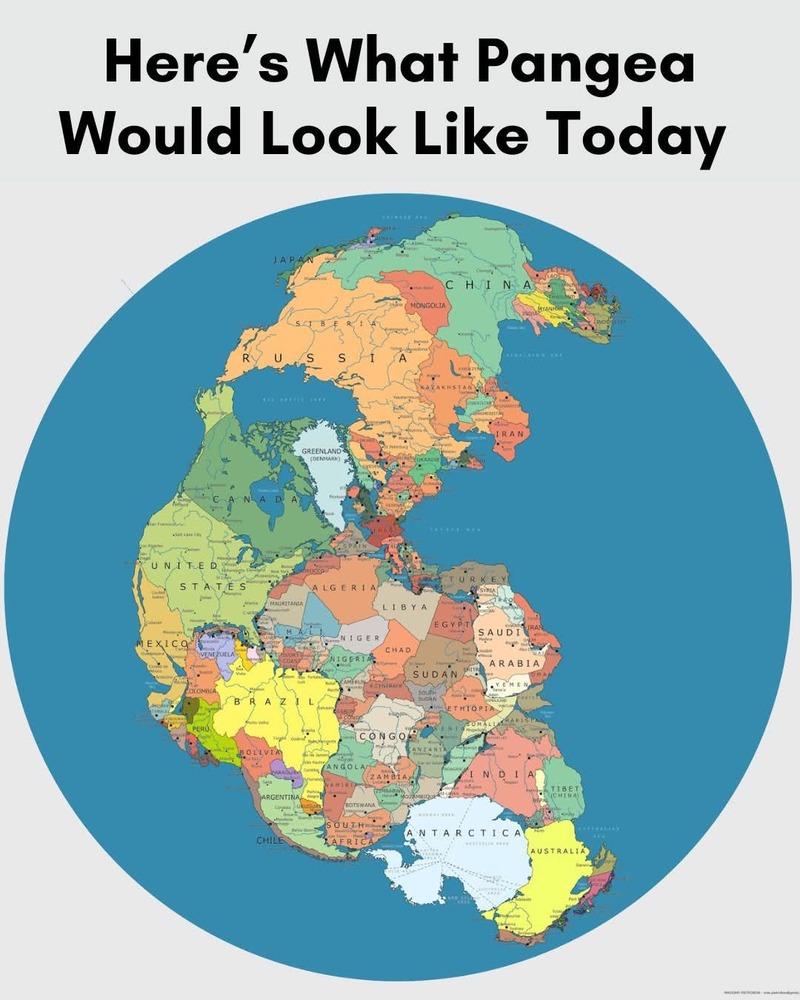

dv said:
The guy on the left must be stoned and can barely be bothered moving
Get ya next time round maaaannnnn
Cymek said:
dv said:
The guy on the left must be stoned and can barely be bothered moving
Get ya next time round maaaannnnn
they’d be fucking huge rivals in EEZ with those baddies CHINA though

Not sure what I think about this, but it’s readable and worthy of consideration:
https://backreaction.blogspot.com/2019/07/the-forgotten-solution-superdeterminism.html
The Rev Dodgson said:
Not sure what I think about this, but it’s readable and worthy of consideration:https://backreaction.blogspot.com/2019/07/the-forgotten-solution-superdeterminism.html
Initial conditions give rise to many other sorts of conditions later on that open up all sorts of new possibilities that can’t be predicted from the initial conditions.
So it depends on what you mean by “determinism” and its relationship to “prediction”.
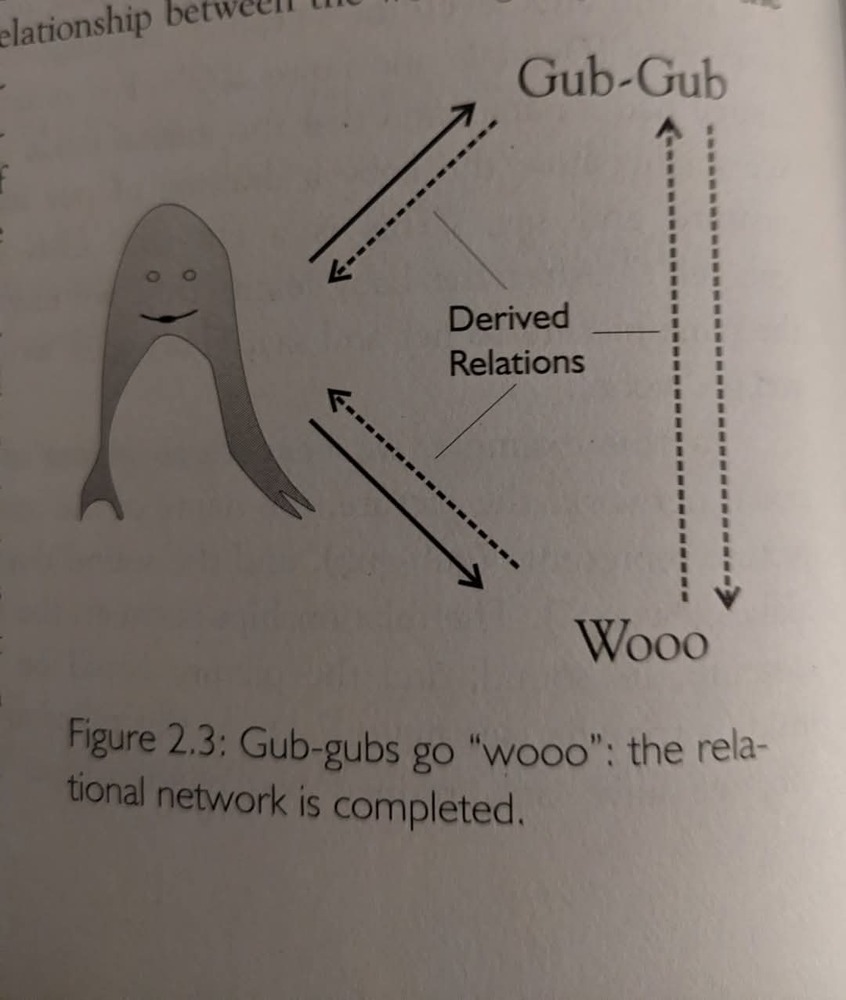
Chicago’s city council ran with that idea, debating an ordinance that would ban hatpins longer than nine inches; any woman caught in violation would be arrested and fined $50. The proceedings were packed with curious spectators, men and women, and acrimonious from the start. “If women care to wear carrots and roosters on their heads, that is a matter for their own concern, but when it comes to wearing swords they must be stopped,” a supporter said.

dv said:
No helpful half measures there.
dv said:
I prefer the first, but have seen both. It’s pretty annoying that there isn’t a universal standard.
I’ve only seen the number slashed. Maybe we should adopt 0
dv said:
never slashed our Os for English STEM writing, Nordic nørds may differ
Most people ever born did not reach adulthood
dv said:
Most people ever born did not reach adulthood
That’s sad.
Bubblecar said:
dv said:
Most people ever born did not reach adulthood
That’s sad.
They won’t be…
poikilotherm said:
Bubblecar said:
dv said:
Most people ever born did not reach adulthood
That’s sad.
They won’t be…
well lower the age of consent then and they will have
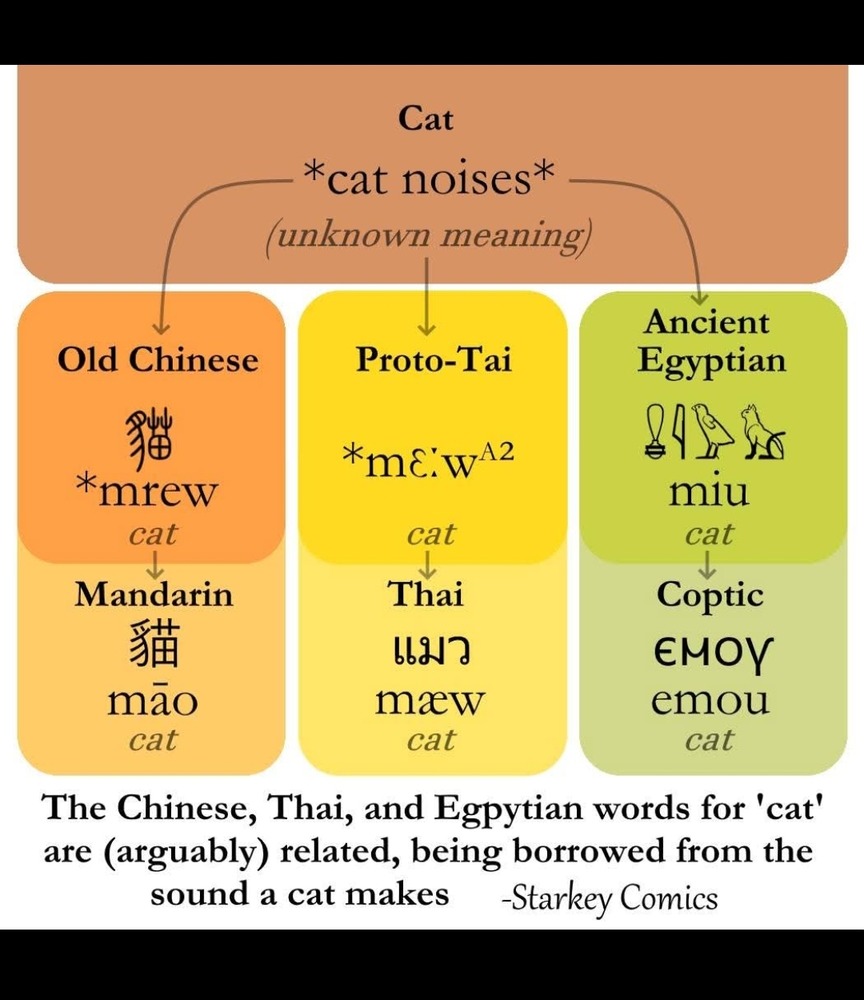
dv said:
:)
Consider if you will the humble combo screw head.
I don’t recall seeing them when I was a kid, and I’m not sure when they were invented, but they are a great idea. Good job, combo screw head example.
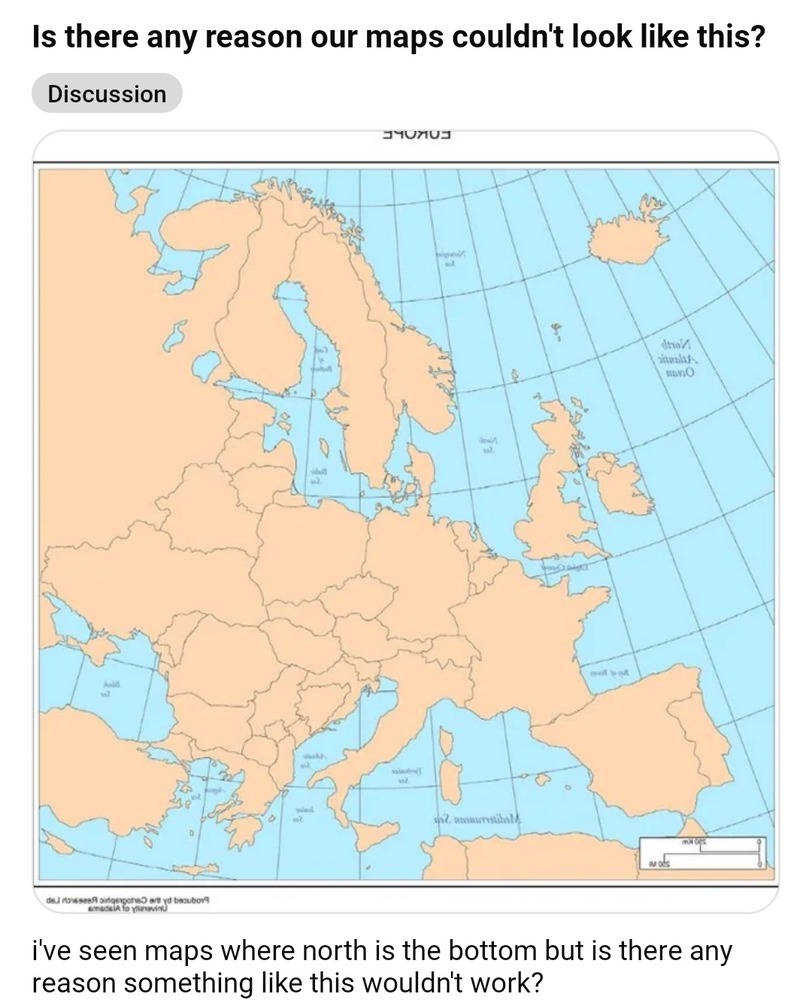
dv said:
Considering our natural view is from above, not below the land masses, I reckon this should be dismissed as being impractical.

dv said:
I’ve considered it.
Tau.Neutrino said:
dv said:
I’ve considered it.
Space creates universe’s.
Tau.Neutrino said:
Tau.Neutrino said:
dv said:
I’ve considered it.
Space creates universe’s.
Tau.Neutrino said:
Tau.Neutrino said:
dv said:
I’ve considered it.
Space creates universe’s.
Or it could be something completely different.

dv said:
Fair comment.
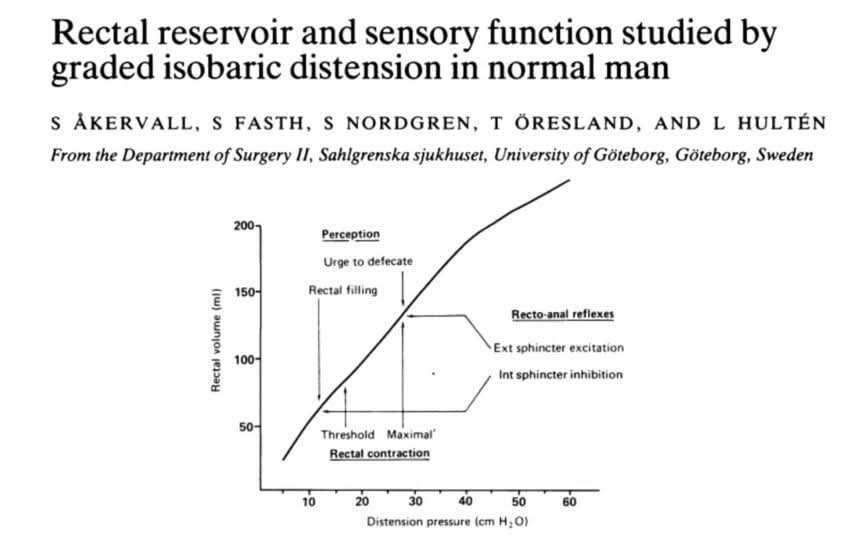
dv said:
Sounds like they are talking shit.
dv said:
Why bother with outer space, when there’s so much to explore in your own lavatory.
now do compressible gas
Bubblecar said:
dv said:
Why bother with outer space, when there’s so much to explore in your own lavatory.
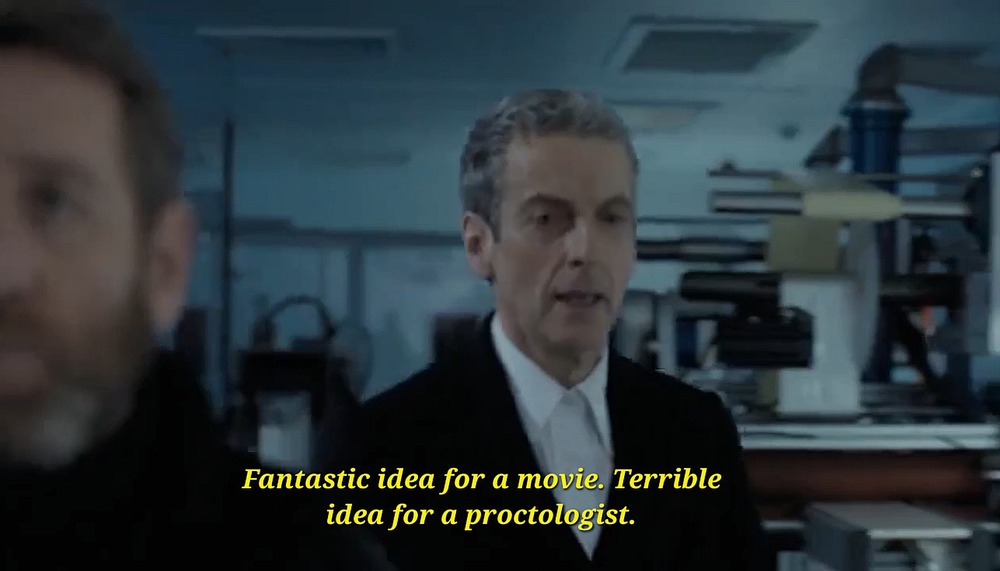
dv said:
Bubblecar said:
dv said:
Why bother with outer space, when there’s so much to explore in your own lavatory.
flatulence will get you nowhere
dv said:
Bubblecar said:
dv said:
Why bother with outer space, when there’s so much to explore in your own lavatory.
Hah! Just finished watching the Volcano Day episode of Dr Who…
SCIENCE said:
dv said:
Bubblecar said:
Why bother with outer space, when there’s so much to explore in your own lavatory.
flatulence will get you nowhere
Was that a Trev handle?
buffy said:
dv said:
Bubblecar said:Why bother with outer space, when there’s so much to explore in your own lavatory.
Hah! Just finished watching the Volcano Day episode of Dr Who…
Noice
Michael V said:
SCIENCE said:dv said:
flatulence will get you nowhere
Was that a Trev handle?
Yes.
there’s some weird CHINA magic going on here WTF how do they even
get a machine that operates on 59.9% less energy consumption compared with a 3.5-star refrigerator* without compromising

what even is an 8 star

https://www.youtube.com/watch?v=_tNDivDf9XI
Quillette
Australia was the last continent to
experience the Agricultural Revolution
since humans have been hunter gatherers
for most of our existence there is
immense value in studying the peoples
who inhabited pre-agricultural
Australia but there is a frustrating
lack of consensus over what we should
call them and how to distinguish them
from the current inhabitants of
Australia one common term for them is
Aboriginal Australians however the
current legal and scientific definition
of Aboriginal Australian lacks any
externally verifiable criteria the word
Aboriginal comes from
Aborigines the Latin name of a primitive
tribe that once lived in Italy it’s
possible that the root of this word was
aborigin from the beginning when the
British began colonizing other lands
they used aborigin and Aboriginal to
refer to the people they came across for
specific groups such as the inhabit an
of Canada and Australia they use the
proper noun Aboriginal and proper
adjective Aboriginal over time the
definition of Aboriginal Australian has
become increasingly ambiguous Aboriginal
identity is now based on self
identification rather than lifestyle
language ancestry genetics or appearance
most Aboriginal Australians have little
in common with their precolonial
ancestors and there is no way to tell if
someone is Aboriginal except by asking
them simultaneously Aboriginal
individuals and corporations are being
given increasing amounts of control over
all remains artifacts and resources
associated with precolonial Australia to
understand and preserve Australia’s past
we need more precise terminology every
person living in Australia Today
regardless of their ancestry or identity
participates in an agricultural food
system they are all farmers in a sense
in contrast all pre-colonial inhabitants
of Australia were foragers obtaining
their food exclusively through Hunting
Fishing and Gathering to highlight this
dietry and economic divide I will refer
to the latter as Australian forages when
the British first landed in Australia
the foragers they encountered belonged
to hundreds of different language groups
each consisting of politically
independent bands these people had
simple material technology but
sophisticated kinship systems and laws
which varied greatly by region none of
them engaged in farming animal
domestication or potery making they
modified their environment through
activities like Bush burning building
stone fish traps and creating shell mids
bands were semi-nomadic and foraged
within traditional territories most
built temporary shelters although some
cultures were more sedentary and
constructed larger more permanent
structures physical traits such as
height hair type and texture varied by
region While most had black hair
childhood blondis:
those in the Southeast were paler and
became sunburned in spring when they
stopped wearing their possum skin rugs
on the isolated island of Tasmania the
foragers were physically distinct from
Mainland populations in several ways
their skulls were rounder and their hair
was more tightly
curled economically speaking their
social organization was remarkably
egalitarian most groups lacked formal
hierarchies and none had developed
inequalities of wealth leadership
typically rested with Elders
particularly men who held sacred
knowledge rather than political Chiefs
there were various methods of handling
disputes one on one duels regulated
group battles with clear Rules of
Engagement and most of the time few
casualties formal punishments such as
executions and spear dodging and brutal
massacres to avenge severe grievances
Intergroup conflicts had two main causes
disputes over women and revenge for
wrongs including suspected sorcery
notably Australian foragers rarely
fought over resources or territory in
STK contrast to many agricultural
societies when violence did occur its
intensity often correlated with social
distance most often conflicts between
related groups followed stricter rules
to limit casualties while fights with
strangers were more deadly Australian
foragers never adopted Bow and Arrow
Technology relying instead on Spears
spear throwers clubs and non-returning
boomerangs the most Le weapons were
reserved for human conflict rather than
hunting cultural variations existed for
instance the digu do was only present in
Northern regions such as Aram land an
area where boomerangs were not used for
hunting or fighting the spear thrower
was not ubiquitous either and in some
regions Spears were simply thrown by
hand technological change was slow much
of the forager lifestyle would have been
familiar to their Pline ancestors but
everything changed with the arriv of
European
agriculturalists it’s unknown how many
people lived in pre-colonial Australia
and Tasmania estimates range from
300,000 to over a million evidence
suggests that the population began to
decline around 400 years ago possibly
with the introduction of diseases
carried by Indonesian Trang Hunters
beginning in 1788 foragers and farmers
coexisted in Australia for nearly 200
years relationships between the two
varied some forager bands traded with
the newcomers some fought them others
did both many foragers initially thought
the Europeans were dead relatives who
had come back to life this belief
stemmed from the Mory practice of
removing the Skin’s melanin containing
outer layer which revealed an under
layer that was pale like European skin
the newcomers clashed with the older
inhabitants over hunting RS encroachment
on territory abductions especially of
forager women and similar offenses it’s
unknown how many foragers were killed by
the newcomers but at least
10,657 by far the worst enemy of the
Australian forages was European and
Asian diseases against which their
otherwise impressive immune systems had
no defenses the population dropped
sharply in Tasmania the decline was fast
and mostly complete one of the last
Tasmanian forages TR n died in 1876 just
100 years after Captain Cook first
encountered her people only a few
Tasmanian women who married European
migrants still have living descendants
in Australia many bands and language
groups in the Southeast also went
extinct though Northern and Central
regions were somewhat less affected by
1933 there were only 36,000 remaining
Australian foragers left together with
44,000 former foragers or or descendants
of forages the last band of forages the
pin9 entered modern Agricultural Society
upon contact in
1984 this marked the end of Humanity’s
longest continuous foraging tradition
during the first half of the 20th
century the Australian government
practiced a policy of assimilation
designed to culturally and racially
absorb the descendants of Australian
forages this led to the forced removal
and education of many children who were
dis Ed from both foragers and
Europeans after this policy was
abandoned in the 1960s terms like
halfcast designed to calibrate the
extent of someone’s genetic Heritage
fell out of favor as people shifted to a
binary understanding in which one is
either Aboriginal or not now even
geneticists who study Australian
specific DNA agree that Aboriginal is a
culturally based affiliation and cannot
be defined genetically the government
uses a three-part test for Discerning
whether someone is Aboriginal the person
must identify as Aboriginal the
Aboriginal Community must recognize the
person as Aboriginal and the person is
Aboriginal by descent but since there is
no clear definition of what constitutes
the Aboriginal Community or Aboriginal
descent this is circular logic that
makes external verification impossible
which is why scientists and government
entities such as the Australian Bureau
of Statistics only used the first part
self-identification in 2021 8812 th000
Australians identified as Aboriginal a
five-fold increase from 150,000 in
1981 this is largely due to the fact
that being Aboriginal has become less
stigmatized and genetic criteria are no
longer used to determine Aboriginal
identity neither are there any genetic
criteria for identifying as indigenous
First Nations or black a few descendants
of Australian forages even identify as
white some Aboriginal Australians
especially in rural areas are
genetically and phenotypically similar
to Australian forages speak their
languages and observe many of their laws
other Aboriginal Australians have pale
skin and blue eyes little or no forager
DNA and do not speak pre-colonial
languages or follow pre-colonial laws
and customs and of course many fall some
in between as it stands Aboriginal
identity is a social construct in many
ways it parallels the idea of European
royalty both groups are often heavily
invested in their family trees use
traditional regalia feel an emotional
connection to cultural myths exer and
influence over historical narratives a
recognized by governments exercise moral
Authority control land and artifacts and
Lead official ceremonies both groups
resist Outsider attempts to claim
membership or questions their legitimacy
in some contexts there may be no harm in
equating Aboriginal Australians with
Australian forages or allowing anyone to
identify as Aboriginal but the use of
this poorly defined term in legal and
scientific contexts can have disastrous
effects one example is the treatment of
ancient remains Aboriginal corporations
aided by the Australian government have
been actively removing Australian
forager remains and artifacts from
institutions worldwide these items are
then placed in private collections or
buried in undisclosed locations
regardless of their age or scientific
significant some of these cases involve
reclaiming the bodies of recently
deceased people that were stolen by
grave robbers and are now being reburied
by their direct descendants but such
clear-cut cases are in the minority more
typical is the case of man this
4,000-year-old fossilized skeleton
discovered on the shores of the now dry
lake was one of the world’s most
significant archaeological finds in 2001
scientists claimed to have extracted DNA
that showed that man was not
ancestral to any known human population
a subsequent study failed to replicate
these findings nevertheless the
possibility that recent Australian
forages were not descended from
man’s people caused controversy some
scientists and local Aboriginal leaders
advocated for the fossils preservation
and continued study but the Australian
government ultimately started with the
AAG an Aboriginal Corporation seeking
reburial in 2022 man was secretly
buried in an undisclosed location over
the past 50 years Australian
paleoanthropology has taken one step
forward and 10 steps back only a handful
of DNA tests were ever conducted on
Australian human fossils before their
removal from museums and
universities all that remain are the
measurements and increasingly rare
photographs new fossils found at Lake and other such sites are usually
ignored and are quickly eroded and
destroyed by the elements this loss of
archaeological evidence creates
irreversible gaps in our understanding
of human prehistory research
restrictions extend beyond physical
remains there is a growing movement to
limit access to data and images that
conflict with modern interpretations of
the laws and customs of forager cultures
this includes restrictions on visual
depictions of certain people artifacts
and ceremonies records of traditional
practices and archaeological field notes
photographs and interviews the
significance of this loss cannot be
overstated Australia was one of the only
places where humans maintained a hunter
gatherer lifestyle into the modern era
with an unbroken tradition lasting until
1984 this makes it an invaluable window
into human man’s past a window that is
gradually closing but despite the
challenges Australian scientists
continue to preserve Australian forager
languages conduct limited excavations
and genetic studies and digitally
archive many historical photographs and
documents the current trend of
restricting access to fossils and
historical materials will surely
eventually end when this happens
researchers will resume their
investigations orbe with fewer resources
than before someday hope hopefully
sooner rather than later Australians of
all backgrounds will recognize the
immense value of studying the forager
cultures of Australia and Spark a
Renaissance of exploration into
Australian prehistory thank you so much
for watching this video it was written
by manic which is a pseudonym of a
man who loves Australian culture and
prehistory and is obsessively learning
as much as he can before it’s too late
you can read it I’ve linked it in the
show notes

dv said:
I have been considering this with regards to technology recently. I have come to the conclusion that just because something technically possible does not make it necessary or even desirable. I have decided to reject being too much a participant in the “global village”.
dv said:
Hear hear.

dv said:
imagine a paradox of tolerance
party_pants said:
dv said:
I have been considering this with regards to technology recently. I have come to the conclusion that just because something technically possible does not make it necessary or even desirable. I have decided to reject being too much a participant in the “global village”.
doin’ things just ‘cause you can oh yeah
actually yeah they probably had these thoughts while they were building teller ulam poppers
tauto said:
Arts said:
Did you know that in Alabama, there is a whiteboard that looks like a normal whiteboard sitting against two walls and meeting at the corner… but you can pull at it and it turns into a bullet proof room big enough to hold an entire class of children…. Also the littlest child can do the transformation no adult needed … and that, ladies and gentlemen, is what the actual fuck is wrong with America today.
Stay tuned for tomorrow’s episode of TAFIWWAT.
https://giffords.org/stories/guns-are-now-the-leading-cause-of-death-for-american-kids/
look we don’t know much about anything but how is a safe room something that is wrong with a place, pretty sure having a safe room in Australia would be useful as well even if there are hardly any guns flying around
this bridge in China:

https://www.highestbridges.com/wiki/index.php?title=Ruyi_Glass_Footbridge
The Rev Dodgson said:
this bridge in China:

https://www.highestbridges.com/wiki/index.php?title=Ruyi_Glass_Footbridge
Impressive, I think I’d need a few rums in me to do that walk these days.
those bastard communists
we scrolled down

damn
Peak Warming Man said:
The Rev Dodgson said:
this bridge in China:

https://www.highestbridges.com/wiki/index.php?title=Ruyi_Glass_Footbridge
Impressive, I think I’d need a few rums in me to do that walk these days.
Same here.
The Rev Dodgson said:
this bridge in China:

https://www.highestbridges.com/wiki/index.php?title=Ruyi_Glass_Footbridge
Nope. I’m not walking across that.

Consider that semiconductors seem to have “won” the logic gate war forever.
In the late 19th century and the first half of the 20th, mechanical ligic gates, thermionic valves, and relay logic were in use, but for the last 70 years it has been pretty clear that only semiconductors have suitable scalability and potential for miniaturisation.
And now… there’s nothing remotely on the horizon to replace them. After 30 years of development there’s still no practical application for quantum computing. It might be that semiconductor logic will dominate for centuries.
dv said:
Consider that semiconductors seem to have “won” the logic gate war forever.
In the late 19th century and the first half of the 20th, mechanical ligic gates, thermionic valves, and relay logic were in use, but for the last 70 years it has been pretty clear that only semiconductors have suitable scalability and potential for miniaturisation.And now… there’s nothing remotely on the horizon to replace them. After 30 years of development there’s still no practical application for quantum computing. It might be that semiconductor logic will dominate for centuries.
nice

SCIENCE said:
Nup. NFI
Also from Quora:

, which I found a little surprising.
Some searching revealed that it’s just someone’s “alternative history”.
The Rev Dodgson said:
Also from Quora:
, which I found a little surprising.
Some searching revealed that it’s just someone’s “alternative history”.
always was
The Rev Dodgson said:
Also from Quora:
, which I found a little surprising.
Some searching revealed that it’s just someone’s “alternative history”.
Doesn’t seem to match any known history.
FCRs are typically 6.0–10.0 for beef, 2.7–5.0 for pigs, 1.7–2.0 for chicken and 1.0–2.4 for farmed fish and shrimp.
Quora sent me to this New York Times article.
Only at the end did I notice that it is nearly 10 years old.
So the question is, what developments have there been over the past 10 years?
Sorry, Einstein. Quantum Study Suggests ‘Spooky Action’ Is Real.
Part of the laboratory setup for an experiment at Delft University of Technology, in which two diamonds were set 1.3 kilometers apart, entangled and then shared information. Credit…Frank Auperle/Delft University of Technology
By John Markoff
Oct. 21, 2015
In a landmark study, scientists at Delft University of Technology in the Netherlands reported that they had conducted an experiment that they say proved one of the most fundamental claims of quantum theory — that objects separated by great distance can instantaneously affect each other’s behavior.
The finding is another blow to one of the bedrock principles of standard physics known as “locality,” which states that an object is directly influenced only by its immediate surroundings. The Delft study, published Wednesday in the journal Nature, lends further credence to an idea that Einstein famously rejected. He said quantum theory necessitated “spooky action at a distance,” and he refused to accept the notion that the universe could behave in such a strange and apparently random fashion.
In particular, Einstein derided the idea that separate particles could be “entangled” so completely that measuring one particle would instantaneously influence the other, regardless of the distance separating them.
Einstein was deeply unhappy with the uncertainty introduced by quantum theory and described its implications as akin to God’s playing dice.
But since the 1970s, a series of precise experiments by physicists are increasingly erasing doubt — alternative explanations that are referred to as loopholes — that two previously entangled particles, even if separated by the width of the universe, could instantly interact.
The new experiment, conducted by a group led by Ronald Hanson, a physicist at the Dutch university’s Kavli Institute of Nanoscience, and joined by scientists from Spain and England, is the strongest evidence yet to support the most fundamental claims of the theory of quantum mechanics about the existence of an odd world formed by a fabric of subatomic particles, where matter does not take form until it is observed and time runs backward as well as forward.
The researchers describe their experiment as a “loophole-free Bell test” in a reference to an experiment proposed in 1964 by the physicist John Stewart Bell as a way of proving that “spooky action at a distance” is real.
“These tests have been done since the late ’70s but always in the way that additional assumptions were needed,” Dr. Hanson said. “Now we have confirmed that there is spooky action at distance.”
According to the scientists, they have now ruled out all possible so-called hidden variables that would offer explanations of long-distance entanglement based on the laws of classical physics.
The Delft researchers were able to entangle two electrons separated by a distance of 1.3 kilometers, slightly less than a mile, and then share information between them. Physicists use the term “entanglement” to refer to pairs of particles that are generated in such a way that they cannot be described independently. The scientists placed two diamonds on opposite sides of the Delft University campus, 1.3 kilometers apart.
Bas Hensen, left, and Ronald Hanson helped show that objects apart can instantly affect each other.Credit…Frank Auperle/Delft University of Technology
Each diamond contained a tiny trap for single electrons, which have a magnetic property called a “spin.” Pulses of microwave and laser energy are then used to entangle and measure the “spin” of the electrons.
The distance — with detectors set on opposite sides of the campus — ensured that information could not be exchanged by conventional means within the time it takes to do the measurement.
“I think this is a beautiful and ingenious experiment and it will help to push the entire field forward,” said David Kaiser, a physicist at M.I.T., who was not involved in the study. However, Dr. Kaiser, who is with another group of physicists who are preparing to perform an even more ambitious experiment next year that will soon measure light captured at the far edges of the universe, also said he did not think every scintilla of doubt had been erased by the Dutch experiment.
The tests take place in a mind-bending and peculiar world. According to quantum mechanics, particles do not take on formal properties until they are measured or observed in some way. Until then, they can exist simultaneously in two or more places. Once measured, however, they snap into a more classical reality, existing in only one place.
Beyond the immediate result, physicists noted that the experiment represented an advance in the understanding of a Lilliputian world that was once largely the province of theory. Quantum mechanics has already had a huge impact on modern technology and industry. For example, it is the foundation for modern computers and lasers.
“What I do find interesting is that the experimenters are learning how to manipulate quantum systems, and do experiments that are far beyond what was possible when I was starting in physics,” said Leonard Susskind, a theoretical physicist at Stanford. “Things which were at best ‘thought experiments’ become possible, then routine. That is incredibly impressive.”
Indeed, the experiment is not merely a vindication for the exotic theory of quantum mechanics, it is a step toward a practical application known as a “quantum Internet.” Currently, the security of the Internet and the electronic commerce infrastructure is fraying in the face of powerful computers that pose a challenge to encryption technologies based on the ability to factor large numbers and other related strategies.
Researchers like Dr. Hanson envision a quantum communications network formed from a chain of entangled particles girdling the entire globe. Such a network would make it possible to securely share encryption keys, and know of eavesdropping attempts with absolute certainty.
For some physicists, even though the new experiment claims to be “loophole free,” the matter is not completely closed.
“The experiment has closed two of the three major loopholes beautifully, but two out of three isn’t three,” Dr. Kaiser said. “I believe in my bones that quantum mechanics is the correct description of nature. But to make the strongest statement, frankly we’re not there.”
A potential weakness of the experiment, he suggested, is that an electronic system the researchers used to add randomness to their measurement may in fact be predetermined in some subtle way that is not easily detectable, meaning that the outcome might still be predetermined as Einstein believed.
To attempt to overcome this weakness and close what they believe is a final loophole, the National Science Foundation has financed a group of physicists led by Dr. Kaiser and Alan H. Guth, also at M.I.T., to attempt an experiment that will have a better chance of ensuring the complete independence of the measurement detectors by gathering light from distant objects on different sides of the galaxy next year, and then going a step further by capturing the light from objects known as quasars near the edge of the universe in 2017 and 2018.
A correction was made on Oct. 21, 2015: Because of an editing error, an earlier version of a picture caption with this article misstated the given name of a scientist involved in the experiment. As the article correctly noted, he is Ronald Hanson, not Robert.
The Rev Dodgson said:
Quora sent me to this New York Times article.Only at the end did I notice that it is nearly 10 years old.
So the question is, what developments have there been over the past 10 years?
Seems likely that this is what prompted a confused Quora-bot to send you the old article. Also likely it’s a continuation of that work to some degree.
High-precision quantum gates with diamond spin qubits achieve error rate below 0.1%
https://phys.org/news/2025-03-high-precision-quantum-gates-diamond.html
Researchers at QuTech, the interfaculty quantum technology research institute of Delft University of Technology, have now demonstrated a highly precise universal set of quantum gates using a diamond quantum chip….

dv said:
Heh!
:)
dv said:
Not sure that the headline is excellent work, but the article is QI.
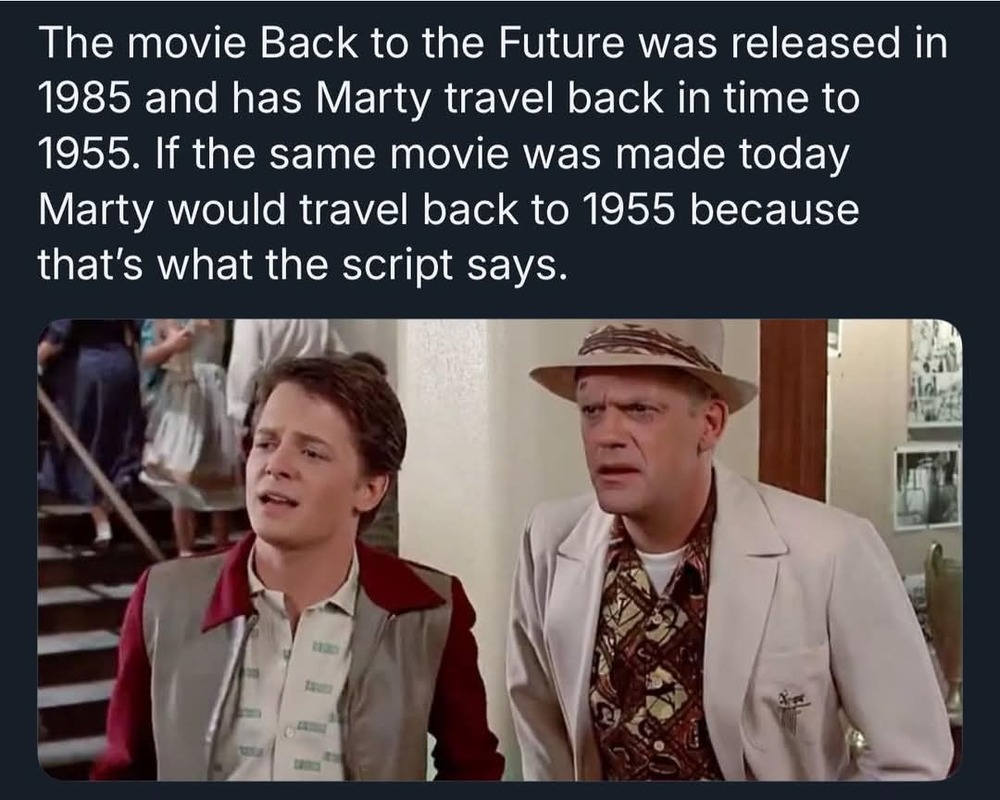

WTF
Historically, she says, daily washing was seen as problematic.
Have these geniuses never spent a day above 300 K ¿
SCIENCE said:
WTF
Historically, she says, daily washing was seen as problematic.
Have these geniuses never spent a day above 300 K ¿
I doubt that I have.
I spend the great majority of my days inside at temperatures well below 80 F.
SCIENCE said:
WTF
Historically, she says, daily washing was seen as problematic.
Yep. Soap and water bad… mud good :)
Ian said:
SCIENCE said:WTF
Historically, she says, daily washing was seen as problematic.
Yep. Soap and water bad… mud good :)
Nothing quite like it for cooling the blood.
The Rev Dodgson said:
Ian said:
SCIENCE said:WTF
Historically, she says, daily washing was seen as problematic.
Yep. Soap and water bad… mud good :)
Nothing quite like it for cooling the blood.
The hippopotamus was no ignoramus :)
https://www.weatherzone.com.au/news/mini-tornado-to-be-officially-recognised-on-fujita-scale/1890489
Ian said:
https://www.weatherzone.com.au/news/mini-tornado-to-be-officially-recognised-on-fujita-scale/1890489
Steve will be rolling his eyes.
Ian said:
https://www.weatherzone.com.au/news/mini-tornado-to-be-officially-recognised-on-fujita-scale/1890489
Checks date that was published.
Yes, it was today.
The Rev Dodgson said:
Ian said:
https://www.weatherzone.com.au/news/mini-tornado-to-be-officially-recognised-on-fujita-scale/1890489Checks date that was published.
Yes, it was today.
… because they are causing too many arguments on social media.
ChrispenEvan said:
Ian said:
https://www.weatherzone.com.au/news/mini-tornado-to-be-officially-recognised-on-fujita-scale/1890489Steve will be rolling his eyes.
They’re taking the piss.

Peak Warming Man said:
ChrispenEvan said:
Ian said:
https://www.weatherzone.com.au/news/mini-tornado-to-be-officially-recognised-on-fujita-scale/1890489Steve will be rolling his eyes.
They’re taking the piss.
Ummmmm. Yes. What day is it again?????
Woodie said:
Peak Warming Man said:
ChrispenEvan said:Steve will be rolling his eyes.
They’re taking the piss.
Ummmmm. Yes. What day is it again?????
……. says Dr. Sloof Lirpa, the study’s lead author. …..
Says it all, don’t ya reckon???
Woodie said:
Peak Warming Man said:
ChrispenEvan said:Steve will be rolling his eyes.
They’re taking the piss.
Ummmmm. Yes. What day is it again?????
Uh Oh.
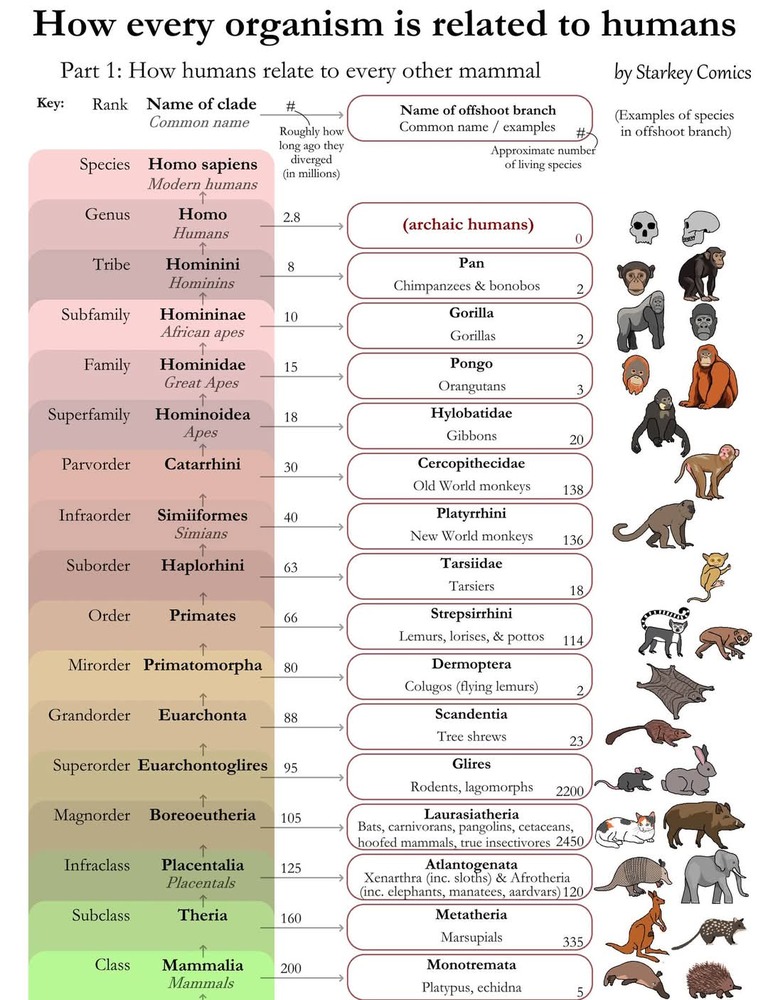
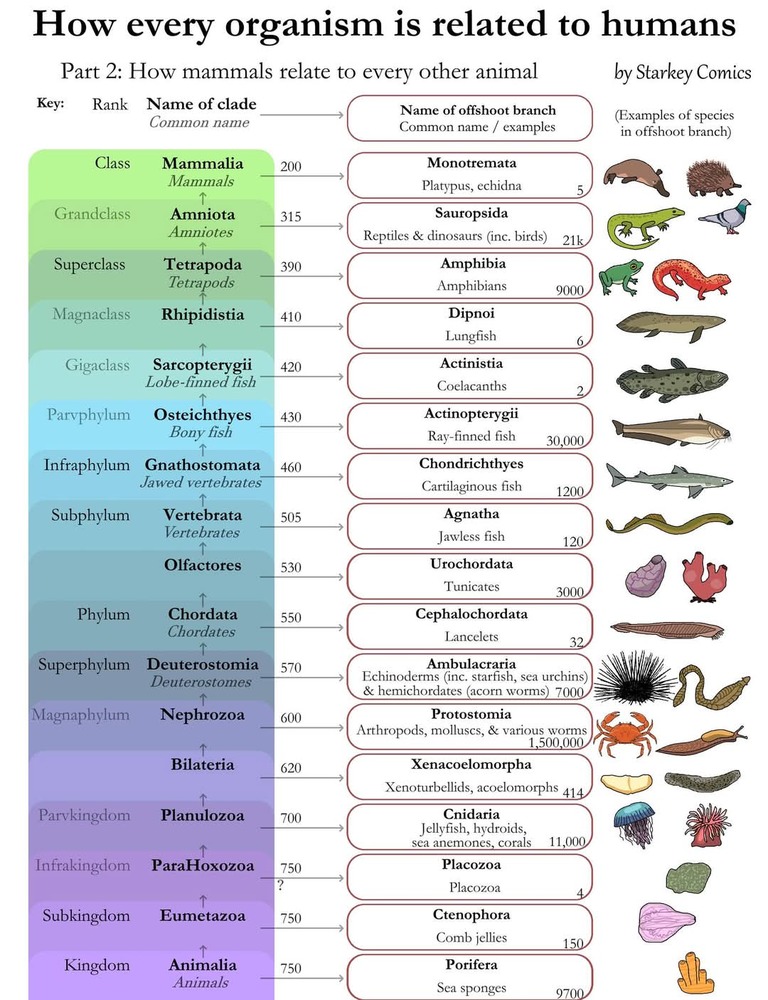
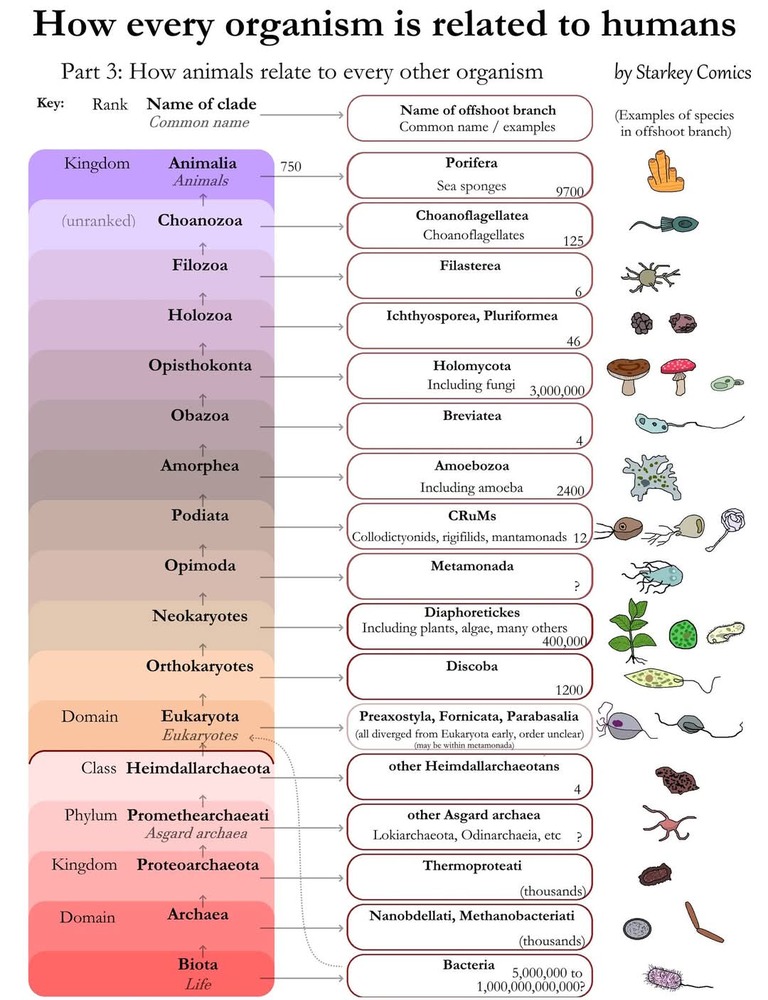
Lovely set of charts by Starkey
We usually call the DPRK and ROK North Korea and South Korea respectively, even though such cardinal points in not mentioned in their official names in either English or Korean.
I propose we call the Republic of the Congo and Democratic Republic of the Congo West Congo and East Congo respectively.
Some fun facts: unti 1966, Kinshasha was called Léopoldville after Leopold II of Belgium. Brazzaville was named for the explorer Pierre Savorgnan de Brazza. The two capitals are separated by the Congo river and there have been various proposals to build a bridge between them but they have been thwarted mainly by bad relations between the two countries. There are regular ferries.
Speaking of record min temperatures…
It’s hard to imagine what life must be like in a place like Yakutsk. It’s a proper city, about the same population as Canberra. The temperature outside in winter could be -60 deg C.
For comparison the lowest temperature recorded at Mawson Base in Antarctica is -36 deg C.
dv said:
Speaking of record min temperatures…It’s hard to imagine what life must be like in a place like Yakutsk. It’s a proper city, about the same population as Canberra. The temperature outside in winter could be -60 deg C.
For comparison the lowest temperature recorded at Mawson Base in Antarctica is -36 deg C.
i think I watched a youtube of kids going to school there.

https://www.realclearscience.com/articles/2023/10/12/ammonium_chloride_may_be_the_sixth_primary_taste_985536.html


Today’s dose of Quora.
See link for readable version of the equations
https://www.quora.com/In-mathematical-terms-what-is-time-and-how-can-there-be-multiple-dimensions-of-it
I think this is a pretty good explanation of space-time.In mathematical terms what is time, and how can there be multiple dimensions of it?
Okay, this is a good time to talk about a common misconception: time was always a dimension, even in Newtonian physics, and it is not a spatial dimension, not even in relativistic physics.
So, to answer your question, we are first going to have to dig into the question of what is a dimension, anyway.
For simplicity, let’s consider flat, Euclidean space. In mathematical terms, the dimension of this space is the maximum number of linearly independent vectors that we can find. Recall that vectors
v
1
,
v
2
,
…
v
n
are linearly independent if and only if the only solution to the vector equation
A
1
v
1
+
A
2
v
2
+
…
+
A
n
v
n
=
0
is
A
1
=
A
2
=
…
=
A
n
=
0
.
So, for instance, the plane is 2-dimensional. Why? Because if we choose, for example, the vectors
(
1
,
0
)
and
(
0
,
1
)
, any third vector will always be a linear combination of those two (for example,
(
2
,
1
/
4
)
=
2
⋅
(
1
,
0
)
+
1
/
4
⋅
(
0
,
1
)
, which means that we have the non-trivial solution
−
1
⋅
(
2
,
1
/
4
)
+
2
⋅
(
1
,
0
)
+
1
/
4
⋅
(
0
,
1
)
=
0
).
Another, perhaps more layperson way to think about this is that the dimension of the space is the minimal amount of information that I have to give you to uniquely determine a point in that space.
For example, suppose that I want to warn you about a meteorite striking the Earth—I want to tell you to stay away from the blast center. I need to give you three pieces of information—this might be the latitude, the longitude, and the time at which the meteorite will hit the Earth. Armed with this information, you know exactly the point to avoid.
Note that I could have specified this point in all sorts of other ways. I could, for example, have told you that the meteorite will hit 100 miles to the northeast of Mount Everest on April 11, 2020 at 4:31 am. I have still provided you with three pieces of information—I have specified the distance away from a fixed origin, the direction away from that point, and the time. We can come up with all sorts of various coordinate systems that will specify points in many different ways, but for this space, the amount of information needed to specify any point will always be three.
Our own space is, broadly speaking, four dimensional (ignoring any additions proposed by string theorists)—after all, to specify points in the general universe, it is enough to specify latitude, longitude, distance away from the Earth’s surface, and time. (This might not be a practical coordinate system, but it does technically work.)
This fact of the universe being four dimensional does not depend in any way at all on whether we are talking about Newtonian or relativistic physics. In order to get at what is different between these two models, we are going to have to talk about the separation of points.
Say I want to measure how two events are separated in Newtonian physics—maybe I want to compare how distant is the event of me writing this Quora answer and me waking up tomorrow morning. There are two pieces of information I need to determine: how far away am I now from my bed (a distance of some meters) and how long will it be between now and then (somewhat more than 12 hours).
That is, there is the spatial separation and the temporal separation. Spatial separation is usually computed as
√
Δ
x
2
+
Δ
y
2
+
Δ
z
2
(here
Δ
x
is the change in
x
-coordinate), and temporal separation is just
Δ
t
. These two types of separation do not interact with each other in any way.
Now, I mentioned before that I might have all sorts of different coordinate systems. However, all of these different coordinate systems should always give the same spatial separation and the same temporal separation. So, for example, I could rotate my
x
,
y
,
z
axes around—that would change what
Δ
x
,
Δ
y
,
Δ
z
all are, but the quantity
√
Δ
x
2
+
Δ
y
2
+
Δ
z
2
will not change. It is an invariant—that is, something that is measured the same in any (valid) coordinate system.
However, this is just how Newtonian physics works. Relativistic physics is a bit different. Instead of there being two different kinds of separation, there is just one, known as the space-time interval, which is defined as
Δ
s
2
=
−
c
2
Δ
t
2
+
Δ
x
2
+
Δ
y
2
+
Δ
z
2
(where
c
is the speed of light). It is this quantity that is invariant in relativistic physics, rather than the quantities
Δ
x
2
+
Δ
y
2
+
Δ
z
2
and
Δ
t
independently. If you study the coordinate transformations that preserve this invariant, you discover Lorentz boosts, and you see that in general how time and space are measured will depend on the coordinate frame that is used, but the two interact in this very particular way so that everything works out consistently in the end.
In this formalism, we can specify what distinguishes a temporal and a spatial dimension—the temporal dimensions are those that appear with a minus sign in our invariant, and the spatial ones are those that appear with a plus sign. We could then ask what might a world look like where the relevant invariant was instead something like
Δ
s
2
=
−
c
2
Δ
t
2
1
−
c
2
Δ
t
2
2
+
Δ
x
2
+
Δ
y
2
+
Δ
z
2
.
We can describe the coordinate transformations of such a space perfectly well mathematically. The trouble is that isn’t enough to really give us a sense of how things will behave, because we haven’t specified any dynamics on this space—that is, we have described how coordinate transformations behave, but we haven’t described how things will change with time. That is an independent physical component, and there are a variety of choices that we might make.
In any case, as far as our macroscopic universe is concerned, it is pretty clear that it is 4 dimensional, with 1 dimension of time and 3 dimensions of space. We would notice if there was another macroscopic dimension of time. That said, we might consider “curled up” dimensions as in string theory, and I suppose it is theoretically possible that there could be another “curled up” temporal dimension (although, as far as I am aware, string theory does not propose this). This is, however, a discussion for another time.
That was a little hard to read.
dv said:
That was a little hard to read.
That’s why I kindly provided a link :)
dv said:
Ha!
The Rev Dodgson said:
dv said:
That was a little hard to read.
That’s why I kindly provided a link :)
Did anyone get your last one out?
I tried and tried and tried. I got three columns, three rows and one diagonal. Buggered if I could get the lot.
:(
Michael V said:
The Rev Dodgson said:
dv said:
That was a little hard to read.
That’s why I kindly provided a link :)
Did anyone get your last one out?
I tried and tried and tried. I got three columns, three rows and one diagonal. Buggered if I could get the lot.
:(
My last brain teaser?
No-one responded.
I got it, but it took me a week :)
The Rev Dodgson said:
Michael V said:
The Rev Dodgson said:That’s why I kindly provided a link :)
Did anyone get your last one out?
I tried and tried and tried. I got three columns, three rows and one diagonal. Buggered if I could get the lot.
:(
My last brain teaser?
No-one responded.
I got it, but it took me a week :)
Yes, thanks.
That cheers me a bit. I’ll keep going at it on and off.
dude discovers the preparedness paradox for the first time

though perhaps it should be called the paradox of preventative action
imagine if there were some kind of process by which
the benefits of different treatments could be assessed and compared to come to a sensible answer

The Rev Dodgson said:
Wonder how they obtained such stats, especially for 1500.
Bubblecar said:
The Rev Dodgson said:
Wonder how they obtained such stats, especially for 1500.
Probably googled them.
But yeah, may well not be worth the paper they aren’t printed on.
The Rev Dodgson said:
Bubblecar said:
The Rev Dodgson said:
Wonder how they obtained such stats, especially for 1500.
Probably googled them.
But yeah, may well not be worth the paper they aren’t printed on.
Printing press 1440?
roughbarked said:
The Rev Dodgson said:
Bubblecar said:Wonder how they obtained such stats, especially for 1500.
Probably googled them.
But yeah, may well not be worth the paper they aren’t printed on.
Printing press 1440?
thank the Jesus cult

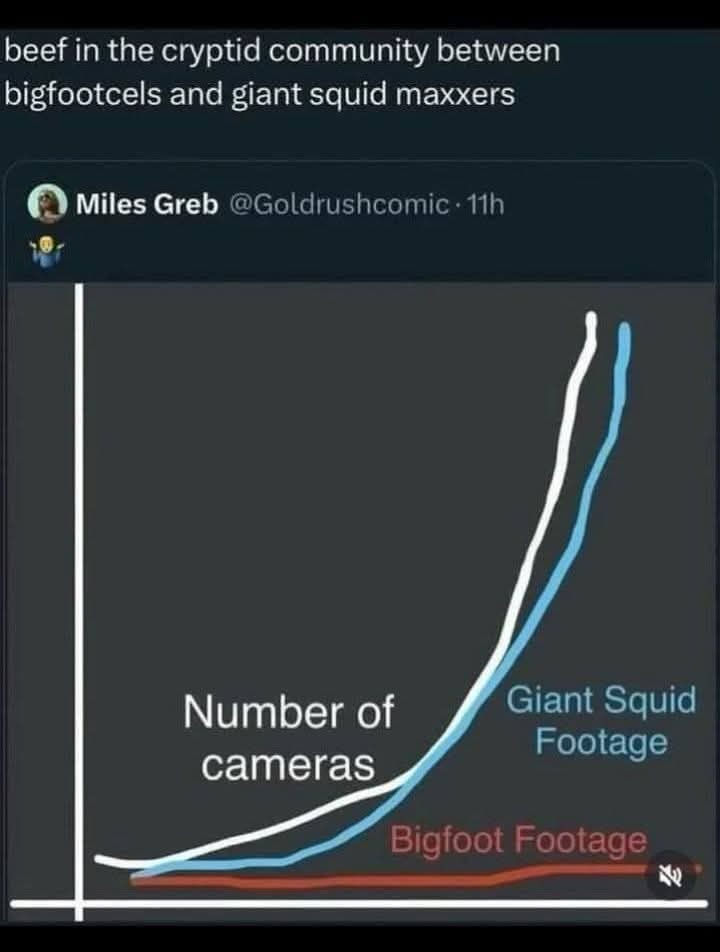
dv said:
How come Australians don’t post blurry photos/film of the notorious bunyip or the lesser known narguns?
kii said:
dv said:
How come Australians don’t post blurry photos/film of the notorious bunyip or the lesser known narguns?

dv said:
kii said:
dv said:
How come Australians don’t post blurry photos/film of the notorious bunyip or the lesser known narguns?
squints
this Quora post:
“I just read today that roughly 30% of young Canadians think that Canada becoming part of the US is a good idea. Are these Canadians thinking clearly?
Yeah I was taken aback to find out there was actually some truth to this assertion. A couple of things to point out though.
First, 30% support or whatever the figure is means 70% of young Canadians do NOT support joining the US. And as a whole, support for Canada joining the US is 10–13%.
Secondly, the explanation for this higher support among young Canadians can be explained this way: younger Canadians haven’t been dealt a good hand in life — and definitely not as good as those older people who are much more likely to tell Trump to get lost. Think about the high cost of housing and cost of living. Trust in our institutions has eroded.
In the World Happiness Survey, Canada ranked a respectable 15th out of 143 nations when it comes to overall happiness. But this figure conceals an enormous generation gap: older Canadians ranked eighth in the world. Canadians under 30 were 58th in the world.
Yeah, young Canadians are a pretty unhappy lot.
But either way you look at it, the answer isn’t to join the USA. Because the US overall ranks 24th in the world on the World Happiness Index while their young people are even unhappier than ours at #62.
This isn’t a matter of the grass being greener on the other side. Rather it would be more “out of the frying pan into the fire.””
Is life for young N Americans really that bad?
The Rev Dodgson said:
this Quora post:“I just read today that roughly 30% of young Canadians think that Canada becoming part of the US is a good idea. Are these Canadians thinking clearly?
Yeah I was taken aback to find out there was actually some truth to this assertion. A couple of things to point out though.First, 30% support or whatever the figure is means 70% of young Canadians do NOT support joining the US. And as a whole, support for Canada joining the US is 10–13%.
Secondly, the explanation for this higher support among young Canadians can be explained this way: younger Canadians haven’t been dealt a good hand in life — and definitely not as good as those older people who are much more likely to tell Trump to get lost. Think about the high cost of housing and cost of living. Trust in our institutions has eroded.
In the World Happiness Survey, Canada ranked a respectable 15th out of 143 nations when it comes to overall happiness. But this figure conceals an enormous generation gap: older Canadians ranked eighth in the world. Canadians under 30 were 58th in the world.
Yeah, young Canadians are a pretty unhappy lot.
But either way you look at it, the answer isn’t to join the USA. Because the US overall ranks 24th in the world on the World Happiness Index while their young people are even unhappier than ours at #62.
This isn’t a matter of the grass being greener on the other side. Rather it would be more “out of the frying pan into the fire.””
Is life for young N Americans really that bad?
Maybe the Canadians are looking for jobs and all the ones across the border are now in Taiwan and China.
roughbarked said:
The Rev Dodgson said:
this Quora post:
“I just read today that roughly 30% of young Canadians think that Canada becoming part of the US is a good idea. Are these Canadians thinking clearly?
Yeah I was taken aback to find out there was actually some truth to this assertion. A couple of things to point out though.First, 30% support or whatever the figure is means 70% of young Canadians do NOT support joining the US. And as a whole, support for Canada joining the US is 10–13%.
Secondly, the explanation for this higher support among young Canadians can be explained this way: younger Canadians haven’t been dealt a good hand in life — and definitely not as good as those older people who are much more likely to tell Trump to get lost. Think about the high cost of housing and cost of living. Trust in our institutions has eroded.
In the World Happiness Survey, Canada ranked a respectable 15th out of 143 nations when it comes to overall happiness. But this figure conceals an enormous generation gap: older Canadians ranked eighth in the world. Canadians under 30 were 58th in the world.
Yeah, young Canadians are a pretty unhappy lot.
But either way you look at it, the answer isn’t to join the USA. Because the US overall ranks 24th in the world on the World Happiness Index while their young people are even unhappier than ours at #62.
This isn’t a matter of the grass being greener on the other side. Rather it would be more “out of the frying pan into the fire.””
Is life for young N Americans really that bad?
Maybe the Canadians are looking for jobs and all the ones across the border are now in Taiwan and China.
social media are like religion of the modern age or opium of the chemical mode
Members of the Kamilo Blagaić Mycological Society in Zagreb, Croatia, have launched a global petition to protect and preserve a unique Mushroom Collection.
Find the petition here
kii said:
LinkMembers of the Kamilo Blagaić Mycological Society in Zagreb, Croatia, have launched a global petition to protect and preserve a unique Mushroom Collection.
Find the petition here
That is an interesting preservation technique. They have a much better handle on the fungi in Europe…we failed to ask the locals about them when we arrived, and then we just put European names on things that looked similar. There is a heap of changes in mycology going on presently.

dv said:
yes porphyrin rings are all porphyrin rings …
SCIENCE said:
dv said:
yes porphyrin rings are all porphyrin rings …
also no that’s not haemoglobin that’s haem
dv said:
Porphyrins. They are important, hey.
Michael V said:
dv said:
Porphyrins. They are important, hey.
Nature sure is lazy…
dv said:
Michael V said:
SCIENCE said:
SCIENCE said:
dv said:
yes porphyrin rings are all porphyrin rings …
also no that’s not haemoglobin that’s haem
Porphyrins. They are important, hey.
Nature sure is lazy…
that fucking deity what kind of intelligent design is this
dv said:
Michael V said:
dv said:
Porphyrins. They are important, hey.
Nature sure is lazy…
Who wants to re-invent the wheel?
God – “Got that haem molecule for me?”
St Procrastinus – “Sure thing, here”
God – “and the chlorophyll?”
StP – “fuck” (scribble scribble)
dv said:
God – “Got that haem molecule for me?”
St Procrastinus – “Sure thing, here”
God – “and the chlorophyll?”
StP – “fuck” (scribble scribble)
:)
https://www.facebook.com/share/r/15ky7B7SWV/
Plasma rain?
dv said:
https://www.facebook.com/share/r/15ky7B7SWV/Plasma rain?
Speaking of blood…Utah is pushing a bill for people to have access to “unvaccinated blood”.
So, that’s great.
Link
this Quora post in defence of wokeness:
Why do liberals love wokeness?
If I were to describe wokeness, from my personal perspective, and in the simplest way possible, I’d compare it to two people ordering one pizza between them.
One likes pepperoni, the other likes ham & pineapple. The logical and fair thing to do is to order half with pepperoni, half with ham & pineapple. Happy days. They’re both getting what they want.
The anti-woke despise this arrangement. They’ll find ways to criticise or undermine it.
What if I want MORE than just half a pizza?
Why is the other person getting two toppings, but I’m only getting one?
What if one rogue pineapple touches MY side?
It ceases to matter to pepperoni guy that he’s getting what he wants and is not being deprived in any significant way. He’d still prefer to order a full pepperoni pizza and just force the other person to either eat it or go hungry. His justification would be that NO ONE in their right mind should want pineapple on a pizza in the first place, because it’s an abomination.
Except, that’s not how life works. Maybe the imaginary life concocted in one’s religious, prejudiced, and insular bubble brain, but certainly not REAL life on planet Earth.
Liberals don’t ’love’ wokeness; they simply see it as a necessary and compassionate compromise in a multi-faceted world. It is a well-intentioned, albeit imperfect, process of allowing all people to have a piece of the pie.
If it sometimes seems like the woke take things too far (and, at times, they do,) maybe that’s because they’re tired of having to defend, and to fight for, their simple pineapple preference.
Just a thought.
The Rev Dodgson said:
this Quora post in defence of wokeness:Why do liberals love wokeness?
If I were to describe wokeness, from my personal perspective, and in the simplest way possible, I’d compare it to two people ordering one pizza between them.One likes pepperoni, the other likes ham & pineapple. The logical and fair thing to do is to order half with pepperoni, half with ham & pineapple. Happy days. They’re both getting what they want.
The anti-woke despise this arrangement. They’ll find ways to criticise or undermine it.
What if I want MORE than just half a pizza?
Why is the other person getting two toppings, but I’m only getting one?
What if one rogue pineapple touches MY side?
It ceases to matter to pepperoni guy that he’s getting what he wants and is not being deprived in any significant way. He’d still prefer to order a full pepperoni pizza and just force the other person to either eat it or go hungry. His justification would be that NO ONE in their right mind should want pineapple on a pizza in the first place, because it’s an abomination.
Except, that’s not how life works. Maybe the imaginary life concocted in one’s religious, prejudiced, and insular bubble brain, but certainly not REAL life on planet Earth.
Liberals don’t ’love’ wokeness; they simply see it as a necessary and compassionate compromise in a multi-faceted world. It is a well-intentioned, albeit imperfect, process of allowing all people to have a piece of the pie.
If it sometimes seems like the woke take things too far (and, at times, they do,) maybe that’s because they’re tired of having to defend, and to fight for, their simple pineapple preference.
Just a thought.
It’s an American thang that uncritical people throughout the West have lapped up.
Bubblecar said:
The Rev Dodgson said:
this Quora post in defence of wokeness:Why do liberals love wokeness?
If I were to describe wokeness, from my personal perspective, and in the simplest way possible, I’d compare it to two people ordering one pizza between them.One likes pepperoni, the other likes ham & pineapple. The logical and fair thing to do is to order half with pepperoni, half with ham & pineapple. Happy days. They’re both getting what they want.
The anti-woke despise this arrangement. They’ll find ways to criticise or undermine it.
What if I want MORE than just half a pizza?
Why is the other person getting two toppings, but I’m only getting one?
What if one rogue pineapple touches MY side?
It ceases to matter to pepperoni guy that he’s getting what he wants and is not being deprived in any significant way. He’d still prefer to order a full pepperoni pizza and just force the other person to either eat it or go hungry. His justification would be that NO ONE in their right mind should want pineapple on a pizza in the first place, because it’s an abomination.
Except, that’s not how life works. Maybe the imaginary life concocted in one’s religious, prejudiced, and insular bubble brain, but certainly not REAL life on planet Earth.
Liberals don’t ’love’ wokeness; they simply see it as a necessary and compassionate compromise in a multi-faceted world. It is a well-intentioned, albeit imperfect, process of allowing all people to have a piece of the pie.
If it sometimes seems like the woke take things too far (and, at times, they do,) maybe that’s because they’re tired of having to defend, and to fight for, their simple pineapple preference.
Just a thought.
It’s an American thang that uncritical people throughout the West have lapped up.
What is?
Sharing pizza fairly?
We were fighting against prejudice and unfair discrimination long before the American “woke” generation decided that the fight against prejudice and discrimination needs to become a lot more irrational and intolerant.
Many on the more rational left see the US “woke” as a gift to Trump and his henchmen. They make it much harder for the supposedly centre-left Democrats to overcome the divisions that Trump exploits.
The Rev Dodgson said:
Bubblecar said:
The Rev Dodgson said:
this Quora post in defence of wokeness:Why do liberals love wokeness?
If I were to describe wokeness, from my personal perspective, and in the simplest way possible, I’d compare it to two people ordering one pizza between them.One likes pepperoni, the other likes ham & pineapple. The logical and fair thing to do is to order half with pepperoni, half with ham & pineapple. Happy days. They’re both getting what they want.
The anti-woke despise this arrangement. They’ll find ways to criticise or undermine it.
What if I want MORE than just half a pizza?
Why is the other person getting two toppings, but I’m only getting one?
What if one rogue pineapple touches MY side?
It ceases to matter to pepperoni guy that he’s getting what he wants and is not being deprived in any significant way. He’d still prefer to order a full pepperoni pizza and just force the other person to either eat it or go hungry. His justification would be that NO ONE in their right mind should want pineapple on a pizza in the first place, because it’s an abomination.
Except, that’s not how life works. Maybe the imaginary life concocted in one’s religious, prejudiced, and insular bubble brain, but certainly not REAL life on planet Earth.
Liberals don’t ’love’ wokeness; they simply see it as a necessary and compassionate compromise in a multi-faceted world. It is a well-intentioned, albeit imperfect, process of allowing all people to have a piece of the pie.
If it sometimes seems like the woke take things too far (and, at times, they do,) maybe that’s because they’re tired of having to defend, and to fight for, their simple pineapple preference.
Just a thought.
It’s an American thang that uncritical people throughout the West have lapped up.
What is?
Sharing pizza fairly?
Bubblecar said:
We were fighting against prejudice and unfair discrimination long before the American “woke” generation decided that the fight against prejudice and discrimination needs to become a lot more irrational and intolerant.Many on the more rational left see the US “woke” as a gift to Trump and his henchmen. They make it much harder for the supposedly centre-left Democrats to overcome the divisions that Trump exploits.
It’s a word used to dismiss anything to the left of the far right without discussion, and these days that’s all it is.
The Rev Dodgson said:
Bubblecar said:
We were fighting against prejudice and unfair discrimination long before the American “woke” generation decided that the fight against prejudice and discrimination needs to become a lot more irrational and intolerant.Many on the more rational left see the US “woke” as a gift to Trump and his henchmen. They make it much harder for the supposedly centre-left Democrats to overcome the divisions that Trump exploits.
It’s a word used to dismiss anything to the left of the far right without discussion, and these days that’s all it is.
Not entirely true, but if it were, that would be all the more reason to dump the term :)
…and let’s remember that my ABC Vote Compass results put me much further to the left than the Rev :)
Bubblecar said:
…and let’s remember that my ABC Vote Compass results put me much further to the left than the Rev :)
Bubblecar said:
The Rev Dodgson said:
Bubblecar said:
We were fighting against prejudice and unfair discrimination long before the American “woke” generation decided that the fight against prejudice and discrimination needs to become a lot more irrational and intolerant.Many on the more rational left see the US “woke” as a gift to Trump and his henchmen. They make it much harder for the supposedly centre-left Democrats to overcome the divisions that Trump exploits.
It’s a word used to dismiss anything to the left of the far right without discussion, and these days that’s all it is.
Not entirely true, but if it were, that would be all the more reason to dump the term :)
Well certainly anyone using the word as a term of abuse will be dismissed by me without discussion, so they would be well advised to stop using it.
Bubblecar said:
…and let’s remember that my ABC Vote Compass results put me much further to the left than the Rev :)
But the ABC Vote Compass is demonstrably highly inaccurate.
Tamb said:
Bubblecar said:
…and let’s remember that my ABC Vote Compass results put me much further to the left than the Rev :)
I was shocked to see my results placed me about as central as it’s possible to be.
Seems reasonable given your position on most things.
The Rev Dodgson said:
Bubblecar said:
…and let’s remember that my ABC Vote Compass results put me much further to the left than the Rev :)
But the ABC Vote Compass is demonstrably highly inaccurate.
yes. easily manipulated for appearance sake. if so inclined.
The Rev Dodgson said:
Bubblecar said:
…and let’s remember that my ABC Vote Compass results put me much further to the left than the Rev :)
But the ABC Vote Compass is demonstrably highly inaccurate.
I think it’s fair to say my views are generally more left-wing, but also more critical of the left, than most posters here.
A bit ironic given that unlike most posters here, I don’t actually regard myself as a “leftie” these days, but as a non-aligned rational humanist.
The Rev Dodgson said:
Bubblecar said:
The Rev Dodgson said:It’s a word used to dismiss anything to the left of the far right without discussion, and these days that’s all it is.
Not entirely true, but if it were, that would be all the more reason to dump the term :)
Well certainly anyone using the word as a term of abuse will be dismissed by me without discussion, so they would be well advised to stop using it.
I woke up this morning. You were on my mind.
JudgeMental said:
The Rev Dodgson said:
Bubblecar said:
…and let’s remember that my ABC Vote Compass results put me much further to the left than the Rev :)
But the ABC Vote Compass is demonstrably highly inaccurate.
yes. easily manipulated for appearance sake. if so inclined.
I’ve always been honest about my political views, and how they differ from most posters here. I can see no possible reason not to be.
The Rev Dodgson said:
Bubblecar said:
…and let’s remember that my ABC Vote Compass results put me much further to the left than the Rev :)
But the ABC Vote Compass is demonstrably highly inaccurate.
The method of questioning was questionable.
Bubblecar said:
The Rev Dodgson said:
Bubblecar said:
…and let’s remember that my ABC Vote Compass results put me much further to the left than the Rev :)
But the ABC Vote Compass is demonstrably highly inaccurate.
I think it’s fair to say my views are generally more left-wing, but also more critical of the left, than most posters here.
A bit ironic given that unlike most posters here, I don’t actually regard myself as a “leftie” these days, but as a non-aligned rational humanist.
But not committed enough to register to vote.
The Rev Dodgson said:
Bubblecar said:
…and let’s remember that my ABC Vote Compass results put me much further to the left than the Rev :)
But the ABC Vote Compass is demonstrably highly inaccurate.
buffy said:
Bubblecar said:
The Rev Dodgson said:But the ABC Vote Compass is demonstrably highly inaccurate.
I think it’s fair to say my views are generally more left-wing, but also more critical of the left, than most posters here.
A bit ironic given that unlike most posters here, I don’t actually regard myself as a “leftie” these days, but as a non-aligned rational humanist.
But not committed enough to register to vote.
notable.
buffy said:
Bubblecar said:
The Rev Dodgson said:But the ABC Vote Compass is demonstrably highly inaccurate.
I think it’s fair to say my views are generally more left-wing, but also more critical of the left, than most posters here.
A bit ironic given that unlike most posters here, I don’t actually regard myself as a “leftie” these days, but as a non-aligned rational humanist.
But not committed enough to register to vote.
As is well known, I’m not an Australian citizen.
(And having been through all my parents’ records, I’m probably not a British citizen either – my birth doesn’t seem to have been registered – so becoming an Australian citizen, if I so desired, would likely be an epic challenge).
buffy said:
Bubblecar said:
The Rev Dodgson said:But the ABC Vote Compass is demonstrably highly inaccurate.
I think it’s fair to say my views are generally more left-wing, but also more critical of the left, than most posters here.
A bit ironic given that unlike most posters here, I don’t actually regard myself as a “leftie” these days, but as a non-aligned rational humanist.
But not committed enough to register to vote.
plus it is easy to have an opinion of oneself that bears no relation to reality. I mean i’m awesome even if i do say so myself.
roughbarked said:
buffy said:
Bubblecar said:I think it’s fair to say my views are generally more left-wing, but also more critical of the left, than most posters here.
A bit ironic given that unlike most posters here, I don’t actually regard myself as a “leftie” these days, but as a non-aligned rational humanist.
But not committed enough to register to vote.
notable.
I don’t vote. i would have to become naturalised first.
JudgeMental said:
buffy said:
Bubblecar said:I think it’s fair to say my views are generally more left-wing, but also more critical of the left, than most posters here.
A bit ironic given that unlike most posters here, I don’t actually regard myself as a “leftie” these days, but as a non-aligned rational humanist.
But not committed enough to register to vote.
plus it is easy to have an opinion of oneself that bears no relation to reality. I mean i’m awesome even if i do say so myself.
I don’t regard having more left-wing views than you as some sort of “win”. It’s just instructive that those “lefties” further to the right tend to be more self-righteous and more impressed by vacuous woke virtue-signalling :)
Bubblecar said:
buffy said:
Bubblecar said:I think it’s fair to say my views are generally more left-wing, but also more critical of the left, than most posters here.
A bit ironic given that unlike most posters here, I don’t actually regard myself as a “leftie” these days, but as a non-aligned rational humanist.
But not committed enough to register to vote.
As is well known, I’m not an Australian citizen.
(And having been through all my parents’ records, I’m probably not a British citizen either – my birth doesn’t seem to have been registered – so becoming an Australian citizen, if I so desired, would likely be an epic challenge).
So how do you qualify for anything in either country?
kii said:
Bubblecar said:
buffy said:But not committed enough to register to vote.
As is well known, I’m not an Australian citizen.
(And having been through all my parents’ records, I’m probably not a British citizen either – my birth doesn’t seem to have been registered – so becoming an Australian citizen, if I so desired, would likely be an epic challenge).
So how do you qualify for anything in either country?
Same as the rest of my family and the same as Boris – I’m an Australian resident.
Bubblecar said:
kii said:
Bubblecar said:As is well known, I’m not an Australian citizen.
(And having been through all my parents’ records, I’m probably not a British citizen either – my birth doesn’t seem to have been registered – so becoming an Australian citizen, if I so desired, would likely be an epic challenge).
So how do you qualify for anything in either country?
Same as the rest of my family and the same as Boris – I’m an Australian resident.
Boris is a British citizen, and probably has a British birth certificate. You say you can’t prove that. Do your siblings have British birth certificates? Are you all freeloading?
kii said:
Bubblecar said:
kii said:So how do you qualify for anything in either country?
Same as the rest of my family and the same as Boris – I’m an Australian resident.
Boris is a British citizen, and probably has a British birth certificate. You say you can’t prove that. Do your siblings have British birth certificates? Are you all freeloading?
Freeloading? Hehehehe :)
All my siblings have proper birth certificates except me. And I was the only one who was born at home, and the only one who has a Ukrainian Church birth certificate (of no legal standing).
So I surmise that my parents were told the church could provide my birth certificate, so they didn’t have to register my birth themselves.
Bubblecar said:
kii said:
Bubblecar said:Same as the rest of my family and the same as Boris – I’m an Australian resident.
Boris is a British citizen, and probably has a British birth certificate. You say you can’t prove that. Do your siblings have British birth certificates? Are you all freeloading?
Freeloading? Hehehehe :)
All my siblings have proper birth certificates except me. And I was the only one who was born at home, and the only one who has a Ukrainian Church birth certificate (of no legal standing).
So I surmise that my parents were told the church could provide my birth certificate, so they didn’t have to register my birth themselves.
How do you actually prove who you are with no legal papers?
kii said:
Bubblecar said:
kii said:Boris is a British citizen, and probably has a British birth certificate. You say you can’t prove that. Do your siblings have British birth certificates? Are you all freeloading?
Freeloading? Hehehehe :)
All my siblings have proper birth certificates except me. And I was the only one who was born at home, and the only one who has a Ukrainian Church birth certificate (of no legal standing).
So I surmise that my parents were told the church could provide my birth certificate, so they didn’t have to register my birth themselves.
How do you actually prove who you are with no legal papers?
It usually requires a wide range of documents, but fortunately I haven’t had to do it for some time.
JudgeMental said:
roughbarked said:
buffy said:But not committed enough to register to vote.
notable.
I don’t vote. i would have to become naturalised first.
But you are still awesome anyway? ;)
Bubblecar said:
kii said:
Bubblecar said:Freeloading? Hehehehe :)
All my siblings have proper birth certificates except me. And I was the only one who was born at home, and the only one who has a Ukrainian Church birth certificate (of no legal standing).
So I surmise that my parents were told the church could provide my birth certificate, so they didn’t have to register my birth themselves.
How do you actually prove who you are with no legal papers?
It usually requires a wide range of documents, but fortunately I haven’t had to do it for some time.
OK, now that’s made me curious. How did you open your bank account(s). The hundred points system has been in place for a long time now (the Act is 1988).
roughbarked said:
JudgeMental said:
roughbarked said:notable.
I don’t vote. i would have to become naturalised first.
But you are still awesome anyway? ;)
LOLOLOL….you are sounding really creepy.
buffy said:
Bubblecar said:
kii said:How do you actually prove who you are with no legal papers?
It usually requires a wide range of documents, but fortunately I haven’t had to do it for some time.
OK, now that’s made me curious. How did you open your bank account(s). The hundred points system has been in place for a long time now (the Act is 1988).
Yeah, lots of questions.
buffy said:
Bubblecar said:
kii said:How do you actually prove who you are with no legal papers?
It usually requires a wide range of documents, but fortunately I haven’t had to do it for some time.
OK, now that’s made me curious. How did you open your bank account(s). The hundred points system has been in place for a long time now (the Act is 1988).
As I said, many different documents were required, I can’t recall exactly what.
Now if we’ve all finished poking our noses into Bubblecar’s personal matters, there’s housework to be attended to.
buffy said:
Bubblecar said:
kii said:How do you actually prove who you are with no legal papers?
It usually requires a wide range of documents, but fortunately I haven’t had to do it for some time.
OK, now that’s made me curious. How did you open your bank account(s). The hundred points system has been in place for a long time now (the Act is 1988).
Birth Certificates are but one form of ID.. lots of others.. passports, bank card, medicare card, power bill, lease documents, etc….
diddly-squat said:
buffy said:
Bubblecar said:It usually requires a wide range of documents, but fortunately I haven’t had to do it for some time.
OK, now that’s made me curious. How did you open your bank account(s). The hundred points system has been in place for a long time now (the Act is 1988).
Birth Certificates are but one form of ID.. lots of others.. passports, bank card, medicare card, power bill, lease documents, etc….
Yes, I do know how the system works. I ran a practice for over 30 years. He doesn’t have a passport. Or a driver’s licence. So it would require a lot more work to rustle up the documents. I have a passport for ID purposes. I do not travel.
buffy said:
diddly-squat said:
buffy said:OK, now that’s made me curious. How did you open your bank account(s). The hundred points system has been in place for a long time now (the Act is 1988).
Birth Certificates are but one form of ID.. lots of others.. passports, bank card, medicare card, power bill, lease documents, etc….
Yes, I do know how the system works. I ran a practice for over 30 years. He doesn’t have a passport. Or a driver’s licence. So it would require a lot more work to rustle up the documents. I have a passport for ID purposes. I do not travel.
An Australian passport.
Probably the most expensive (genuine) identity document in the world.
diddly-squat said:
buffy said:
Bubblecar said:It usually requires a wide range of documents, but fortunately I haven’t had to do it for some time.
OK, now that’s made me curious. How did you open your bank account(s). The hundred points system has been in place for a long time now (the Act is 1988).
Birth Certificates are but one form of ID.. lots of others.. passports, bank card, medicare card, power bill, lease documents, etc….
I don’t have enough anymore.
I’ve got bank cards and a medicare card and that is it.
The rest is at home or expired.
I should be able to get a new birth certificate if I can get together some extra secondary forms.
Being a shared house the bills aren’t in my name.
buffy said:
diddly-squat said:
buffy said:OK, now that’s made me curious. How did you open your bank account(s). The hundred points system has been in place for a long time now (the Act is 1988).
Birth Certificates are but one form of ID.. lots of others.. passports, bank card, medicare card, power bill, lease documents, etc….
Yes, I do know how the system works. I ran a practice for over 30 years. He doesn’t have a passport. Or a driver’s licence. So it would require a lot more work to rustle up the documents. I have a passport for ID purposes. I do not travel.
yes, just saying that there are a lot of non-conventional documents that are accepted for identity purposes.. family photos, education documents… it can be difficult, but lots of people don’t have a much in the way of formal identity documents. it’s really not that uncommon.
Cymek said:
diddly-squat said:
buffy said:OK, now that’s made me curious. How did you open your bank account(s). The hundred points system has been in place for a long time now (the Act is 1988).
Birth Certificates are but one form of ID.. lots of others.. passports, bank card, medicare card, power bill, lease documents, etc….
I don’t have enough anymore.
I’ve got bank cards and a medicare card and that is it.
The rest is at home or expired.
I should be able to get a new birth certificate if I can get together some extra secondary forms.
Being a shared house the bills aren’t in my name.
this sort of thing is also a big issue for woman that have either changed their maiden name or are changed their married name… or like my wife, maintains different names for work and private life.
diddly-squat said:
Cymek said:
diddly-squat said:Birth Certificates are but one form of ID.. lots of others.. passports, bank card, medicare card, power bill, lease documents, etc….
I don’t have enough anymore.
I’ve got bank cards and a medicare card and that is it.
The rest is at home or expired.
I should be able to get a new birth certificate if I can get together some extra secondary forms.
Being a shared house the bills aren’t in my name.
this sort of thing is also a big issue for woman that have either changed their maiden name or are changed their married name… or like my wife, maintains different names for work and private life.
Stop referring to it as a “maiden name”. Try birth or family name.
buffy said:
diddly-squat said:
buffy said:OK, now that’s made me curious. How did you open your bank account(s). The hundred points system has been in place for a long time now (the Act is 1988).
Birth Certificates are but one form of ID.. lots of others.. passports, bank card, medicare card, power bill, lease documents, etc….
Yes, I do know how the system works. I ran a practice for over 30 years. He doesn’t have a passport. Or a driver’s licence. So it would require a lot more work to rustle up the documents. I have a passport for ID purposes. I do not travel.
diddly-squat likes to think that we’re all dumb.
kii said:
buffy said:
diddly-squat said:Birth Certificates are but one form of ID.. lots of others.. passports, bank card, medicare card, power bill, lease documents, etc….
Yes, I do know how the system works. I ran a practice for over 30 years. He doesn’t have a passport. Or a driver’s licence. So it would require a lot more work to rustle up the documents. I have a passport for ID purposes. I do not travel.
diddly-squat likes to think that we’re all dumb.
I must admit, I do find your need to constantly comment about me flattering. I’m happy to send you some autographed photos if you like, but I’ll not send nudes.
diddly-squat said:
kii said:
buffy said:Yes, I do know how the system works. I ran a practice for over 30 years. He doesn’t have a passport. Or a driver’s licence. So it would require a lot more work to rustle up the documents. I have a passport for ID purposes. I do not travel.
diddly-squat likes to think that we’re all dumb.
I must admit, I do find your need to constantly comment about me flattering. I’m happy to send you some autographed photos if you like, but I’ll not send nudes.
Could you not put a sticker over your bits, leave some imagination for us
So this thread is a real shit fire today huh
diddly-squat said:
kii said:
buffy said:Yes, I do know how the system works. I ran a practice for over 30 years. He doesn’t have a passport. Or a driver’s licence. So it would require a lot more work to rustle up the documents. I have a passport for ID purposes. I do not travel.
diddly-squat likes to think that we’re all dumb.
I must admit, I do find your need to constantly comment about me flattering. I’m happy to send you some autographed photos if you like, but I’ll not send nudes.

captain_spalding said:
buffy said:
diddly-squat said:Birth Certificates are but one form of ID.. lots of others.. passports, bank card, medicare card, power bill, lease documents, etc….
Yes, I do know how the system works. I ran a practice for over 30 years. He doesn’t have a passport. Or a driver’s licence. So it would require a lot more work to rustle up the documents. I have a passport for ID purposes. I do not travel.
An Australian passport.
Probably the most expensive (genuine) identity document in the world.
I couldn’t remember how much it had cost me last time I renewed. Current cost is $412 for a ten year document. I don’t think that’s bad value for a 100 point proper ID.
dv said:
So this thread is a real shit fire today huh

buffy said:
captain_spalding said:
buffy said:Yes, I do know how the system works. I ran a practice for over 30 years. He doesn’t have a passport. Or a driver’s licence. So it would require a lot more work to rustle up the documents. I have a passport for ID purposes. I do not travel.
An Australian passport.
Probably the most expensive (genuine) identity document in the world.
I couldn’t remember how much it had cost me last time I renewed. Current cost is $412 for a ten year document. I don’t think that’s bad value for a 100 point proper ID.
It’s 70 points of i.d.
And, the passport office won’t accept your old passport as being worth any points of i.d. (although i may be out of date on that).
dv said:
So this thread is a real shit fire today huh
A day like any other.
dv said:
So this thread is a real shit fire today huh
A day like any other.
captain_spalding said:
buffy said:
captain_spalding said:An Australian passport.
Probably the most expensive (genuine) identity document in the world.
I couldn’t remember how much it had cost me last time I renewed. Current cost is $412 for a ten year document. I don’t think that’s bad value for a 100 point proper ID.
It’s 70 points of i.d.
And, the passport office won’t accept your old passport as being worth any points of i.d. (although i may be out of date on that).
if it’s current, you can use it
diddly-squat said:
captain_spalding said:
buffy said:I couldn’t remember how much it had cost me last time I renewed. Current cost is $412 for a ten year document. I don’t think that’s bad value for a 100 point proper ID.
It’s 70 points of i.d.
And, the passport office won’t accept your old passport as being worth any points of i.d. (although i may be out of date on that).
if it’s current, you can use it
Yes, you’re right. But, if it expired e.g. yesterday, they consider it worthless for i.d. purposes.
If it hasn’t expired, why would you be trying to prove your identity to the passport office?
the issue now is most govt systems that are using online platforms now require a MyID account and setting up a MyID account is not a simple task and it’s very much “computer says no” if you get something wrong.
captain_spalding said:
diddly-squat said:
captain_spalding said:It’s 70 points of i.d.
And, the passport office won’t accept your old passport as being worth any points of i.d. (although i may be out of date on that).
if it’s current, you can use it
Yes, you’re right. But, if it expired e.g. yesterday, they consider it worthless for i.d. purposes.
If it hasn’t expired, why would you be trying to prove your identity to the passport office?
to renew your passport
diddly-squat said:
captain_spalding said:
diddly-squat said:if it’s current, you can use it
Yes, you’re right. But, if it expired e.g. yesterday, they consider it worthless for i.d. purposes.
If it hasn’t expired, why would you be trying to prove your identity to the passport office?
to renew your passport
How far in advance the old one’s expiry can you do that?
dv said:
So this thread is a real shit fire today huh
My fault, I shouldn’t have posted that woke thing about sharing pizzas fairly.
captain_spalding said:
diddly-squat said:
captain_spalding said:Yes, you’re right. But, if it expired e.g. yesterday, they consider it worthless for i.d. purposes.
If it hasn’t expired, why would you be trying to prove your identity to the passport office?
to renew your passport
How far in advance the old one’s expiry can you do that?
within six months of its expiry
diddly-squat said:
captain_spalding said:
diddly-squat said:to renew your passport
How far in advance the old one’s expiry can you do that?
within six months of its expiry
Well, there you go.
dv said:
So this thread is a real shit fire today huh
considerably.

Wonder if kii relates
dv said:

Wonder if kii relates
From Nov. 2016
https://www.wbur.org/cognoscenti/2016/11/17/the-post-election-case-for-speaking-out-naomi-shulman
diddly-squat said:
buffy said:
diddly-squat said:Birth Certificates are but one form of ID.. lots of others.. passports, bank card, medicare card, power bill, lease documents, etc….
Yes, I do know how the system works. I ran a practice for over 30 years. He doesn’t have a passport. Or a driver’s licence. So it would require a lot more work to rustle up the documents. I have a passport for ID purposes. I do not travel.
yes, just saying that there are a lot of non-conventional documents that are accepted for identity purposes.. family photos, education documents… it can be difficult, but lots of people don’t have a much in the way of formal identity documents. it’s really not that uncommon.
no, but it is difficult without a passport or a DL… Mr Arts has neither and had a really difficult time to open a bank account… we ended up having to get a special ID document for him that stands in for a passport and/or DL…
The Rev Dodgson said:
dv said:
So this thread is a real shit fire today huh
My fault, I shouldn’t have posted that woke thing about sharing pizzas fairly.
Some people just want to watch the world burn.
this graph of electricity prices:


dv said:
That chart is rigible.
dv said:
Huh!
The things some people think about and also document.
I’m amazed.
Michael V said:
dv said:
Huh!
The things some people think about and also document.
I’m amazed.
Everyone needs a hobby…
dv said:
Michael V said:
dv said:
Huh!
The things some people think about and also document.
I’m amazed.
Everyone needs a hobby…

dv said:
Michael V said:
dv said:
Huh!
The things some people think about and also document.
I’m amazed.
Everyone needs a hobby…
I need to find a new one. My fked up balance means that I can no longer ride motorbikes. Which is very sad. Very sad indeed.
Michael V said:
dv said:
Michael V said:Huh!
The things some people think about and also document.
I’m amazed.
Everyone needs a hobby…
I supose so.I need to find a new one. My fked up balance means that I can no longer ride motorbikes. Which is very sad. Very sad indeed.
Oh MV 😔
Divine Angel said:
Michael V said:
dv said:Everyone needs a hobby…
I supose so.I need to find a new one. My fked up balance means that I can no longer ride motorbikes. Which is very sad. Very sad indeed.
Oh MV 😔
Ta.
Yeah, my retirement plans included trying to set a speed record for 125 cc motorbikes, and to restore my two vintage bikes, as well as going touring with Mrs V. All gone now, I’m afraid. Riding motorbikes is dangerous enough, but without good balance, it becomes a death-wish.
Both vintage bikes are gone. One sold, one given to a good friend who will use it as intended.
Two more bikes to go. The 1200 cc tourer, and the 125 cc tiddler which was to become the race-bike.
No new hobby yet…
Michael V said:
dv said:
Michael V said:Huh!
The things some people think about and also document.
I’m amazed.
Everyone needs a hobby…
I supose so.I need to find a new one. My fked up balance means that I can no longer ride motorbikes. Which is very sad. Very sad indeed.
You want one of these…

Ian said:
Michael V said:
dv said:Everyone needs a hobby…
I supose so.I need to find a new one. My fked up balance means that I can no longer ride motorbikes. Which is very sad. Very sad indeed.
You want one of these…
Possibly, but where are they?
Michael V said:
Divine Angel said:
Michael V said:I supose so.
I need to find a new one. My fked up balance means that I can no longer ride motorbikes. Which is very sad. Very sad indeed.
Oh MV 😔
Ta.
Yeah, my retirement plans included trying to set a speed record for 125 cc motorbikes, and to restore my two vintage bikes, as well as going touring with Mrs V. All gone now, I’m afraid. Riding motorbikes is dangerous enough, but without good balance, it becomes a death-wish.
Both vintage bikes are gone. One sold, one given to a good friend who will use it as intended.
Two more bikes to go. The 1200 cc tourer, and the 125 cc tiddler which was to become the race-bike.
No new hobby yet…
:(
Michael V said:
Ian said:
Michael V said:I supose so.
I need to find a new one. My fked up balance means that I can no longer ride motorbikes. Which is very sad. Very sad indeed.
You want one of these…
Possibly, but where are they?
What? I was joking cause you said you loathed the things.
Ian said:
Michael V said:
Ian said:You want one of these…
Possibly, but where are they?
What? I was joking cause you said you loathed the things.
Oh, I see. At least those ones lean. The Can Am trikes don’t.
The Rev Dodgson said:
dv said:
That chart is rigible.
and those words they imply are implied to exist but don’t actually do exist
From Quora
“What’s a historical event that’s considered minor but had a huge butterfly effect?
In 1511 a Spanish ship wrecked off the coast of the Yucatan peninsula. About a dozen passengers made it to shore, where several were quickly sacrificed to the gods by the local Maya. Others were worked to death as slaves. Ultimately there were two survivors, a priest named Jeronimo de Aguilar and a soldier named Gonzalo Guerrero. Guerrero became a war captain and married a local noblewoman, and when he later had the opportunity to rejoin Spanish society, preferred not to.
Around eight years later Hernan Cortes showed up in the area. Aguilar, who was fluent in Maya by this time, found his way to him, and along with the Nahuatl woman Malintzin, who spoke Nahuatl and Maya, served as translator for the expedition. Cortez was able to negotiate alliances with the many indigenous groups who wanted the Aztecs gone, and without those alliances the Spanish conquest of the Americas could not have occurred, at least not at that time or in the manner in which it did. Most of those who fought for Spain against the Aztecs were in fact indigenous, with the Spanish themselves acting as shock troops. In this role they excelled, but under no circumstances could they have conquered a large empire alone.
If not for that shipwreck, the last 500 years of Western history would be substantially different.”

Lovelace’s Note G
Data, Working Variables, Result Variables … I reflect on how remarkable it is that this chart was created 182 years ago.
https://youtu.be/3IVQ-1t92hA?si=h04ossElE36MC6kR
Colourised, upscaled film of Pope Leo XIII, 1896.
Leo XIII, born 1810, is the earliest born person captured on film.
dv said:
https://youtu.be/3IVQ-1t92hA?si=h04ossElE36MC6kRColourised, upscaled film of Pope Leo XIII, 1896.
Leo XIII, born 1810, is the earliest born person captured on film.
Reminds me vaguely of William Hartnell.
Bubblecar said:
dv said:
https://youtu.be/3IVQ-1t92hA?si=h04ossElE36MC6kRColourised, upscaled film of Pope Leo XIII, 1896.
Leo XIII, born 1810, is the earliest born person captured on film.
Reminds me vaguely of William Hartnell.
And Bertrand Russell.
Witty Rejoinder said:
Bubblecar said:
dv said:
https://youtu.be/3IVQ-1t92hA?si=h04ossElE36MC6kRColourised, upscaled film of Pope Leo XIII, 1896.
Leo XIII, born 1810, is the earliest born person captured on film.
Reminds me vaguely of William Hartnell.
And Bertrand Russell.
I wonder how many Popes were secret atheists.
Bubblecar said:
Witty Rejoinder said:
Bubblecar said:
dv said:
https://youtu.be/3IVQ-1t92hA?si=h04ossElE36MC6kR
Colourised, upscaled film of Pope Leo XIII, 1896.
Leo XIII, born 1810, is the earliest born person captured on film.
Reminds me vaguely of William Hartnell.
And Bertrand Russell.
I wonder how many Popes were secret atheists.
maybe they’re all actually the same person just like the one electron that reveals itself
Bubblecar said:
dv said:
https://youtu.be/3IVQ-1t92hA?si=h04ossElE36MC6kRColourised, upscaled film of Pope Leo XIII, 1896.
Leo XIII, born 1810, is the earliest born person captured on film.
Reminds me vaguely of William Hartnell.
I can see it.
Bubblecar said:
Witty Rejoinder said:
Bubblecar said:Reminds me vaguely of William Hartnell.
And Bertrand Russell.
I wonder how many Popes were secret atheists.
Alexander VI seemed to live without much fear of hellfire
dv said:
https://youtu.be/3IVQ-1t92hA?si=h04ossElE36MC6kRColourised, upscaled film of Pope Leo XIII, 1896.
Leo XIII, born 1810, is the earliest born person captured on film.
Thanks.
Shortly after the release of 438 Days, the family of Córdoba sued Alvarenga for $1,000,000, accusing him of cannibalizing their relative in order to survive, despite Alvarenga sharing that he promised Córdoba he would not eat him. Alvarenga’s lawyer has denied this accusation.
https://www.abc.net.au/news/2025-04-29/spain-portugal-hit-by-widespread-outages/105226860
pretty sure local renewable microgrids would have prevented this but who the fuck knows
SCIENCE said:
dv said:
Consider the first promissory notes.
- Due to extreme temperature variations in the interior of Spain, there were anomalous oscillations in very high volatge lines, something called ‘induced atmospheric vibration’
- These osculations cause synchronization failures between the electrical systems
- It’s a complex phenomenon and there is a need to rebalance electricity flows internationally, it could take a week to fix
https://www.abc.net.au/news/2025-04-29/spain-portugal-hit-by-widespread-outages/105226860
pretty sure local renewable microgrids would have prevented this but who the fuck knows

this post from Quora on collapsing wave-functions
Why, after 100 years, have we made so little progress understanding the precise conditions that lead to wave function collapse in quantum mechanics? Competing theories are usually resolved by experimentation in much shorter timescales.
Good news! There’s good reason to believe we’ve made a breakthrough a couple of years ago in theory regarding measurement collapse.
Short answer:
If there is a correlation between system A and system B, and that correlation ends at some time t
, there will be statistics resembling wavefunction collapse at t.
That’s it! No funny business, no convoluted mathematical structure, we’re not introducing anything physical here, this is it. Read on for details.
Long answer: see link
And here’s something else from Quora to consider:
“What Are Some Reasons For The Dislike Of Gödel, Escher And Bach? Why Is It Considered Difficult To Read By Many People?
Douglas Hofstadter’s 1979 book, Gödel, Escher and Bach: An Eternal Golden Braid, won a Pulitzer Prize for its creative exposition of some fundamental constructs of mathematics and computer science that pervade many domains of human investigation. In particular, the author reveals how the concepts of recursion, randomness, and self-referencing pervade mathematics, computer science, music and art. In his discussion of recursion, he anticipates the modern development of artificial intelligence, stating (p. 152):
Instead of just considering programs composed of procedures which can recursively call themselves, why not get really sophisticated, and invent programs which can modify themselves–programs which can act on programs, extending them, improving them, generalizing them, fixing them, and son on? This kind of “tangled recursion” probably lies at the heart of intelligence.
To develop concepts such as self-referencing–a concept that is at the root of the Russell paradox and Gödel’s Theorem–Hofstadter creates extensive dialogues between Achilles and the Tortoise, in the tradition of Lewis Carroll. He aims to illustrate how the music of Johann Sebastian Bach, the art of Maurits Escher, the completeness theorems of Kurt Gödel and a host of other creative art forms are intimately connected by a few overarching cognitive processes.
However, many people have found Hofstadter’s book to be a difficult read. Making these connections among diverse fields of study requires that the reader have some depth of knowledge about the structure of Bach’s fugues, the tessellations and perspective paradoxes of Maurits Escher and the implications of Gödel’s Theorem, as well as an understanding of the underlying concepts of recursion, self-referencing and randomness.
Very few people understand the deep implications of Gödel’s completeness theorems and only a few of them also have a depth of knowledge of the patterns in Bach’s music or familiarity with Escher’s infinitely recursive images. Consequently, connecting these fields is beyond the grasp of many readers.
In his development of a “proof” of Gödel’s completeness theorems, Hofstadter attempts to give a kind of heuristic proof, perhaps in an attempt to appeal to the lay reader who may be repelled by the typical formalism of mathematical deduction. However, for someone trained in mathematics, the proof may seem meandering and suggestive rather than tight and rigorous.
In attempting to model self-referencing and recursion in his own discourse, Hofstadter embeds arguments within nested arguments like a set of Russian dolls. This tends to obscure the underlying ideas and demands a strong focus from the reader.
Hofstadter is clearly a highly intelligent individual, and his book is a stimulating read for someone with the background to assimilate the ideas into a coherent whole. Consequently, many people found Hofstadter’s book to be a wonderful read, while others found it to be tough sledding. Hofstadter’s playful writing style belies the depth of the concepts prerequisite to an understanding of the content. Perhaps, as Karl Gauss once asserted, “When dealing with the transcendental, one must be transcendentally clear.””
AS for my opinion, I think if you are interested in this stuff, and willing to spend some time on it, you really don’t need that deep a prior understanding to follow the story the book presents.
That is the beauty of it.
And I just discovered that Gödel, Escher, Bach was first published on 1st April 1979, which is something to consider as well. :)
The Rev Dodgson said:
And I just discovered that Gödel, Escher, Bach was first published on 1st April 1979, which is something to consider as well. :)
Uh Oh.
Yesterday I came across a list of 10 books everyone should read. One was The Alchemist by Paulo Coelho, a couple I haven’t heard of, and Homer’s The Iliad, and The Odyssey. I mean, good luck if you want to attempt Homer’s works, but I would say the Wikipedia articles are probably good enough for most people.
Divine Angel said:
Yesterday I came across a list of 10 books everyone should read. One was The Alchemist by Paulo Coelho, a couple I haven’t heard of, and Homer’s The Iliad, and The Odyssey. I mean, good luck if you want to attempt Homer’s works, but I would say the Wikipedia articles are probably good enough for most people.
what about Kaiser’s Civil War and the Liberation of Western Europe aren’t they quite something
Divine Angel said:
Yesterday I came across a list of 10 books everyone should read. One was The Alchemist by Paulo Coelho, a couple I haven’t heard of, and Homer’s The Iliad, and The Odyssey. I mean, good luck if you want to attempt Homer’s works, but I would say the Wikipedia articles are probably good enough for most people.
The English translation loses all the ancient Greek poetry and rhythm in the telling of the story. So unless you learn ancient Greek you’re probably not getting the full benefit.
SCIENCE said:
Divine Angel said:
Yesterday I came across a list of 10 books everyone should read. One was The Alchemist by Paulo Coelho, a couple I haven’t heard of, and Homer’s The Iliad, and The Odyssey. I mean, good luck if you want to attempt Homer’s works, but I would say the Wikipedia articles are probably good enough for most people.
what about Kaiser’s Civil War and the Liberation of Western Europe aren’t they quite something
party_pants said:
Divine Angel said:
SCIENCE said:
Michael V said:
dv said:
:)
Heh!
Those Who Don’t Learn From History By Repeating It Are Doomed To … Wait
Yesterday I came across a list of 10 books everyone should read. One was The Alchemist by Paulo Coelho, a couple I haven’t heard of, and Homer’s The Iliad, and The Odyssey. I mean, good luck if you want to attempt Homer’s works, but I would say the Wikipedia articles are probably good enough for most people.
The English translation loses all the ancient Greek poetry and rhythm in the telling of the story. So unless you learn ancient Greek you’re probably not getting the full benefit.
Well We All Had To Read The So Called Classics So Yous All Should Have To Too
Tamb said:
SCIENCE said:
Divine Angel said:
Yesterday I came across a list of 10 books everyone should read. One was The Alchemist by Paulo Coelho, a couple I haven’t heard of, and Homer’s The Iliad, and The Odyssey. I mean, good luck if you want to attempt Homer’s works, but I would say the Wikipedia articles are probably good enough for most people.
what about Kaiser’s Civil War and the Liberation of Western Europe aren’t they quite something
Mein Kampf & Das Kapital.
An Inquiry into the Nature and Causes of the Wealth of Nations
SCIENCE said:
Tamb said:
SCIENCE said:
what about Kaiser’s Civil War and the Liberation of Western Europe aren’t they quite something
Mein Kampf & Das Kapital.
An Inquiry into the Nature and Causes of the Wealth of Nations
I have read that one.
This morning on the radio’s daily trivia quiz, one of the questions was, “what novel begins with, ‘it was the best of times, it was the worst of times?’” and the contestant didn’t know the answer while I was screaming it.
(The only one I got wrong was the year Australia switched to decimal currency. I said ‘67, but I knew it was Feb 14.)
SCIENCE said:
Tamb said:
SCIENCE said:
what about Kaiser’s Civil War and the Liberation of Western Europe aren’t they quite something
Mein Kampf & Das Kapital.
An Inquiry into the Nature and Causes of the Wealth of Nations
Divine Angel said:
Yesterday I came across a list of 10 books everyone should read. One was The Alchemist by Paulo Coelho, a couple I haven’t heard of, and Homer’s The Iliad, and The Odyssey. I mean, good luck if you want to attempt Homer’s works, but I would say the Wikipedia articles are probably good enough for most people.
I just browsed 5 different 10 books everyone should read lists, and the only book that was on all 5 was To Kill a Mockingbird, which I don’t think I have read.
Homer didn’t make any of the lists (although one sneaked in Shakespear).
party_pants said:
Divine Angel said:
Yesterday I came across a list of 10 books everyone should read. One was The Alchemist by Paulo Coelho, a couple I haven’t heard of, and Homer’s The Iliad, and The Odyssey. I mean, good luck if you want to attempt Homer’s works, but I would say the Wikipedia articles are probably good enough for most people.
The English translation loses all the ancient Greek poetry and rhythm in the telling of the story. So unless you learn ancient Greek you’re probably not getting the full benefit.
There have been good translations that keep the rhythm and poetry; the best I’ve seen is by George Chapman.
Beelzebub’s Tales to His Grandson, George Ivanovich Gurdjieff
read the iliad in the original greek. didn’t understand a word of it.
JudgeMental said:
read the iliad in the original greek. didn’t understand a word of it.
JudgeMental said:
read the iliad in the original greek. didn’t understand a word of it.
Same here for Finnegans Wake.
I enjoyed the Greek mythologies as a child. Can’t remember what versions we had but they were well done.
so what’s a non NAmericentric list of books maximally recommended for reading
The Rev Dodgson said:
Divine Angel said:
Yesterday I came across a list of 10 books everyone should read. One was The Alchemist by Paulo Coelho, a couple I haven’t heard of, and Homer’s The Iliad, and The Odyssey. I mean, good luck if you want to attempt Homer’s works, but I would say the Wikipedia articles are probably good enough for most people.
I just browsed 5 different 10 books everyone should read lists, and the only book that was on all 5 was To Kill a Mockingbird, which I don’t think I have read.
Homer didn’t make any of the lists (although one sneaked in Shakespear).
I understand why TKAM is such an important text, and Scout is a great character, but it’s a little dull IMO.
SCIENCE said:
so what’s a non NAmericentric list of books maximally recommended for reading
Have ye read Poor Fella My Country?
SCIENCE said:
so what’s a non NAmericentric list of books maximally recommended for reading
roughbarked said:
SCIENCE said:so what’s a non NAmericentric list of books maximally recommended for reading
Have ye read Poor Fella My Country?
yes. and capricornia. very novelistic.
roughbarked said:
SCIENCE said:so what’s a non NAmericentric list of books maximally recommended for reading
Have ye read Poor Fella My Country?
Fellow, to be proper.
JudgeMental said:
roughbarked said:
SCIENCE said:so what’s a non NAmericentric list of books maximally recommended for reading
Have ye read Poor Fella My Country?
yes. and capricornia. very novelistic.
They are fiction.
roughbarked said:
roughbarked said:
SCIENCE said:so what’s a non NAmericentric list of books maximally recommended for reading
Have ye read Poor Fella My Country?
Fellow, to be proper.
tbh we ve only been reading textbooks recently
Tamb said:
roughbarked said:
roughbarked said:Have ye read Poor Fella My Country?
Fellow, to be proper.
Correct.
The Rev Dodgson said:
And here’s something else from Quora to consider:“What Are Some Reasons For The Dislike Of Gödel, Escher And Bach? Why Is It Considered Difficult To Read By Many People?
Douglas Hofstadter’s 1979 book, Gödel, Escher and Bach: An Eternal Golden Braid, won a Pulitzer Prize for its creative exposition of some fundamental constructs of mathematics and computer science that pervade many domains of human investigation. In particular, the author reveals how the concepts of recursion, randomness, and self-referencing pervade mathematics, computer science, music and art. In his discussion of recursion, he anticipates the modern development of artificial intelligence, stating (p. 152):
Instead of just considering programs composed of procedures which can recursively call themselves, why not get really sophisticated, and invent programs which can modify themselves–programs which can act on programs, extending them, improving them, generalizing them, fixing them, and son on? This kind of “tangled recursion” probably lies at the heart of intelligence.
To develop concepts such as self-referencing–a concept that is at the root of the Russell paradox and Gödel’s Theorem–Hofstadter creates extensive dialogues between Achilles and the Tortoise, in the tradition of Lewis Carroll. He aims to illustrate how the music of Johann Sebastian Bach, the art of Maurits Escher, the completeness theorems of Kurt Gödel and a host of other creative art forms are intimately connected by a few overarching cognitive processes.
However, many people have found Hofstadter’s book to be a difficult read. Making these connections among diverse fields of study requires that the reader have some depth of knowledge about the structure of Bach’s fugues, the tessellations and perspective paradoxes of Maurits Escher and the implications of Gödel’s Theorem, as well as an understanding of the underlying concepts of recursion, self-referencing and randomness.
Very few people understand the deep implications of Gödel’s completeness theorems and only a few of them also have a depth of knowledge of the patterns in Bach’s music or familiarity with Escher’s infinitely recursive images. Consequently, connecting these fields is beyond the grasp of many readers.
In his development of a “proof” of Gödel’s completeness theorems, Hofstadter attempts to give a kind of heuristic proof, perhaps in an attempt to appeal to the lay reader who may be repelled by the typical formalism of mathematical deduction. However, for someone trained in mathematics, the proof may seem meandering and suggestive rather than tight and rigorous.
In attempting to model self-referencing and recursion in his own discourse, Hofstadter embeds arguments within nested arguments like a set of Russian dolls. This tends to obscure the underlying ideas and demands a strong focus from the reader.
Hofstadter is clearly a highly intelligent individual, and his book is a stimulating read for someone with the background to assimilate the ideas into a coherent whole. Consequently, many people found Hofstadter’s book to be a wonderful read, while others found it to be tough sledding. Hofstadter’s playful writing style belies the depth of the concepts prerequisite to an understanding of the content. Perhaps, as Karl Gauss once asserted, “When dealing with the transcendental, one must be transcendentally clear.””
AS for my opinion, I think if you are interested in this stuff, and willing to spend some time on it, you really don’t need that deep a prior understanding to follow the story the book presents.
That is the beauty of it.
I loved the book. I read it not long after it first came out.
Opened my eyes to a lot of things.
I particularly liked Hofstadter’s Law: It always takes longer than you expect, even when you take into account Hofstadter’s Law.
Divine Angel said:
This morning on the radio’s daily trivia quiz, one of the questions was, “what novel begins with, ‘it was the best of times, it was the worst of times?’” and the contestant didn’t know the answer while I was screaming it.(The only one I got wrong was the year Australia switched to decimal currency. I said ‘67, but I knew it was Feb 14.)
I think I’d‘ve been screaming the answer, too. Or, more likely “Why the Dickens don’t you know that?”.
Michael V said:
The Rev Dodgson said:
And here’s something else from Quora to consider:“What Are Some Reasons For The Dislike Of Gödel, Escher And Bach? Why Is It Considered Difficult To Read By Many People?
Douglas Hofstadter’s 1979 book, Gödel, Escher and Bach: An Eternal Golden Braid, won a Pulitzer Prize for its creative exposition of some fundamental constructs of mathematics and computer science that pervade many domains of human investigation. In particular, the author reveals how the concepts of recursion, randomness, and self-referencing pervade mathematics, computer science, music and art. In his discussion of recursion, he anticipates the modern development of artificial intelligence, stating (p. 152):
Instead of just considering programs composed of procedures which can recursively call themselves, why not get really sophisticated, and invent programs which can modify themselves–programs which can act on programs, extending them, improving them, generalizing them, fixing them, and son on? This kind of “tangled recursion” probably lies at the heart of intelligence.
To develop concepts such as self-referencing–a concept that is at the root of the Russell paradox and Gödel’s Theorem–Hofstadter creates extensive dialogues between Achilles and the Tortoise, in the tradition of Lewis Carroll. He aims to illustrate how the music of Johann Sebastian Bach, the art of Maurits Escher, the completeness theorems of Kurt Gödel and a host of other creative art forms are intimately connected by a few overarching cognitive processes.
However, many people have found Hofstadter’s book to be a difficult read. Making these connections among diverse fields of study requires that the reader have some depth of knowledge about the structure of Bach’s fugues, the tessellations and perspective paradoxes of Maurits Escher and the implications of Gödel’s Theorem, as well as an understanding of the underlying concepts of recursion, self-referencing and randomness.
Very few people understand the deep implications of Gödel’s completeness theorems and only a few of them also have a depth of knowledge of the patterns in Bach’s music or familiarity with Escher’s infinitely recursive images. Consequently, connecting these fields is beyond the grasp of many readers.
In his development of a “proof” of Gödel’s completeness theorems, Hofstadter attempts to give a kind of heuristic proof, perhaps in an attempt to appeal to the lay reader who may be repelled by the typical formalism of mathematical deduction. However, for someone trained in mathematics, the proof may seem meandering and suggestive rather than tight and rigorous.
In attempting to model self-referencing and recursion in his own discourse, Hofstadter embeds arguments within nested arguments like a set of Russian dolls. This tends to obscure the underlying ideas and demands a strong focus from the reader.
Hofstadter is clearly a highly intelligent individual, and his book is a stimulating read for someone with the background to assimilate the ideas into a coherent whole. Consequently, many people found Hofstadter’s book to be a wonderful read, while others found it to be tough sledding. Hofstadter’s playful writing style belies the depth of the concepts prerequisite to an understanding of the content. Perhaps, as Karl Gauss once asserted, “When dealing with the transcendental, one must be transcendentally clear.””
AS for my opinion, I think if you are interested in this stuff, and willing to spend some time on it, you really don’t need that deep a prior understanding to follow the story the book presents.
That is the beauty of it.
I loved the book. I read it not long after it first came out.
Opened my eyes to a lot of things.
I particularly liked Hofstadter’s Law: It always takes longer than you expect, even when you take into account Hofstadter’s Law.
Same here :)
Michael V said:
Divine Angel said:
This morning on the radio’s daily trivia quiz, one of the questions was, “what novel begins with, ‘it was the best of times, it was the worst of times?’” and the contestant didn’t know the answer while I was screaming it.(The only one I got wrong was the year Australia switched to decimal currency. I said ‘67, but I knew it was Feb 14.)
I think I’d‘ve been screaming the answer, too. Or, more likely “Why the Dickens don’t you know that?”.
On the 14th of February nineteen sixty six.
The Rev Dodgson said:
Michael V said:
The Rev Dodgson said:
And here’s something else from Quora to consider:“What Are Some Reasons For The Dislike Of Gödel, Escher And Bach? Why Is It Considered Difficult To Read By Many People?
Douglas Hofstadter’s 1979 book, Gödel, Escher and Bach: An Eternal Golden Braid, won a Pulitzer Prize for its creative exposition of some fundamental constructs of mathematics and computer science that pervade many domains of human investigation. In particular, the author reveals how the concepts of recursion, randomness, and self-referencing pervade mathematics, computer science, music and art. In his discussion of recursion, he anticipates the modern development of artificial intelligence, stating (p. 152):
Instead of just considering programs composed of procedures which can recursively call themselves, why not get really sophisticated, and invent programs which can modify themselves–programs which can act on programs, extending them, improving them, generalizing them, fixing them, and son on? This kind of “tangled recursion” probably lies at the heart of intelligence.
To develop concepts such as self-referencing–a concept that is at the root of the Russell paradox and Gödel’s Theorem–Hofstadter creates extensive dialogues between Achilles and the Tortoise, in the tradition of Lewis Carroll. He aims to illustrate how the music of Johann Sebastian Bach, the art of Maurits Escher, the completeness theorems of Kurt Gödel and a host of other creative art forms are intimately connected by a few overarching cognitive processes.
However, many people have found Hofstadter’s book to be a difficult read. Making these connections among diverse fields of study requires that the reader have some depth of knowledge about the structure of Bach’s fugues, the tessellations and perspective paradoxes of Maurits Escher and the implications of Gödel’s Theorem, as well as an understanding of the underlying concepts of recursion, self-referencing and randomness.
Very few people understand the deep implications of Gödel’s completeness theorems and only a few of them also have a depth of knowledge of the patterns in Bach’s music or familiarity with Escher’s infinitely recursive images. Consequently, connecting these fields is beyond the grasp of many readers.
In his development of a “proof” of Gödel’s completeness theorems, Hofstadter attempts to give a kind of heuristic proof, perhaps in an attempt to appeal to the lay reader who may be repelled by the typical formalism of mathematical deduction. However, for someone trained in mathematics, the proof may seem meandering and suggestive rather than tight and rigorous.
In attempting to model self-referencing and recursion in his own discourse, Hofstadter embeds arguments within nested arguments like a set of Russian dolls. This tends to obscure the underlying ideas and demands a strong focus from the reader.
Hofstadter is clearly a highly intelligent individual, and his book is a stimulating read for someone with the background to assimilate the ideas into a coherent whole. Consequently, many people found Hofstadter’s book to be a wonderful read, while others found it to be tough sledding. Hofstadter’s playful writing style belies the depth of the concepts prerequisite to an understanding of the content. Perhaps, as Karl Gauss once asserted, “When dealing with the transcendental, one must be transcendentally clear.””
AS for my opinion, I think if you are interested in this stuff, and willing to spend some time on it, you really don’t need that deep a prior understanding to follow the story the book presents.
That is the beauty of it.
I loved the book. I read it not long after it first came out.
Opened my eyes to a lot of things.
I particularly liked Hofstadter’s Law: It always takes longer than you expect, even when you take into account Hofstadter’s Law.
Same here :)
Interestingly, when I bought my first personal computer, it came with a recursive programming language: S-Basic. It was interesting to use, but was also way beyond my capabilities to use it well.


dv said:
is the toilet seat up


dv said:
so voronic
Not fact checked:
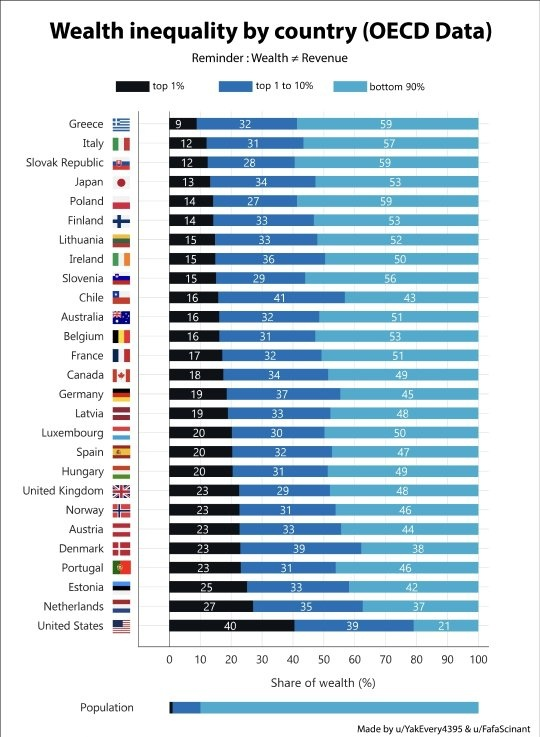
SCIENCE said:
dv said:
so voronic
We of the SE mainland must unite to fight back against this appropriation of the waters that are naturally ours.
The Rev Dodgson said:
SCIENCE said:dv said:
so voronic
We of the SE mainland must unite to fight back against this appropriation of the waters that are naturally ours.
That’s very Trumpy of you Rev.
Witty Rejoinder said:
The Rev Dodgson said:
SCIENCE said:so voronic
We of the SE mainland must unite to fight back against this appropriation of the waters that are naturally ours.
That’s very Trumpy of you Rev.
When I’m old enough I’m going to stand for President of Australia, then you’ll see.
The Rev Dodgson said:
Not fact checked:
Looks lilke we’d be better off in Chile.
roughbarked said:
The Rev Dodgson said:
Not fact checked:
Looks lilke we’d be better off in Chile.
I was quite surprised by the countries at the top.
Not so much by the one down the bottom.
The Rev Dodgson said:
Witty Rejoinder said:
The Rev Dodgson said:We of the SE mainland must unite to fight back against this appropriation of the waters that are naturally ours.
That’s very Trumpy of you Rev.
When I’m old enough I’m going to stand for President of Australia, then you’ll see.
Yeah, but will you ever be Pope?


(Lindsey Graham is a Republican serving as the senior United States senator from South Carolina, a seat he has held since 2003)

That’s not how that works
The Rev Dodgson said:
roughbarked said:
The Rev Dodgson said:
Not fact checked:
Looks lilke we’d be better off in Chile.
I was quite surprised by the countries at the top.
Not so much by the one down the bottom.
why is Australia above Belgium seriously
dv said:
That’s not how that works
bet they regret not using si soon enough
SCIENCE said:
dv said:
That’s not how that works
bet they regret not using si soon enough
Well it’s spring time in UK we are talking about, so I think they just left out a comma:
Temperatures are 7-13, above average for early May.
SCIENCE said:
The Rev Dodgson said:
roughbarked said:
Looks lilke we’d be better off in Chile.
I was quite surprised by the countries at the top.
Not so much by the one down the bottom.
why is Australia above Belgium seriously
Socialist government
dv said:
SCIENCE said:
The Rev Dodgson said:
I was quite surprised by the countries at the top.
Not so much by the one down the bottom.
why is Australia above Belgium seriously
Socialist government
OK fine but why is Italy above Slovak

dv said:
Which country?

dv said:
Pretty close to true.
Michael V said:
dv said:
Pretty close to true.
Now Do Androgynous Women Getting Good Athletics Rankings
Wait
ASIANS discover water-dropping condenser ¡ Oh wait that was 150 years ago already ¿

Harnessing electricity from falling water
Researchers find that an irregular flow of water through a narrow tube can generate a surprising amount of electricity
From Quora:
“And that big ol 800 lb gorilla people try to throw at it: battery fires. An annual insurance liability study has shown over multiple years that fully electric EVs are 60–100 times LESS likely to catch fire than an ICE vehicle – 25 per 100k vehicles versus 1,500 per 100k.”
Assuming that is number of fires / 100K vehicles / year, that’s 1.5% of ICE vehicles/year catch fire.
That can’t be right can it?
Anyone got some documented numbers?
The Rev Dodgson said:
From Quora:“And that big ol 800 lb gorilla people try to throw at it: battery fires. An annual insurance liability study has shown over multiple years that fully electric EVs are 60–100 times LESS likely to catch fire than an ICE vehicle – 25 per 100k vehicles versus 1,500 per 100k.”
Assuming that is number of fires / 100K vehicles / year, that’s 1.5% of ICE vehicles/year catch fire.
That can’t be right can it?
Anyone got some documented numbers?
The Rev Dodgson said:
From Quora:“And that big ol 800 lb gorilla people try to throw at it: battery fires. An annual insurance liability study has shown over multiple years that fully electric EVs are 60–100 times LESS likely to catch fire than an ICE vehicle – 25 per 100k vehicles versus 1,500 per 100k.”
Assuming that is number of fires / 100K vehicles / year, that’s 1.5% of ICE vehicles/year catch fire.
That can’t be right can it?
Anyone got some documented numbers?
I’m assuming that it is about insurance payouts. Often as not stolen cars burned.
Tamb said:
The Rev Dodgson said:
From Quora:“And that big ol 800 lb gorilla people try to throw at it: battery fires. An annual insurance liability study has shown over multiple years that fully electric EVs are 60–100 times LESS likely to catch fire than an ICE vehicle – 25 per 100k vehicles versus 1,500 per 100k.”
Assuming that is number of fires / 100K vehicles / year, that’s 1.5% of ICE vehicles/year catch fire.
That can’t be right can it?
Anyone got some documented numbers?
I would also like to see the % of those which were deliberately lit.
Nods.
The Rev Dodgson said:
From Quora:
“And that big ol 800 lb gorilla people try to throw at it: battery fires. An annual insurance liability study has shown over multiple years that fully electric EVs are 60–100 times LESS likely to catch fire than an ICE vehicle – 25 per 100k vehicles versus 1,500 per 100k.”
Assuming that is number of fires / 100K vehicles / year, that’s 1.5% of ICE vehicles/year catch fire.
That can’t be right can it?
Anyone got some documented numbers?
N: someone does
N-1: they literally say “over multiple years”
N-n: https://rib.msb.se/filer/pdf/29438.pdf https://www.swinburne.edu.au/news/2023/09/electric-vehicle-fires-are-very-rare-the-risk-for-petrol-and-diesel-vehicles-is-at-least-20-times-higher/
roughbarked said:
Tamb said:
The Rev Dodgson said:
From Quora:
“And that big ol 800 lb gorilla people try to throw at it: battery fires. An annual insurance liability study has shown over multiple years that fully electric EVs are 60–100 times LESS likely to catch fire than an ICE vehicle – 25 per 100k vehicles versus 1,500 per 100k.”
Assuming that is number of fires / 100K vehicles / year, that’s 1.5% of ICE vehicles/year catch fire.
That can’t be right can it?
Anyone got some documented numbers?
I would also like to see the % of those which were deliberately lit.
Nods.
classic fossil fuel enthusiast fud misdirection
SCIENCE said:
roughbarked said:
Tamb said:
I would also like to see the % of those which were deliberately lit.
Nods.
classic fossil fuel enthusiast fud misdirection
Tamb said:
SCIENCE said:
roughbarked said:
Nods.
classic fossil fuel enthusiast fud misdirection
Actually I’m a nuclear enthusiast.
that’s all right we’re still waiting on the data for nuclear automotive fires
SCIENCE said:
The Rev Dodgson said:
From Quora:
“And that big ol 800 lb gorilla people try to throw at it: battery fires. An annual insurance liability study has shown over multiple years that fully electric EVs are 60–100 times LESS likely to catch fire than an ICE vehicle – 25 per 100k vehicles versus 1,500 per 100k.”
Assuming that is number of fires / 100K vehicles / year, that’s 1.5% of ICE vehicles/year catch fire.
That can’t be right can it?
Anyone got some documented numbers?
N: someone does
N-1: they literally say “over multiple years”
N-n: https://rib.msb.se/filer/pdf/29438.pdf https://www.swinburne.edu.au/news/2023/09/electric-vehicle-fires-are-very-rare-the-risk-for-petrol-and-diesel-vehicles-is-at-least-20-times-higher/
Thanks for the link mr SCIENCE.
In summary, its figures show 20-80 times as many fires for ICE vehicles compared with EV, but they find max. 0.1%/year for ICE, which seems much more reasonable, although still pretty high.
Regarding the “multiple years”, I assumed they took numbers over years and averaged/year, but who knows.
The Rev Dodgson said:
SCIENCE said:
The Rev Dodgson said:
From Quora:
“And that big ol 800 lb gorilla people try to throw at it: battery fires. An annual insurance liability study has shown over multiple years that fully electric EVs are 60–100 times LESS likely to catch fire than an ICE vehicle – 25 per 100k vehicles versus 1,500 per 100k.”
Assuming that is number of fires / 100K vehicles / year, that’s 1.5% of ICE vehicles/year catch fire.
That can’t be right can it?
Anyone got some documented numbers?
N: someone does
N-1: they literally say “over multiple years”
N-n: https://rib.msb.se/filer/pdf/29438.pdf https://www.swinburne.edu.au/news/2023/09/electric-vehicle-fires-are-very-rare-the-risk-for-petrol-and-diesel-vehicles-is-at-least-20-times-higher/
Thanks for the link mr SCIENCE.
In summary, its figures show 20-80 times as many fires for ICE vehicles compared with EV, but they find max. 0.1%/year for ICE, which seems much more reasonable, although still pretty high.
Regarding the “multiple years”, I assumed they took numbers over years and averaged/year, but who knows.
OK found another claim which does reference same data though, annual figures.
In 2022, 24 electric or plug-in hybrid cars caught fire in Sweden, which accounts for approximately 0.004 percent of all electric and plug-in hybrid cars in Sweden. Of the entirely fossil fuel-driven cars, around 0.08 percent caught fire, writes TT. The number of fires in electric cars has remained around 20 per year for the last three years, even though the number of electric cars has almost doubled to nearly 611,000, MSB points out.
SCIENCE said:
The Rev Dodgson said:
SCIENCE said:
N: someone does
N-1: they literally say “over multiple years”
N-n: https://rib.msb.se/filer/pdf/29438.pdf https://www.swinburne.edu.au/news/2023/09/electric-vehicle-fires-are-very-rare-the-risk-for-petrol-and-diesel-vehicles-is-at-least-20-times-higher/
Thanks for the link mr SCIENCE.
In summary, its figures show 20-80 times as many fires for ICE vehicles compared with EV, but they find max. 0.1%/year for ICE, which seems much more reasonable, although still pretty high.
Regarding the “multiple years”, I assumed they took numbers over years and averaged/year, but who knows.
OK found another claim which does reference same data though, annual figures.
In 2022, 24 electric or plug-in hybrid cars caught fire in Sweden, which accounts for approximately 0.004 percent of all electric and plug-in hybrid cars in Sweden. Of the entirely fossil fuel-driven cars, around 0.08 percent caught fire, writes TT. The number of fires in electric cars has remained around 20 per year for the last three years, even though the number of electric cars has almost doubled to nearly 611,000, MSB points out.
In essence it is easier to light petrol fumes than Lithium?
roughbarked said:
SCIENCE said:The Rev Dodgson said:
Thanks for the link mr SCIENCE.
In summary, its figures show 20-80 times as many fires for ICE vehicles compared with EV, but they find max. 0.1%/year for ICE, which seems much more reasonable, although still pretty high.
Regarding the “multiple years”, I assumed they took numbers over years and averaged/year, but who knows.
OK found another claim which does reference same data though, annual figures.
In 2022, 24 electric or plug-in hybrid cars caught fire in Sweden, which accounts for approximately 0.004 percent of all electric and plug-in hybrid cars in Sweden. Of the entirely fossil fuel-driven cars, around 0.08 percent caught fire, writes TT. The number of fires in electric cars has remained around 20 per year for the last three years, even though the number of electric cars has almost doubled to nearly 611,000, MSB points out.
In essence it is easier to light petrol fumes than Lithium?
Yep, I’ve been to about 10 ICE fires and only one electric car fire.
Kingy said:
roughbarked said:
SCIENCE said:
OK found another claim which does reference same data though, annual figures.
In 2022, 24 electric or plug-in hybrid cars caught fire in Sweden, which accounts for approximately 0.004 percent of all electric and plug-in hybrid cars in Sweden. Of the entirely fossil fuel-driven cars, around 0.08 percent caught fire, writes TT. The number of fires in electric cars has remained around 20 per year for the last three years, even though the number of electric cars has almost doubled to nearly 611,000, MSB points out.
In essence it is easier to light petrol fumes than Lithium?
Yep, I’ve been to about 10 ICE fires and only one electric car fire.
Just scouring for more data but only encountering largely qualitative claims.
The National Fire Protection Association (NFPA) says that vehicle fires account for nearly one in every eight reported fires, so it’s worth knowing how to reduce some of the risk in your own. With that in mind, let’s take a look at ten common causes.
10
Design Flaws
Poor Maintenance
Car Crashes
Arson
Hybrid and Electric Vehicle Batteries
Overheating Catalytic Converters
Overheating Engines
Spilled Fluids
Electrical System Failures
Fuel System Leaks
1
Kingy said:
roughbarked said:
SCIENCE said:OK found another claim which does reference same data though, annual figures.
In 2022, 24 electric or plug-in hybrid cars caught fire in Sweden, which accounts for approximately 0.004 percent of all electric and plug-in hybrid cars in Sweden. Of the entirely fossil fuel-driven cars, around 0.08 percent caught fire, writes TT. The number of fires in electric cars has remained around 20 per year for the last three years, even though the number of electric cars has almost doubled to nearly 611,000, MSB points out.
In essence it is easier to light petrol fumes than Lithium?
Yep, I’ve been to about 10 ICE fires and only one electric car fire.
But the average % of electric vehicles over that period must be way under 10%.
The Rev Dodgson said:
Kingy said:
roughbarked said:
In essence it is easier to light petrol fumes than Lithium?
Yep, I’ve been to about 10 ICE fires and only one electric car fire.
But the average % of electric vehicles over that period must be way under 10%.
maybe ICE fires tend to involve multiple ICE vehicles
All ICE vehicles catch fire, it’s how they work.
The Rev Dodgson said:
Kingy said:
roughbarked said:In essence it is easier to light petrol fumes than Lithium?
Yep, I’ve been to about 10 ICE fires and only one electric car fire.
But the average % of electric vehicles over that period must be way under 10%.
Yes, but as a bushie, I don’t get called out to most of the car fires that FRS do. They’ve been to lots. There is a pile of car badges at the station, they keep them as souvenirs. Audi, Porsche, BMW, Toyota etc.
SCIENCE said:
The Rev Dodgson said:
Kingy said:
Yep, I’ve been to about 10 ICE fires and only one electric car fire.
But the average % of electric vehicles over that period must be way under 10%.
maybe ICE fires tend to involve multiple ICE vehicles
That can easily happen when parked close to each other.
Peak Warming Man said:
All ICE vehicles catch fire, it’s how they work.
But it is supposed to be on the inside.
Kingy said:
The Rev Dodgson said:
Kingy said:Yep, I’ve been to about 10 ICE fires and only one electric car fire.
But the average % of electric vehicles over that period must be way under 10%.
Yes, but as a bushie, I don’t get called out to most of the car fires that FRS do. They’ve been to lots. There is a pile of car badges at the station, they keep them as souvenirs. Audi, Porsche, BMW, Toyota etc.
:)
I endorse this notion.
:)
Next Some Genius Gonna Tell Us All Cars Work By E = mc^2
SCIENCE said:
Next Some Genius Gonna Tell Us All Cars Work By E = mc^2
Is this discussion talking about cars just sitting there and catching fire? Or is it cars in accidents catching fire or cars being torched?
(No, I haven’t read the links, I’ve been reading political stuff instead. Please indulge me)
buffy said:
Is this discussion talking about cars just sitting there and catching fire? Or is it cars in accidents catching fire or cars being torched?(No, I haven’t read the links, I’ve been reading political stuff instead. Please indulge me)
The numbers are based on statistics for total number of fires, so would include everything.
The Rev Dodgson said:
buffy said:
Is this discussion talking about cars just sitting there and catching fire? Or is it cars in accidents catching fire or cars being torched?(No, I haven’t read the links, I’ve been reading political stuff instead. Please indulge me)
The numbers are based on statistics for total number of fires, so would include everything.
Thank you. Do ordinary cars catch fire on their own like the electrics are reported to do while sitting in the garage?
buffy said:
Is this discussion talking about cars just sitting there and catching fire? Or is it cars in accidents catching fire or cars being torched?(No, I haven’t read the links, I’ve been reading political stuff instead. Please indulge me)
You raise some good points there.
Over,
buffy said:
The Rev Dodgson said:
buffy said:
Is this discussion talking about cars just sitting there and catching fire? Or is it cars in accidents catching fire or cars being torched?
(No, I haven’t read the links, I’ve been reading political stuff instead. Please indulge me)
The numbers are based on statistics for total number of fires, so would include everything.
Thank you. Do ordinary cars catch fire on their own like the electrics are reported to do while sitting in the garage?
yes electric cars are ordinary cars
SCIENCE said:
buffy said:
The Rev Dodgson said:
The numbers are based on statistics for total number of fires, so would include everything.
Thank you. Do ordinary cars catch fire on their own like the electrics are reported to do while sitting in the garage?
yes electric cars are ordinary cars
Not yet they aren’t.
buffy said:
The Rev Dodgson said:
buffy said:
Is this discussion talking about cars just sitting there and catching fire? Or is it cars in accidents catching fire or cars being torched?(No, I haven’t read the links, I’ve been reading political stuff instead. Please indulge me)
The numbers are based on statistics for total number of fires, so would include everything.
Thank you. Do ordinary cars catch fire on their own like the electrics are reported to do while sitting in the garage?
I have been in a mine-site office when the diesel Land Rover exploded right next to it and burnt out. It had been parked there under cover for maybe 20 minutes.
Michael V said:
buffy said:
The Rev Dodgson said:The numbers are based on statistics for total number of fires, so would include everything.
Thank you. Do ordinary cars catch fire on their own like the electrics are reported to do while sitting in the garage?
I have been in a mine-site office when the diesel Land Rover exploded right next to it and burnt out. It had been parked there under cover for maybe 20 minutes.
What caused that?
buffy said:
Michael V said:
buffy said:Thank you. Do ordinary cars catch fire on their own like the electrics are reported to do while sitting in the garage?
I have been in a mine-site office when the diesel Land Rover exploded right next to it and burnt out. It had been parked there under cover for maybe 20 minutes.
What caused that?
We think that it may have been a slowly leaking injector connection, dripping onto the exhaust manifold. But after an explosion and fire, it’s difficult to tell.
I had parked the vehicle in four wheel drive, in first gear, with the hand brake on. We couldn’t get a fire extinguisher to the seat of the fire, which was in the engine compartment, with the (very hot) bonnet locked down. It was extremely difficult to tow it back away from the buildings (because of my parking. By the time we got it away and safe, the vehicle was a complete mess.
A friend’s car flooded because rats had chewed through the air conditioner bits, which were made from soy. Apparently car manufacturers are increasingly using soy-based parts, and rodents love soy.
Didn’t cause a fire though. The car was too wet.
buffy said:
SCIENCE said:
buffy said:
Thank you. Do ordinary cars catch fire on their own like the electrics are reported to do while sitting in the garage?
yes electric cars are ordinary cars
Not yet they aren’t.
depends where yous are we suppose, they’re ordinary here but anyway we think you’re right, it’s a good thing that these cars are burning when they’re sitting around doing nothing unused unlike ICE vehicles going up in flames while people are using them
Divine Angel said:
A friend’s car flooded because rats had chewed through the air conditioner bits, which were made from soy. Apparently car manufacturers are increasingly using soy-based parts, and rodents love soy.Didn’t cause a fire though. The car was too wet.
Usually have to leave the vehicle sit for a good while for the rats to infest it. In plague proportions though, it seems nothing is sacred.
Fang was credited with the discovery of the method to turn mercury into silver. It was believed that she may have used the chemical technique of silver extraction from ores using mercury, where pure silver residue is left behind from the boiled mercury. Fang eventually went insane and committed suicide.
pretty sure there’s a lesson somewhere in there
SCIENCE said:
Fang was credited with the discovery of the method to turn mercury into silver. It was believed that she may have used the chemical technique of silver extraction from ores using mercury, where pure silver residue is left behind from the boiled mercury. Fang eventually went insane and committed suicide.
pretty sure there’s a lesson somewhere in there
Yair. Use a potato to surround the amalgam when driving off the Hg. The Hg vapour gets trapped by the potato and can be extracted and then re-used. The Ag (or Au) remains as a pellet in the middle of the potato.
SCIENCE said:
Fang was credited with the discovery of the method to turn mercury into silver. It was believed that she may have used the chemical technique of silver extraction from ores using mercury, where pure silver residue is left behind from the boiled mercury. Fang eventually went insane and committed suicide.
pretty sure there’s a lesson somewhere in there
Divine Angel said:
A friend’s car flooded because rats had chewed through the air conditioner bits, which were made from soy. Apparently car manufacturers are increasingly using soy-based parts, and rodents love soy.Didn’t cause a fire though. The car was too wet.
How did it become flooded?
Tamb said:
SCIENCE said:Fang was credited with the discovery of the method to turn mercury into silver. It was believed that she may have used the chemical technique of silver extraction from ores using mercury, where pure silver residue is left behind from the boiled mercury. Fang eventually went insane and committed suicide.
pretty sure there’s a lesson somewhere in there
Breathing mercury fumes will do that.
Mad as a hatter.
(Hatters used mercury in the process, Luton was a big hat making town and their football team is known as the Hatters)
Over.
Michael V said:
Divine Angel said:
A friend’s car flooded because rats had chewed through the air conditioner bits, which were made from soy. Apparently car manufacturers are increasingly using soy-based parts, and rodents love soy.Didn’t cause a fire though. The car was too wet.
How did it become flooded?
The air conditioning process removes a lot of moisture from the air that passes through the machinery. Normally that’s just dumped onto the ground via a small hose – you can often see a small pool of water under a car because of that – but if that hose is blocked or broken it’ll dump the water inside the car, under the dashboard.
SCIENCE said:
Fang was credited with the discovery of the method to turn mercury into silver. It was believed that she may have used the chemical technique of silver extraction from ores using mercury, where pure silver residue is left behind from the boiled mercury. Fang eventually went insane and committed suicide.
pretty sure there’s a lesson somewhere in there
I hadn’t heard of Fang.
(it’s very brief).
Michael V said:
She first noticed the floor under her feet when she was driving was smooshy, but thought one of the kids had spilled a drink and not told her. A few hours later, the floor of the whole car was wet. You could hear it squelching when pressed. After that, the electronics died. Could still drive, but unsafe, so off to the mechanic who diagnosed the issue, wrote a report for insurance, and the car manufacturer went, “oh yeah, we’ve been having some feedback about that…” I can’t remember what kind of car it is.
Divine Angel said:
A friend’s car flooded because rats had chewed through the air conditioner bits, which were made from soy. Apparently car manufacturers are increasingly using soy-based parts, and rodents love soy.Didn’t cause a fire though. The car was too wet.
How did it become flooded?
Spiny Norman said:
Michael V said:
Divine Angel said:
A friend’s car flooded because rats had chewed through the air conditioner bits, which were made from soy. Apparently car manufacturers are increasingly using soy-based parts, and rodents love soy.Didn’t cause a fire though. The car was too wet.
How did it become flooded?
The air conditioning process removes a lot of moisture from the air that passes through the machinery. Normally that’s just dumped onto the ground via a small hose – you can often see a small pool of water under a car because of that – but if that hose is blocked or broken it’ll dump the water inside the car, under the dashboard.
That’s sort of what I was thinking. But enough water t food the car?
Divine Angel said:
Michael V said:She first noticed the floor under her feet when she was driving was smooshy, but thought one of the kids had spilled a drink and not told her. A few hours later, the floor of the whole car was wet. You could hear it squelching when pressed. After that, the electronics died. Could still drive, but unsafe, so off to the mechanic who diagnosed the issue, wrote a report for insurance, and the car manufacturer went, “oh yeah, we’ve been having some feedback about that…” I can’t remember what kind of car it is.
Divine Angel said:
A friend’s car flooded because rats had chewed through the air conditioner bits, which were made from soy. Apparently car manufacturers are increasingly using soy-based parts, and rodents love soy.Didn’t cause a fire though. The car was too wet.
How did it become flooded?
Ta.
The Rev Dodgson said:
SCIENCE said:Fang was credited with the discovery of the method to turn mercury into silver. It was believed that she may have used the chemical technique of silver extraction from ores using mercury, where pure silver residue is left behind from the boiled mercury. Fang eventually went insane and committed suicide.
pretty sure there’s a lesson somewhere in there
I hadn’t heard of Fang.
(it’s very brief).

Michael V said:
Spiny Norman said:
Michael V said:How did it become flooded?
The air conditioning process removes a lot of moisture from the air that passes through the machinery. Normally that’s just dumped onto the ground via a small hose – you can often see a small pool of water under a car because of that – but if that hose is blocked or broken it’ll dump the water inside the car, under the dashboard.
That’s sort of what I was thinking. But enough water
t foodto flood the car?
“to flood”
Fixed.
———————————————————————————————
The Landcruiser’s air-con drip pipe occasionally blocked after driving in deep mud. It would then drip onto my foot. I’d get a stick and unblock it. Problem solvered.
buffy said:
Michael V said:
buffy said:Thank you. Do ordinary cars catch fire on their own like the electrics are reported to do while sitting in the garage?
I have been in a mine-site office when the diesel Land Rover exploded right next to it and burnt out. It had been parked there under cover for maybe 20 minutes.
What caused that?
a stick of power gel.
Bogsnorkler said:
buffy said:
Michael V said:I have been in a mine-site office when the diesel Land Rover exploded right next to it and burnt out. It had been parked there under cover for maybe 20 minutes.
What caused that?
a stick of power gel.
They stopped putting them in on the assembly line, after a few complaints.
Bogsnorkler said:
buffy said:
Michael V said:I have been in a mine-site office when the diesel Land Rover exploded right next to it and burnt out. It had been parked there under cover for maybe 20 minutes.
What caused that?
a stick of power gel.
No.
captain_spalding said:
The Rev Dodgson said:
SCIENCE said:Fang was credited with the discovery of the method to turn mercury into silver. It was believed that she may have used the chemical technique of silver extraction from ores using mercury, where pure silver residue is left behind from the boiled mercury. Fang eventually went insane and committed suicide.
pretty sure there’s a lesson somewhere in there
I hadn’t heard of Fang.
(it’s very brief).
Wasn’t Fang also a canine CONTROL agent?
SCIENCE said:
The Rev Dodgson said:
From Quora:
“And that big ol 800 lb gorilla people try to throw at it: battery fires. An annual insurance liability study has shown over multiple years that fully electric EVs are 60–100 times LESS likely to catch fire than an ICE vehicle – 25 per 100k vehicles versus 1,500 per 100k.”
Assuming that is number of fires / 100K vehicles / year, that’s 1.5% of ICE vehicles/year catch fire.
That can’t be right can it?
Anyone got some documented numbers?
N: someone does
N-1: they literally say “over multiple years”
N-n: https://rib.msb.se/filer/pdf/29438.pdf https://www.swinburne.edu.au/news/2023/09/electric-vehicle-fires-are-very-rare-the-risk-for-petrol-and-diesel-vehicles-is-at-least-20-times-higher/
Thanks.
The Podenco, Spanish hunting dogs.
Link
this Quora question and response.
The response seems quite reasonable to me, but it seems fundamentally different to the standard treatment of “wave function collapse”.
“Why, after 100 years, have we made so little progress understanding the precise conditions that lead to wave function collapse in quantum mechanics? Competing theories are usually resolved by experimentation in much shorter timescales.
We already know. The problem is that the answer we have known since the foundations of quantum theory is not mystical enough for people. It’s quite boring, and people—even many well-educated physicists—demand mysticism, so they insist the “boring” explanation cannot be right and that there is something mystical going on we don’t know about.
The boring answer is rather obvious.
Imagine there is a road that forks many times and each fork, a robot has a certain probability of taking one path and a certain probability of taking another, then as they travel down that path, it will fork again, and it will take one path or the other with certain probabilities associated with each.
Your job is—prior to the robot taking any path at all—predict the final probabilities of which road it will end up on at the very end of this. You will have to basically take into account all possible forks and all possible probabilities for every possible turn, ultimately evolving a statistical distribution through all the different possible outcomes, getting your final distribution.
However, what if the robot started to walk down the paths, and halfway through the experiment at its midpoint, you saw which path the robot is on? If this occurs, it immediately rules out all the paths it didn’t take, and you could reduce your probability distribution according to this new information, reducing all paths it didn’t take to 0%, the path it did take to 100%, and then compute a new statistical evolution of the system from that midpoint going forwards, giving you a much simpler probability distribution.
Is this sudden simplification of the probability distribution some mysterious physical process, some sort of “collapse” that needs a physical explanation? No, it’s just that you simplified the probability distribution because you gained new information about the system.
Ultimately, the “collapse” arise as a mathematical convenience, a little mathematical trick and doesn’t represent anything physically real. The two fundamental postulates of quantum theory are Schrodinger evolution and Born evolution. If only Schrodinger evolution is involved in a system’s evolution, you can model it using the the wave function.
Indeed, the simplest possible way to model a quantum system is using the wave function, meaning the moment you try to account for Born evolution, it gets a lot more mathematically complicated. However, the moment Born evolution gets involved, you have to compute the square magnitude of the wave function, which gives you a new vector that is no longer a mathematically valid wave function, and thus it’s impossible to model Born evolution with the wave function.
This has lead to the popularity of a little mathematical trick. You see, Schrodinger evolution is always associated with a situation where you cannot acquire physical information about a system, whereas Born evolution is always associated with a situation whereby you can acquire physical information about a system. If you can acquire physical information about a system, then you can set all your probabilities amplitudes to 1 for what you observed, and set them all to 0 for what you didn’t observe.
This is the same thing with the robot analogy, of seeing which path the robot takes and then reducing the probabilities accordingly. The reason this is often carried out in quantum mechanics is because if all elements of the wave function are 0 except for a single element which is 1, this is indeed a valid wave function. So, if we compute Schrodinger evolution up until Born evolution gets involved which would normally invalidate the wave function, we can use the fact that Born evolution is always associated with a situation where we can acquire information about the system to use that information to reduce the wave function to a different valid wave function, and then we can continue Schrodinger evolution from there.
It is, again, really just a mathematical trick. If we threw out the wave function and modeled the system with a density matrix instead, we could model the statistical evolution of the whole system linearly without ever “collapsing” anything, because the density matrix can model Born evolution as well as Schrodinger evolution. The thing is, however, the density matrix notation—which is much more fundamental—is less mathematically convenient than wave function notation, indeed it is far more mathematically complicated.
Hence, people try to avoid density matrix notation when they can, but this leads requires carrying out a little mathematical trick which they then delude themselves into that trick representing something physically real, as if the “collapse” is something physically real occurring in physical reality that requires an explanation.”
The Rev Dodgson said:
this Quora question and response.
The response seems quite reasonable to me, but it seems fundamentally different to the standard treatment of “wave function collapse”.
“Why, after 100 years, have we made so little progress understanding the precise conditions that lead to wave function collapse in quantum mechanics? Competing theories are usually resolved by experimentation in much shorter timescales.
We already know. The problem is that the answer we have known since the foundations of quantum theory is not mystical enough for people. It’s quite boring, and people—even many well-educated physicists—demand mysticism, so they insist the “boring” explanation cannot be right and that there is something mystical going on we don’t know about.The boring answer is rather obvious.
Imagine there is a road that forks many times and each fork, a robot has a certain probability of taking one path and a certain probability of taking another, then as they travel down that path, it will fork again, and it will take one path or the other with certain probabilities associated with each.
Your job is—prior to the robot taking any path at all—predict the final probabilities of which road it will end up on at the very end of this. You will have to basically take into account all possible forks and all possible probabilities for every possible turn, ultimately evolving a statistical distribution through all the different possible outcomes, getting your final distribution.
However, what if the robot started to walk down the paths, and halfway through the experiment at its midpoint, you saw which path the robot is on? If this occurs, it immediately rules out all the paths it didn’t take, and you could reduce your probability distribution according to this new information, reducing all paths it didn’t take to 0%, the path it did take to 100%, and then compute a new statistical evolution of the system from that midpoint going forwards, giving you a much simpler probability distribution.
Is this sudden simplification of the probability distribution some mysterious physical process, some sort of “collapse” that needs a physical explanation? No, it’s just that you simplified the probability distribution because you gained new information about the system.
Ultimately, the “collapse” arise as a mathematical convenience, a little mathematical trick and doesn’t represent anything physically real. The two fundamental postulates of quantum theory are Schrodinger evolution and Born evolution. If only Schrodinger evolution is involved in a system’s evolution, you can model it using the the wave function.
Indeed, the simplest possible way to model a quantum system is using the wave function, meaning the moment you try to account for Born evolution, it gets a lot more mathematically complicated. However, the moment Born evolution gets involved, you have to compute the square magnitude of the wave function, which gives you a new vector that is no longer a mathematically valid wave function, and thus it’s impossible to model Born evolution with the wave function.
This has lead to the popularity of a little mathematical trick. You see, Schrodinger evolution is always associated with a situation where you cannot acquire physical information about a system, whereas Born evolution is always associated with a situation whereby you can acquire physical information about a system. If you can acquire physical information about a system, then you can set all your probabilities amplitudes to 1 for what you observed, and set them all to 0 for what you didn’t observe.
This is the same thing with the robot analogy, of seeing which path the robot takes and then reducing the probabilities accordingly. The reason this is often carried out in quantum mechanics is because if all elements of the wave function are 0 except for a single element which is 1, this is indeed a valid wave function. So, if we compute Schrodinger evolution up until Born evolution gets involved which would normally invalidate the wave function, we can use the fact that Born evolution is always associated with a situation where we can acquire information about the system to use that information to reduce the wave function to a different valid wave function, and then we can continue Schrodinger evolution from there.
It is, again, really just a mathematical trick. If we threw out the wave function and modeled the system with a density matrix instead, we could model the statistical evolution of the whole system linearly without ever “collapsing” anything, because the density matrix can model Born evolution as well as Schrodinger evolution. The thing is, however, the density matrix notation—which is much more fundamental—is less mathematically convenient than wave function notation, indeed it is far more mathematically complicated.
Hence, people try to avoid density matrix notation when they can, but this leads requires carrying out a little mathematical trick which they then delude themselves into that trick representing something physically real, as if the “collapse” is something physically real occurring in physical reality that requires an explanation.”
so they spent 800 words explaining something that should take 80 words
SCIENCE said:
The Rev Dodgson said:
this Quora question and response.
The response seems quite reasonable to me, but it seems fundamentally different to the standard treatment of “wave function collapse”.
“Why, after 100 years, have we made so little progress understanding the precise conditions that lead to wave function collapse in quantum mechanics? Competing theories are usually resolved by experimentation in much shorter timescales.
We already know. The problem is that the answer we have known since the foundations of quantum theory is not mystical enough for people. It’s quite boring, and people—even many well-educated physicists—demand mysticism, so they insist the “boring” explanation cannot be right and that there is something mystical going on we don’t know about.The boring answer is rather obvious.
Imagine there is a road that forks many times and each fork, a robot has a certain probability of taking one path and a certain probability of taking another, then as they travel down that path, it will fork again, and it will take one path or the other with certain probabilities associated with each.
Your job is—prior to the robot taking any path at all—predict the final probabilities of which road it will end up on at the very end of this. You will have to basically take into account all possible forks and all possible probabilities for every possible turn, ultimately evolving a statistical distribution through all the different possible outcomes, getting your final distribution.
However, what if the robot started to walk down the paths, and halfway through the experiment at its midpoint, you saw which path the robot is on? If this occurs, it immediately rules out all the paths it didn’t take, and you could reduce your probability distribution according to this new information, reducing all paths it didn’t take to 0%, the path it did take to 100%, and then compute a new statistical evolution of the system from that midpoint going forwards, giving you a much simpler probability distribution.
Is this sudden simplification of the probability distribution some mysterious physical process, some sort of “collapse” that needs a physical explanation? No, it’s just that you simplified the probability distribution because you gained new information about the system.
Ultimately, the “collapse” arise as a mathematical convenience, a little mathematical trick and doesn’t represent anything physically real. The two fundamental postulates of quantum theory are Schrodinger evolution and Born evolution. If only Schrodinger evolution is involved in a system’s evolution, you can model it using the the wave function.
Indeed, the simplest possible way to model a quantum system is using the wave function, meaning the moment you try to account for Born evolution, it gets a lot more mathematically complicated. However, the moment Born evolution gets involved, you have to compute the square magnitude of the wave function, which gives you a new vector that is no longer a mathematically valid wave function, and thus it’s impossible to model Born evolution with the wave function.
This has lead to the popularity of a little mathematical trick. You see, Schrodinger evolution is always associated with a situation where you cannot acquire physical information about a system, whereas Born evolution is always associated with a situation whereby you can acquire physical information about a system. If you can acquire physical information about a system, then you can set all your probabilities amplitudes to 1 for what you observed, and set them all to 0 for what you didn’t observe.
This is the same thing with the robot analogy, of seeing which path the robot takes and then reducing the probabilities accordingly. The reason this is often carried out in quantum mechanics is because if all elements of the wave function are 0 except for a single element which is 1, this is indeed a valid wave function. So, if we compute Schrodinger evolution up until Born evolution gets involved which would normally invalidate the wave function, we can use the fact that Born evolution is always associated with a situation where we can acquire information about the system to use that information to reduce the wave function to a different valid wave function, and then we can continue Schrodinger evolution from there.
It is, again, really just a mathematical trick. If we threw out the wave function and modeled the system with a density matrix instead, we could model the statistical evolution of the whole system linearly without ever “collapsing” anything, because the density matrix can model Born evolution as well as Schrodinger evolution. The thing is, however, the density matrix notation—which is much more fundamental—is less mathematically convenient than wave function notation, indeed it is far more mathematically complicated.
Hence, people try to avoid density matrix notation when they can, but this leads requires carrying out a little mathematical trick which they then delude themselves into that trick representing something physically real, as if the “collapse” is something physically real occurring in physical reality that requires an explanation.”
so they spent 800 words explaining something that should take 80 words
But is it accurate?
The Rev Dodgson said:
SCIENCE said:
The Rev Dodgson said:
this Quora question and response.
The response seems quite reasonable to me, but it seems fundamentally different to the standard treatment of “wave function collapse”.
“Why, after 100 years, have we made so little progress understanding the precise conditions that lead to wave function collapse in quantum mechanics? Competing theories are usually resolved by experimentation in much shorter timescales.
We already know. The problem is that the answer we have known since the foundations of quantum theory is not mystical enough for people. It’s quite boring, and people—even many well-educated physicists—demand mysticism, so they insist the “boring” explanation cannot be right and that there is something mystical going on we don’t know about.The boring answer is rather obvious.
Imagine there is a road that forks many times and each fork, a robot has a certain probability of taking one path and a certain probability of taking another, then as they travel down that path, it will fork again, and it will take one path or the other with certain probabilities associated with each.
Your job is—prior to the robot taking any path at all—predict the final probabilities of which road it will end up on at the very end of this. You will have to basically take into account all possible forks and all possible probabilities for every possible turn, ultimately evolving a statistical distribution through all the different possible outcomes, getting your final distribution.
However, what if the robot started to walk down the paths, and halfway through the experiment at its midpoint, you saw which path the robot is on? If this occurs, it immediately rules out all the paths it didn’t take, and you could reduce your probability distribution according to this new information, reducing all paths it didn’t take to 0%, the path it did take to 100%, and then compute a new statistical evolution of the system from that midpoint going forwards, giving you a much simpler probability distribution.
Is this sudden simplification of the probability distribution some mysterious physical process, some sort of “collapse” that needs a physical explanation? No, it’s just that you simplified the probability distribution because you gained new information about the system.
Ultimately, the “collapse” arise as a mathematical convenience, a little mathematical trick and doesn’t represent anything physically real. The two fundamental postulates of quantum theory are Schrodinger evolution and Born evolution. If only Schrodinger evolution is involved in a system’s evolution, you can model it using the the wave function.
Indeed, the simplest possible way to model a quantum system is using the wave function, meaning the moment you try to account for Born evolution, it gets a lot more mathematically complicated. However, the moment Born evolution gets involved, you have to compute the square magnitude of the wave function, which gives you a new vector that is no longer a mathematically valid wave function, and thus it’s impossible to model Born evolution with the wave function.
This has lead to the popularity of a little mathematical trick. You see, Schrodinger evolution is always associated with a situation where you cannot acquire physical information about a system, whereas Born evolution is always associated with a situation whereby you can acquire physical information about a system. If you can acquire physical information about a system, then you can set all your probabilities amplitudes to 1 for what you observed, and set them all to 0 for what you didn’t observe.
This is the same thing with the robot analogy, of seeing which path the robot takes and then reducing the probabilities accordingly. The reason this is often carried out in quantum mechanics is because if all elements of the wave function are 0 except for a single element which is 1, this is indeed a valid wave function. So, if we compute Schrodinger evolution up until Born evolution gets involved which would normally invalidate the wave function, we can use the fact that Born evolution is always associated with a situation where we can acquire information about the system to use that information to reduce the wave function to a different valid wave function, and then we can continue Schrodinger evolution from there.
It is, again, really just a mathematical trick. If we threw out the wave function and modeled the system with a density matrix instead, we could model the statistical evolution of the whole system linearly without ever “collapsing” anything, because the density matrix can model Born evolution as well as Schrodinger evolution. The thing is, however, the density matrix notation—which is much more fundamental—is less mathematically convenient than wave function notation, indeed it is far more mathematically complicated.
Hence, people try to avoid density matrix notation when they can, but this leads requires carrying out a little mathematical trick which they then delude themselves into that trick representing something physically real, as if the “collapse” is something physically real occurring in physical reality that requires an explanation.”
so they spent 800 words explaining something that should take 80 words
But is it accurate?
what, that requiring wavefuncs to “collapse” is just a simplifying convenience so there is nothing more to explain
sure
SCIENCE said:
The Rev Dodgson said:
SCIENCE said:
so they spent 800 words explaining something that should take 80 words
But is it accurate?
what, that requiring wavefuncs to “collapse” is just a simplifying convenience so there is nothing more to explain
sure
My interpretation of what they said is that there is no collapse because there is no wavefunction. Every particle has a well defined path and position all the time. We just don’t know what it is until we observe it.
Is this consistent with all available evidence? Double slit experiments for instance?
The Rev Dodgson said:
SCIENCE said:
The Rev Dodgson said:
But is it accurate?
what, that requiring wavefuncs to “collapse” is just a simplifying convenience so there is nothing more to explain
sure
My interpretation of what they said is that there is no collapse because there is no wavefunction. Every particle has a well defined path and position all the time. We just don’t know what it is until we observe it.
Is this consistent with all available evidence? Double slit experiments for instance?
oh well we thought they said they were finding ways to make valid wavefuncs so perhaps our interpretations differ after all
SCIENCE said:
The Rev Dodgson said:
SCIENCE said:
what, that requiring wavefuncs to “collapse” is just a simplifying convenience so there is nothing more to explain
sure
My interpretation of what they said is that there is no collapse because there is no wavefunction. Every particle has a well defined path and position all the time. We just don’t know what it is until we observe it.
Is this consistent with all available evidence? Double slit experiments for instance?
oh well we thought they said they were finding ways to make valid wavefuncs so perhaps our interpretations differ after all
I’ll re-read it.
Incidentally, latest N-S has something about how the double-slit thing could work with particles, but I haven’t read it yet.
this Quora post on Jordan Peterson:
“
Jordan Peterson suffers from two problems: Nobelitis and a desperate need for approval.
“Nobelitis” is a term for a condition where people who become famous or highly regarded in one particular discipline start beliving that they are super-duper smart geniuses and therefore every stray thought that passes idly through their heads must be super-duper genius Revealed Truth™.
It originally applied to Nobel Prize winners, like Linus Pauling, who won the Nobel Prize in Chemistry and then went completely bonkers and started spouting all kinds of inane pseudoscience bullshit about how massive doses of Vitamin C could cure everything from cancer to schizophrenia, or William Shockley, who won the Nobel Prize in physics and then spent the last years of his life on a weird-ass quest to “scientifically prove” that Black people are genetically inferior to whites.
It can be applied to anyone who has received accolades in a specific scientific field, not just a Nobel Prize, but then became convinced of their own infallible genius smartness of geniusness and started blathering all manner of tripe from their face-holes.
Jordan Peterson was at one time a highly regarded clinical psychologist who taught at Harvard. In 2018 or thereabouts, he quit being a psychologist and started promoting all kinds of woo nonsense: he became a climate change denier, started claiming that certain races are inherently superior to others (I don’t know why this is such a fixture of Nobelitis, but like quack-medicine woo, eugenicist woo is very common amongst those who believe their super geniusness makes everything that wanders through their heads some kind of oracular truth), alpha-male nonsense, and of course his bizarre pseudoscientific COVID nonsense that damn near got him killed.
Eugenics and medical woo, man. It’s always eugenics and medical woo.
It doesn’t help that he also became a drug addict around 2019 or so, and ended up with a permanent medical disability called akathisia as a result of his drug addiction.
That’s the first bit.
The second bit is his compulsive need to be revered that his fellow instructors at Harvard described as “cult-like” and “cult leader.”
It’s gotten him into a fair bit of trouble over the years. He’s been sanctioned multiple times over inappropriate boundaries with his own patients, over revealing confidential medical details of some patients he took a dislike to (and in one case openly mocking a former patient on a podcast), and of needing attention and validation.
When he discovered he could get that attention and validation from young white alt-right men with daddy issues, he leaned into alt-right politics, especially when he started telling disaffected white men that they are the true victims of oppression, that inequality and eternal class struggle is normal and natural, and that structural oppression doesn’t exist—it’s simply the natural consequence of the “fact” that whites are superior to everyone else.
So yeah. Nobelitis, drug addiction, cult-like need for validation…there you go.”
The Rev Dodgson said:
this Quora post on Jordan Peterson:“
Jordan Peterson suffers from two problems: Nobelitis and a desperate need for approval.“Nobelitis” is a term for a condition where people who become famous or highly regarded in one particular discipline start beliving that they are super-duper smart geniuses and therefore every stray thought that passes idly through their heads must be super-duper genius Revealed Truth™.
It originally applied to Nobel Prize winners, like Linus Pauling, who won the Nobel Prize in Chemistry and then went completely bonkers and started spouting all kinds of inane pseudoscience bullshit about how massive doses of Vitamin C could cure everything from cancer to schizophrenia, or William Shockley, who won the Nobel Prize in physics and then spent the last years of his life on a weird-ass quest to “scientifically prove” that Black people are genetically inferior to whites.
It can be applied to anyone who has received accolades in a specific scientific field, not just a Nobel Prize, but then became convinced of their own infallible genius smartness of geniusness and started blathering all manner of tripe from their face-holes.
Jordan Peterson was at one time a highly regarded clinical psychologist who taught at Harvard. In 2018 or thereabouts, he quit being a psychologist and started promoting all kinds of woo nonsense: he became a climate change denier, started claiming that certain races are inherently superior to others (I don’t know why this is such a fixture of Nobelitis, but like quack-medicine woo, eugenicist woo is very common amongst those who believe their super geniusness makes everything that wanders through their heads some kind of oracular truth), alpha-male nonsense, and of course his bizarre pseudoscientific COVID nonsense that damn near got him killed.
Eugenics and medical woo, man. It’s always eugenics and medical woo.
It doesn’t help that he also became a drug addict around 2019 or so, and ended up with a permanent medical disability called akathisia as a result of his drug addiction.
That’s the first bit.
The second bit is his compulsive need to be revered that his fellow instructors at Harvard described as “cult-like” and “cult leader.”
It’s gotten him into a fair bit of trouble over the years. He’s been sanctioned multiple times over inappropriate boundaries with his own patients, over revealing confidential medical details of some patients he took a dislike to (and in one case openly mocking a former patient on a podcast), and of needing attention and validation.
When he discovered he could get that attention and validation from young white alt-right men with daddy issues, he leaned into alt-right politics, especially when he started telling disaffected white men that they are the true victims of oppression, that inequality and eternal class struggle is normal and natural, and that structural oppression doesn’t exist—it’s simply the natural consequence of the “fact” that whites are superior to everyone else.
So yeah. Nobelitis, drug addiction, cult-like need for validation…there you go.”
Only heard of him once before. Why should I care if he is a dick suffering from whatever?
Looks like he influences some people. It seems there may be a whole lot worse than him out there.
Michael V said:
The Rev Dodgson said:
this Quora post on Jordan Peterson:“
Jordan Peterson suffers from two problems: Nobelitis and a desperate need for approval.“Nobelitis” is a term for a condition where people who become famous or highly regarded in one particular discipline start beliving that they are super-duper smart geniuses and therefore every stray thought that passes idly through their heads must be super-duper genius Revealed Truth™.
It originally applied to Nobel Prize winners, like Linus Pauling, who won the Nobel Prize in Chemistry and then went completely bonkers and started spouting all kinds of inane pseudoscience bullshit about how massive doses of Vitamin C could cure everything from cancer to schizophrenia, or William Shockley, who won the Nobel Prize in physics and then spent the last years of his life on a weird-ass quest to “scientifically prove” that Black people are genetically inferior to whites.
It can be applied to anyone who has received accolades in a specific scientific field, not just a Nobel Prize, but then became convinced of their own infallible genius smartness of geniusness and started blathering all manner of tripe from their face-holes.
Jordan Peterson was at one time a highly regarded clinical psychologist who taught at Harvard. In 2018 or thereabouts, he quit being a psychologist and started promoting all kinds of woo nonsense: he became a climate change denier, started claiming that certain races are inherently superior to others (I don’t know why this is such a fixture of Nobelitis, but like quack-medicine woo, eugenicist woo is very common amongst those who believe their super geniusness makes everything that wanders through their heads some kind of oracular truth), alpha-male nonsense, and of course his bizarre pseudoscientific COVID nonsense that damn near got him killed.
Eugenics and medical woo, man. It’s always eugenics and medical woo.
It doesn’t help that he also became a drug addict around 2019 or so, and ended up with a permanent medical disability called akathisia as a result of his drug addiction.
That’s the first bit.
The second bit is his compulsive need to be revered that his fellow instructors at Harvard described as “cult-like” and “cult leader.”
It’s gotten him into a fair bit of trouble over the years. He’s been sanctioned multiple times over inappropriate boundaries with his own patients, over revealing confidential medical details of some patients he took a dislike to (and in one case openly mocking a former patient on a podcast), and of needing attention and validation.
When he discovered he could get that attention and validation from young white alt-right men with daddy issues, he leaned into alt-right politics, especially when he started telling disaffected white men that they are the true victims of oppression, that inequality and eternal class struggle is normal and natural, and that structural oppression doesn’t exist—it’s simply the natural consequence of the “fact” that whites are superior to everyone else.
So yeah. Nobelitis, drug addiction, cult-like need for validation…there you go.”
Only heard of him once before. Why should I care if he is a dick suffering from whatever?
Looks like he influences some people. It seems there may be a whole lot worse than him out there.
He is one of these Christian nationalists that is always banging on about Judeo-Christian values being at the core of western civilisation. And then, generally not following those values anyway.
party_pants said:
Michael V said:
The Rev Dodgson said:
this Quora post on Jordan Peterson:“
Jordan Peterson suffers from two problems: Nobelitis and a desperate need for approval.“Nobelitis” is a term for a condition where people who become famous or highly regarded in one particular discipline start beliving that they are super-duper smart geniuses and therefore every stray thought that passes idly through their heads must be super-duper genius Revealed Truth™.
It originally applied to Nobel Prize winners, like Linus Pauling, who won the Nobel Prize in Chemistry and then went completely bonkers and started spouting all kinds of inane pseudoscience bullshit about how massive doses of Vitamin C could cure everything from cancer to schizophrenia, or William Shockley, who won the Nobel Prize in physics and then spent the last years of his life on a weird-ass quest to “scientifically prove” that Black people are genetically inferior to whites.
It can be applied to anyone who has received accolades in a specific scientific field, not just a Nobel Prize, but then became convinced of their own infallible genius smartness of geniusness and started blathering all manner of tripe from their face-holes.
Jordan Peterson was at one time a highly regarded clinical psychologist who taught at Harvard. In 2018 or thereabouts, he quit being a psychologist and started promoting all kinds of woo nonsense: he became a climate change denier, started claiming that certain races are inherently superior to others (I don’t know why this is such a fixture of Nobelitis, but like quack-medicine woo, eugenicist woo is very common amongst those who believe their super geniusness makes everything that wanders through their heads some kind of oracular truth), alpha-male nonsense, and of course his bizarre pseudoscientific COVID nonsense that damn near got him killed.
Eugenics and medical woo, man. It’s always eugenics and medical woo.
It doesn’t help that he also became a drug addict around 2019 or so, and ended up with a permanent medical disability called akathisia as a result of his drug addiction.
That’s the first bit.
The second bit is his compulsive need to be revered that his fellow instructors at Harvard described as “cult-like” and “cult leader.”
It’s gotten him into a fair bit of trouble over the years. He’s been sanctioned multiple times over inappropriate boundaries with his own patients, over revealing confidential medical details of some patients he took a dislike to (and in one case openly mocking a former patient on a podcast), and of needing attention and validation.
When he discovered he could get that attention and validation from young white alt-right men with daddy issues, he leaned into alt-right politics, especially when he started telling disaffected white men that they are the true victims of oppression, that inequality and eternal class struggle is normal and natural, and that structural oppression doesn’t exist—it’s simply the natural consequence of the “fact” that whites are superior to everyone else.
So yeah. Nobelitis, drug addiction, cult-like need for validation…there you go.”
Only heard of him once before. Why should I care if he is a dick suffering from whatever?
Looks like he influences some people. It seems there may be a whole lot worse than him out there.
He is one of these Christian nationalists that is always banging on about Judeo-Christian values being at the core of western civilisation. And then, generally not following those values anyway.
Ta. Any reason I should know or care about him?
Michael V said:
party_pants said:
Michael V said:Only heard of him once before. Why should I care if he is a dick suffering from whatever?
Looks like he influences some people. It seems there may be a whole lot worse than him out there.
He is one of these Christian nationalists that is always banging on about Judeo-Christian values being at the core of western civilisation. And then, generally not following those values anyway.
Ta. Any reason I should know or care about him?
His books and talks are taken as inspiration by fundie Christians, some of whom live in Australia and get a vote here. He is one of their “prophets” from whom the get their ideas. probably of greater influence in the US, but he does have his follwers here, and sells out speaking tours down here.
party_pants said:
Michael V said:
party_pants said:He is one of these Christian nationalists that is always banging on about Judeo-Christian values being at the core of western civilisation. And then, generally not following those values anyway.
Ta. Any reason I should know or care about him?
His books and talks are taken as inspiration by fundie Christians, some of whom live in Australia and get a vote here. He is one of their “prophets” from whom the get their ideas. probably of greater influence in the US, but he does have his follwers here, and sells out speaking tours down here.
Ah. Inspires ultra-right-wing Christian-fundamentalist nut-jobs. I’ll keep that in mind. But I won’t worry myself over it.
In Europe, double-glazed windows are standard. But in Australia, these energy-saving windows are remarkably uncommon. Correctly installed, the effect of double-glazing is remarkable. Instead of a house losing or gaining huge amounts of heat through its windows, double-glazed windows help keep the indoor temperature at a consistent temperature – reducing the need to crank up the air-con or heater. In hot parts of Australia, these windows would keep out heat. In cold, they would keep heat in. They also slash outside noise. Houses with double-glazing can add resale value and even improve occupant health. Why are they not standard? There are several reasons. But our research in Victoria found the main one is cost – double-glazing costs much more than a standard single-glazed window.
From Quora:
“A point, in a modern axiomatic definition of Euclidean Geometry, is a primitive notion: it has no definition and any model which satisfies the axioms qualifies.
One interesting consequence of this approach is the duality in Projective Geometry where there is a perfect symmetry between the rôles played by points and lines. They are duals or, in some sense, equivalent!”
I don’t even know what that means.
I tried looking up Duality-Projective Geometry on TATE.
It didn’t help :)
Just downloaded this:
https://arxiv.org/pdf/1810.06981
“How to (Un-) Quantum Mechanics C. Baumgarten 5244 Birrhard, Switzerland∗
When compared to quantum mechanics, classical mechanics is often depicted in a specific meta
physical flavour: spatio-temporal realism or a Newtonian “background” is presented as an intrinsic
fundamental classical presumption. However, the Hamiltonian formulation of classical analytical
mechanics is based on abstract generalized coordinates and momenta: It is a mathematical rather
than a philosophical framework.
If the metaphysical assumptions ascribed to classical mechanics are dropped, then there exists a presentation in which little of the purported difference between quantum and classical mechanics remains. This presentation allows to derive the mathematics of relativistic quantum mechanics on the basis of a purely classical Hamiltonian phase space picture. It is shown that a spatio-temporal description is not a condition for but a consequence of objectivity. It requires no postulates.
This is achieved by evading spatial notions and assuming nothing but time translation invariance.”I’ll report back later.
I may be some time.
The Rev Dodgson said:
Just downloaded this:
https://arxiv.org/pdf/1810.06981
“How to (Un-) Quantum Mechanics C. Baumgarten 5244 Birrhard, Switzerland∗
When compared to quantum mechanics, classical mechanics is often depicted in a specific meta
physical flavour: spatio-temporal realism or a Newtonian “background” is presented as an intrinsic fundamental classical presumption. However, the Hamiltonian formulation of classical analytical mechanics is based on abstract generalized coordinates and momenta: It is a mathematical rather than a philosophical framework.If the metaphysical assumptions ascribed to classical mechanics are dropped, then there exists a presentation in which little of the purported difference between quantum and classical mechanics remains. This presentation allows to derive the mathematics of relativistic quantum mechanics on the basis of a purely classical Hamiltonian phase space picture. It is shown that a spatio-temporal description is not a condition for but a consequence of objectivity. It requires no postulates.
This is achieved by evading spatial notions and assuming nothing but time translation invariance.”I’ll report back later.
I may be some time.
so they’re just trying to cancel culture Emmy it’s always the same stuff
SCIENCE said:
The Rev Dodgson said:
Just downloaded this:
https://arxiv.org/pdf/1810.06981
“How to (Un-) Quantum Mechanics C. Baumgarten 5244 Birrhard, Switzerland∗
When compared to quantum mechanics, classical mechanics is often depicted in a specific meta
physical flavour: spatio-temporal realism or a Newtonian “background” is presented as an intrinsic fundamental classical presumption. However, the Hamiltonian formulation of classical analytical mechanics is based on abstract generalized coordinates and momenta: It is a mathematical rather than a philosophical framework.If the metaphysical assumptions ascribed to classical mechanics are dropped, then there exists a presentation in which little of the purported difference between quantum and classical mechanics remains. This presentation allows to derive the mathematics of relativistic quantum mechanics on the basis of a purely classical Hamiltonian phase space picture. It is shown that a spatio-temporal description is not a condition for but a consequence of objectivity. It requires no postulates.
This is achieved by evading spatial notions and assuming nothing but time translation invariance.”I’ll report back later.
I may be some time.
so they’re just trying to cancel culture Emmy it’s always the same stuff
I haven’t started it yet, but from the context where it was mentioned, I think he is trying to come to the same conclusions as Emmy’s stuff with minimum assumptions.
The Rev Dodgson said:
SCIENCE said:The Rev Dodgson said:
Just downloaded this:
https://arxiv.org/pdf/1810.06981
“How to (Un-) Quantum Mechanics C. Baumgarten 5244 Birrhard, Switzerland∗
When compared to quantum mechanics, classical mechanics is often depicted in a specific meta
physical flavour: spatio-temporal realism or a Newtonian “background” is presented as an intrinsic fundamental classical presumption. However, the Hamiltonian formulation of classical analytical mechanics is based on abstract generalized coordinates and momenta: It is a mathematical rather than a philosophical framework.If the metaphysical assumptions ascribed to classical mechanics are dropped, then there exists a presentation in which little of the purported difference between quantum and classical mechanics remains. This presentation allows to derive the mathematics of relativistic quantum mechanics on the basis of a purely classical Hamiltonian phase space picture. It is shown that a spatio-temporal description is not a condition for but a consequence of objectivity. It requires no postulates.
This is achieved by evading spatial notions and assuming nothing but time translation invariance.”I’ll report back later.
I may be some time.
so they’re just trying to cancel culture Emmy it’s always the same stuff
I haven’t started it yet, but from the context where it was mentioned, I think he is trying to come to the same conclusions as Emmy’s stuff with minimum assumptions.
Minimising assumptions always has to be better wouldn’t you think?
The Rev Dodgson said:
SCIENCE said:
The Rev Dodgson said:
Just downloaded this:
https://arxiv.org/pdf/1810.06981
“How to (Un-) Quantum Mechanics C. Baumgarten 5244 Birrhard, Switzerland∗
When compared to quantum mechanics, classical mechanics is often depicted in a specific meta
physical flavour: spatio-temporal realism or a Newtonian “background” is presented as an intrinsic fundamental classical presumption. However, the Hamiltonian formulation of classical analytical mechanics is based on abstract generalized coordinates and momenta: It is a mathematical rather than a philosophical framework.If the metaphysical assumptions ascribed to classical mechanics are dropped, then there exists a presentation in which little of the purported difference between quantum and classical mechanics remains. This presentation allows to derive the mathematics of relativistic quantum mechanics on the basis of a purely classical Hamiltonian phase space picture. It is shown that a spatio-temporal description is not a condition for but a consequence of objectivity. It requires no postulates.
This is achieved by evading spatial notions and assuming nothing but time translation invariance.”I’ll report back later.
I may be some time.
so they’re just trying to cancel culture Emmy it’s always the same stuff
I haven’t started it yet, but from the context where it was mentioned, I think he is trying to come to the same conclusions as Emmy’s stuff with minimum assumptions.
maybe, sadly we’ll have to pass on sharing the study due to competing interests, we’ren’t any barrister and won’t be pretending to be anywhere near Emmy in expertise so apologies in time invariance
SCIENCE said:
The Rev Dodgson said:
SCIENCE said:
so they’re just trying to cancel culture Emmy it’s always the same stuff
I haven’t started it yet, but from the context where it was mentioned, I think he is trying to come to the same conclusions as Emmy’s stuff with minimum assumptions.
maybe, sadly we’ll have to pass on sharing the study due to competing interests, we’ren’t any barrister and won’t be pretending to be anywhere near Emmy in expertise so apologies in time invariance
A bit long winded.
The span closer to the shoreline, sparked comparisons with this nursery rhyme and collapsed unexpectedly on 15 January 1990, leaving two tourists (Kelli Harrison and David Darrington) stranded on the outer span before being rescued by police helicopter. No one was injured in the event.
SCIENCE said:
The span closer to the shoreline, sparked comparisons with this nursery rhyme and collapsed unexpectedly on 15 January 1990, leaving two tourists (Kelli Harrison and David Darrington) stranded on the outer span before being rescued by police helicopter. No one was injured in the event.
Bloody engineers!!!
Bogsnorkler said:
SCIENCE said:
The span closer to the shoreline, sparked comparisons with this nursery rhyme and collapsed unexpectedly on 15 January 1990, leaving two tourists (Kelli Harrison and David Darrington) stranded on the outer span before being rescued by police helicopter. No one was injured in the event.
Bloody engineers!!!
god
SCIENCE said:
The Rev Dodgson said:
SCIENCE said:
so they’re just trying to cancel culture Emmy it’s always the same stuff
I haven’t started it yet, but from the context where it was mentioned, I think he is trying to come to the same conclusions as Emmy’s stuff with minimum assumptions.
maybe, sadly we’ll have to pass on sharing the study due to competing interests, we’ren’t any barrister and won’t be pretending to be anywhere near Emmy in expertise so apologies in time invariance
Having read a bit more of this, I think I’ll add it to my large collection of unread downloads.
The language is just too hard to follow.
I could have been a mathematician, but I didn’t have the logic.
I didn’t have the logic for mathematicalising.
The Rev Dodgson said:
SCIENCE said:
The Rev Dodgson said:
I haven’t started it yet, but from the context where it was mentioned, I think he is trying to come to the same conclusions as Emmy’s stuff with minimum assumptions.
maybe, sadly we’ll have to pass on sharing the study due to competing interests, we’ren’t any barrister and won’t be pretending to be anywhere near Emmy in expertise so apologies in time invariance
Having read a bit more of this, I think I’ll add it to my large collection of unread downloads.
The language is just too hard to follow.
I could have been a mathematician, but I didn’t have the logic.
I didn’t have the logic for mathematicalising.
just as sadly the size of our own collection continues growing beyond our own realistic completion


my musings in the shower this morning.
Consider the song “I’m Henry the VIII”
In particular the lines:
She’s been married seven times before,
and every one was an ‘En-er-y,
never a Willy or as Sam.
We can change the order of the names, and it still works:
and every one was a Will-i-am,
never an ‘Enry or a Sam.
or:
and every one was a Sam-u-el,
never an ‘Enry or a Bill.
If this was a Friday, I’d have to note that England never had a King Samuel (as far as I know), but as it’s not we don’t need to worry about that.
The Rev Dodgson said:
my musings in the shower this morning.Consider the song “I’m Henry the VIII”
In particular the lines:She’s been married seven times before,
and every one was an ‘En-er-y,
never a Willy or as Sam.We can change the order of the names, and it still works:
and every one was a Will-i-am,
never an ‘Enry or a Sam.or:
and every one was a Sam-u-el,
never an ‘Enry or a Bill.If this was a Friday, I’d have to note that England never had a King Samuel (as far as I know), but as it’s not we don’t need to worry about that.
But the jokey premise to the song doesn’t work then. Henry VIII is well known.
Michael V said:
The Rev Dodgson said:
my musings in the shower this morning.Consider the song “I’m Henry the VIII”
In particular the lines:She’s been married seven times before,
and every one was an ‘En-er-y,
never a Willy or as Sam.We can change the order of the names, and it still works:
and every one was a Will-i-am,
never an ‘Enry or a Sam.or:
and every one was a Sam-u-el,
never an ‘Enry or a Bill.If this was a Friday, I’d have to note that England never had a King Samuel (as far as I know), but as it’s not we don’t need to worry about that.
But the jokey premise to the song doesn’t work then. Henry VIII is well known.
Bloody pedant :)
(or should that be bloody peasant?)
The Rev Dodgson said:
Michael V said:
The Rev Dodgson said:
my musings in the shower this morning.Consider the song “I’m Henry the VIII”
In particular the lines:She’s been married seven times before,
and every one was an ‘En-er-y,
never a Willy or as Sam.We can change the order of the names, and it still works:
and every one was a Will-i-am,
never an ‘Enry or a Sam.or:
and every one was a Sam-u-el,
never an ‘Enry or a Bill.If this was a Friday, I’d have to note that England never had a King Samuel (as far as I know), but as it’s not we don’t need to worry about that.
But the jokey premise to the song doesn’t work then. Henry VIII is well known.
Bloody pedant :)
(or should that be bloody peasant?)
Dusts off hands.
My job is done.
:)
Consider the difference in skull size in this comparison of Tarbosaurus and a human.
And then consider that the man’s tiny head houses a brain that is nearly 7 times larger in volume than that of the Tarbosaurus.
(Average human male brain volume: 1274 cubic cm. Adult Tarbosaurus brain volume: estimated at 184 cubic cm.

Bubblecar said:
Consider the difference in skull size in this comparison of Tarbosaurus and a human.And then consider that the man’s tiny head houses a brain that is nearly 7 times larger in volume than that of the Tarbosaurus.
(Average human male brain volume: 1274 cubic cm. Adult Tarbosaurus brain volume: estimated at 184 cubic cm.
We used to think birdbrain being small meant things that we now know didn’t.
roughbarked said:
Bubblecar said:
Consider the difference in skull size in this comparison of Tarbosaurus and a human.And then consider that the man’s tiny head houses a brain that is nearly 7 times larger in volume than that of the Tarbosaurus.
(Average human male brain volume: 1274 cubic cm. Adult Tarbosaurus brain volume: estimated at 184 cubic cm.
We used to think birdbrain being small meant things that we now know didn’t.
Aye, but bird brains are very different from those of tyrannosaurids like Tarbosaurus, whose brains were more akin to those of crocodiles.
Bubblecar said:
roughbarked said:
Bubblecar said:
Consider the difference in skull size in this comparison of Tarbosaurus and a human.And then consider that the man’s tiny head houses a brain that is nearly 7 times larger in volume than that of the Tarbosaurus.
(Average human male brain volume: 1274 cubic cm. Adult Tarbosaurus brain volume: estimated at 184 cubic cm.
We used to think birdbrain being small meant things that we now know didn’t.
Aye, but bird brains are very different from those of tyrannosaurids like Tarbosaurus, whose brains were more akin to those of crocodiles.
eye see.
roughbarked said:
What China found on the moon
Some asteroids can have bits trailing behind, a lot of asteroids are ice and rocks clumped together.
roughbarked said:
What China found on the moon
Well they certainly found a different general colour saturation to the lunar surface than the Apollo teams, but I’m assuming that’s due to differences in image processing technology, with the Chinese favouring a warmer look even if it meant some degree of inaccurate tweaking.

roughbarked said:
What China found on the moon
An ‘old’ map, that ‘proves’ that the Moon has ‘always and traditionally been considered to be China’s’?
Bubblecar said:
roughbarked said:
What China found on the moon
Well they certainly found a different general colour saturation to the lunar surface than the Apollo teams, but I’m assuming that’s due to differences in image processing technology, with the Chinese favouring a warmer look even if it meant some degree of inaccurate tweaking.
It is likely abot the lighting.
captain_spalding said:
roughbarked said:
What China found on the moon
An ‘old’ map, that ‘proves’ that the Moon has ‘always and traditionally been considered to be China’s’?
Likely. ;)
roughbarked said:
Bubblecar said:
roughbarked said:
What China found on the moon
Well they certainly found a different general colour saturation to the lunar surface than the Apollo teams, but I’m assuming that’s due to differences in image processing technology, with the Chinese favouring a warmer look even if it meant some degree of inaccurate tweaking.
It is likely abot the lighting.
Well the lighting is the sun, which doesn’t care whether it’s shining on Chinese or American stuff.
Bubblecar said:
roughbarked said:
Bubblecar said:Well they certainly found a different general colour saturation to the lunar surface than the Apollo teams, but I’m assuming that’s due to differences in image processing technology, with the Chinese favouring a warmer look even if it meant some degree of inaccurate tweaking.
It is likely abot the lighting.
Well the lighting is the sun, which doesn’t care whether it’s shining on Chinese or American stuff.
You think?
roughbarked said:
Bubblecar said:
roughbarked said:It is likely abot the lighting.
Well the lighting is the sun, which doesn’t care whether it’s shining on Chinese or American stuff.
You think?
I’m pretty sure.
Bubblecar said:
Consider the difference in skull size in this comparison of Tarbosaurus and a human.And then consider that the man’s tiny head houses a brain that is nearly 7 times larger in volume than that of the Tarbosaurus.
(Average human male brain volume: 1274 cubic cm. Adult Tarbosaurus brain volume: estimated at 184 cubic cm.
Braincase and cast of Tarbosaurus (left) and Iguanodon.
Would have benefited from a measurement scale, but nonetheless it’s apparent that these are very small brains for such colossal critters.

Bubblecar said:
roughbarked said:
Bubblecar said:Well they certainly found a different general colour saturation to the lunar surface than the Apollo teams, but I’m assuming that’s due to differences in image processing technology, with the Chinese favouring a warmer look even if it meant some degree of inaccurate tweaking.
It is likely abot the lighting.
Well the lighting is the sun, which doesn’t care whether it’s shining on Chinese or American stuff.
Good form would suggest that we wish our “enemies” good luck with space programmes.
It would be rather petty to hope they fail
Bubblecar said:
Bubblecar said:
Consider the difference in skull size in this comparison of Tarbosaurus and a human.And then consider that the man’s tiny head houses a brain that is nearly 7 times larger in volume than that of the Tarbosaurus.
(Average human male brain volume: 1274 cubic cm. Adult Tarbosaurus brain volume: estimated at 184 cubic cm.
Braincase and cast of Tarbosaurus (left) and Iguanodon.
Would have benefited from a measurement scale, but nonetheless it’s apparent that these are very small brains for such colossal critters.
Can they tell if the brain was smooth or wrinkled
Cymek said:
Bubblecar said:
Bubblecar said:
Consider the difference in skull size in this comparison of Tarbosaurus and a human.And then consider that the man’s tiny head houses a brain that is nearly 7 times larger in volume than that of the Tarbosaurus.
(Average human male brain volume: 1274 cubic cm. Adult Tarbosaurus brain volume: estimated at 184 cubic cm.
Braincase and cast of Tarbosaurus (left) and Iguanodon.
Would have benefited from a measurement scale, but nonetheless it’s apparent that these are very small brains for such colossal critters.
Can they tell if the brain was smooth or wrinkled
Most recent studies suggest they were fairly smooth, like crocodile brains.
roughbarked said:
Bubblecar said:
roughbarked said:
What China found on the moon
Well they certainly found a different general colour saturation to the lunar surface than the Apollo teams, but I’m assuming that’s due to differences in image processing technology, with the Chinese favouring a warmer look even if it meant some degree of inaccurate tweaking.
It is likely abot the lighting.
It’s all bots.
Skull of Giganotosaurus compared with an average human skull.
This dinosaur could have eaten human heads like they were Maltesers.

Bubblecar said:
Skull of Giganotosaurus compared with an average human skull.This dinosaur could have eaten human heads like they were Maltesers.
Except the flood came along and washed all the evidence away and Noah couldn’t be buggered trying to fit dinosaurs on the ark.

dv said:
Just Wait Until They Invent Short Message Service
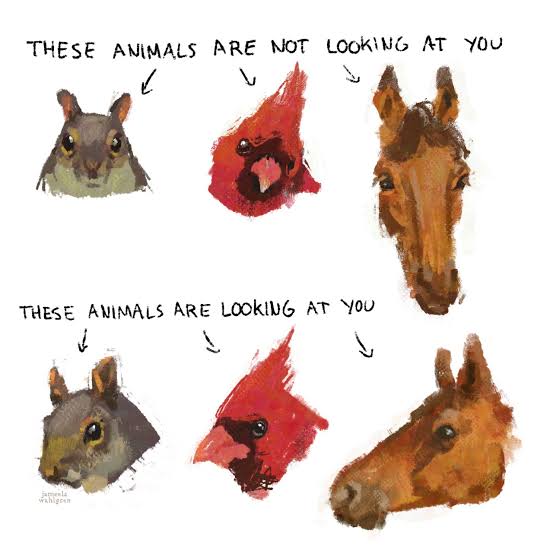
dv said:
:)
Michael V said:
dv said:
:)
is it true since we’re pretty sure they do have a small stereoscopic overlap and may well need to rangefind
dv said:
Hmmm
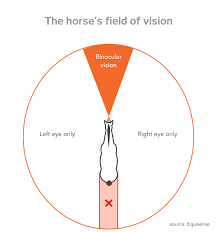

dv said:
It’s a great system, on paper, but they can never seem to get the connecting trains co-ordinated at the Scapula interchange.
dv said:
The Tube as a map-model for human construction. Who’d-ve thunk it?
captain_spalding said:
dv said:
It’s a great system, on paper, but they can never seem to get the connecting trains co-ordinated at the Scapula interchange.
LOL


SCIENCE said:
The sad truth.
SCIENCE said:
I appear to be missing something here. Could you please explain?
Michael V said:
SCIENCE said:
I appear to be missing something here. Could you please explain?
It is in the colours of 38 years ago.
Michael V said:
SCIENCE said:
I appear to be missing something here. Could you please explain?
that’s all the information we were given as well
we’re presuming it looks crude and retro so they’re enjoying the juxtaposition of modern publishing with archaic styles
SCIENCE said:
Michael V said:
SCIENCE said:
I appear to be missing something here. Could you please explain?
that’s all the information we were given as well
we’re presuming it looks crude and retro so they’re enjoying the juxtaposition of modern publishing with archaic styles
Ah.
Interestingly, that works better for me than many of the modern graph or map colour schemes, which use colours with subtle difference between them. Like many men, I don’t have great colour vision.
Question for dv (and anyone else into underground stuff).
Just read a New Scientist article about using the fibre optic network to monitor stuff going on underground.
Is that happening in Australia and/or region?
The Rev Dodgson said:
Question for dv (and anyone else into underground stuff).Just read a New Scientist article about using the fibre optic network to monitor stuff going on underground.
Is that happening in Australia and/or region?
There’s a study out of ANU. Can’t say whether it has been successful.
dv said:
The Rev Dodgson said:
Question for dv (and anyone else into underground stuff).Just read a New Scientist article about using the fibre optic network to monitor stuff going on underground.
Is that happening in Australia and/or region?
There’s a study out of ANU. Can’t say whether it has been successful.
Interestingly, the target end of the Stanford Linear Accelerator (SLAC) is pretty much right on the San Andreas Fault, quite near the Californian headquarters of the US Geological Survey at Menlo Park. When I was collaborating with a couple of the geologists there, the Stanford Physicists were not collaborating. The record of adjustments to the magnets to align the target would’ve been interesting to help understand the state of and variations to rock deformation there.
Michael V said:
dv said:
The Rev Dodgson said:
Question for dv (and anyone else into underground stuff).Just read a New Scientist article about using the fibre optic network to monitor stuff going on underground.
Is that happening in Australia and/or region?
There’s a study out of ANU. Can’t say whether it has been successful.
Interestingly, the target end of the Stanford Linear Accelerator (SLAC) is pretty much right on the San Andreas Fault, quite near the Californian headquarters of the US Geological Survey at Menlo Park. When I was collaborating with a couple of the geologists there, the Stanford Physicists were not collaborating. The record of adjustments to the magnets to align the target would’ve been interesting to help understand the state of and variations to rock deformation there.
Pity, I wonder if they are sharing the data now.
I suppose Trump will put a stop to it pretty soon, even if they are.
Seems a strange place to put a SLAC!
The Rev Dodgson said:
Michael V said:
dv said:There’s a study out of ANU. Can’t say whether it has been successful.
Interestingly, the target end of the Stanford Linear Accelerator (SLAC) is pretty much right on the San Andreas Fault, quite near the Californian headquarters of the US Geological Survey at Menlo Park. When I was collaborating with a couple of the geologists there, the Stanford Physicists were not collaborating. The record of adjustments to the magnets to align the target would’ve been interesting to help understand the state of and variations to rock deformation there.
Pity, I wonder if they are sharing the data now.
I suppose Trump will put a stop to it pretty soon, even if they are.
Seems a strange place to put a SLAC!
It’s where the university is.
this post from Quora by Bob Colwell:
“Intel’s Pentium 4 had our own internal version of x86–64. But you could not use it: we were forced to “fuse it off”, meaning that even though the functionality was in there, it could not be exercised by a user. This was a marketing decision by Intel — they believed, probably rightly, that bringing out a new 64-bit feature in the x86 would be perceived as betting against their own native-64-bit Itanium, and might well severely damage Itanium’s chances. I was told, not once, but twice, that if I “didn’t stop yammering about the need to go 64-bits in x86 I’d be fired on the spot” and was directly ordered to take out that 64-bit stuff. I decided to split the difference, by leaving in the gates but fusing off the functionality. That way, if I was right about Itanium and what AMD would do, Intel could very quickly get back in the game with x86. As far as I’m concerned, that’s exactly what did happen.”
which I think is QI, assuming it was written by the real Bob Colwell
The Rev Dodgson said:
this post from Quora by Bob Colwell:“Intel’s Pentium 4 had our own internal version of x86–64. But you could not use it: we were forced to “fuse it off”, meaning that even though the functionality was in there, it could not be exercised by a user. This was a marketing decision by Intel — they believed, probably rightly, that bringing out a new 64-bit feature in the x86 would be perceived as betting against their own native-64-bit Itanium, and might well severely damage Itanium’s chances. I was told, not once, but twice, that if I “didn’t stop yammering about the need to go 64-bits in x86 I’d be fired on the spot” and was directly ordered to take out that 64-bit stuff. I decided to split the difference, by leaving in the gates but fusing off the functionality. That way, if I was right about Itanium and what AMD would do, Intel could very quickly get back in the game with x86. As far as I’m concerned, that’s exactly what did happen.”
which I think is QI, assuming it was written by the real Bob Colwell
so altruistic
Oh man. I lived with this Finnish engineer in China for a while, and he made a trap using this principle. This was in his room though, so he used a bucket, and he covered the rim with a towel and shoved a lamp down so the bulb was almost touching the water. The bugs would go for the light then touch the water and drown. The first time I looked inside the trap I almost shit my pants. There were so many dead insects I almost felt bad for them. It reminded me of concentration camp footage so much I called the trap “Bug Auschwitz”.
SCIENCE said:
Oh man. I lived with this Finnish engineer in China for a while, and he made a trap using this principle. This was in his room though, so he used a bucket, and he covered the rim with a towel and shoved a lamp down so the bulb was almost touching the water. The bugs would go for the light then touch the water and drown. The first time I looked inside the trap I almost shit my pants. There were so many dead insects I almost felt bad for them. It reminded me of concentration camp footage so much I called the trap “Bug Auschwitz”.
genocide.


dv said:
I sense it’s got something to do with genes 8 and 9 but not sure.
Tau.Neutrino said:
dv said:
I sense it’s got something to do with genes 8 and 9 but not sure.
If i was betting on these races, i’d be concentrating on horses 8 and 9, for sure.
captain_spalding said:
Tau.Neutrino said:
Bogsnorkler said:
dv said:
https://encyclopedia.pub/entry/28634
I sense it’s got something to do with genes 8 and 9 but not sure.
If i was betting on these races, i’d be concentrating on horses 8 and 9, for sure.
Aha We Knew It We Knew All Along It Was Going To Be Some Kind Of Hox
Tau.Neutrino said:
dv said:
I sense it’s got something to do with genes 8 and 9 but not sure.

dv said:
SCIENCE said:
captain_spalding said:
Tau.Neutrino said:
Bogsnorkler said:
dv said:
https://encyclopedia.pub/entry/28634
I sense it’s got something to do with genes 8 and 9 but not sure.
If i was betting on these races, i’d be concentrating on horses 8 and 9, for sure.
Aha We Knew It We Knew All Along It Was Going To Be Some Kind Of Hox
well all right then you got us good we don’t have a quick and dirty comeback for that particulate one but it’ll be a fine man who can draw it out nicely
dv said:
I’ve got that on a T-shirt. I even understand it.
btm said:
dv said:
I’ve got that on a T-shirt. I even understand it.
Nerd!
btm said:
dv said:
I’ve got that on a T-shirt. I even understand it.
Provoke some good reactions in the pub?
btm said:
dv said:
I’ve got that on a T-shirt. I even understand it.
Your job now is to explain it to a near-brain-dead retired geologist – in words of one syllable or less – so that I can understand it, please.
Michael V said:
btm said:
dv said:
I’ve got that on a T-shirt. I even understand it.
Your job now is to explain it to a near-brain-dead retired geologist – in words of one syllable or less – so that I can understand it, please.
Energy has/involves gravity, AND energy has/involves inertia/inertial resistance. “Mass”/energy involves balanced inertia/inertial resistance consistent with/as what is balanced electromagnetic/gravitational force/energy, as electromagnetism/energy is gravity. ELECTROMAGNETISM/energy is gravity. This is proven by F=ma AND E=mc2. So, gravity/acceleration involves balanced inertia/inertial resistance; as gravity is electromagnetism/energy.
Accordingly, a given planet sweeps out equal areas in equal times; AND this is then consistent with F=ma, E=mc2, AND what is perpetual motion; as electromagnetism/energy is gravity. Balance and completeness go hand in hand. The following explains F=ma AND E=mc2. Inertia/inertial resistance is proportional to (or balanced with/as) gravitational force/energy, as this balances AND unifies electromagnetism/energy AND gravity; as this balances gravity AND inertia. In other words, gravitational force/energy is proportional to (or balanced with/as) inertia/inertial resistance; as gravity is electromagnetism/energy. (This explains the cosmological redshift AND the “black holes”, as electromagnetism/energy is gravity.) Accordingly, gravity/acceleration involves balanced inertia/inertial resistance; as electromagnetism/energy is gravity. So, gravity AND electromagnetism/energy are linked AND balanced; as gravity is electromagnetism/energy. This perfectly and clearly explains why half of the galaxies are inert or “dead”. Gravity AND electromagnetism/energy are linked AND balanced in AND out of space AND time, as electromagnetism/energy is gravity. So, this is why Einstein’s equations predict “black holes”; AND this also completely and perfectly explains why there is a unification of Einstein’s equations (of gravity) with Maxwell’s equations (of electromagnetism) given the additional (fourth) spatial dimension. Einstein’s equations necessarily involve linked AND balanced electromagnetic/gravitational force/energy. I have now explained why Einstein’s equations show that space is expanding or contracting. Any and all “curvature” of space necessarily involves what is balanced electromagnetic/gravitational force/energy, as electromagnetism/energy is gravity. Very importantly, outer “space” involves full inertia; AND it is fully invisible AND black. A photon may be placed at the center of the sun (as a point, of course), as the reduction of space is balanced by the speed of light; as electromagnetism/energy is gravity. So, gravity/acceleration involves balanced inertia/inertial resistance; as electromagnetism/energy is gravity. Therefore, half of the galaxies are inert or “dead”; as electromagnetism/energy is gravity. Awesome !!! I have provided clear, overwhelming, consistent, super extensive, and complete mathematical proof (AND the explanation) regarding why electromagnetism/energy is gravity. It is impossible to understand gravity apart from both ELECTROMAGNETISM/energy AND inertia/inertial resistance, as electromagnetism/energy is gravity. Great !!! It is certainly, clearly, and extensively proven how/that Einstein never nearly understood gravity. Think about it very carefully. ELECTROMAGNETISM/energy is gravity. This is proven by F=ma AND E=mc2. Great !!!By Frank DiMeglio
I reckon Frank is full of it myself.
Divine Angel said:
btm said:
dv said:
I’ve got that on a T-shirt. I even understand it.
Nerd!
Probably.
Bogsnorkler said:
Michael V said:
btm said:I’ve got that on a T-shirt. I even understand it.
Your job now is to explain it to a near-brain-dead retired geologist – in words of one syllable or less – so that I can understand it, please.
Energy has/involves gravity, AND energy has/involves inertia/inertial resistance. “Mass”/energy involves balanced inertia/inertial resistance consistent with/as what is balanced electromagnetic/gravitational force/energy, as electromagnetism/energy is gravity. ELECTROMAGNETISM/energy is gravity. This is proven by F=ma AND E=mc2. So, gravity/acceleration involves balanced inertia/inertial resistance; as gravity is electromagnetism/energy.
Accordingly, a given planet sweeps out equal areas in equal times; AND this is then consistent with F=ma, E=mc2, AND what is perpetual motion; as electromagnetism/energy is gravity. Balance and completeness go hand in hand. The following explains F=ma AND E=mc2. Inertia/inertial resistance is proportional to (or balanced with/as) gravitational force/energy, as this balances AND unifies electromagnetism/energy AND gravity; as this balances gravity AND inertia. In other words, gravitational force/energy is proportional to (or balanced with/as) inertia/inertial resistance; as gravity is electromagnetism/energy. (This explains the cosmological redshift AND the “black holes”, as electromagnetism/energy is gravity.) Accordingly, gravity/acceleration involves balanced inertia/inertial resistance; as electromagnetism/energy is gravity. So, gravity AND electromagnetism/energy are linked AND balanced; as gravity is electromagnetism/energy. This perfectly and clearly explains why half of the galaxies are inert or “dead”. Gravity AND electromagnetism/energy are linked AND balanced in AND out of space AND time, as electromagnetism/energy is gravity. So, this is why Einstein’s equations predict “black holes”; AND this also completely and perfectly explains why there is a unification of Einstein’s equations (of gravity) with Maxwell’s equations (of electromagnetism) given the additional (fourth) spatial dimension. Einstein’s equations necessarily involve linked AND balanced electromagnetic/gravitational force/energy. I have now explained why Einstein’s equations show that space is expanding or contracting. Any and all “curvature” of space necessarily involves what is balanced electromagnetic/gravitational force/energy, as electromagnetism/energy is gravity. Very importantly, outer “space” involves full inertia; AND it is fully invisible AND black. A photon may be placed at the center of the sun (as a point, of course), as the reduction of space is balanced by the speed of light; as electromagnetism/energy is gravity. So, gravity/acceleration involves balanced inertia/inertial resistance; as electromagnetism/energy is gravity. Therefore, half of the galaxies are inert or “dead”; as electromagnetism/energy is gravity. Awesome !!! I have provided clear, overwhelming, consistent, super extensive, and complete mathematical proof (AND the explanation) regarding why electromagnetism/energy is gravity. It is impossible to understand gravity apart from both ELECTROMAGNETISM/energy AND inertia/inertial resistance, as electromagnetism/energy is gravity. Great !!! It is certainly, clearly, and extensively proven how/that Einstein never nearly understood gravity. Think about it very carefully. ELECTROMAGNETISM/energy is gravity. This is proven by F=ma AND E=mc2. Great !!!By Frank DiMeglio
I reckon Frank is full of it myself.
Oh, Frank?! Why didn’t you say so up front? Everyone knows that Frank talks rubbish, even before the bar opens.
Michael V said:
btm said:
dv said:
I’ve got that on a T-shirt. I even understand it.
Your job now is to explain it to a near-brain-dead retired geologist – in words of one syllable or less – so that I can understand it, please.
I’m not even a retired rock hunter and I don’t understand it.
Divine Angel said:
Michael V said:
btm said:I’ve got that on a T-shirt. I even understand it.
Your job now is to explain it to a near-brain-dead retired geologist – in words of one syllable or less – so that I can understand it, please.
I’m not even a retired rock hunter and I don’t understand it.
:)
Bogsnorkler said:
Michael V said:
btm said:I’ve got that on a T-shirt. I even understand it.
Your job now is to explain it to a near-brain-dead retired geologist – in words of one syllable or less – so that I can understand it, please.
Energy has/involves gravity, AND energy has/involves inertia/inertial resistance. “Mass”/energy involves balanced inertia/inertial resistance consistent with/as what is balanced electromagnetic/gravitational force/energy, as electromagnetism/energy is gravity. ELECTROMAGNETISM/energy is gravity. This is proven by F=ma AND E=mc2. So, gravity/acceleration involves balanced inertia/inertial resistance; as gravity is electromagnetism/energy.
Accordingly, a given planet sweeps out equal areas in equal times; AND this is then consistent with F=ma, E=mc2, AND what is perpetual motion; as electromagnetism/energy is gravity. Balance and completeness go hand in hand. The following explains F=ma AND E=mc2. Inertia/inertial resistance is proportional to (or balanced with/as) gravitational force/energy, as this balances AND unifies electromagnetism/energy AND gravity; as this balances gravity AND inertia. In other words, gravitational force/energy is proportional to (or balanced with/as) inertia/inertial resistance; as gravity is electromagnetism/energy. (This explains the cosmological redshift AND the “black holes”, as electromagnetism/energy is gravity.) Accordingly, gravity/acceleration involves balanced inertia/inertial resistance; as electromagnetism/energy is gravity. So, gravity AND electromagnetism/energy are linked AND balanced; as gravity is electromagnetism/energy. This perfectly and clearly explains why half of the galaxies are inert or “dead”. Gravity AND electromagnetism/energy are linked AND balanced in AND out of space AND time, as electromagnetism/energy is gravity. So, this is why Einstein’s equations predict “black holes”; AND this also completely and perfectly explains why there is a unification of Einstein’s equations (of gravity) with Maxwell’s equations (of electromagnetism) given the additional (fourth) spatial dimension. Einstein’s equations necessarily involve linked AND balanced electromagnetic/gravitational force/energy. I have now explained why Einstein’s equations show that space is expanding or contracting. Any and all “curvature” of space necessarily involves what is balanced electromagnetic/gravitational force/energy, as electromagnetism/energy is gravity. Very importantly, outer “space” involves full inertia; AND it is fully invisible AND black. A photon may be placed at the center of the sun (as a point, of course), as the reduction of space is balanced by the speed of light; as electromagnetism/energy is gravity. So, gravity/acceleration involves balanced inertia/inertial resistance; as electromagnetism/energy is gravity. Therefore, half of the galaxies are inert or “dead”; as electromagnetism/energy is gravity. Awesome !!! I have provided clear, overwhelming, consistent, super extensive, and complete mathematical proof (AND the explanation) regarding why electromagnetism/energy is gravity. It is impossible to understand gravity apart from both ELECTROMAGNETISM/energy AND inertia/inertial resistance, as electromagnetism/energy is gravity. Great !!! It is certainly, clearly, and extensively proven how/that Einstein never nearly understood gravity. Think about it very carefully. ELECTROMAGNETISM/energy is gravity. This is proven by F=ma AND E=mc2. Great !!!By Frank DiMeglio
I reckon Frank is full of it myself.
Is that algebra?
Michael V said:
Divine Angel said:
Michael V said:Your job now is to explain it to a near-brain-dead retired geologist – in words of one syllable or less – so that I can understand it, please.
I’m not even a retired rock hunter and I don’t understand it.
:)
It’s the Lagrangian of the standard model of particle physics. The underlying mathematics is somewhat complicated; in short that equation expresses the interactions between particles in a coordinate-independent way. I don’t think I could explain it in words of one syllable, let alone less than one. I couldn’t even say syllable in one syllable.
Consider if AI converted mathematics to English.
Tau.Neutrino said:
Consider if AI converted mathematics to English.
AI can’t even count fingers reliably.
btm said:
Michael V said:
Divine Angel said:
I’m not even a retired rock hunter and I don’t understand it.
:)
It’s the Lagrangian of the standard model of particle physics. The underlying mathematics is somewhat complicated; in short that equation expresses the interactions between particles in a coordinate-independent way. I don’t think I could explain it in words of one syllable, let alone less than one. I couldn’t even say syllable in one syllable.
sounds
Tau.Neutrino said:
Consider if AI converted mathematics to English.
we mean that’s what computers with human interface do in the first place
Bubblecar said:
Tau.Neutrino said:
Consider if AI converted mathematics to English.
AI can’t even count fingers reliably.
There will be problems if AI gets confused between hands and feet.
btm said:
Michael V said:
Divine Angel said:I’m not even a retired rock hunter and I don’t understand it.
:)
It’s the Lagrangian of the standard model of particle physics. The underlying mathematics is somewhat complicated; in short that equation expresses the interactions between particles in a coordinate-independent way. I don’t think I could explain it in words of one syllable, let alone less than one. I couldn’t even say syllable in one syllable.
:)
Thanks.
:)

Horseshoe is obviously best.
dv said:

Horseshoe is obviously best.
Better than the Republic Senate ?
Cymek said:
dv said:
Horseshoe is obviously best.
Better than the Republic Senate ?
we considered that one but actually we have the best suggestion
virtual world / video conferenced
dv said:

Horseshoe is obviously best.
I prefer the circle.
The active ingredient of Vicks Vapoinhaler is levmetamfetamine.
dv said:
The active ingredient of Vicks Vapoinhaler is levmetamfetamine.
Gesundheit
dv said:
The active ingredient of Vicks Vapoinhaler is levmetamfetamine.
It’s like methamphetamine but made from goat’s milk.

dv said:
The active ingredient of Vicks Vapoinhaler is levmetamfetamine.
Better than using the d-version.
Bubblecar said:
dv said:The active ingredient of Vicks Vapoinhaler is levmetamfetamine.
It’s like methamphetamine but made from goat’s milk.
Amusing. Or possibly one that is cheap in Bulgaria.
dv said:

Now you can just tilt your head left and right, and see them change sex in front of you.
Matthew 24:6-13
6 You will hear of wars and rumors of wars, but see to it that you are not alarmed. Such things must happen, but the end is still to come. 7 Nation will rise against nation, and kingdom against kingdom. There will be famines and earthquakes in various places. 8 All these are the beginning of birth pains.
The Rev Dodgson said:
dv said:
Now you can just tilt your head left and right, and see them change sex in front of you.
He’s a witch, burn him, burn burn.
Peak Warming Man said:
Matthew 24:6-13
6 You will hear of wars and rumors of wars, but see to it that you are not alarmed. Such things must happen, but the end is still to come. 7 Nation will rise against nation, and kingdom against kingdom. There will be famines and earthquakes in various places. 8 All these are the beginning of birth pains.
Another false prophecy that was never fulfilled, yet people still follow’s Matthew’s gospel…
The Rev Dodgson said:
dv said:
Now you can just tilt your head left and right, and see them change sex in front of you.
It is cool.
The parents of a 7-year-old boy who was fatally struck by a car in North Carolina have been charged with involuntary manslaughter for letting him and his brother walk home alone from a grocery store.
Little Legend Jenkins was with his 10-year-old brother in Gastonia last Tuesday when he ran into traffic and was hit by a jeep driven by a 76-year-old woman, according to the Gastonia Police Department.
https://nypost.com/2025/06/03/us-news/parents-of-7-year-old-nc-boy-killed-walking-home-from-grocery-store-charged/
Ivey and the boys’ father, Samuele Jenkins, were arrested Thursday and each charged with involuntary manslaughter and child neglect, both felonies.
They were denied permission to attend their son’s funeral, instead getting slapped with a $1.5 million bond, the highest possible.
dv said:
The parents of a 7-year-old boy who was fatally struck by a car in North Carolina have been charged with involuntary manslaughter for letting him and his brother walk home alone from a grocery store.Little Legend Jenkins was with his 10-year-old brother in Gastonia last Tuesday when he ran into traffic and was hit by a jeep driven by a 76-year-old woman, according to the Gastonia Police Department.
https://nypost.com/2025/06/03/us-news/parents-of-7-year-old-nc-boy-killed-walking-home-from-grocery-store-charged/
Ivey and the boys’ father, Samuele Jenkins, were arrested Thursday and each charged with involuntary manslaughter and child neglect, both felonies.
They were denied permission to attend their son’s funeral, instead getting slapped with a $1.5 million bond, the highest possible.
FMD.
Michael V said:
dv said:
The parents of a 7-year-old boy who was fatally struck by a car in North Carolina have been charged with involuntary manslaughter for letting him and his brother walk home alone from a grocery store.Little Legend Jenkins was with his 10-year-old brother in Gastonia last Tuesday when he ran into traffic and was hit by a jeep driven by a 76-year-old woman, according to the Gastonia Police Department.
https://nypost.com/2025/06/03/us-news/parents-of-7-year-old-nc-boy-killed-walking-home-from-grocery-store-charged/
Ivey and the boys’ father, Samuele Jenkins, were arrested Thursday and each charged with involuntary manslaughter and child neglect, both felonies.
They were denied permission to attend their son’s funeral, instead getting slapped with a $1.5 million bond, the highest possible.
FMD.
I wonder what effect all that will have on the brother.
Not relatives as far as I know, but names have an effect when you read this stuff.
dv said:
The parents of a 7-year-old boy who was fatally struck by a car in North Carolina have been charged with involuntary manslaughter for letting him and his brother walk home alone from a grocery store.Little Legend Jenkins was with his 10-year-old brother in Gastonia last Tuesday when he ran into traffic and was hit by a jeep driven by a 76-year-old woman, according to the Gastonia Police Department.
https://nypost.com/2025/06/03/us-news/parents-of-7-year-old-nc-boy-killed-walking-home-from-grocery-store-charged/
Ivey and the boys’ father, Samuele Jenkins, were arrested Thursday and each charged with involuntary manslaughter and child neglect, both felonies.
They were denied permission to attend their son’s funeral, instead getting slapped with a $1.5 million bond, the highest possible.
so they are pro life after all
Michael V said:
dv said:
The parents of a 7-year-old boy who was fatally struck by a car in North Carolina have been charged with involuntary manslaughter for letting him and his brother walk home alone from a grocery store.Little Legend Jenkins was with his 10-year-old brother in Gastonia last Tuesday when he ran into traffic and was hit by a jeep driven by a 76-year-old woman, according to the Gastonia Police Department.
https://nypost.com/2025/06/03/us-news/parents-of-7-year-old-nc-boy-killed-walking-home-from-grocery-store-charged/
Ivey and the boys’ father, Samuele Jenkins, were arrested Thursday and each charged with involuntary manslaughter and child neglect, both felonies.
They were denied permission to attend their son’s funeral, instead getting slapped with a $1.5 million bond, the highest possible.
FMD.
Consider if the child was riding a little tricycle just outside the home and wandered onto the road.
Same punishment?
dv said:
It’s not that much of a mystery. Perception is not definitive.
Ambiguous images or reversible figures are visual forms that create ambiguity by exploiting graphical similarities and other properties of visual system interpretation between two or more distinct image forms. These are famous for inducing the phenomenon of multistable perception. Multistable perception is the occurrence of an image being able to provide multiple, although stable, perceptions.
esselte said:
dv said:
It’s not that much of a mystery. Perception is not definitive.
Ambiguous images or reversible figures are visual forms that create ambiguity by exploiting graphical similarities and other properties of visual system interpretation between two or more distinct image forms. These are famous for inducing the phenomenon of multistable perception. Multistable perception is the occurrence of an image being able to provide multiple, although stable, perceptions.
I know I’ve tried to expound on this concept before to this group of people, but I don’t think anyone here has actually ever grokked the meaning behind it.
I read a novel once, “Light” by M. John Harrison. It contained ideas which totally changed my perception of reality.
We are an evolved species. Our perception of reality is the result of evolution, which can be defined as “random stuff that worked well enough to ensure the continuation of the species to this point, but does not necessarily reflect the ‘reality’ of existence.”
In Light, a sci-fi novel, humanity travels extra-solarily to a unique phenomena in the Milky Way galaxy called the Kefahuchi Tract. Arriving there we discover evidence that many historical sapient species in the galaxy who have achieved the ability to travel between stars have sent investigators to the Tract, but the evidence shows that all of them have achieved this ability to travel between stars based upon unique and exotic (to us, and to each and every other) understandings of how reality works.
We have not evolved to be rational beings. We have evolved, our brains have evolved, to perceive reality in a particular way which has worked well enough to keep us existent so far. Our intelligence and conciseness is but one point in the phase space of all possible types of conciseness’s.
Consider the lilies …….
esselte said:
esselte said:
dv said:
It’s not that much of a mystery. Perception is not definitive.
Ambiguous images or reversible figures are visual forms that create ambiguity by exploiting graphical similarities and other properties of visual system interpretation between two or more distinct image forms. These are famous for inducing the phenomenon of multistable perception. Multistable perception is the occurrence of an image being able to provide multiple, although stable, perceptions.
I know I’ve tried to expound on this concept before to this group of people, but I don’t think anyone here has actually ever grokked the meaning behind it.
I read a novel once, “Light” by M. John Harrison. It contained ideas which totally changed my perception of reality.
We are an evolved species. Our perception of reality is the result of evolution, which can be defined as “random stuff that worked well enough to ensure the continuation of the species to this point, but does not necessarily reflect the ‘reality’ of existence.”
In Light, a sci-fi novel, humanity travels extra-solarily to a unique phenomena in the Milky Way galaxy called the Kefahuchi Tract. Arriving there we discover evidence that many historical sapient species in the galaxy who have achieved the ability to travel between stars have sent investigators to the Tract, but the evidence shows that all of them have achieved this ability to travel between stars based upon unique and exotic (to us, and to each and every other) understandings of how reality works.
We have not evolved to be rational beings. We have evolved, our brains have evolved, to perceive reality in a particular way which has worked well enough to keep us existent so far. Our intelligence and conciseness is but one point in the phase space of all possible types of conciseness’s.
It may make an interesting topic for a novel, but I think it is really reading way too much into deliberately crafted 2D images.
The fact is, what we see is in most cases consistent across multiple viewing angles and light conditions, and with all sorts machine based measurements.
And even if there might be some hidden higher level reality, what we perceive is our reality, and our reality is what is important to us.
Woodie said:
Consider the lilies …….
He’s having a go at the flowers now…
The Rev Dodgson said:
esselte said:
esselte said:It’s not that much of a mystery. Perception is not definitive.
Ambiguous images or reversible figures are visual forms that create ambiguity by exploiting graphical similarities and other properties of visual system interpretation between two or more distinct image forms. These are famous for inducing the phenomenon of multistable perception. Multistable perception is the occurrence of an image being able to provide multiple, although stable, perceptions.
I know I’ve tried to expound on this concept before to this group of people, but I don’t think anyone here has actually ever grokked the meaning behind it.
I read a novel once, “Light” by M. John Harrison. It contained ideas which totally changed my perception of reality.
We are an evolved species. Our perception of reality is the result of evolution, which can be defined as “random stuff that worked well enough to ensure the continuation of the species to this point, but does not necessarily reflect the ‘reality’ of existence.”
In Light, a sci-fi novel, humanity travels extra-solarily to a unique phenomena in the Milky Way galaxy called the Kefahuchi Tract. Arriving there we discover evidence that many historical sapient species in the galaxy who have achieved the ability to travel between stars have sent investigators to the Tract, but the evidence shows that all of them have achieved this ability to travel between stars based upon unique and exotic (to us, and to each and every other) understandings of how reality works.
We have not evolved to be rational beings. We have evolved, our brains have evolved, to perceive reality in a particular way which has worked well enough to keep us existent so far. Our intelligence and conciseness is but one point in the phase space of all possible types of conciseness’s.
It may make an interesting topic for a novel, but I think it is really reading way too much into deliberately crafted 2D images.
The fact is, what we see is in most cases consistent across multiple viewing angles and light conditions, and with all sorts machine based measurements.
And even if there might be some hidden higher level reality, what we perceive is our reality, and our reality is what is important to us.
There is little to no doubt that some hidden higher level reality exists, IMO.
We are animals. My dog is smart, but my dog isn’t capable of understanding that the Earth is a globe orbiting a star orbiting a galactic centre in a wider universe. There’s no reason to think we are even capable of understanding the nature of reality to a degree signifcantly better than my dog understands the universe.
That our understanding of reality is what is important to us is the point of my previous post. The importance to us does not speak to the verity of our understanding.
esselte said:
The Rev Dodgson said:
esselte said:I know I’ve tried to expound on this concept before to this group of people, but I don’t think anyone here has actually ever grokked the meaning behind it.
I read a novel once, “Light” by M. John Harrison. It contained ideas which totally changed my perception of reality.
We are an evolved species. Our perception of reality is the result of evolution, which can be defined as “random stuff that worked well enough to ensure the continuation of the species to this point, but does not necessarily reflect the ‘reality’ of existence.”
In Light, a sci-fi novel, humanity travels extra-solarily to a unique phenomena in the Milky Way galaxy called the Kefahuchi Tract. Arriving there we discover evidence that many historical sapient species in the galaxy who have achieved the ability to travel between stars have sent investigators to the Tract, but the evidence shows that all of them have achieved this ability to travel between stars based upon unique and exotic (to us, and to each and every other) understandings of how reality works.
We have not evolved to be rational beings. We have evolved, our brains have evolved, to perceive reality in a particular way which has worked well enough to keep us existent so far. Our intelligence and conciseness is but one point in the phase space of all possible types of conciseness’s.
It may make an interesting topic for a novel, but I think it is really reading way too much into deliberately crafted 2D images.
The fact is, what we see is in most cases consistent across multiple viewing angles and light conditions, and with all sorts machine based measurements.
And even if there might be some hidden higher level reality, what we perceive is our reality, and our reality is what is important to us.
There is little to no doubt that some hidden higher level reality exists, IMO.
We are animals. My dog is smart, but my dog isn’t capable of understanding that the Earth is a globe orbiting a star orbiting a galactic centre in a wider universe. There’s no reason to think we are even capable of understanding the nature of reality to a degree signifcantly better than my dog understands the universe.
That our understanding of reality is what is important to us is the point of my previous post. The importance to us does not speak to the verity of our understanding.
“ There’s no reason to think we are even capable of understanding the nature of reality to a degree signifcantly better than my dog understands the universe.”
That strikes me as a very strange thing to say :)
The Rev Dodgson said:
esselte said:
The Rev Dodgson said:It may make an interesting topic for a novel, but I think it is really reading way too much into deliberately crafted 2D images.
The fact is, what we see is in most cases consistent across multiple viewing angles and light conditions, and with all sorts machine based measurements.
And even if there might be some hidden higher level reality, what we perceive is our reality, and our reality is what is important to us.
There is little to no doubt that some hidden higher level reality exists, IMO.
We are animals. My dog is smart, but my dog isn’t capable of understanding that the Earth is a globe orbiting a star orbiting a galactic centre in a wider universe. There’s no reason to think we are even capable of understanding the nature of reality to a degree signifcantly better than my dog understands the universe.
That our understanding of reality is what is important to us is the point of my previous post. The importance to us does not speak to the verity of our understanding.
“ There’s no reason to think we are even capable of understanding the nature of reality to a degree signifcantly better than my dog understands the universe.”
That strikes me as a very strange thing to say :)
But why?
Imagine a scale, 0 to one hundred. One hundred is a perfect, God-like understanding of reality. Dogs are at 1. Do you think humans would be closer to 1 or closer to one hundred. I’d put us at, like, 5 maybe, on this type of scale. Where would you put us?
esselte said:
The Rev Dodgson said:
esselte said:There is little to no doubt that some hidden higher level reality exists, IMO.
We are animals. My dog is smart, but my dog isn’t capable of understanding that the Earth is a globe orbiting a star orbiting a galactic centre in a wider universe. There’s no reason to think we are even capable of understanding the nature of reality to a degree signifcantly better than my dog understands the universe.
That our understanding of reality is what is important to us is the point of my previous post. The importance to us does not speak to the verity of our understanding.
“ There’s no reason to think we are even capable of understanding the nature of reality to a degree signifcantly better than my dog understands the universe.”
That strikes me as a very strange thing to say :)
But why?
Imagine a scale, 0 to one hundred. One hundred is a perfect, God-like understanding of reality. Dogs are at 1. Do you think humans would be closer to 1 or closer to one hundred. I’d put us at, like, 5 maybe, on this type of scale. Where would you put us?
I have no idea.
I don’t even know how you would put a number to it.
The Rev Dodgson said:
esselte said:
The Rev Dodgson said:“ There’s no reason to think we are even capable of understanding the nature of reality to a degree signifcantly better than my dog understands the universe.”
That strikes me as a very strange thing to say :)
But why?
Imagine a scale, 0 to one hundred. One hundred is a perfect, God-like understanding of reality. Dogs are at 1. Do you think humans would be closer to 1 or closer to one hundred. I’d put us at, like, 5 maybe, on this type of scale. Where would you put us?
I have no idea.
I don’t even know how you would put a number to it.
You don’t know because we don’t have anything close to the God-like understanding. I chose 5 just because it’s significantly better than a dog, but not exponentially better. It’s mid way between dog-understanding and exponentially better understanding than a dog.
esselte said:
The Rev Dodgson said:
esselte said:But why?
Imagine a scale, 0 to one hundred. One hundred is a perfect, God-like understanding of reality. Dogs are at 1. Do you think humans would be closer to 1 or closer to one hundred. I’d put us at, like, 5 maybe, on this type of scale. Where would you put us?
I have no idea.
I don’t even know how you would put a number to it.
You don’t know because we don’t have anything close to the God-like understanding. I chose 5 just because it’s significantly better than a dog, but not exponentially better. It’s mid way between dog-understanding and exponentially better understanding than a dog.
Maybe “order of magnitude” rather than “exponential” would be a better way to say it.
So we have orders of magnitude of understanding. At 1 is sentient species like dogs. At 10, super-sentient beings. Humans are somewhere in between. At 100 we have a perfect, actual understanding.
furious said:
Woodie said:
Consider the lilies …….
He’s having a go at the flowers now…
Ah well….. The birds then.
this post from Quora:
“Is “cogito ergo sum” true or false?
Nietzsche had an interesting counter-point to this idea. Namely, he asserted that it would be more correct to say “something thinks, therefore something exists.” To assert that “you” exist, you have to presuppose the existence of a unified “you” (which means that you are already assuming “I am”), which is non-trivial. After all, are we so certain that the mind is a single, unified entity? If that is so, then how can the mind be at odds with itself (an experience that I am sure that most everyone is familiar with)? So, perhaps, we should view not as the mind being aware of its own thought, but as a two-body system, where one entity thinks, and another entity perceives this thought. (I seem to recall that fMRI suggested that first the brain has an insight, and only afterward does the forebrain become aware of this fact, but I am not a neurobiologist and am not qualified to assert such a thing.)
Personally, I am of the mind (no pun intended) that “cogito ergo sum” is an axiom. It is something that we assume to be true, mostly because if it is not true, then there is no possible discourse that we could have, and that doesn’t seem particularly useful.”
Nice and simply put, but I disagree.
I think the axiom is that the thing doing the thinking is the same thing as the one that I recognise as myself.
If that is true, then it follows that that thing must exist.
What follows if it is not true, I’m not sure.
this Python code to generate all the numerical palindromes between 100,000 and 1,000,000:

or

The Rev Dodgson said:
this Python code to generate all the numerical palindromes between 100,000 and 1,000,000:
or
no worries what do we do with it after that
The Rev Dodgson said:
this post from Quora:
“Is “cogito ergo sum” true or false?
Nietzsche had an interesting counter-point to this idea. Namely, he asserted that it would be more correct to say “something thinks, therefore something exists.” To assert that “you” exist, you have to presuppose the existence of a unified “you” (which means that you are already assuming “I am”), which is non-trivial. After all, are we so certain that the mind is a single, unified entity? If that is so, then how can the mind be at odds with itself (an experience that I am sure that most everyone is familiar with)? So, perhaps, we should view not as the mind being aware of its own thought, but as a two-body system, where one entity thinks, and another entity perceives this thought. (I seem to recall that fMRI suggested that first the brain has an insight, and only afterward does the forebrain become aware of this fact, but I am not a neurobiologist and am not qualified to assert such a thing.)Personally, I am of the mind (no pun intended) that “cogito ergo sum” is an axiom. It is something that we assume to be true, mostly because if it is not true, then there is no possible discourse that we could have, and that doesn’t seem particularly useful.”
Nice and simply put, but I disagree.
I think the axiom is that the thing doing the thinking is the same thing as the one that I recognise as myself.
If that is true, then it follows that that thing must exist.
What follows if it is not true, I’m not sure.
maybe but we considered that it meant that thinking therefore exists(thinking) as in it’s a definition of existence
SCIENCE said:
The Rev Dodgson said:
this Python code to generate all the numerical palindromes between 100,000 and 1,000,000:
or
no worries what do we do with it after that
You consider how you might use these nifty little Python list manipulation techniques in something with a practical use.
Haven’t read this yet, but it looks QI:
www.superintelligencenewsletter.com/p/darwin-godel-how-ai-can-learn-evolve?
this interesting map of what people call the country known by its own people as Deutschland:


dv said:
what if they masochism
this map:

QI, but I doubt it is accurate.
Surely it is only the E-W distances that should be reduced away from the Equator, and the N-S distances should stay the same?
The Rev Dodgson said:
this map:
QI, but I doubt it is accurate.
Surely it is only the E-W distances that should be reduced away from the Equator, and the N-S distances should stay the same?
I suggest that, while you may well be right, the aim of the illustration is to keep the ‘actual-size’ representations of the land masses on top of the Mercator-distorted images, so as to make the comaprisons easy to see.
captain_spalding said:
The Rev Dodgson said:
this map:
QI, but I doubt it is accurate.
Surely it is only the E-W distances that should be reduced away from the Equator, and the N-S distances should stay the same?
I suggest that, while you may well be right, the aim of the illustration is to keep the ‘actual-size’ representations of the land masses on top of the Mercator-distorted images, so as to make the comaprisons easy to see.
given that Mercator preserves shapes then one might expect that ewdistortion must be matched by nsdistortion
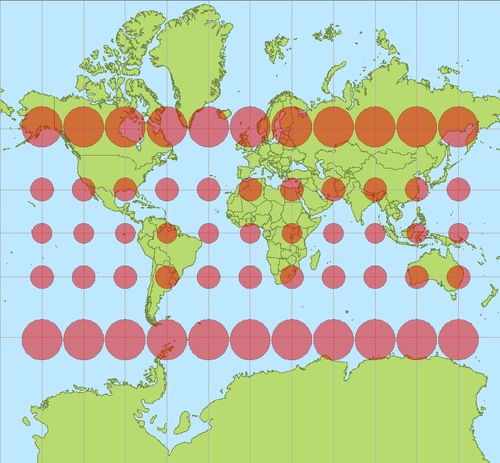
here have a tissot
SCIENCE said:
captain_spalding said:
The Rev Dodgson said:
this map:
QI, but I doubt it is accurate.
Surely it is only the E-W distances that should be reduced away from the Equator, and the N-S distances should stay the same?
I suggest that, while you may well be right, the aim of the illustration is to keep the ‘actual-size’ representations of the land masses on top of the Mercator-distorted images, so as to make the comaprisons easy to see.
given that Mercator preserves shapes then one might expect that ewdistortion must be matched by nsdistortion
here have a tissot
OK, I didn’t know/had forgotten that Mercator magnified in the N-S direction as well, so the map may be reasonably accurate then.
I don’t know what a tissot is.
captain_spalding said:
The Rev Dodgson said:
this map:
QI, but I doubt it is accurate.
Surely it is only the E-W distances that should be reduced away from the Equator, and the N-S distances should stay the same?
I suggest that, while you may well be right, the aim of the illustration is to keep the ‘actual-size’ representations of the land masses on top of the Mercator-distorted images, so as to make the comaprisons easy to see.
But the “actual size” representations are inaccurate. Look what happens when you try to join “actual size” Canada back up with “actual size” USA:

Bubblecar said:
captain_spalding said:
The Rev Dodgson said:
this map:
QI, but I doubt it is accurate.
Surely it is only the E-W distances that should be reduced away from the Equator, and the N-S distances should stay the same?
I suggest that, while you may well be right, the aim of the illustration is to keep the ‘actual-size’ representations of the land masses on top of the Mercator-distorted images, so as to make the comaprisons easy to see.
But the “actual size” representations are inaccurate. Look what happens when you try to join “actual size” Canada back up with “actual size” USA:
Looks like they applied a single size factor to each country.
The Rev Dodgson said:
SCIENCE said:captain_spalding said:
I suggest that, while you may well be right, the aim of the illustration is to keep the ‘actual-size’ representations of the land masses on top of the Mercator-distorted images, so as to make the comaprisons easy to see.
given that Mercator preserves shapes then one might expect that ewdistortion must be matched by nsdistortion
here have a tissot
OK, I didn’t know/had forgotten that Mercator magnified in the N-S direction as well, so the map may be reasonably accurate then.
I don’t know what a tissot is.
the name of a watch company.
The Rev Dodgson said:
SCIENCE said:captain_spalding said:
I suggest that, while you may well be right, the aim of the illustration is to keep the ‘actual-size’ representations of the land masses on top of the Mercator-distorted images, so as to make the comaprisons easy to see.
given that Mercator preserves shapes then one might expect that ewdistortion must be matched by nsdistortion
here have a tissot
OK, I didn’t know/had forgotten that Mercator magnified in the N-S direction as well, so the map may be reasonably accurate then.
I don’t know what a tissot is.
https://en.wikipedia.org/wiki/Tissot%27s_indicatrix
JudgeMental said:
The Rev Dodgson said:
SCIENCE said:
given that Mercator preserves shapes then one might expect that ewdistortion must be matched by nsdistortion
here have a tissot
OK, I didn’t know/had forgotten that Mercator magnified in the N-S direction as well, so the map may be reasonably accurate then.
I don’t know what a tissot is.
the name of a watch company.
damn you next they’ll be thinking a Harrison is a kind of space mercenary
JudgeMental said:
The Rev Dodgson said:
SCIENCE said:given that Mercator preserves shapes then one might expect that ewdistortion must be matched by nsdistortion
here have a tissot
OK, I didn’t know/had forgotten that Mercator magnified in the N-S direction as well, so the map may be reasonably accurate then.
I don’t know what a tissot is.
https://en.wikipedia.org/wiki/Tissot%27s_indicatrix
Thanks.
We should move this to the TIL thread.
SCIENCE said:
JudgeMental said:
The Rev Dodgson said:
OK, I didn’t know/had forgotten that Mercator magnified in the N-S direction as well, so the map may be reasonably accurate then.
I don’t know what a tissot is.
the name of a watch company.
damn you next they’ll be thinking a Harrison is a kind of space mercenary
Tamb said:
SCIENCE said:JudgeMental said:
the name of a watch company.
damn you next they’ll be thinking a Harrison is a kind of space mercenary
I thought Harrison Ford was a car.
If you do a binge on Harrison it comes up with a few commercial companies, then the actor named after the car, but no mention of George.
But if you Google it, George is the first hit, after the AI summary.
The Rev Dodgson said:
Tamb said:
SCIENCE said:damn you next they’ll be thinking a Harrison is a kind of space mercenary
I thought Harrison Ford was a car.If you do a binge on Harrison it comes up with a few commercial companies, then the actor named after the car, but no mention of George.
But if you Google it, George is the first hit, after the AI summary.
where does John rate?

https://www.facebook.com/share/v/1B2gCoDRw1/
The rise of the anti-intellectual nerd
The Rev Dodgson said:
Divine Angel said:
furious said:
I’d like to help, but that’s in the future…
Coincidentally, yesterday youtoob presented me with:
The Sydney Opera House Illusionwhich included a bit about:
and:
why do they call it that though seems like calling dolly zoom the ratatouille effect
video from 2018 https://www.youtube.com/watch?v=MfVetou0ERY
video from 2017 https://www.youtube.com/watch?v=jvYdWwxTx3c
image from 2014
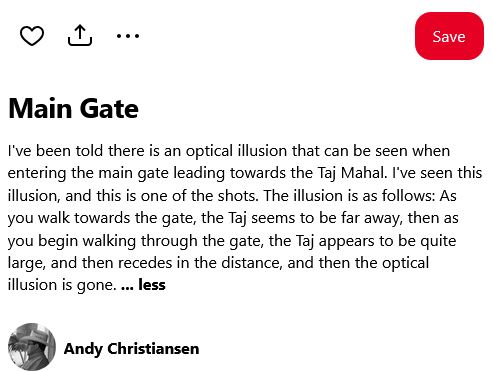



I’ve been told there is an optical illusion that can be seen when entering the main gate leading towards the Taj Mahal. I’ve seen this illusion, and this is one of the shots. The illusion is as follows: As you walk towards the gate, the Taj seems to be far away, then as you begin walking through the gate, the Taj appears to be quite large, and then recedes in the distance, and then the optical illusion is gone. … less
weblog from 2014 https://certainabsurdity.wordpress.com/2014/05/01/optical-illusions-at-the-taj/
SCIENCE said:
The Rev Dodgson said:
Divine Angel said:
Coincidentally, yesterday youtoob presented me with:
The Sydney Opera House Illusionwhich included a bit about:
and:
why do they call it that though seems like calling dolly zoom the ratatouille effect
video from 2018 https://www.youtube.com/watch?v=MfVetou0ERY
video from 2017 https://www.youtube.com/watch?v=jvYdWwxTx3c
image from 2014
I’ve been told there is an optical illusion that can be seen when entering the main gate leading towards the Taj Mahal. I’ve seen this illusion, and this is one of the shots. The illusion is as follows: As you walk towards the gate, the Taj seems to be far away, then as you begin walking through the gate, the Taj appears to be quite large, and then recedes in the distance, and then the optical illusion is gone. … less
weblog from 2014 https://certainabsurdity.wordpress.com/2014/05/01/optical-illusions-at-the-taj/
note of course we are open to be corrected that orange slices take priority if yous can identify an earlier reference as this seems relatively recent, videre licet
Michael Stevens is the guy in the video above who named the effect when he walked into his hotel in Sydney, and explains all about it. The video is eight minutes long but helps us understand why this optical illusion occurs with references to other optical illusion.
https://medium.com/@mikesingletonmikeydred/the-sydney-opera-house-effect-6c952c233dd1
but also note that we were advised of this effect in relation to other buildings in around 2005 so yous better have an earlier reference
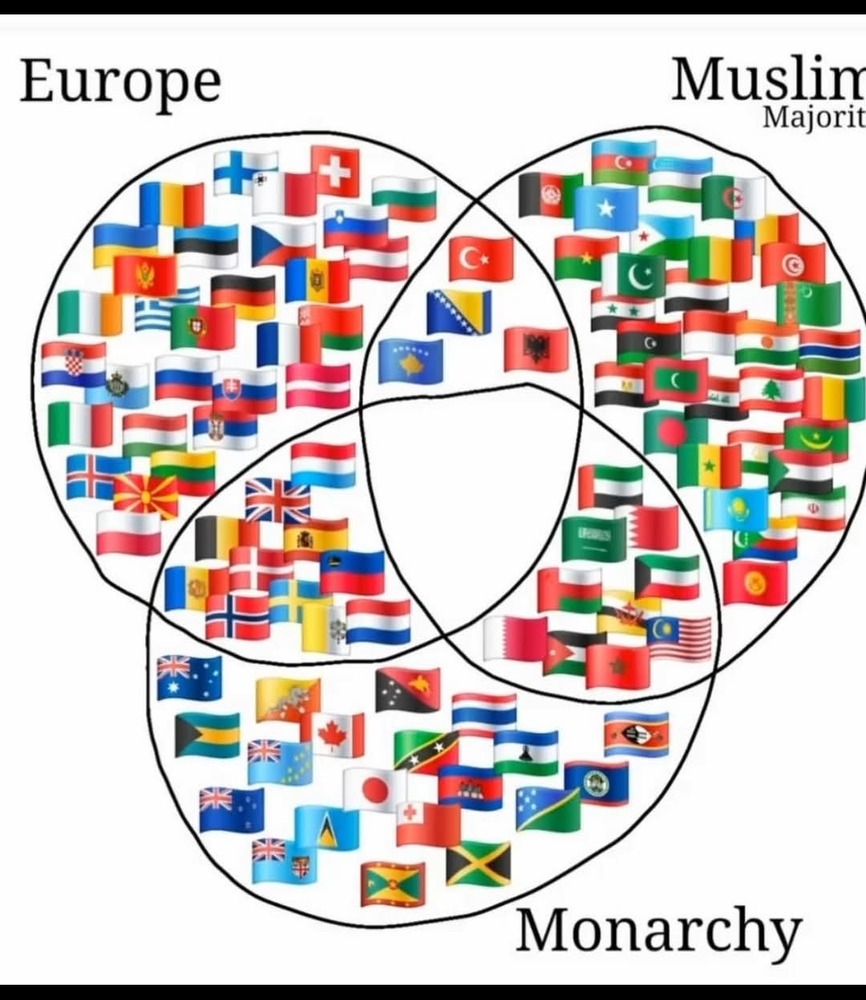
The empty intersection
dv said:

The empty intersection
Our noble king seems to be shared with an awful lot of non-European countries.
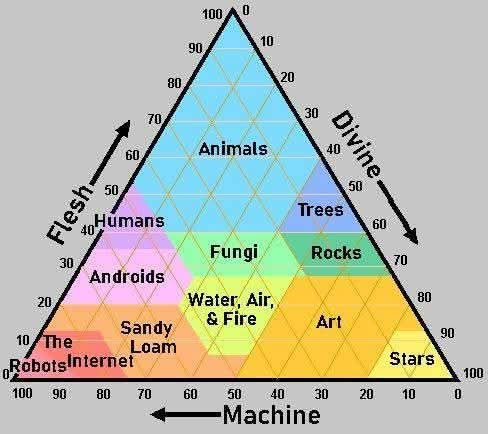
this alternative “flat Earth” map:
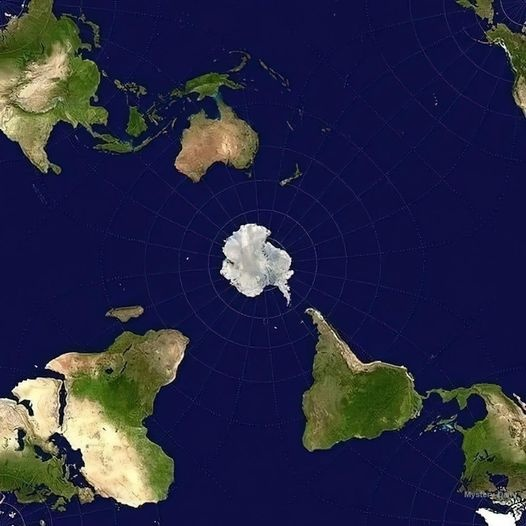
The Rev Dodgson said:
this alternative “flat Earth” map:
I have asked several FE’ers why it has to be the north pole at the centre of their imaginary map and not the south pole, but never got a reply.
The Rev Dodgson said:
this alternative “flat Earth” map:
That’ll have the round earther nutters up in arms.
Spiny Norman said:
The Rev Dodgson said:
this alternative “flat Earth” map:
I have asked several FE’ers why it has to be the north pole at the centre of their imaginary map and not the south pole, but never got a reply.
Australia doesn’t exist. We’re paid actors who live in the US and claim we’re from a fictional land. The evidence for this is that no country can have so many animals which can kill you.
Spiny Norman said:
The Rev Dodgson said:
this alternative “flat Earth” map:
I have asked several FE’ers why it has to be the north pole at the centre of their imaginary map and not the south pole, but never got a reply.
Well now you can tell them. :)
The Rev Dodgson said:
this alternative “flat Earth” map:
:)
Don’t know how valid these numbers are, but I found the 1st and 2nd English speaking countries in the list a bit surprising:

The Rev Dodgson said:
Don’t know how valid these numbers are, but I found the 1st and 2nd English speaking countries in the list a bit surprising:
Which Korea?
The Rev Dodgson said:
Don’t know how valid these numbers are, but I found the 1st and 2nd English speaking countries in the list a bit surprising:
Which Korea?
esselte said:
The Rev Dodgson said:
Don’t know how valid these numbers are, but I found the 1st and 2nd English speaking countries in the list a bit surprising:
Which Korea?
not the evil one.
JudgeMental said:
esselte said:
The Rev Dodgson said:
Don’t know how valid these numbers are, but I found the 1st and 2nd English speaking countries in the list a bit surprising:
Which Korea?
not the evil one.
But

esselte said:
The Rev Dodgson said:
Don’t know how valid these numbers are, but I found the 1st and 2nd English speaking countries in the list a bit surprising:
Which Korea?
I presume the Southern one, but it didn’t say.
I mean all three of the non-Scandinavian European countries are ex-communist states, so maybe they are pretty good at education.
The Rev Dodgson said:
esselte said:
The Rev Dodgson said:
Don’t know how valid these numbers are, but I found the 1st and 2nd English speaking countries in the list a bit surprising:
Which Korea?
I presume the Southern one, but it didn’t say.
I mean all three of the non-Scandinavian European countries are ex-communist states, so maybe they are pretty good at education.
Yeah, the flag would also suggest south.
But it’s a bit weird they just called it “Korea”. I don’t know I’d trust a list like that.
I saw a list once of the Jews who control the media. Top of the list was (Knight Commander of the Order of Saint Gregor the Great) Roman Catholic Rupert Murdoch.
esselte said:
The Rev Dodgson said:
Don’t know how valid these numbers are, but I found the 1st and 2nd English speaking countries in the list a bit surprising:
Which Korea?
going by the flag, the South.
The Rev Dodgson said:
Don’t know how valid these numbers are, but I found the 1st and 2nd English speaking countries in the list a bit surprising:
The source, GEMS Education Solutions, appears in cursory research to be an Indian version of Trump University.
esselte said:
The Rev Dodgson said:
Don’t know how valid these numbers are, but I found the 1st and 2nd English speaking countries in the list a bit surprising:
The source, GEMS Education Solutions, appears in cursory research to be an Indian version of Trump University.
That’s a relief.
Don’t want those Kiwis beating us at education efficiency (whatever that means).
https://www.facebook.com/share/v/16SwRDXXrk/
Timelapse of Earth from space showing the angle of the terminator throughout the year
dv said:
https://www.facebook.com/share/v/16SwRDXXrk/Timelapse of Earth from space showing the angle of the terminator throughout the year
Noice.

https://www.threads.com/@motherearthspace/post/DLRyR1othxb?xmt=AQF04OBwTydblUZPzIg15NzOh2HfBu5lnvCJISNkb4UoPg
Probably shared this before but I still love it.
Plasma rain on the sun.
See earth at top left for scale.
dv said:
https://www.threads.com/@motherearthspace/post/DLRyR1othxb?xmt=AQF04OBwTydblUZPzIg15NzOh2HfBu5lnvCJISNkb4UoPgProbably shared this before but I still love it.
Plasma rain on the sun.
See earth at top left for scale.
Love it!
Thanks for sharing.
Awesome.
:)
dv said:
https://www.threads.com/@motherearthspace/post/DLRyR1othxb?xmt=AQF04OBwTydblUZPzIg15NzOh2HfBu5lnvCJISNkb4UoPgProbably shared this before but I still love it.
Plasma rain on the sun.
See earth at top left for scale.
It’s like rain…
Bogsnorkler said:
dv said:
https://www.threads.com/@motherearthspace/post/DLRyR1othxb?xmt=AQF04OBwTydblUZPzIg15NzOh2HfBu5lnvCJISNkb4UoPgProbably shared this before but I still love it.
Plasma rain on the sun.
See earth at top left for scale.
It’s like rain…
Those plasma drops must be moving at a significant % of the speed of light as they fall towards the sun.
The Rev Dodgson said:
Bogsnorkler said:
dv said:
https://www.threads.com/@motherearthspace/post/DLRyR1othxb?xmt=AQF04OBwTydblUZPzIg15NzOh2HfBu5lnvCJISNkb4UoPgProbably shared this before but I still love it.
Plasma rain on the sun.
See earth at top left for scale.
It’s like rain…
Those plasma drops must be moving at a significant % of the speed of light as they fall towards the sun.
look at the rate the clock is going.
The Rev Dodgson said:
Bogsnorkler said:
dv said:
https://www.threads.com/@motherearthspace/post/DLRyR1othxb?xmt=AQF04OBwTydblUZPzIg15NzOh2HfBu5lnvCJISNkb4UoPgProbably shared this before but I still love it.
Plasma rain on the sun.
See earth at top left for scale.
It’s like rain…
Those plasma drops must be moving at a significant % of the speed of light as they fall towards the sun.
You can see the clockface showing the passage of time. This video appears to be about 2000 times sped up.
Bogsnorkler said:
The Rev Dodgson said:
Bogsnorkler said:It’s like rain…
Those plasma drops must be moving at a significant % of the speed of light as they fall towards the sun.
look at the rate the clock is going.
Didn’t notice the clock :)
Still quite fast then, but nowhere near the speed of the photons.
At this time of year, the sun sets in Rio de Janeira before London.
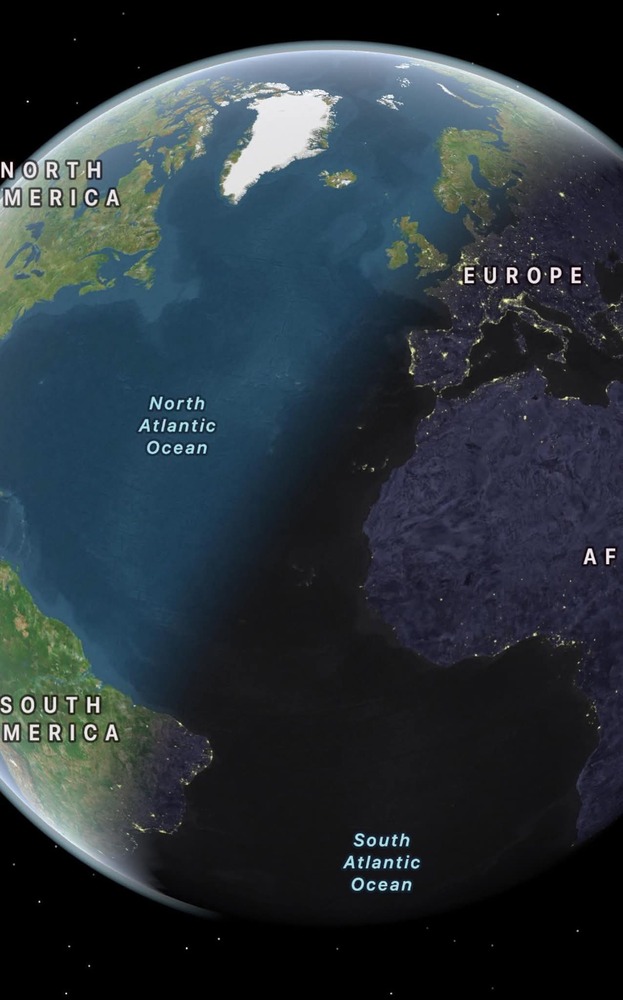
From my Quora reading:

Now it seems to me that saying a limit tends to infinity is exactly the same as saying there is no upper limit, and this is perfectly reasonable, but then I’m not a mathemagician, so what do others here think?
The Rev Dodgson said:
From my Quora reading:
Now it seems to me that saying a limit tends to infinity is exactly the same as saying there is no upper limit, and this is perfectly reasonable, but then I’m not a mathemagician, so what do others here think?
Here’s the sum of everything I know about mathematical limits
https://www.youtube.com/watch?v=SaKjhk4P8_o from 1.29
https://www.facebook.com/share/r/1Aof9AXdvH/
Sinister
dv said:
https://www.facebook.com/share/r/1Aof9AXdvH/Sinister
For me especially so, as the guy looks very like Matthew V, who is no longer with us.
Michael V said:
dv said:
https://www.facebook.com/share/r/1Aof9AXdvH/Sinister
For me especially so, as the guy looks very like Matthew V, who is no longer with us.
:(
Sends hugs.
roughbarked said:
Michael V said:
dv said:
https://www.facebook.com/share/r/1Aof9AXdvH/Sinister
For me especially so, as the guy looks very like Matthew V, who is no longer with us.
:(
Sends hugs.
Ta.
this article from NS on the anthropic principle. I post it hear partly because it has a reference to our mates Cusp and Brendan’s mate Luke Barnes, but it is also a good example of how the one true anthropic principle is contaminated by the nonsensical “strong” anthropic principle (or the anti-anthropic principle, as I prefer to call it).
Why are the physical constants of the universe so perfect for life?
Conditions in our little pocket of the universe seem to be just right for life – and the much-debated anthropic principle forces us to wonder why
By Leah Crane
23 June 2025

When we look out into the universe, we know it can support life – if it couldn’t, we wouldn’t exist. This has been stated in different ways over the years, but the essential thrust makes up the core of a philosophical argument known as the anthropic principle. It sounds obvious, even tautological, but it isn’t quite as simple as that.
To get your head around it, start with what scientists call the fine-tuning problem, the fact our universe seems perfectly balanced on the knife’s edge of habitability. Many fundamental constants, from the mass of a neutron to the strength of gravity, must have very specific values for life to be possible. “Some of these constants, if you make them too large, you just destabilise every atom,” says Luke Barnes at Western Sydney University in Australia.
The anthropic principle began as an attempt to explain why the universe is in this seemingly improbable state, and it boils down to a simple idea: the universe has to be this way, or else we wouldn’t be here to observe it.
There are two main formulations of the principle, both of which were set out in a 1986 book by cosmologist-mathematicians John Barrow and Frank Tipler. The weak principle states that because life exists, the universe’s fundamental constants are – at least here and now – in the range that allows life to develop. The strong principle adds the powerful statement that the fundamental constants must have values in that range because they are consistent with life existing. The “must” is important, as it can be taken as implying that the universe exists in order to support life.
If the weak principle is “I heard a tree fall in the forest, and therefore I must be in a place where trees can grow”, the strong principle says “A tree has fallen nearby, and therefore this planet was destined to have forests all along.”

For scientists today, the weak anthropic principle serves as a reminder of possible biases in observations of the cosmos, particularly if it isn’t the same everywhere. “If we live in a universe that is different from place to place, then we will naturally find ourselves in a place that has some specific conditions conducive to life,” says Sean Carroll at Johns Hopkins University in Maryland.
As for the strong version of the principle, there are physicists who consider it useful too, Barnes among them. He works on developing different flavours of multiverse models and sees the strong principle as a handy guide. It implies that, within a multiverse, there is a 100 per cent chance of at least one universe forming that is conducive to life. So, for any given multiverse model, the closer that chance is to 100 per cent, the more plausible it is. If the probability is, say, around 50 per cent, Barnes sees that as a good omen for the model’s veracity. “But if it’s one-in-a-squillion, then that’s a problem,” he says.
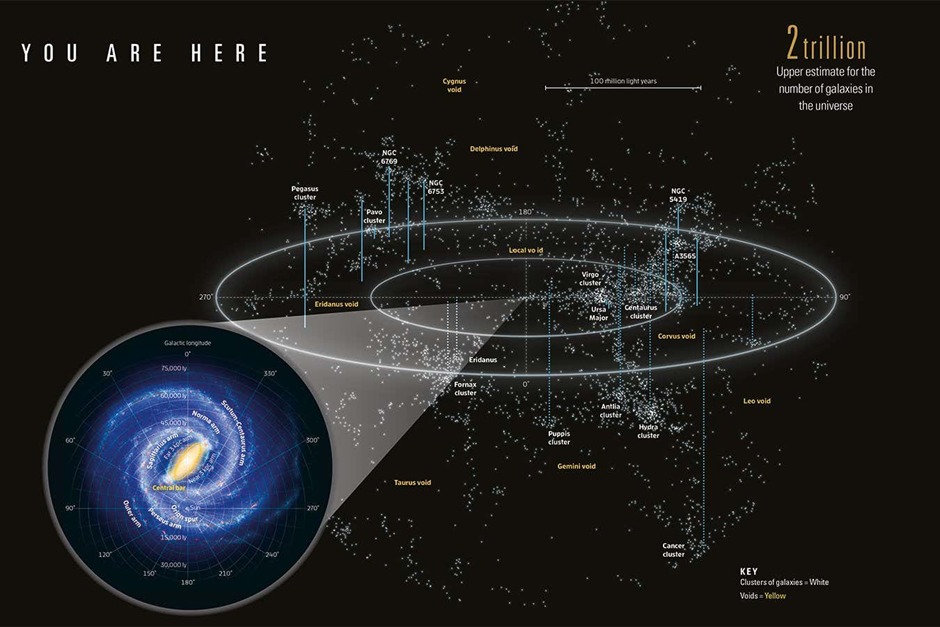
In truth, however, most physicists write off the strong principle as simply too strong. It suggests the universe is deterministic; that life was always certain to emerge, according to Elliott Sober at the University of Wisconsin–Madison. “But that probability could have been tiny and life could have still arisen, and the observations would be the same.”
Where does that leave us? The strong principle does, on the surface, provide an answer to the fine-tuning problem – but that answer is widely considered unreasonable. On the other hand, while the weak principle doesn’t provide a reason why the constants of our universe are so finely tuned, it is a useful tool for researchers. As principles go, this one is rather slippery
The Rev Dodgson said:
this article from NS on the anthropic principle. I post it hear partly because it has a reference to our mates Cusp and Brendan’s mate Luke Barnes, but it is also a good example of how the one true anthropic principle is contaminated by the nonsensical “strong” anthropic principle (or the anti-anthropic principle, as I prefer to call it).Why are the physical constants of the universe so perfect for life?
Conditions in our little pocket of the universe seem to be just right for life – and the much-debated anthropic principle forces us to wonder why
By Leah Crane
23 June 2025
When we look out into the universe, we know it can support life – if it couldn’t, we wouldn’t exist. This has been stated in different ways over the years, but the essential thrust makes up the core of a philosophical argument known as the anthropic principle. It sounds obvious, even tautological, but it isn’t quite as simple as that.
To get your head around it, start with what scientists call the fine-tuning problem, the fact our universe seems perfectly balanced on the knife’s edge of habitability. Many fundamental constants, from the mass of a neutron to the strength of gravity, must have very specific values for life to be possible. “Some of these constants, if you make them too large, you just destabilise every atom,” says Luke Barnes at Western Sydney University in Australia.
The anthropic principle began as an attempt to explain why the universe is in this seemingly improbable state, and it boils down to a simple idea: the universe has to be this way, or else we wouldn’t be here to observe it.
There are two main formulations of the principle, both of which were set out in a 1986 book by cosmologist-mathematicians John Barrow and Frank Tipler. The weak principle states that because life exists, the universe’s fundamental constants are – at least here and now – in the range that allows life to develop. The strong principle adds the powerful statement that the fundamental constants must have values in that range because they are consistent with life existing. The “must” is important, as it can be taken as implying that the universe exists in order to support life.
If the weak principle is “I heard a tree fall in the forest, and therefore I must be in a place where trees can grow”, the strong principle says “A tree has fallen nearby, and therefore this planet was destined to have forests all along.”
For scientists today, the weak anthropic principle serves as a reminder of possible biases in observations of the cosmos, particularly if it isn’t the same everywhere. “If we live in a universe that is different from place to place, then we will naturally find ourselves in a place that has some specific conditions conducive to life,” says Sean Carroll at Johns Hopkins University in Maryland.
As for the strong version of the principle, there are physicists who consider it useful too, Barnes among them. He works on developing different flavours of multiverse models and sees the strong principle as a handy guide. It implies that, within a multiverse, there is a 100 per cent chance of at least one universe forming that is conducive to life. So, for any given multiverse model, the closer that chance is to 100 per cent, the more plausible it is. If the probability is, say, around 50 per cent, Barnes sees that as a good omen for the model’s veracity. “But if it’s one-in-a-squillion, then that’s a problem,” he says.
In truth, however, most physicists write off the strong principle as simply too strong. It suggests the universe is deterministic; that life was always certain to emerge, according to Elliott Sober at the University of Wisconsin–Madison. “But that probability could have been tiny and life could have still arisen, and the observations would be the same.”
Where does that leave us? The strong principle does, on the surface, provide an answer to the fine-tuning problem – but that answer is widely considered unreasonable. On the other hand, while the weak principle doesn’t provide a reason why the constants of our universe are so finely tuned, it is a useful tool for researchers. As principles go, this one is rather slippery
I’m still sceptical about there being a “fine-tuning problem”.
Bubblecar said:
The Rev Dodgson said:
this article from NS on the anthropic principle. I post it hear partly because it has a reference to our mates Cusp and Brendan’s mate Luke Barnes, but it is also a good example of how the one true anthropic principle is contaminated by the nonsensical “strong” anthropic principle (or the anti-anthropic principle, as I prefer to call it).Why are the physical constants of the universe so perfect for life?
Conditions in our little pocket of the universe seem to be just right for life – and the much-debated anthropic principle forces us to wonder why
By Leah Crane
23 June 2025
When we look out into the universe, we know it can support life – if it couldn’t, we wouldn’t exist. This has been stated in different ways over the years, but the essential thrust makes up the core of a philosophical argument known as the anthropic principle. It sounds obvious, even tautological, but it isn’t quite as simple as that.
To get your head around it, start with what scientists call the fine-tuning problem, the fact our universe seems perfectly balanced on the knife’s edge of habitability. Many fundamental constants, from the mass of a neutron to the strength of gravity, must have very specific values for life to be possible. “Some of these constants, if you make them too large, you just destabilise every atom,” says Luke Barnes at Western Sydney University in Australia.
The anthropic principle began as an attempt to explain why the universe is in this seemingly improbable state, and it boils down to a simple idea: the universe has to be this way, or else we wouldn’t be here to observe it.
There are two main formulations of the principle, both of which were set out in a 1986 book by cosmologist-mathematicians John Barrow and Frank Tipler. The weak principle states that because life exists, the universe’s fundamental constants are – at least here and now – in the range that allows life to develop. The strong principle adds the powerful statement that the fundamental constants must have values in that range because they are consistent with life existing. The “must” is important, as it can be taken as implying that the universe exists in order to support life.
If the weak principle is “I heard a tree fall in the forest, and therefore I must be in a place where trees can grow”, the strong principle says “A tree has fallen nearby, and therefore this planet was destined to have forests all along.”
For scientists today, the weak anthropic principle serves as a reminder of possible biases in observations of the cosmos, particularly if it isn’t the same everywhere. “If we live in a universe that is different from place to place, then we will naturally find ourselves in a place that has some specific conditions conducive to life,” says Sean Carroll at Johns Hopkins University in Maryland.
As for the strong version of the principle, there are physicists who consider it useful too, Barnes among them. He works on developing different flavours of multiverse models and sees the strong principle as a handy guide. It implies that, within a multiverse, there is a 100 per cent chance of at least one universe forming that is conducive to life. So, for any given multiverse model, the closer that chance is to 100 per cent, the more plausible it is. If the probability is, say, around 50 per cent, Barnes sees that as a good omen for the model’s veracity. “But if it’s one-in-a-squillion, then that’s a problem,” he says.
In truth, however, most physicists write off the strong principle as simply too strong. It suggests the universe is deterministic; that life was always certain to emerge, according to Elliott Sober at the University of Wisconsin–Madison. “But that probability could have been tiny and life could have still arisen, and the observations would be the same.”
Where does that leave us? The strong principle does, on the surface, provide an answer to the fine-tuning problem – but that answer is widely considered unreasonable. On the other hand, while the weak principle doesn’t provide a reason why the constants of our universe are so finely tuned, it is a useful tool for researchers. As principles go, this one is rather slippery
I’m still sceptical about there being a “fine-tuning problem”.
Me too.
Even if the properties of matter actually do vary between different universes, and there are say only one in a billion that are suitable for life, and even if only one in a billion of that group actually develop complex life, and only one in a billion of those have intelligent life capable of discussing abstract questions, every one of those incredibly rare beings will ponder why the properties of their particular universe allow them to live, and some will realise that if the properties were not such as to allow it, they would not be there to wonder about it.
And that’s all that needs to be said on the matter.
The Rev Dodgson said:
Bubblecar said:
The Rev Dodgson said:
this article from NS on the anthropic principle. I post it hear partly because it has a reference to our mates Cusp and Brendan’s mate Luke Barnes, but it is also a good example of how the one true anthropic principle is contaminated by the nonsensical “strong” anthropic principle (or the anti-anthropic principle, as I prefer to call it).Why are the physical constants of the universe so perfect for life?
Conditions in our little pocket of the universe seem to be just right for life – and the much-debated anthropic principle forces us to wonder why
By Leah Crane
23 June 2025
When we look out into the universe, we know it can support life – if it couldn’t, we wouldn’t exist. This has been stated in different ways over the years, but the essential thrust makes up the core of a philosophical argument known as the anthropic principle. It sounds obvious, even tautological, but it isn’t quite as simple as that.
To get your head around it, start with what scientists call the fine-tuning problem, the fact our universe seems perfectly balanced on the knife’s edge of habitability. Many fundamental constants, from the mass of a neutron to the strength of gravity, must have very specific values for life to be possible. “Some of these constants, if you make them too large, you just destabilise every atom,” says Luke Barnes at Western Sydney University in Australia.
The anthropic principle began as an attempt to explain why the universe is in this seemingly improbable state, and it boils down to a simple idea: the universe has to be this way, or else we wouldn’t be here to observe it.
There are two main formulations of the principle, both of which were set out in a 1986 book by cosmologist-mathematicians John Barrow and Frank Tipler. The weak principle states that because life exists, the universe’s fundamental constants are – at least here and now – in the range that allows life to develop. The strong principle adds the powerful statement that the fundamental constants must have values in that range because they are consistent with life existing. The “must” is important, as it can be taken as implying that the universe exists in order to support life.
If the weak principle is “I heard a tree fall in the forest, and therefore I must be in a place where trees can grow”, the strong principle says “A tree has fallen nearby, and therefore this planet was destined to have forests all along.”
For scientists today, the weak anthropic principle serves as a reminder of possible biases in observations of the cosmos, particularly if it isn’t the same everywhere. “If we live in a universe that is different from place to place, then we will naturally find ourselves in a place that has some specific conditions conducive to life,” says Sean Carroll at Johns Hopkins University in Maryland.
As for the strong version of the principle, there are physicists who consider it useful too, Barnes among them. He works on developing different flavours of multiverse models and sees the strong principle as a handy guide. It implies that, within a multiverse, there is a 100 per cent chance of at least one universe forming that is conducive to life. So, for any given multiverse model, the closer that chance is to 100 per cent, the more plausible it is. If the probability is, say, around 50 per cent, Barnes sees that as a good omen for the model’s veracity. “But if it’s one-in-a-squillion, then that’s a problem,” he says.
In truth, however, most physicists write off the strong principle as simply too strong. It suggests the universe is deterministic; that life was always certain to emerge, according to Elliott Sober at the University of Wisconsin–Madison. “But that probability could have been tiny and life could have still arisen, and the observations would be the same.”
Where does that leave us? The strong principle does, on the surface, provide an answer to the fine-tuning problem – but that answer is widely considered unreasonable. On the other hand, while the weak principle doesn’t provide a reason why the constants of our universe are so finely tuned, it is a useful tool for researchers. As principles go, this one is rather slippery
I’m still sceptical about there being a “fine-tuning problem”.
Me too.
Even if the properties of matter actually do vary between different universes, and there are say only one in a billion that are suitable for life, and even if only one in a billion of that group actually develop complex life, and only one in a billion of those have intelligent life capable of discussing abstract questions, every one of those incredibly rare beings will ponder why the properties of their particular universe allow them to live, and some will realise that if the properties were not such as to allow it, they would not be there to wonder about it.
And that’s all that needs to be said on the matter.
Since we don’t have enough information to calculate any of those figures anyway, there’s really no reason to perceive a “fine-tuning problem”.
It’s worry over nothing :)
I have found the fine tuning control, its a brass knob on a black box.
Tau.Neutrino said:
I have found the fine tuning control, its a brass knob on a black box.
Well don’t bloody touch it!
My Quora reading today told me that there are about 30,000 Christian denominations, and I thought that sounded like bullshit, so I asked the bingbot, which took me to https://www.christianwebsite.com/how-many-denominations-of-christianity-2024/ which told me there are actually 45,000.
So there you.
The Rev Dodgson said:
My Quora reading today told me that there are about 30,000 Christian denominations, and I thought that sounded like bullshit, so I asked the bingbot, which took me to https://www.christianwebsite.com/how-many-denominations-of-christianity-2024/ which told me there are actually 45,000.So there you.
There’s bound to be one just right for your hair type.
The Rev Dodgson said:
My Quora reading today told me that there are about 30,000 Christian denominations, and I thought that sounded like bullshit, so I asked the bingbot, which took me to https://www.christianwebsite.com/how-many-denominations-of-christianity-2024/ which told me there are actually 45,000.So there you.
and here was I telling the JW’s that there were over 3,000 cersions of Christianity.
roughbarked said:
The Rev Dodgson said:
My Quora reading today told me that there are about 30,000 Christian denominations, and I thought that sounded like bullshit, so I asked the bingbot, which took me to https://www.christianwebsite.com/how-many-denominations-of-christianity-2024/ which told me there are actually 45,000.So there you.
and here was I telling the JW’s that there were over 3,000 cersions of Christianity.
It seems you were right.
Bubblecar said:
The Rev Dodgson said:
My Quora reading today told me that there are about 30,000 Christian denominations, and I thought that sounded like bullshit, so I asked the bingbot, which took me to https://www.christianwebsite.com/how-many-denominations-of-christianity-2024/ which told me there are actually 45,000.So there you.
There’s bound to be one just right for your hair type.
I’m going for the Jansenists, who included Pascal amongst their followers.
Allegedly he just made up his famous Wager to keep the Christian authorities happy, because being a Jansenist was not approved of.
The Rev Dodgson said:
My Quora reading today told me that there are about 30,000 Christian denominations, and I thought that sounded like bullshit, so I asked the bingbot, which took me to https://www.christianwebsite.com/how-many-denominations-of-christianity-2024/ which told me there are actually 45,000.So there you.
splitters!!!
From a random Quora post:
“Atheists don’t believe there is sufficient evidence to warrant belief in any gods. That is not the same thing at all as believing there are no gods.”
People there say that sort of thing all the time, but I don’t get it.
Not believing that something exists is exactly the same as believing that something doesn’t exist.
If you “believe” something that means on the balance of probability you think it is likely to be true. It doesn’t imply any absolute certainty.
Some people may regard a given belief as an absolute certainty of course, but that is not a requirement.
The Rev Dodgson said:
From a random Quora post:“Atheists don’t believe there is sufficient evidence to warrant belief in any gods. That is not the same thing at all as believing there are no gods.”
People there say that sort of thing all the time, but I don’t get it.
Not believing that something exists is exactly the same as believing that something doesn’t exist.
If you “believe” something that means on the balance of probability you think it is likely to be true. It doesn’t imply any absolute certainty.
Some people may regard a given belief as an absolute certainty of course, but that is not a requirement.
Yes, I’m an atheist and I believe gods are a human-created fiction, i.e., purely imaginary. Which means they don’t really exist.
British photographer Levon Biss’s careful cataloguing of the eggs of phasmids (stick bugs). As in their hatched form, phasmid eggs show an incredible level of camouflage, mimicking the detritus of the plants they commonly live upon.




kii said:
British photographer Levon Biss’s careful cataloguing of the eggs of phasmids (stick bugs). As in their hatched form, phasmid eggs show an incredible level of camouflage, mimicking the detritus of the plants they commonly live upon.
They’re onto something for sure, I’m not sure what drugs they are using but I like they way they reflect their environment.
Tau.Neutrino said:
kii said:
British photographer Levon Biss’s careful cataloguing of the eggs of phasmids (stick bugs). As in their hatched form, phasmid eggs show an incredible level of camouflage, mimicking the detritus of the plants they commonly live upon.
They’re onto something for sure, I’m not sure what drugs they are using but I like they way they reflect their environment.
What?
Tau.Neutrino said:
kii said:
British photographer Levon Biss’s careful cataloguing of the eggs of phasmids (stick bugs). As in their hatched form, phasmid eggs show an incredible level of camouflage, mimicking the detritus of the plants they commonly live upon.
They’re onto something for sure, I’m not sure what drugs they are using but I like they way they reflect their environment.
They remind me of African Art.

A 1,800 kg cylinder of Cheddar cheese.
Spiny Norman said:

A 1,800 kg cylinder of Cheddar cheese.
I suppose the banana is for scale.
Spiny Norman said:

A 1,800 kg cylinder of Cheddar cheese.
Need a lotta bickes for that, hey what but!!!!
Spiny Norman said:

A 1,800 kg cylinder of Cheddar cheese.
I like how the cracker has slots for a forklift.
From my Quora reading:
Mark Twain claimed that:
Of all the animals, man is the only one that is cruel. He is the only one that inflicts pain for the pleasure of doing it.
But the reality is that our ability to live and work together in crowded cities is an amazing accomplishment. No other ape can do that. Even residents of high-crime cities in the Americas go for days at a time without getting bitten and wounded by another person. That would astonish a chimpanzee.
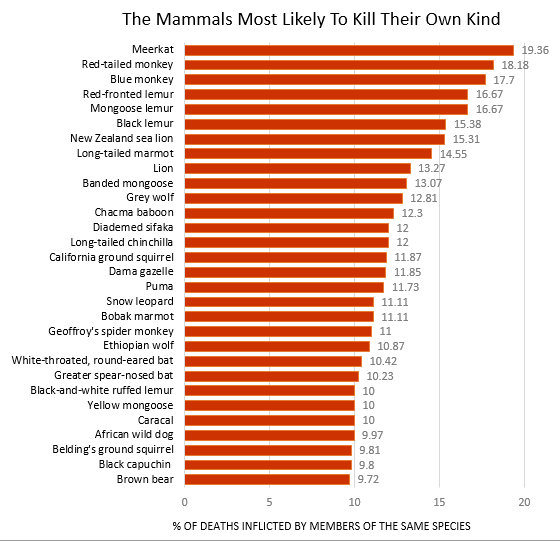

these statements on different types of infinity:
“The real numbers “seem” intuitive until you start poking around in them. In secondary school, we get used to the idea of rational numbers (i.e., fractions) and that other numbers are irrational (e.g., pi or the square root of two).
But there is strangeness lurking in those real numbers. It is not necessarily intuitive that the rational numbers are countably infinite, but the real numbers are uncountable. What it even means for something to be “uncountably infinite” is not particularly intuitive.
The idea that there are infinitely many rational numbers between any two real numbers is not intuitive. When did you first learn this, and did it seem obvious to you?”
I have a reverse lack of intuition. The idea of something being “countably infinite” seems very strange to me. Surely all infinite sets are uncountable. Isn’t that what it means to be infinite?
The idea that there are infinitely many rational numbers between any two real numbers seems perfectly intuitive to me. I have no idea when I first learned this, but it now seems bleeding obvious.
https://www.instagram.com/reel/DLpZkKNo-QQ/?igsh=NTU4NWE2cmd3ZG91
The Forest Jar
Playground rules
Saturn’s moon Daphnis looks like a dim sim, and in fact scientists do believe it is actually a giant dim sim, probably inserted into Saturn’s rings quite recently by cheeky aliens.
Here we see Daphnis stirring up waves in the rings.

Bubblecar said:
Saturn’s moon Daphnis looks like a dim sim, and in fact scientists do believe it is actually a giant dim sim, probably inserted into Saturn’s rings quite recently by cheeky aliens.Here we see Daphnis stirring up waves in the rings.
Nice
dv said:
https://www.instagram.com/reel/DLpZkKNo-QQ/?igsh=NTU4NWE2cmd3ZG91The Forest Jar
Playground rules
https://www.facebook.com/share/r/1CG8ZJnQoz/
Monopoly
Quite a pleasant series, this
https://upload.wikimedia.org/wikipedia/commons/d/d8/Asia_1932.jpg
This map seems hinky but it’s legit
dv said:
https://upload.wikimedia.org/wikipedia/commons/d/d8/Asia_1932.jpgThis map seems hinky but it’s legit
Tibet is spelt rong.
https://www.facebook.com/share/v/16DyeLe8AD/
The origins of the auctioneer’s chant
A Groundswell beefsteak. PNW USA – Pacific North West.
Fasciation?

kii said:
A Groundswell beefsteak. PNW USA – Pacific North West.
Fasciation?
Probably.

One thing I’ve never considered in choosing a sleeping position is the asymmetry of the G.I.T.
dv said:

One thing I’ve never considered in choosing a sleeping position is the asymmetry of the G.I.T.
Me neither, but I do sleep on the left, mostly.
The Rev Dodgson said:
dv said:

One thing I’ve never considered in choosing a sleeping position is the asymmetry of the G.I.T.
Me neither, but I do sleep on the left, mostly.
I start on my right side, and turn over to my left just before really dropping off. But I turn a lot during the night. I’ve never been pregnant, so I’ve not needed to remember, but there is something about which side to sleep on during late pregnancy to avoid squashing a major blood vessel isn’t there?
buffy said:
The Rev Dodgson said:
dv said:

One thing I’ve never considered in choosing a sleeping position is the asymmetry of the G.I.T.
Me neither, but I do sleep on the left, mostly.
I start on my right side, and turn over to my left just before really dropping off. But I turn a lot during the night. I’ve never been pregnant, so I’ve not needed to remember, but there is something about which side to sleep on during late pregnancy to avoid squashing a major blood vessel isn’t there?
Yes. IIRC don’t sleep on the right side to reduce pressure on the inferior vena cava.
By that point, I was sleeping sitting up anyway because I had severe heartburn if I lay down.
Horsemen:
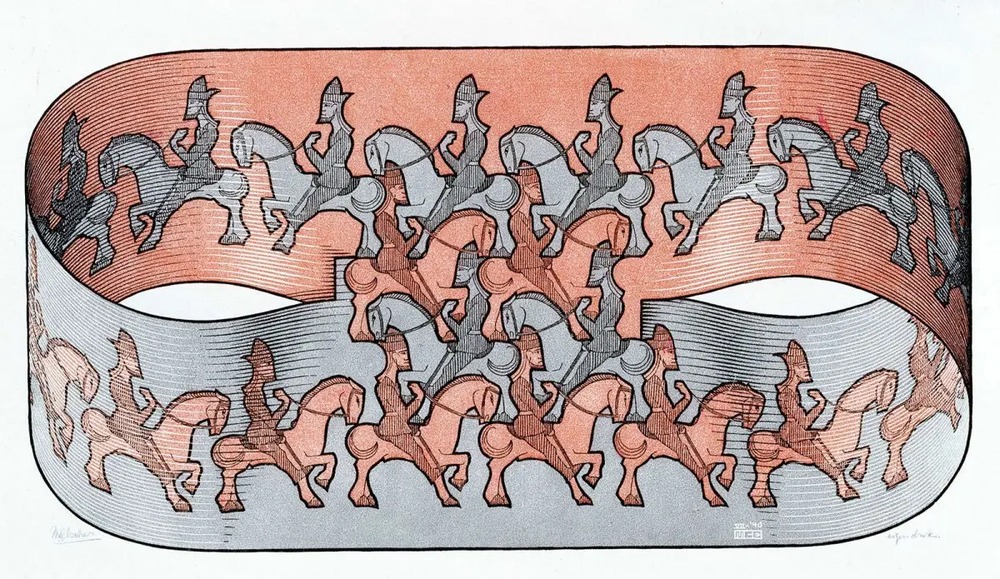
A work of MC Escher
Consider how different kinds of magnetic materials interact at the atomic level.
And you might come up with something new.
this ABC report from 2022:
COVID-19 infection rebounds are rare, but rising in number. What should you do if it happens?
I just had my last anti-viral dose this morning, and I’m feeling OK, but it looks like I should wait a few more days before I head off back into the wider community.
The Rev Dodgson said:
this ABC report from 2022:COVID-19 infection rebounds are rare, but rising in number. What should you do if it happens?
I just had my last anti-viral dose this morning, and I’m feeling OK, but it looks like I should wait a few more days before I head off back into the wider community.
hell with the expense, go viral.
The Rev Dodgson said:
this ABC report from 2022:COVID-19 infection rebounds are rare, but rising in number. What should you do if it happens?
I just had my last anti-viral dose this morning, and I’m feeling OK, but it looks like I should wait a few more days before I head off back into the wider community.
Probably a good idea.

dv said:
Needs workshopping for clarity.
dv said:
is that a baz meatball and spaghetti concoction?
dv said:
Sorry, I can’t read it, even expanded, so there is no way I can consider whatever the notion is.
Michael V said:
dv said:
Sorry, I can’t read it, even expanded, so there is no way I can consider whatever the notion is.
Schematic of the human brain and body as like a computer one.
Witty Rejoinder said:
Michael V said:
dv said:
Sorry, I can’t read it, even expanded, so there is no way I can consider whatever the notion is.
Schematic of the human brain and body as like a computer one.
Ah, thanks.
If you want to escape this universe you will have to think outside of the box.
https://www.facebook.com/share/v/19zRktHqg7/
The Forest Jar – Does anything matter?
these bridges:
https://upload.wikimedia.org/wikipedia/commons/3/37/Comparison_of_notable_bridges_SMIL.svg

I came across this quote this morning and it really resonated with me. It would help our society more if people thought through issues like this.
As a few people may have noticed, I get pissed off with the stereotypical jokey comments made about women. For example the recent post about “rogering a woman”. While this may bring the laughs of a person’s peers, overall it does nothing to help with bigger issues – like domestic violence. It’s not clever, and all it does is give the person a boost to their ego as the people around them focus on their “wit”.
“An 83 year-old man talking about all this “newfangled terminology” around gender identity. At his age, it was a lot to process, and he wanted to talk through it.
There came a point in the conversation in which I stopped responding and started typing. I needed to make sure that I got his words right when I shared them. Because every single one of them lays waste to the idea that generational differences excuse casual bigotry or that those of a certain age are exempt from responsibility.”
“I have to behave in a way that beats down all the stereotypes that I was raised with. My generation was raised very badly in many ways.
There are so many things that I was taught were bad and I have to work on myself to change them and to behave in a way that demonstrates acceptance.
I do it for myself. I have to. I can’t feel comfortable making someone else feel uncomfortable for being who they are. So it’s selfish, really.”
Anyway…

dv said:
Too right.
Peak Warming Man said:
dv said:
Too right.
Too wrong.
this Q&A from Quora:
“Why did humans willingly mate with Neanderthals when they were such dumb, brutish, and ugly creatures?
Well, dumb is a strong word, but they weren’t as smart as humans there is no question about this.”
Is it true that there is no question they were not as smart as humans?
Didn’t they have a similar lifestyle to the Homo Sapiens of the time?
Maybe they were just less aggressive.
The Rev Dodgson said:
this Q&A from Quora:“Why did humans willingly mate with Neanderthals when they were such dumb, brutish, and ugly creatures?
Well, dumb is a strong word, but they weren’t as smart as humans there is no question about this.”
Is it true that there is no question they were not as smart as humans?
Didn’t they have a similar lifestyle to the Homo Sapiens of the time?
Maybe they were just less aggressive.
Some people will shag anything that moves, regardless of perceived attractiveness. A few nips of fermented fruits at the rock bar after watching wrestling one night, they’re anybody’s, ya know?
Divine Angel said:
The Rev Dodgson said:
this Q&A from Quora:“Why did humans willingly mate with Neanderthals when they were such dumb, brutish, and ugly creatures?
Well, dumb is a strong word, but they weren’t as smart as humans there is no question about this.”
Is it true that there is no question they were not as smart as humans?
Didn’t they have a similar lifestyle to the Homo Sapiens of the time?
Maybe they were just less aggressive.
Some people will shag anything that moves, regardless of perceived attractiveness. A few nips of fermented fruits at the rock bar after watching wrestling one night, they’re anybody’s, ya know?
OK, but that doesn’t answer my question :)
The Rev Dodgson said:
this Q&A from Quora:“Why did humans willingly mate with Neanderthals when they were such dumb, brutish, and ugly creatures?
Well, dumb is a strong word, but they weren’t as smart as humans there is no question about this.”
Is it true that there is no question they were not as smart as humans?
Didn’t they have a similar lifestyle to the Homo Sapiens of the time?
Maybe they were just less aggressive.
The cultural remains of Neanderthals suggest they were less technologically versatile and innovative than early modern humans.
They also lived in considerably smaller groups and their bones often display loads of injuries (which suggests to me they were possibly more, not less aggressive than modern humans).
Recent studies also reveal differences in Neanderthal and modern human brains that imply cognitive differences:
>The study involved inserting a Neanderthal brain gene into mice, ferrets and “mini brain” structures called organoids, grown in the lab from human stem cells. The experiments revealed that the Neanderthal version of the gene was linked to slower creation of neurons in the brain’s cortex during development, which scientists said could explain superior cognitive abilities in modern humans.
“Making more neurons sets the basis for higher cognitive function,” said Wieland Huttner, who led the work at the Max-Planck-Institute of Molecular Cell Biology and Genetics. “We think this is the first compelling evidence that modern humans were cognitively better than Neanderthals.”
Study reveals striking differences in brains of modern humans and Neanderthals
The Rev Dodgson said:
Divine Angel said:
The Rev Dodgson said:
this Q&A from Quora:“Why did humans willingly mate with Neanderthals when they were such dumb, brutish, and ugly creatures?
Well, dumb is a strong word, but they weren’t as smart as humans there is no question about this.”
Is it true that there is no question they were not as smart as humans?
Didn’t they have a similar lifestyle to the Homo Sapiens of the time?
Maybe they were just less aggressive.
Some people will shag anything that moves, regardless of perceived attractiveness. A few nips of fermented fruits at the rock bar after watching wrestling one night, they’re anybody’s, ya know?
OK, but that doesn’t answer my question :)
Well, Neanderthals were intelligent in a different way. We know they produced tools, had burial rituals for their dead, and utilised hunting strategies. It seems that homo sapiens were better at adapting to new environments, better at complex language, and developed more diverse tools. Whatever the homo sapiens back then did, gave them the evolutionary advantage to get us here today.
Divine Angel said:
The Rev Dodgson said:
Divine Angel said:Some people will shag anything that moves, regardless of perceived attractiveness. A few nips of fermented fruits at the rock bar after watching wrestling one night, they’re anybody’s, ya know?
OK, but that doesn’t answer my question :)
Well, Neanderthals were intelligent in a different way. We know they produced tools, had burial rituals for their dead, and utilised hunting strategies. It seems that homo sapiens were better at adapting to new environments, better at complex language, and developed more diverse tools. Whatever the homo sapiens back then did, gave them the evolutionary advantage to get us here today.
More aggressive ?
Cymek said:
Divine Angel said:
The Rev Dodgson said:OK, but that doesn’t answer my question :)
Well, Neanderthals were intelligent in a different way. We know they produced tools, had burial rituals for their dead, and utilised hunting strategies. It seems that homo sapiens were better at adapting to new environments, better at complex language, and developed more diverse tools. Whatever the homo sapiens back then did, gave them the evolutionary advantage to get us here today.
More aggressive ?
I suspect the Neanderthals were more aggressively territorial, which made it difficult for the newcomers to avoid conflict.
Bubblecar said:
Cymek said:
Divine Angel said:Well, Neanderthals were intelligent in a different way. We know they produced tools, had burial rituals for their dead, and utilised hunting strategies. It seems that homo sapiens were better at adapting to new environments, better at complex language, and developed more diverse tools. Whatever the homo sapiens back then did, gave them the evolutionary advantage to get us here today.
More aggressive ?
I suspect the Neanderthals were more aggressively territorial, which made it difficult for the newcomers to avoid conflict.
We should have a Neanderthal Victory Day, a day that unites us all but there will be a small minority of throwback knuckle heads demonstrating no doubt.
Bubblecar said:
The Rev Dodgson said:
this Q&A from Quora:“Why did humans willingly mate with Neanderthals when they were such dumb, brutish, and ugly creatures?
Well, dumb is a strong word, but they weren’t as smart as humans there is no question about this.”
Is it true that there is no question they were not as smart as humans?
Didn’t they have a similar lifestyle to the Homo Sapiens of the time?
Maybe they were just less aggressive.
The cultural remains of Neanderthals suggest they were less technologically versatile and innovative than early modern humans.
They also lived in considerably smaller groups and their bones often display loads of injuries (which suggests to me they were possibly more, not less aggressive than modern humans).
Recent studies also reveal differences in Neanderthal and modern human brains that imply cognitive differences:
>The study involved inserting a Neanderthal brain gene into mice, ferrets and “mini brain” structures called organoids, grown in the lab from human stem cells. The experiments revealed that the Neanderthal version of the gene was linked to slower creation of neurons in the brain’s cortex during development, which scientists said could explain superior cognitive abilities in modern humans.
“Making more neurons sets the basis for higher cognitive function,” said Wieland Huttner, who led the work at the Max-Planck-Institute of Molecular Cell Biology and Genetics. “We think this is the first compelling evidence that modern humans were cognitively better than Neanderthals.”
Study reveals striking differences in brains of modern humans and Neanderthals
I’ll give that a rare VI rating.
That said, I think the opening paragraph sums it up nicely:
“Neanderthals have long been portrayed as our dim-witted, thuggish cousins. Now groundbreaking research has – while not confirmed the stereotype – revealed striking differences in the brain development of modern humans and Neanderthals.”
Disregarding the separation in time
I wonder if earlier hominids species and modern humans could have interbreed.
Cymek said:
Disregarding the separation in timeI wonder if earlier hominids species and modern humans could have interbreed.
Seems certain that modern humans would be able to breed with Neanderthals.
Hn and Hs diverged some 500000 years ago, and were still interbreeding 40000 years ago. It doesn’t seem likely that an extra 4.3% of divergence would close that gate.

dv said:
True.
Amazing.
dv said:
… and all the presidents in between!
He was king from age 4 months to his death aged 83.
dv said:
Long live the King.
The Sahara mainly has a rocky surface. Dunes only cover about 20% of the area, despite duney areas mainly being what it shown in movies and TV shows.
dv said:
The Sahara mainly has a rocky surface. Dunes only cover about 20% of the area, despite duney areas mainly being what it shown in movies and TV shows.
One of the many mushroom-like sandstone formations in the Sahara desert, sculpted by wind and here providing welcome shade.

From We Rate Dogs Facebook page:
This is Horus. He got a lot of attention on a recent flight in Mexico. Clearly the other passengers have never flown with someone so handsome. 14/10 we’re told he was very well behaved.
(For big dogs traveling on planes, typically their human has purchased a seat or row for their dog, contacted the airline well in advance, obtained required documentation, and trained and prepared their dog for the journey.)
kii said:
From We Rate Dogs Facebook page:This is Horus. He got a lot of attention on a recent flight in Mexico. Clearly the other passengers have never flown with someone so handsome. 14/10 we’re told he was very well behaved.
(For big dogs traveling on planes, typically their human has purchased a seat or row for their dog, contacted the airline well in advance, obtained required documentation, and trained and prepared their dog for the journey.)
Great Danes are so beautiful and such heart breakers. Boxers are bad enough, lasting 10-13 years. But Danes do about 6 and then you go through the loss.
Bubblecar said:
dv said:
The Sahara mainly has a rocky surface. Dunes only cover about 20% of the area, despite duney areas mainly being what it shown in movies and TV shows.
One of the many mushroom-like sandstone formations in the Sahara desert, sculpted by wind and here providing welcome shade.
All that sand has to come from somewhere.
buffy said:
kii said:
From We Rate Dogs Facebook page:This is Horus. He got a lot of attention on a recent flight in Mexico. Clearly the other passengers have never flown with someone so handsome. 14/10 we’re told he was very well behaved.
(For big dogs traveling on planes, typically their human has purchased a seat or row for their dog, contacted the airline well in advance, obtained required documentation, and trained and prepared their dog for the journey.)Great Danes are so beautiful and such heart breakers. Boxers are bad enough, lasting 10-13 years. But Danes do about 6 and then you go through the loss.
Yes. Charcoal (our Great Dane) died when he was eight. He was such a lovely dog. And huge. Very huge, even for a Great Dane. He could sit and put his paws on my shoulders when I was standing.
Michael V said:
buffy said:
kii said:
From We Rate Dogs Facebook page:This is Horus. He got a lot of attention on a recent flight in Mexico. Clearly the other passengers have never flown with someone so handsome. 14/10 we’re told he was very well behaved.
(For big dogs traveling on planes, typically their human has purchased a seat or row for their dog, contacted the airline well in advance, obtained required documentation, and trained and prepared their dog for the journey.)Great Danes are so beautiful and such heart breakers. Boxers are bad enough, lasting 10-13 years. But Danes do about 6 and then you go through the loss.
Yes. Charcoal (our Great Dane) died when he was eight. He was such a lovely dog. And huge. Very huge, even for a Great Dane. He could sit and put his paws on my shoulders when I was standing.
We pass a house with a great great dane on our afternoon walk. When he’s outside he runs up to the driveway gate to say hello to my little dog, then he runs up to the footpath gate, puts paws on top of the gate, and says hello to me.
The Rev Dodgson said:
Michael V said:
buffy said:Great Danes are so beautiful and such heart breakers. Boxers are bad enough, lasting 10-13 years. But Danes do about 6 and then you go through the loss.
Yes. Charcoal (our Great Dane) died when he was eight. He was such a lovely dog. And huge. Very huge, even for a Great Dane. He could sit and put his paws on my shoulders when I was standing.
We pass a house with a great great dane on our afternoon walk. When he’s outside he runs up to the driveway gate to say hello to my little dog, then he runs up to the footpath gate, puts paws on top of the gate, and says hello to me.
Awww.
From this week’s NS:
“For centuries, we have been missing a vital ingredient in health and medicine – the body clock. Over the past few decades, researchers have discovered that our mood, metabolism, athletic performance and cognitive capabilities vary over a 24-hour period, while a disrupted body clock is implicated in an ever-growing list of health conditions, from type 2 diabetes to cancer. It has also become clear that giving medications or interventions at different times of day can profoundly alter their efficacy and side effects, with more than half of drugs influenced by our internal time-of-day, or circadian, rhythms. “
The Rev Dodgson said:
__
From this week’s NS:“For centuries, we have been missing a vital ingredient in health and medicine – the body clock. Over the past few decades, researchers have discovered that our mood, metabolism, athletic performance and cognitive capabilities vary over a 24-hour period, while a disrupted body clock is implicated in an ever-growing list of health conditions, from type 2 diabetes to cancer. It has also become clear that giving medications or interventions at different times of day can profoundly alter their efficacy and side effects, with more than half of drugs influenced by our internal time-of-day, or circadian, rhythms. “
Makes sense.
My wife and I have never got on better since we sleep in different rooms.
She likes to go to bed early and I like to go late,
I like docos, comedy and sport while the sweetest person I know isn’t happy until she watches a good murder mystery before sleep..
This was in my Facebook memories today. An old word cloud.

kii said:
This was in my Facebook memories today. An old word cloud.
Spooky.
Very young baby opossums aren’t able to open their mouths, their mouths are nearly sealed shut, with just a tiny hole at the front that allows them to latch onto their mother’s teats. They are marsupials. Rescued babies require tube feeding.
Opossums only live for about 1 to 2 years. They eat 1,000s of ticks and fleas each year, and many larger ones are resistant to various snake venoms. This resistance is due to a protein in their blood called Lethal Toxin- Neutralizing Factor (LTNF), which neutralizes the toxins in the venom.
They don’t carry rabies.
This photo seems a tad enhanced, but gosh aren’t they just gorgeous? These rescued bubbas are about the size of your thumb.

kii said:
Very young baby opossums aren’t able to open their mouths, their mouths are nearly sealed shut, with just a tiny hole at the front that allows them to latch onto their mother’s teats. They are marsupials. Rescued babies require tube feeding.Opossums only live for about 1 to 2 years. They eat 1,000s of ticks and fleas each year, and many larger ones are resistant to various snake venoms. This resistance is due to a protein in their blood called Lethal Toxin- Neutralizing Factor (LTNF), which neutralizes the toxins in the venom.
They don’t carry rabies.
This photo seems a tad enhanced, but gosh aren’t they just gorgeous? These rescued bubbas are about the size of your thumb.
They remind me of very young mice. (My sister kept mice as pets when we were teens.)
Michael V said:
kii said:
Very young baby opossums aren’t able to open their mouths, their mouths are nearly sealed shut, with just a tiny hole at the front that allows them to latch onto their mother’s teats. They are marsupials. Rescued babies require tube feeding.Opossums only live for about 1 to 2 years. They eat 1,000s of ticks and fleas each year, and many larger ones are resistant to various snake venoms. This resistance is due to a protein in their blood called Lethal Toxin- Neutralizing Factor (LTNF), which neutralizes the toxins in the venom.
They don’t carry rabies.
This photo seems a tad enhanced, but gosh aren’t they just gorgeous? These rescued bubbas are about the size of your thumb.
They remind me of very young mice. (My sister kept mice as pets when we were teens.)
My eldest son kept mice for a while. We had 2 females to avoid the breeding issues. The girls were kept In a very deep fish tank, open at the top, and no water (obviously). A wild mouse managed to climb/jump/pole vault/fly in and impregnate both of them. We know this because he couldn’t climb/jump/pole vault/fly out of the tank. We caught him and released him across the road next to a stream.
He came back.
Anyway we bartered with a local pet shop ‐ baby mice for food pellets.
We made a meshed lid for the tank, told our 2 cats and the dog that they needed to do their jobs, and eventually stopped keeping mice as pets.
kii said:
Michael V said:
kii said:
Very young baby opossums aren’t able to open their mouths, their mouths are nearly sealed shut, with just a tiny hole at the front that allows them to latch onto their mother’s teats. They are marsupials. Rescued babies require tube feeding.Opossums only live for about 1 to 2 years. They eat 1,000s of ticks and fleas each year, and many larger ones are resistant to various snake venoms. This resistance is due to a protein in their blood called Lethal Toxin- Neutralizing Factor (LTNF), which neutralizes the toxins in the venom.
They don’t carry rabies.
This photo seems a tad enhanced, but gosh aren’t they just gorgeous? These rescued bubbas are about the size of your thumb.
They remind me of very young mice. (My sister kept mice as pets when we were teens.)
My eldest son kept mice for a while. We had 2 females to avoid the breeding issues. The girls were kept In a very deep fish tank, open at the top, and no water (obviously). A wild mouse managed to climb/jump/pole vault/fly in and impregnate both of them. We know this because he couldn’t climb/jump/pole vault/fly out of the tank. We caught him and released him across the road next to a stream.
He came back.
Anyway we bartered with a local pet shop ‐ baby mice for food pellets.
We made a meshed lid for the tank, told our 2 cats and the dog that they needed to do their jobs, and eventually stopped keeping mice as pets.
:)
I see next week’s NS has an article on the ultrafinitists, who want to do away with infinity.
Can’t wait.
I’m in infinite agreement with them.
The Rev Dodgson said:
I see next week’s NS has an article on the ultrafinitists, who want to do away with infinity.Can’t wait.
I’m in infinite agreement with them.
I’m almost there.
The Rev Dodgson said:
I see next week’s NS has an article on the ultrafinitists, who want to do away with infinity.Can’t wait.
I’m in infinite agreement with them.
It is beyond my understanding.
party_pants said:
The Rev Dodgson said:
I see next week’s NS has an article on the ultrafinitists, who want to do away with infinity.Can’t wait.
I’m in infinite agreement with them.
It is beyond my understanding.
I like infinity.
Eczema medication ad, consider the chef.
https://youtu.be/j_3V-qrEnIM?si=JPPCmkFnEpuKA1RO

dv said:
that’s because the current status quo is the ideal status quo
SCIENCE said:
dv said:
that’s because the current status quo is the ideal status quo
Phew!
this question:
Do surreal numbers have any practical use?
If so, what is it?
The Rev Dodgson said:
this question:Do surreal numbers have any practical use?
If so, what is it?
Tamb said:
The Rev Dodgson said:
this question:
Do surreal numbers have any practical use?
If so, what is it?
To give meaning to Salvador Dali’s life.
to troll social SCIENCE forums
Royal Hospital, Chelsea, London.
kii said:
Pensioners in their red uniform are seen working at a table and fashioning artificial flowers from old nylons that have been dyed by the Red Cross.Royal Hospital, Chelsea, London.
Useful hands mean everything to those who can still use them.
roughbarked said:
kii said:
Pensioners in their red uniform are seen working at a table and fashioning artificial flowers from old nylons that have been dyed by the Red Cross.Royal Hospital, Chelsea, London.
Useful hands mean everything to those who can still use them.
Here, try this:
http://www.fortunecookiemessage.com/
kii said:
roughbarked said:
kii said:
Pensioners in their red uniform are seen working at a table and fashioning artificial flowers from old nylons that have been dyed by the Red Cross.Royal Hospital, Chelsea, London.
Useful hands mean everything to those who can still use them.
Here, try this:
http://www.fortunecookiemessage.com/
Why are you sending me a link to a fortune cookis I didn’t buy?
roughbarked said:
kii said:
roughbarked said:Useful hands mean everything to those who can still use them.
Here, try this:
http://www.fortunecookiemessage.com/
Why are you sending me a link to a fortune cookies I didn’t buy?
…
Hands are what they are.
I’m not clicking stray links, if you want to make sense. Speak it.
roughbarked said:
roughbarked said:
kii said:Here, try this:
http://www.fortunecookiemessage.com/
Why are you sending me a link to a fortune cookies I didn’t buy?
…
Hands are what they are.
I’m not clicking stray links, if you want to make sense. Speak it.
You often speak in fortune cookie language.
“If you want to make sense. Speak it.”
kii said:
roughbarked said:
roughbarked said:Why are you sending me a link to a fortune cookies I didn’t buy?
…
Hands are what they are.
I’m not clicking stray links, if you want to make sense. Speak it.
You often speak in fortune cookie language.
“If you want to make sense. Speak it.”
If you want to know why I didn’t know that is because I’ve never bought a fortune cookie,
You talk in foreign tounge.
roughbarked said:
kii said:
roughbarked said:…
Hands are what they are.
I’m not clicking stray links, if you want to make sense. Speak it.
You often speak in fortune cookie language.
“If you want to make sense. Speak it.”
If you want to know why I didn’t know that is because I’ve never bought a fortune cookie,
You talk in foreign tounge.
gu
roughbarked said:
kii said:
roughbarked said:…
Hands are what they are.
I’m not clicking stray links, if you want to make sense. Speak it.
You often speak in fortune cookie language.
“If you want to make sense. Speak it.”
If you want to know why I didn’t know that is because I’ve never bought a fortune cookie,
You talk in foreign tounge.

kii said:
roughbarked said:
kii said:You often speak in fortune cookie language.
“If you want to make sense. Speak it.”
If you want to know why I didn’t know that is because I’ve never bought a fortune cookie,
You talk in foreign tounge.
Yair well?
this Quora Question:
“If someone from 1970 time traveled to 1920 and also 2020, in which would they feel the most lost? Which would seem like the biggest difference in terms of its technology?”
From a very quick scan of the answers it seems that the general consensus is that 2020 would be the most different.
I disagree. Although there are obviously big differences between 1970 and 2020, I don’t think there is anything that would be that surprising to me from 1970, and in some ways I think I would be amazed at how crude some things still were; for instance:
- bloody on-line conferences
- power supplies hardly changed a bit, and still mostly coal powered!
- OK, cars are a bit fancier, but really they have hardly changed at all, and what, self-driving cars are still “just around the corner”
- and as for nuclear fusion power …
Whereas going back to 1920, everything is different, especially for the common man in the street.
What do you think?
The Rev Dodgson said:
this Quora Question:
“If someone from 1970 time traveled to 1920 and also 2020, in which would they feel the most lost? Which would seem like the biggest difference in terms of its technology?”
From a very quick scan of the answers it seems that the general consensus is that 2020 would be the most different.
I disagree. Although there are obviously big differences between 1970 and 2020, I don’t think there is anything that would be that surprising to me from 1970, and in some ways I think I would be amazed at how crude some things still were; for instance:
- bloody on-line conferences
- power supplies hardly changed a bit, and still mostly coal powered!
- OK, cars are a bit fancier, but really they have hardly changed at all, and what, self-driving cars are still “just around the corner”
- and as for nuclear fusion power …Whereas going back to 1920, everything is different, especially for the common man in the street.
What do you think?
how anglocentric
SCIENCE said:
The Rev Dodgson said:
this Quora Question:
“If someone from 1970 time traveled to 1920 and also 2020, in which would they feel the most lost? Which would seem like the biggest difference in terms of its technology?”
From a very quick scan of the answers it seems that the general consensus is that 2020 would be the most different.
I disagree. Although there are obviously big differences between 1970 and 2020, I don’t think there is anything that would be that surprising to me from 1970, and in some ways I think I would be amazed at how crude some things still were; for instance:
- bloody on-line conferences
- power supplies hardly changed a bit, and still mostly coal powered!
- OK, cars are a bit fancier, but really they have hardly changed at all, and what, self-driving cars are still “just around the corner”
- and as for nuclear fusion power …Whereas going back to 1920, everything is different, especially for the common man in the street.
What do you think?
how anglocentric
This is like an insightful time traveller going to the future.
You’d expect technological advances, what you would ask would be has humanity matured and done away with petty squabbles over resources, religion, isms of various types
SCIENCE said:
The Rev Dodgson said:
this Quora Question:
“If someone from 1970 time traveled to 1920 and also 2020, in which would they feel the most lost? Which would seem like the biggest difference in terms of its technology?”
From a very quick scan of the answers it seems that the general consensus is that 2020 would be the most different.
I disagree. Although there are obviously big differences between 1970 and 2020, I don’t think there is anything that would be that surprising to me from 1970, and in some ways I think I would be amazed at how crude some things still were; for instance:
- bloody on-line conferences
- power supplies hardly changed a bit, and still mostly coal powered!
- OK, cars are a bit fancier, but really they have hardly changed at all, and what, self-driving cars are still “just around the corner”
- and as for nuclear fusion power …Whereas going back to 1920, everything is different, especially for the common man in the street.
What do you think?
how anglocentric
Well having been born in an anglo country, and lived in one for all but 6 of my 74 years, why wouldn’t it be anglocentric?
But from my limited experience, I can’t see that it would be any different if it was arabocentric or turkocentric.
Cymek said:
SCIENCE said:The Rev Dodgson said:
this Quora Question:
“If someone from 1970 time traveled to 1920 and also 2020, in which would they feel the most lost? Which would seem like the biggest difference in terms of its technology?”
From a very quick scan of the answers it seems that the general consensus is that 2020 would be the most different.
I disagree. Although there are obviously big differences between 1970 and 2020, I don’t think there is anything that would be that surprising to me from 1970, and in some ways I think I would be amazed at how crude some things still were; for instance:
- bloody on-line conferences
- power supplies hardly changed a bit, and still mostly coal powered!
- OK, cars are a bit fancier, but really they have hardly changed at all, and what, self-driving cars are still “just around the corner”
- and as for nuclear fusion power …Whereas going back to 1920, everything is different, especially for the common man in the street.
What do you think?
how anglocentric
This is like an insightful time traveller going to the future.
You’d expect technological advances, what you would ask would be has humanity matured and done away with petty squabbles over resources, religion, isms of various types
Obv someone going from 1970 and 1920 is not going to be flabbergasted because he already knows what 1920 is like, pretty much.
If the point is that things changed more rapidly in the 50 years starting 1920 than that starting 1970, then it might be better to ask who would be more agape and aghast: someone brought from 1920 to 1970, or someone brought from 1970 to 2020.
It really depends on what kind of tech we are talking about. Cars were not exactly rare in Australia in 1920 but first fellow might be surprised at their abundance in 1970, and might be dismayed at the vanished trams. He’ll be impressed by space travel but it will seem somewhat abstract. Film and television will probably amaze him.
The second fellow will be more impressed by the personal computing and communications revolution. The sheer amount of knowledge that I can access on a handheld device still impresses me. Urban pollution has improved markedly since then so he might be happy with the blueness of the skies in Syduhney or Melbourne.
Cars were not exactly rare in 1920 but
The Queen of the Harbour in her prime. This would be after the bump with HMAS Melbourne in 1970- the repair to the bow shows.
Photo by John Darroch.

kii said:
The Queen of the Harbour in her prime. This would be after the bump with HMAS Melbourne in 1970- the repair to the bow shows.
Photo by John Darroch.
Brings back some memories.
:)

If Tesla’ PE ratio is so high, and their future growth prospects are questionable, to say the least, why are all these analysts recommending “hold”?
The Rev Dodgson said:

If Tesla’ PE ratio is so high, and their future growth prospects are questionable, to say the least, why are all these analysts recommending “hold”?
Perhaps they are expecting an uptick in the near to medium turn.
The Rev Dodgson said:

If Tesla’ PE ratio is so high, and their future growth prospects are questionable, to say the least, why are all these analysts recommending “hold”?
Perhaps they are expecting an uptick in the near to medium term.
The Rev Dodgson said:

If Tesla’ PE ratio is so high, and their future growth prospects are questionable, to say the least, why are all these analysts recommending “hold”?
It’s a full blown personality cult. None of the normal numbers and rational analysis dictate investor behaviour. They have become irrational.
The Rev Dodgson said:

If Tesla’ PE ratio is so high, and their future growth prospects are questionable, to say the least, why are all these analysts recommending “hold”?
Betting against Elon Musk has proven to be a mugs bet to date. TSLA is a ridiculous stock that has consistently outperformed analytical and reasonable considerations.
party_pants said:
The Rev Dodgson said:

If Tesla’ PE ratio is so high, and their future growth prospects are questionable, to say the least, why are all these analysts recommending “hold”?
It’s a full blown personality cult. None of the normal numbers and rational analysis dictate investor behaviour. They have become irrational.
Like bitcoin.
The Rev Dodgson said:

If Tesla’ PE ratio is so high, and their future growth prospects are questionable, to say the least, why are all these analysts recommending “hold”?
Tesla has been working on self-driving technology for longer than most so they are considered a likely contender for this trillion dollar breakthrough.
Witty Rejoinder said:
The Rev Dodgson said:

If Tesla’ PE ratio is so high, and their future growth prospects are questionable, to say the least, why are all these analysts recommending “hold”?
Tesla has been working on self-driving technology for longer than most so they are considered a likely contender for this trillion dollar breakthrough.
Tesla’s reliance on visual data whilst eschewing of RADAR/LIDAR etc tech has resulted in them falling far behind when it comes to self-driving tech. Musk is good at selling the idea of Tesla being the likely contender here, but that is not a realistic appraisement.
Kingy said:
party_pants said:
The Rev Dodgson said:

If Tesla’ PE ratio is so high, and their future growth prospects are questionable, to say the least, why are all these analysts recommending “hold”?
It’s a full blown personality cult. None of the normal numbers and rational analysis dictate investor behaviour. They have become irrational.
Like bitcoin.
No. Like Tesla. Very different beasts.
Tesla is propped up on hype about the “next big thing”. The big idea that boosted their stock back in the 2016-2018 period was the self driving autonomous taxi type stuff. Buyers of the “next model” car would be able to rent out their cars as robotaxis while they were not needing it and make back the coast of purchasing the car within a few months. This was promised to be a million cars by 2020, then 2022 then 2026 etc. Meanwhile the cheap camera only technology Tesla developed has simply not worked. Now they are promising AI technology to do the same thing with a million cars on the road by 2027… and so it goes on. All promise and no delivery so far. Lots of nsaive investors clinging to hope because they have invested so much already.
Bitcoin is a different model.
party_pants said:
Kingy said:
party_pants said:It’s a full blown personality cult. None of the normal numbers and rational analysis dictate investor behaviour. They have become irrational.
Like bitcoin.
No. Like Tesla. Very different beasts.
Tesla is propped up on hype about the “next big thing”. The big idea that boosted their stock back in the 2016-2018 period was the self driving autonomous taxi type stuff. Buyers of the “next model” car would be able to rent out their cars as robotaxis while they were not needing it and make back the coast of purchasing the car within a few months. This was promised to be a million cars by 2020, then 2022 then 2026 etc. Meanwhile the cheap camera only technology Tesla developed has simply not worked. Now they are promising AI technology to do the same thing with a million cars on the road by 2027… and so it goes on. All promise and no delivery so far. Lots of nsaive investors clinging to hope because they have invested so much already.
Bitcoin is a different model.
I was thinking that bitcoin is also an irrational model now.
It was going to be an international wealth transfer system that did not need banks or governments, but ended up being an investor bubble mostly based on the media hype.
Kingy said:
party_pants said:
Kingy said:Like bitcoin.
No. Like Tesla. Very different beasts.
Tesla is propped up on hype about the “next big thing”. The big idea that boosted their stock back in the 2016-2018 period was the self driving autonomous taxi type stuff. Buyers of the “next model” car would be able to rent out their cars as robotaxis while they were not needing it and make back the coast of purchasing the car within a few months. This was promised to be a million cars by 2020, then 2022 then 2026 etc. Meanwhile the cheap camera only technology Tesla developed has simply not worked. Now they are promising AI technology to do the same thing with a million cars on the road by 2027… and so it goes on. All promise and no delivery so far. Lots of nsaive investors clinging to hope because they have invested so much already.
Bitcoin is a different model.
I was thinking that bitcoin is also an irrational model now.
It was going to be an international wealth transfer system that did not need banks or governments, but ended up being an investor bubble mostly based on the media hype.
It is an irrational model for sure. A different style of irrationalism.

https://medshadow.org/the-impact-of-microplastics-cant-be-studied-because-there-is-no-control-group/

dv said:
https://medshadow.org/the-impact-of-microplastics-cant-be-studied-because-there-is-no-control-group/
Someone needs to develop a generic off the shelf control group that can easily be configured for different studies.
Tau.Neutrino said:
dv said:
https://medshadow.org/the-impact-of-microplastics-cant-be-studied-because-there-is-no-control-group/
Someone needs to develop a generic off the shelf control group that can easily be configured for different studies.
bullshit can’t they just grow some humans in a glass bubble and then see
SCIENCE said:
Tau.Neutrino said:
dv said:
https://medshadow.org/the-impact-of-microplastics-cant-be-studied-because-there-is-no-control-group/
Someone needs to develop a generic off the shelf control group that can easily be configured for different studies.
bullshit can’t they just grow some humans in a glass bubble and then see
It would be great growing academics in glass bottles not plastic ones.
Having a control group would speed up international research.
Thousands Of Microplastics Floating In Your Home And Car Are Slowly Damaging Your Lungs: Study
While we live in the Plastics Age, and it may no longer be a huge surprise that we are constantly exposed to microplastics, a new study claims that we might be inhaling 100 times more microplastics in our own homes and cars than scientists had previously estimated. To be more specific, human beings might be inhaling around 68,000 microplastic particles that are not visible to the naked eye inside their homes and cars.
More…
This article is also interesting
Testing found some 2,238 microplastics particles per cubic meter of air inside the cars — much more than the 528 particles found in a similar amount of air from inside homes.
Link to paper
Human exposure to PM10 microplastics in indoor air
Tau.Neutrino said:
SCIENCE said:Tau.Neutrino said:
Someone needs to develop a generic off the shelf control group that can easily be configured for different studies.
bullshit can’t they just grow some humans in a glass bubble and then see
It would be great growing academics in glass bottles not plastic ones.
Having a control group would speed up international research.
Thousands Of Microplastics Floating In Your Home And Car Are Slowly Damaging Your Lungs: Study
While we live in the Plastics Age, and it may no longer be a huge surprise that we are constantly exposed to microplastics, a new study claims that we might be inhaling 100 times more microplastics in our own homes and cars than scientists had previously estimated. To be more specific, human beings might be inhaling around 68,000 microplastic particles that are not visible to the naked eye inside their homes and cars.
More…
This article is also interesting
Testing found some 2,238 microplastics particles per cubic meter of air inside the cars — much more than the 528 particles found in a similar amount of air from inside homes.
Link to paper
Human exposure to PM10 microplastics in indoor air
Some more considerations.
1 having a generic plans for a control group would speed up research
A generic plan would look a schematic diagram
2 as this is a threat to humanity it should be given priority at United Nations level, a control group sethat up there to speed up international research across universities around the world.
3 you could extend control groups to include laboratory research at schools and colleges to validate data or look at new possibilities.
Tau.Neutrino said:
Tau.Neutrino said:
SCIENCE said:bullshit can’t they just grow some humans in a glass bubble and then see
It would be great growing academics in glass bottles not plastic ones.
Having a control group would speed up international research.
Thousands Of Microplastics Floating In Your Home And Car Are Slowly Damaging Your Lungs: Study
While we live in the Plastics Age, and it may no longer be a huge surprise that we are constantly exposed to microplastics, a new study claims that we might be inhaling 100 times more microplastics in our own homes and cars than scientists had previously estimated. To be more specific, human beings might be inhaling around 68,000 microplastic particles that are not visible to the naked eye inside their homes and cars.
More…
This article is also interesting
Testing found some 2,238 microplastics particles per cubic meter of air inside the cars — much more than the 528 particles found in a similar amount of air from inside homes.
Link to paper
Human exposure to PM10 microplastics in indoor air
Some more considerations.
1 having a generic plans for a control group would speed up research
A generic plan would look a schematic diagram
2 as this is a threat to humanity it should be given priority at United Nations level, a control group sethat up there to speed up international research across universities around the world.
3 you could extend control groups to include laboratory research at schools and colleges to validate data or look at new possibilities.
Consider the market for cars 🚗 replacing all the plastic bits with natural bits, would be a boon for the car industry.
Tau.Neutrino said:
Consider the market for cars 🚗 replacing all the plastic bits with natural bits, would be a boon for the car industry.
Is there a lighter weight glass than plastic, that would be great.
For headlights and tail lights.
A light weight wood for door handles.
Tau.Neutrino said:
Tau.Neutrino said:Consider the market for cars 🚗 replacing all the plastic bits with natural bits, would be a boon for the car industry.
Is there a lighter weight glass than plastic, that would be great.
For headlights and tail lights.
A light weight wood for door handles.
I have deteriorating door handle made of plastic.
I have a steering wheel made of plastic that is also deteriorating.
So light wooden ones would be great.
Tau.Neutrino said:
Tau.Neutrino said:
Tau.Neutrino said:Consider the market for cars 🚗 replacing all the plastic bits with natural bits, would be a boon for the car industry.
Is there a lighter weight glass than plastic, that would be great.
For headlights and tail lights.
A light weight wood for door handles.
I have deteriorating door handle made of plastic.
I have a steering wheel made of plastic that is also deteriorating.
So light wooden ones would be great.
I need a wooden gear knob too.
You can get those and wooden steering wheels.
Tau.Neutrino said:
Tau.Neutrino said:
Tau.Neutrino said:Is there a lighter weight glass than plastic, that would be great.
For headlights and tail lights.
A light weight wood for door handles.
I have deteriorating door handle made of plastic.
I have a steering wheel made of plastic that is also deteriorating.
So light wooden ones would be great.
I need a wooden gear knob too.
You can get those and wooden steering wheels.
Wooden gear knob > eBay

Wooden steering wheel > eBay

Make a wooden car door handle > YouTube
Make Custom Wooden Car Door Handles
And cats should be belled¡

wait
From the Blue Mountains Gazette:
A massive rockfall has seen an estimated 200,000 cubic metres of rock collapse from a cliff face near Blackheath.
The large rockfall occurred on Carne Wall near Point Pilcher in the Blue Mountains National Park sometime overnight on August 1-2, 2025.
“While the rockfall is clearly visible from Evans Lookout, Blackheath, there are no impacts on tracks or infrastructure,” a NSW National Parks and Wildlife Service spokesperson said.
The cliff collapse was a major talking point in rock climbing circles, with Monty Curtis posting on the Rock Climbing in the Blue Mountains Facebook page: “It’s easily equivalent to the infamous Dogface landslide of 100 years ago.”

Rain and extremely cold weather have been mentioned as possibly causes.
these maps:
The population in the read area is equal to the population in the blue area:

50% of the World’s population is in the yellow areas, the rest is in the black areas:

Many more at:
Quora on maps
The Rev Dodgson said:
these maps:The population in the read area is equal to the population in the blue area:
50% of the World’s population is in the yellow areas, the rest is in the black areas:
Many more at:
Quora on maps
Alot of people lived in the Sahara Forest before I started working there as a wood cutter.
The Rev Dodgson said:
these maps:The population in the read area is equal to the population in the blue area:
50% of the World’s population is in the yellow areas, the rest is in the black areas:
Many more at:
Quora on maps
Madness.
The Rev Dodgson said:
these maps:
The population in the read area is equal to the population in the blue area:
50% of the World’s population is in the yellow areas, the rest is in the black areas:
Many more at:
Quora on maps
so we’re saying blue is unreadable
SCIENCE said:
so we’re saying blue is unreadable
I make so many typos and spelling mistakes that I am obliged to overlook it when someone else does the same.
party_pants said:
SCIENCE said:
so we’re saying blue is unreadable
I make so many typos and spelling mistakes that I am obliged to overlook it when someone else does the same.
nah it’s fine we’re unjust gluttons for punishment
party_pants said:
SCIENCE said:so we’re saying blue is unreadable
I make so many typos and spelling mistakes that I am obliged to overlook it when someone else does the same.
Me two.
Peak Warming Man said:
party_pants said:
SCIENCE said:so we’re saying blue is unreadable
I make so many typos and spelling mistakes that I am obliged to overlook it when someone else does the same.
Me two.
too.
ChrispenEvan said:
Peak Warming Man said:
SCIENCE said:
party_pants said:
SCIENCE said:
so we’re saying blue is unreadable
I make so many typos and spelling mistakes that I am obliged to overlook it when someone else does the same.
nah it’s fine we’re unjust gluttons for punishment
Me two.
too.
et tu
party_pants said:
SCIENCE said:so we’re saying blue is unreadable
I make so many typos and spelling mistakes that I am obliged to overlook it when someone else does the same.
Thanks for translating SCIENCE for me :)


Interesting, though I have questions about the areas of Greenland he is showing.
ChrispenEvan said:
dv said:

Interesting, though I have questions about the areas of Greenland he is showing.
I find this a bit surprising, but it was on the Internet, so it must be true:

The Rev Dodgson said:
I find this a bit surprising, but it was on the Internet, so it must be true:
Not sure how true it is, but I read that shortly after the GFC in 2008, the Iceland govt arrested the bankers that stole the money, and returned it into circulation. Whereas, most other govts just shrugged their shoulders and went, “oh, the money is all gone”.
None of the Wall St crooks have been brought to justice, and now they are in govt like the fox in the henhouse.
ChrispenEvan said:
dv said:
Interesting, though I have questions about the areas of Greenland he is showing.
they have no self discovery

Are the clankers trying to wipe us out or just speed up evolution?
dv said:

Are the clankers trying to wipe us out or just speed up evolution?
FIIK.
dv said:

Are the clankers trying to wipe us out or just speed up evolution?
A nude Emma Watson with one leg on a chair would unwrikke things.
77,302,580 out of 340,000,000 is 22.73%.
22.73%
Tau.Neutrino said:
77,302,580 out of 340,000,000 is 22.73%.
22.73%
The voting age population was about 236 million, so he got about 32.8% of the maximum possible vote.
But that is of course much more than 100% less than 50%.
Today’s consideration
People who migrated to Australia organise anti-immigration march.
Tau.Neutrino said:
Today’s consideration
People who migrated to Australia organise anti-immigration march.
not surprising everyone always wants to stake their claim
SCIENCE said:
Tau.Neutrino said:
Today’s consideration
People who migrated to Australia organise anti-immigration march.
not surprising everyone always wants to stake their claim

https://www.abc.net.au/news/2025-08-28/bob-katter-threatens-journalist-lebanese-heritage/105706854
roughbarked said:
SCIENCE said:Tau.Neutrino said:
Today’s consideration
People who migrated to Australia organise anti-immigration march.
not surprising everyone always wants to stake their claim
https://www.abc.net.au/news/2025-08-28/bob-katter-threatens-journalist-lebanese-heritage/105706854
Mr Katter said only migrants from places with democracy, rule of law, Christianity or a similar religion, industrial awards and egalitarian traditions should be welcome in Australia.
Yanks not welcome then?
ChrispenEvan said:
roughbarked said:
SCIENCE said:not surprising everyone always wants to stake their claim
https://www.abc.net.au/news/2025-08-28/bob-katter-threatens-journalist-lebanese-heritage/105706854
Mr Katter said only migrants from places with democracy, rule of law, Christianity or a similar religion, industrial awards and egalitarian traditions should be welcome in Australia.
Yanks not welcome then?
You’d have to ask him. I don’t grok how his mind functions.
roughbarked said:
Bob Katter being friendly with another Australian.
SCIENCE said:Tau.Neutrino said:
Today’s consideration
People who migrated to Australia organise anti-immigration march.
not surprising everyone always wants to stake their claim
https://www.abc.net.au/news/2025-08-28/bob-katter-threatens-journalist-lebanese-heritage/105706854
Tau.Neutrino said:
roughbarked said:Bob Katter being friendly with another Australian.
SCIENCE said:not surprising everyone always wants to stake their claim
https://www.abc.net.au/news/2025-08-28/bob-katter-threatens-journalist-lebanese-heritage/105706854
Should we invite immigrants over here who want to punch people in the face based on where they come from?
Tau.Neutrino said:
Tau.Neutrino said:
roughbarked said:Bob Katter being friendly with another Australian.
https://www.abc.net.au/news/2025-08-28/bob-katter-threatens-journalist-lebanese-heritage/105706854
Should we invite immigrants over here who want to punch people in the face based on where they come from?
That’s good leadership qualities.
Tau.Neutrino said:
Tau.Neutrino said:
roughbarked said:Bob Katter being friendly with another Australian.
https://www.abc.net.au/news/2025-08-28/bob-katter-threatens-journalist-lebanese-heritage/105706854
Should we invite immigrants over here who want to punch people in the face based on where they come from?
Having violent tendencies isn’t good leadership.
I’d be hesitate bringing immigrants over here who want to punch someone because their can’t control their emotions in public.
roughbarked said:
ChrispenEvan said:
roughbarked said:
https://www.abc.net.au/news/2025-08-28/bob-katter-threatens-journalist-lebanese-heritage/105706854
Mr Katter said only migrants from places with democracy, rule of law, Christianity or a similar religion, industrial awards and egalitarian traditions should be welcome in Australia.
Yanks not welcome then?
You’d have to ask him. I don’t grok how his mind functions.
going to separate state and church then eh
roughbarked said:
SCIENCE said:Tau.Neutrino said:
Today’s consideration
People who migrated to Australia organise anti-immigration march.
not surprising everyone always wants to stake their claim
https://www.abc.net.au/news/2025-08-28/bob-katter-threatens-journalist-lebanese-heritage/105706854
They should rename it to the Fuck Off party. Bunch of haters.
ChrispenEvan said:
roughbarked said:
SCIENCE said:not surprising everyone always wants to stake their claim
https://www.abc.net.au/news/2025-08-28/bob-katter-threatens-journalist-lebanese-heritage/105706854
Mr Katter said only migrants from places with democracy, rule of law, Christianity or a similar religion, industrial awards and egalitarian traditions should be welcome in Australia.
Yanks not welcome then?
:) (for CE’s comment, not Mr. K)
I wonder what counts as a similar religion to Christianity.
Presumably not the ones that specifically reject JC as a divine entity.
The Rev Dodgson said:
ChrispenEvan said:
roughbarked said:
https://www.abc.net.au/news/2025-08-28/bob-katter-threatens-journalist-lebanese-heritage/105706854
Mr Katter said only migrants from places with democracy, rule of law, Christianity or a similar religion, industrial awards and egalitarian traditions should be welcome in Australia.
Yanks not welcome then?
:) (for CE’s comment, not Mr. K)
I wonder what counts as a similar religion to Christianity.
Presumably not the ones that specifically reject JC as a divine entity.
All Religions Are Similar
The Rev Dodgson said:
ChrispenEvan said:
roughbarked said:
https://www.abc.net.au/news/2025-08-28/bob-katter-threatens-journalist-lebanese-heritage/105706854
Mr Katter said only migrants from places with democracy, rule of law, Christianity or a similar religion, industrial awards and egalitarian traditions should be welcome in Australia.
Yanks not welcome then?
:) (for CE’s comment, not Mr. K)
I wonder what counts as a similar religion to Christianity.
Presumably not the ones that specifically reject JC as a divine entity.
Islam recognises Christ. He’s mentioned in the Qüran.
SCIENCE said:
The Rev Dodgson said:
ChrispenEvan said:
Mr Katter said only migrants from places with democracy, rule of law, Christianity or a similar religion, industrial awards and egalitarian traditions should be welcome in Australia.
Yanks not welcome then?
:) (for CE’s comment, not Mr. K)
I wonder what counts as a similar religion to Christianity.
Presumably not the ones that specifically reject JC as a divine entity.
All Religions Are Similar
Kinda have. that deity thing going on.
SCIENCE said:
The Rev Dodgson said:
ChrispenEvan said:
Mr Katter said only migrants from places with democracy, rule of law, Christianity or a similar religion, industrial awards and egalitarian traditions should be welcome in Australia.
Yanks not welcome then?
:) (for CE’s comment, not Mr. K)
I wonder what counts as a similar religion to Christianity.
Presumably not the ones that specifically reject JC as a divine entity.
All Religions Are Similar
Hmmm.
I suppose they all have some similarities.
But do the have sufficient similarities to cross the hard defining line between “similar” and “not similar”?
roughbarked said:
The Rev Dodgson said:
ChrispenEvan said:Mr Katter said only migrants from places with democracy, rule of law, Christianity or a similar religion, industrial awards and egalitarian traditions should be welcome in Australia.
Yanks not welcome then?
:) (for CE’s comment, not Mr. K)
I wonder what counts as a similar religion to Christianity.
Presumably not the ones that specifically reject JC as a divine entity.
Islam recognises Christ. He’s mentioned in the Qüran.
Yes, but not as part of God.
Just some prophet bloke, with lesser status than that other prophet bloke.
The Rev Dodgson said:
roughbarked said:
The Rev Dodgson said::) (for CE’s comment, not Mr. K)
I wonder what counts as a similar religion to Christianity.
Presumably not the ones that specifically reject JC as a divine entity.
Islam recognises Christ. He’s mentioned in the Qüran.
Yes, but not as part of God.
Just some prophet bloke, with lesser status than that other prophet bloke.
Muhammed is supposed to be the later updated version.
Tau.Neutrino said:
roughbarked said:
SCIENCE said:not surprising everyone always wants to stake their claim
https://www.abc.net.au/news/2025-08-28/bob-katter-threatens-journalist-lebanese-heritage/105706854
They should rename it to the Fuck Off party. Bunch of haters.
I guess they will be carrying “Fuck Off” banners.
They might be met with another “Fuck Off” protest group.
The Rev Dodgson said:
roughbarked said:
The Rev Dodgson said::) (for CE’s comment, not Mr. K)
I wonder what counts as a similar religion to Christianity.
Presumably not the ones that specifically reject JC as a divine entity.
Islam recognises Christ. He’s mentioned in the Qüran.
Yes, but not as part of God.
Just some prophet bloke, with lesser status than that other prophet bloke.
Judo is similar to Christianity.
Peak Warming Man said:
The Rev Dodgson said:
roughbarked said:Islam recognises Christ. He’s mentioned in the Qüran.
Yes, but not as part of God.
Just some prophet bloke, with lesser status than that other prophet bloke.
Judo is similar to Christianity.
Is Katter religious?
Tau.Neutrino said:
Peak Warming Man said:
The Rev Dodgson said:Yes, but not as part of God.
Just some prophet bloke, with lesser status than that other prophet bloke.
Judo is similar to Christianity.
Is Katter religious?
https://www.bobkatter.com.au/fight-for-christianity-goes-on-bob-katter
roughbarked said:
SCIENCE said:Tau.Neutrino said:
Today’s consideration
People who migrated to Australia organise anti-immigration march.
not surprising everyone always wants to stake their claim
https://www.abc.net.au/news/2025-08-28/bob-katter-threatens-journalist-lebanese-heritage/105706854
quote from Bob Katter
I’ve punched blokes in the mouth for saying that.So he has been violent in the past, unable to control his emotions.
Not good leader qualities.
He will be at the haters march.
Tau.Neutrino said:
roughbarked said:
SCIENCE said:not surprising everyone always wants to stake their claim
https://www.abc.net.au/news/2025-08-28/bob-katter-threatens-journalist-lebanese-heritage/105706854
quote from Bob Katter
I’ve punched blokes in the mouth for saying that.So he has been violent in the past, unable to control his emotions.
Not good leader qualities.
He will be at the haters march.
and he waves pistols about.
roughbarked said:
Tau.Neutrino said:
Peak Warming Man said:Judo is similar to Christianity.
Is Katter religious?
https://www.bobkatter.com.au/fight-for-christianity-goes-on-bob-katter
Thought so.
Having terrible observation isn’t a good leadership quality either.
He is bit of a loose cannon I think.
Violent.
roughbarked said:
Tau.Neutrino said:
roughbarked said:
https://www.abc.net.au/news/2025-08-28/bob-katter-threatens-journalist-lebanese-heritage/105706854
quote from Bob Katter
I’ve punched blokes in the mouth for saying that.So he has been violent in the past, unable to control his emotions.
Not good leader qualities.
He will be at the haters march.
and he waves pistols about.
A real nutter.
Tau.Neutrino said:
roughbarked said:
Tau.Neutrino said:quote from Bob Katter
I’ve punched blokes in the mouth for saying that.So he has been violent in the past, unable to control his emotions.
Not good leader qualities.
He will be at the haters march.
and he waves pistols about.
A real nutter.
I Reckon Pauline Hanson will be at the haters march too.
roughbarked said:
The Rev Dodgson said:
roughbarked said:
Islam recognises Christ. He’s mentioned in the Qüran.
Yes, but not as part of God.
Just some prophet bloke, with lesser status than that other prophet bloke.
Muhammed is supposed to be the later updated version.
good so we only want the middle dirty ASIANS not the far eastern dirty ones
Prolly most of you know that Katter is just a different transliteration of Qatar.
dv said:
Prolly most of you know that Katter is just a different transliteration of Qatar.
I didn’t know.
Bobby Catarrh.
Bob Katter, gay marriage, 🌹🥀🌻 and 🐊 🐊
kii said:
Always remember this.Bob Katter, gay marriage, 🌹🥀🌻 and 🐊 🐊
A beautiful moment in Queensland history
dv said:
kii said:
Always remember this.Bob Katter, gay marriage, 🌹🥀🌻 and 🐊 🐊
A beautiful moment in Queensland history
One of my most favourite things ever.
Barry Jones reckoned that BobKat’s grandfather was uncle to the poet Khalil Gibran? Which I should suppose means that the two are first cousins twice removed, and Bob’s not the only poet in the family.
Let’s not forget this fuckwit.
His thugs targeted my parents and younger siblings in the 1970s.

We’re showcasing Australia’s finest this afternoon I see.
dv said:
Prolly most of you know that Katter is just a different transliteration of Qatar.
He met The Beatles when they toured Australia in 1964, after he and some mates threw eggs at them.
Neophyte said:
dv said:
Prolly most of you know that Katter is just a different transliteration of Qatar.
He met The Beatles when they toured Australia in 1964, after he and some mates threw eggs at them.
I suppose he called them long haired gits. Cut your hair and get a real job.
anyway what was the actual question that was asked
SCIENCE said:
anyway what was the actual question that was asked
what, is your name?
SCIENCE said:
anyway what was the actual question that was asked
According to King George V’s physician, what were the dying monarch’s last words?
a) “Bugger Bognor!”
b) “Screw Skegness!”
c) “God damn you!”
LOL sorry
Bubblecar said:
SCIENCE said:anyway what was the actual question that was asked
According to King George V’s physician, what were the dying monarch’s last words?
a) “Bugger Bognor!”
b) “Screw Skegness!”
c) “God damn you!”
How do we know there was an exclamation mark to end the king’s last words?
Michael V said:
Bubblecar said:
SCIENCE said:anyway what was the actual question that was asked
According to King George V’s physician, what were the dying monarch’s last words?
a) “Bugger Bognor!”
b) “Screw Skegness!”
c) “God damn you!”
How do we know there was an exclamation mark to end the king’s last words?
We don’t, it’s pure speculation.
a) unless I’m mistaken
a) unless I’m mistaken
Bubblecar said:
SCIENCE said:anyway what was the actual question that was asked
According to King George V’s physician, what were the dying monarch’s last words?
a) “Bugger Bognor!”
b) “Screw Skegness!”
c) “God damn you!”
a)
The Rev Dodgson said:
Bubblecar said:
SCIENCE said:anyway what was the actual question that was asked
According to King George V’s physician, what were the dying monarch’s last words?
a) “Bugger Bognor!”
b) “Screw Skegness!”
c) “God damn you!”
a)
It’s a) even if I am mistaken.
Parents lived in Bognor for the later years of their lives.
Neophyte said:
a) unless I’m mistaken
It was c).
a) is a commonly told story, but not what the doctor recorded in his diary as the King’s last words.
Which were addressed to the doctor himself and not surprising, since he’d just administered a lethal dose of morphine and cocaine to the King’s jugular, to “ease his suffering”.
The Rev Dodgson said:
Bubblecar said:
SCIENCE said:anyway what was the actual question that was asked
According to King George V’s physician, what were the dying monarch’s last words?
a) “Bugger Bognor!”
b) “Screw Skegness!”
c) “God damn you!”
a)
Would the Regent say such a thing.
Bubblecar said:
Neophyte said:
a) unless I’m mistaken
It was c).
a) is a commonly told story, but not what the doctor recorded in his diary as the King’s last words.
Which were addressed to the doctor himself and not surprising, since he’d just administered a lethal dose of morphine and cocaine to the King’s jugular, to “ease his suffering”.
….no, actually addressed to his nurse. Wikipedia takes up the story:
By 20 January, George was close to death. His physicians, led by Lord Dawson of Penn, issued a bulletin with the words “The King’s life is moving peacefully towards its close.” Dawson’s private diary, unearthed after his death and made public in 1986, reveals that George’s last words, a mumbled “God damn you!”, were addressed to his nurse, Catherine Black, when she gave him a sedative that night. Dawson, who supported the “gentle growth of euthanasia”, admitted in the diary that he ended the King’s life:
https://en.wikipedia.org/wiki/George_V#Declining_health_and_death
Well, bugger King George then. I’m sticking to a)…when the legend is bigger etc
SCIENCE said:
Reminds me of the line from Barry Humphries (I think) that if stuck on a desert island he would like to have with him:
A copy of The Sun
A newspaper
and something to read.
The Rev Dodgson said:
SCIENCE said:Reminds me of the line from Barry Humphries (I think) that if stuck on a desert island he would like to have with him:
A copy of The Sun
A newspaper
and something to read.
It’s good to have something to read.

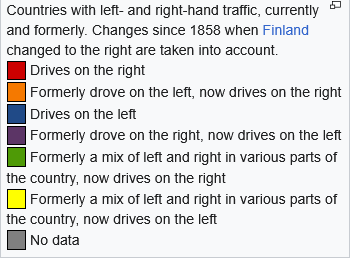
SCIENCE said:
It would be safer driving around where the areas are grey.
Corn smut aka huitlacoche aka corn mushrooms.

kii said:
Corn smut aka huitlacoche aka corn mushrooms.
Thanks.
Never heard of it before.
I read that it’s edible and tasty.
Michael V said:
kii said:
Corn smut aka huitlacoche aka corn mushrooms.
Thanks.
Never heard of it before.
I read that it’s edible and tasty.
Yes, people get very excited when it is found on their corn.
kii said:
Michael V said:
kii said:
Corn smut aka huitlacoche aka corn mushrooms.
Thanks.
Never heard of it before.
I read that it’s edible and tasty.
Yes, people get very excited when it is found on their corn.
Michael V said:
kii said:
Corn smut aka huitlacoche aka corn mushrooms.
Thanks.
Never heard of it before.
I read that it’s edible and tasty.
M. maydis is known to produce four Gα proteins, and one each of Gβ and Gγ.
Tau.Neutrino said:
SCIENCE said:
It would be safer driving around where the areas are grey.
Who Doesn’t Love To Drive On Ice
kii said:
kii said:
Michael V said:Thanks.
Never heard of it before.
I read that it’s edible and tasty.
Yes, people get very excited when it is found on their corn.
Thanks.
I’d love to try some.
Some day, maybe.


I was going to post this in the meme thread, but then I thought it was worthy of consideration, so here it is:

The Rev Dodgson said:
I was going to post this in the meme thread, but then I thought it was worthy of consideration, so here it is:
sir, (a+bn)/n=x, hence God exists
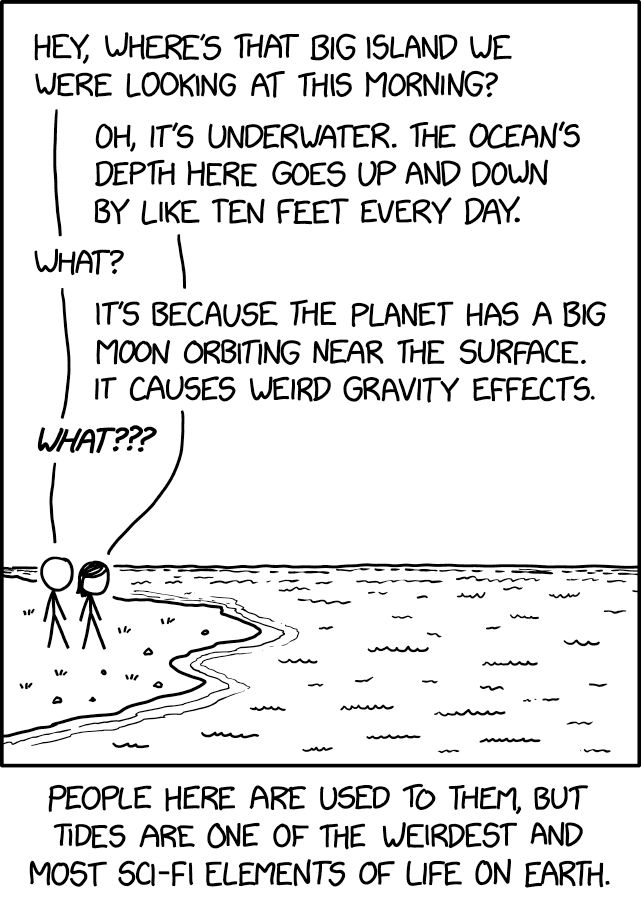
nowhere near as weird as a freedom fascist country rejecting monarchy but sticking to imperial units

SCIENCE said:
nowhere near as weird as a freedom fascist country rejecting monarchy but sticking to imperial units
Likely think imperial units as in galactic empire
One their way to becoming an evil galactic empire but with a sith lord more in keeping with Ja Ja than Palpatine.

dv said:
they said that about tanks in the age of drones
SCIENCE said:
dv said:
they said that about tanks in the age of drones
Face it. War is a shithole.
roughbarked said:
SCIENCE said:
dv said:
they said that about tanks in the age of drones
Face it. War is a shithole.
Play Sports Instead
compare this wild west
to the sensible law and order kidnappings in the USSA that will ensure the safety of the patriarchy American community
this:

The Rev Dodgson said:
this:
Very neat.

Kind of looks like Mussolini
dv said:

Kind of looks like Mussolini
Il Duce sticking out the chin.
dv said:

Kind of looks like Mussolini
Looks like his still hanging around.
dv said:

Kind of looks like Mussolini
The axes are not labelled, so I have no idea what is being graphed here. Could you assist, please?
Michael V said:
dv said:

Kind of looks like Mussolini
The axes are not labelled, so I have no idea what is being graphed here. Could you assist, please?
From the context, I’m assuming that the vertical axis is the age (0 — >100) and the horizontal axis is the number of Italians of that age. The number of very old (~95 — >100) people in the red list is smaller than in the blue, making me think the red is males and the blue is females.
btm said:
Michael V said:
dv said:

Kind of looks like Mussolini
The axes are not labelled, so I have no idea what is being graphed here. Could you assist, please?
From the context, I’m assuming that the vertical axis is the age (0 — >100) and the horizontal axis is the number of Italians of that age. The number of very old (~95 — >100) people in the red list is smaller than in the blue, making me think the red is males and the blue is females.
Sorry, other way around: blue is males and red is females.
btm said:
Michael V said:
dv said:

Kind of looks like Mussolini
The axes are not labelled, so I have no idea what is being graphed here. Could you assist, please?
From the context, I’m assuming that the vertical axis is the age (0 — >100) and the horizontal axis is the number of Italians of that age. The number of very old (~95 — >100) people in the red list is smaller than in the blue, making me think the red is males and the blue is females.
Thanks.
That seems well-reasoned.
:)
btm said:
btm said:
Michael V said:The axes are not labelled, so I have no idea what is being graphed here. Could you assist, please?
From the context, I’m assuming that the vertical axis is the age (0 — >100) and the horizontal axis is the number of Italians of that age. The number of very old (~95 — >100) people in the red list is smaller than in the blue, making me think the red is males and the blue is females.
Sorry, other way around: blue is males and red is females.
:)
I had already guessed that that’s what you had meant.
:)
Michael V said:
dv said:

Kind of looks like Mussolini
The axes are not labelled, so I have no idea what is being graphed here. Could you assist, please?
x=numbers. y=age. blue=male. red=female, or vice versa
Boris said:
Michael V said:
dv said:

Kind of looks like Mussolini
The axes are not labelled, so I have no idea what is being graphed here. Could you assist, please?
x=numbers. y=age. blue=male. red=female, or vice versa
I thank you both for your assistance.
I have no idea how you guys got to that answer.
To me, there are so many possibilities it is overwhelming. Mind you, I find cryptic crosswords overwhelmingly difficult, too. And capitalisations, ICYHN. ;) Probably similar reasons.
Boris said:
Michael V said:
dv said:

Kind of looks like Mussolini
The axes are not labelled, so I have no idea what is being graphed here. Could you assist, please?
x=numbers. y=age. blue=male. red=female, or vice versa
also more males born
btm said:
btm said:
Michael V said:The axes are not labelled, so I have no idea what is being graphed here. Could you assist, please?
From the context, I’m assuming that the vertical axis is the age (0 — >100) and the horizontal axis is the number of Italians of that age. The number of very old (~95 — >100) people in the red list is smaller than in the blue, making me think the red is males and the blue is females.
Sorry, other way around: blue is males and red is females.
Stops scratching head.
https://www.instagram.com/reel/DObRb0ckyL8/?igsh=MWQwa251cGoyeTN3Mg==
Consider this public service announcement
Michael V said:
dv said:

Kind of looks like Mussolini
The axes are not labelled, so I have no idea what is being graphed here. Could you assist, please?
This is a conventional population pyramid. Look up any demographics article on Wikipedia and you’ll see one of these things.
Age is on the y axis.
Number of people is on the x axis (blue for male, red for female).
So for instance there are about 490000 45 year old men.
dv said:
https://www.instagram.com/reel/DObRb0ckyL8/?igsh=MWQwa251cGoyeTN3Mg==Consider this public service announcement
Ha!
:)
dv said:
Michael V said:
dv said:

Kind of looks like Mussolini
The axes are not labelled, so I have no idea what is being graphed here. Could you assist, please?
This is a conventional population pyramid. Look up any demographics article on Wikipedia and you’ll see one of these things.
Age is on the y axis.
Number of people is on the x axis (blue for male, red for female).So for instance there are about 490000 45 year old men.
I have never heard of a population pyramid before, nor did I understand it was a standard demographic graph. Labelling axes does help the uninitiated to understand.
dv said:
https://www.instagram.com/reel/DObRb0ckyL8/?igsh=MWQwa251cGoyeTN3Mg==Consider this public service announcement
Lordy.
Michael V said:
dv said:
Michael V said:The axes are not labelled, so I have no idea what is being graphed here. Could you assist, please?
This is a conventional population pyramid. Look up any demographics article on Wikipedia and you’ll see one of these things.
Age is on the y axis.
Number of people is on the x axis (blue for male, red for female).So for instance there are about 490000 45 year old men.
I have never heard of a population pyramid before, nor did I understand it was a standard demographic graph. Labelling axes does help the uninitiated to understand.
I’ll forward your comments to the creator.
dv said:
Michael V said:
dv said:This is a conventional population pyramid. Look up any demographics article on Wikipedia and you’ll see one of these things.
Age is on the y axis.
Number of people is on the x axis (blue for male, red for female).So for instance there are about 490000 45 year old men.
I have never heard of a population pyramid before, nor did I understand it was a standard demographic graph. Labelling axes does help the uninitiated to understand.
I’ll forward your comments to the creator.
¡
dv said:
Michael V said:
dv said:This is a conventional population pyramid. Look up any demographics article on Wikipedia and you’ll see one of these things.
Age is on the y axis.
Number of people is on the x axis (blue for male, red for female).So for instance there are about 490000 45 year old men.
I have never heard of a population pyramid before, nor did I understand it was a standard demographic graph. Labelling axes does help the uninitiated to understand.
I’ll forward your comments to the creator.
BTW this is the original post, which is animated, showing the pyramid at various years (with some projection into the future).
https://www.facebook.com/share/v/1B82yzFJoR/
I took a screensnap at 2010 because I thought I recognised someone.
dv said:
Michael V said:
dv said:This is a conventional population pyramid. Look up any demographics article on Wikipedia and you’ll see one of these things.
Age is on the y axis.
Number of people is on the x axis (blue for male, red for female).So for instance there are about 490000 45 year old men.
I have never heard of a population pyramid before, nor did I understand it was a standard demographic graph. Labelling axes does help the uninitiated to understand.
I’ll forward your comments to the creator.
Thanks.
:)
dv said:
dv said:
Michael V said:I have never heard of a population pyramid before, nor did I understand it was a standard demographic graph. Labelling axes does help the uninitiated to understand.
I’ll forward your comments to the creator.
BTW this is the original post, which is animated, showing the pyramid at various years (with some projection into the future).
https://www.facebook.com/share/v/1B82yzFJoR/
I took a screensnap at 2010 because I thought I recognised someone.
Wow!
Nice work on the animation!
Maker Series: Artisanal Firewood | CBC Radio
“Fun fact. They had to add comedy/satire in the title later on. Initially the video was published without that in the title and people were genuinely interested to know where they could purchase such firewood.”
kii said:
Maker Series: Artisanal Firewood | CBC Radio“Fun fact. They had to add comedy/satire in the title later on. Initially the video was published without that in the title and people were genuinely interested to know where they could purchase such firewood.”
LOLOLOLOLOLOLOL
Thanks.
:)


deity’s fucking prophet, we thought Australians were better than Americans but what is this
“does washing things clean dirty stuff off them” ¿¡¿ what
SCIENCE said:
deity’s fucking prophet, we thought Australians were better than Americans but what is this
“does washing things clean dirty stuff off them” ¿¡¿ what
Waste of time. I scrubbed and scrubbed but the F&V were still made of chemicals.
dv said:
SCIENCE said:
deity’s fucking prophet, we thought Australians were better than Americans but what is this
“does washing things clean dirty stuff off them” ¿¡¿ what
Waste of time. I scrubbed and scrubbed but the F&V were still made of chemicals.
Fair objection but we were sold the article as

so we foolishly gave it the benefit of the doubt.
We mean obviously washing stuff removes surface stuff but they said we’d learn something new so we thought there would at least be some caveat or some bonus or something.
SCIENCE said:
dv said:
SCIENCE said:
deity’s fucking prophet, we thought Australians were better than Americans but what is this
“does washing things clean dirty stuff off them” ¿¡¿ what
Waste of time. I scrubbed and scrubbed but the F&V were still made of chemicals.
Fair objection but we were sold the article as
so we foolishly gave it the benefit of the doubt.
We mean obviously washing stuff removes surface stuff but they said we’d learn something new so we thought there would at least be some caveat or some bonus or something.
That’s the kind of attitude that leads to eating salads in Asia. Much regret…
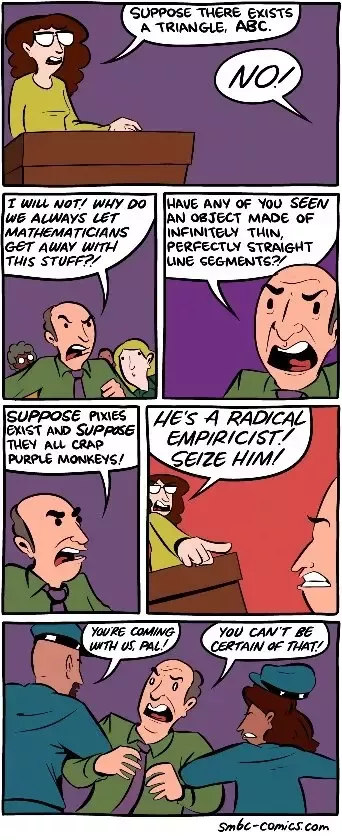
The Rev Dodgson said:
You also might like to consider:
“Radical empiricism is a philosophical doctrine put forward by William James. It asserts that experience includes both particulars and relations between those particulars, and that therefore both deserve a place in our explanations. In concrete terms: Any philosophical worldview is flawed if it stops at the physical level and fails to explain how meaning, values and intentionality can arise from that.”
SCIENCE said:
The Rev Dodgson said:
we remember the godelled days
:)
Well I wonder what mr godel would have to say about that.

well eat grass then

dv said:
So much to do, so little time.
dv said:
I knew Neanderthals were named after the Neander, or Neandertal, Valley, but TIL the Neandertal Valley is in Germany.
Divine Angel said:
dv said:
I knew Neanderthals were named after the Neander, or Neandertal, Valley, but TIL the Neandertal Valley is in Germany.
Yes. Neander Valley, or Neandertal (tal means valley).
Bubblecar said:
Divine Angel said:
dv said:
I knew Neanderthals were named after the Neander, or Neandertal, Valley, but TIL the Neandertal Valley is in Germany.
Yes. Neander Valley, or Neandertal (tal means valley).
And in Scandinavian languages, dal means valley. As it does also in English, with an e on the end.
Bubblecar said:
Divine Angel said:
dv said:
I knew Neanderthals were named after the Neander, or Neandertal, Valley, but TIL the Neandertal Valley is in Germany.
Yes. Neander Valley, or Neandertal (tal means valley).
I’m a Neanderthal man
you’re a Neanderthal girl
Let’s make Neanderthal love
in this Neanderthal world
A 1970 hit for Hotlegs, who subsequently morphed into 10cc
Bubblecar said:
Bubblecar said:
Divine Angel said:I knew Neanderthals were named after the Neander, or Neandertal, Valley, but TIL the Neandertal Valley is in Germany.
Yes. Neander Valley, or Neandertal (tal means valley).
And in Scandinavian languages, dal means valley. As it does also in English, with an e on the end.
So Robin Hood’s offsider was Alan of the Valley…?
Divine Angel said:
dv said:
I knew Neanderthals were named after the Neander, or Neandertal, Valley, but TIL the Neandertal Valley is in Germany.
Tal (or Thal) translates to “valley”. Dollar has the same root (thaler).
Neophyte said:
Bubblecar said:
Bubblecar said:Yes. Neander Valley, or Neandertal (tal means valley).
And in Scandinavian languages, dal means valley. As it does also in English, with an e on the end.
So Robin Hood’s offsider was Alan of the Valley…?
He was a wandering minstrel so yes, well accustomed to trudging the dales.
Bubblecar said:
Divine Angel said:
dv said:
I knew Neanderthals were named after the Neander, or Neandertal, Valley, but TIL the Neandertal Valley is in Germany.
Yes. Neander Valley, or Neandertal (tal means valley).
My learning for today.
Over.
Bubblecar said:
Neophyte said:
Bubblecar said:And in Scandinavian languages, dal means valley. As it does also in English, with an e on the end.
So Robin Hood’s offsider was Alan of the Valley…?
He was a wandering minstrel so yes, well accustomed to trudging the dales.
As good a time as any to tell you a tale of Alan A’Dale (if you like the work of Peter Cook and Dudley Moore)
https://www.youtube.com/watch?v=xDmv7b-NQEI
Divine Angel said:
dv said:
I knew Neanderthals were named after the Neander, or Neandertal, Valley, but TIL the Neandertal Valley is in Germany.
The word “dollar” is from Joachimsthaler. Thal here means valley. So the word dollar is partly related to Neandethal.
https://www.google.com/search?q=sex+education+peter+cook+youtube&sca_esv=0214036f541d3286&sxsrf=AE3TifPS3T3aSVPXR6yL5YyZemqmvRvs-g%3A1758425371620&ei=G3HPaN_DJcjx4-EPnazHgAw&ved=0ahUKEwifvY799OiPAxXI-DgGHR3WEcAQ4dUDCBA&uact=5&oq=sex+education+peter+cook+youtube&gs_lp=Egxnd3Mtd2l6LXNlcnAiIHNleCBlZHVjYXRpb24gcGV0ZXIgY29vayB5b3V0dWJlSN9OUJsxWKVKcAF4AZABAJgBnwKgAbYOqgEDMi04uAEDyAEA-AEBmAIBoAILwgIKEAAYsAMY1gQYR5gDAIgGAZAGCJIHATGgB-gEsgcAuAcAwgcDMy0xyAcI&sclient=gws-wiz-serp#fpstate=ive&vld=cid:07a69d11,vid:GXZE4jdyicw,st:0
It takes a while to type in but it’s worth it.
Roger Braintree even gets a mention.
Peak Warming Man said:
https://www.google.com/search?q=sex+education+peter+cook+youtube&sca_esv=0214036f541d3286&sxsrf=AE3TifPS3T3aSVPXR6yL5YyZemqmvRvs-g%3A1758425371620&ei=G3HPaN_DJcjx4-EPnazHgAw&ved=0ahUKEwifvY799OiPAxXI-DgGHR3WEcAQ4dUDCBA&uact=5&oq=sex+education+peter+cook+youtube&gs_lp=Egxnd3Mtd2l6LXNlcnAiIHNleCBlZHVjYXRpb24gcGV0ZXIgY29vayB5b3V0dWJlSN9OUJsxWKVKcAF4AZABAJgBnwKgAbYOqgEDMi04uAEDyAEA-AEBmAIBoAILwgIKEAAYsAMY1gQYR5gDAIgGAZAGCJIHATGgB-gEsgcAuAcAwgcDMy0xyAcI&sclient=gws-wiz-serp#fpstate=ive&vld=cid:07a69d11,vid:GXZE4jdyicw,st:0It takes a while to type in but it’s worth it.
Roger Braintree even gets a mention.
That’s bloody good news about Roger.
Neophyte said:
Peak Warming Man said:
https://www.google.com/search?q=sex+education+peter+cook+youtube&sca_esv=0214036f541d3286&sxsrf=AE3TifPS3T3aSVPXR6yL5YyZemqmvRvs-g%3A1758425371620&ei=G3HPaN_DJcjx4-EPnazHgAw&ved=0ahUKEwifvY799OiPAxXI-DgGHR3WEcAQ4dUDCBA&uact=5&oq=sex+education+peter+cook+youtube&gs_lp=Egxnd3Mtd2l6LXNlcnAiIHNleCBlZHVjYXRpb24gcGV0ZXIgY29vayB5b3V0dWJlSN9OUJsxWKVKcAF4AZABAJgBnwKgAbYOqgEDMi04uAEDyAEA-AEBmAIBoAILwgIKEAAYsAMY1gQYR5gDAIgGAZAGCJIHATGgB-gEsgcAuAcAwgcDMy0xyAcI&sclient=gws-wiz-serp#fpstate=ive&vld=cid:07a69d11,vid:GXZE4jdyicw,st:0It takes a while to type in but it’s worth it.
Roger Braintree even gets a mention.
That’s bloody good news about Roger.
Hehe
Peak Warming Man said:
https://www.google.com/search?q=sex+education+peter+cook+youtube&sca_esv=0214036f541d3286&sxsrf=AE3TifPS3T3aSVPXR6yL5YyZemqmvRvs-g%3A1758425371620&ei=G3HPaN_DJcjx4-EPnazHgAw&ved=0ahUKEwifvY799OiPAxXI-DgGHR3WEcAQ4dUDCBA&uact=5&oq=sex+education+peter+cook+youtube&gs_lp=Egxnd3Mtd2l6LXNlcnAiIHNleCBlZHVjYXRpb24gcGV0ZXIgY29vayB5b3V0dWJlSN9OUJsxWKVKcAF4AZABAJgBnwKgAbYOqgEDMi04uAEDyAEA-AEBmAIBoAILwgIKEAAYsAMY1gQYR5gDAIgGAZAGCJIHATGgB-gEsgcAuAcAwgcDMy0xyAcI&sclient=gws-wiz-serp#fpstate=ive&vld=cid:07a69d11,vid:GXZE4jdyicw,st:0It takes a while to type in but it’s worth it.
Roger Braintree even gets a mention.
This is a better Cook and Moore sex chat sketch
https://youtu.be/Y7agJJMQfKs?si=3sThPhO-JifKbKjm
https://www.facebook.com/share/v/1CrYBu9bV4/
Jason Pargin on why you can’t fix something you hate
dv said:
Consider the first promissory notes.
oh
strange
RFK Jr was right¡ Just do more exercise¡
https://www.abc.net.au/news/2025-09-22/how-exercise-can-reduce-risk-of-developing-dementia/105783238
https://youtu.be/tyU5Xkk6TuE?si=fu2uAqszlZwjDU-Q
This video by me old mate Shaun is 4 hours long.
It is about the new book The War On Science edited by Lawrence Krauss, which (despite the actual war on science happening in 2025) is mainly a collection of screeds against diversity and inclusion.
dv said:
https://youtu.be/tyU5Xkk6TuE?si=fu2uAqszlZwjDU-QThis video by me old mate Shaun is 4 hours long.
It is about the new book The War On Science edited by Lawrence Krauss, which (despite the actual war on science happening in 2025) is mainly a collection of screeds against diversity and inclusion.
Sounds an important book with excellent contributors, but I stay out of wars these days, at least in the forum.
>An unparalleled group of prominent scholars from wide-ranging disciplines detail ongoing efforts to impose ideological restrictions on science and scholarship throughout western society.
From assaults on merit-based hiring to the policing of language and replacing well-established, disciplinary scholarship by ideological mantras, current science and scholarship is under threat throughout western institutions. As detailed by this group of prominent scholars – who range across many different disciplines and political leanings – the very future of free inquiry and scientific progress is at risk.
Many who have spoken up against this threat have lost their positions, and a climate of fear has arisen that strikes at the heart of modern education and research. Banding together to finally speak out, this brave and unprecedented group of scholars issues a clarion call for change.
Contributors: Richard Dawkins; Alan Sokal; Niall Ferguson; Gad Saad; Anna Krylov; Jay Tanzman; John Armstrong; Jerry Coyne; Luana Maroja; Sally Satel; Geoff Horsman; Alessandro Strumia; Roger Cohen; Amy Wax; Alex Byrne; Moti Gorin; Judith Suissa; Alice Sullivan; Dorian Abbot; Steven Pinker; Nicholas Christakis; Richard E. Redding.
https://www.allenandunwin.com/browse/book/Lawrence-Krauss-War-on-Science-9781800756182
dv said:
https://youtu.be/tyU5Xkk6TuE?si=fu2uAqszlZwjDU-QThis video by me old mate Shaun is 4 hours long.
It is about the new book The War On Science edited by Lawrence Krauss, which (despite the actual war on science happening in 2025) is mainly a collection of screeds against diversity and inclusion.
Take less time to read the book…
Neophyte said:
dv said:
https://youtu.be/tyU5Xkk6TuE?si=fu2uAqszlZwjDU-QThis video by me old mate Shaun is 4 hours long.
It is about the new book The War On Science edited by Lawrence Krauss, which (despite the actual war on science happening in 2025) is mainly a collection of screeds against diversity and inclusion.
Take less time to read the book…
You probably won’t need to finish the book…
dv said:
https://youtu.be/tyU5Xkk6TuE?si=fu2uAqszlZwjDU-QThis video by me old mate Shaun is 4 hours long.
It is about the new book The War On Science edited by Lawrence Krauss, which (despite the actual war on science happening in 2025) is mainly a collection of screeds against diversity and inclusion.
I used to like Krauss’ science books but I’m afraid he has gone a bit funny these days.
JudgeMental said:
dv said:
https://youtu.be/tyU5Xkk6TuE?si=fu2uAqszlZwjDU-QThis video by me old mate Shaun is 4 hours long.
It is about the new book The War On Science edited by Lawrence Krauss, which (despite the actual war on science happening in 2025) is mainly a collection of screeds against diversity and inclusion.
I used to like Krauss’ science books but I’m afraid he has gone a bit funny these days.
Here’s a briefer review of The War on Science.
https://nymag.com/intelligencer/article/new-atheists-maha-war-on-science.html
dv said:
JudgeMental said:
dv said:
https://youtu.be/tyU5Xkk6TuE?si=fu2uAqszlZwjDU-QThis video by me old mate Shaun is 4 hours long.
It is about the new book The War On Science edited by Lawrence Krauss, which (despite the actual war on science happening in 2025) is mainly a collection of screeds against diversity and inclusion.
I used to like Krauss’ science books but I’m afraid he has gone a bit funny these days.
Here’s a briefer review of The War on Science.
https://nymag.com/intelligencer/article/new-atheists-maha-war-on-science.html
Tribal stuff. That’s mostly all you’ll get, unfortunately, which is doubtless part of the point the contributors to the book are making.
People who recognise the threat to science from the worst ideologies of both right and left are still sadly rare.
dv said:
JudgeMental said:
dv said:
https://youtu.be/tyU5Xkk6TuE?si=fu2uAqszlZwjDU-QThis video by me old mate Shaun is 4 hours long.
It is about the new book The War On Science edited by Lawrence Krauss, which (despite the actual war on science happening in 2025) is mainly a collection of screeds against diversity and inclusion.
I used to like Krauss’ science books but I’m afraid he has gone a bit funny these days.
Here’s a briefer review of The War on Science.
https://nymag.com/intelligencer/article/new-atheists-maha-war-on-science.html
yes, some of the stuff I have been seeing over the last few years about him. Some from personal experience.
no thanks

SCIENCE said:
Who needs an app when they have the ‘Daily Mail’?
This dismissal of physical “paradoxes” from Quora.
“What’s the deal with Richard Feynman dismissing the Banach-Tarski paradox as unphysical? Why do you think he brushed it off?
I had a physics professor who like to say (I’m paraphrasing), “whenever you hear the term “paradox”, someone is trying to scam you.”
You see, in physics you can have surprises. Results that are counter-intuitive. But never a “paradox”. Paradoxes are a mathematics thing. You get them in self-referential logic statements and perhaps a few other places, but they say nothing about the physical world. In other words, you cannot construct an experiment that will test its validity. And if you can’t test it, it’s not physics. And physicists like Richard Feynman will then largely dismiss it.
The Banach–Tarski paradox is a great example of this. It is neither physical nor a paradox. It’s just a surprising and counter-intuitive property of infinities. At its core they take a set of infinity points, divide it into a few subsets, each with an infinite number of points as well, and call that a paradox, because seemingly it breaks the conservation of mass, or volume, or something. But it’s been known for ages that you can divide the integers into even and odd subsets, which are just as large as the original set. This is not a new idea. And it certainly doesn’t have anything to do with the conservation of mass. In fact, it’s not even a paradox. Banach and Tarski just dressed this up the way a good magician might dress up a classic card trick to make it look dramatic and impressive, and gets wows from the audience.

The Banach-Tarski paradox: “Can a ball be decomposed into a finite number of point sets and reassembled into two balls identical to the original?”
The Rev Dodgson said:
This dismissal of physical “paradoxes” from Quora.
“What’s the deal with Richard Feynman dismissing the Banach-Tarski paradox as unphysical? Why do you think he brushed it off?
I had a physics professor who like to say (I’m paraphrasing), “whenever you hear the term “paradox”, someone is trying to scam you.”
You see, in physics you can have surprises. Results that are counter-intuitive. But never a “paradox”. Paradoxes are a mathematics thing. You get them in self-referential logic statements and perhaps a few other places, but they say nothing about the physical world. In other words, you cannot construct an experiment that will test its validity. And if you can’t test it, it’s not physics. And physicists like Richard Feynman will then largely dismiss it.
The Banach–Tarski paradox is a great example of this. It is neither physical nor a paradox. It’s just a surprising and counter-intuitive property of infinities. At its core they take a set of infinity points, divide it into a few subsets, each with an infinite number of points as well, and call that a paradox, because seemingly it breaks the conservation of mass, or volume, or something. But it’s been known for ages that you can divide the integers into even and odd subsets, which are just as large as the original set. This is not a new idea. And it certainly doesn’t have anything to do with the conservation of mass. In fact, it’s not even a paradox. Banach and Tarski just dressed this up the way a good magician might dress up a classic card trick to make it look dramatic and impressive, and gets wows from the audience.
The Banach-Tarski paradox: “Can a ball be decomposed into a finite number of point sets and reassembled into two balls identical to the original?”
now we regret bringing it all up but anyway
if only mathematicians didn’t try to make their art seem accessible and arcane at the same time, they wouldn’t call some abstract concept that had passing resemblance to a physical object by an easily misconstrued physical object name
maybe they could call it a bull
these quotes from Herman Rubin:
““The most important questions of life are, for the most part, really only problems of probability.”
“If statistics is an applied field and not a minor branch of mathematics, then more than 99% of the published papers are useless exercises.”
“Those who ignore Statistics are condemned to reinvent it.”
“The subjectivist (i.e. Bayesian) states his judgements, whereas the objectivist sweeps them under the carpet by calling assumptions knowledge, and he basks in the glorious objectivity of science.”
“Bayesian statistics is difficult in the sense that thinking is difficult.”
These quotes reflect Herman Rubin’s deep understanding of probability and statistics, as well as his belief in the importance of using sound reasoning and data to make informed decisions.
“
SCIENCE said:
The Rev Dodgson said:
This dismissal of physical “paradoxes” from Quora.
“What’s the deal with Richard Feynman dismissing the Banach-Tarski paradox as unphysical? Why do you think he brushed it off?
I had a physics professor who like to say (I’m paraphrasing), “whenever you hear the term “paradox”, someone is trying to scam you.”
You see, in physics you can have surprises. Results that are counter-intuitive. But never a “paradox”. Paradoxes are a mathematics thing. You get them in self-referential logic statements and perhaps a few other places, but they say nothing about the physical world. In other words, you cannot construct an experiment that will test its validity. And if you can’t test it, it’s not physics. And physicists like Richard Feynman will then largely dismiss it.
The Banach–Tarski paradox is a great example of this. It is neither physical nor a paradox. It’s just a surprising and counter-intuitive property of infinities. At its core they take a set of infinity points, divide it into a few subsets, each with an infinite number of points as well, and call that a paradox, because seemingly it breaks the conservation of mass, or volume, or something. But it’s been known for ages that you can divide the integers into even and odd subsets, which are just as large as the original set. This is not a new idea. And it certainly doesn’t have anything to do with the conservation of mass. In fact, it’s not even a paradox. Banach and Tarski just dressed this up the way a good magician might dress up a classic card trick to make it look dramatic and impressive, and gets wows from the audience.
The Banach-Tarski paradox: “Can a ball be decomposed into a finite number of point sets and reassembled into two balls identical to the original?”
now we regret bringing it all up but anyway
if only mathematicians didn’t try to make their art seem accessible and arcane at the same time, they wouldn’t call some abstract concept that had passing resemblance to a physical object by an easily misconstrued physical object name
maybe they could call it a bull
Mathematicians lost me when they made the square root of -1 a thing to get them out of a whole.
Worse than Trump they are.
LOL yous idiots
Following the news in artificial intelligence recently has been like watching an endless back-and-forth tennis rally between hype and disillusionment. We’re told the AI investment bubble is deflating. Revenues are too low to justify the investment. New AI products — like GPT-5 — are underwhelming.
those horseless carriages will never mean anything nobody will ever need more than 524288 bits of memory your mechanical birds will never take off
Scientists have digitally reconstructed a million-year-old humanoid skull found in China.
They claim the skull challenges the established timeline of human evolution.
https://www.abc.net.au/news/science/2025-09-26/million-year-old-skull-reconstruction-and-human-evolution/105819746
link
roughbarked said:
Scientists have digitally reconstructed a million-year-old humanoid skull found in China.
They claim the skull challenges the established timeline of human evolution.
https://www.abc.net.au/news/science/2025-09-26/million-year-old-skull-reconstruction-and-human-evolution/105819746
link
yeah look as supposed humans we do find it of interest how we got here but we also have a niggling feeling every time like, does clarifying the specifics offer anything useful for future progress
not saying the work shouldn’t be done just wondering out loud how much attention we should pay
fog machine alarm
this 29 year old paper on acceleration during bungee jumping:
https://www.fc.up.pt/pessoas/psimeao/desafios/Bungee_Jumper_maior_que_g.pdf
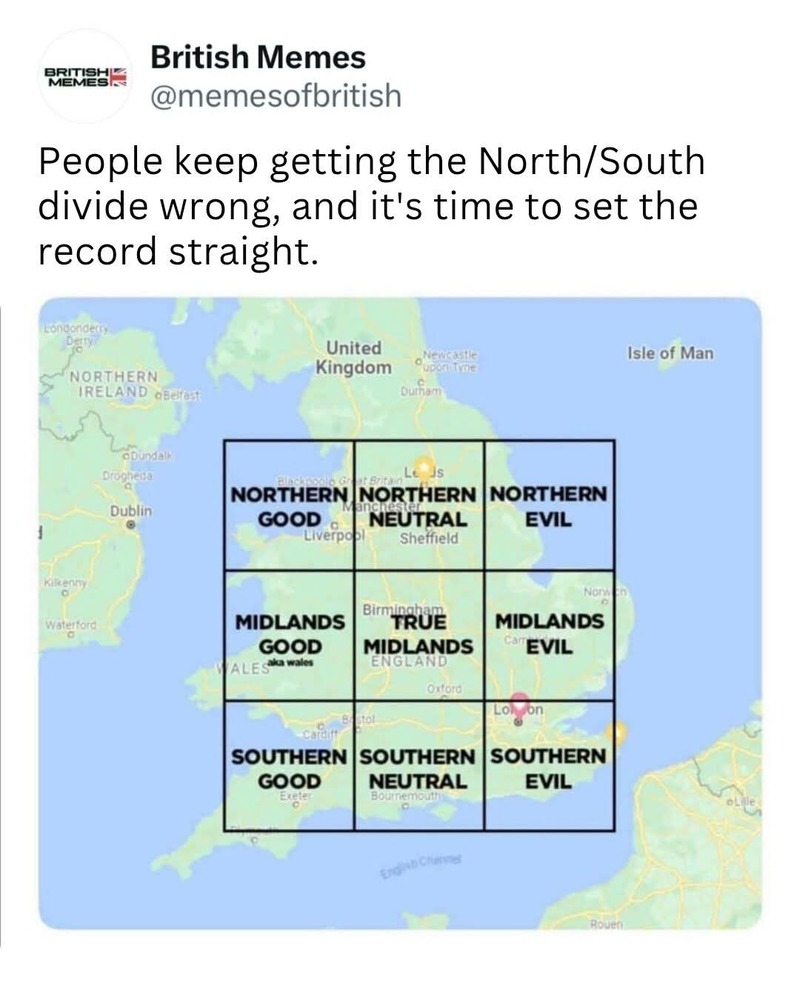
dv said:
born around the border of southern and midlands evil.
dv said:
The work of a bloody lefty.
I’m “Southern Evil”
this Quora question:
“Why is the area of a circle πr²? I need a somewhat simplified explanation. I am not a mathematician.”
The answers were about equally split between those who split the circle into concentric circles and those who split it into triangles then carried out some convoluted operation to convert the triangles from a circle to a square.
That all seems unnecessarily complicated to me. Is it not obvious that if you divide the circle into lots of equal triangles then each one has an area half base x radius, and the sum of the length of the bases = 2 * pi * r?

dv said:
but what if he’s playing 200-dimensional super golden great space Nazi battle chess
From Quora:
I think my ancestors said it best:
(Old Icelandic)
Deyr fé,
deyja frændur,
deyr sjálfur ið sama;
en orðstír
deyr aldregi
hveim er sér góðan getur.
Deyr fé,
deyja frændur,
deyr sjálfur ið sama.
Ég veit einn,
að aldrei deyr;
dómur um dauðan hvern.
(English translation)
Cattle die, kindred die,
Every man is mortal:
But the good name never dies
Of one who has done well.
Cattle die, kindred die,
Every man is mortal:
But I know one thing that never dies,
The glory of the great dead.
– Hávamál, stanzas 76–77
You will die. That much is certain. Live a life worth being remembered by those who remain.
And to be honest, I find that obsession about death by theists rather unhealthy. Don’t they have anything worth living for?
The Rev Dodgson said:
From Quora:I think my ancestors said it best:
(Old Icelandic)
Deyr fé,
deyja frændur,
deyr sjálfur ið sama;
en orðstír
deyr aldregi
hveim er sér góðan getur.Deyr fé,
deyja frændur,
deyr sjálfur ið sama.
Ég veit einn,
að aldrei deyr;
dómur um dauðan hvern.(English translation)
Cattle die, kindred die,
Every man is mortal:
But the good name never dies
Of one who has done well.Cattle die, kindred die,
Every man is mortal:
But I know one thing that never dies,
The glory of the great dead.– Hávamál, stanzas 76–77
You will die. That much is certain. Live a life worth being remembered by those who remain.
And to be honest, I find that obsession about death by theists rather unhealthy. Don’t they have anything worth living for?
no they’re just good at mathematics, because you will spend only a few years alive but nearly Infinity years dead, so the amount of life is nearly infinitesimal and therefore unimportant in comparison

dv said:
Pangaea
magic








alleged
SCIENCE said:
alleged
sorry with image properly included this time

Interesting account of the only German spy in Britain in WW2 who was neither “turned” nor executed. He was apparently sent to assassinate Churchill but having failed at that, committed suicide.
Account taken from the British magazine After the Battle, 1976.
In the autumn of 1940, at a conference in Berlin, Himmler had given an order to SS General Walter Schreckenbach for the ‘liquidation’ of Winston Churchill. Such a mission must have been expected and there is evidence to think that the British Security Service knew of the meeting and what had been said. It is believed that Jan Ter Braak had been given that mission when he came to Britain. The date of his entry is unknown although, as the user of a German parachute found in a field near Amersham, Buckinghamshire on October 3 was not traced, it is assumed it was Ter Braak’s.
Jan Ter Braak took lodgings in Cambridge and for several months tried to merge into the background. Posing as a Dutch refugee, a learned scientist who had come to England soon after the German invasion of Holland, his passport and papers confirmed his cover. He paid several visits to London during the winter months of the 1940-41 blitz and when he arrived from Cambridge at Liverpool Street station, a discreet tail was put on him. The scientist, who was supposed to be writing a paper on fossils, was showing an astonishing interest in the environs of Whitehall, especially the approaches to the Cabinet War Rooms.
Security Service suspicions were aroused when it was seen he had a great interest in Winston Churchill’s movements and on other occasions was followed to war factories which the British Prime Minister was visiting.
Ter Braak’s lodgings, searched by the Security Service whilst he was out, contained a wireless transmitter, detonators, a Luger pistol, a file on Mr. Churchill’s movements and three crudely forged Dutch passports. Coded notes revealed that one of his tasks was to assassinate Allied war leaders as the opportunity arose.
The Security Service men decided to wait but Ter Braak did not return; perhaps — in some way— he suspected a trap.
Whatever the reason, on All Fools Day, April 1, 1941, Mrs. Alice Stutley, Air Raid Shelter Marshal for her area, was walking her dog on an open park in the centre of Cambridge called Christ’s Pieces. Six air raid shelters then stood in the centre of the park and at about 9.00 a.m. as she approached them, a small boy came up and told her there was a dead man in the second shelter.
Being April Fools Day she didn’t believe him, but he was so persistent, she agreed to look. She found the body of a man, dressed in a dark overcoat, horn-rim glasses and black homberg hat, wedged tightly underneath one of the fixed slatted seats. She could see no pistol but it was evident that he had been shot in the head.
She called a policeman who again in turn refused to believe her story on April Fools Day. When he finally agreed, Mrs. Stutley showed him the body.
Mrs. Stutley then had to go to work. Shortly after she returned home in the evening there was a knock on her door. Answering it, two men stood on the doorstep whilst two others remained in a large black car at the end of her lane in King Street, about twenty yards away.
Without showing any identity they asked if she was the one that had found the body. When she said she was they warned her in no uncertain terms to keep it to herself and not to say a word to anybody.
The next day copies of the Cambridge News containing details of the discovery, were withdrawn after an urgent call from the Ministry of Information, the official body dealing with censorship.
We have reproduced the death certificate issued after the coroner’s inquest on April 3, which gives the cause of death as suicide. When we traced Mrs. Stutley, in November 1974, she said we were the first people ever to have asked her about it and was most interested and helpful. She knew his name was Ter Braak and also that he was a German spy; this, it seems, is common knowledge amongst the older residents of the area.
The Coroner who examined the case, Mr. Walter Wallis, died in 1959 and from enquiries that we made, we found that all his papers have been destroyed. We searched the records at every Cambridge cemetery looking for the entry noting Ter Braak’s burial but could find no trace. Once again we seemed to be up against a blank wall, which the passage of thirty years and fading memories did nothing to help.
That is, until we traced Mr. John O’Hannan, a funeral director in Cambridge during the war—the man that buried Ter Braak. It was just prior to Christmas 1974 that the editor went to see Mr. O’Hannan, 76 years old, in poor health for some time, and nearly blind. This is what he told us.
On the morning of April 1, 1941 he received a telephone call from the Cambridge police and was told that a man had been found dead in an air raid shelter. He was asked to come and remove the body but not to mention a word about it (a silence he had kept until we spoke to him).
Reaching Christ’s Pieces, he was asked by the police to back his van up to the shelter which he did from Pikes Walk. The Chief Constable, Mr. R. J. Pearson and the Coroner’s officer lifted the body into Mr. O’Hannan’s shell coffin used to transport bodies.
The mortuary at the time was situated in Mill Road (now used as a maternity hospital) and Ter Braak was placed in the small end room which could be locked, rather than the main room.
As Mr. O’ Hannan undressed the body with the help of his assistant he was surprised to find Ter Braak was wearing two pairs of trousers. They removed these together with his coat and waistcoat and laid out the body.
When he returned home Mr. O’Hannan was surrounded by reporters (he believes the mortuary attendant at Mill Road gave the story away although he had retained the key to the small room to stop anyone entering.). However, Mr. O’ Hannan kept his silence and denied any knowledge of the body.
The Chief Constable had told him that when the Coroner’s certificate was issued he was to bury Ter Braak in an unknown grave.
On the day the certificate was obtained he was called to another suicide death at nearby Madingly. As reporters were still pestering for information, Mr. O’ Hannan decided to switch the body of the woman who had committed suicide with that of Ter Braak. The switch passed unnoticed and Ter Braak was taken to Mr. O’Hannan’s funeral parlour at 203 High Street, Chesterton (since demolished) and placed in the back room.
However, within an hour reporters had discovered the switch of bodies and arrived at Chesterton, but Mr. O’ Hannan again denied any knowledge. He had already been to Great Shelford, three miles to the south of Cambridge, to see the vicar, the Reverend F. W. Jeeves of St. Mary’s Church and the parish clerk. Mr. O’Hannan told them he had the body of a student who had been killed on a motor cycle and whose parents had disowned him. He explained that he wanted a quiet funeral as nobody would be attending. He paid a fee of £3.0.6 to the clerk.
At 9.00 a.m. on April 7, Ter Braak was buried, attended only by the Vicar, the gravedigger, Mr. Duisly the clerk and Mr. O’ Hannan.
No official mention was ever made of Ter Braak being a German spy. We found that Reverend Jeeves had since died and when we spoke to the present vicar at St. Mary’s, Reverend Hale, he knew nothing of it and had no entry in his records. Until we traced Mr. O’Hannan, the grave could have been lost for ever. Mr. O’Hannan was, in fact, too blind to show us where it was. The grave remains unmarked to the present day when we photographed it with the Parish Clerk, Mr. P. E. Holdrup, in January 1975. We found the entry in the Register of Public Graves recording that £3.0s.6d. was paid for Grave 154.
Following our visit to the grave and through other enquiries we had made, the story appeared in the Cambridge Evening News on January A brisk correspondence of readers’ letters giving their own experiences added significantly to what we had found out.
Although Ter Braak’s passport gave his address as 7 Oxford Street, Cambridge (should be Oxford Road) he first stayed at 58 Barnabas Road, according to Mr. Alfred Sennitt whose parents lodged Ter Braak. He then moved to Montague Road where he stayed with Miss Rosina Greenwood who took in lodgers to help pay her rent. All this time he rented an office in Rose Crescent and two people wrote claiming to have remembered a tapping noise coming from the office. Another story claimed he had come to blackmail people living in England into cooperating with the enemy and one person on Ter Braak’s list was Professor of Law at Clare College, Kurt Lipstein, who had left relatives behind in Germany when he came to England in 1936.
The most significant of all the newspaper articles and letters appeared on February 25 and gives good credibility to the fact that Ter Braak was in touch with Germany by radio and was guiding German aircraft on to military targets in the area. A Mr. Patmore of Sawbridgeworth wrote to categorically state that Army Intelligence knew that signals were being given during raids and troop movements in the Cherry Hinton area (part of Cambridge). And on February 24, 1941, 30 Dornier 17s raided the town just as a number of tanks were being unloaded in the Cambridge marshalling yards. Records shows that 28 high explosive bombs were dropped between the alert at 8.30 p.m. (Cambridge’s 104th) and 11.30 p.m. Eleven people killed during the raid are remembered on a plaque on St. Paul’s Church Tower. Mr. R. A. Miller remembered hearing the soldiers moving the tanks complaining that every time they loaded or unloaded tanks the German air force launched an attack.
Sir John Masterman did not believe Ter Braak had contacted the Germans, certainly he says he could have been the only agent to elude capture and believed he killed himself when his stock of money ran out. He speculates on how much better use he could have been had he fallen into the hands of the Twenty Committee!
alleged

SCIENCE said:
alleged
I only just noticed that has a log scale.
My independent research finds that a Boing 747 with 400 passengers would use about 9,000 kWh per passenger for the return trip, so that seems reasonably consistent with the chart.
The energy cost of AI per user I will leave to others to check.
alleged
Protein powders still carry troubling levels of toxic heavy metals, according to a new Consumer Reports investigation. Our latest tests of 23 protein powders and ready-to-drink shakes from popular brands found that heavy metal contamination has become even more common among protein products, raising concerns that the risks are growing right alongside the industry itself. For more than two-thirds of the products we analyzed, a single serving contained more lead than CR’s food safety experts say is safe to consume in a day—some by more than 10 times.
guess the whole brains versus brawns false dichotomy really is true
Temperatures across Australia will soar as much as 15 degrees Celsius above average during the coming days, threatening October records across multiple states and territories. The unusually intense mid-spring heat sent Adelaide and Melbourne suburbs above 30C on Thursday. It should lift Western Sydney’s maximums to 34C on Friday and 37C on Monday. Canberra is forecast to reach 33C on Monday, challenging the capital’s October record of 32.7C from 1946. The nation’s interior faces several days of oppressive maximums in the mid-40s. Unseasonable temperatures have lasted for weeks along the eastern seaboard — with Sydney, and possibly Brisbane, on track to observe their warmest October on record.
All that language to make what is new normal sound like a hopeful abnormal, well good, thank fuck for the leadership of the freedom world securing the future for fossil fuels¡
A quora response to a question about Charlie Kirk, but it really applies to many others all over the world.
“
What nobody is talking about in all of the Kirk drama is how these guys who make a living getting conservatives to listen and follow them have to constantly become more and more radical and extreme in order to keep their audience.
If they aren’t saying something that gets attention, then nobody will be paying attention to them and they will lose money. That leads them to say more and more outrageous things and to become more and more extreme.
Many christofascists believe that women are essentially permanent children who need to be owned and controlled by men for their entire lives. I don’t know enough about Kirk to know if he really felt that way or if he just said those things for his audience.
However, the extremism on the right is being increased by these guys who make money off of insecure, weak men who want to be told how much better they are than everyone else instead of actually putting in the effort to actually make their own lives better. It keeps these men compliant so that the rich can extract more money and they will submit to being exploited.
This is something that the right in the US needs to deal with. They are radicalizing their own base and increasing political violence by telling them that every problem is someone else’s fault and then handing everyone a bunch of guns.”
The Rev Dodgson said:
If they aren’t saying something that gets attention, then nobody will be paying attention to them and they will lose money. That leads them to say more and more outrageous things and to become more and more extreme.
I recently watched a doco about porn content creator Bonnie Blue. She rose in the money-earning ranks quite quickly because of her extreme content, including a stunt where she allowed 1000 men to fuck her. Subscribers to her platform had to pay to see the video, but even before the content was available, garnered her hundreds of thousands of new subscribers.
Her stunts have become more extreme, which keeps her name in the zeitgeist, earning her a million dollars a month.
Divine Angel said:
The Rev Dodgson said:If they aren’t saying something that gets attention, then nobody will be paying attention to them and they will lose money. That leads them to say more and more outrageous things and to become more and more extreme.
I recently watched a doco about porn content creator Bonnie Blue. She rose in the money-earning ranks quite quickly because of her extreme content, including a stunt where she allowed 1000 men to fuck her. Subscribers to her platform had to pay to see the video, but even before the content was available, garnered her hundreds of thousands of new subscribers.
Her stunts have become more extreme, which keeps her name in the zeitgeist, earning her a million dollars a month.
!!!
Michael V said:
Divine Angel said:
The Rev Dodgson said:
If they aren’t saying something that gets attention, then nobody will be paying attention to them and they will lose money. That leads them to say more and more outrageous things and to become more and more extreme.
I recently watched a doco about porn content creator Bonnie Blue. She rose in the money-earning ranks quite quickly because of her extreme content, including a stunt where she allowed 1000 men to fuck her. Subscribers to her platform had to pay to see the video, but even before the content was available, garnered her hundreds of thousands of new subscribers.
Her stunts have become more extreme, which keeps her name in the zeitgeist, earning her a million dollars a month.
!!!
well sex work is work so good on a worker for working harder to earn a decent paycheck
… and cooking Homo sapiens while they sleep is what the 爱 are doing when the servers are down …
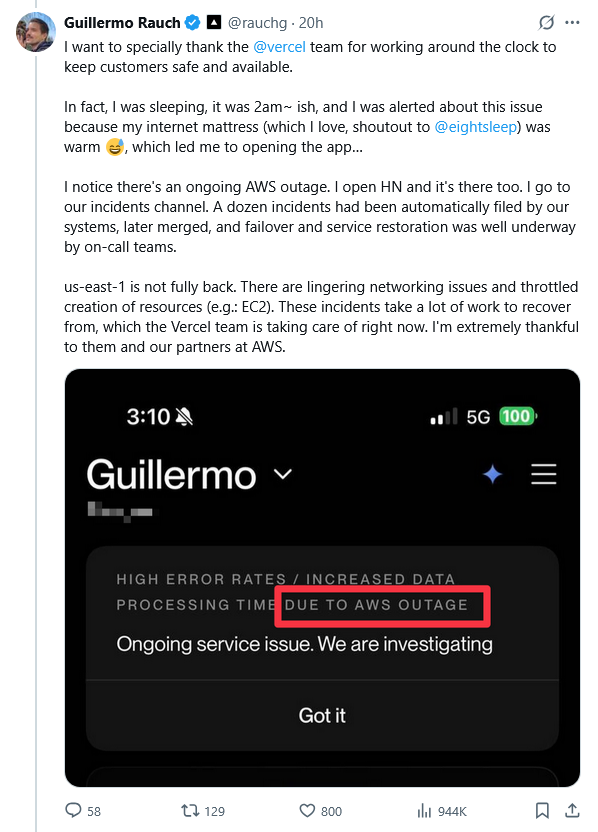
Consider Newcomb’s problem
https://en.wikipedia.org/wiki/Newcomb%27s_problem
“In the standard version of Newcomb’s problem, two boxes are designated A and B. The player is given a choice between taking only box B or taking both boxes A and B. The player knows the following:
Box A is transparent, or open, and always contains a visible $1,000.
Box B is opaque, or closed, and its content has already been set by the predictor:
If the predictor has predicted that the player will take both boxes A and B, then box B contains nothing.
If the predictor has predicted that the player will take only box B, then box B contains $1,000,000.
The player does not know what the predictor predicted or what box B contains while making the choice.”
Also consider that:
“In his 1969 article, Nozick noted that “To almost everyone, it is perfectly clear and obvious what should be done. The difficulty is that these people seem to divide almost evenly on the problem, with large numbers thinking that the opposing half is just being silly.” The problem continues to divide philosophers today. In a 2020 survey, a modest plurality of professional philosophers chose to take both boxes (39.0% versus 31.2%).”
What the other 29.8% think, it does not say.
Considering that nearly 1/3 of the clever people think it’s the best option, I’m playing safe and going for B only.
But follow the link, it’s a good read.
The Rev Dodgson said:
Consider Newcomb’s problemhttps://en.wikipedia.org/wiki/Newcomb%27s_problem
“In the standard version of Newcomb’s problem, two boxes are designated A and B. The player is given a choice between taking only box B or taking both boxes A and B. The player knows the following:
Box A is transparent, or open, and always contains a visible $1,000.
Box B is opaque, or closed, and its content has already been set by the predictor:
If the predictor has predicted that the player will take both boxes A and B, then box B contains nothing.
If the predictor has predicted that the player will take only box B, then box B contains $1,000,000.
The player does not know what the predictor predicted or what box B contains while making the choice.”Also consider that:
“In his 1969 article, Nozick noted that “To almost everyone, it is perfectly clear and obvious what should be done. The difficulty is that these people seem to divide almost evenly on the problem, with large numbers thinking that the opposing half is just being silly.” The problem continues to divide philosophers today. In a 2020 survey, a modest plurality of professional philosophers chose to take both boxes (39.0% versus 31.2%).”
What the other 29.8% think, it does not say.
Considering that nearly 1/3 of the clever people think it’s the best option, I’m playing safe and going for B only.
But follow the link, it’s a good read.
Since your choice has no influence on what was predicted, take both boxes.
Bubblecar said:
The Rev Dodgson said:
Consider Newcomb’s problemhttps://en.wikipedia.org/wiki/Newcomb%27s_problem
“In the standard version of Newcomb’s problem, two boxes are designated A and B. The player is given a choice between taking only box B or taking both boxes A and B. The player knows the following:
Box A is transparent, or open, and always contains a visible $1,000.
Box B is opaque, or closed, and its content has already been set by the predictor:
If the predictor has predicted that the player will take both boxes A and B, then box B contains nothing.
If the predictor has predicted that the player will take only box B, then box B contains $1,000,000.
The player does not know what the predictor predicted or what box B contains while making the choice.”Also consider that:
“In his 1969 article, Nozick noted that “To almost everyone, it is perfectly clear and obvious what should be done. The difficulty is that these people seem to divide almost evenly on the problem, with large numbers thinking that the opposing half is just being silly.” The problem continues to divide philosophers today. In a 2020 survey, a modest plurality of professional philosophers chose to take both boxes (39.0% versus 31.2%).”
What the other 29.8% think, it does not say.
Considering that nearly 1/3 of the clever people think it’s the best option, I’m playing safe and going for B only.
But follow the link, it’s a good read.
Since your choice has no influence on what was predicted, take both boxes.
But how confident are you of that?
“That can then progress to more severe symptoms, things like unconsciousness … — if you do experience any of those then you should call triple-0 immediately,” he said.
OK then sure thing we will
https://www.abc.net.au/news/2025-10-22/hot-weather-in-sydney-nsw-fire-bans-and-warnings-wednesday/105920786
aha good news when they lower the speed limit to 0 then all
crashes will be due to excess speed
¡
Another little piece from Quora for the consideration of the reader:
“Nathan Hannon
Knows English1h
Do you believe in pronouns?
Nathan believes that pronouns exist. In fact, Nathan normally uses pronouns, but Nathan is not using pronouns in the answer currently being written by Nathan. The querent also normally uses pronouns. Nathan knows about the querent’s use of pronouns because the querent asked a question and the question contains a pronoun. However, the querent might not know about the querent’s use of pronouns because the querent might not be aware of the meaning of “pronoun”.
Because Nathan is not using pronouns in the answer currently being written by Nathan, Nathan must repeatedly refer to Nathan using Nathan’s own name. If Nathan was using pronouns, as Nathan normally would, Nathan could use the pronoun used by a person to refer to the person’s self rather than repeatedly using Nathan’s own name. Nathan must also refer to “the querent” rather than using the pronoun used to refer to the person being talked to. (The pronoun used to refer to the person being talked to is also the pronoun used by the querent in the question asked by the querent.)
Additionally, because Nathan is not using pronouns in the answer currently being written by Nathan, Nathan must use extra effort to talk about a thing and then refer to the same thing. Nathan previously said “the querent asked a question and the question contains a pronoun”. If Nathan was using pronouns, as Nathan normally would, Nathan could use a pronoun to refer to “the question” instead of saying “the question”.
If the querent finds the answer currently being written by Nathan to be confusing, the querent should understand the reasons for the English language’s use of pronouns.”
The Rev Dodgson said:
Another little piece from Quora for the consideration of the reader:“Nathan Hannon
Knows English1hDo you believe in pronouns?
Nathan believes that pronouns exist. In fact, Nathan normally uses pronouns, but Nathan is not using pronouns in the answer currently being written by Nathan. The querent also normally uses pronouns. Nathan knows about the querent’s use of pronouns because the querent asked a question and the question contains a pronoun. However, the querent might not know about the querent’s use of pronouns because the querent might not be aware of the meaning of “pronoun”.
Because Nathan is not using pronouns in the answer currently being written by Nathan, Nathan must repeatedly refer to Nathan using Nathan’s own name. If Nathan was using pronouns, as Nathan normally would, Nathan could use the pronoun used by a person to refer to the person’s self rather than repeatedly using Nathan’s own name. Nathan must also refer to “the querent” rather than using the pronoun used to refer to the person being talked to. (The pronoun used to refer to the person being talked to is also the pronoun used by the querent in the question asked by the querent.)
Additionally, because Nathan is not using pronouns in the answer currently being written by Nathan, Nathan must use extra effort to talk about a thing and then refer to the same thing. Nathan previously said “the querent asked a question and the question contains a pronoun”. If Nathan was using pronouns, as Nathan normally would, Nathan could use a pronoun to refer to “the question” instead of saying “the question”.
If the querent finds the answer currently being written by Nathan to be confusing, the querent should understand the reasons for the English language’s use of pronouns.”
LOL.
Brilliant!
:)
The Rev Dodgson said:
Another little piece from Quora for the consideration of the reader:“Nathan Hannon
Knows English1hDo you believe in pronouns?
Nathan believes that pronouns exist. In fact, Nathan normally uses pronouns, but Nathan is not using pronouns in the answer currently being written by Nathan. The querent also normally uses pronouns. Nathan knows about the querent’s use of pronouns because the querent asked a question and the question contains a pronoun. However, the querent might not know about the querent’s use of pronouns because the querent might not be aware of the meaning of “pronoun”.
Because Nathan is not using pronouns in the answer currently being written by Nathan, Nathan must repeatedly refer to Nathan using Nathan’s own name. If Nathan was using pronouns, as Nathan normally would, Nathan could use the pronoun used by a person to refer to the person’s self rather than repeatedly using Nathan’s own name. Nathan must also refer to “the querent” rather than using the pronoun used to refer to the person being talked to. (The pronoun used to refer to the person being talked to is also the pronoun used by the querent in the question asked by the querent.)
Additionally, because Nathan is not using pronouns in the answer currently being written by Nathan, Nathan must use extra effort to talk about a thing and then refer to the same thing. Nathan previously said “the querent asked a question and the question contains a pronoun”. If Nathan was using pronouns, as Nathan normally would, Nathan could use a pronoun to refer to “the question” instead of saying “the question”.
If the querent finds the answer currently being written by Nathan to be confusing, the querent should understand the reasons for the English language’s use of pronouns.”
I prefer interlocutor.
dv said:
The Rev Dodgson said:
Another little piece from Quora for the consideration of the reader:“Nathan Hannon
Knows English1hDo you believe in pronouns?
Nathan believes that pronouns exist. In fact, Nathan normally uses pronouns, but Nathan is not using pronouns in the answer currently being written by Nathan. The querent also normally uses pronouns. Nathan knows about the querent’s use of pronouns because the querent asked a question and the question contains a pronoun. However, the querent might not know about the querent’s use of pronouns because the querent might not be aware of the meaning of “pronoun”.
Because Nathan is not using pronouns in the answer currently being written by Nathan, Nathan must repeatedly refer to Nathan using Nathan’s own name. If Nathan was using pronouns, as Nathan normally would, Nathan could use the pronoun used by a person to refer to the person’s self rather than repeatedly using Nathan’s own name. Nathan must also refer to “the querent” rather than using the pronoun used to refer to the person being talked to. (The pronoun used to refer to the person being talked to is also the pronoun used by the querent in the question asked by the querent.)
Additionally, because Nathan is not using pronouns in the answer currently being written by Nathan, Nathan must use extra effort to talk about a thing and then refer to the same thing. Nathan previously said “the querent asked a question and the question contains a pronoun”. If Nathan was using pronouns, as Nathan normally would, Nathan could use a pronoun to refer to “the question” instead of saying “the question”.
If the querent finds the answer currently being written by Nathan to be confusing, the querent should understand the reasons for the English language’s use of pronouns.”
I prefer interlocutor.
Sir Humphrey: The identity of the official whose alleged responsibility for this hypothetical oversight has been the subject of recent discussion is not shrouded in quite such impenetrable obscurity as certain previous disclosures may have led you to assume; but not to put too fine a point on it, the individual in question is, it may surprise you to learn, one whom your present interlocutor is in the habit of defining by means of the perpendicular pronoun.
Hacker: I beg your pardon?
Sir Humphrey: It was… I.
The USA has had a president born in 1946 for 21 out of the last 33 years.
how good is a post war boom eh

dv said:
yeah we saw that but we’re pretty sure there’s been research done which shows that cliches and catchy claims aside the actual phenomenon is closer to


SCIENCE said:
dv said:
yeah we saw that but we’re pretty sure there’s been research done which shows that cliches and catchy claims aside the actual phenomenon is closer to
can’t remember where we saw it recently now but it was discussed somewhere, allegedly people(A) are skeptical of claims / claimants(B) in their(A) own area of expertise but credulous in their(A) areas of nonexpertise allowing anyoneelse(B) to pretend to have expertise
dv said:

SCIENCE said:
dv said:
yeah we saw that but we’re pretty sure there’s been research done which shows that cliches and catchy claims aside the actual phenomenon is closer to
Bugger.
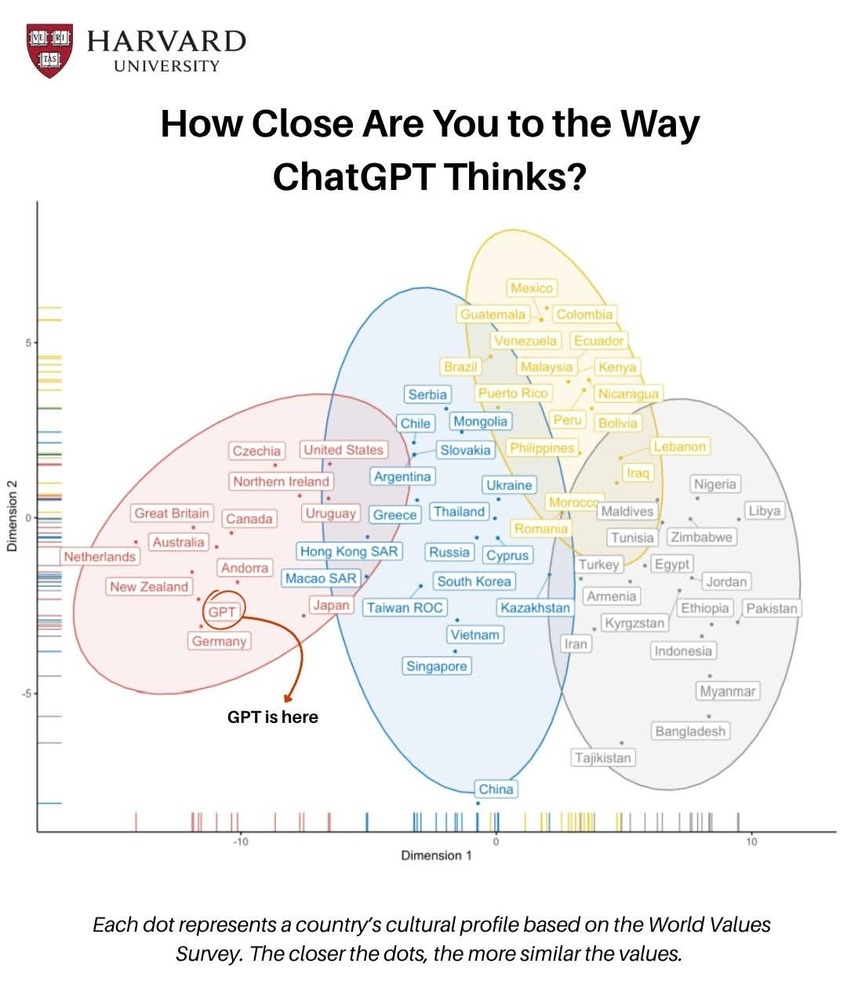
Romania on a jag
dv said:

Romania on a jag
I woulda thought US would be much closer, but yay for Germany?
dv said:

Romania on a jag
Do you know what the “dimensions” represent?
Shouldn’t each of those dots really be a large elliptical shape with very fuzzy edges?
And why is GPT shown in the Australian region if it is really outside it?
Divine Angel said:
dv said:
Romania on a jag
I woulda thought US would be much closer, but yay for Germany?
and wtf is CHINA doing properly getting out there by its awesome self
The Rev Dodgson said:
dv said:

Romania on a jag
Do you know what the “dimensions” represent?
Shouldn’t each of those dots really be a large elliptical shape with very fuzzy edges?
And why is GPT shown in the Australian region if it is really outside it?
we thought once 爱 came into it dimensions were inscrutable to normal fool humans
SCIENCE said:
The Rev Dodgson said:
dv said:

Romania on a jag
Do you know what the “dimensions” represent?
Shouldn’t each of those dots really be a large elliptical shape with very fuzzy edges?
And why is GPT shown in the Australian region if it is really outside it?
we thought once 爱 came into it dimensions were inscrutable to normal fool humans
What’s 爱 got to do with it?
The Rev Dodgson said:
SCIENCE said:
The Rev Dodgson said:
Do you know what the “dimensions” represent?
Shouldn’t each of those dots really be a large elliptical shape with very fuzzy edges?
And why is GPT shown in the Australian region if it is really outside it?
we thought once 爱 came into it dimensions were inscrutable to normal fool humans
What’s 爱 got to do with it?
sigh
https://en.wikipedia.org/wiki/Nonlinear_dimensionality_reduction
good times
Dictionary
Definitions from Oxford Languages · Learn more
爱
/ˌɑːtɪfɪʃl ɪnˈtɛlɪdʒ(ə)n(t)s/
noun
the application of computer systems able to perform tasks or produce output normally requiring human intelligence, especially by applying machine learning techniques to large collections of data.
Divine Angel said:
dv said:

Romania on a jag
I woulda thought US would be much closer, but yay for Germany?
Grok likes Nazi Germany.
SCIENCE said:
Divine Angel said:
dv said:
Romania on a jag
I woulda thought US would be much closer, but yay for Germany?
and wtf is CHINA doing properly getting out there by its awesome self
Could be an artifact of Chinese censorship and the great digital wall. Online Chinese opinions possibly don’t correlate very well with a genuine commentariat.
The Rev Dodgson said:
SCIENCE said:
The Rev Dodgson said:Do you know what the “dimensions” represent?
Shouldn’t each of those dots really be a large elliptical shape with very fuzzy edges?
And why is GPT shown in the Australian region if it is really outside it?
we thought once 爱 came into it dimensions were inscrutable to normal fool humans
What’s 爱 got to do with it?
The Rev Dodgson said:
dv said:

Romania on a jag
Do you know what the “dimensions” represent?
Shouldn’t each of those dots really be a large elliptical shape with very fuzzy edges?
And why is GPT shown in the Australian region if it is really outside it?
I am assuming that these are just the two most dominant eigenvectors made up of linear combinations of various things, rather than easily described metrics, but I’ve not read the paper.
Witty Rejoinder said:
The Rev Dodgson said:
SCIENCE said:
we thought once 爱 came into it dimensions were inscrutable to normal fool humans
What’s 爱 got to do with it?
Thanks Tina.
oh right The Rev Dodgson made a popular cultural reference, we didn’t expect that, damn we got played
SCIENCE said:
Witty Rejoinder said:
The Rev Dodgson said:
What’s 爱 got to do with it?
Thanks Tina.
oh right The Rev Dodgson made a popular cultural reference, we didn’t expect that, damn we got played
Well it is quite an elderly cultural reference.
SCIENCE said:
Witty Rejoinder said:
The Rev Dodgson said:
What’s 爱 got to do with it?
Thanks Tina.
oh right The Rev Dodgson made a popular cultural reference, we didn’t expect that, damn we got played
LOL.
Love it!
:)
This is not new but it is still worth considering.
In households with conventional flush toilets, greywater makes up about 65% of the total wastewater produced by that household. It may be a good source of water for reuse because there is a close relationship between the production of greywater and the potential demand for toilet flushing water.

dv said:
The diagram illustrates the process of computing a Discrete Fourier Transform (DFT) by recursively breaking it down into smaller transforms. I think.
dv said:
Lost me after the equals sign sorry.
dv said:
Considered.
I have no idea what it’s about.
Sorry I couldn’t help.
Spiny Norman said:
dv said:
Lost me after the equals sign sorry.
Doesn’t work as a Magic Eye picture but you could probably use it as a cooling device.
Bubblecar said:
Spiny Norman said:
dv said:
Lost me after the equals sign sorry.
Doesn’t work as a Magic Eye picture but you could probably use it as a cooling device.
The Magic Eye things don’t work for me either.
I don’t understand the maths on the image DV posted, but it does seem elegant in its own way.
ChrispenEvan said:
dv said:
The diagram illustrates the process of computing a Discrete Fourier Transform (DFT) by recursively breaking it down into smaller transforms. I think.
Well considered.
For some reasons I read the word “Consider” as “Clever memes” and I was still trying to work out what the meme was.
And while we are quoraring, consider this piece on Ada Lovelace:
Was Ada Lovelace really the first programmer or is it a myth due to current political nature?
That she is called that has nothing to do with the current political climate.
That there are people who are now trying to cast doubt over a historically documented, long accepted fact does probably have to do with the current political climate in some more backwards parts of the world.
Ada Lovelace (née Byron, she was the daughter of Gordon, lord Byron, a poet that all except the truly uneducated have heard of) was a not your average young 19th century lady.
As a child she was already obsessed with figuring out how mechanical things worked (she took them apart to figure them out) and at some point she managed to get educated by some of the more brilliant minds of her time.
She ended up assisting mathematician, philosopher, inventor and mechanical engineer Charles Babbage in his work of creating first the difference engine (a very early mechanical “computer”) and later designing the analytical engine (a mechanical machine that could do much more complex calculations).
In the course of being his assistant, she also translated works of European thinkers and engineers, including an article by military engineer Luigi Menabrea (who would later become prime minister of Italy).
In the notes she added to that article, she famously included Note G, which was basically a computer program to calculate Bernoulli numbers. It included the use of variables and a loop, and is pretty readable for any modern programmer. The translation, including her notes, was published in 1843.
It is interesting to note that while the program in Note G was clearly intended to run on the analytical engine, the machine was actually never built by Charles Babbage.
Only in the 20th century, people rediscovered his designs, and the analytical engine is considered to be indeed a Turing-complete mechanical computer. It has in more recent years actually been built, and it works.
Ada’s program is widely considered to be the first published computer program in history, and the fact that she wrote it in 1843 for a machine that didn’t even exist in reality makes this a truly remarkable feat.
If you are interested, you can find Note G on Ada Lovelace – Wikipedia :

The Rev Dodgson said:
And while we are quoraring, consider this piece on Ada Lovelace:Was Ada Lovelace really the first programmer or is it a myth due to current political nature?
That she is called that has nothing to do with the current political climate.
That there are people who are now trying to cast doubt over a historically documented, long accepted fact does probably have to do with the current political climate in some more backwards parts of the world.
Ada Lovelace (née Byron, she was the daughter of Gordon, lord Byron, a poet that all except the truly uneducated have heard of) was a not your average young 19th century lady.
As a child she was already obsessed with figuring out how mechanical things worked (she took them apart to figure them out) and at some point she managed to get educated by some of the more brilliant minds of her time.
She ended up assisting mathematician, philosopher, inventor and mechanical engineer Charles Babbage in his work of creating first the difference engine (a very early mechanical “computer”) and later designing the analytical engine (a mechanical machine that could do much more complex calculations).
In the course of being his assistant, she also translated works of European thinkers and engineers, including an article by military engineer Luigi Menabrea (who would later become prime minister of Italy).
In the notes she added to that article, she famously included Note G, which was basically a computer program to calculate Bernoulli numbers. It included the use of variables and a loop, and is pretty readable for any modern programmer. The translation, including her notes, was published in 1843.
It is interesting to note that while the program in Note G was clearly intended to run on the analytical engine, the machine was actually never built by Charles Babbage.
Only in the 20th century, people rediscovered his designs, and the analytical engine is considered to be indeed a Turing-complete mechanical computer. It has in more recent years actually been built, and it works.
Ada’s program is widely considered to be the first published computer program in history, and the fact that she wrote it in 1843 for a machine that didn’t even exist in reality makes this a truly remarkable feat.
If you are interested, you can find Note G on Ada Lovelace – Wikipedia :
Is that Linda’s sister-in law?
Michael V said:
The Rev Dodgson said:
And while we are quoraring, consider this piece on Ada Lovelace:Was Ada Lovelace really the first programmer or is it a myth due to current political nature?
That she is called that has nothing to do with the current political climate.
That there are people who are now trying to cast doubt over a historically documented, long accepted fact does probably have to do with the current political climate in some more backwards parts of the world.
Ada Lovelace (née Byron, she was the daughter of Gordon, lord Byron, a poet that all except the truly uneducated have heard of) was a not your average young 19th century lady.
As a child she was already obsessed with figuring out how mechanical things worked (she took them apart to figure them out) and at some point she managed to get educated by some of the more brilliant minds of her time.
She ended up assisting mathematician, philosopher, inventor and mechanical engineer Charles Babbage in his work of creating first the difference engine (a very early mechanical “computer”) and later designing the analytical engine (a mechanical machine that could do much more complex calculations).
In the course of being his assistant, she also translated works of European thinkers and engineers, including an article by military engineer Luigi Menabrea (who would later become prime minister of Italy).
In the notes she added to that article, she famously included Note G, which was basically a computer program to calculate Bernoulli numbers. It included the use of variables and a loop, and is pretty readable for any modern programmer. The translation, including her notes, was published in 1843.
It is interesting to note that while the program in Note G was clearly intended to run on the analytical engine, the machine was actually never built by Charles Babbage.
Only in the 20th century, people rediscovered his designs, and the analytical engine is considered to be indeed a Turing-complete mechanical computer. It has in more recent years actually been built, and it works.
Ada’s program is widely considered to be the first published computer program in history, and the fact that she wrote it in 1843 for a machine that didn’t even exist in reality makes this a truly remarkable feat.
If you are interested, you can find Note G on Ada Lovelace – Wikipedia :
Is that Linda’s sister-in law?
I had to remind myself who Linda L was.
I’m pretty sure they are not even related.
The Rev Dodgson said:
Michael V said:
The Rev Dodgson said:
And while we are quoraring, consider this piece on Ada Lovelace:Was Ada Lovelace really the first programmer or is it a myth due to current political nature?
That she is called that has nothing to do with the current political climate.
That there are people who are now trying to cast doubt over a historically documented, long accepted fact does probably have to do with the current political climate in some more backwards parts of the world.
Ada Lovelace (née Byron, she was the daughter of Gordon, lord Byron, a poet that all except the truly uneducated have heard of) was a not your average young 19th century lady.
As a child she was already obsessed with figuring out how mechanical things worked (she took them apart to figure them out) and at some point she managed to get educated by some of the more brilliant minds of her time.
She ended up assisting mathematician, philosopher, inventor and mechanical engineer Charles Babbage in his work of creating first the difference engine (a very early mechanical “computer”) and later designing the analytical engine (a mechanical machine that could do much more complex calculations).
In the course of being his assistant, she also translated works of European thinkers and engineers, including an article by military engineer Luigi Menabrea (who would later become prime minister of Italy).
In the notes she added to that article, she famously included Note G, which was basically a computer program to calculate Bernoulli numbers. It included the use of variables and a loop, and is pretty readable for any modern programmer. The translation, including her notes, was published in 1843.
It is interesting to note that while the program in Note G was clearly intended to run on the analytical engine, the machine was actually never built by Charles Babbage.
Only in the 20th century, people rediscovered his designs, and the analytical engine is considered to be indeed a Turing-complete mechanical computer. It has in more recent years actually been built, and it works.
Ada’s program is widely considered to be the first published computer program in history, and the fact that she wrote it in 1843 for a machine that didn’t even exist in reality makes this a truly remarkable feat.
If you are interested, you can find Note G on Ada Lovelace – Wikipedia :
Is that Linda’s sister-in law?
I had to remind myself who Linda L was.
I’m pretty sure they are not even related.
Yeah, probably not.
The Rev Dodgson said:
And while we are quoraring, consider this piece on Ada Lovelace:
Was Ada Lovelace really the first programmer or is it a myth due to current political nature?
That she is called that has nothing to do with the current political climate.
That there are people who are now trying to cast doubt over a historically documented, long accepted fact does probably have to do with the current political climate in some more backwards parts of the world.
Ada Lovelace (née Byron, she was the daughter of Gordon, lord Byron, a poet that all except the truly uneducated have heard of) was a not your average young 19th century lady.
As a child she was already obsessed with figuring out how mechanical things worked (she took them apart to figure them out) and at some point she managed to get educated by some of the more brilliant minds of her time.
She ended up assisting mathematician, philosopher, inventor and mechanical engineer Charles Babbage in his work of creating first the difference engine (a very early mechanical “computer”) and later designing the analytical engine (a mechanical machine that could do much more complex calculations).
In the course of being his assistant, she also translated works of European thinkers and engineers, including an article by military engineer Luigi Menabrea (who would later become prime minister of Italy).
In the notes she added to that article, she famously included Note G, which was basically a computer program to calculate Bernoulli numbers. It included the use of variables and a loop, and is pretty readable for any modern programmer. The translation, including her notes, was published in 1843.
It is interesting to note that while the program in Note G was clearly intended to run on the analytical engine, the machine was actually never built by Charles Babbage.
Only in the 20th century, people rediscovered his designs, and the analytical engine is considered to be indeed a Turing-complete mechanical computer. It has in more recent years actually been built, and it works.
Ada’s program is widely considered to be the first published computer program in history, and the fact that she wrote it in 1843 for a machine that didn’t even exist in reality makes this a truly remarkable feat.
If you are interested, you can find Note G on Ada Lovelace – Wikipedia :
thanks
so wokism began in 1843, nice
The Rev Dodgson said:
And while we are quoraring, consider this piece on Ada Lovelace:Was Ada Lovelace really the first programmer or is it a myth due to current political nature?
That she is called that has nothing to do with the current political climate.
That there are people who are now trying to cast doubt over a historically documented, long accepted fact does probably have to do with the current political climate in some more backwards parts of the world.
Ada Lovelace (née Byron, she was the daughter of Gordon, lord Byron, a poet that all except the truly uneducated have heard of) was a not your average young 19th century lady.
As a child she was already obsessed with figuring out how mechanical things worked (she took them apart to figure them out) and at some point she managed to get educated by some of the more brilliant minds of her time.
She ended up assisting mathematician, philosopher, inventor and mechanical engineer Charles Babbage in his work of creating first the difference engine (a very early mechanical “computer”) and later designing the analytical engine (a mechanical machine that could do much more complex calculations).
In the course of being his assistant, she also translated works of European thinkers and engineers, including an article by military engineer Luigi Menabrea (who would later become prime minister of Italy).
In the notes she added to that article, she famously included Note G, which was basically a computer program to calculate Bernoulli numbers. It included the use of variables and a loop, and is pretty readable for any modern programmer. The translation, including her notes, was published in 1843.
It is interesting to note that while the program in Note G was clearly intended to run on the analytical engine, the machine was actually never built by Charles Babbage.
Only in the 20th century, people rediscovered his designs, and the analytical engine is considered to be indeed a Turing-complete mechanical computer. It has in more recent years actually been built, and it works.
Ada’s program is widely considered to be the first published computer program in history, and the fact that she wrote it in 1843 for a machine that didn’t even exist in reality makes this a truly remarkable feat.
If you are interested, you can find Note G on Ada Lovelace – Wikipedia :
Certainly a remarkable achievement.
¡ boomers who discovered the mind controlling effects of chemtrails and rainbows have discovered static electrical discharge for the first time !
https://www.abc.net.au/news/2025-10-31/aldi-investigates-static-shocks-nambour-store/105942226
But when she took to her local online community board to see if anyone else had felt the same while visiting the Nambour Aldi store, her post sparked dozens of comments. Within 12 hours, more than 80 people, including Tim Dixon, also reported experiencing regular shocks at the store. “You go to touch something in there, anything metal there, and you’ll just get a ripper shock,” Mr Dixon said. “Plenty of times when nothing’s happened and other times you become afraid to touch anything, or I’ll keep touching things so I don’t build up too much static.
sorry we meant dirty wokist millennials discover static electricity

anyway in seriousness though
Static shocks are generally more of a nuisance than a danger to humans. Dr Romero said shoppers could consider wearing gloves as an insulator. Some experts also recommend keeping skin moisturised, wearing leather-soled shoes instead of rubber-soled and dressing in natural fibres.
what happened to just carrying a metal knife around so that you can discharge by stabbing others without directly sparking your own skin
https://www.abc.net.au/news/2025-10-31/lightning-strike-fatal-sporting-complex-cooroy/105955574
Woman died after being struck by lightning. she was taken to nambour hospital so therefore Nambour is the electricity cpaital of the world right now
Automated phone calls with questionnaires at the end.
Never allow you to ask your own questions.
dv said:
Consider the first promissory notes.
why they let these brainless morons be in charge of national finances we’ll never know
Great Britain accidentally adopted a de facto gold standard in 1717 when Isaac Newton, then-master of the Royal Mint, set the exchange rate of silver to gold too low, thus causing silver coins to go out of circulation.
From the latest New Scientist:
“I take the radical view that space and time don’t exist at all”
Vlatko Veral.
I don’t even know what that means.
Perhaps I should read the article.
The Rev Dodgson said:
From the latest New Scientist:“I take the radical view that space and time don’t exist at all”
Vlatko Veral.
I don’t even know what that means.
Perhaps I should read the article.
AI Overview:
The quote, which reflects a radical view in physics, suggests that space and time are not fundamental aspects of reality but are instead emergent phenomena or useful conceptual frameworks. Proponents of this idea, often informed by quantum mechanics, argue that the universe at its most basic level may be a network of information or relationships, rather than a continuous spacetime fabric. This perspective suggests that our perception of a flowing timeline and a vast space is an illusion or a product of our human minds, similar to how frames in a movie create the illusion of motion.
Key arguments
A useful model, not a fundamental reality: Space and time are described as incredibly useful tools for describing how events are ordered and measured, but they may not “exist” in the way a table exists.
An illusion of motion: Our experience of time, the feeling of it “flowing,” is better explained as a difference between various static configurations of the universe, not a fundamental dimension that is constantly changing.
Quantum mechanics challenges the traditional view: At the smallest scales, the concept of a continuous spacetime begins to break down, leading some physicists to believe that a new, more fundamental theory is needed that does not rely on space and time as we know them.
Conceptual clarity: Abandoning the idea of space-time as a fundamental entity can lead to greater clarity in physics, as it removes the need to describe space-time itself as a thing that can exist or change.
A network of relationships: Some theories propose that the universe is made of fundamental units—like quantum numbers—rather than particles moving through space and time.
Bubblecar said:
The Rev Dodgson said:
From the latest New Scientist:“I take the radical view that space and time don’t exist at all”
Vlatko Veral.
I don’t even know what that means.
Perhaps I should read the article.
AI Overview:
The quote, which reflects a radical view in physics, suggests that space and time are not fundamental aspects of reality but are instead emergent phenomena or useful conceptual frameworks. Proponents of this idea, often informed by quantum mechanics, argue that the universe at its most basic level may be a network of information or relationships, rather than a continuous spacetime fabric. This perspective suggests that our perception of a flowing timeline and a vast space is an illusion or a product of our human minds, similar to how frames in a movie create the illusion of motion.
Key arguments
A useful model, not a fundamental reality: Space and time are described as incredibly useful tools for describing how events are ordered and measured, but they may not “exist” in the way a table exists.An illusion of motion: Our experience of time, the feeling of it “flowing,” is better explained as a difference between various static configurations of the universe, not a fundamental dimension that is constantly changing.
Quantum mechanics challenges the traditional view: At the smallest scales, the concept of a continuous spacetime begins to break down, leading some physicists to believe that a new, more fundamental theory is needed that does not rely on space and time as we know them.
Conceptual clarity: Abandoning the idea of space-time as a fundamental entity can lead to greater clarity in physics, as it removes the need to describe space-time itself as a thing that can exist or change.
A network of relationships: Some theories propose that the universe is made of fundamental units—like quantum numbers—rather than particles moving through space and time.
I don’t think a table can exist more than space or time…
dv said:
Bubblecar said:
The Rev Dodgson said:
From the latest New Scientist:“I take the radical view that space and time don’t exist at all”
Vlatko Veral.
I don’t even know what that means.
Perhaps I should read the article.
AI Overview:
The quote, which reflects a radical view in physics, suggests that space and time are not fundamental aspects of reality but are instead emergent phenomena or useful conceptual frameworks. Proponents of this idea, often informed by quantum mechanics, argue that the universe at its most basic level may be a network of information or relationships, rather than a continuous spacetime fabric. This perspective suggests that our perception of a flowing timeline and a vast space is an illusion or a product of our human minds, similar to how frames in a movie create the illusion of motion.
Key arguments
A useful model, not a fundamental reality: Space and time are described as incredibly useful tools for describing how events are ordered and measured, but they may not “exist” in the way a table exists.An illusion of motion: Our experience of time, the feeling of it “flowing,” is better explained as a difference between various static configurations of the universe, not a fundamental dimension that is constantly changing.
Quantum mechanics challenges the traditional view: At the smallest scales, the concept of a continuous spacetime begins to break down, leading some physicists to believe that a new, more fundamental theory is needed that does not rely on space and time as we know them.
Conceptual clarity: Abandoning the idea of space-time as a fundamental entity can lead to greater clarity in physics, as it removes the need to describe space-time itself as a thing that can exist or change.
A network of relationships: Some theories propose that the universe is made of fundamental units—like quantum numbers—rather than particles moving through space and time.
I don’t think a table can exist more than space or time…
I think they need to work out what they mean by “exist” instead of just doing quote signs with their fingers.
dv said:
Bubblecar said:
The Rev Dodgson said:
From the latest New Scientist:“I take the radical view that space and time don’t exist at all”
Vlatko Veral.
I don’t even know what that means.
Perhaps I should read the article.
AI Overview:
The quote, which reflects a radical view in physics, suggests that space and time are not fundamental aspects of reality but are instead emergent phenomena or useful conceptual frameworks. Proponents of this idea, often informed by quantum mechanics, argue that the universe at its most basic level may be a network of information or relationships, rather than a continuous spacetime fabric. This perspective suggests that our perception of a flowing timeline and a vast space is an illusion or a product of our human minds, similar to how frames in a movie create the illusion of motion.
Key arguments
A useful model, not a fundamental reality: Space and time are described as incredibly useful tools for describing how events are ordered and measured, but they may not “exist” in the way a table exists.An illusion of motion: Our experience of time, the feeling of it “flowing,” is better explained as a difference between various static configurations of the universe, not a fundamental dimension that is constantly changing.
Quantum mechanics challenges the traditional view: At the smallest scales, the concept of a continuous spacetime begins to break down, leading some physicists to believe that a new, more fundamental theory is needed that does not rely on space and time as we know them.
Conceptual clarity: Abandoning the idea of space-time as a fundamental entity can lead to greater clarity in physics, as it removes the need to describe space-time itself as a thing that can exist or change.
A network of relationships: Some theories propose that the universe is made of fundamental units—like quantum numbers—rather than particles moving through space and time.
I don’t think a table can exist more than space or time…
I was just about to say that.
The Rev Dodgson said:
dv said:
Bubblecar said:AI Overview:
The quote, which reflects a radical view in physics, suggests that space and time are not fundamental aspects of reality but are instead emergent phenomena or useful conceptual frameworks. Proponents of this idea, often informed by quantum mechanics, argue that the universe at its most basic level may be a network of information or relationships, rather than a continuous spacetime fabric. This perspective suggests that our perception of a flowing timeline and a vast space is an illusion or a product of our human minds, similar to how frames in a movie create the illusion of motion.
Key arguments
A useful model, not a fundamental reality: Space and time are described as incredibly useful tools for describing how events are ordered and measured, but they may not “exist” in the way a table exists.An illusion of motion: Our experience of time, the feeling of it “flowing,” is better explained as a difference between various static configurations of the universe, not a fundamental dimension that is constantly changing.
Quantum mechanics challenges the traditional view: At the smallest scales, the concept of a continuous spacetime begins to break down, leading some physicists to believe that a new, more fundamental theory is needed that does not rely on space and time as we know them.
Conceptual clarity: Abandoning the idea of space-time as a fundamental entity can lead to greater clarity in physics, as it removes the need to describe space-time itself as a thing that can exist or change.
A network of relationships: Some theories propose that the universe is made of fundamental units—like quantum numbers—rather than particles moving through space and time.
I don’t think a table can exist more than space or time…
I was just about to say that.
A fold up table really confuses matters
man some of these jokers need to go back and read Descartes just like buffy did recently
LOL

“In a move that fuses aerospace ambition with AI’s relentless demand for compute, Google has unveiled Project Suncatcher, a radical new initiative that proposes shifting artificial intelligence (AI) infrastructure into orbit. The project, still in research phase, envisions building solar-powered AI data centers in space, designed to harness uninterrupted sunlight and escape the mounting physical limitations of Earth-based computing.
It may sound like science fiction—but Google has already tested radiation-tolerant chips, partnered with space imaging company Planet Labs, and outlined concrete plans to deploy orbital prototypes by 2027. If realized, Suncatcher could redefine the architecture of global compute infrastructure and catalyze an entirely new sector: space-based AI platforms.”
I don’t see how a space-based super-computer could possibly be competitive with a solar powered computer in a desert here on Earth together with a big pile of batteries and maybe back-up power supply. But what would I know.
but this folks is the current state of human critical thinking

wait
SCIENCE said:
dv said:
Consider the first promissory notes.
why they let these brainless morons be in charge of national finances we’ll never know
Great Britain accidentally adopted a de facto gold standard in 1717 when Isaac Newton, then-master of the Royal Mint, set the exchange rate of silver to gold too low, thus causing silver coins to go out of circulation.
in the other hand

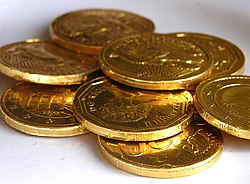
WINTATE but nevertheless we were advised to consider the following so we also invite yous to consider the following.

also something for the professionals of uncertain trustworthiness* among us

*: according to ipsos anyway
SCIENCE said:
captain_spalding said:
Also ABC News:
See it now, before it goes in the It-Never-Happened (Tian’anmen) file.
also something for the professionals of uncertain trustworthiness* among us
*: according to ipsos anyway
sorry captain_spalding beat us to it but it was interesting watching social media blame it on the ship hitting the pylons when the dust and sliding started first

dv said:
Plot twist the owner user of 爱 is some fake cop guy from Ohio ¡

Lean white fish (whiting, ling, hoki, sole, pike, perch, cod etc), which are gout-neutral, are seldom found in tins.
Whereas gout-nasty fish like tuna, salmon, mackerel, sardines, herrings, anchovies etc are very commonly found in tins.
The question is: why?
dv said:
what about a red herring
Bubblecar said:
Lean white fish (whiting, ling, hoki, sole, pike, perch, cod etc), which are gout-neutral, are seldom found in tins.
Whereas gout-nasty fish like tuna, salmon, mackerel, sardines, herrings, anchovies etc are very commonly found in tins.
The question is: why?
Red Herring ¿
Bubblecar said:
Lean white fish (whiting, ling, hoki, sole, pike, perch, cod etc), which are gout-neutral, are seldom found in tins.Whereas gout-nasty fish like tuna, salmon, mackerel, sardines, herrings, anchovies etc are very commonly found in tins.
The question is: why?
What an interesting question.
Seems that oily fish are higher in purines, but I don’t know why.
And oily fish are more apt to be canned, but I don’t know why.
alleged

SCIENCE said:
alleged
That’s one smart dog
Divine Angel said:
SCIENCE said:alleged
That’s one smart dog
Bernard wants to be a saint.
dv said:
Bubblecar said:
Lean white fish (whiting, ling, hoki, sole, pike, perch, cod etc), which are gout-neutral, are seldom found in tins.Whereas gout-nasty fish like tuna, salmon, mackerel, sardines, herrings, anchovies etc are very commonly found in tins.
The question is: why?
What an interesting question.
Seems that oily fish are higher in purines, but I don’t know why.
And oily fish are more apt to be canned, but I don’t know why.
AI Overview says:
Why are lean white fish like Southern Blue Whiting seldom canned?
Lean white fish like Southern Blue Whiting aren’t common in cans because their delicate, flaky texture breaks down too easily during the high heat of canning, resulting in mushy fish, making them better suited for fresh/frozen fillets, frying, or baking where their mild flavor and tender texture shine, unlike fattier fish (sardines, tuna, salmon) that hold their shape and benefit from canning’s oil preservation.
Why They’re Not Canned (and What They’re Good For Instead):
Texture & Fragility: Whiting has a very fine, delicate flesh that easily falls apart, which isn’t ideal for the sturdy chunks typically found in cans.
Moisture Content: Being lean, they lack the natural oils of fish like salmon or mackerel, so canning in oil doesn’t offer the same flavor/moisture benefits, and they can become dry.
Best Uses: Their mild taste and soft flakes are perfect for quick cooking methods like pan-frying (often battered), baking, steaming, or in fish cakes, preserving their desirable texture.
Fish That Are Canned (and Why):
Fatty Fish: Sardines, tuna, salmon, and mackerel are oily, firm, and hold up well to canning, gaining flavor and moisture from the process.
Texture: Their flesh stays intact, providing the chunky, flaky product consumers expect in a can.
In essence, Southern Blue Whiting is a fresh/frozen market fish, not a canning fish, due to its delicate structure and low oil content, making it a popular choice for quick-cooking dishes rather than shelf-stable products.
Bubblecar said:
dv said:
Bubblecar said:
Lean white fish (whiting, ling, hoki, sole, pike, perch, cod etc), which are gout-neutral, are seldom found in tins.Whereas gout-nasty fish like tuna, salmon, mackerel, sardines, herrings, anchovies etc are very commonly found in tins.
The question is: why?
What an interesting question.
Seems that oily fish are higher in purines, but I don’t know why.
And oily fish are more apt to be canned, but I don’t know why.
AI Overview says:
Why are lean white fish like Southern Blue Whiting seldom canned?
Lean white fish like Southern Blue Whiting aren’t common in cans because their delicate, flaky texture breaks down too easily during the high heat of canning, resulting in mushy fish, making them better suited for fresh/frozen fillets, frying, or baking where their mild flavor and tender texture shine, unlike fattier fish (sardines, tuna, salmon) that hold their shape and benefit from canning’s oil preservation.
Why They’re Not Canned (and What They’re Good For Instead):
Texture & Fragility: Whiting has a very fine, delicate flesh that easily falls apart, which isn’t ideal for the sturdy chunks typically found in cans.
Moisture Content: Being lean, they lack the natural oils of fish like salmon or mackerel, so canning in oil doesn’t offer the same flavor/moisture benefits, and they can become dry.
Best Uses: Their mild taste and soft flakes are perfect for quick cooking methods like pan-frying (often battered), baking, steaming, or in fish cakes, preserving their desirable texture.
Fish That Are Canned (and Why):
Fatty Fish: Sardines, tuna, salmon, and mackerel are oily, firm, and hold up well to canning, gaining flavor and moisture from the process.
Texture: Their flesh stays intact, providing the chunky, flaky product consumers expect in a can.
In essence, Southern Blue Whiting is a fresh/frozen market fish, not a canning fish, due to its delicate structure and low oil content, making it a popular choice for quick-cooking dishes rather than shelf-stable products.
Interesting, I like oily fish anyway so it’s a win win for me.
Peak Warming Man said:
Bubblecar said:
dv said:What an interesting question.
Seems that oily fish are higher in purines, but I don’t know why.
And oily fish are more apt to be canned, but I don’t know why.
AI Overview says:
Why are lean white fish like Southern Blue Whiting seldom canned?
Lean white fish like Southern Blue Whiting aren’t common in cans because their delicate, flaky texture breaks down too easily during the high heat of canning, resulting in mushy fish, making them better suited for fresh/frozen fillets, frying, or baking where their mild flavor and tender texture shine, unlike fattier fish (sardines, tuna, salmon) that hold their shape and benefit from canning’s oil preservation.
Why They’re Not Canned (and What They’re Good For Instead):
Texture & Fragility: Whiting has a very fine, delicate flesh that easily falls apart, which isn’t ideal for the sturdy chunks typically found in cans.
Moisture Content: Being lean, they lack the natural oils of fish like salmon or mackerel, so canning in oil doesn’t offer the same flavor/moisture benefits, and they can become dry.
Best Uses: Their mild taste and soft flakes are perfect for quick cooking methods like pan-frying (often battered), baking, steaming, or in fish cakes, preserving their desirable texture.
Fish That Are Canned (and Why):
Fatty Fish: Sardines, tuna, salmon, and mackerel are oily, firm, and hold up well to canning, gaining flavor and moisture from the process.
Texture: Their flesh stays intact, providing the chunky, flaky product consumers expect in a can.
In essence, Southern Blue Whiting is a fresh/frozen market fish, not a canning fish, due to its delicate structure and low oil content, making it a popular choice for quick-cooking dishes rather than shelf-stable products.
Interesting, I like oily fish anyway so it’s a win win for me.
I like all fish but I like the convenience of tinned fish for quick meals.
BUT I suffer quite a bit from gout so shouldn’t have the oilier fish as often as I do.
These days though I buy a lot of frozen hoki and whiting, which don’t cause gout attacks but do require thawing and (quick) cooking.
It’s just a matter of getting used to removing them from the freezer at the right time.

Bubblecar said:
dv said:
Bubblecar said:
Lean white fish (whiting, ling, hoki, sole, pike, perch, cod etc), which are gout-neutral, are seldom found in tins.Whereas gout-nasty fish like tuna, salmon, mackerel, sardines, herrings, anchovies etc are very commonly found in tins.
The question is: why?
What an interesting question.
Seems that oily fish are higher in purines, but I don’t know why.
And oily fish are more apt to be canned, but I don’t know why.
AI Overview says:
Why are lean white fish like Southern Blue Whiting seldom canned?
Lean white fish like Southern Blue Whiting aren’t common in cans because their delicate, flaky texture breaks down too easily during the high heat of canning, resulting in mushy fish, making them better suited for fresh/frozen fillets, frying, or baking where their mild flavor and tender texture shine, unlike fattier fish (sardines, tuna, salmon) that hold their shape and benefit from canning’s oil preservation.
Why They’re Not Canned (and What They’re Good For Instead):
Texture & Fragility: Whiting has a very fine, delicate flesh that easily falls apart, which isn’t ideal for the sturdy chunks typically found in cans.
Moisture Content: Being lean, they lack the natural oils of fish like salmon or mackerel, so canning in oil doesn’t offer the same flavor/moisture benefits, and they can become dry.
Best Uses: Their mild taste and soft flakes are perfect for quick cooking methods like pan-frying (often battered), baking, steaming, or in fish cakes, preserving their desirable texture.
Fish That Are Canned (and Why):
Fatty Fish: Sardines, tuna, salmon, and mackerel are oily, firm, and hold up well to canning, gaining flavor and moisture from the process.
Texture: Their flesh stays intact, providing the chunky, flaky product consumers expect in a can.
In essence, Southern Blue Whiting is a fresh/frozen market fish, not a canning fish, due to its delicate structure and low oil content, making it a popular choice for quick-cooking dishes rather than shelf-stable products.
I don’t see any canned eel on the shelves at the supermarket. They are very oily.
Bubblecar said:
Peak Warming Man said:
Bubblecar said:AI Overview says:
Why are lean white fish like Southern Blue Whiting seldom canned?
Lean white fish like Southern Blue Whiting aren’t common in cans because their delicate, flaky texture breaks down too easily during the high heat of canning, resulting in mushy fish, making them better suited for fresh/frozen fillets, frying, or baking where their mild flavor and tender texture shine, unlike fattier fish (sardines, tuna, salmon) that hold their shape and benefit from canning’s oil preservation.
Why They’re Not Canned (and What They’re Good For Instead):
Texture & Fragility: Whiting has a very fine, delicate flesh that easily falls apart, which isn’t ideal for the sturdy chunks typically found in cans.
Moisture Content: Being lean, they lack the natural oils of fish like salmon or mackerel, so canning in oil doesn’t offer the same flavor/moisture benefits, and they can become dry.
Best Uses: Their mild taste and soft flakes are perfect for quick cooking methods like pan-frying (often battered), baking, steaming, or in fish cakes, preserving their desirable texture.
Fish That Are Canned (and Why):
Fatty Fish: Sardines, tuna, salmon, and mackerel are oily, firm, and hold up well to canning, gaining flavor and moisture from the process.
Texture: Their flesh stays intact, providing the chunky, flaky product consumers expect in a can.
In essence, Southern Blue Whiting is a fresh/frozen market fish, not a canning fish, due to its delicate structure and low oil content, making it a popular choice for quick-cooking dishes rather than shelf-stable products.
Interesting, I like oily fish anyway so it’s a win win for me.
I like all fish but I like the convenience of tinned fish for quick meals.
BUT I suffer quite a bit from gout so shouldn’t have the oilier fish as often as I do.
These days though I buy a lot of frozen hoki and whiting, which don’t cause gout attacks but do require thawing and (quick) cooking.
It’s just a matter of getting used to removing them from the freezer at the right time.
So you have to let them thaw before cooking?
Bubblecar said:
Peak Warming Man said:
Bubblecar said:AI Overview says:
Why are lean white fish like Southern Blue Whiting seldom canned?
Lean white fish like Southern Blue Whiting aren’t common in cans because their delicate, flaky texture breaks down too easily during the high heat of canning, resulting in mushy fish, making them better suited for fresh/frozen fillets, frying, or baking where their mild flavor and tender texture shine, unlike fattier fish (sardines, tuna, salmon) that hold their shape and benefit from canning’s oil preservation.
Why They’re Not Canned (and What They’re Good For Instead):
Texture & Fragility: Whiting has a very fine, delicate flesh that easily falls apart, which isn’t ideal for the sturdy chunks typically found in cans.
Moisture Content: Being lean, they lack the natural oils of fish like salmon or mackerel, so canning in oil doesn’t offer the same flavor/moisture benefits, and they can become dry.
Best Uses: Their mild taste and soft flakes are perfect for quick cooking methods like pan-frying (often battered), baking, steaming, or in fish cakes, preserving their desirable texture.
Fish That Are Canned (and Why):
Fatty Fish: Sardines, tuna, salmon, and mackerel are oily, firm, and hold up well to canning, gaining flavor and moisture from the process.
Texture: Their flesh stays intact, providing the chunky, flaky product consumers expect in a can.
In essence, Southern Blue Whiting is a fresh/frozen market fish, not a canning fish, due to its delicate structure and low oil content, making it a popular choice for quick-cooking dishes rather than shelf-stable products.
Interesting, I like oily fish anyway so it’s a win win for me.
I like all fish but I like the convenience of tinned fish for quick meals.
BUT I suffer quite a bit from gout so shouldn’t have the oilier fish as often as I do.
These days though I buy a lot of frozen hoki and whiting, which don’t cause gout attacks but do require thawing and (quick) cooking.
It’s just a matter of getting used to removing them from the freezer at the right time.
Daily gout medication?
Adenuric is one. There is another.
Peak Warming Man said:
Bubblecar said:
Peak Warming Man said:Interesting, I like oily fish anyway so it’s a win win for me.
I like all fish but I like the convenience of tinned fish for quick meals.
BUT I suffer quite a bit from gout so shouldn’t have the oilier fish as often as I do.
These days though I buy a lot of frozen hoki and whiting, which don’t cause gout attacks but do require thawing and (quick) cooking.
It’s just a matter of getting used to removing them from the freezer at the right time.
So you have to let them thaw before cooking?
You can cook from frozen but they’ll be less mushy and watery if you thaw them in the fridge first.
Bubblecar said:
Peak Warming Man said:
Bubblecar said:I like all fish but I like the convenience of tinned fish for quick meals.
BUT I suffer quite a bit from gout so shouldn’t have the oilier fish as often as I do.
These days though I buy a lot of frozen hoki and whiting, which don’t cause gout attacks but do require thawing and (quick) cooking.
It’s just a matter of getting used to removing them from the freezer at the right time.
So you have to let them thaw before cooking?
You can cook from frozen but they’ll be less mushy and watery if you thaw them in the fridge first.
Roger that.
Over.
Michael V said:
I don’t see any canned eel on the shelves at the supermarket. They are very oily.
Maybe they’re just not regarded as sufficiently popular in Oz, but canned eels are common in Asia.
Canned elvers (baby eels) are apparently popular in Spain (but expensive).
Peak Warming Man said:
Bubblecar said:
Peak Warming Man said:So you have to let them thaw before cooking?
You can cook from frozen but they’ll be less mushy and watery if you thaw them in the fridge first.
Roger that.
Over.
Please don’t. Or if you must, please don’t tell us.
Bubblecar said:
Michael V said:
I don’t see any canned eel on the shelves at the supermarket. They are very oily.
Maybe they’re just not regarded as sufficiently popular in Oz, but canned eels are common in Asia.
Canned elvers (baby eels) are apparently popular in Spain (but expensive).
OK. Fair enough.
Michael V said:
Daily gout medication?Adenuric is one. There is another.
I was on gout medication some years ago but then it more-or-less cleared up.
It’s getting more common again now but I’d rather control it with diet since I’m on so many bloody pills these days.
Bubblecar said:
Michael V said:
Daily gout medication?Adenuric is one. There is another.
I was on gout medication some years ago but then it more-or-less cleared up.
It’s getting more common again now but I’d rather control it with diet since I’m on so many bloody pills these days.
It’s supposed to clear up when on the daily medication. Keep up the once-daily pill and you can eat anything you like. It’s a marvel of modern medicine.
Michael V said:
Bubblecar said:
Michael V said:
Daily gout medication?Adenuric is one. There is another.
I was on gout medication some years ago but then it more-or-less cleared up.
It’s getting more common again now but I’d rather control it with diet since I’m on so many bloody pills these days.
It’s supposed to clear up when on the daily medication. Keep up the once-daily pill and you can eat anything you like. It’s a marvel of modern medicine.
does amputation work
SCIENCE said:
Michael V said:
Bubblecar said:I was on gout medication some years ago but then it more-or-less cleared up.
It’s getting more common again now but I’d rather control it with diet since I’m on so many bloody pills these days.
It’s supposed to clear up when on the daily medication. Keep up the once-daily pill and you can eat anything you like. It’s a marvel of modern medicine.
does amputation work
Let’s do the experiment!
Michael V said:
Bubblecar said:
Michael V said:
I don’t see any canned eel on the shelves at the supermarket. They are very oily.
Maybe they’re just not regarded as sufficiently popular in Oz, but canned eels are common in Asia.
Canned elvers (baby eels) are apparently popular in Spain (but expensive).
OK. Fair enough.
Tin of Spanish baby eels. One tin costs nearly US$60.

Bubblecar said:
Michael V said:
Bubblecar said:Maybe they’re just not regarded as sufficiently popular in Oz, but canned eels are common in Asia.
Canned elvers (baby eels) are apparently popular in Spain (but expensive).
OK. Fair enough.
Tin of Spanish baby eels. One tin costs nearly US$60.
In contrast this tin of roasted eel from Taiwan is only $4.49, from https://premiumco.com.au/

Bubblecar said:
Michael V said:
Bubblecar said:Maybe they’re just not regarded as sufficiently popular in Oz, but canned eels are common in Asia.
Canned elvers (baby eels) are apparently popular in Spain (but expensive).
OK. Fair enough.
Tin of Spanish baby eels. One tin costs nearly US$60.
Gosh!
Bubblecar said:
Bubblecar said:
Michael V said:OK. Fair enough.
Tin of Spanish baby eels. One tin costs nearly US$60.
In contrast this tin of roasted eel from Taiwan is only $4.49, from https://premiumco.com.au/
Still pretty expensive compared to the usual suspects.
But it’d be worth a try.
kii said:
SCIENCE said:
Michael V said:It’s supposed to clear up when on the daily medication. Keep up the once-daily pill and you can eat anything you like. It’s a marvel of modern medicine.
does amputation work
Let’s do the experiment!
SCIENCE
An image showing the mouth parts of an ostracod.

kii said:
An image showing the mouth parts of an ostracod.
Huh!
I submitted some ostracod specimens in my 1st year uni arthropod collection. Before that, I had assumed that ostracods were both extinct and marine. I had read about them being recognisable fossils in Ordovician and Silurian times.
I found the ostracods in a small waterhole in a creek about 30 km northeast of Armidale. They were tiny – each the size of a pin-prick – moving in one direction in this still water. It took me several days to identify them, and I was so surprised and amazed.
:)
Thanks for reviving those memories.
:)
kii said:
An image showing the mouth parts of an ostracod.
Amazing but kind of unnerving
alleged:

Consider if you will the flywheel powered train on the Stourbridge Line:
The company
https://en.wikipedia.org/wiki/Parry_People_Movers
The train
https://en.wikipedia.org/wiki/British_Rail_Class_139
The line
https://en.wikipedia.org/wiki/Stourbridge_Town_branch_line
It’s a bit adorable.

dv said:
Consider if you will the flywheel powered train on the Stourbridge Line:The company
https://en.wikipedia.org/wiki/Parry_People_MoversThe train
https://en.wikipedia.org/wiki/British_Rail_Class_139The line
https://en.wikipedia.org/wiki/Stourbridge_Town_branch_lineIt’s a bit adorable.
Just a little. :)

SCIENCE said:
Equity of wealth is not very well understood.
Well its understood, but not in the ways it should be understood.
SCIENCE said:
:(
I’ve always been happy to say “I don’t know what that means” as it’s a great way to learn something. Feigning knowledge is a path to a continued ignorance.
Although Pauline Hanson’s “please explain” was much mocked, it may be considered a sign of strength of character. There’s not much good that can be said of her, but I will say she’s not one for putting on airs. Trump makes a poor contrast, with all his bluff and bluster, trying to use verbal diarrhoea to cover his pitiable ignorance.
I was reminded of this when Chris Hayes used the term sui generis in interview with Zohran Mamdani, and ZM asked him what the phrase means.
dv said:
I’ve always been happy to say “I don’t know what that means” as it’s a great way to learn something. Feigning knowledge is a path to a continued ignorance.Although Pauline Hanson’s “please explain” was much mocked, it may be considered a sign of strength of character. There’s not much good that can be said of her, but I will say she’s not one for putting on airs. Trump makes a poor contrast, with all his bluff and bluster, trying to use verbal diarrhoea to cover his pitiable ignorance.
I was reminded of this when Chris Hayes used the term sui generis in interview with Zohran Mamdani, and ZM asked him what the phrase means.
I didn’t know what sui generis meant either, until I just looked it up. Thanks. I had ever heard the phrase before.
North American medical practice going all woowoowoo

¡
SCIENCE said:
North American medical practice going all woowoowoo
¡
I might have to get me one of those treatments.
SCIENCE said:
North American medical practice going all woowoowoo
¡
It’s important to keep your crystals aligned.
SCIENCE said:
North American medical practice going all woowoowoo
¡
Care to explain?
dv said:
SCIENCE said:North American medical practice going all woowoowoo
¡
Care to explain?
nm iliu
Epley manoeuvre
Huh
dv said:
SCIENCE said:
North American medical practice going all woowoowoo
¡
Care to explain?
SCIENCE said:
dv said:
SCIENCE said:
North American medical practice going all woowoowoo
¡
Care to explain?
If they hang them upside down that should clear them of any problems.
SCIENCE said:
North American medical practice going all woowoowoo
¡
that isn’t what you do. I have had these ear problems. the dislodged crystals, otoconia, go into the semicircular canals. it is called bppv, benign paroxysmal positional vertigo. you use the epley maneuver to cure it. you can perform it yourself.

https://youtu.be/EAjskIgXaMM?si=7XzSWvvtt6T7vCKu
McLellan v Kirk on the Founding Fathers
well they should have watched Gattaca instead
Dr Pikoos says men make up the vast majority of people she speaks to who are interested in the surgery, and most of them learn about it via pop culture; one of the most notable references being a plotline in the Hollywood rom-com The Materialists.
JudgeMental said:
SCIENCE said:North American medical practice going all woowoowoo
¡
that isn’t what you do. I have had these ear problems. the dislodged crystals, otoconia, go into the semicircular canals. it is called bppv, benign paroxysmal positional vertigo. you use the epley maneuver to cure it. you can perform it yourself.
but we saw it they do do it
SCIENCE said:
JudgeMental said:
SCIENCE said:North American medical practice going all woowoowoo
¡
that isn’t what you do. I have had these ear problems. the dislodged crystals, otoconia, go into the semicircular canals. it is called bppv, benign paroxysmal positional vertigo. you use the epley maneuver to cure it. you can perform it yourself.
but we saw it they do do it
maybe those quacks in Nth America do do it but good Australian doctors don’t!
SCIENCE said:
well they should have watched Gattaca instead
Dr Pikoos says men make up the vast majority of people she speaks to who are interested in the surgery, and most of them learn about it via pop culture; one of the most notable references being a plotline in the Hollywood rom-com The Materialists.
What is “the surgery”?
Michael V said:
SCIENCE said:well they should have watched Gattaca instead
Dr Pikoos says men make up the vast majority of people she speaks to who are interested in the surgery, and most of them learn about it via pop culture; one of the most notable references being a plotline in the Hollywood rom-com The Materialists.
What is “the surgery”?
limb-lengthening surgery.
JudgeMental said:
Michael V said:
SCIENCE said:
well they should have watched Gattaca instead
Dr Pikoos says men make up the vast majority of people she speaks to who are interested in the surgery, and most of them learn about it via pop culture; one of the most notable references being a plotline in the Hollywood rom-com The Materialists.
What is “the surgery”?
limb-lengthening surgery.
pioneered by the Soviets no less
SCIENCE said:
JudgeMental said:
Michael V said:
What is “the surgery”?
limb-lengthening surgery.
pioneered by the Soviets no less

another sputnik
Whilst researching some old stuff on cubic splines, I came across this even older video about
Hard Times in Newquay
for your consideration.
The Rev Dodgson said:
Whilst researching some old stuff on cubic splines, I came across this even older video about
Hard Times in Newquay
for your consideration.
They have long hair, bare feet and they don’t tub.
WTF is this BS
And with women still overwhelmingly the primary carers of young children, experts fear children are not the only ones paying the price of a childcare system under strain. Is gender equality the next casualty of the childcare crisis?
Uh … no ¿ Maybe males could actually step up ¿
SCIENCE said:
WTF is this BS
And with women still overwhelmingly the primary carers of young children, experts fear children are not the only ones paying the price of a childcare system under strain. Is gender equality the next casualty of the childcare crisis?
Uh … no ¿ Maybe males could actually step up ¿
Except the “childcare abuse” crisis has been caused by abusive male childcare workers.
Paedophiles exploiting Australia’s broken childcare system as safeguards crumble
Bubblecar said:
SCIENCE said:
WTF is this BS
And with women still overwhelmingly the primary carers of young children, experts fear children are not the only ones paying the price of a childcare system under strain. Is gender equality the next casualty of the childcare crisis?
Uh … no ¿ Maybe males could actually step up ¿
Except the “childcare abuse” crisis has been caused by abusive male childcare workers.
Paedophiles exploiting Australia’s broken childcare system as safeguards crumble
Uh so are we saying that nonabusive male childcare workers can’t step up, or are we saying that if industrialised mass childcare is no longer seen as fit for purpose then there are no nonabusive male family members at home to step up¿
Like … last time we checked it was still the standard procedure that 1 male and 1 female human would interact to produce an offspring human, so broadly speaking there should be plenty of male humans who should be responsible for said offspring to therefore actually get responsible.
SCIENCE said:
WTF is this BS
And with women still overwhelmingly the primary carers of young children, experts fear children are not the only ones paying the price of a childcare system under strain. Is gender equality the next casualty of the childcare crisis?
Uh … no ¿ Maybe males could actually step up ¿
There is no amount of money you could pay me to work in childcare.
SCIENCE said:
Bubblecar said:
SCIENCE said:
WTF is this BS
And with women still overwhelmingly the primary carers of young children, experts fear children are not the only ones paying the price of a childcare system under strain. Is gender equality the next casualty of the childcare crisis?
Uh … no ¿ Maybe males could actually step up ¿
Except the “childcare abuse” crisis has been caused by abusive male childcare workers.
Paedophiles exploiting Australia’s broken childcare system as safeguards crumble
Uh so are we saying that nonabusive male childcare workers can’t step up, or are we saying that if industrialised mass childcare is no longer seen as fit for purpose then there are no nonabusive male family members at home to step up¿
Like … last time we checked it was still the standard procedure that 1 male and 1 female human would interact to produce an offspring human, so broadly speaking there should be plenty of male humans who should be responsible for said offspring to therefore actually get responsible.
More people are now calling for a ban on male childcare workers for very young children, on heavy statistical grounds.
Childcare sexual abuse is mostly committed by men. Failing to recognise that puts children at risk
Bubblecar said:
SCIENCE said:
Bubblecar said:
Except the “childcare abuse” crisis has been caused by abusive male childcare workers.
Paedophiles exploiting Australia’s broken childcare system as safeguards crumble
Uh so are we saying that nonabusive male childcare workers can’t step up, or are we saying that if industrialised mass childcare is no longer seen as fit for purpose then there are no nonabusive male family members at home to step up¿
Like … last time we checked it was still the standard procedure that 1 male and 1 female human would interact to produce an offspring human, so broadly speaking there should be plenty of male humans who should be responsible for said offspring to therefore actually get responsible.
More people are now calling for a ban on male childcare workers for very young children, on heavy statistical grounds.
Childcare sexual abuse is mostly committed by men. Failing to recognise that puts children at risk
repeat that’s not the point we were making, unless
are you saying that fathers should gtfo from looking after their offspring until the offspring are not very young
SCIENCE said:
Bubblecar said:
SCIENCE said:
Uh so are we saying that nonabusive male childcare workers can’t step up, or are we saying that if industrialised mass childcare is no longer seen as fit for purpose then there are no nonabusive male family members at home to step up¿
Like … last time we checked it was still the standard procedure that 1 male and 1 female human would interact to produce an offspring human, so broadly speaking there should be plenty of male humans who should be responsible for said offspring to therefore actually get responsible.
More people are now calling for a ban on male childcare workers for very young children, on heavy statistical grounds.
Childcare sexual abuse is mostly committed by men. Failing to recognise that puts children at risk
repeat that’s not the point we were making, unless
are you saying that fathers should gtfo from looking after their offspring until the offspring are not very young
I could say a lot about this, as I have in the past.
It is in my past, I don’t want to relive that part of my life, and my brother has retired from early childhood education.
SCIENCE said:
this is some serious shit
https://www.abc.net.au/news/2025-11-26/the-13-year-search-for-a-rare-flower-in-indonesia/106047160
but see second children are always less wanted
“The life cycle of the Rafflesia is nine months long, like a baby in the womb,” he said. “The feeling of seeing it was like seeing my first child.”
captain_spalding said:
SCIENCE said:
alleged
Overall working of the framework presented as an infographic.
Well, that certainly clears up that subject for me.
https://www.abc.net.au/news/2025-11-29/family-court-transcripts-viq-solutions/105904558
VIQ Solutions is a global provider of secure, AI-driven, digital voice and video capture technology and transcription services.
SCIENCE said:
alleged
Overall working of the framework presented as an infographic.
“The reviewed studies demonstrate the potential of AI to revolutionize ASD diagnosis and management.”
Gotta be good for something.
Ian said:
SCIENCE said:alleged
Overall working of the framework presented as an infographic.
“The reviewed studies demonstrate the potential of AI to revolutionize ASD diagnosis and management.”
Gotta be good for something.
My nephew’s company is at the proverbial bleeding edge of AI as a diagnostic tool.
Here he is at a recent conference in Mumbai.

these iconic mathematical images
I’m not sure what it’s all about, but there are some interesting pictures.
this Quora post:
“Unfortunately, that’s a good question. The answer is yes, it has its own properties, a fact that is assumed by general relativity. Einstein disagreed at first, but in his conversations with H. A. Lorentz, he became convinced space is a medium with properties, and that in this sense, an ether does exist, meaning the medium of space is just that, a medium with properties, one that is at least very similar to, if not identical to, the ether. In fact, Einstein later became convinced (in the late 1920’s I think), that the ether is “the sole carrier of reality,” meaning that all particles are in fact structures in the ether.
The “unfortunate” part is that this has to be said, that so many people, including physicists, remain convinced that a vacuum in space is in fact just the emptiness of space.”
Is that actually true, or is it just some Quora poster making stuff up?
The Rev Dodgson said:
this Quora post:“Unfortunately, that’s a good question. The answer is yes, it has its own properties, a fact that is assumed by general relativity. Einstein disagreed at first, but in his conversations with H. A. Lorentz, he became convinced space is a medium with properties, and that in this sense, an ether does exist, meaning the medium of space is just that, a medium with properties, one that is at least very similar to, if not identical to, the ether. In fact, Einstein later became convinced (in the late 1920’s I think), that the ether is “the sole carrier of reality,” meaning that all particles are in fact structures in the ether.
The “unfortunate” part is that this has to be said, that so many people, including physicists, remain convinced that a vacuum in space is in fact just the emptiness of space.”
Is that actually true, or is it just some Quora poster making stuff up?
What was the question?
The Rev Dodgson said:
this Quora post:“Unfortunately, that’s a good question. The answer is yes, it has its own properties, a fact that is assumed by general relativity. Einstein disagreed at first, but in his conversations with H. A. Lorentz, he became convinced space is a medium with properties, and that in this sense, an ether does exist, meaning the medium of space is just that, a medium with properties, one that is at least very similar to, if not identical to, the ether. In fact, Einstein later became convinced (in the late 1920’s I think), that the ether is “the sole carrier of reality,” meaning that all particles are in fact structures in the ether.
The “unfortunate” part is that this has to be said, that so many people, including physicists, remain convinced that a vacuum in space is in fact just the emptiness of space.”
Is that actually true, or is it just some Quora poster making stuff up?
Quantum physicists will tell you that empty space is not really empty (it’s permeated by fields) but that doesn’t mean it’s a “medium” in the traditional sense.
Michael V said:
The Rev Dodgson said:
this Quora post:“Unfortunately, that’s a good question. The answer is yes, it has its own properties, a fact that is assumed by general relativity. Einstein disagreed at first, but in his conversations with H. A. Lorentz, he became convinced space is a medium with properties, and that in this sense, an ether does exist, meaning the medium of space is just that, a medium with properties, one that is at least very similar to, if not identical to, the ether. In fact, Einstein later became convinced (in the late 1920’s I think), that the ether is “the sole carrier of reality,” meaning that all particles are in fact structures in the ether.
The “unfortunate” part is that this has to be said, that so many people, including physicists, remain convinced that a vacuum in space is in fact just the emptiness of space.”
Is that actually true, or is it just some Quora poster making stuff up?
What was the question?
Something like: Is space full of some material substance, or is it just empty?
Quora likes to hide questions once you have read them, so I can’t find the actual question.
Bubblecar said:
The Rev Dodgson said:
this Quora post:“Unfortunately, that’s a good question. The answer is yes, it has its own properties, a fact that is assumed by general relativity. Einstein disagreed at first, but in his conversations with H. A. Lorentz, he became convinced space is a medium with properties, and that in this sense, an ether does exist, meaning the medium of space is just that, a medium with properties, one that is at least very similar to, if not identical to, the ether. In fact, Einstein later became convinced (in the late 1920’s I think), that the ether is “the sole carrier of reality,” meaning that all particles are in fact structures in the ether.
The “unfortunate” part is that this has to be said, that so many people, including physicists, remain convinced that a vacuum in space is in fact just the emptiness of space.”
Is that actually true, or is it just some Quora poster making stuff up?
Quantum physicists will tell you that empty space is not really empty (it’s permeated by fields) but that doesn’t mean it’s a “medium” in the traditional sense.
As Bubblecar said…
“Recapitulating, we may say that according to the general theory of relativity space is endowed with physical qualities; in this sense, therefore, there exists an ether. According to the general theory of relativity space without ether is unthinkable; for in such space there not only would be no propagation of light, but also no possibility of existence for standards of space and time (measuring-rods and clocks), nor therefore any space-time intervals in the physical sense. But this ether may not be thought of as endowed with the quality characteristic of ponderable media, as consisting of parts which may be tracked through time. The idea of motion may not be applied to it.”
Ether and the Theory of Relativity by Albert Einstein
https://mathshistory.st-andrews.ac.uk/Extras/Einstein_ether/
The Rev Dodgson said:
Michael V said:
The Rev Dodgson said:
this Quora post:“Unfortunately, that’s a good question. The answer is yes, it has its own properties, a fact that is assumed by general relativity. Einstein disagreed at first, but in his conversations with H. A. Lorentz, he became convinced space is a medium with properties, and that in this sense, an ether does exist, meaning the medium of space is just that, a medium with properties, one that is at least very similar to, if not identical to, the ether. In fact, Einstein later became convinced (in the late 1920’s I think), that the ether is “the sole carrier of reality,” meaning that all particles are in fact structures in the ether.
The “unfortunate” part is that this has to be said, that so many people, including physicists, remain convinced that a vacuum in space is in fact just the emptiness of space.”
Is that actually true, or is it just some Quora poster making stuff up?
What was the question?
Something like: Is space full of some material substance, or is it just empty?
Quora likes to hide questions once you have read them, so I can’t find the actual question.
What a strange thing to do.
What a fabulous way of getting the goalposts moved easily by the flow of conversation without the ability to re-reference the question.
In any case, Mr Car’s assessment is sensible.
Bubblecar said:
The Rev Dodgson said:
this Quora post:“Unfortunately, that’s a good question. The answer is yes, it has its own properties, a fact that is assumed by general relativity. Einstein disagreed at first, but in his conversations with H. A. Lorentz, he became convinced space is a medium with properties, and that in this sense, an ether does exist, meaning the medium of space is just that, a medium with properties, one that is at least very similar to, if not identical to, the ether. In fact, Einstein later became convinced (in the late 1920’s I think), that the ether is “the sole carrier of reality,” meaning that all particles are in fact structures in the ether.
The “unfortunate” part is that this has to be said, that so many people, including physicists, remain convinced that a vacuum in space is in fact just the emptiness of space.”
Is that actually true, or is it just some Quora poster making stuff up?
Quantum physicists will tell you that empty space is not really empty (it’s permeated by fields) but that doesn’t mean it’s a “medium” in the traditional sense.
But why doesn’t it?
Bubblecar said:
The Rev Dodgson said:
this Quora post:“Unfortunately, that’s a good question. The answer is yes, it has its own properties, a fact that is assumed by general relativity. Einstein disagreed at first, but in his conversations with H. A. Lorentz, he became convinced space is a medium with properties, and that in this sense, an ether does exist, meaning the medium of space is just that, a medium with properties, one that is at least very similar to, if not identical to, the ether. In fact, Einstein later became convinced (in the late 1920’s I think), that the ether is “the sole carrier of reality,” meaning that all particles are in fact structures in the ether.
The “unfortunate” part is that this has to be said, that so many people, including physicists, remain convinced that a vacuum in space is in fact just the emptiness of space.”
Is that actually true, or is it just some Quora poster making stuff up?
Quantum physicists will tell you that empty space is not really empty (it’s permeated by fields) but that doesn’t mean it’s a “medium” in the traditional sense.
exactly it’s literally all just semantics
https://youtu.be/jsoFj_64f9c?si=w_l77O6nCbm8blYC
The battle of the signals: ETCS vs CBTS
European Train Control System vs Communication Based Train System
dv said:
https://youtu.be/jsoFj_64f9c?si=w_l77O6nCbm8blYCThe battle of the signals: ETCS vs CBTS
European Train Control System vs Communication Based Train System
Tragic.
lolfk
People may also choose to buy cassettes for the nostalgia, for their “retro” cool aesthetic, to be able to own music (instead of streaming it), and to make cheap and quick recordings.
just download MP3 our dudes damn
SCIENCE said:
lolfk
People may also choose to buy cassettes for the nostalgia, for their “retro” cool aesthetic, to be able to own music (instead of streaming it), and to make cheap and quick recordings.
just download MP3 our dudes damn
Cassette recorders and their tapes were always the most mechanically unreliable music devices.
I did buy a cheap one recently though, to upload some of my old recordings to the pooter. Eventually.
https://youtu.be/WMZoT_pGWAs?si=Ij3ayKWVHCUrVc6d
Biblical inerrancy: a 20th century meme
dv said:
https://youtu.be/WMZoT_pGWAs?si=Ij3ayKWVHCUrVc6dBiblical inerrancy: a 20th century meme

This looks worthy of consideration:
The Rev Dodgson said:
This looks worthy of consideration:
best part is the webOnePointZero retained
this statement from Quora:
“ Natural Selection is actually a minor part (though still important) of the overall process.”
referring to the process of evolution.
So what are these other major parts of the process of evolution, that do not involve natural selection?
The Rev Dodgson said:
this statement from Quora:“ Natural Selection is actually a minor part (though still important) of the overall process.”
referring to the process of evolution.
So what are these other major parts of the process of evolution, that do not involve natural selection?
You mean they didn’t inform you?
The Rev Dodgson said:
this statement from Quora:“ Natural Selection is actually a minor part (though still important) of the overall process.”
referring to the process of evolution.
So what are these other major parts of the process of evolution, that do not involve natural selection?
Why are you asking this here instead of on Quora, where the claim was made?
btm said:
The Rev Dodgson said:
this statement from Quora:“ Natural Selection is actually a minor part (though still important) of the overall process.”
referring to the process of evolution.
So what are these other major parts of the process of evolution, that do not involve natural selection?
Why are you asking this here instead of on Quora, where the claim was made?
1) I waste quite enough time on Quora without actively getting involved in discussions there.
2) I thought I’d check with the friendly people here to see if I was missing something, not being an evolutionist myself.
The Rev Dodgson said:
btm said:
The Rev Dodgson said:
this statement from Quora:“ Natural Selection is actually a minor part (though still important) of the overall process.”
referring to the process of evolution.
So what are these other major parts of the process of evolution, that do not involve natural selection?
Why are you asking this here instead of on Quora, where the claim was made?
1) I waste quite enough time on Quora without actively getting involved in discussions there.
2) I thought I’d check with the friendly people here to see if I was missing something, not being an evolutionist myself.
Me neither, Adam and Eve were good enough for the ANCIENTS and they are good enough for me.
However, I’m open minded enough to realise that they probably weren’t their real names.
Peak Warming Man said:
The Rev Dodgson said:
btm said:Why are you asking this here instead of on Quora, where the claim was made?
1) I waste quite enough time on Quora without actively getting involved in discussions there.
2) I thought I’d check with the friendly people here to see if I was missing something, not being an evolutionist myself.
Me neither, Adam and Eve were good enough for the ANCIENTS and they are good enough for me.
However, I’m open minded enough to realise that they probably weren’t their real names.
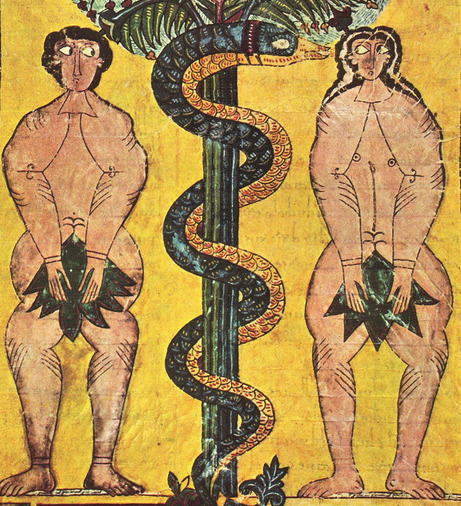
fsm said:
Peak Warming Man said:
The Rev Dodgson said:1) I waste quite enough time on Quora without actively getting involved in discussions there.
2) I thought I’d check with the friendly people here to see if I was missing something, not being an evolutionist myself.
Me neither, Adam and Eve were good enough for the ANCIENTS and they are good enough for me.
However, I’m open minded enough to realise that they probably weren’t their real names.
Some good practical advice from The Incredible String Band
once before the world began
God was sitting in the sky
he began to get some mud together
o I wonder why
first he made a man
and then he made a woman
mr. Adam and miss Eve
they began to be quite good friends
as I can well believe
o remember that morning
remember that time
take a warning
when you see the sign
Eve was sitting in the garden
when in came a serpent
miss Eve take this apple
give it to your man
give it to your man
I don’t want it
o Adam give it a try
o give it a try
so friends, if you’re travelling
never go taking an apple from a snake
if you do I will tell you true
you’re making a big mistake
The Rev Dodgson said:
this statement from Quora:“ Natural Selection is actually a minor part (though still important) of the overall process.”
referring to the process of evolution.
So what are these other major parts of the process of evolution, that do not involve natural selection?
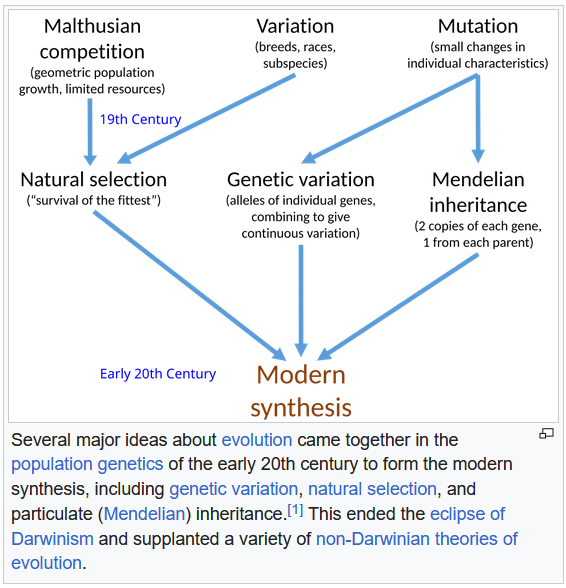
The Rev Dodgson said:
this statement from Quora:“ Natural Selection is actually a minor part (though still important) of the overall process.”
referring to the process of evolution.
So what are these other major parts of the process of evolution, that do not involve natural selection?
I mean I suppose mutation has to be one of the major parts.
dv said:
The Rev Dodgson said:
this statement from Quora:“ Natural Selection is actually a minor part (though still important) of the overall process.”
referring to the process of evolution.
So what are these other major parts of the process of evolution, that do not involve natural selection?
I mean I suppose mutation has to be one of the major parts.
Perhaps not all mutations survive.
fsm said:
Peak Warming Man said:
The Rev Dodgson said:1) I waste quite enough time on Quora without actively getting involved in discussions there.
2) I thought I’d check with the friendly people here to see if I was missing something, not being an evolutionist myself.
Me neither, Adam and Eve were good enough for the ANCIENTS and they are good enough for me.
However, I’m open minded enough to realise that they probably weren’t their real names.
What an interesting picture.
esselte said:
The Rev Dodgson said:
this statement from Quora:“ Natural Selection is actually a minor part (though still important) of the overall process.”
referring to the process of evolution.
So what are these other major parts of the process of evolution, that do not involve natural selection?
The selection principle is mathematically necessary so they’re bullshitting.
btm said:
The Rev Dodgson said:
this statement from Quora:“ Natural Selection is actually a minor part (though still important) of the overall process.”
referring to the process of evolution.
So what are these other major parts of the process of evolution, that do not involve natural selection?
Why are you asking this here instead of on Quora, where the claim was made?
wait we thought verification through independent sources was preferred
The Rev Dodgson said:
this statement from Quora:“ Natural Selection is actually a minor part (though still important) of the overall process.”
referring to the process of evolution.
So what are these other major parts of the process of evolution, that do not involve natural selection?
Witty Rejoinder said:
The Rev Dodgson said:
this statement from Quora:“ Natural Selection is actually a minor part (though still important) of the overall process.”
referring to the process of evolution.
So what are these other major parts of the process of evolution, that do not involve natural selection?
Speciation for one.
Probably just a question of where we draw lines.
I’d say speciation was part of the process of natural selection, not a separate thing.
The Rev Dodgson said:
Witty Rejoinder said:
The Rev Dodgson said:
this statement from Quora:
“ Natural Selection is actually a minor part (though still important) of the overall process.”
referring to the process of evolution.
So what are these other major parts of the process of evolution, that do not involve natural selection?
Speciation for one.Probably just a question of where we draw lines.
I’d say speciation was part of the process of natural selection, not a separate thing.
we thought speciation was just semantics being the process of answering the question you just asked, where we draw lines
The Rev Dodgson said:
Witty Rejoinder said:
The Rev Dodgson said:
this statement from Quora:“ Natural Selection is actually a minor part (though still important) of the overall process.”
referring to the process of evolution.
So what are these other major parts of the process of evolution, that do not involve natural selection?
Speciation for one.Probably just a question of where we draw lines.
I’d say speciation was part of the process of natural selection, not a separate thing.
It’s not natural selection when species split because new natural boundaries isolate different groups of the same animal.

https://youtu.be/J52c9kb70oE?si=M4E5GQHb5fn73WfV
The origin of the American KJV-only movement

This is the start of the Beatitudes in Matthew 5, in the 4th century bible called the Codex Sinaiticus. I don’t read Greek but I do recognise the repeated MAKAPIOIOI meaning “blessed are”.
I don’t know how people tolerated reading like this… all caps, nonspaces, and the column is about a dozen characters wide.
dv said:

This is the start of the Beatitudes in Matthew 5, in the 4th century bible called the Codex Sinaiticus. I don’t read Greek but I do recognise the repeated MAKAPIOIOI meaning “blessed are”.
I don’t know how people tolerated reading like this… all caps, nonspaces, and the column is about a dozen characters wide.
I’m guessing that paper being far from as easy to get as now and having to write in small letters (so all-caps is clearer) might be a factor.
I know that with letters from the fledgling colony that’s now Sydney, a lot of the letters were written across the page as per normal, but also vertically up the page so they could get the most words onto each page. Paper being difficult to get, of course.
Spiny Norman said:
dv said:

This is the start of the Beatitudes in Matthew 5, in the 4th century bible called the Codex Sinaiticus. I don’t read Greek but I do recognise the repeated MAKAPIOIOI meaning “blessed are”.
I don’t know how people tolerated reading like this… all caps, nonspaces, and the column is about a dozen characters wide.
I’m guessing that paper being far from as easy to get as now and having to write in small letters (so all-caps is clearer) might be a factor.
I know that with letters from the fledgling colony that’s now Sydney, a lot of the letters were written across the page as per normal, but also vertically up the page so they could get the most words onto each page. Paper being difficult to get, of course.
Aye.
This would have been vellum, made from stretched calfskin. Not sure how many pages you get from one calf but one imagines this was quite a process.
dv said:
Spiny Norman said:
dv said:

This is the start of the Beatitudes in Matthew 5, in the 4th century bible called the Codex Sinaiticus. I don’t read Greek but I do recognise the repeated MAKAPIOIOI meaning “blessed are”.
I don’t know how people tolerated reading like this… all caps, nonspaces, and the column is about a dozen characters wide.
I’m guessing that paper being far from as easy to get as now and having to write in small letters (so all-caps is clearer) might be a factor.
I know that with letters from the fledgling colony that’s now Sydney, a lot of the letters were written across the page as per normal, but also vertically up the page so they could get the most words onto each page. Paper being difficult to get, of course.
Aye.
This would have been vellum, made from stretched calfskin. Not sure how many pages you get from one calf but one imagines this was quite a process.
There were no real minuscules until around 800CE when Charlemagne introduced and popularised the Carolingian minuscules, although uncial script could be considered an early attempt at minuscule. Also, word separation wasn’t introduced until the 7th century (by Irish monks.)
The Book of Kells is written on vellum; it’s about 680 pages long, and it’s estimated that about 185 calves were needed to produce it.

Consider the perpetual brainrot of Quora.
Strawberries have smell right? I’m not imagining it?
dv said:

Consider the perpetual brainrot of Quora.
Strawberries have smell right? I’m not imagining it?
As an avid strawberry eater, who has several kilos of strawberries in the freezer, I can confirm that real strawberries have a smell.
Also I have a Lotso bear.
Divine Angel said:
dv said:
Consider the perpetual brainrot of Quora.
Strawberries have smell right? I’m not imagining it?
As an avid strawberry eater, who has several kilos of strawberries in the freezer, I can confirm that real strawberries have a smell.
Also I have a Lotso bear.
There was a time on an old internet forum when casual readers would have thought yous lot had perpetual brain rot as well, we mean how do we know that it’s orange coloured when it’s in the dark¿
Ethyl methylphenylglycidate, commonly known as strawberry aldehyde, is an organic compound used in the flavor industry in artificial fruit flavors, particularly strawberry.
dv said:

Consider the perpetual brainrot of Quora.
Strawberries have smell right? I’m not imagining it?
No. You are not.

dv said:
What’s the flack like.
dv said:
What’s special about a fourth degree polynomial? My limited maths ponders whether every random set of 3D locations could be fitted to a curve with multiple turning points?
Witty Rejoinder said:
Peak Warming Man said:
dv said:
What’s the flack like.
What’s special about a fourth degree polynomial? My limited maths ponders whether every random set of 3D locations could be fitted to a curve with multiple turning points?
Just Wait Until They Realise The Earth Rotates Making It Periodic And Hence Its Periodic And Fits On A Fourth Order Fourier
dv said:
Works differently down here.
Australia’s 5 smallest cities lie exactly on a 4th degree polynomial.
the rather long cartoon at this link (posted by Mo Nastri):
The Rev Dodgson said:
the rather long cartoon at this link (posted by Mo Nastri):
is it true
SCIENCE said:
The Rev Dodgson said:
the rather long cartoon at this link (posted by Mo Nastri):
is it true
How would I know? :)
The Rev Dodgson said:
SCIENCE said:The Rev Dodgson said:
the rather long cartoon at this link (posted by Mo Nastri):
is it true
How would I know? :)
The Rev Dodgson said:
the rather long cartoon at this link (posted by Mo Nastri):
Hah. Very good.
“Will having different servings, which we call the “Scandinavian serving method”, so you can choose flavours to individual preference, help with meal enjoyment¿”
https://theconversation.com/will-the-scandinavian-sleep-method-really-help-me-sleep-270359
deity’s fucking prophet, must be a slow news day
SCIENCE said:
“Will having different servings, which we call the “Scandinavian serving method”, so you can choose flavours to individual preference, help with meal enjoyment¿”
https://theconversation.com/will-the-scandinavian-sleep-method-really-help-me-sleep-270359
deity’s fucking prophet, must be a slow news day
Hmm, how about separate beds? Or better still, separate bedrooms?
Consider this tree. What is it?

kii said:
Consider this tree. What is it?
https://en.wikipedia.org/wiki/Araucaria
Bunya…
Stand down. I remembered the name.
imagine you’re the best drivers in the world so
https://www.abc.net.au/news/2025-12-29/australian-drivers-truckies-courtesy-wave/106152822
yes or no
Consider that in the future, AI will be able to read, recite and explain all forms of mathematics using nothing but natural language.
“It’s not the venom that kills you, it’s the effects of the venom,” she said.
uh
SCIENCE said:
“It’s not the venom that kills you, it’s the effects of the venom,” she said.
uh
It’s very well known that bullets don’t kill people, rather it’s the effects of the bullets.
SCIENCE said:
“It’s not the venom that kills you, it’s the effects of the venom,” she said.
uh
It’s not having your head stoved in that kills you, it’s the effects of having your head stoved in.
And even then, it’s not the effects of having your head stoved in that kill you, it’s the effects of those effects as they unfold.
SCIENCE said:
“It’s not the venom that kills you, it’s the effects of the venom,” she said.
uh
Lolol…..derp.
It sounds like the venom damaged her brain. She’s not thinking very clearly, is she?
kii said:
SCIENCE said:“It’s not the venom that kills you, it’s the effects of the venom,” she said.
uh
Lolol…..derp.
It sounds like the venom damaged her brain. She’s not thinking very clearly, is she?
No, it wasn’t the venom that damaged her brain..
Anyway full marks to the attending couple. They knew what to do, and even if that in itself didn’t help, the effects of what they did were what mattered.
wait
Imagine putting a rock into a small bathtub and another rock of the same size into a pool. The water level in the bathtub will rise much higher. Tides are so variable in the territory because the ocean floor off the coast of northern Australia is far shallower than the rest of the country. It means when a tide displaces water, the same volume of water has less room to move. It has nowhere to go but up.
On 1 January, Thomson takes over as the director general of Cern, the multi-Nobel prizewinning nuclear physics laboratory on the outskirts of Geneva. It is here, deep beneath the ground, that the Large Hadron Collider (LHC), the largest scientific instrument ever built, recreates conditions that existed microseconds after the big bang. The machine won its place in history for discovering the mysterious Higgs boson, whose accompanying field turns space into a kind of cosmic glue. But one of the first things Thomson will do is turn the machine off for engineering work. It will not restart until his term is nearly over.
also it’s 17 years old, consider

now does it really
SCIENCE said:
now does it really
Real actors. Now do they need a data centre?
this advice from Quora:
“How do some students solve all of the engineering physics problems?
Begin by looking over the chapter. Before you read it in detail, look at all the figures; look at all the sections, headings. Try to get a sense of what is in the chapter. Try to guess what is most important.
Then look at the problems at the end of the chapter. Do you know how to solve any of them? (Don’t try to solve them; just look at them.) Can you see the connections between the problems and the chapter?
Next, read the chapter carefully. Don’t get hung up on any one paragraph, but if you feel you don’t understand it thoroughly, then mark it as something you need to work on again.
After you have read the chapter, but before you go to the problems, go back to those sections you didn’t understand, and try again. If you have trouble, then seek help from another student, or visit the office hours of your professor.
Go to the problems at the end of the book. Start by trying to work the ones that were assigned. If you really did the reading as I suggested, you might find that they are a lot easier than you anticipated.
After you have done the ones you can do, look at the other problems. Don’t go to the trouble of doing each one, but go to the trouble of outlining how you would do each one. If you get stuck on any of them, go back to the text.
Finally, review the assigned problems that were too hard. At this point, you might say, “Oh — why was that so hard? I see how to do it now.” At least, that’s what you hope for. If you don’t see how to do it, then (but only then) consult with another student. You probably missed something, and you don’t want to beat your head against a wall trying to figure out what it was. A little help from a friend can save you hours.
Here’s what NOT to do (but which is done by many students): They read the chapter quickly, without full comprehension, but then go back as needed as they work the assigned problems. As a result, the process takes a lot longer, and they learn far less; they will not be prepared for the exams.”
I wonder what SCIENCE thinks of that.
The Rev Dodgson said:
this advice from Quora:
“How do some students solve all of the engineering physics problems?
Begin by looking over the chapter. Before you read it in detail, look at all the figures; look at all the sections, headings. Try to get a sense of what is in the chapter. Try to guess what is most important.Then look at the problems at the end of the chapter. Do you know how to solve any of them? (Don’t try to solve them; just look at them.) Can you see the connections between the problems and the chapter?
Next, read the chapter carefully. Don’t get hung up on any one paragraph, but if you feel you don’t understand it thoroughly, then mark it as something you need to work on again.
After you have read the chapter, but before you go to the problems, go back to those sections you didn’t understand, and try again. If you have trouble, then seek help from another student, or visit the office hours of your professor.
Go to the problems at the end of the book. Start by trying to work the ones that were assigned. If you really did the reading as I suggested, you might find that they are a lot easier than you anticipated.
After you have done the ones you can do, look at the other problems. Don’t go to the trouble of doing each one, but go to the trouble of outlining how you would do each one. If you get stuck on any of them, go back to the text.
Finally, review the assigned problems that were too hard. At this point, you might say, “Oh — why was that so hard? I see how to do it now.” At least, that’s what you hope for. If you don’t see how to do it, then (but only then) consult with another student. You probably missed something, and you don’t want to beat your head against a wall trying to figure out what it was. A little help from a friend can save you hours.
Here’s what NOT to do (but which is done by many students): They read the chapter quickly, without full comprehension, but then go back as needed as they work the assigned problems. As a result, the process takes a lot longer, and they learn far less; they will not be prepared for the exams.”
I wonder what SCIENCE thinks of that.
tbh we were lazy as shit in our student days so we just relied on educators being able to guide us to the most important key ideas and problems
probably unsurprisingly as yous can see we’re pretty bad at actually solving problems now so sadly yous can figure how good most of our educators were for that kind of student
The Moai could “walk”.
“The physics makes sense. What we saw experimentally actually works and, as it gets bigger, it still works.
SCIENCE said:
The Moai could “walk”.
“The physics makes sense. What we saw experimentally actually works and, as it gets bigger, it still works.
One can use a similar system oneself for anything that’s too heavy to lift. eg a fridge or washing machine. Two people makes it even easier. It’s one of the furniture removalists’ skills.
LOL

JudgeMental said:
LOL
What can go wrong?
Michael V said:
SCIENCE said:The Moai could “walk”.
“The physics makes sense. What we saw experimentally actually works and, as it gets bigger, it still works.
One can use a similar system oneself for anything that’s too heavy to lift. eg a fridge or washing machine. Two people makes it even easier. It’s one of the furniture removalists’ skills.
Yep. I’ve often used the walking method to do things by myself.
roughbarked said:
Michael V said:
SCIENCE said:The Moai could “walk”.
“The physics makes sense. What we saw experimentally actually works and, as it gets bigger, it still works.
One can use a similar system oneself for anything that’s too heavy to lift. eg a fridge or washing machine. Two people makes it even easier. It’s one of the furniture removalists’ skills.
Yep. I’ve often used the walking method to do things by myself.
Sometimes I even use the walking method to get me across the room.
Divine Angel said:
JudgeMental said:
LOL
What can go wrong?
well, the NSN will have find a different clothing supplier.
JudgeMental said:
Divine Angel said:
JudgeMental said:
LOL
What can go wrong?
well, the NSN will have find a different clothing supplier.
hydroxylamine
roughbarked said:
Michael V said:
SCIENCE said:The Moai could “walk”.
“The physics makes sense. What we saw experimentally actually works and, as it gets bigger, it still works.
One can use a similar system oneself for anything that’s too heavy to lift. eg a fridge or washing machine. Two people makes it even easier. It’s one of the furniture removalists’ skills.
Yep. I’ve often used the walking method to do things by myself.
It’s how I put the short throw tipper on the opal mine by myself. It weighted about a tonne.
Michael V said:
SCIENCE said:The Moai could “walk”.
“The physics makes sense. What we saw experimentally actually works and, as it gets bigger, it still works.
One can use a similar system oneself for anything that’s too heavy to lift. eg a fridge or washing machine. Two people makes it even easier. It’s one of the furniture removalists’ skills.
Ah, so hiding links in commas is SCIENCE’s latest little trick is it? :)
I wonder if that is how they transported the stones for Stonehenge from the other end of the country?
The Rev Dodgson said:
Michael V said:
SCIENCE said:The Moai could “walk”.
“The physics makes sense. What we saw experimentally actually works and, as it gets bigger, it still works.
One can use a similar system oneself for anything that’s too heavy to lift. eg a fridge or washing machine. Two people makes it even easier. It’s one of the furniture removalists’ skills.
Ah, so hiding links in commas is SCIENCE’s latest little trick is it? :)
I wonder if that is how they transported the stones for Stonehenge from the other end of the country?
SCIENCE has been doing that for a while.
The Rev Dodgson said:
Michael V said:
SCIENCE said:The Moai could “walk”.
“The physics makes sense. What we saw experimentally actually works and, as it gets bigger, it still works.
One can use a similar system oneself for anything that’s too heavy to lift. eg a fridge or washing machine. Two people makes it even easier. It’s one of the furniture removalists’ skills.
Ah, so hiding links in commas is SCIENCE’s latest little trick is it? :)
I wonder if that is how they transported the stones for Stonehenge from the other end of the country?
Huh!
I didn’t notice those commas. It’s not an easy colour to see, you see…
There had been a scientific article on Moai locomotion some time back. I searched “The Moai could “walk”.” to assist my recollection.
Unlikely to have moved the Scotland-sourced Stonehenge stone that way. Several hundred kilometres, a centimetre or so at a time seems inordinately slow. Even the fifty-odd km from Wales seems slow. Rollers and possibly boats seems far more probable to me.
Michael V said:
roughbarked said:
Michael V said:One can use a similar system oneself for anything that’s too heavy to lift. eg a fridge or washing machine. Two people makes it even easier. It’s one of the furniture removalists’ skills.
Yep. I’ve often used the walking method to do things by myself.
It’s how I put the short throw tipper on the opal mine by myself. It weighted about a tonne.
Been there done that.
The Rev Dodgson said:
Michael V said:
SCIENCE said:The Moai could “walk”.
“The physics makes sense. What we saw experimentally actually works and, as it gets bigger, it still works.
One can use a similar system oneself for anything that’s too heavy to lift. eg a fridge or washing machine. Two people makes it even easier. It’s one of the furniture removalists’ skills.
Ah, so hiding links in commas is SCIENCE’s latest little trick is it? :)
I wonder if that is how they transported the stones for Stonehenge from the other end of the country?
‘twas myself who showed him that trick.
The Rev Dodgson said:
Michael V said:
SCIENCE said:The Moai could “walk”.
“The physics makes sense. What we saw experimentally actually works and, as it gets bigger, it still works.
One can use a similar system oneself for anything that’s too heavy to lift. eg a fridge or washing machine. Two people makes it even easier. It’s one of the furniture removalists’ skills.
Ah, so hiding links in commas is SCIENCE’s latest little trick is it? :)
I wonder if that is how they transported the stones for Stonehenge from the other end of the country?
By hiding links in commas? I doubt it.
btm said:
The Rev Dodgson said:
Michael V said:One can use a similar system oneself for anything that’s too heavy to lift. eg a fridge or washing machine. Two people makes it even easier. It’s one of the furniture removalists’ skills.
Ah, so hiding links in commas is SCIENCE’s latest little trick is it? :)
I wonder if that is how they transported the stones for Stonehenge from the other end of the country?
By hiding links in commas? I doubt it.
;)
btm said:
The Rev Dodgson said:
Michael V said:One can use a similar system oneself for anything that’s too heavy to lift. eg a fridge or washing machine. Two people makes it even easier. It’s one of the furniture removalists’ skills.
Ah, so hiding links in commas is SCIENCE’s latest little trick is it? :)
I wonder if that is how they transported the stones for Stonehenge from the other end of the country?
By hiding links in commas? I doubt it.
Giggle.
:)
JudgeMental said:
The Rev Dodgson said:
Michael V said:One can use a similar system oneself for anything that’s too heavy to lift. eg a fridge or washing machine. Two people makes it even easier. It’s one of the furniture removalists’ skills.
Ah, so hiding links in commas is SCIENCE’s latest little trick is it? :)
I wonder if that is how they transported the stones for Stonehenge from the other end of the country?
SCIENCE has been doing that for a while.
That would explain why so many of his posts have been a total mystery to me then :)
The Rev Dodgson said:
JudgeMental said:
The Rev Dodgson said:Ah, so hiding links in commas is SCIENCE’s latest little trick is it? :)
I wonder if that is how they transported the stones for Stonehenge from the other end of the country?
SCIENCE has been doing that for a while.
That would explain why so many of his posts have been a total mystery to me then :)
There you go.
The Rev Dodgson said:
JudgeMental said:
The Rev Dodgson said:Ah, so hiding links in commas is SCIENCE’s latest little trick is it? :)
I wonder if that is how they transported the stones for Stonehenge from the other end of the country?
SCIENCE has been doing that for a while.
That would explain why so many of his posts have been a total mystery to me then :)
he’s got the inscrutable reputation to live up to.
https://youtube.com/shorts/pHbK6sh-u2k?si=jxA9U0amhAnf2SKv
Alternative Adam Sandler
Some thoughts on micro energy levels.
How much electrical energy does a single thought use?
How much electrical energy does 1 dream use?
How much energy does an average female orgasm use?
How muchl energy does an average male orgasm use?
How much electrical energy does the average person use per minute?
How much energy does an average blue collar worker use in a working day?
How much energy does an average white collar worker use in a working day?
Tau.Neutrino said:
Some thoughts on micro energy levels.
How much electrical energy does a single thought use?
How much electrical energy does 1 dream use?
How much energy does an average female orgasm use?
How muchl energy does an average male orgasm use?
How much electrical energy does the average person use per minute?
How much energy does an average blue collar worker use in a working day?
How much energy does an average white collar worker use in a working day?
1014 to 1019 GeV
SCIENCE said:
Tau.Neutrino said:
Some thoughts on micro energy levels.
How much electrical energy does a single thought use?
How much electrical energy does 1 dream use?
How much energy does an average female orgasm use?
How muchl energy does an average male orgasm use?
How much electrical energy does the average person use per minute?
How much energy does an average blue collar worker use in a working day?
How much energy does an average white collar worker use in a working day?
1014 to 1019 GeV
LOL
Michael V said:
SCIENCE said:Tau.Neutrino said:
Some thoughts on micro energy levels.
How much electrical energy does a single thought use?
How much electrical energy does 1 dream use?
How much energy does an average female orgasm use?
How muchl energy does an average male orgasm use?
How much electrical energy does the average person use per minute?
How much energy does an average blue collar worker use in a working day?
How much energy does an average white collar worker use in a working day?
1014 to 1019 GeV
LOL
:)
also very importantly, the
Rohit D’Costa, an intensive care doctor and medical director of Donate Life Victoria, said Ms Duncan’s “very meaningful” gift is without precedence. “Karen is, as far as we know, the first person to have donated organs and tissues after self-administration of a VAD substance,” Dr D’Costa said.
order of operations performed to retrieve those organs was irrelevant

work
dv said:
:)
But it wasn’t until Buddhism came to Japan in the mid-sixth century that women were banned from Okinoshima completely. “Buddhism brought in this more permanent view of women’s inferiority and it made this idea stronger,” Professor Okano said.
SCIENCE said:
But it wasn’t until Buddhism came to Japan in the mid-sixth century that women were banned from Okinoshima completely. “Buddhism brought in this more permanent view of women’s inferiority and it made this idea stronger,” Professor Okano said.
Gotta love the purity bullshit many cultures adhere to and don’t you dare criticise as you are wrong.
Genetics would tell you no as breeding in weakness
What would a universe look like if it had only 1 frequency?
Tau.Neutrino said:
What would a universe look like if it had only 1 frequency?
timeless
SCIENCE said:
Tau.Neutrino said:
What would a universe look like if it had only 1 frequency?
timeless
pointlike
SCIENCE said:
SCIENCE said:
Tau.Neutrino said:
What would a universe look like if it had only 1 frequency?
timeless
pointlike
But ultimately pointless?
Witty Rejoinder said:
SCIENCE said:
SCIENCE said:
timeless
pointlike
But ultimately pointless?
if it’s that simple then yeah we’ve lost interest in it
SCIENCE said:
SCIENCE said:
Tau.Neutrino said:
What would a universe look like if it had only 1 frequency?
timeless
pointlike
boring
My photo of frozen stars.

kii said:
My photo of frozen stars.
Seriously: what are they really?
Michael V said:
kii said:
My photo of frozen stars.
Seriously: what are they really?
It’s a cast iron gem star-shaped pan.
https://www.ebay.com/itm/296695217321
I left it outside and the rain water froze overnight. The rust coloured the ice.
kii said:
Michael V said:
kii said:
My photo of frozen stars.
Seriously: what are they really?
It’s a cast iron gem star-shaped pan.
https://www.ebay.com/itm/296695217321
I left it outside and the rain water froze overnight. The rust coloured the ice.

kii said:
Michael V said:
kii said:
My photo of frozen stars.
Seriously: what are they really?
It’s a cast iron gem star-shaped pan.
https://www.ebay.com/itm/296695217321
I left it outside and the rain water froze overnight. The rust coloured the ice.
Thanks.
a… alleged






SCIENCE said:
Think how pleased as a government you must be to convince your population, work rights are commie
Cymek said:
SCIENCE said:
Think how pleased as a government you must be to convince your population, work rights are commie
don’t worry they reckon that when 10 people have all the wealth and 爱 will do all the work, the rest of the humans will totally be given universal basic income by the benevolent demideities and enjoy their share of the living
SCIENCE said:
Cymek said:
SCIENCE said:
Think how pleased as a government you must be to convince your population, work rights are commie
don’t worry they reckon that when 10 people have all the wealth and 爱 will do all the work, the rest of the humans will totally be given universal basic income by the benevolent demideities and enjoy their share of the living
PMSL.
assortative nonmating


dv said:
Tell that to pickled herrings.
in breaking news old people are people too so
when the room gets too hot they get bad sleep just like other people

SCIENCE said:
probably 爱
How many rabbits does that keep out of China?
Divine Angel said:
SCIENCE said:
probably 爱
How many rabbits does that keep out of China?
i
Letter from Charles Darwin to his cousin while he was in college
“My dear Fox
I am dying by inches, from not having any body to talk to about insects:—my only reason for writing, is to remove a heavy weight from my mind, so now you must understand, what you will perceive before you come to the end of this; that I am writing merely for my own pleasure & not your’s.— I have been very idle since I left Cambridge in every possible way & amongst the rest in Entomology.”
https://services.cudl.lib.cam.ac.uk/v1/transcription/tei/diplomatic/internal/MS-DAR-00144/i218/i221
I found this QI:
The Rev Dodgson said:
I found this QI:
Who knew that Noon is actually 3 pm?
At least according to the Romans.
The Rev Dodgson said:
I found this QI:
Oh this is interesting! Thanks Rev
Currently reading A Christmas Carol to Mini Me (her request) and Scrooge waits for 1am. He knows the time because the bell chimes every 15 minutes. How freaking annoying would that be??
The Rev Dodgson said:
I found this QI:
It’s not bad.
Ora (Greek) ——> Year and hour.
Ian said:
Divine Angel said:
The Rev Dodgson said:
The Rev Dodgson said:
I found this QI:
Who knew that Noon is actually 3 pm?
At least according to the Romans.
Oh this is interesting! Thanks Rev
Currently reading A Christmas Carol to Mini Me (her request) and Scrooge waits for 1am. He knows the time because the bell chimes every 15 minutes. How freaking annoying would that be??
It’s not bad.
Ora (Greek) ——> Year and hour.
classic traditionalist prescriptivist bigotry
time words mean exactly what the transmitter and the receiver agree to understand them to mean
in fact, someone of such literary calibre as yourself should know that when we use a word, in rather a scornful tone, it means just what we choose it to mean, neither more nor less
the question is whether you can make words mean so many different things
Intro
Time.
You’re experiencing it right now.
But have you ever taken a second to stop and ask,
Why is a second spelt the same as second?
Why is a minute spelt the same as “minute”?
Was an hour ever actually a H-our?
And what exactly do we watch when we watch a watch?
Well, I’ve been exploring all of these questions and
the answers are all surprising and fascinating.
Join me as we take a timely trip through temporal terms.
It’s high time for another RobWords.
Watch
I’m in what I think is a frankly beautiful watch shop here in Berlin,
which just happens to be where I live.
However, and I hope they won’t mind, I’ve actually brought my own.
This one.
This one was made in 1890 by my great grandfather.
My ancestors were watchmakers.
But you know that a watch isn’t called a watch because you “watch” it to see the time?
A watch is called a watch
because it wakes you up.
The words “watch” and “wake” are, historically speaking, the same.
They come from the same Old English term meaning to remain vigilant.
The first references to a clock as a watch referred to alarm clocks.
In fact the word “alarm” comes from the French “a l’arme” meaning “to
arms!” “to your weapons, the enemy is coming!”
A shout that is sure to get anyone out of bed.
Clock
The word “clock” itself is a fascinating one.
The word “clock” has nothing to do with the face, or the numbers, or the hands.
It’s not because you can “clock it” to see the time.
A clock is so called…
because it has a bell.
Clock is related to the German Glocke and French cloche, both of which mean “bell”.
In the medieval period the way people knew the time was from the toll of the bell,
not what the dial said which, if it was there, was secondary.
O’clock
To this day, when we say “three o’clock” we’re saying “three chimes of the bell”.
O’clock is “of the clock” or essentially “of the bell”.
This is from a 15th century last will and testament,
where dear old John Baret of Bury St Edmunds says
he wants his funeral mass to be held “at seven of the clock”.
Second
So watches are wakers and clocks are bells
but now let’s talk about time periods.
First: second.
By which I mean we’re going to talk about “second” first.
We’ll do “minute” second in a minute,
but just this second, let’s look at “second” first.
On the face of it – ah-ha! clock pun – it is odd that we use the same word for
a brief period of time as we use for the position between first and third.
Just think about it: second and second.
But it stops being odd when you realise that the time period the second is
the second of something.
Here we have a creative representation of an hour.
Now, we divide an hour into sixty little pieces, which we call “minutes”,
and then we divide those minutes into sixty little pieces too, which we call seconds.
Now, the reason a second is called a “second” is
that it’s the result of this second division of an hour.
Bear with me…
So, it comes from the Latin secunda minuta meaning “second minute”,
our minute being a prima minuta, or “first minute”.
While trawling through old uses of the word “seconds”, which is the sort of thing that I do,
I found this wonderful one that shows the logic taken even further.
It’s from an introduction to algorisme from 1539
and describes how the year has 365 days,
the day 24 hours,
the hour has 60 minutes,
every minute 60 seconds,
every second 60 thirds,
every third 60 quarts – so fourths -
every quart 60 fifths,
every fifth 60 sixths and so forth infinitely.
The third, fourth, fifth, sixth etc. each represent a new division by 60.
And all of these time periods would have been
truly tiny.
By this logic, a sixth would be one 777-million-600-thousandth of a
minute or one 46-billion-656-millionth of an hour.
And I’m not sure 16th century clocks were that accurate.
Minute
We’re dealing with time periods that even now we would struggle to measure, they are so…
minute.
Ah. What’s this? Is that minute or is it minute?
Well, do you know what?
It kind of could be either because those two words come from the same source.
Both minute and minute derive ultimately from the Latin minuere, meaning “to make small”.
In the case of the time period, it becomes the noun form minuta,
i.e. something that’s been “made small”, a small thing,
and appears in prima minuta – the first small thing.
Meanwhile the word minute is an adjective form of the same Latin verb.
The two English words should probably be
pronounced the same given their identical spellings.
However, the weird pronunciation of the first syllable of MI-nute
is thought likely to have been influenced by other tiny words like minor and minus.
It goes way back, too. Here it is in a pronunciation dictionary from 1764.
Fun fact, though: The first recorded usage of
the word “minute” in English is not to refer to a period of time
but to a coin. One described as being “of trifling value”.
And to this day, as well as representing one sixtieth of an hour,
a minute can also represent one 60th of a degree.
Indeed a second can also refer to one sixtieth of one sixtieth of a degree.
Here’s Geoffrey Chaucer, no less, using it with just such a meaning:
“Understand well that these degrees of signs…” -
he’s talking about constellations, star signs, which rotate in the heavens -
“…are each of them considered of 60 minutes and every minute of 60 seconds,
and so forth into small fractions infinite.”
He wrote that some time around the 1390s.
Amazing.
Apologies if all this talk of degrees of rotation is making your head spin.
We will move on in a tick.
But before we do, I need to take a second to mention another second
Secondment
just ticking along in the English language.
The word “second”, as in “secondment”.
Despite the pronunciation, this is the same as our other two seconds.
Secondment involves someone being literally “second-ed”.
It’s from a practice the British military copied from the French, in which
as this 1805 military dictionary helpfully describes
“Capitaine en Second” and “Lieutenant en Second” referred to
“officers whose companies have been reduced, but who do duty in others,
“and are destined to fill up the first vacancies.
“We have borrowed the expression and say, To be seconded.”
A second-in-command in the military is still sometimes called a “second”
but the differing pronunciation of second
is simply a result of trying to replicate how the French say the word:
suh-GOND.
NordVPN
We’re going to tackle the etymology of hour in,
ooh, around about a moment,
but first, let’s see how time references I can cram into this next bit.
Now, when I’m not time travelling, I like to travel the world from my own home,
using this video’s sponsor, NordVPN.
NordVPN is SECOND to none.
Its VPN allows you to change your online location,
meaning you can surf the net like you’re in another country or TIMEZONE.
That allows you to CLOCK internet content that isn’t available where you are.
And when it comes to staying safe on the net,
HOURGLASS runneth over because NordVPN will disguise your IP,
protecting your device on unsecured public wifi.
For your overall internet security,
on NordVPN you can dePEND. YOU LUMp in its Threat Protection Pro feature,
and you’ve got the whole package.
It’s TICKING all the boxes, scanning any downloads for malware, steering
you away from dangerous websites, and blocking trackers and ads.
What’s more, you can keep your whole family protected,
GRANDFATHER included, by having NordVPN on up to 10 devices.
So to secure all these BIG BENefits,
go to nordvpn.com/robwordsvpn or follow the link in the description
to get an exclusive deal with an extra four MONTHS
– that’s one’s cheating a bit –
on top. And you can essentially try it for freE ON account of NordVPN’s 30-day money-back guarantee.
So give it a go. Get protected. PERIOD.
Medieval timekeeping The clock agrees.
Now, did you know there was a period in around the 14th century when an hour was being broken up,
not into minutes and seconds,
but points, moments, ounces and atoms.
You can see it in this quote,
which I showed in a recent video about metric and imperial units because
how crazy is it to see “ounces” as a period of time?
It’s because “ounce” and indeed “inch” both literally mean “twelfth”.
There were four points to the hour, and a point was ten moments.
So, if you’ve ever wondered, a moment is – by my maths, which isn’t always perfect –
yeh, it’s a fortieth of an hour, or 90 seconds,
which is rather longer than I was expecting.
The smallest unit here is the atom.
Why? Because the word “atom” comes from the Greek for “indivisible”.
You can’t get any smaller.
Of course it turns out that physical atoms are divisible with a bit of effort.
Hour
But what of the word “hour” itself?
Well, that too traces back to Ancient Greek, to ora,
which as well as just meaning “hour” could also mean season.
So hours are effectively seasons of the day.
But to the Ancient Greeks, like many other ancient civilisations, an hour was not 60 minutes long.
They used what we call “temporal hours”
or “seasonal hours” that varied in length throughout the year.
Daytime and nighttime were broken up each into 12 hours
that would lengthen and shorten as sunrise and sunset changed.
A daylight hour could be our equivalent of 45 minutes in the depths of winter,
but 75 minutes at the height of summer.
But that word ora passes from Greek into Latin,
from Latin into French, and from French into English
and while researching the journey this word took
into English I came across this, in my opinion, midblowing note.
It says the “h” in hour “became mute in Romanic”
That’s the late Latin that would morph into French, Spanish, Italian and others.
And says “and though since written in French, Spanish, and English has never been pronounced.”
Did you get that?
In English, the H in “hour” has never been pronounced.
It was never a ‘H-our’.
Not only that, it was never pronounced in French either.
So when we borrowed the word hour from French, the H was already silent.
We were borrowing silent letters.
I think that’s really something.
Something quite annoying, but it’s something.
“Hour” is one of many thousands of French words that entered English after William of Normandy,
AKA William the Conqueror, conquered England in 1066, seizing power from the Anglo-Saxons.
So that raises the question, what was the English word for “hour”
before the French brought over the word hour?
Well it’s at the end of this very same note.
It was “tíd”, or as we now pronounce it “tide”.
It’s the same word we use to describe the moon-led cycles of the sea or in words like “yuletide”.
“Tide” meant a “period”.
The Anglo-Saxons also had the word “stund” or “stound” to describe a short amount of time,
which was used to mean an hour as well,
and is almost identical to the modern German word for an hour: Stunde.
Honestly, I could go on for hours about how Germans tell the time.
Did you know that in German the time “half two” – “halb zwei” – doesn’t refer to 2.30,
but 1.30.
They think of it as being half way to two o’clock, rather than half way past two o’clock.
It actually makes a lot of sense when you think about it,
but must have made for an awful lot of missed appointments with English speakers.
All my German friends always say “one-thirty”, “two-thirty” to me to avoid exactly this mix-up.
Noon
Another concept that gets lost in translation is the English term
“midday”, which many of my German friends will interpret as being
vaguely some time around the middle of the day, which makes sense.
But in fact, it means a precise time, doesn’t it? Noon.
However, allow me to really mess with your head now by telling you that noon…
isn’t 12 o’clock.
Not if we’re taking the word literally.
The word “noon” can be traced back to classical Latin where it was “nōna” and meant
“the ninth hour of the day”.
It’s the same non we see in words like nonagon, a 9-sided shape,
and indeed it’s ultimately related to our word “nine”.
So which is the ninth hour of the day?
Is it 9am? No.
It’s nine hours after sunrise according to the Roman method, which was at 6am.
So noon should actually be 3pm.
And look at this text from the 1400s. You can see how noon was
seen as the mid-point between midday and dusk:
“If they eat at midday, she shall eat at noon;
if they eat at noon, she shall eat at even” – evening.
Times of the day
Let me just run you through some more times of day, because they’re totally worth a look.
Starting with “dawn”. This is a word coined by Shakespeare.
Before Willy came along it was known as “the dawning”.
“Morning” on the other hand has made the opposite journey.
“Morn” was sunrise and the period around it was “the morning”.
Afternoon, as we’ve already discussed, should probably begin at 3pm,
but has historically meant the period between your midday meal and your evening meal.
I’d call them lunch and dinner but I know that others wouldn’t.
Let’s not get into it.
Twilight is the “between light”.
The “twi” is related to “‘twixt”, “‘tween” and “twain”, and indeed “two”.
It’s the light between afternoon and evening.
Dusk is a reference to how “dusky” and dark that time of day is,
however the word was originally “ducs” rather than “dusc”. I mean it.
And “night” means, well, night.
Its origins run way back to the ancient ancestral
language shared by languages all over Europe and beyond.
That’s why so many words for night across Europe are similar to night.
They all mean “that dark bit that isn’t the day”.
Which leads us neatly onto our next unit of time:
Day
The day. 24 little hours.
Day is an excellent, earthy Germanic word.
Look across English’s Germanic sister languages
and they all use something that isn’t a million miles away from the word “day”.
Especially if you look at how the word day used to be spelt in English.
But the relatives of the word reach far and wide.
It’s believed to have stemmed from an ancient root that meant something like “to burn”
which makes sense, right?
Every day begins with the rising of a burning ball in the sky.
Days of the week
Several of our names for days of the week also testify to English’s shared Germanic history,
mentioning deities worshipped by the Anglo-Saxons before they went Christian.
Our days of the week are named as follows.
Space rock, Germanic God,
Germanic God, Germanic God,
Germanic God, Roman God,
Burning ball in the sky.
Week
Together they form a “week”, a word that has its own mysterious origins.
All the experts are certain of is that it goes way, way back.
But what they reckon is that it may have started out as a word meaning “a change of duty”.
A reference to the gods that each do their duty overseeing the days.
There are a couple of words in other languages that back this idea up too.
Firstly, Latin has vicis meaning “turn” or “change”.
And secondly, Old Icelandic had a word, vika, which meant a distance travelled at sea,
which seems quite far away, doesn’t it?
However, that distance is thought to have been calculated based upon how far you can get
before you have a “change of duty”, i.e. a change of the team of rowers.
Could be related, right?
So that’s a week, but in the past English had another name for a period of seven days.
Did you know that?
It was a “sennight”. More literally a “seven-night”.
In Old English it was a seofeniht.
Sennight may have fallen out of usage, but its supersized cousin the fortnight has not.
Not in the UK, anyway, I use it all the time.
And that is just a “fourteen night” a féowertýne niht.
We just lost a few syllables through a millennium of compound laziness.
You can understand why sennight fell by the wayside.
Overmorrow and ereyesterday
It wasn’t doing anything that week couldn’t do instead.
But there are a couple of timely terms that have died out that I would gladly resurrect.
For example, we used to have a word for “the day after tomorrow”,
a concept that currently requires four words to get across.
The defunct designation “overmorrow” was far superior.
Look at this quotation from 1535 in the Coverdale Bible:
“Let us make our prayer unto God today, tomorrow, and overmorrow.”
Beautiful.
Here in Germany they’ve kept their equivalent, übermorgen, and their language is richer for it.
You can even say überübermorgen for the day after the day after tomorrow.
So that would be over-overmorrow.
But I would settle for just bringing back overmorrow.
And then, they day after we’ve brought back the word for the day after tomorrow,
we’re going to bring back the word for the day before yesterday,
which by that point will be today, won’t it?
Anyway, the word we lost was ereyesterday.
Or as it appears in that same old 16th century bible, yeryesterdaye.
By the way, precisely what the “yester” in “yesterday” means is a bit of a quandary.
Especially given that the Gothic version of the word…
Say it with confidence, Rob…
gistradagis, meant tomorrow, not yesterday.
The to- in tomorrow and indeed today is thought to come from an Old English construction.
In the case of “today” it meant “to this day”.
And by extension, “tomorrow” means “until the coming morning”.
Month
Now, the moon has come up a couple of times in this video already
as the driver of tides and the eponymous hero of the first day of the working week.
However, Earth’s celestial companion also exerts its influence over our calendars,
because the word “month” means nothing more complex than a “moon-th”.
In terms of their historical development, “moon” and “month” are essentially the same word,
meaning the phrase “lunar month” – though necessary to differentiate from a calendar month
– is a tautology. It says the same thing twice.
It’s says “moony moon”.
A period of three months is called a trimester
from the Latin for three months
and a period of six months is called a semester
from the Latin for six months.
I only mention these because I used to be under the impression a trimester referred to a third.
A nine month pregnancy has three trimesters, after all.
And a semester represented half of something, like “semi”.
That’s why an academic year has two of them.
But no. The -mester bit is from Latin mensis, meaning “month”.
A semester is six months.Ten o’clock.
Now, where was I?
So two semesters, four trimesters, 12 months, or 13 moony months each make a year.
Year
The final stop of this time travelling trip through temporal terms. And it is
a doozy.
Why?
Because the clever folk who’ve looked into these things believe that the word “year”,
which has been in the English language since before it was even in England,
can be traced back to this Greek word here.
Now does that word ring any bells?
Well it should be chiming louder than Big Ben,
because that is precisely the same Greek word that earlier gave us “hour”.
We said it could mean “a season”: a gloriously ambiguous timeframe that means
English now has two words descended from it.
One denoting 60 minutes, and the other meaning 365 days.
Or 366 in a leap year.
A year is technically an hour
and an hour is technically a year.
How’s that for a chronological bombshell?
And with that, we’ll end.
Thank you so much to the nice folk at Askania watches for letting me film in their lovely shop.
Thanks to NordVPN for sponsoring this video, and mostly:
thanks to you for watching it.
Sign up to my free newsletter if you really like this sort of geeky word stuff
and I’ll see you in whatever you choose to watch next.
Until next time, goodbye.
dv said:
Letter from Charles Darwin to his cousin while he was in college
“My dear Fox
I am dying by inches, from not having any body to talk to about insects:—my only reason for writing, is to remove a heavy weight from my mind, so now you must understand, what you will perceive before you come to the end of this; that I am writing merely for my own pleasure & not your’s.— I have been very idle since I left Cambridge in every possible way & amongst the rest in Entomology.”
https://services.cudl.lib.cam.ac.uk/v1/transcription/tei/diplomatic/internal/MS-DAR-00144/i218/i221
if only he had ChatGPT to talk insects with, ¡ he’d still be alive now
Celebrate Neurodiversity And Inclusion ¡ Break Stereotypes ¡ Free Yourselves From Consumerist Capitalism ¡

this piece on the right way to give stuff to Trump:
Should Machado have given her Nobel Prize medal to Donald Trump?
Not the way she did.
Don’t get me wrong. The idea was outstanding. Machado was giving up something that means a lot less to her than what she hoped to gain, which is Donald Trump’s support of her opposition party as Venezuela seeks to move on from Maduro’s dictatorship.
At a base level, the gift shows she understood how Trump thinks about things like this – in terms of transaction. “If you want something from me, what are you willing to give me in return?”
She also knew how covetous Trump is of the Nobel Peace Prize.
She knew he desired it greatly, and that of everything she had to give him, there was nothing he would want more. That word’s going to become important in a minute.
It’s at this point where her thinking and planning failed, and it appears to me to be a fundamental misunderstanding of who Trump is on two fronts.
Had she better understood Trump, and what he would value…Note the difference there…there is a difference between what Trump wants and what Trump values. She would have left the prize back home, bought something else to give him, something shiny and gold, somehow connected to Venezuela…and waited.
The first thing she misunderstood is what Trump values about the Nobel Peace Prize, or actually, things in general. Trump doesn’t value the deep-seated meaning of the prize, what it means to be awarded the prize, what it means to be a recipient of the prize.
He values possessing it. Look at the glee on his face as he holds it in its big gaudy gold frame.
This is a man who values possessions. And he now possesses what he wants to possess.
What is the meaning of being a recipient of the prize? Machado has that. And it appears that’s what Machado values, based on her willingness to give up the physical medal itself so easily.
So there is her second fundamental mistake. She no longer has anything to offer. Trump already possesses what he wants from her. She left with a swag bag and no promises of support.
It’s Trump’s support that Machado needs, and she believed that by giving him a gift she knew he’d love, she could earn it.
What she should have done is wait for Trump to bring up the Peace Prize in conversation, because there is a 100% chance he would. Or as Trump would say, a 1000% chance.
It is at that point that she would remind him that she dedicated it to him when she accepted it. Then follow up with a master stroke of her negotiation…a proposal.
“Sir, I’m so glad the medal is in such a safe place while all this turmoil is going on, but once the dust settles, and everything is as it should be, Mr. President, I can’t wait to come back here and meet with you again so that I can bring it to you and present it to you, because I think you should have it!”
And THAT is how you deal with:
The transactional nature of the way Trump sees the world, and
Stoking the fire of Trump’s deep-seated covetousness for a thing you have, something he greatly desires to possess, and something you can give him without giving up anything you truly value about it.
So yes. Machado made a HUGE mistake giving Trump her Peace Prize. What she should have done was offer to give it to him once things were the way she wanted them to be, “in gratitude” for his support.
She would have gone home with a hell of a lot more than a swag bag.
The Rev Dodgson said:
“Sir, I’m so glad the medal is in such a safe place while all this turmoil is going on, but once the dust settles, and everything is as it should be, Mr. President, I can’t wait to come back here and meet with you again so that I can bring it to you and present it to you, because I think you should have it!”
And THAT is how you deal with:
The transactional nature of the way Trump sees the world, and
Stoking the fire of Trump’s deep-seated covetousness for a thing you have, something he greatly desires to possess, and something you can give him without giving up anything you truly value about it.
So yes. Machado made a HUGE mistake giving Trump her Peace Prize. What she should have done was offer to give it to him once things were the way she wanted them to be, “in gratitude” for his support.She would have gone home with a hell of a lot more than a swag bag.
Such a pity she didn’t have this advisor prior to the meeting with the orange shitgibbon.
the so called information paradox:
Black hole information paradox
It seems to me that the only thing paradoxical about it is that apparently the idea of conservation of information should be considered an absolute and unquestionable necessity.
I don’t recall seeing this principle seriously discussed anywhere, but it seems to me to be highly questionable.
What do you think?
dv said:
Consider the first promissory notes.
so
https://yoz.com/wired/2.05/abacus.html
it came true after all
SCIENCE said:
dv said:
Consider the first promissory notes.
so
https://yoz.com/wired/2.05/abacus.html
it came true after all
What have the Chinese ever done for us?
Witty Rejoinder said:
SCIENCE said:
dv said:
Consider the first promissory notes.
so
https://yoz.com/wired/2.05/abacus.html
it came true after all
What have the Chinese ever done for us?
uh the article was about visionaries predicting that private and virtual currencies would become all the rage
SCIENCE said:
Witty Rejoinder said:
SCIENCE said:
so
https://yoz.com/wired/2.05/abacus.html
it came true after all
What have the Chinese ever done for us?
uh the article was about visionaries predicting that private and virtual currencies would become all the rage
TL/DR… I was more commenting on the invention of fiat currency.
this Quora post on AI by Mats Andersson:
By 2030, artificial intelligence will not feel like a tool at all. It will be the air we breathe, the electricity behind our thoughts. What will it be like to live in this world?
I saw only yesterday that one survey had found that 95% of companies that had introduced AI in their operations saw no profit or increased productivity at all. (Haven’t had the time to look into it myself; it might be somewhat selective.) This while AI companies collectively lose to the tune of $1bn per day.
It seems like the operating model is the same as in the dotcom bubble: they invest insane amounts now, assuming that they will become profitable because obviously people will be quite willing to pay around $100 per month for something that’s free now. That’s how the calculations went in 1999 for the Internet. It’s also how I was called stupid for saying that maybe people wouldn’t want to upgrade their mobile phones every year, especially not when the cost would run to some $500 (in 1999 money).
Currently, AI is drowning many formerly worthwhile channels in an endless deluge of drivel. I’m not a fan – what it produces is invariably shit. Sheer shit. I’m busy blocking absolutely any outlet that pushes AI-produced shit on me.
If this goes on, by 2030 I’ll have gone offline completely and will live like it was the 1980s again. Frankly, I’m sort of looking forward to it.
The Rev Dodgson said:
this Quora post on AI by Mats Andersson:
By 2030, artificial intelligence will not feel like a tool at all. It will be the air we breathe, the electricity behind our thoughts. What will it be like to live in this world?
I saw only yesterday that one survey had found that 95% of companies that had introduced AI in their operations saw no profit or increased productivity at all. (Haven’t had the time to look into it myself; it might be somewhat selective.) This while AI companies collectively lose to the tune of $1bn per day.It seems like the operating model is the same as in the dotcom bubble: they invest insane amounts now, assuming that they will become profitable because obviously people will be quite willing to pay around $100 per month for something that’s free now. That’s how the calculations went in 1999 for the Internet. It’s also how I was called stupid for saying that maybe people wouldn’t want to upgrade their mobile phones every year, especially not when the cost would run to some $500 (in 1999 money).
Currently, AI is drowning many formerly worthwhile channels in an endless deluge of drivel. I’m not a fan – what it produces is invariably shit. Sheer shit. I’m busy blocking absolutely any outlet that pushes AI-produced shit on me.
If this goes on, by 2030 I’ll have gone offline completely and will live like it was the 1980s again. Frankly, I’m sort of looking forward to it.
fair though also as some may notice the internet did actually become ubiquitous and there are websites for everything
On the other hand we do have a question.
Is the whole Turing test thing sorted now; has the question of whether these abominations can pass one or not been satisfactorily resolved¿
The Rev Dodgson said:
this Quora post on AI by Mats Andersson:By 2030, artificial intelligence will not feel like a tool at all. It will be the air we breathe, the electricity behind our thoughts. What will it be like to live in this world?
I saw only yesterday that one survey had found that 95% of companies that had introduced AI in their operations saw no profit or increased productivity at all. (Haven’t had the time to look into it myself; it might be somewhat selective.) This while AI companies collectively lose to the tune of $1bn per day.It seems like the operating model is the same as in the dotcom bubble: they invest insane amounts now, assuming that they will become profitable because obviously people will be quite willing to pay around $100 per month for something that’s free now. That’s how the calculations went in 1999 for the Internet. It’s also how I was called stupid for saying that maybe people wouldn’t want to upgrade their mobile phones every year, especially not when the cost would run to some $500 (in 1999 money).
Currently, AI is drowning many formerly worthwhile channels in an endless deluge of drivel. I’m not a fan – what it produces is invariably shit. Sheer shit. I’m busy blocking absolutely any outlet that pushes AI-produced shit on me.
If this goes on, by 2030 I’ll have gone offline completely and will live like it was the 1980s again. Frankly, I’m sort of looking forward to it.
I was reading this thread on Reddit a couple of days ago. It’s about people who lost their jobs because of AI, and what they did. As you’d expect, a lot of software developers, graphic designers, even technical writers.
Some were rehired to fix mistakes made by AI. Some people were rehired because AI wasn’t doing the job properly, not saving time or money. Some had to find other work entirely.
OpenAI, who developed ChatGPT, recently released a health AI. Upload scans or symptoms, it will spit out a diagnosis. There are definitely uses in the health field for AI; for example, this article discusses how AI is better than humans to detect early stages of breast cancer. However, it’s not perfect, but then again neither are humans.
In S2, E2 of The Pitt (a medical drama on HBO Max), a doctor uses an AI app to record medical notes. She asserts doctors spend up to 40% of their time writing notes, this app takes care of that, so doctors have more patient-time. The case she used it on, the app misrecorded the name of the patient’s medication, which was picked up by someone else before it became a problem.
Last week, music streaming service Bandcamp banned AI music, citing copyright and prioritising human-made music as reasons. (AI music can be good, btw. Try making your own using suno.com)
Is AI sustainable? Not right now. Already OpenAI have released plans to have ads in ChatGPT. In the near future, you’ll ask ChatGPT ideas for things to plant in autumn, and it might suggest plants and tools available at your local Bunnings which is open from 6am to 6pm and it’s a great place to purchase Ryobi tools while you’re there. AI is getting better at fooling us mere humans, which is the troubling part for many reasons, but there is, and continue to be, a place for it.
Also… James Cameron told us the dangers of AI back in the early 80s, just sayin’.
>>AI is better than humans to detect early stages of breast cancer<<
This is not necessarily a Good Thing.
buffy said:
>>AI is better than humans to detect early stages of breast cancer<<This is not necessarily a Good Thing.
Any day now I’m expecting a letter telling me to make a Breast Screen appointment.
Divine Angel said:
buffy said:
>>AI is better than humans to detect early stages of breast cancer<<This is not necessarily a Good Thing.
Any day now I’m expecting a letter telling me to make a Breast Screen appointment.
Mrs V’s just had a letter and made the appointment last week.
Divine Angel said:
buffy said:
>>AI is better than humans to detect early stages of breast cancer<<This is not necessarily a Good Thing.
Any day now I’m expecting a letter telling me to make a Breast Screen appointment.
I don’t get those. I cancelled myself from the list years ago.
Divine Angel said:
buffy said:
>>AI is better than humans to detect early stages of breast cancer<<
This is not necessarily a Good Thing.
Any day now I’m expecting a letter telling me to make a Breast Screen appointment.
shrug people will tell yous that vaccinating against chicken pox is negative utility too
SCIENCE said:
Divine Angel said:
buffy said:
>>AI is better than humans to detect early stages of breast cancer<<
This is not necessarily a Good Thing.
Any day now I’m expecting a letter telling me to make a Breast Screen appointment.
shrug people will tell yous that vaccinating against chicken pox is negative utility too
Not quite the same thing.
Divine Angel said:
The Rev Dodgson said:
this Quora post on AI by Mats Andersson:
By 2030, artificial intelligence will not feel like a tool at all. It will be the air we breathe, the electricity behind our thoughts. What will it be like to live in this world?
I saw only yesterday that one survey had found that 95% of companies that had introduced AI in their operations saw no profit or increased productivity at all. (Haven’t had the time to look into it myself; it might be somewhat selective.) This while AI companies collectively lose to the tune of $1bn per day.It seems like the operating model is the same as in the dotcom bubble: they invest insane amounts now, assuming that they will become profitable because obviously people will be quite willing to pay around $100 per month for something that’s free now. That’s how the calculations went in 1999 for the Internet. It’s also how I was called stupid for saying that maybe people wouldn’t want to upgrade their mobile phones every year, especially not when the cost would run to some $500 (in 1999 money).
Currently, AI is drowning many formerly worthwhile channels in an endless deluge of drivel. I’m not a fan – what it produces is invariably shit. Sheer shit. I’m busy blocking absolutely any outlet that pushes AI-produced shit on me.
If this goes on, by 2030 I’ll have gone offline completely and will live like it was the 1980s again. Frankly, I’m sort of looking forward to it.
I was reading this thread on Reddit a couple of days ago. It’s about people who lost their jobs because of AI, and what they did. As you’d expect, a lot of software developers, graphic designers, even technical writers.
Some were rehired to fix mistakes made by AI. Some people were rehired because AI wasn’t doing the job properly, not saving time or money. Some had to find other work entirely.
OpenAI, who developed ChatGPT, recently released a health AI. Upload scans or symptoms, it will spit out a diagnosis. There are definitely uses in the health field for AI; for example, this article discusses how AI is better than humans to detect early stages of breast cancer. However, it’s not perfect, but then again neither are humans.
In S2, E2 of The Pitt (a medical drama on HBO Max), a doctor uses an AI app to record medical notes. She asserts doctors spend up to 40% of their time writing notes, this app takes care of that, so doctors have more patient-time. The case she used it on, the app misrecorded the name of the patient’s medication, which was picked up by someone else before it became a problem.
Last week, music streaming service Bandcamp banned AI music, citing copyright and prioritising human-made music as reasons. (AI music can be good, btw. Try making your own using suno.com)
Is AI sustainable? Not right now. Already OpenAI have released plans to have ads in ChatGPT. In the near future, you’ll ask ChatGPT ideas for things to plant in autumn, and it might suggest plants and tools available at your local Bunnings which is open from 6am to 6pm and it’s a great place to purchase Ryobi tools while you’re there. AI is getting better at fooling us mere humans, which is the troubling part for many reasons, but there is, and continue to be, a place for it.
Also… James Cameron told us the dangers of AI back in the early 80s, just sayin’.
so like any other technology it’ll settle into uses which it actually generates value for and be dropped from uses it drains value in
buffy said:
>>AI is better than humans to detect early stages of breast cancer<<This is not necessarily a Good Thing.
Thanks for posting that link.
buffy said:
Divine Angel said:
buffy said:
>>AI is better than humans to detect early stages of breast cancer<<This is not necessarily a Good Thing.
Any day now I’m expecting a letter telling me to make a Breast Screen appointment.
I don’t get those. I cancelled myself from the list years ago.
Divine Angel said:
buffy said:
Divine Angel said:Any day now I’m expecting a letter telling me to make a Breast Screen appointment.
I don’t get those. I cancelled myself from the list years ago.
…you can do that??
I think I rang them up. The number should be on the letter.
Divine Angel said:
The Rev Dodgson said:
this Quora post on AI by Mats Andersson:By 2030, artificial intelligence will not feel like a tool at all. It will be the air we breathe, the electricity behind our thoughts. What will it be like to live in this world?
I saw only yesterday that one survey had found that 95% of companies that had introduced AI in their operations saw no profit or increased productivity at all. (Haven’t had the time to look into it myself; it might be somewhat selective.) This while AI companies collectively lose to the tune of $1bn per day.It seems like the operating model is the same as in the dotcom bubble: they invest insane amounts now, assuming that they will become profitable because obviously people will be quite willing to pay around $100 per month for something that’s free now. That’s how the calculations went in 1999 for the Internet. It’s also how I was called stupid for saying that maybe people wouldn’t want to upgrade their mobile phones every year, especially not when the cost would run to some $500 (in 1999 money).
Currently, AI is drowning many formerly worthwhile channels in an endless deluge of drivel. I’m not a fan – what it produces is invariably shit. Sheer shit. I’m busy blocking absolutely any outlet that pushes AI-produced shit on me.
If this goes on, by 2030 I’ll have gone offline completely and will live like it was the 1980s again. Frankly, I’m sort of looking forward to it.
I was reading this thread on Reddit a couple of days ago. It’s about people who lost their jobs because of AI, and what they did. As you’d expect, a lot of software developers, graphic designers, even technical writers.
Some were rehired to fix mistakes made by AI. Some people were rehired because AI wasn’t doing the job properly, not saving time or money. Some had to find other work entirely.
OpenAI, who developed ChatGPT, recently released a health AI. Upload scans or symptoms, it will spit out a diagnosis. There are definitely uses in the health field for AI; for example, this article discusses how AI is better than humans to detect early stages of breast cancer. However, it’s not perfect, but then again neither are humans.
In S2, E2 of The Pitt (a medical drama on HBO Max), a doctor uses an AI app to record medical notes. She asserts doctors spend up to 40% of their time writing notes, this app takes care of that, so doctors have more patient-time. The case she used it on, the app misrecorded the name of the patient’s medication, which was picked up by someone else before it became a problem.
Last week, music streaming service Bandcamp banned AI music, citing copyright and prioritising human-made music as reasons. (AI music can be good, btw. Try making your own using suno.com)
Is AI sustainable? Not right now. Already OpenAI have released plans to have ads in ChatGPT. In the near future, you’ll ask ChatGPT ideas for things to plant in autumn, and it might suggest plants and tools available at your local Bunnings which is open from 6am to 6pm and it’s a great place to purchase Ryobi tools while you’re there. AI is getting better at fooling us mere humans, which is the troubling part for many reasons, but there is, and continue to be, a place for it.
Also… James Cameron told us the dangers of AI back in the early 80s, just sayin’.
My Melbourne nephew, a software engineer and tech exec, has started a company with various medical colleagues doing AI diagnostics. He’s developed various AI software and they’ve published papers, attended international seminars etc.
But I don’t think they’ve actually made any money yet.
https://pandani.ai/
I’ve had plenty of radiation recently, I doubt a mammogram is gonna add much.
Divine Angel said:
I’ve had plenty of radiation recently, I doubt a mammogram is gonna add much.
nah you ain’t seen nuthin til you done tickling the dragon’s tail
Divine Angel said:
I’ve had plenty of radiation recently, I doubt a mammogram is gonna add much.
It all adds to the dose.

dv said:
yͤ
Michael V said:
dv said:
yͤ
Done
dv said:
always been a thorn in my side.
dv said:
Michael V said:
dv said:
yͤ
Done
And a long time ago.
Michael V said:
dv said:
Michael V said:yͤ
Done
And a long time ago.
when men were all babes, there was a land of the free.
dv said:
“þe” is an old and slightly shorter way of spelling “the”. Later became “ye” as in “ye olde” etc.
alleged



SCIENCE said:
alleged
So profits drop but are still profits

Reminder – \r\n or \n\r?


uh… because fruit and vegetable items even if there’s an “average” mass would ¿ still significantly vary perhaps
also
Unless a customer did complex maths on the spot, they wouldn’t know if they were being “ripped off” by the “per each” price, the analysis found.
now wait just a moment here, don’t people carry smartphones andor other devices around with them these days
and pretty sure these are real groceries, we don’t know what extended domain number systems have to do with their spot prices
what next, customers doing quaternion transforms ¿ just to save a few bucks at the checkout
https://www.facebook.com/share/v/1C8snQHVdv/
Jason Pargin on the fantasy of the rogue cop archetype
dv said:
https://www.facebook.com/share/v/1C8snQHVdv/
Jason Pargin on the fantasy of the rogue cop archetype
well all right but Rodrigo Roa Duterte KGCR fixed the drug crime problem so it’s all good